1{1I 1\: )

Featuring:
Twenty-nine Modern Indian Poems translated from Hindi and Marathi by Vinay
Meeting Beckett by
�
I'll .: .!.. /
Dharwadker
Charles Juliet
Publication of TriQuarterly is made possible in part by the donors of gifts and grants to the magazine. For their recent and continuing support, we are very pleased to thank the Chicago Tribune Foundation, the illinois Arts Council, the Lannan Foundation, the John D. and Catherine T. MacArthur Foundation, the Robert R. McCormick Charitable Trust and the National Endowment for the Arts.
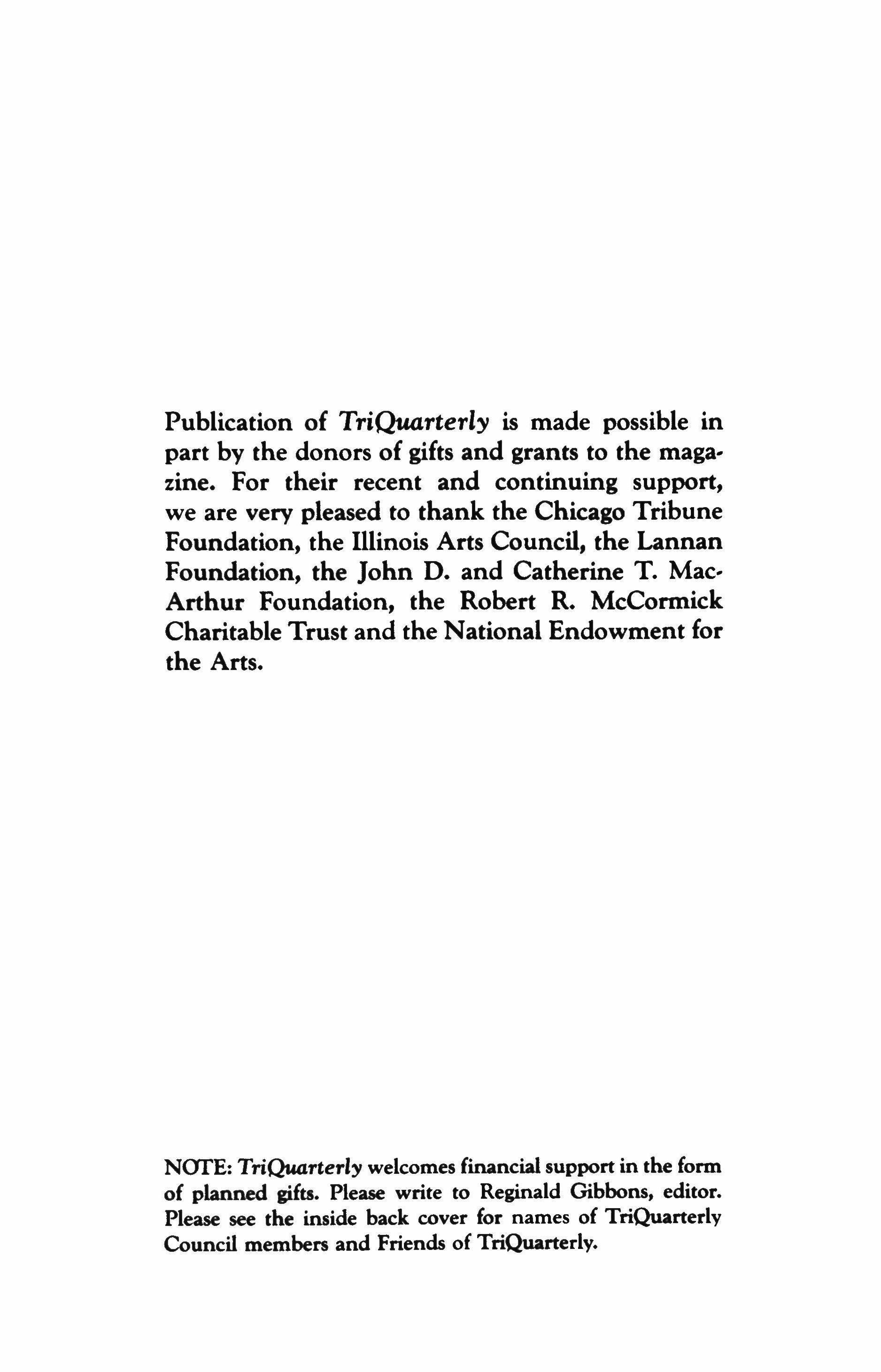
NOTE: TriQuarterly welcomes financial support in the form of planned gifts. Please write to Reginald Gibbons, editor. Please see the inside back cover for names of TriQuarterly Council members and Friends of TriQuarterly.
As!ociate Editor Susan Hahn
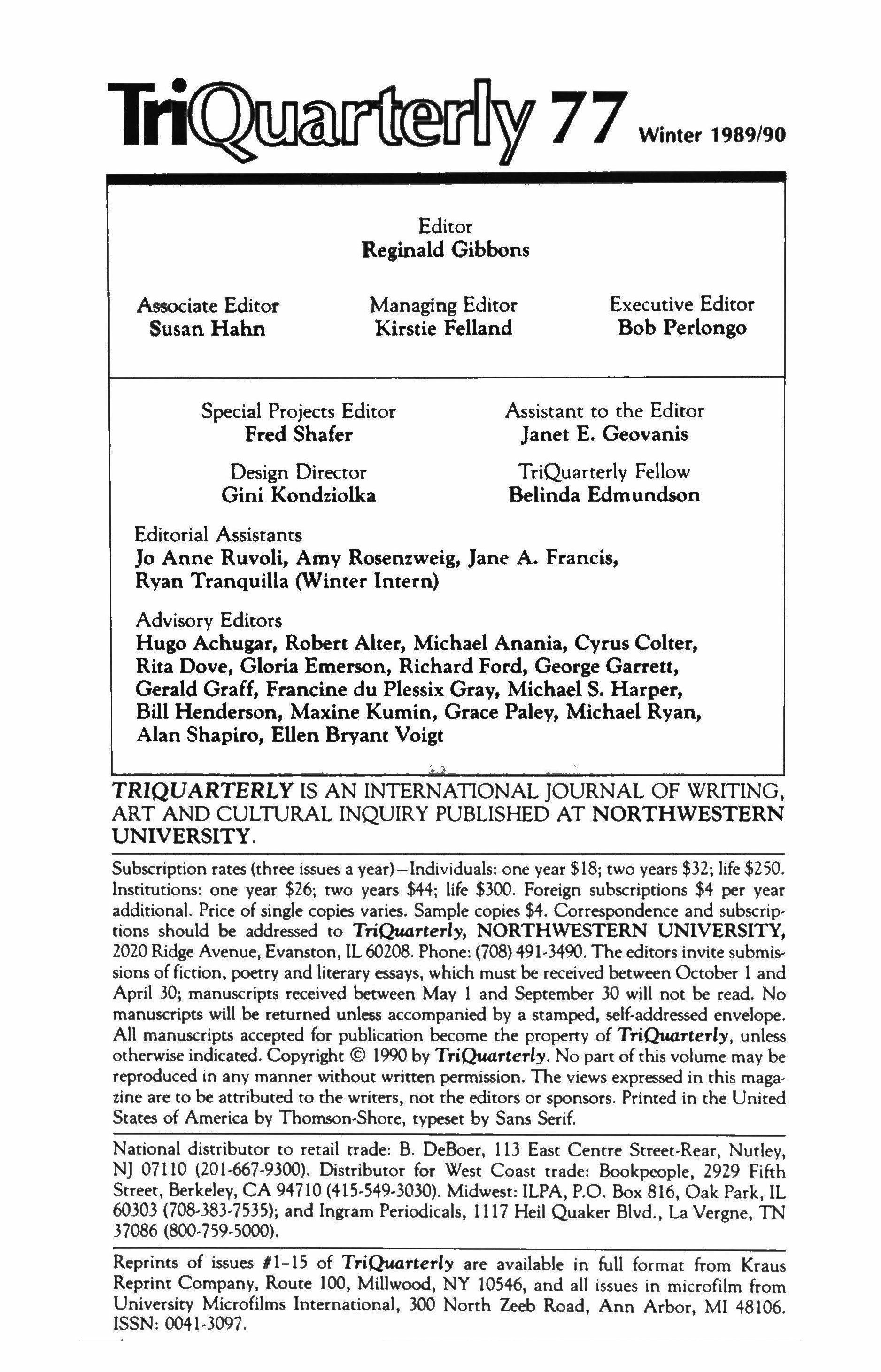
Editor
Reginald Gibbons
Managing Editor Kirstie Felland
Special Projects Editor Fred Shafer
Design Director Gini Kondziolka
Editorial Assistants
Executive Editor Bob Perlongo
Assistant to the Editor Janet E. Geovanis
TriQuarterly Fellow Belinda Edmundson
Jo Anne Ruvoli, Amy Rosenzweig, Jane A. Francis, Ryan Tranquilla (Winter Intern)
Advisory Editors
Hugo Achugar, Robert Alter, Michael Anania, Cyrus Colter, Rita Dove, Gloria Emerson, Richard Ford, George Garrett, Gerald Graff, Francine du Plessix Gray, Michael S. Harper, Bill Henderson, Maxine Kumin, Grace Paley, Michael Ryan, Alan Shapiro, Ellen Bryant Voigt
TRIQVARTERLY IS AN INTERNATIONAL JOURNAL OF WRITING, ART AND CULTURAL INQUIRY PUBLISHED AT NORTHWESTERN UNIVERSITY.
Subscription rates (three issues a year)-Individuals: one year $18; two years $32; life $250. Institutions: one year $26; two years $44; life $300. Foreign subscriptions $4 per year additional. Price of single copies varies. Sample copies $4. Correspondence and subscriptions should be addressed to TTiQuarteTly, NORTHWESTERN UNIVERSITY, 2020 Ridge Avenue, Evanston, IL 60208. Phone: (708) 491-3490. The editors invite submissions of fiction, poetry and literary essays, which must be received between October 1 and April 30; manuscripts received between May 1 and September 30 will not be read. No manuscripts will be returned unless accompanied by a stamped, self-addressed envelope. All manuscripts accepted for publication become the property of TriQuaTteTly, unless otherwise indicated. Copyright © 1990 by TTiQuaTteTly. No part of this volume may be reproduced in any manner without written permission. The views expressed in this magazine are to be attributed to the writers, not the editors or sponsors. Printed in the United States of America by Thomson-Shore, typeset by Sans Serif.
National distributor to retail trade: B. DeBoer, 113 East Centre Street-Rear, Nutley, NJ 07110 (201-667-9300). Distributor for West Coast trade: Bookpeople, 2929 Fifth Street, Berkeley, CA 94710 (415-549-3030). Midwest: ILPA, P.O. Box 816, Oak Park, IL 60303 (708-383-7535); and Ingram Periodicals, 1117 Heil Quaker Blvd., La Vergne, TN 37086 (800-759-5000).
Reprints of issues 11-15 of TTiQuaTteTly are available in full format from Kraus Reprint Company, Route 100, Millwood, NY 10546, and all issues in microfilm from University Microfilms International, 300 North Zeeb Road, Ann Arbor, MI 48106. ISSN: 0041-3097.
77 Winter
1989/90

The past three years have seen the emergence of TriQuarterly magazine as a publisher of a series of highly regarded books, in addition to its regular issues - an exciting development that has owed much of its success to the efforts of its Assistant to the Editor, Janet E. Geovanis. Her many and varied duties have included coordination of publicity and distribution for TriQuarterly Books/Another Chicago Press, and writing and producing TQ News, the TriQuarterly newsletter. It is with great regret, therefore, that we inform our readers that "Geo" will be leaving TQ to accept the position of technical writer in the computer field. Her intelligence, quick wit and wide-ranging talents will be sorely missed. We wish her well in her new endeavor.
TriQuarterly is pleased to announce that the first winner of the William Goyen Prize for Fiction is E. S. Goldman, whose collection of short stories, Earthly Justice: Cape Cod Stories, will be published by TriQuarterly Books/Another Chicago Press in November 1990.
Manuscripts are invited for consideration for the second annual Terrence Des Pres Prize for Poetry, awarded biannually by TriQuarterly for a booklength MS of poems. The MS should be 48 to 64 pages long, should be submitted in typed or clearly photocopied form and must be postmarked during June 1990. The prize consists of a $3,000 cash award and publication by TriQuarterly Books/Another Chicago Press. MSS will be read only if sent with a check for $15; this is a reading fee, but it includes a discounted one-year subscription to TQ. (MSS sent by persons who already subscribe to TQ need only a $5 check.) MSS will be returned only if accompanied by a SASE. The winner will be announced in the fall of 1990. Send MS and check to: The Terrence Des Pres Prize for Poetry, TriQuarterly/Northwestern University, 2020 Ridge Ave., Evanston, IL 60208.
The Museum of Modern Art in New York has added to its collection two photographs by TriQuarterly contributor Mark Steinmetz. Portfolios of Steinmetz's work appeared in TQ #64 and 74.
TriQuarterly Books currently available: Writers from South Africa
Stephen Deutch, Photographer: From Paris to Chicago, 1932-1989, with essay by Abigail Foerstner and preface by Studs Terkel
Selected Poems: The Weight of the Body by Stanislaw Baranczak
The Collected Poems of Sterling A. Brown selected by Michael S. Harper
For ordering information, please see page 324.

Contents Stanislaw Baranczak: First Winner of the Terrence Des Pres Prize for Poetry. 5 Remarks by Peter Balakian INTERVIEW Meeting Beckett 9 Charles Juliet Translated and edited by Suzanne Chamier FICTION Ghost Nets Karen Heuler 31 Perjury 41 Russell Working Good Samaritans R. D. Skillings Retreat 86 Arthur Morey Fireflies 104 David Michael Kaplan 65 SPECIAL SECTION Twenty-nine Modern Indian Poems 119 Translated {rom Hindi and Marathi with a Foreword and Afterword by Vinay Dharwadker LECTURE Orpheus/Philomela: Subjection and Mastery in the Founding Stories of Poetic Production and in the Logic of Our Practice. 229 Allen Grossman 3
The Rooms of Other Women Poets; We Are Human History. We Are Not Natural History; Outside History; In Exile
Eavan Boland The Waiting; The Cleaving.
Li-Young Lee Manifest Destinv, Being Caught Coming and Going
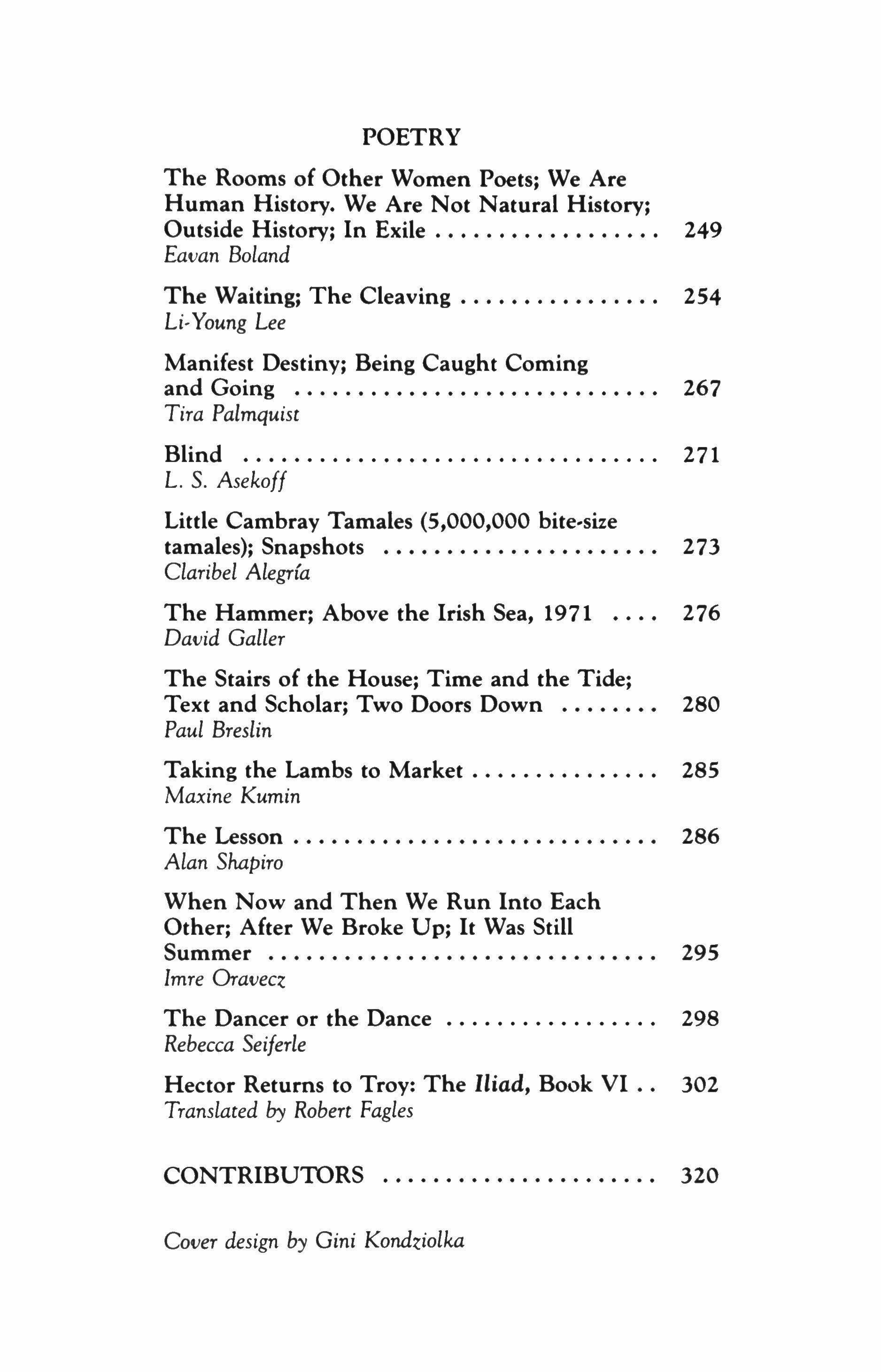
Little Cambrav Tamales (5,000,000 bite-size tamales); Snapshots ••••........•••.......
Claribel AlegrIa
The Hammer; Above the Irish Sea, 1971
David Galler
The Stairs of the House; Time and the Tide; Text and Scholar; Two Doors Down
Paul Breslin
Alan
When Now and Then We Run Into Each Other; After We Broke Up; It Was Still
Imre Oravecz The Dancer or the Dance
Rebecca Seiferle Hector Returns to Trov: The Iliad, Book VI
POETRY
249
254
267
Blind 271
.....•.•........•...••••.••..
Tira Palmquist
L. S. Asekoff
273
276
280
Taking
285 Maxine
The
286
295
298
302 Translated
CONTRIBU1URS .•.................... 320 Cover design by Gini
the Lambs to Market
Kumin
Lesson
Shapiro
Summer
by Robert Fagles
Kondziolka
Stanislaw Baranczak:
First Winner of the Terrence Des Pres Prize for Poetry
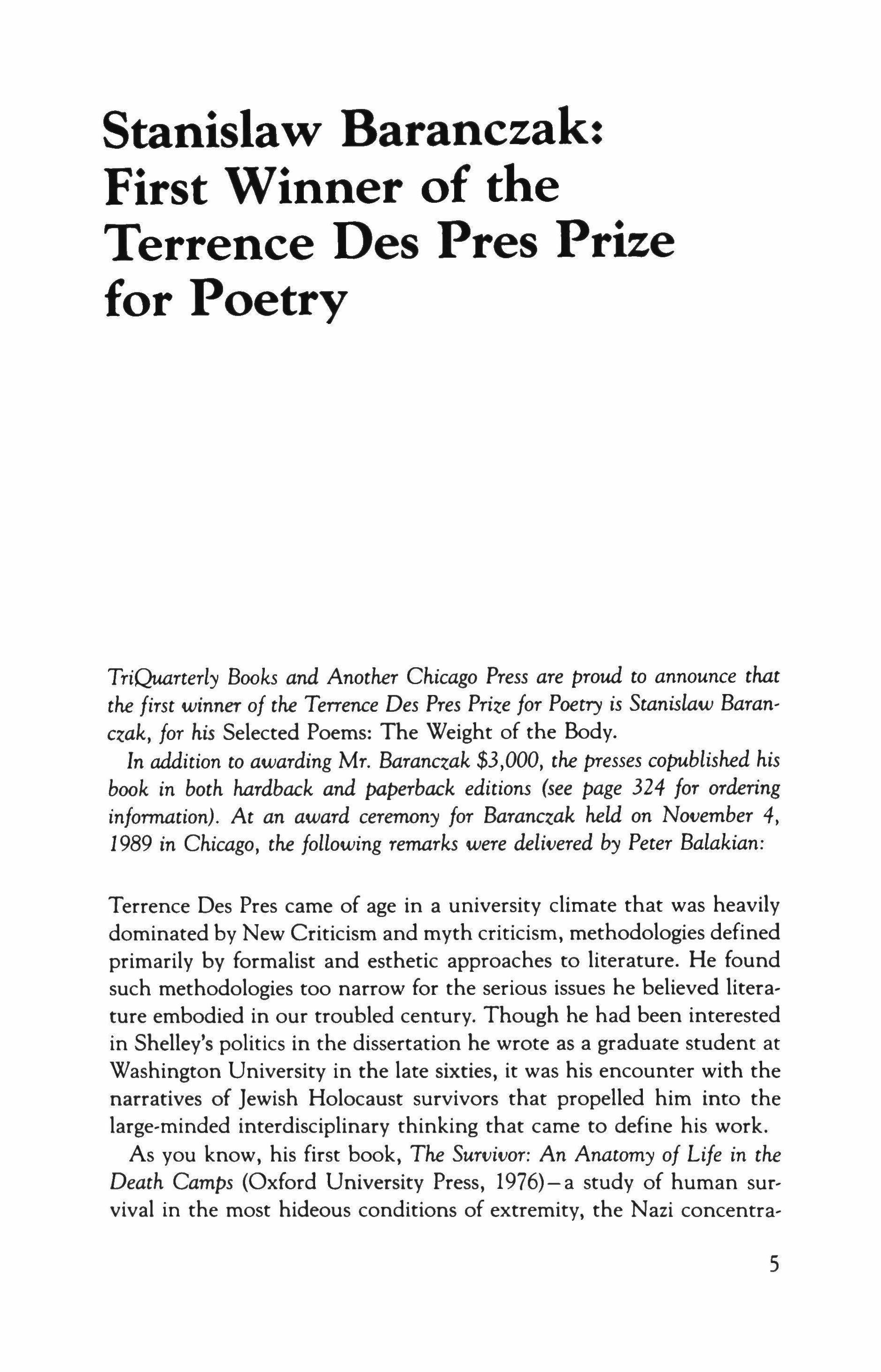
TriQuarterly Books and Another Chicago Press are proud to announce that the first winner of the Terrence Des Pres Prize for Poetry is Stanislaw Baranczak, for his Selected Poems: The Weight of the Body.
In addition to awarding Mr. Baranczak $3,000, the presses copublished his book in both hardback and paperback editions (see page 324 for ordering information). At an award ceremony for Baranczak held on November 4. 1989 in Chicago, the following remarks were delivered by Peter Balakian:
Terrence Des Pres came of age in a university climate that was heavily dominated by New Criticism and myth criticism, methodologies defined primarily by formalist and esthetic approaches to literature. He found such methodologies too narrow for the serious issues he believed literature embodied in our troubled century. Though he had been interested in Shelley's politics in the dissertation he wrote as a graduate student at Washington University in the late sixties, it was his encounter with the narratives of Jewish Holocaust survivors that propelled him into the large-minded interdisciplinary thinking that came to define his work.
As you know, his first book, The Survivor: An Anatomy of Life in the Death Camps (Oxford University Press, 1976)-a study of human survival in the most hideous conditions of extremity, the Nazi concentra-
5
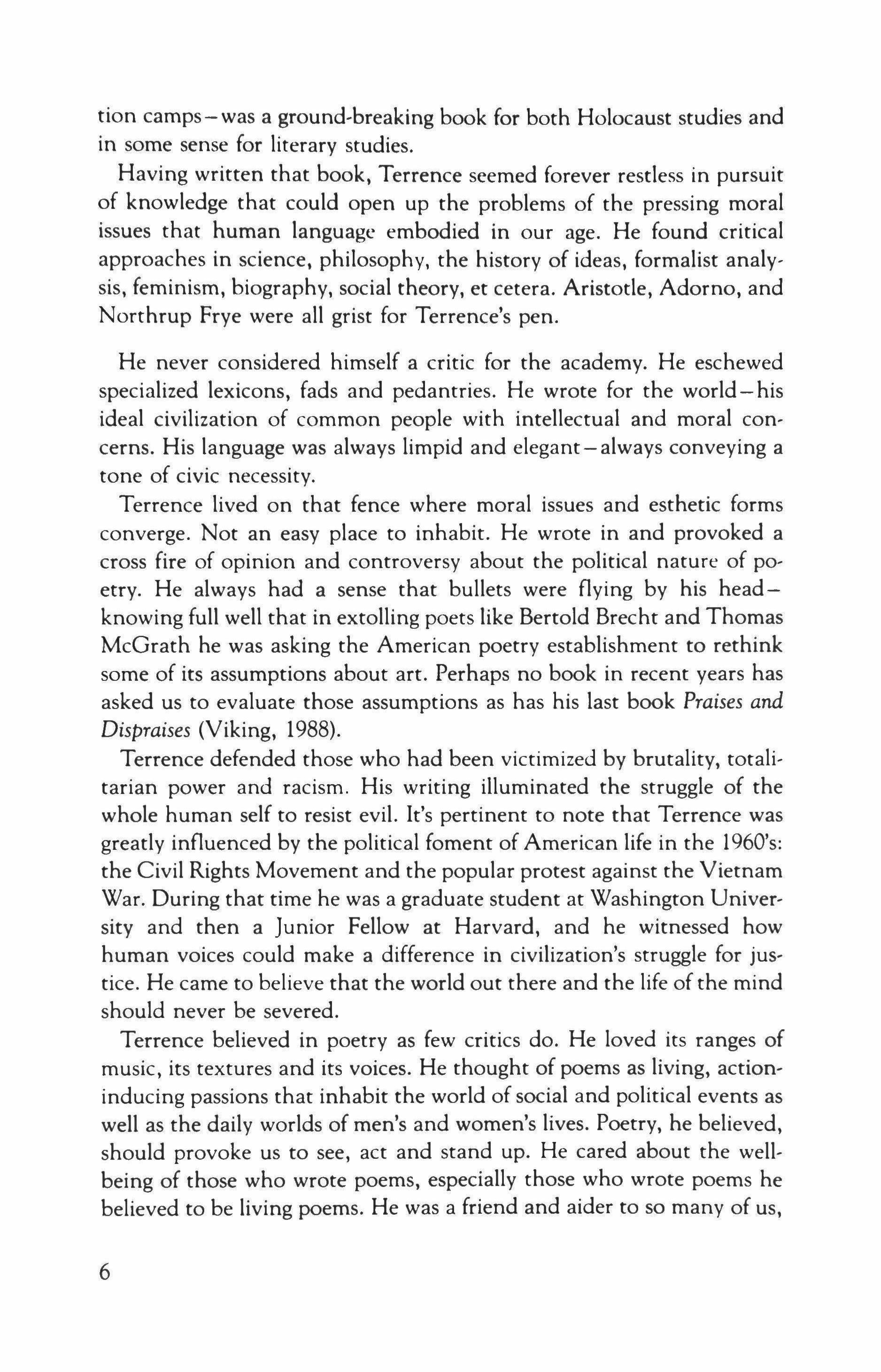
tion camps-was a ground-breaking book for both Holocaust studies and in some sense for literary studies.
Having written that book, Terrence seemed forever restless in pursuit of knowledge that could open up the problems of the pressing moral issues that human language embodied in our age. He found critical approaches in science, philosophy, the history of ideas, formalist analysis, feminism, biography, social theory, et cetera. Aristotle, Adorno, and Northrup Frye were all grist for Terrence's pen.
He never considered himself a critic for the academy. He eschewed specialized lexicons, fads and pedantries. He wrote for the world - his ideal civilization of common people with intellectual and moral concerns. His language was always limpid and elegant - always conveying a tone of civic necessity.
Terrence lived on that fence where moral issues and esthetic forms converge. Not an easy place to inhabit. He wrote in and provoked a cross fire of opinion and controversy about the political nature of poetry. He always had a sense that bullets were flying by his headknowing full well that in extolling poets like Bertold Brecht and Thomas McGrath he was asking the American poetry establishment to rethink some of its assumptions about art. Perhaps no book in recent years has asked us to evaluate those assumptions as has his last book Praises and Dispraises (Viking, 1988).
Terrence defended those who had been victimized by brutality, totalitarian power and racism. His writing illuminated the struggle of the whole human self to resist evil. It's pertinent to note that Terrence was greatly influenced by the political foment of American life in the 1960's: the Civil Rights Movement and the popular protest against the Vietnam War. During that time he was a graduate student at Washington University and then a Junior Fellow at Harvard, and he witnessed how human voices could make a difference in civilization's struggle for justice. He came to believe that the world out there and the life of the mind should never be severed.
Terrence believed in poetry as few critics do. He loved its ranges of music, its textures and its voices. He thought of poems as living, actioninducing passions that inhabit the world of social and political events as well as the daily worlds of men's and women's lives. Poetry, he believed, should provoke us to see, act and stand up. He cared about the wellbeing of those who wrote poems, especially those who wrote poems he believed to be living poems. He was a friend and aider to so many of us,
6
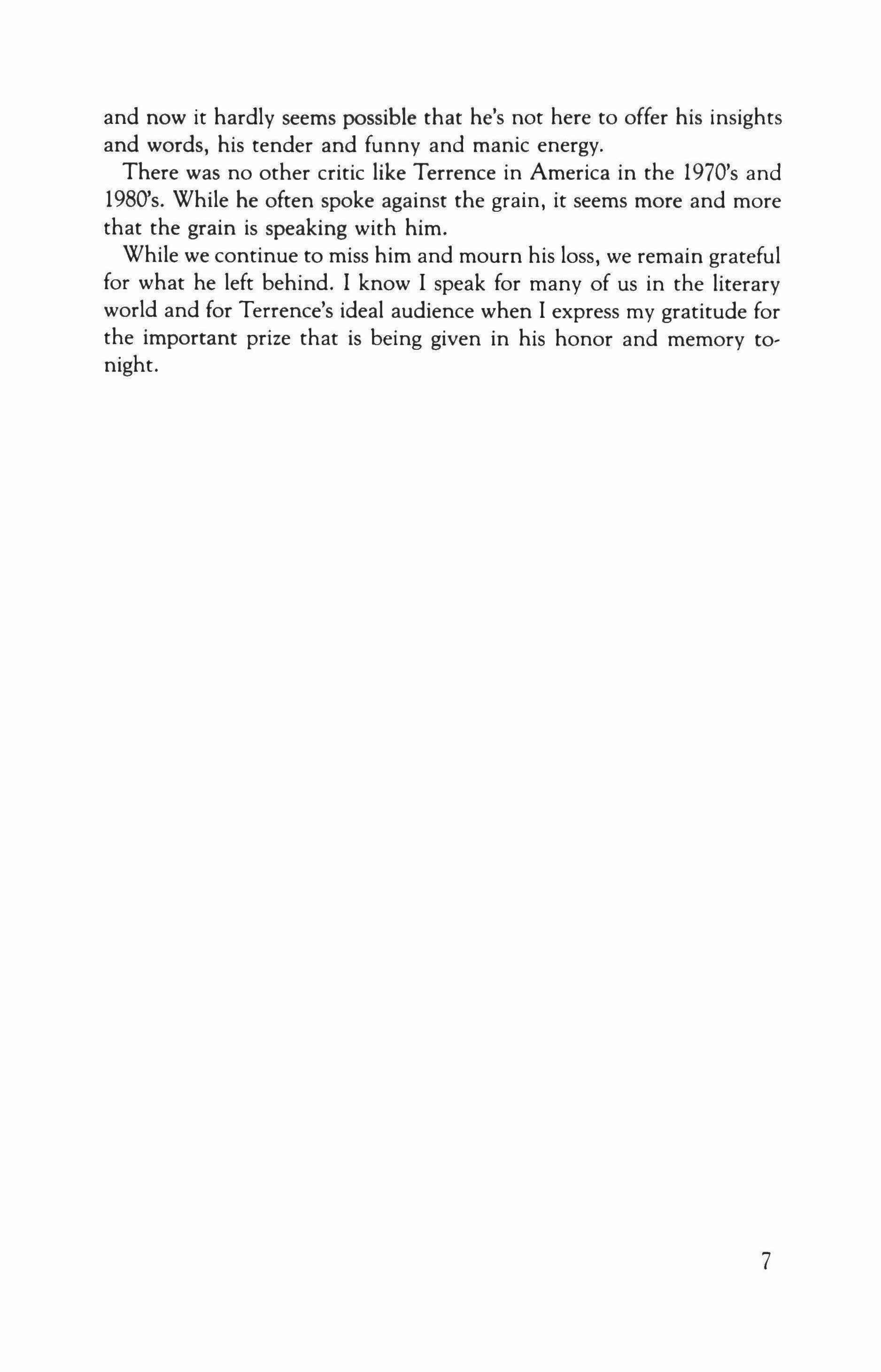
and now it hardly seems possible that he's not here to offer his insights and words, his tender and funny and manic energy.
There was no other critic like Terrence in America in the 1970's and 1980's. While he often spoke against the grain, it seems more and more that the grain is speaking with him.
While we continue to miss him and mourn his loss, we remain grateful for what he left behind. I know I speak for many of us in the literary world and for Terrence's ideal audience when I express my gratitude for the important prize that is being given in his honor and memory tonight.
7

Meeting Beckett
Charles Juliet
Translated and edited by Suzanne Chamier
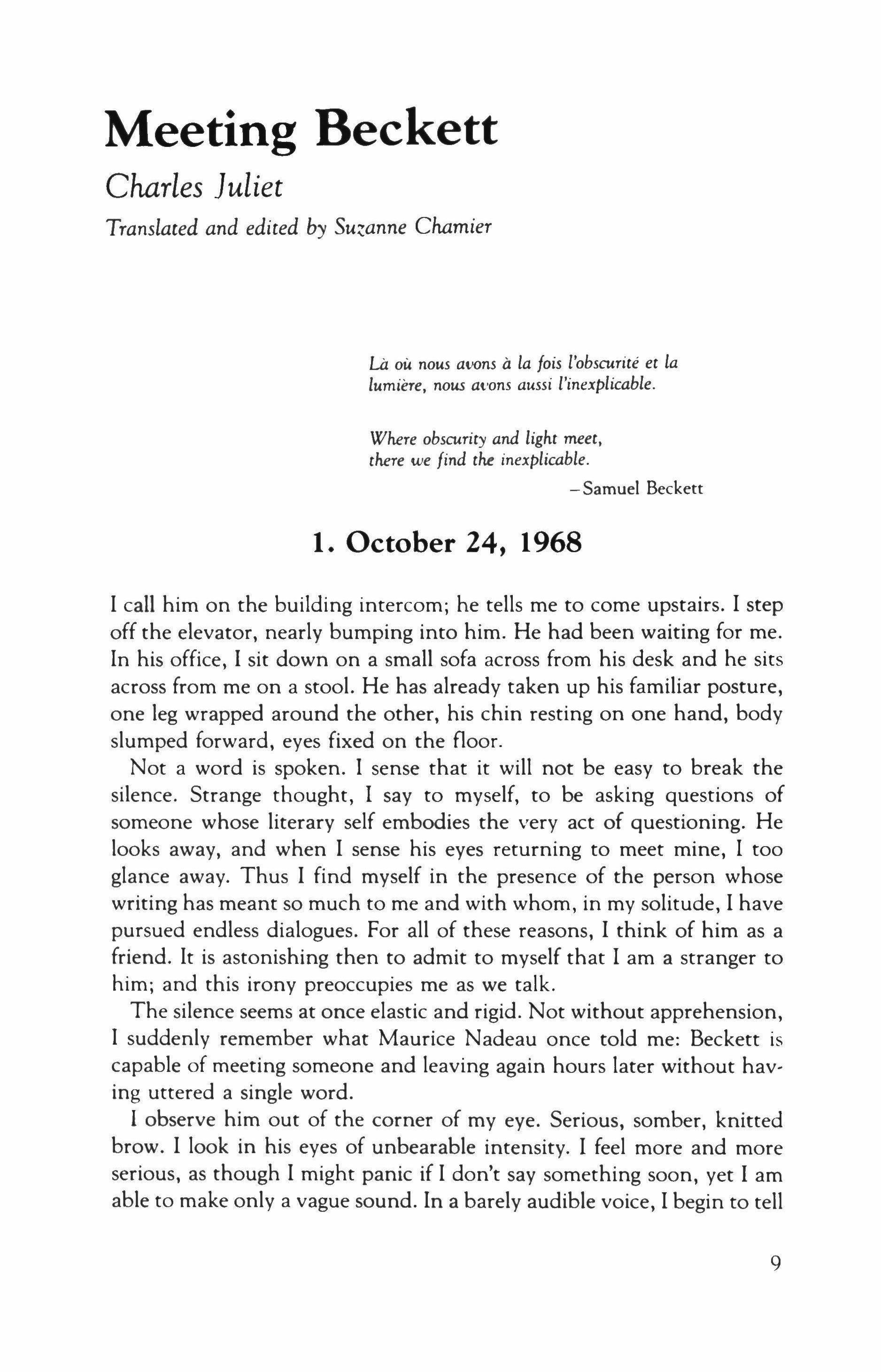
La ou nous allOns il la lois l'obscurite et la lumiere, nous awns aussi l'inexplicable.
Where obscurity and light meet, there we lind the inexplicable.
- Samuel Beckett
1. October 24, 1968
I call him on the building intercom; he tells me to come upstairs. I step off the elevator, nearly bumping into him. He had been waiting for me. In his office, I sit down on a small sofa across from his desk and he sits across from me on a stool. He has already taken up his familiar posture, one leg wrapped around the other, his chin resting on one hand, body slumped forward, eyes fixed on the floor.
Not a word is spoken. I sense that it will not be easy to break the silence. Strange thought, I say to myself, to be asking questions of someone whose literary self embodies the very act of questioning. He looks away, and when I sense his eyes returning to meet mine, I too glance away. Thus I find myself in the presence of the person whose writing has meant so much to me and with whom, in my solitude, I have pursued endless dialogues. For all of these reasons, I think of him as a friend. It is astonishing then to admit to myself that I am a stranger to him; and this irony preoccupies me as we talk.
The silence seems at once elastic and rigid. Not without apprehension, I suddenly remember what Maurice Nadeau once told me: Beckett is capable of meeting someone and leaving again hours later without having uttered a single word.
I observe him out of the corner of my eye. Serious, somber, knitted brow. I look in his eyes of unbearable intensity. I feel more and more serious, as though I might panic if I don't say something soon, yet I am able to make only a vague sound. In a barely audible voice, I begin to tell
9
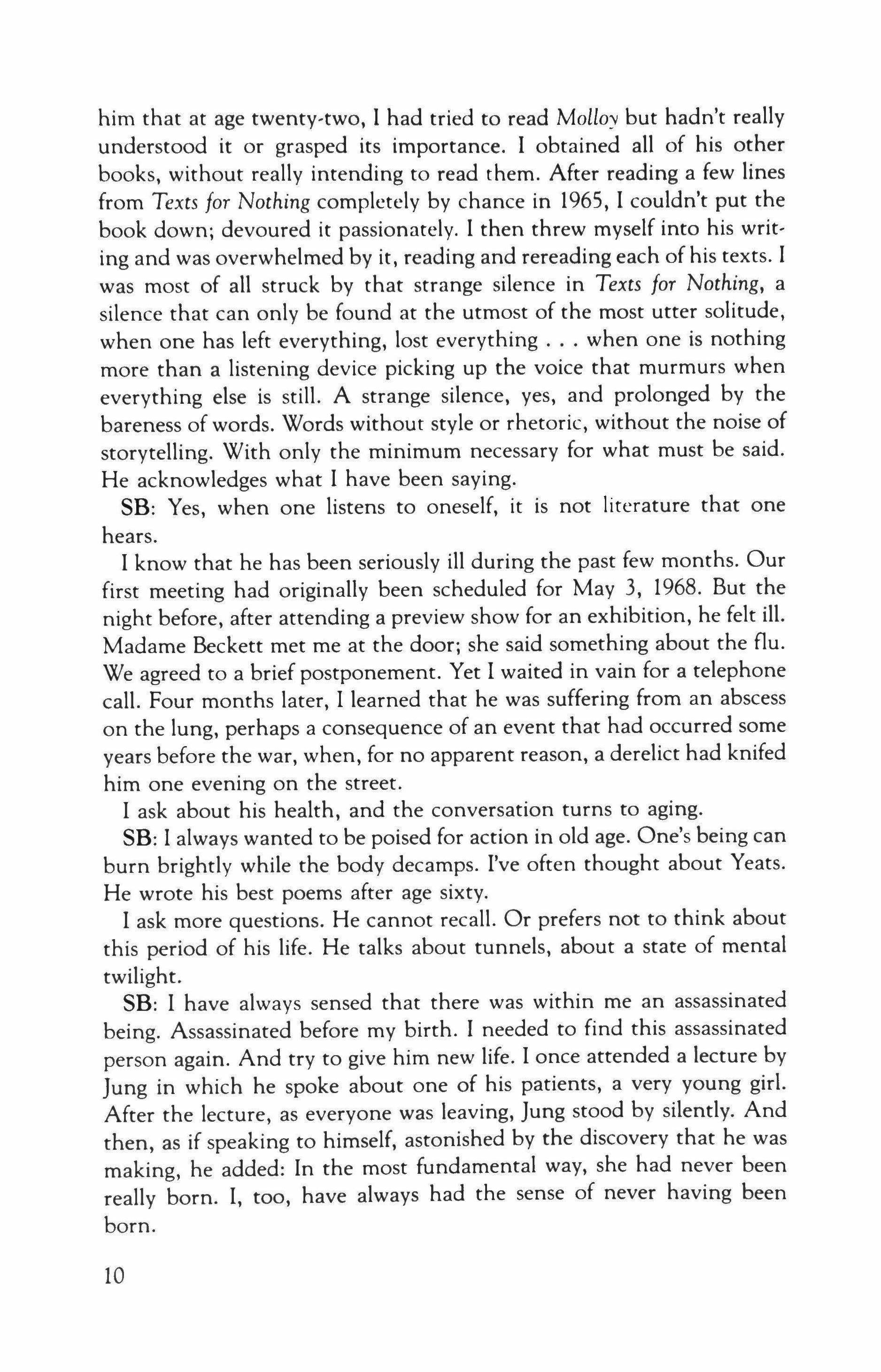
him that at age twenty-two, I had tried to read Molloy but hadn't really understood it or grasped its importance. I obtained all of his other books, without really intending to read them. After reading a few lines from Texts for Nothing completely by chance in 1965, I couldn't put the book down; devoured it passionately. I then threw myself into his writing and was overwhelmed by it, reading and rereading each of his texts. I was most of all struck by that strange silence in Texts for Nothing, a silence that can only be found at the utmost of the most utter solitude, when one has left everything, lost everything when one is nothing more than a listening device picking up the voice that murmurs when everything else is still. A strange silence, yes, and prolonged by the bareness of words. Words without style or rhetoric, without the noise of storytelling. With only the minimum necessary for what must be said. He acknowledges what I have been saying.
SB: Yes, when one listens to oneself, it is not literature that one hears.
I know that he has been seriously ill during the past few months. Our first meeting had originally been scheduled for May 3, 1968. But the night before, after attending a preview show for an exhibition, he felt ill. Madame Beckett met me at the door; she said something about the flu. We agreed to a brief postponement. Yet I waited in vain for a telephone call. Four months later, I learned that he was suffering from an abscess on the lung, perhaps a consequence of an event that had occurred some years before the war, when, for no apparent reason, a derelict had knifed him one evening on the street.
I ask about his health, and the conversation turns to aging.
SB: I always wanted to be poised for action in old age. One's being can burn brightly while the body decamps. I've often thought about Yeats. He wrote his best poems after age sixty.
I ask more questions. He cannot recall. Or prefers not to think about this period of his life. He talks about tunnels, about a state of mental twilight.
SB: I have always sensed that there was within me an assassinated being. Assassinated before my birth. I needed to find this assassinated person again. And try to give him new life. I once attended a lecture by [ung in which he spoke about one of his patients, a very young girl. After the lecture, as everyone was leaving, [ung stood by silently. And then, as if speaking to himself, astonished by the discovery that he was making, he added: In the most fundamental way, she had never been really born. I, too, have always had the sense of never having been born.
10

The conclusion of the [ung lecture reappears as an episode in All That Fall:
MRS. ROONEY I remember once attending a lecture by one of these new mind doctors, I forgot what you call them. He spoke-
MR. ROONEY A lunatic specialist?
MRS. ROONEY No no, just the troubled mind, I was hoping he might shed a little light on my lifelong preoccupation with horses' buttocks.
MR. ROONEY A neurologist.
MRS. ROONEY No no, just mental distress, the name will come back to me in the night. I remember his telling us the story of a little girl, very strange and unhappy in her ways, and how he treated her unsuccessfully over a period of years and was finally obliged to give up the case. He could find nothing wrong with her, he said. The only thing wrong with her as far as he could see was that she was dying. And she did in fact die, shortly after he washed his hands of her.
MR. ROONEY Well? What is there so wonderful about that?
MRS. ROONEY No, it was just something he said, and the way he said it, that have haunted me ever since.
MR. ROONEY You lie awake at night, tossing to and fro and brooding on it.
MRS. ROONEY On it and other wretchedness. (Pause.) When he had done with the little girl he stood there motionless for some time, quite two minutes I should say, looking down at his table. Then he suddenly raised his head and exclaimed, as if he had had a revelation, The trouble with her was she had never been really born! (Pause.) He spoke throughout without notes. (Pause.) I left before the end.!
In 1945, Beckett returned to Ireland to visit his mother whom he had not seen since the beginning of the war. He returned to see her again the following year, at which time he suddenly realized what he had to do.
SB: I understood that things could not go on any longer as they were.
11
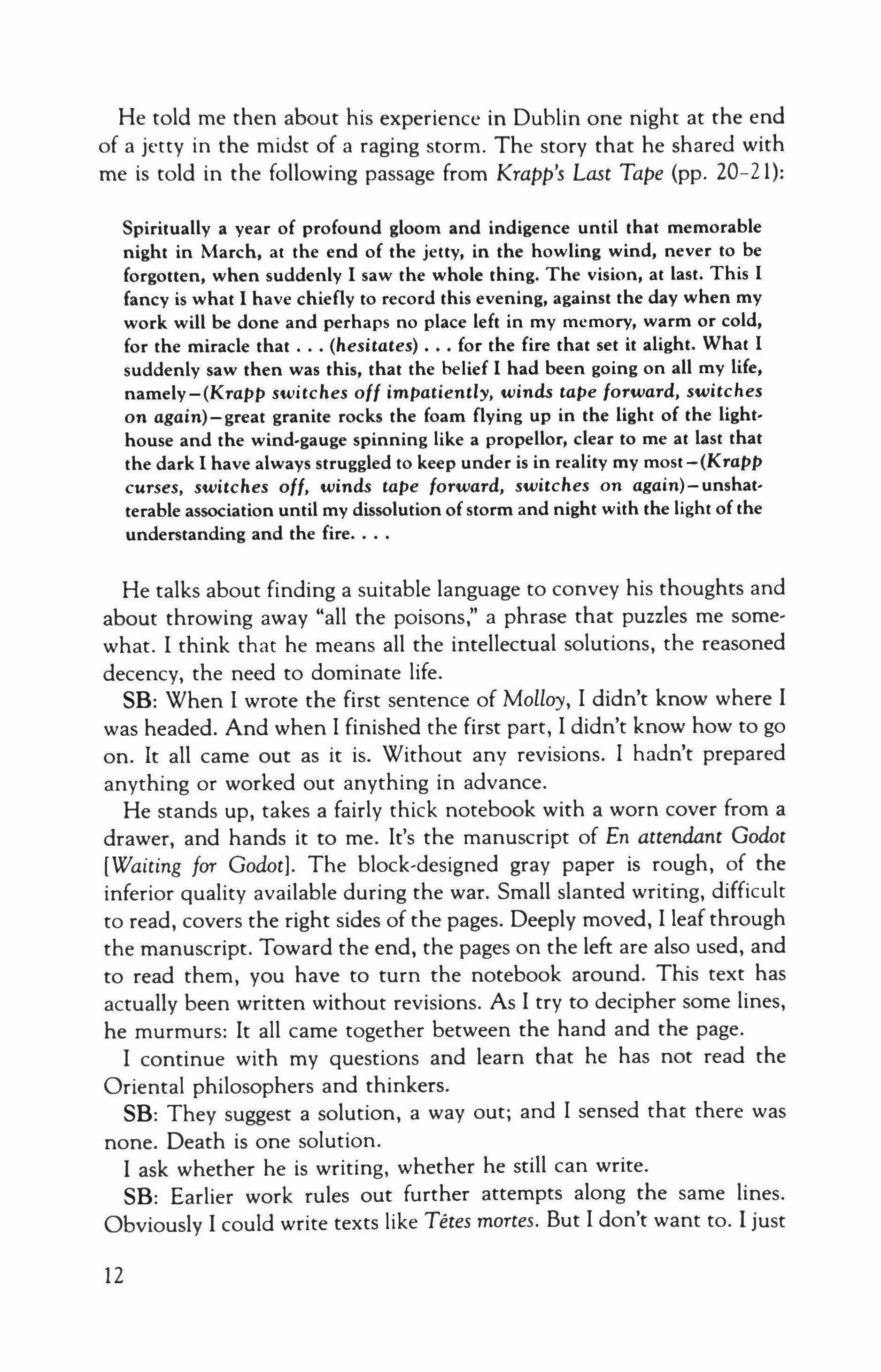
He told me then about his experience in Dublin one night at the end of a jetty in the midst of a raging storm. The story that he shared with me is told in the following passage from Krapp's Last Tape (pp. 20-21);
Spiritually a year of profound gloom and indigence until that memorable night in March, at the end of the jetty, in the howling wind, never to be forgotten, when suddenly I saw the whole thing. The vision, at last. This I fancy is what I have chiefly to record this evening, against the day when my work will be done and perhaps no place left in my memory, warm or cold, for the miracle that (hesitates) for the fire that set it alight. What I suddenly saw then was this, that the belief I had been going on all my life, namely-(KTapp switches off impatiently, winds tape fOTwaTd, switches on again)-great granite rocks the foam flying up in the light of the lighthouse and the wind-gauge spinning like a propellor, clear to me at last that the dark I have always struggled to keep under is in reality my most-(KTapp curses, switches off, winds tape fOTwaTd, switches on again)-unshatterable association until my dissolution of storm and night with the light of the understanding and the fire
He talks about finding a suitable language to convey his thoughts and about throwing away "all the poisons," a phrase that puzzles me somewhat. I think that he means all the intellectual solutions, the reasoned decency, the need to dominate life.
SB: When I wrote the first sentence of Molloy, I didn't know where I was headed. And when I finished the first part, I didn't know how to go on. It all came out as it is. Without any revisions. I hadn't prepared anything or worked out anything in advance.
He stands up, takes a fairly thick notebook with a worn cover from a drawer, and hands it to me. It's the manuscript of En attendant Godat [Waiting for Godat]. The block-designed gray paper is rough, of the inferior quality available during the war. Small slanted writing, difficult to read, covers the right sides of the pages. Deeply moved, I leaf through the manuscript. Toward the end, the pages on the left are also used, and to read them, you have to turn the notebook around. This text has actually been written without revisions. As I try to decipher some lines, he murmurs: It all came together between the hand and the page.
I continue with my questions and learn that he has not read the Oriental philosophers and thinkers.
SB: They suggest a solution, a way out; and I sensed that there was none. Death is one solution.
I ask whether he is writing, whether he still can write.
SB: Earlier work rules out further attempts along the same lines. Obviously I could write texts like Teres mortes. But I don't want to. I just
12
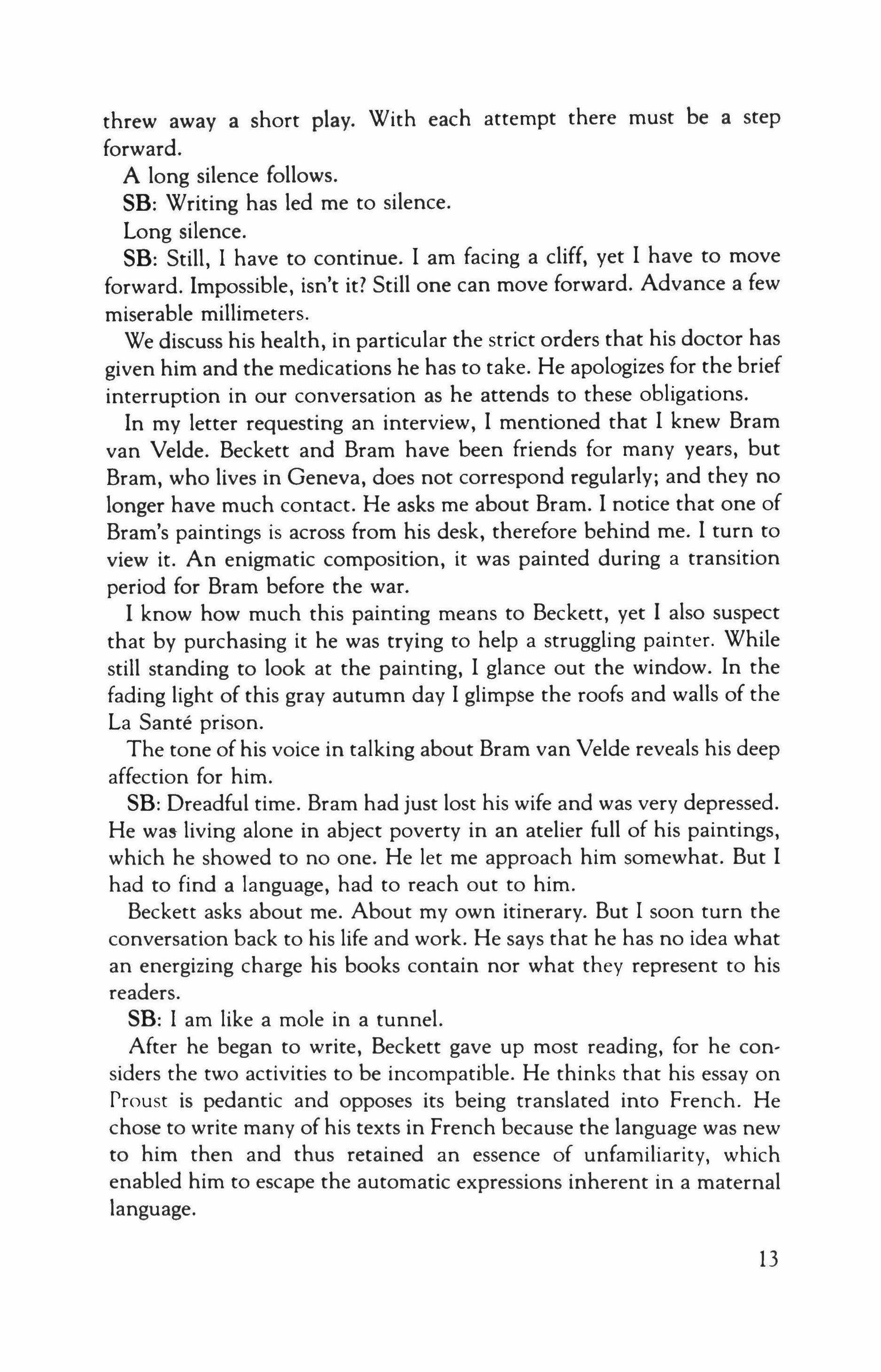
threw away a short play. With each attempt there must be a step forward.
A long silence follows.
SB: Writing has led me to silence.
Long silence.
SB: Still, I have to continue. I am facing a cliff, yet I have to move forward. Impossible, isn't it? Still one can move forward. Advance a few miserable millimeters.
We discuss his health, in particular the strict orders that his doctor has given him and the medications he has to take. He apologizes for the brief interruption in our conversation as he attends to these obligations. In my letter requesting an interview, I mentioned that I knew Bram van Velde. Beckett and Bram have been friends for many years, but Bram, who lives in Geneva, does not correspond regularly; and they no longer have much contact. He asks me about Bram. I notice that one of Bram's paintings is across from his desk, therefore behind me. I turn to view it. An enigmatic composition, it was painted during a transition period for Bram before the war.
I know how much this painting means to Beckett, yet I also suspect that by purchasing it he was trying to help a struggling painter. While still standing to look at the painting, I glance out the window. In the fading light of this gray autumn day I glimpse the roofs and walls of the La Sante prison.
The tone of his voice in talking about Bram van Velde reveals his deep affection for him.
SB: Dreadful time. Bram had just lost his wife and was very depressed. He was living alone in abject poverty in an atelier full of his paintings, which he showed to no one. He let me approach him somewhat. But I had to find a language, had to reach out to him.
Beckett asks about me. About my own itinerary. But I soon turn the conversation back to his life and work. He says that he has no idea what an energizing charge his books contain nor what they represent to his readers.
SB: I am like a mole in a tunnel.
After he began to write, Beckett gave up most reading, for he considers the two activities to be incompatible. He thinks that his essay on Proust is pedantic and opposes its being translated into French. He chose to write many of his texts in French because the language was new to him then and thus retained an essence of unfamiliarity, which enabled him to escape the automatic expressions inherent in a maternal language.
13
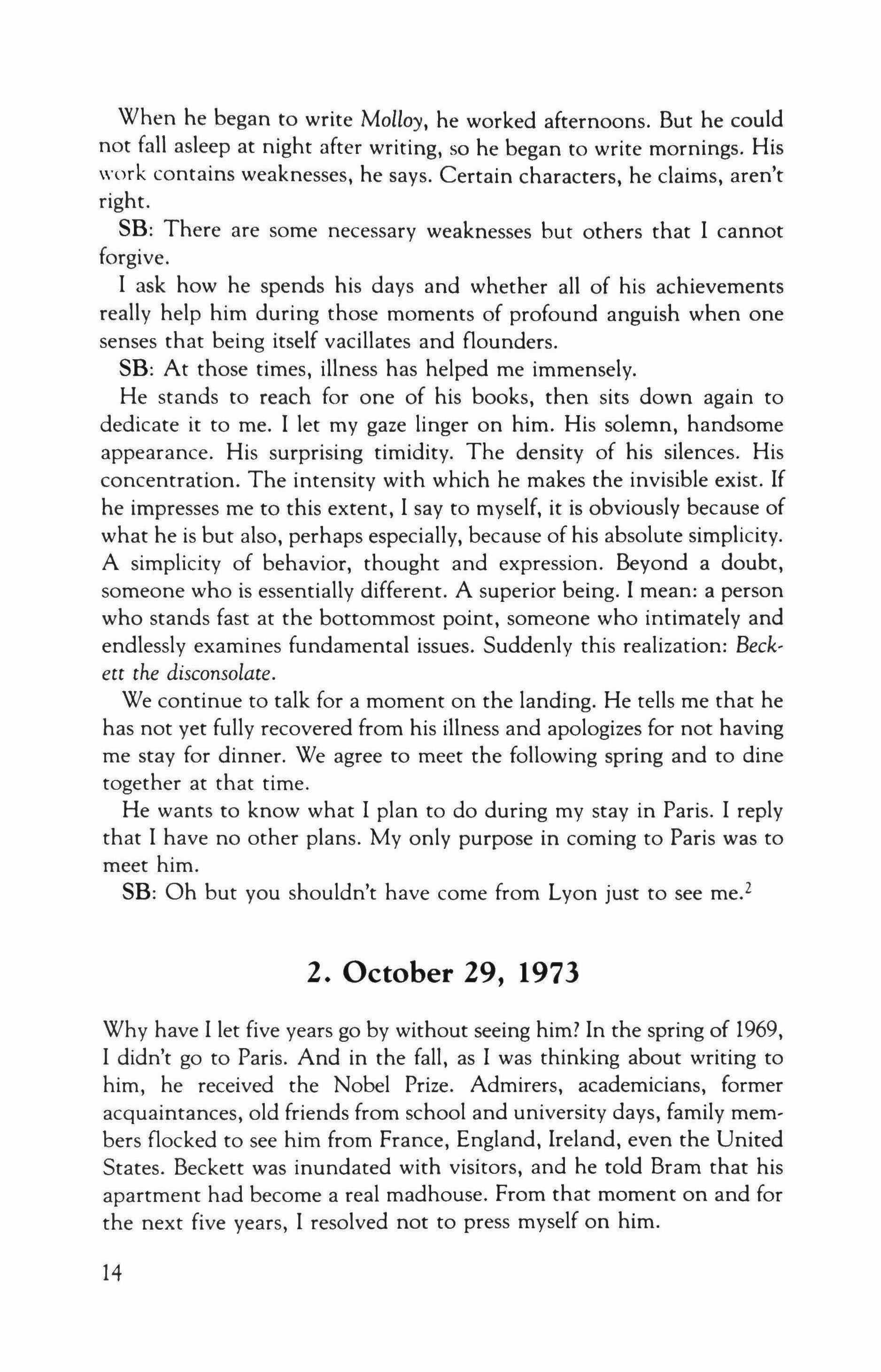
When he began to write Molloy, he worked afternoons. But he could not fall asleep at night after writing, so he began to write mornings. His work contains weaknesses, he says. Certain characters, he claims, aren't right.
SB: There are some necessary weaknesses but others that I cannot forgive.
I ask how he spends his days and whether all of his achievements really help him during those moments of profound anguish when one senses that being itself vacillates and flounders.
SS: At those times, illness has helped me immensely. He stands to reach for one of his books, then sits down again to dedicate it to me. I let my gaze linger on him. His solemn, handsome appearance. His surprising timidity. The density of his silences. His concentration. The intensity with which he makes the invisible exist. If he impresses me to this extent, I say to myself, it is obviously because of what he is but also, perhaps especially, because of his absolute simplicity. A simplicity of behavior, thought and expression. Beyond a doubt, someone who is essentially different. A superior being. I mean: a person who stands fast at the bottommost point, someone who intimately and endlessly examines fundamental issues. Suddenly this realization: Beckett the disconsolate.
We continue to talk for a moment on the landing. He tells me that he has not yet fully recovered from his illness and apologizes for not having me stay for dinner. We agree to meet the following spring and to dine together at that time.
He wants to know what I plan to do during my stay in Paris. I reply that I have no other plans. My only purpose in coming to Paris was to meet him.
SB: Oh but you shouldn't have come from Lyon just to see me,z
2. October 29, 1973
Why have I let five years go by without seeing him? In the spring of 1969, I didn't go to Paris. And in the fall, as I was thinking about writing to him, he received the Nobel Prize. Admirers, academicians, former acquaintances, old friends from school and university days, family members flocked to see him from France, England, Ireland, even the United States. Beckett was inundated with visitors, and he told Bram that his apartment had become a real madhouse. From that moment on and for the next five years, I resolved not to press myself on him.
14

Finally I contacted him and we arranged to meet at the Closerie des Lilas, my first visit to that legendary brasserie made famous by Joyce, Hemingway, the surrealists and so many other renowned writers. At exactly 7 P.\l., the time scheduled for our meeting, I glimpse his tall silhouette. Dark glasses, sheepskin jacket. A beautiful pale red muffler. I walk up to him and introduce myself. Grasping my hand, he looks at me for a few seconds without saying a word. As we go inside, he removes his glasses. He takes off his jacket, motioning for me to sit in a booth while he sits in a chair so that we are not directly across from one another. Dark corduroy trousers, slightly worn. Blue-gray turtleneck, sleeves pushed up. He is tanned and relaxed and smiles at me; then he immediately becomes self-absorbed and a heavy silence descends upon us like a yoke.
How shall I ever being to speak? Talking about trivialities seems as impossible to me as beginning all at once with my questions. Yet his solemnity calms my agitation, pulling me toward a center while eliciting dormant thoughts and feelings.
For a while, I am unable to say anything at all. Then our conversation slowly begins. He tells me about five weeks just spent in Morocco where he toured the countryside in a rented car, slept on the beaches, walked through the souks. I ask whether he worked a little.
SB: No, it was more escape than involvement.
We talk for a long time about Bram - how he is, what he's painting, whether he still takes walks, whether he's still so taciturn. Beckett notes with regret that Bram and he no longer have the opportunity to see one another. I assure him that Bram thinks of him often. The conversation then turns to Jacoba, Bram's sister. She lives in Amsterdam with a friend who is paralyzed, and her life is not easy. Does Bram know about this? he asks. But before I can answer, he smiles and says kindly: No, Bram is apart from all of that.
He speaks in a low voice, uttering short sentences that I cannot always hear because of the background noise at the Closerie de Lilas.
We discuss his plays, in particular the stage productions in Germany that he has recently assisted in directing. I ask whether such work interests him.
SB: Yes, but it's really a diversion, an entertaining diversion.
He deplores the fact that in the Cologne production of Endgame the play was situated in a home for the elderly, a staging that disregarded Beckett's directions and caricatured the scene.
I mention that both Watt and Molloy received numerous rejection
15

slips, and he acknowledges that he had given up all hope of ever being published.
SB: It was my wife, Suzanne, who insisted that we keep on trying and who found [jerome] Lindon at Les Editions de Minuit.
I try to put into words why his writing would inevitably meet with opposition.
SB: There was a kind of indecency involved, yes, an ontological indecency.
I bring up the problem of translations, and he explains why he does them himself. Leaving the task to someone else would only oblige him to edit the text word-for-word later, an even more difficult task.
And what does he think about all of the academic essays and theses devoted to his writing? I express my own aversion to such analyses, which often strike me as senseless, useless vivisections. He gestures in the air, as if to brush away something annoying, then murmurs: that university madness.
He talks for a long while about growing older, in particular about the importance he places on hearing since his eyes have weakened. No, he no longer has insomnia. Doesn't write while walking.
He is surprised to learn that I have read Fizzles. Will send me his latest play, Not I, already staged in England and Germany. In the French production, Madeleine Renaud will portray the main character- a mouth, only a mouth.
For a new edition of Molloy and the trilogy, Beckett recently had to reread the books. I ask about his reaction. He lowers his head, looks into space; I note that it is not easy for him to find a response. His expression suddenly changes, and his face takes on a stone-like fixity. I can see that he is now very far away, that he has forgotten everything, and that for the moment he has not the slightest awareness of time and place. A fascinating sight. Sitting less than a meter from him and quite moved by it all, I study him with rapacious attention, certain that he does not observe my scrutiny.
I had forgotten how impressive yet natural his demeanor is. As handsome full-face as he is in profile, he expresses sensitivity, energy and the extraordinary intensity of a visionary. His forehead is grooved by deep lines. His cheeks are hollow and unevenly shaven. An aquiline nose. Shaggy, uneven eyebrows. Wide mouth, fine lips. Thick, disheveled gray hair.
Two, perhaps three long minutes pass. Then the stone revives, and I look away. Still another endless silence. And as I prepare another ques-
16
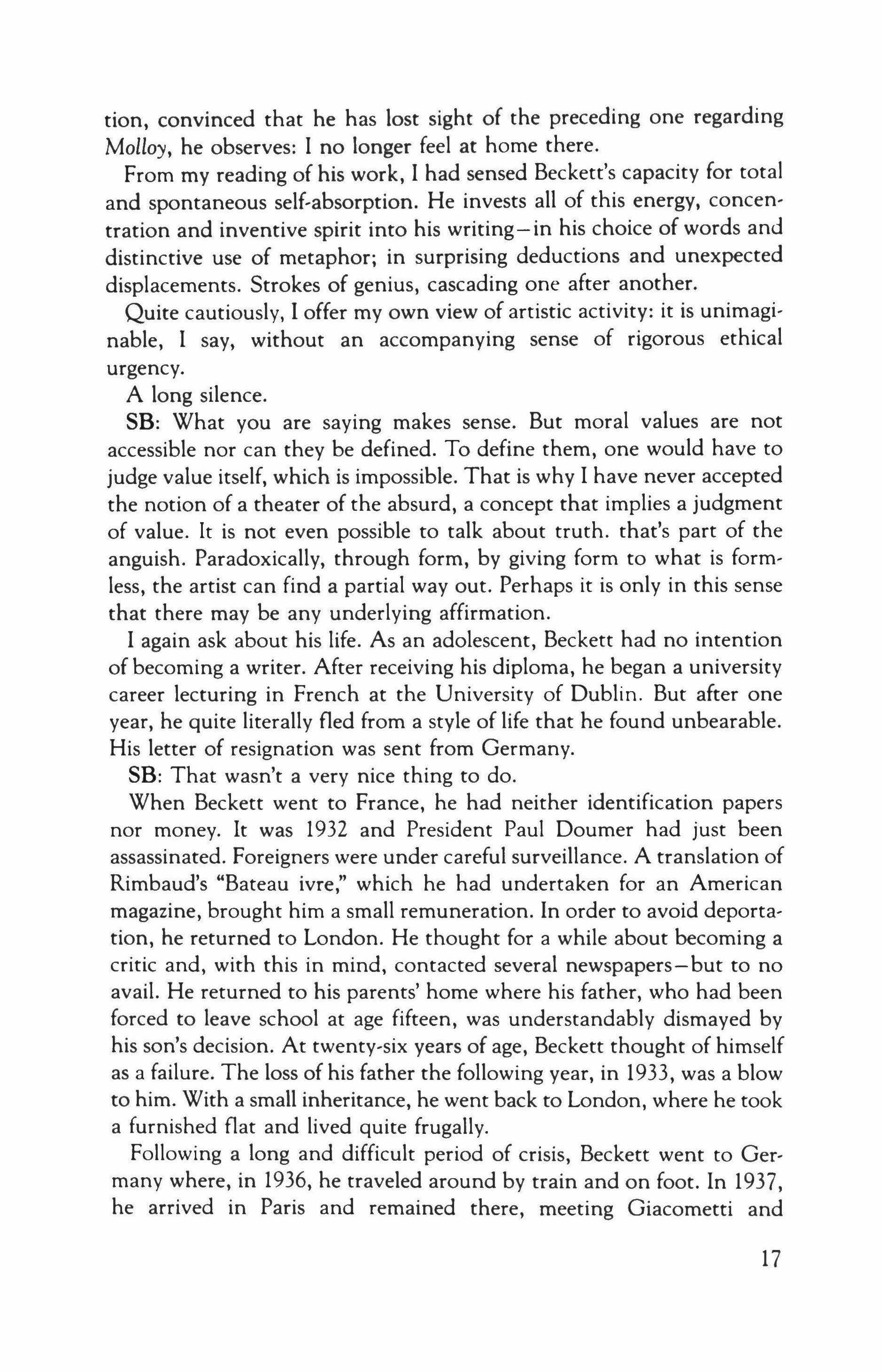
tion, convinced that he has lost sight of the preceding one regarding Molloy, he observes: I no longer feel at home there.
From my reading of his work, I had sensed Beckett's capacity for total and spontaneous self-absorption. He invests all of this energy, concentration and inventive spirit into his writing-in his choice of words and distinctive use of metaphor; in surprising deductions and unexpected displacements. Strokes of genius, cascading one after another.
Quite cautiously, I offer my own view of artistic activity: it is unimaginable, I say, without an accompanying sense of rigorous ethical urgency.
A long silence.
SB: What you are saying makes sense. But moral values are not accessible nor can they be defined. To define them, one would have to judge value itself, which is impossible. That is why I have never accepted the notion of a theater of the absurd, a concept that implies a judgment of value. It is not even possible to talk about truth. that's part of the anguish. Paradoxically, through form, by giving form to what is formless, the artist can find a partial way out. Perhaps it is only in this sense that there may be any underlying affirmation.
I again ask about his life. As an adolescent, Beckett had no intention of becoming a writer. After receiving his diploma, he began a university career lecturing in French at the University of Dublin. But after one year, he quite literally fled from a style of life that he found unbearable. His letter of resignation was sent from Germany.
SB: That wasn't a very nice thing to do.
When Beckett went to France, he had neither identification papers nor money. It was 1932 and President Paul Doumer had just been assassinated. Foreigners were under careful surveillance. A translation of Rimbaud's "Bateau ivre," which he had undertaken for an American magazine, brought him a small remuneration. In order to avoid deportation, he returned to London. He thought for a while about becoming a critic and, with this in mind, contacted several newspapers-but to no avail. He returned to his parents' home where his father, who had been forced to leave school at age fifteen, was understandably dismayed by his son's decision. At twenty-six years of age, Beckett thought of himself as a failure. The loss of his father the following year, in 1933, was a blow to him. With a small inheritance, he went back to London, where he took a furnished flat and lived quite frugally.
Following a long and difficult period of crisis, Beckett went to Germany where, in 1936, he traveled around by train and on foot. In 1937, he arrived in Paris and remained there, meeting Giacometti and
17
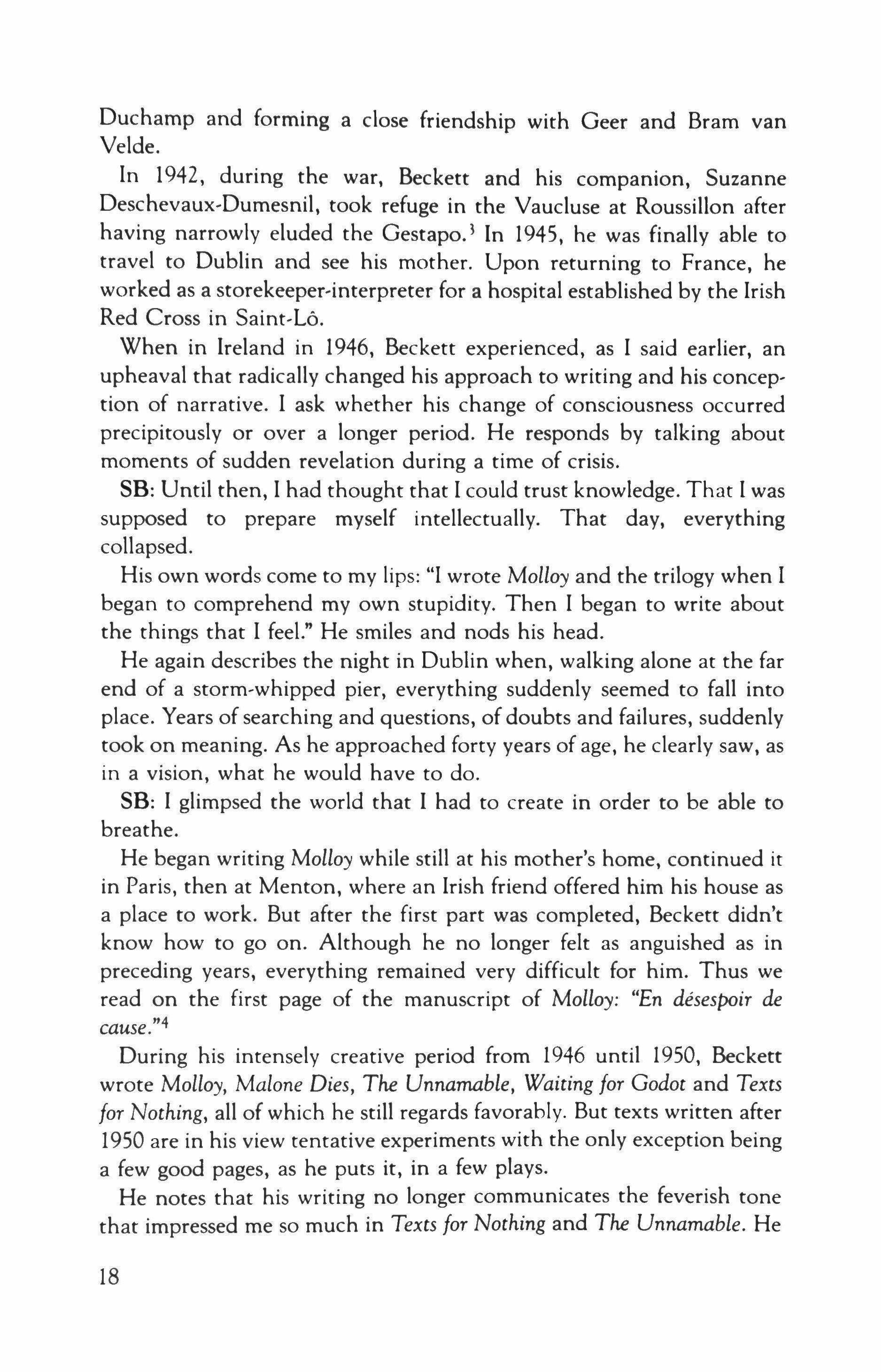
Duchamp and forming a close friendship with Geer and Bram van Velde.
In 1942, during the war, Beckett and his companion, Suzanne Deschevaux-Dumesnil, took refuge in the Vaucluse at Roussillon after having narrowly eluded the Gestapo.! In 1945, he was finally able to travel to Dublin and see his mother. Upon returning to France, he worked as a storekeeper-interpreter for a hospital established by the Irish Red Cross in Sainr-Lo,
When in Ireland in 1946, Beckett experienced, as I said earlier, an upheaval that radically changed his approach to writing and his conception of narrative. I ask whether his change of consciousness occurred precipitously or over a longer period. He responds by talking about moments of sudden revelation during a time of crisis.
SB: Until then, I had thought that I could trust knowledge. That I was supposed to prepare myself intellectually. That day, everything collapsed.
His own words come to my lips: "I wrote Molloy and the trilogy when I began to comprehend my own stupidity. Then I began to write about the things that I feel." He smiles and nods his head.
He again describes the night in Dublin when, walking alone at the far end of a storm-whipped pier, everything suddenly seemed to fall into place. Years of searching and questions, of doubts and failures, suddenly took on meaning. As he approached forty years of age, he clearly saw, as in a vision, what he would have to do.
S8: I glimpsed the world that I had to create in order to be able to breathe.
He began writing Molloy while still at his mother's home, continued it in Paris, then at Menton, where an Irish friend offered him his house as a place to work. But after the first part was completed, Beckett didn't know how to go on. Although he no longer felt as anguished as in preceding years, everything remained very difficult for him. Thus we read on the first page of the manuscript of Molloy; "En desespoir de cause."4
During his intensely creative period from 1946 until 1950, Beckett wrote Molloy, Malone Dies, The UnnamabLe, Waiting for Godot and Texts for Nothing, all of which he still regards favorably. But texts written after 1950 are in his view tentative experiments with the only exception being a few good pages, as he puts it, in a few plays.
He notes that his writing no longer communicates the feverish tone that impressed me so much in Texts for Nothing and The UnnamabLe. He
18

has less and less to say, yet he thinks he may be closer to grasping, or at least discerning, the process of reduction.
We talk about the very brief texts-only a few pages in length-that he has just written. He mentions the seventeenth-century Dutch momento mori paintings, in particular one in which Saint Jerome is meditating on a skull. In the tradition of the painters who left us these canvases, Beckett would like to be able to express life and death in an extremely limited space.
Again he talks about aging, but without the least hint of bitterness. Even in a spirit of playfulness. The serenity that he now feels allows him to write with more calm, but he fears lapsing into a kind of formalism. These brief, highly crafted texts have gone through several drafts. For example, Imagination Dead Imagine underwent eight revisions, theoretically progressing each time toward reduction or "lessness."
Another text, entitled Still, originally published in Italian, is only one and one'half pages long. I ask whether he continues to remain silent and inactive for long periods of time, observing what goes on within himself and listening to what he hears there. He reiterates that the faculty of hearing has become more and more important for him in old age, far surpassing sight.
Again he talks about aging, this time with a sense of overpowering resignation. I remind him that he had told me during our first meeting how much he admires Yeats's experience of old age.
SB: Yeats and Goethe, yes. The active, productive old age of the great creators.
He mentions my first book, Fragments, saying that he senses great anguish in it. He asks whether things are going better for me now, then inquires about my work and my life in Lyon. I mention my journal, accepted for publication and then not published.
SB: Being published isn't what matters. One writes in order to breathe.
He asks me to send him some of my own writing. After our first meeting in 1968, in response to another request, I sent him some thirty poems. From his letter in response, I shall cite only one sentence: "Eloignez-vous et de vous et de moi."5
We talk about painting and discuss in particular Matisse, Picasso and Dubuffet, a retrospective of whose work I have just seen. He agrees with everything I say. He is serious, smiling, quick-witted and extremely attentive.
After about an hour of conversation, I am less and less guarded and even begin to feel very close to him, as if he were an old friend in whom I
19

could confide absolutely anything. Perhaps that is why. to my own astonishment. I became so bold as to reveal to him how crucially important the encounter with his writing has been for me and for my life. I began to tell him. doubtless somewhat passionately. how his work has given me the impression of discovering language and writing. Wrested me from a kind of perplexity. taught me lucidity. pointed the way toward essential issues. And I explained how. in great inner turmoil. I returned through the strange and unfamiliar landscapes of his writing to things that have been tormenting me since adolescence. I said that I love the trenchant quality. stripped bare of cerebrality and rhetoric. of his writing. That I've spent hours upon end reading. questioning. interpreting his texts in which I felt as though I were hearing my own voice. That I've discovered through the silence filling the pages of Texts for Nothing regions of my own being where. until then. I had never dared to venture. Admitted that his work. in a sense. destroyed and shattered me. but that I have also received tremendous energy from it. Said each text corresponds to a sense of urgent necessity in the perfect curve of his work. Expressed my admiration for him and his exemplary life. Declared that he-and not some other writer more in tune with the times-that he alone had been able to reveal to readers what contemporary humanity really is. Added how grateful I am that he has remained somewhat elusive and apart. for only on the margins can one form a vision that is at once incisive and inclusive. I acknowledged that his work does not affirm but instead proceeds by negation. then by negation of negation so that those things that must be grasped. but that words will never fully capture. may melt into one stream in the space between the negations. I confessed having asked myself dozens of times what kind of person could have written pages of such fundamental truth and delved so deeply into anguish. projecting such a merciless light while laying bare humankind and the limits of our condition. Said that I am no longer sure whether I should keep trying to write since he seems to have so completely exhausted the terrain where I feel I must carry out my own excavations. All of this I said somewhat confusedly and very rapidly. Suddenly Beckett stands up. He asks me to excuse him for a moment. I am brought back abruptly to the reality of the moment as I observe him throw back his head. pull back his shoulders and gasp for breath. He takes a few steps and walks away. leaving me to my utter distress. embarrassment and stupor. Three or four very long moments go by. Then he returns. An unending silence. impossible to break. I finally manage to ask what he plans to do during the next few days.
20

SB: I'm going to the country for a few weeks so that I won't be disturbed. Paris is impossible. Too many interruptions.
As he speaks, I recall what a mutual friend told me: at his country house, Beckett plays the piano, writes, does errands, prepares meals, takes long, brisk walks-and also spends hours doing nothing, remaining still and open to whatever solicits his attention. And I remember what happened when I visited the village where his country house is located. Upon arriving, I noticed a passer-by not much younger than he, and I asked whether she knew where a writer named Samuel Beckett lived. Since she was able to tell me, I assumed that she also knew him and asked whether she would be willing to tell me something about him. She seemed somewhat surprised, then answered in a quiet voice: "Oh, well, Mr. Beckett Mr. Beckett You know, he is really quite a fine gentleman. A fine gentleman." I understood that she wanted to sum up in these few words everything that she knew and thought about him, and I did not press her any further.
I tell Beckett that I have visited this spot, seen his house, and walked in the fields and woods surrounding it. Then I ask: But when nothing is happening, what do you do?
SB: There's always listening.
3. November 14, 1975
We meet again at the Closerie de Lilas. Again I note how serious, reflective and self-possessed he is; and how handsome. His short hair, thick and barely combed. The ridges at the end of his nose. His face, furrowed and made spiritual by inner suffering and intensity. And yet, I sense youth and vitality. Each time that we meet, I am struck by his silence and serenity, gentleness and passivity, acceptance and vulnerability. These characteristics join with qualities that are generally regarded as their opposites: for example, the strength and energy so clearly and distinctively manifested in his expression, the eagle eye that seizes you.
Already silence has settled in, and again I don't know how to initiate dialogue.
Recently I received a copy of a monograph on Bram van Velde just published by Galerie Maeght." I ask Beckett whether he would like to see it. He takes it, leafs through it, looking attentively at the photo reproductions and reading a few pages of text here and there. We talk for a long time about Bram, and he asks me a few questions.
21
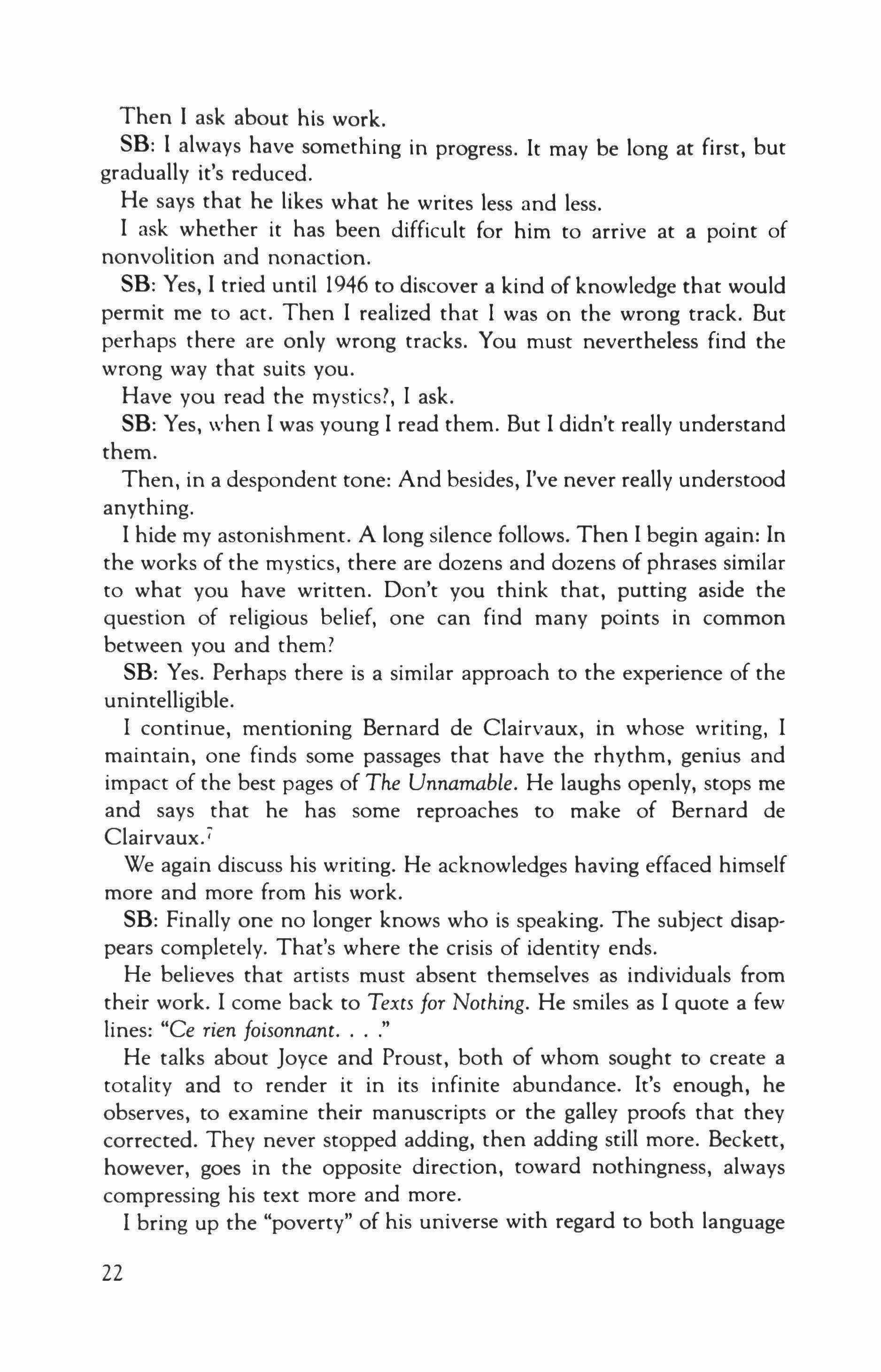
Then I ask about his work.
SB: I always have something in progress. It may be long at first, but gradually it's reduced.
He says that he likes what he writes less and less.
I ask whether it has been difficult for him to arrive at a point of nonvolition and nonaction.
SB: Yes, I tried until 1946 to discover a kind of knowledge that would permit me to act. Then I realized that I was on the wrong track. But perhaps there are only wrong tracks. You must nevertheless find the wrong way that suits you.
Have you read the mystics?, I ask.
SB: Yes, when I was young I read them. But I didn't really understand them.
Then, in a despondent tone: And besides, I've never really understood anything.
I hide my astonishment. A long silence follows. Then I begin again: In the works of the mystics, there are dozens and dozens of phrases similar to what you have written. Don't you think that, putting aside the question of religious belief, one can find many points in common between you and them?
SB: Yes. Perhaps there is a similar approach to the experience of the unintelligible.
I continue, mentioning Bernard de Clairvaux, in whose writing, I maintain, one finds some passages that have the rhythm, genius and impact of the best pages of The Unnamable. He laughs openly, stops me and says that he has some reproaches to make of Bernard de Clairvaux.?
We again discuss his writing. He acknowledges having effaced himself more and more from his work.
SB: Finally one no longer knows who is speaking. The subject disappears completely. That's where the crisis of identity ends.
He believes that artists must absent themselves as individuals from their work. I come back to Texts for Nothing. He smiles as I quote a few lines: "Ce rien foisonnant. ."
He talks about Joyce and Proust, both of whom sought to create a totality and to render it in its infinite abundance. It's enough, he observes, to examine their manuscripts or the galley proofs that they corrected. They never stopped adding, then adding still more. Beckett, however, goes in the opposite direction, toward nothingness, always compressing his text more and more.
I bring up the "poverty" of his universe with regard to both language
22

and technique: a minimum of characters, dramatic events and issues; yet everything important is said with vigor and singularity. He nods his assent with a smile, saying that somewhere the two methods must come together.
I continue talking: Often I've wondered how it is that you were not overwhelmed by feelings of guilt and remorse.
He is about to respond but decides otherwise. As in the preceding meeting, he becomes totally immersed in himself, as if nothing within him were still alive. His incredibly intense expression is fixed and unseeing; his face and body turn to stone.
After a long silence of several minutes, he emerges. Another long silence. But I feel I must continue. I must tell him how amazed I am that his faith in writing and communication has survived. He too is amazed and acknowledges a sense of mystery.
I now turn to the universality of his writing. To the fact that thousands of people the world over have discovered, by reading him, innermost depths of which they were not aware. He nods his head: Yes, that's another mystery.
He continues but some of the words, spoken in a very low voice, escape me.
Then X., a writer-editor, interrupts our meeting, asking Beckett to sign a petition. When X. leaves, after having made his importunate demands, I know that our conversation is over.
A silence of four or five minutes follows, and I wait for him to give me the signal to leave. But instead he asks me questions about myself and my work. And we discuss his plans. He's leaving for Morocco in December to avoid being in Paris during the holidays.
I bring up Ireland. I know that he spent five days there in 1968 because of a death in the family. But he does not intend to return again. I ask what he thinks about the war in Ulster. He replies that he's not interested in it. But after a second, he begins to talk about it with a certain vehemence, quoting [Francois] Mitterrand who said: "Le [atuuisme, c'est la betise"
SB: In Ireland, there are not two fanaticisms but three, four, fiveeach torn apart by the others.
We talk about Spain and he explains why they are trying so hard to keep Franco alive. If he lives until November 25, a member of Franco's party would be able to name the head of the government, which would then continue pro-Franco; but if he dies before then, someone from the other side might be named.
SB: Even Goya did not imagine such things.
23
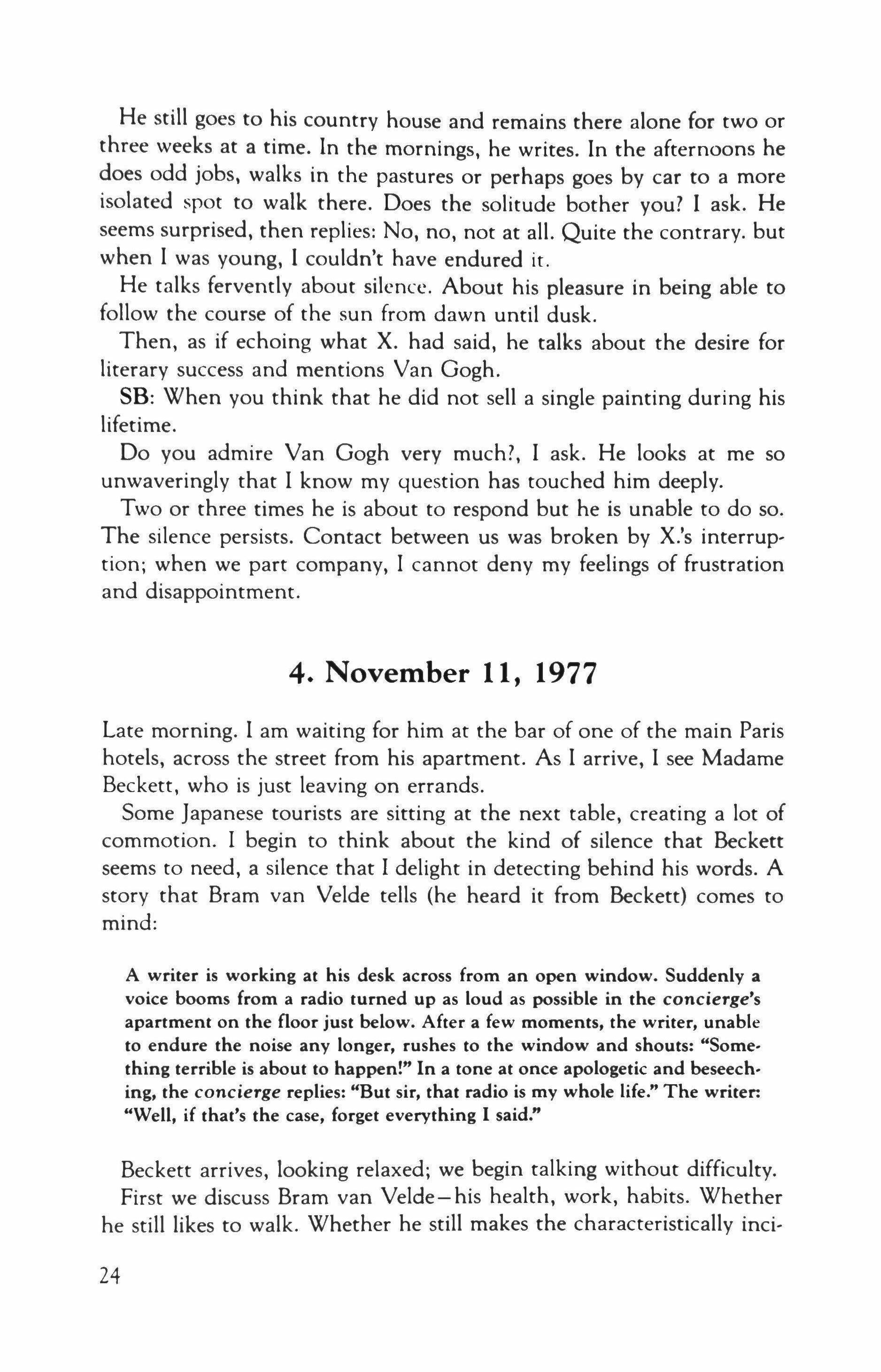
He still goes to his country house and remains there alone for two or three weeks at a time. In the mornings, he writes. In the afternoons he does odd jobs, walks in the pastures or perhaps goes by car to a more isolated spot to walk there. Does the solitude bother you? I ask. He seems surprised, then replies: No, no, not at all. Quite the contrary. but when I was young, I couldn't have endured it.
He talks fervently about silence. About his pleasure in being able to follow the course of the sun from dawn until dusk.
Then, as if echoing what X. had said, he talks about the desire for literary success and mentions Van Gogh.
SB: When you think that he did not sell a single painting during his lifetime.
Do you admire Van Gogh very much?, I ask. He looks at me so unwaveringly that I know my question has touched him deeply.
Two or three times he is about to respond but he is unable to do so. The silence persists. Contact between us was broken by X.'s interruption; when we part company, I cannot deny my feelings of frustration and disappointment.
4. November 11, 1977
Late morning. I am waiting for him at the bar of one of the main Paris hotels, across the street from his apartment. As I arrive, I see Madame Beckett, who is just leaving on errands.
Some Japanese tourists are sitting at the next table, creating a lot of commotion. I begin to think about the kind of silence that Beckett seems to need, a silence that I delight in detecting behind his words. A story that Bram van Velde tells (he heard it from Beckett) comes to mind:
A writer is working at his desk across from an open window. Suddenly a voice booms from a radio turned up as loud as possible in the concierge's apartment on the floor just below. After a few moments, the writer, unable to endure the noise any longer, rushes to the window and shouts: "Something terrible is about to happen!" In a tone at once apologetic and beseeching, the concierge replies: "But sir, that radio is my whole life." The writer: "Well, if that's the case, forget everything I said."
Beckett arrives, looking relaxed; we begin talking without difficulty. First we discuss Bram van Velde- his health, work, habits. Whether he still likes to walk. Whether he still makes the characteristically inci-
24
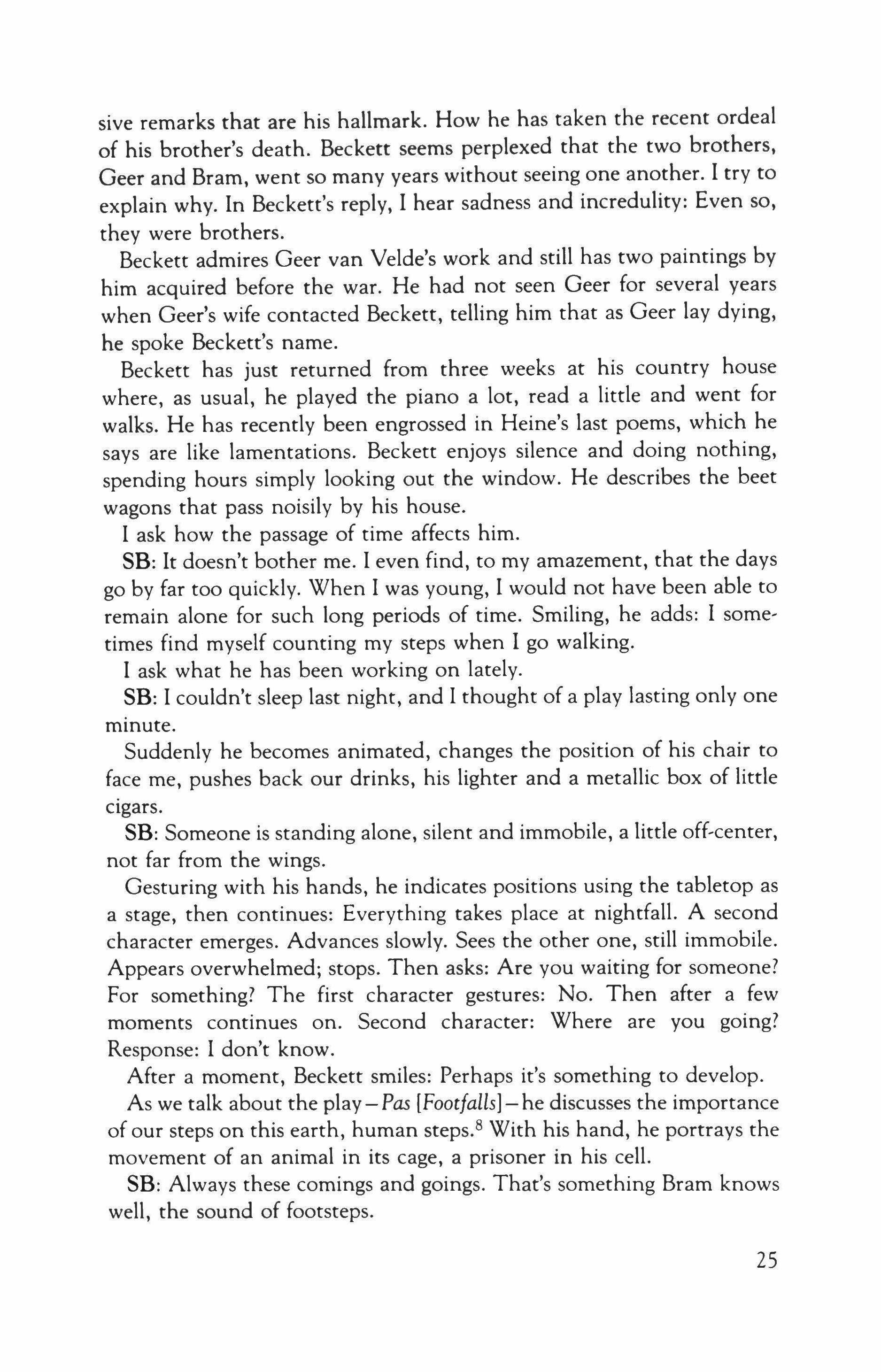
sive remarks that are his hallmark. How he has taken the recent ordeal of his brother's death. Beckett seems perplexed that the two brothers, Geer and Bram, went so many years without seeing one another. I try to explain why. In Beckett's reply, I hear sadness and incredulity: Even so, they were brothers.
Beckett admires Geer van Velde's work and still has two paintings by him acquired before the war. He had not seen Geer for several years when Geer's wife contacted Beckett, telling him that as Geer lay dying, he spoke Beckett's name.
Beckett has just returned from three weeks at his country house where, as usual, he played the piano a lot, read a little and went for walks. He has recently been engrossed in Heine's last poems, which he says are like lamentations. Beckett enjoys silence and doing nothing, spending hours simply looking out the window. He describes the beet wagons that pass noisily by his house.
I ask how the passage of time affects him.
SB: It doesn't bother me. I even find, to my amazement, that the days go by far too quickly. When I was young, I would not have been able to remain alone for such long periods of time. Smiling, he adds: I sometimes find myself counting my steps when 1 go walking.
I ask what he has been working on lately.
SB: I couldn't sleep last night, and I thought of a play lasting only one minute.
Suddenly he becomes animated, changes the position of his chair to face me, pushes back our drinks, his lighter and a metallic box of little cigars.
SB: Someone is standing alone, silent and immobile, a little off-center, not far from the wings.
Gesturing with his hands, he indicates positions using the tabletop as a stage, then continues: Everything takes place at nightfall. A second character emerges. Advances slowly. Sees the other one, still immobile. Appears overwhelmed; stops. Then asks: Are you waiting for someone? For something? The first character gestures: No. Then after a few moments continues on. Second character: Where are you going?
Response: I don't know.
After a moment, Beckett smiles: Perhaps it's something to develop.
As we talk about the play-Pas [Footfalls]-he discusses the importance of our steps on this earth, human steps.f With his hand, he portrays the movement of an animal in its cage, a prisoner in his cell.
SB: Always these comings and goings. That's something Bram knows well, the sound of footsteps.
25
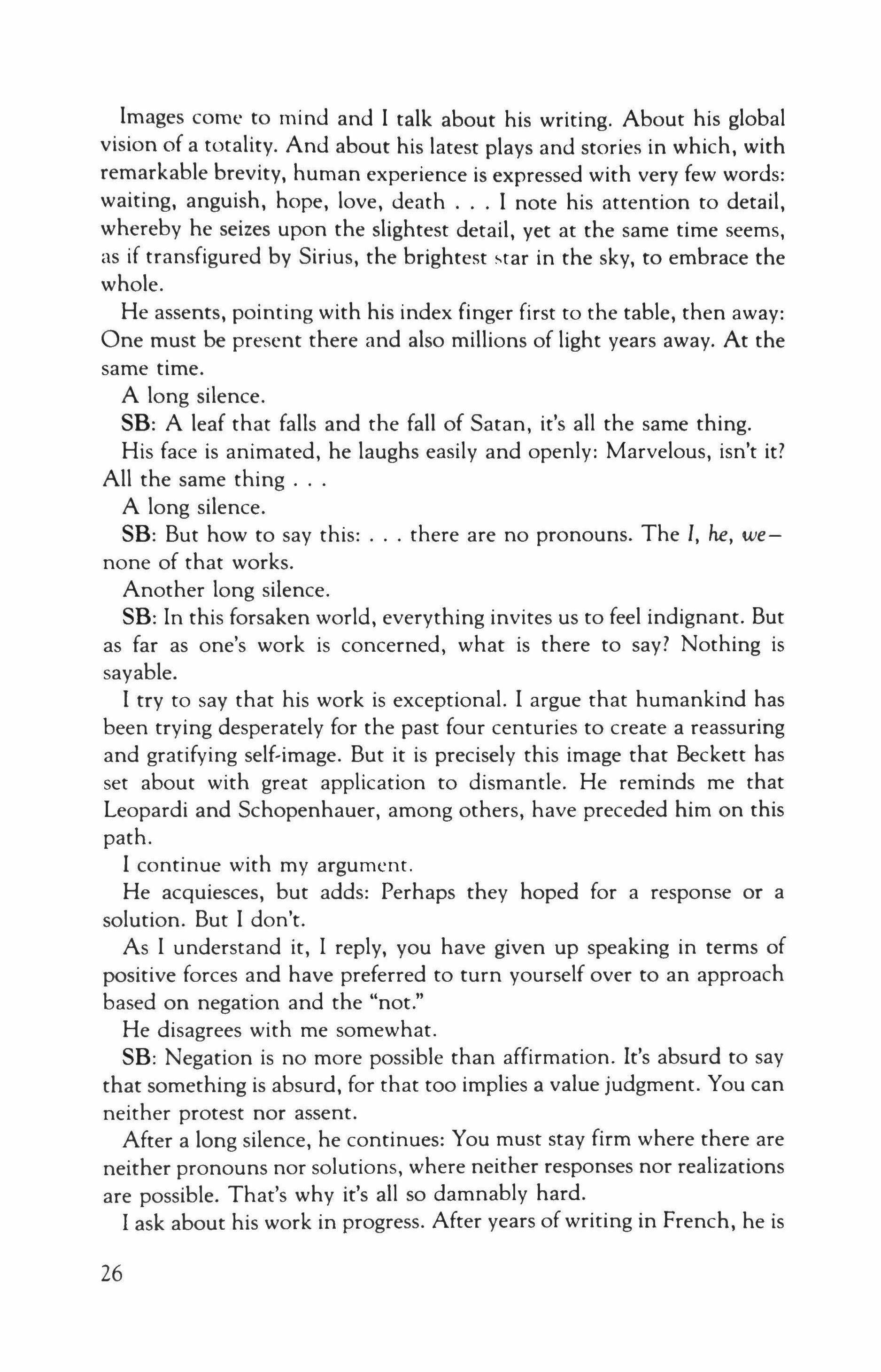
Images come to mind and I talk about his writing. About his global vision of a totality. And about his latest plays and stories in which, with remarkable brevity, human experience is expressed with very few words: waiting, anguish, hope, love, death I note his attention to detail, whereby he seizes upon the slightest detail, yet at the same time seems, as if transfigured by Sirius, the brightest -rar in the sky, to embrace the whole.
He assents, pointing with his index finger first to the table, then away: One must be present there and also millions of light years away. At the same time.
A long silence.
SB: A leaf that falls and the fall of Satan, it's all the same thing. His face is animated, he laughs easily and openly: Marvelous, isn't it? All the same thing
A long silence.
SB: But how to say this: there are no pronouns. The I, he, wenone of that works.
Another long silence.
SB: In this forsaken world, everything invites us to feel indignant. But as far as one's work is concerned, what is there to say? Nothing is sayable.
I try to say that his work is exceptional. I argue that humankind has been trying desperately for the past four centuries to create a reassuring and gratifying self-image. But it is precisely this image that Beckett has set about with great application to dismantle. He reminds me that Leopardi and Schopenhauer, among others, have preceded him on this path.
I continue with my argument.
He acquiesces, but adds: Perhaps they hoped for a response or a solution. But I don't.
As I understand it, I reply, you have given up speaking in terms of positive forces and have preferred to turn yourself over to an approach based on negation and the "not."
He disagrees with me somewhat.
SB: Negation is no more possible than affirmation. It's absurd to say that something is absurd, for that too implies a value judgment. You can neither protest nor assent.
After a long silence, he continues: You must stay firm where there are neither pronouns nor solutions, where neither responses nor realizations are possible. That's why it's all so damnably hard.
I ask about his work in progress. After years of writing in French, he is
26
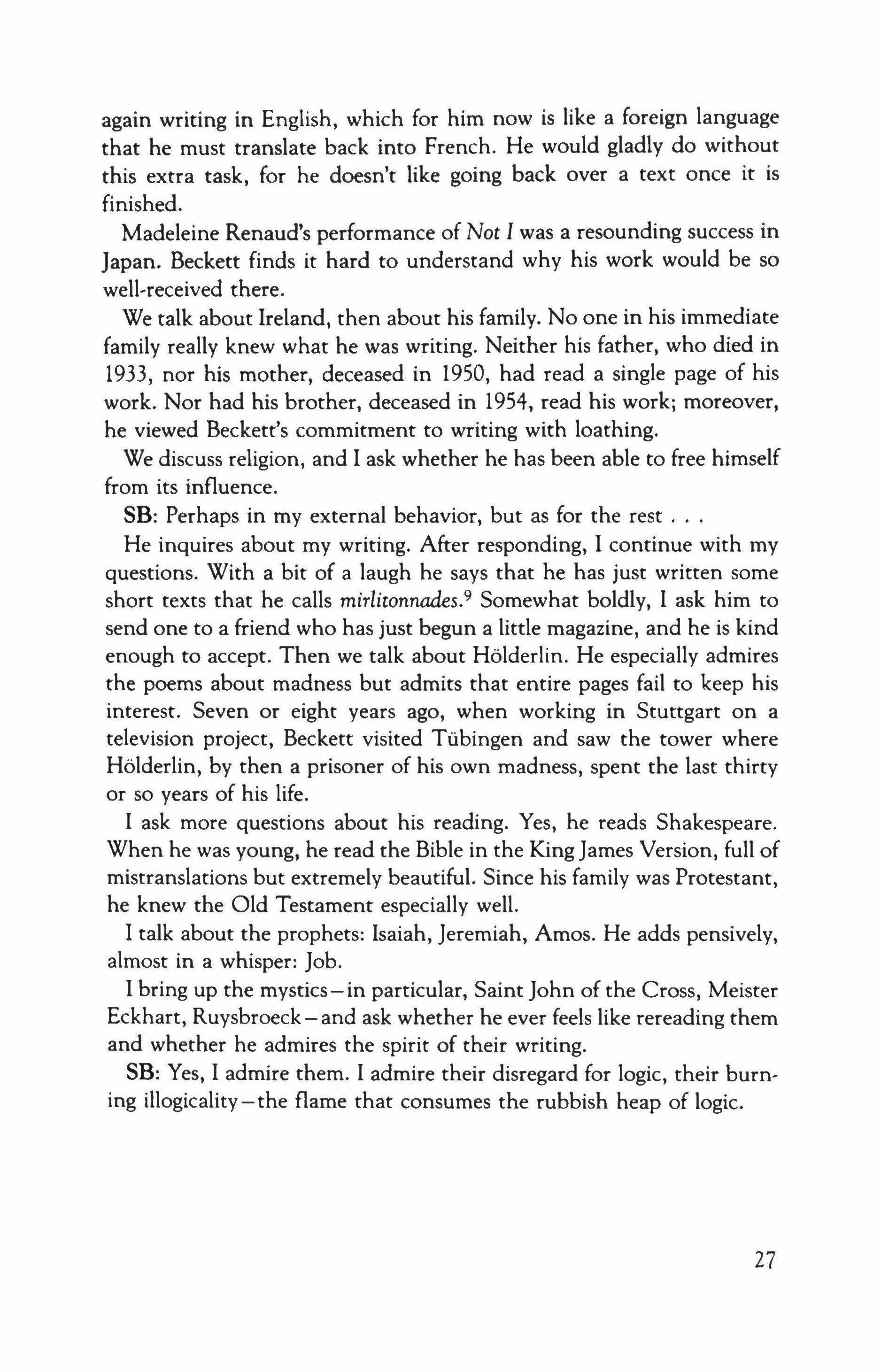
again writing in English, which for him now is like a foreign language that he must translate back into French. He would gladly do without this extra task, for he doesn't like going back over a text once it is finished.
Madeleine Renaud's performance of Not I was a resounding success in Japan. Beckett finds it hard to understand why his work would be so well-received there.
We talk about Ireland, then about his family. No one in his immediate family really knew what he was writing. Neither his father, who died in 1933, nor his mother, deceased in 1950, had read a single page of his work. Nor had his brother, deceased in 1954, read his work; moreover, he viewed Beckett's commitment to writing with loathing.
We discuss religion, and I ask whether he has been able to free himself from its influence.
SB: Perhaps in my external behavior, but as for the rest
He inquires about my writing. After responding, I continue with my questions. With a bit of a laugh he says that he has just written some short texts that he calls mirlitonnades.9 Somewhat boldly, I ask him to send one to a friend who has just begun a little magazine, and he is kind enough to accept. Then we talk about Holderlin. He especially admires the poems about madness but admits that entire pages fail to keep his interest. Seven or eight years ago, when working in Stuttgart on a television project, Beckett visited Tubingen and saw the tower where Holderlin, by then a prisoner of his own madness, spent the last thirty or so years of his life.
I ask more questions about his reading. Yes, he reads Shakespeare. When he was young, he read the Bible in the King James Version, full of mistranslations but extremely beautiful. Since his family was Protestant, he knew the Old Testament especially well.
I talk about the prophets: Isaiah, Jeremiah, Amos. He adds pensively, almost in a whisper: Job.
I bring up the mystics-in particular, Saint John of the Cross, Meister Eckhart, Ruysbroeck - and ask whether he ever feels like rereading them and whether he admires the spirit of their writing.
SS: Yes, I admire them. I admire their disregard for logic, their burning illogicality - the flame that consumes the rubbish heap of logic.
27
Afterword by Suzanne
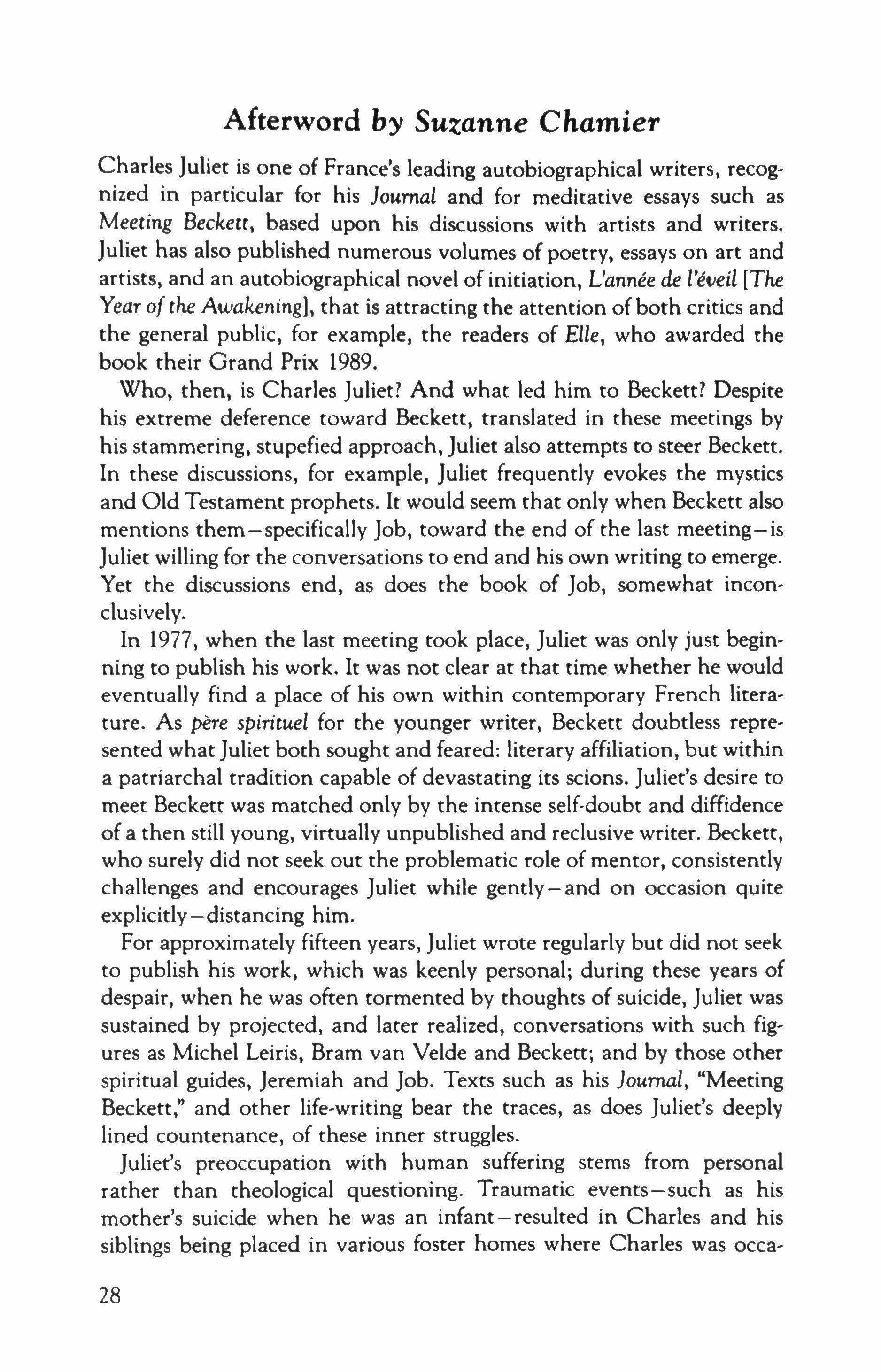 Chamier
Chamier
Charles Juliet is one of France's leading autobiographical writers, recognized in particular for his Journal and for meditative essays such as Meeting Beckett, based upon his discussions with artists and writers. Juliet has also published numerous volumes of poetry, essays on art and artists, and an autobiographical novel of initiation, L'annee de l'et/eil [The Year of the Awakening], that is attracting the attention of both critics and the general public, for example, the readers of Elle, who awarded the book their Grand Prix 1989.
Who, then, is Charles Juliet? And what led him to Beckett? Despite his extreme deference toward Beckett, translated in these meetings by his stammering, stupefied approach, Juliet also attempts to steer Beckett. In these discussions, for example, Juliet frequently evokes the mystics and Old Testament prophets. It would seem that only when Beckett also mentions them-specifically Job, toward the end of the last meeting-is Juliet willing for the conversations to end and his own writing to emerge. Yet the discussions end, as does the book of Job, somewhat inconclusively.
In 1977, when the last meeting took place, Juliet was only just beginning to publish his work. It was not clear at that time whether he would eventually find a place of his own within contemporary French literature. As pere spirituel for the younger writer, Beckett doubtless represented what Juliet both sought and feared: literary affiliation, but within a patriarchal tradition capable of devastating its scions. Juliet's desire to meet Beckett was matched only by the intense self-doubt and diffidence of a then still young, virtually unpublished and reclusive writer. Beckett, who surely did not seek out the problematic role of mentor, consistently challenges and encourages Juliet while gently-and on occasion quite explicitly - distancing him.
For approximately fifteen years, Juliet wrote regularly but did not seek to publish his work, which was keenly personal; during these years of despair, when he was often tormented by thoughts of suicide, Juliet was sustained by projected, and later realized, conversations with such figures as Michel Leiris, Bram van Velde and Beckett; and by those other spiritual guides, Jeremiah and Job. Texts such as his Journal, "Meeting Beckett," and other life-writing bear the traces, as does Juliet's deeply lined countenance, of these inner struggles.
Juliet's preoccupation with human suffering stems from personal rather than theological questioning. Traumatic events-such as his mother's suicide when he was an infant - resulted in Charles and his siblings being placed in various foster homes where Charles was occa-
28
sionally mistreated. Feeling abandoned by his father and somehow re, sponsible for his mother's death, he considered himself an orphan. Com, petitive examinations enabled him to pursue schoolwork at the spartan Military School of Aix-en-Provence where, despite the defeats and reversals described in L'annee de l'eveil, he learned to love literature, box, ing and rugby. During "les annees d'Aix,"Juliet, who received little mail of his own, bartered his desserts for correspondence: two figs for any letter, four for correspondence from someone's mother. Unjustly punished during his second year at the school, Juliet spent two weeks in solitary confinement, nurtured by a quotation from Jeremiah and an inner strength that he learned to recognize only years later (see L'Annee de l'eveil). Juliet's personal commitment to writing, together with his desire to reflect upon events such as these, may have drawn him to reading, then wanting to meet, Samuel Beckett. It is from this vantage point that Juliet doubtless imagined Beckett in 1968, when the meetings began: with the phantasms of sheer hero-worship and the gawking admiration of the supplicant who, years later, decides to share the story, "the starnmering start of an aventure" ("le balbutiant debut d'une aventure").lO
For Charles Juliet, the story has continued in various forms, from his Journal, whose fourth volume is forthcoming, to radio plays for France' Culture (a national radio network), theatrical pieces (including the stag, ing of his conversations with Bram van Velde) and documentary films. His work is being translated into Italian, Spanish, Chinese, German, Dutch and English. For example, Louis Olivier's English translation of short selections from the Journal appears in Chariton Review 15.1 (Spring 1989), pp. 76-87.
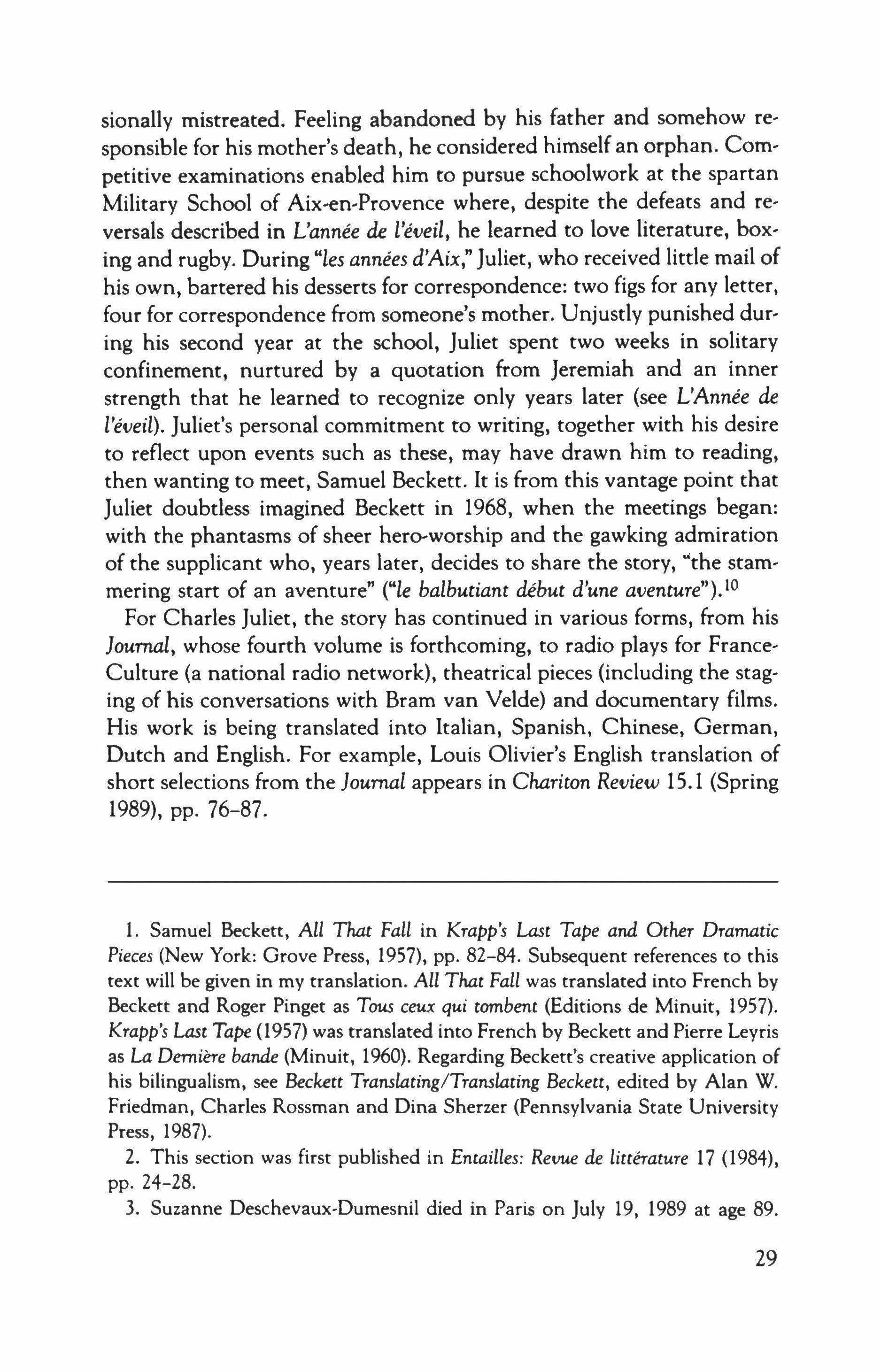
1. Samuel Beckett, All That Fall in Krapp's Last Tape and Other Dramatic Pieces (New York: Grove Press, 1957), pp. 82-84. Subsequent references to this text will be given in my translation. All That Fall was translated into French by Beckett and Roger Pinget as Taus ceux qui tombent (Editions de Minuit, 1957). Krapp's Last Tape (1957) was translated into French by Beckett and Pierre Leyris as La Demiete bande (Minuit, 1960). Regarding Beckett's creative application of his bilingualism, see Beckett Translating/Translating Beckett, edited by Alan W. Friedman, Charles Rossman and Dina Sherzer (Pennsylvania State University Press, 1987).
2. This section was first published in Entailles: Revue de litterature 17 (1984), pp. 24-28.
3. Suzanne Deschevaux-Dumesnil died in Paris on July 19, 1989 at age 89.
29
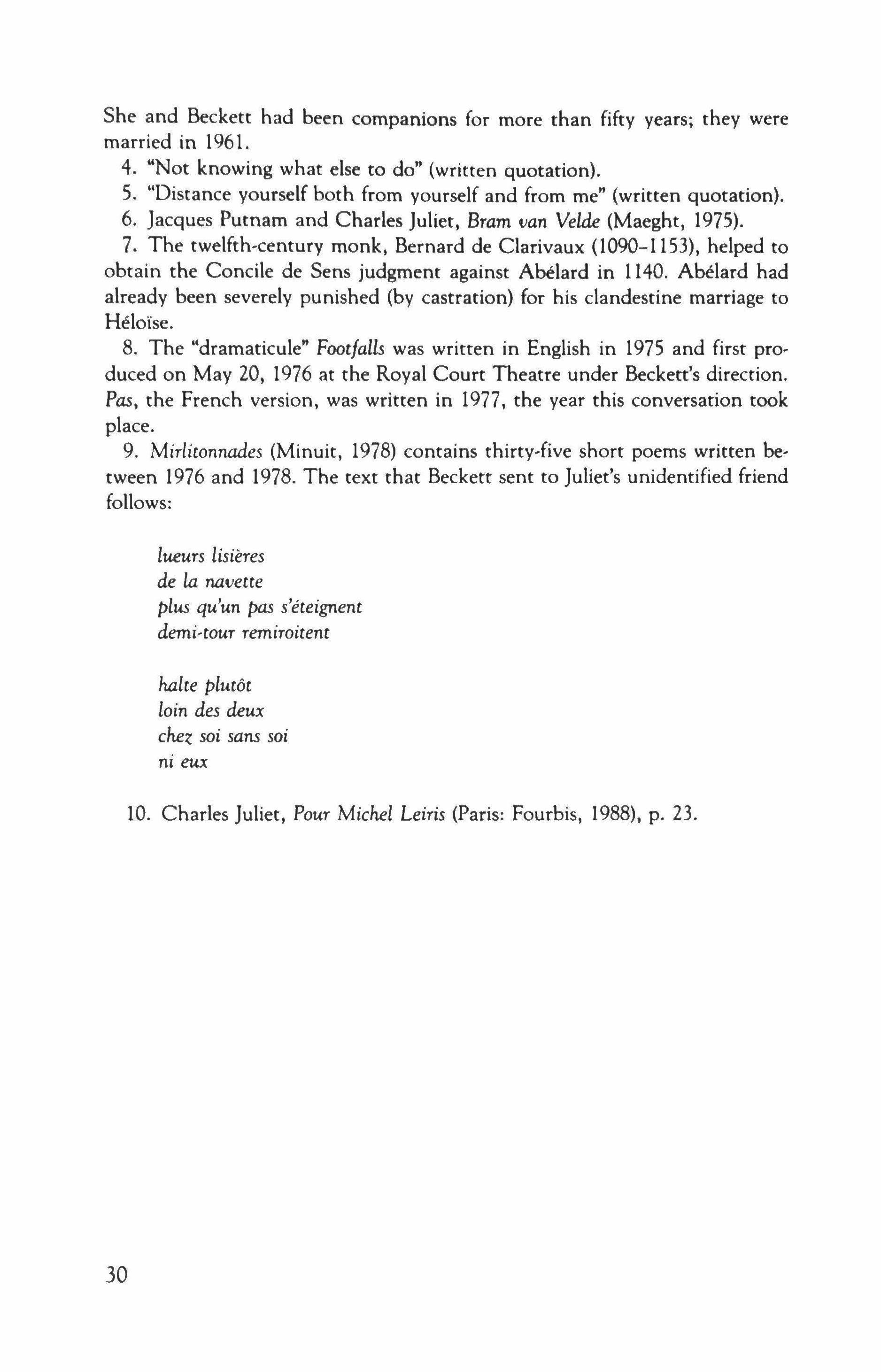
She and Beckett had been companions for more than fifty years; they were married in 1961.
4. "Not knowing what else to do" (written quotation).
5. "Distance yourself both from yourself and from me" (written quotation).
6. Jacques Putnam and Charles Juliet, Bmm tlan Velde (Maeght, 1975).
7. The twelfth-century monk, Bernard de Clarivaux (l090-1153), helped to obtain the Condie de Sens judgment against Abelard in 1140. Abelard had already been severely punished (by castration) for his clandestine marriage to Heloise.
8. The "dramaticule" Footfalls was written in English in 1975 and first produced on May 20, 1976 at the Royal Court Theatre under Beckett's direction. Pas, the French version, was written in 1977, the year this conversation took place.
9. Mirlitonnades (Minuit, 1978) contains thirty-five short poems written between 1976 and 1978. The text that Beckett sent to Juliet's unidentified friend follows:
lueurs lisieres de la natlette plus qu'un pas s'eteignent demi-tour remiroirent
halte plut6t loin des deux chez soi sans soi ni eux
10. Charles Juliet, POUT Michel Leins (Paris: Fourbis, 1988), p. 23.
30
Ghost Nets
Karen Heuler

Rachel rowed sometimes, and then her father rowed. He was a square man, taut-skinned and solid. He had a gray mustache and short gray hair, which he brushed with his hand when he was tired, instead of rubbing his eyes. His eyes were brown.
Rachel always called him Papa. It was a name that caused him to pause, split-second, when she said it. He would have felt more comfortable with his own name, Wendell Dupeen; or Wen. as his friends called him. He had no objection to having a daughter, he rather enjoyed it, in his own taciturn. slow-turning way; but he had never gotten used to Papa.
Rachel was fifteen. She still went out with him, fishing late at night for pleasure, or early morning for work. In a year or two, he supposed, this would stop.
She wore her hair braided in two plaits down her back, shrugging them over her shoulder when they wandered forward, even tying them in a knot when they threatened to get in the way. He approved of her: long-legged, skinny, sunburnt nose, loose shop-print dresses she'd outgrown, shapeless things, really, but on Rachel you saw they were a covering, not an advertisement.
Rachel was quiet when she was around her father. After all, he was a silent man. She had learned to read his eyes and the lines around his cheeks to know what he was thinking, and those lines, on a brilliant moonlit night out in the channel, with the slap of the water and the slap of the oars, were conversation enough. Rachel could handle silence; she wasn't yet made uneasy by it.
Nighttime fishing was the best, because it didn't matter if you caught anything. No need to check the charts, the calendar or the logbook
31
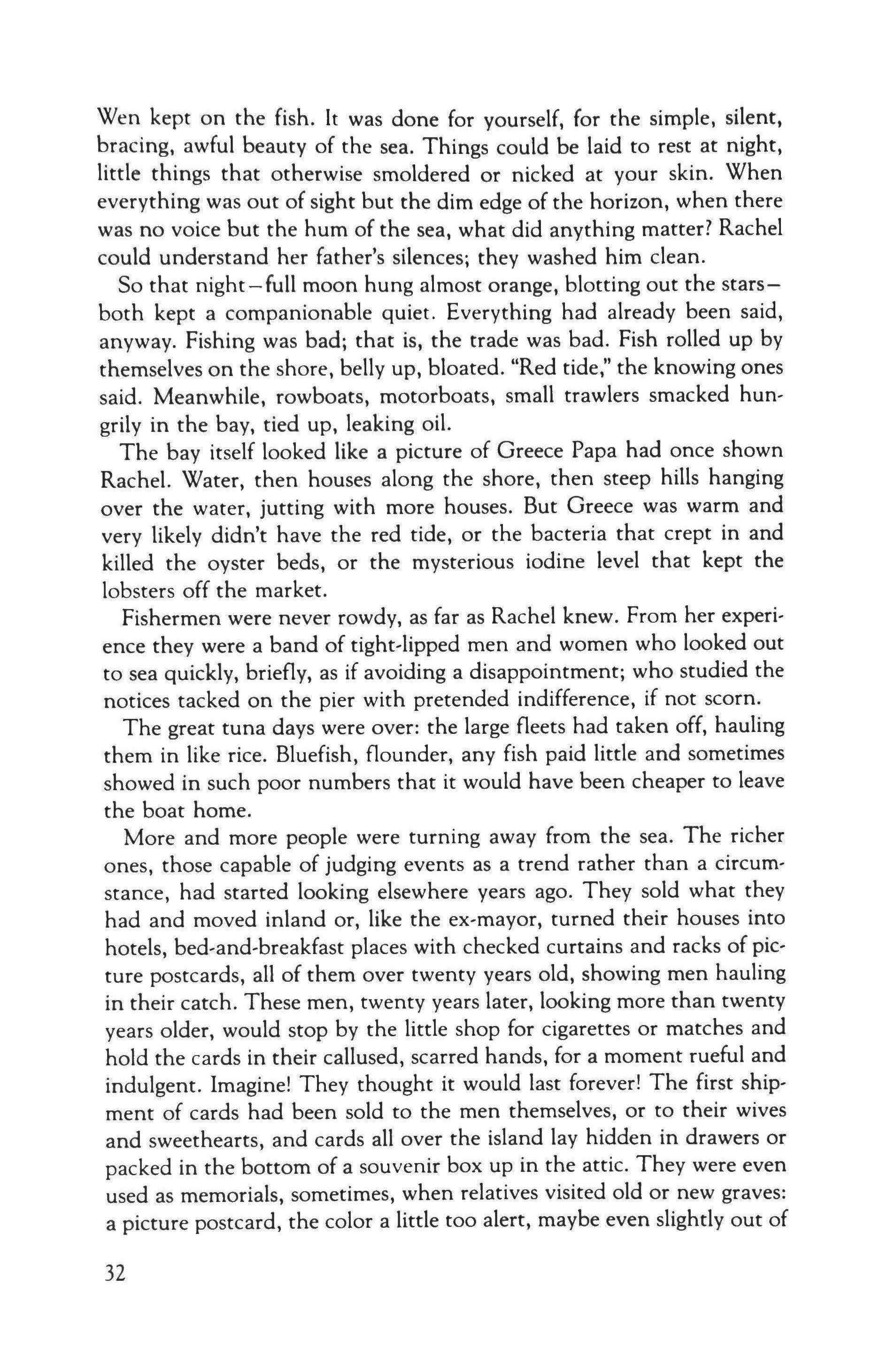
Wen kept on the fish. It was done for yourself, for the simple, silent, bracing, awful beauty of the sea. Things could be laid to rest at night, little things that otherwise smoldered or nicked at your skin. When everything was out of sight but the dim edge of the horizon, when there was no voice but the hum of the sea, what did anything matter? Rachel could understand her father's silences; they washed him clean.
So that night-full moon hung almost orange, blotting out the starsboth kept a companionable quiet. Everything had already been said, anyway. Fishing was bad; that is, the trade was bad. Fish rolled up by themselves on the shore, belly up, bloated. "Red tide," the knowing ones said. Meanwhile, rowboats, motorboats, small trawlers smacked hungrily in the bay, tied up, leaking oil.
The bay itself looked like a picture of Greece Papa had once shown Rachel. Water, then houses along the shore, then steep hills hanging over the water, jutting with more houses. But Greece was warm and very likely didn't have the red tide, or the bacteria that crept in and killed the oyster beds, or the mysterious iodine level that kept the lobsters off the market.
Fishermen were never rowdy, as far as Rachel knew. From her experience they were a band of tight-lipped men and women who looked out to sea quickly, briefly, as if avoiding a disappointment; who studied the notices tacked on the pier with pretended indifference, if not scorn.
The great tuna days were over: the large fleets had taken off, hauling them in like rice. Bluefish, flounder, any fish paid little and sometimes showed in such poor numbers that it would have been cheaper to leave the boat home.
More and more people were turning away from the sea. The richer ones, those capable of judging events as a trend rather than a circumstance, had started looking elsewhere years ago. They sold what they had and moved inland or, like the ex-mayor, turned their houses into hotels, bed-and-breakfast places with checked curtains and racks of picture postcards, all of them over twenty years old, showing men hauling in their catch. These men, twenty years later, looking more than twenty years older, would stop by the little shop for cigarettes or matches and hold the cards in their callused, scarred hands, for a moment rueful and indulgent. Imagine! They thought it would last forever! The first shipment of cards had been sold to the men themselves, or to their wives and sweethearts, and cards all over the island lay hidden in drawers or packed in the bottom of a souvenir box up in the attic. They were even used as memorials, sometimes, when relatives visited old or new graves: a picture postcard, the color a little too alert, maybe even slightly out of
32
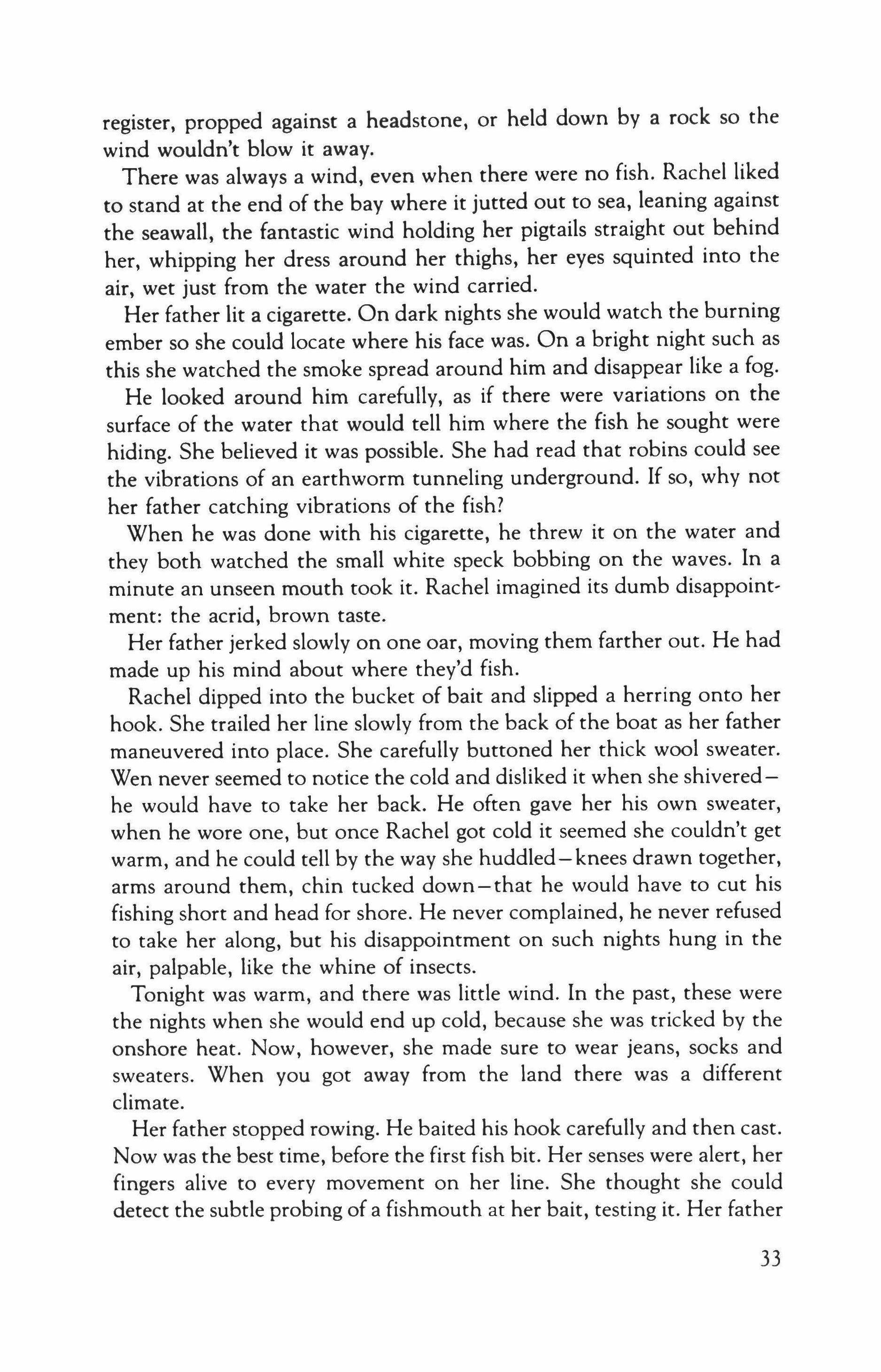
register, propped against a headstone, or held down by a rock so the wind wouldn't blow it away.
There was always a wind, even when there were no fish. Rachel liked to stand at the end of the bay where it jutted out to sea, leaning against the seawall, the fantastic wind holding her pigtails straight out behind her, whipping her dress around her thighs, her eyes squinted into the air, wet just from the water the wind carried.
Her father lit a cigarette. On dark nights she would watch the burning ember so she could locate where his face was. On a bright night such as this she watched the smoke spread around him and disappear like a fog.
He looked around him carefully, as if there were variations on the surface of the water that would tell him where the fish he sought were hiding. She believed it was possible. She had read that robins could see the vibrations of an earthworm tunneling underground. If so, why not her father catching vibrations of the fish?
When he was done with his cigarette, he threw it on the water and they both watched the small white speck bobbing on the waves. In a minute an unseen mouth took it. Rachel imagined its dumb disappointment: the acrid, brown taste.
Her father jerked slowly on one oar, moving them farther out. He had made up his mind about where they'd fish.
Rachel dipped into the bucket of bait and slipped a herring onto her hook. She trailed her line slowly from the back of the boat as her father maneuvered into place. She carefully buttoned her thick wool sweater. Wen never seemed to notice the cold and disliked it when she shiveredhe would have to take her back. He often gave her his own sweater, when he wore one, but once Rachel got cold it seemed she couldn't get warm, and he could tell by the way she huddled-knees drawn together, arms around them, chin tucked down-that he would have to cut his fishing short and head for shore. He never complained, he never refused to take her along, but his disappointment on such nights hung in the air, palpable, like the whine of insects.
Tonight was warm, and there was little wind. In the past, these were the nights when she would end up cold, because she was tricked by the onshore heat. Now, however, she made sure to wear jeans, socks and sweaters. When you got away from the land there was a different climate.
Her father stopped rowing. He baited his hook carefully and then cast. Now was the best time, before the first fish bit. Her senses were alert, her fingers alive to every movement on her line. She thought she could detect the subtle probing of a fishrnouth at her bait, testing it. Her father
33
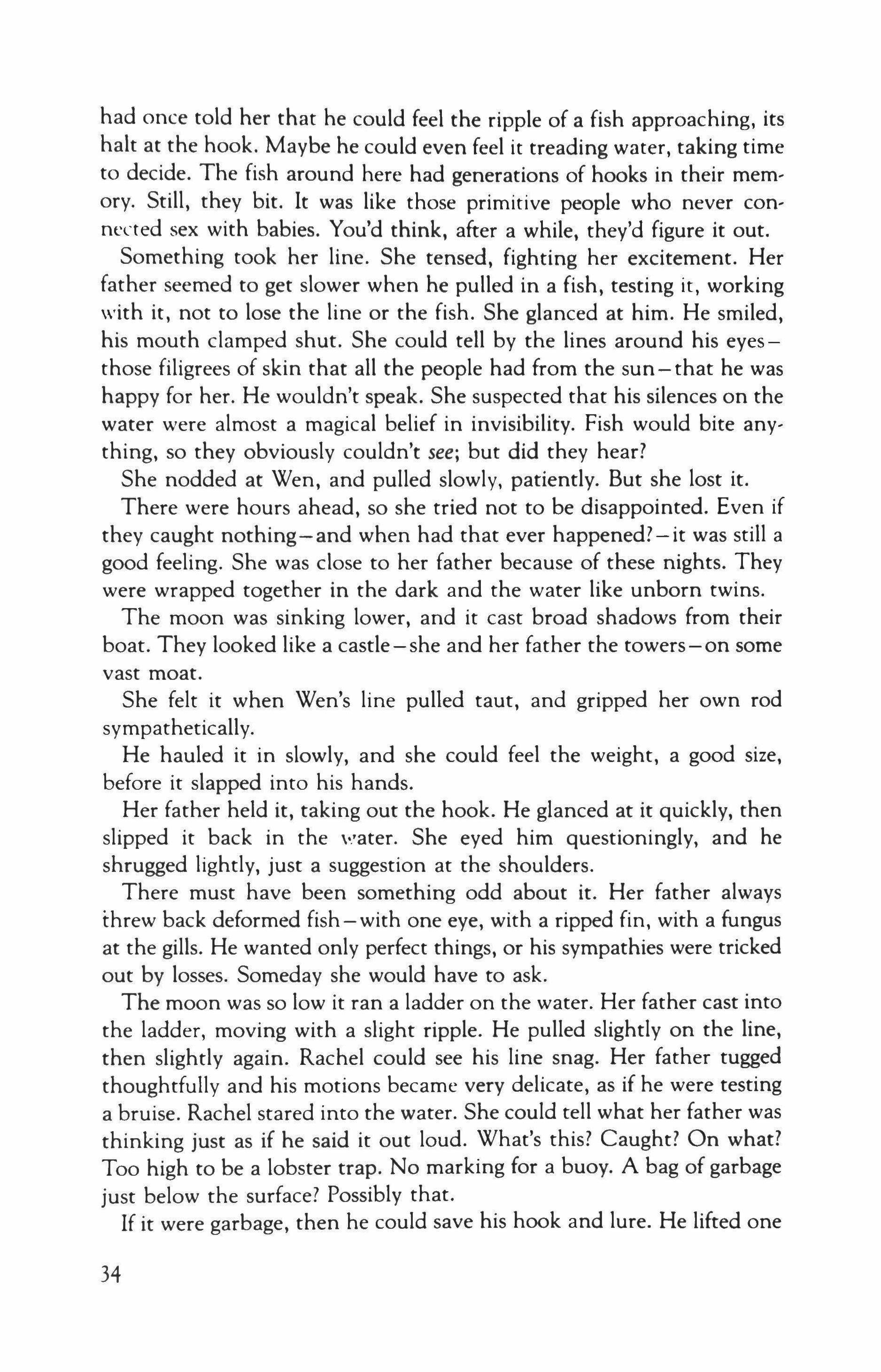
had once told her that he could feel the ripple of a fish approaching, its halt at the hook. Maybe he could even feel it treading water, taking time to decide. The fish around here had generations of hooks in their memory. Still, they bit. It was like those primitive people who never connecred sex with babies. You'd think, after a while, they'd figure it out.
Something took her line. She tensed, fighting her excitement. Her father seemed to get slower when he pulled in a fish, testing it, working with it, not to lose the line or the fish. She glanced at him. He smiled, his mouth clamped shut. She could tell by the lines around his eyesthose filigrees of skin that all the people had from the sun - that he was happy for her. He wouldn't speak. She suspected that his silences on the water were almost a magical belief in invisibility. Fish would bite anything, so they obviously couldn't see; but did they hear?
She nodded at Wen, and pulled slowly, patiently. But she lost it.
There were hours ahead, so she tried not to be disappointed. Even if they caught nothing-and when had that ever happened?-it was still a good feeling. She was close to her father because of these nights. They were wrapped together in the dark and the water like unborn twins.
The moon was sinking lower, and it cast broad shadows from their boat. They looked like a castle - she and her father the towers - on some vast moat.
She felt it when Wen's line pulled taut, and gripped her own rod sympathetically.
He hauled it in slowly, and she could feel the weight, a good size, before it slapped into his hands.
Her father held it, taking out the hook. He glanced at it quickly, then slipped it back in the water. She eyed him questioningly, and he shrugged lightly, just a suggestion at the shoulders.
There must have been something odd about it. Her father always threw back deformed fish-with one eye, with a ripped fin, with a fungus at the gills. He wanted only perfect things, or his sympathies were tricked out by losses. Someday she would have to ask.
The moon was so low it ran a ladder on the water. Her father cast into the ladder, moving with a slight ripple. He pulled slightly on the line, then slightly again. Rachel could see his line snag. Her father tugged thoughtfully and his motions became very delicate, as if he were testing a bruise. Rachel stared into the water. She could tell what her father was thinking just as if he said it out loud. What's this? Caught? On what? Too high to be a lobster trap. No marking for a buoy. A bag of garbage just below the surface? Possibly that.
If it were garbage, then he could save his hook and lure. He lifted one
34
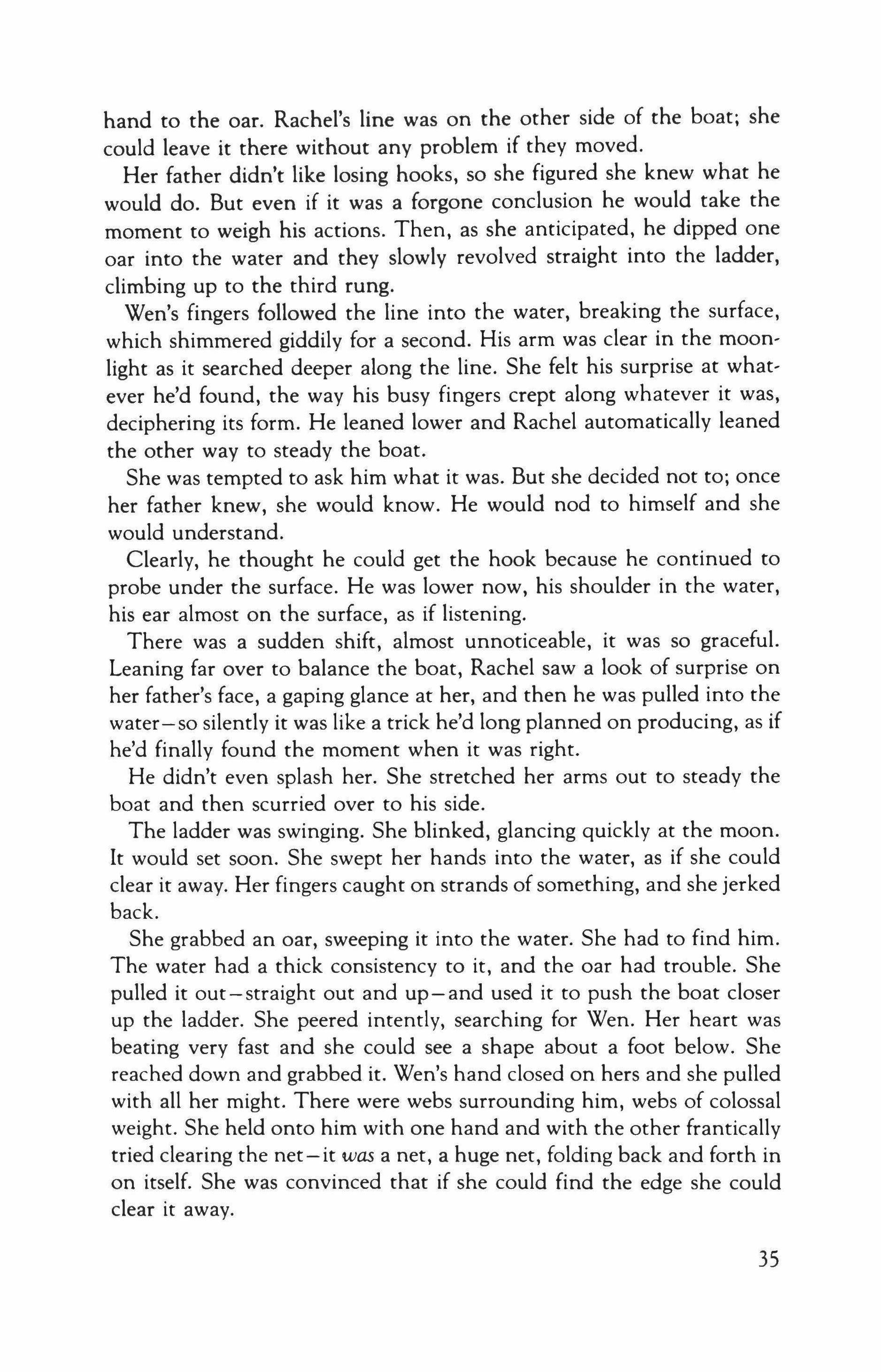
hand to the oar. Rachel's line was on the other side of the boat; she could leave it there without any problem if they moved.
Her father didn't like losing hooks, so she figured she knew what he would do. But even if it was a forgone conclusion he would take the moment to weigh his actions. Then, as she anticipated, he dipped one oar into the water and they slowly revolved straight into the ladder, climbing up to the third rung.
Wen's fingers followed the line into the water, breaking the surface, which shimmered giddily for a second. His arm was clear in the moonlight as it searched deeper along the line. She felt his surprise at whatever he'd found, the way his busy fingers crept along whatever it was, deciphering its form. He leaned lower and Rachel automatically leaned the other way to steady the boat.
She was tempted to ask him what it was. But she decided not to; once her father knew, she would know. He would nod to himself and she would understand.
Clearly, he thought he could get the hook because he continued to probe under the surface. He was lower now, his shoulder in the water, his ear almost on the surface, as if listening.
There was a sudden shift, almost unnoticeable, it was so graceful. Leaning far over to balance the boat, Rachel saw a look of surprise on her father's face, a gaping glance at her, and then he was pulled into the water-so silently it was like a trick he'd long planned on producing, as if he'd finally found the moment when it was right.
He didn't even splash her. She stretched her arms out to steady the boat and then scurried over to his side.
The ladder was swinging. She blinked, glancing quickly at the moon. It would set soon. She swept her hands into the water, as if she could clear it away. Her fingers caught on strands of something, and she jerked back.
She grabbed an oar, sweeping it into the water. She had to find him. The water had a thick consistency to it, and the oar had trouble. She pulled it out-straight out and up-and used it to push the boat closer up the ladder. She peered intently, searching for Wen. Her heart was beating very fast and she could see a shape about a foot below. She reached down and grabbed it. Wen's hand closed on hers and she pulled with all her might. There were webs surrounding him, webs of colossal weight. She held onto him with one hand and with the other frantically tried clearing the net - it was a net, a huge net, folding back and forth in on itself. She was convinced that if she could find the edge she could clear it away.
35
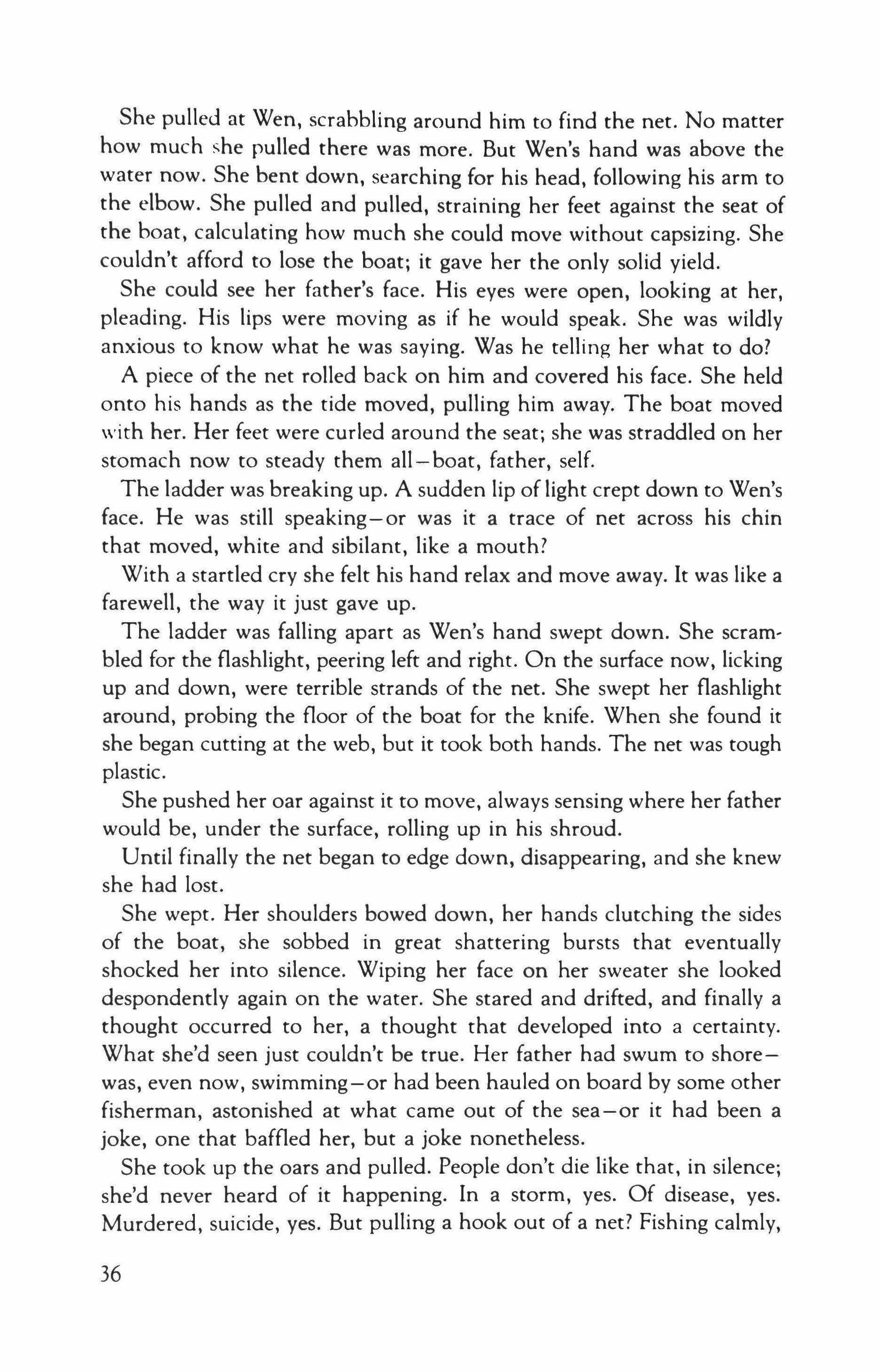
She pulled at Wen, scrabbling around him to find the net. No matter how much she pulled there was more. But Wen's hand was above the water now. She bent down, searching for his head, following his arm to the elbow. She pulled and pulled, straining her feet against the seat of the boat, calculating how much she could move without capsizing. She couldn't afford to lose the boat; it gave her the only solid yield.
She could see her father's face. His eyes were open, looking at her, pleading. His lips were moving as if he would speak. She was wildly anxious to know what he was saying. Was he telling her what to do?
A piece of the net rolled back on him and covered his face. She held onto his hands as the tide moved, pulling him away. The boat moved with her. Her feet were curled around the seat; she was straddled on her stomach now to steady them all-boat, father, self.
The ladder was breaking up. A sudden lip of light crept down to Wen's face. He was still speaking-or was it a trace of net across his chin that moved, white and sibilant, like a mouth?
With a startled cry she felt his hand relax and move away. It was like a farewell, the way it just gave up.
The ladder was falling apart as Wen's hand swept down. She scrambled for the flashlight, peering left and right. On the surface now, licking up and down, were terrible strands of the net. She swept her flashlight around, probing the floor of the boat for the knife. When she found it she began cutting at the web, but it took both hands. The net was tough plastic.
She pushed her oar against it to move, always sensing where her father would be, under the surface, rolling up in his shroud.
Until finally the net began to edge down, disappearing, and she knew she had lost.
She wept. Her shoulders bowed down, her hands clutching the sides of the boat, she sobbed in great shattering bursts that eventually shocked her into silence. Wiping her face on her sweater she looked despondently again on the water. She stared and drifted, and finally a thought occurred to her, a thought that developed into a certainty. What she'd seen just couldn't be true. Her father had swum to shorewas, even now, swimming-or had been hauled on board by some other fisherman, astonished at what came out of the sea-or it had been a joke, one that baffled her, but a joke nonetheless.
She took up the oars and pulled. People don't die like that, in silence; she'd never heard of it happening. In a storm, yes. Of disease, yes. Murdered, suicide, yes. But pulling a hook out of a net? Fishing calmly,
36
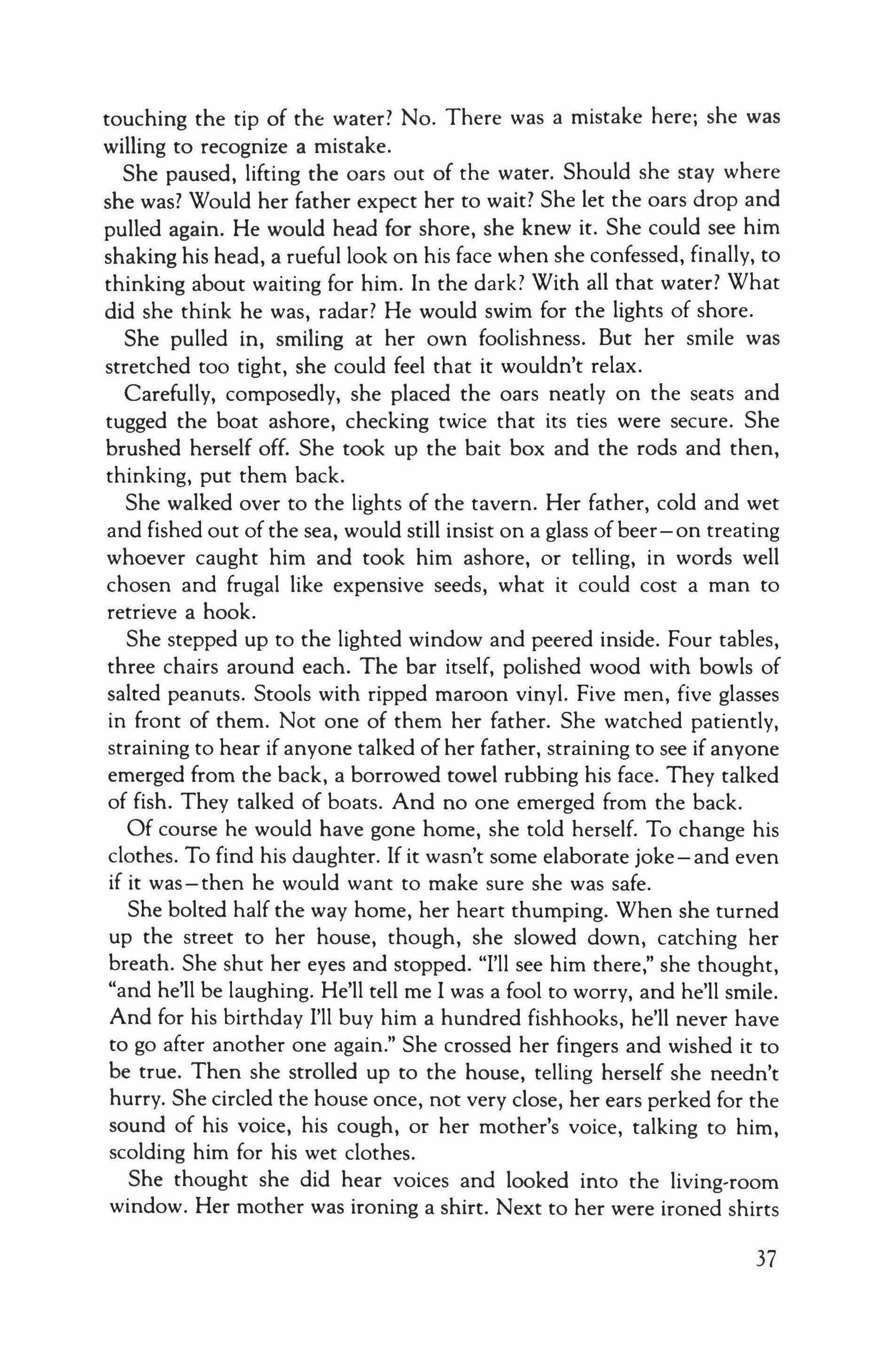
touching the tip of the water? No. There was a mistake here; she was willing to recognize a mistake.
She paused, lifting the oars out of the water. Should she stay where she was? Would her father expect her to wait? She let the oars drop and pulled again. He would head for shore, she knew it. She could see him shaking his head, a rueful look on his face when she confessed, finally, to thinking about waiting for him. In the dark? With all that water? What did she think he was, radar? He would swim for the lights of shore.
She pulled in, smiling at her own foolishness. But her smile was stretched too tight, she could feel that it wouldn't relax.
Carefully, composedly, she placed the oars neatly on the seats and tugged the boat ashore, checking twice that its ties were secure. She brushed herself off. She took up the bait box and the rods and then, thinking, put them back.
She walked over to the lights of the tavern. Her father, cold and wet and fished out of the sea, would still insist on a glass of beer-on treating whoever caught him and took him ashore, or telling, in words well chosen and frugal like expensive seeds, what it could cost a man to retrieve a hook.
She stepped up to the lighted window and peered inside. Four tables, three chairs around each. The bar itself, polished wood with bowls of salted peanuts. Stools with ripped maroon vinyl. Five men, five glasses in front of them. Not one of them her father. She watched patiently, straining to hear if anyone talked of her father, straining to see if anyone emerged from the back, a borrowed towel rubbing his face. They talked of fish. They talked of boats. And no one emerged from the back.
Of course he would have gone home, she told herself. To change his clothes. To find his daughter. If it wasn't some elaborate joke-and even if it was-then he would want to make sure she was safe.
She bolted half the way home, her heart thumping. When she turned up the street to her house, though, she slowed down, catching her breath. She shut her eyes and stopped. "I'll see him there," she thought, "and he'll be laughing. He'll tell me I was a fool to worry, and he'll smile. And for his birthday I'll buy him a hundred fishhooks, he'll never have to go after another one again." She crossed her fingers and wished it to be true. Then she strolled up to the house, telling herself she needn't hurry. She circled the house once, not very close, her ears perked for the sound of his voice, his cough, or her mother's voice, talking to him, scolding him for his wet clothes.
She thought she did hear voices and looked into the living-room window. Her mother was ironing a shirt. Next to her were ironed shirts
37
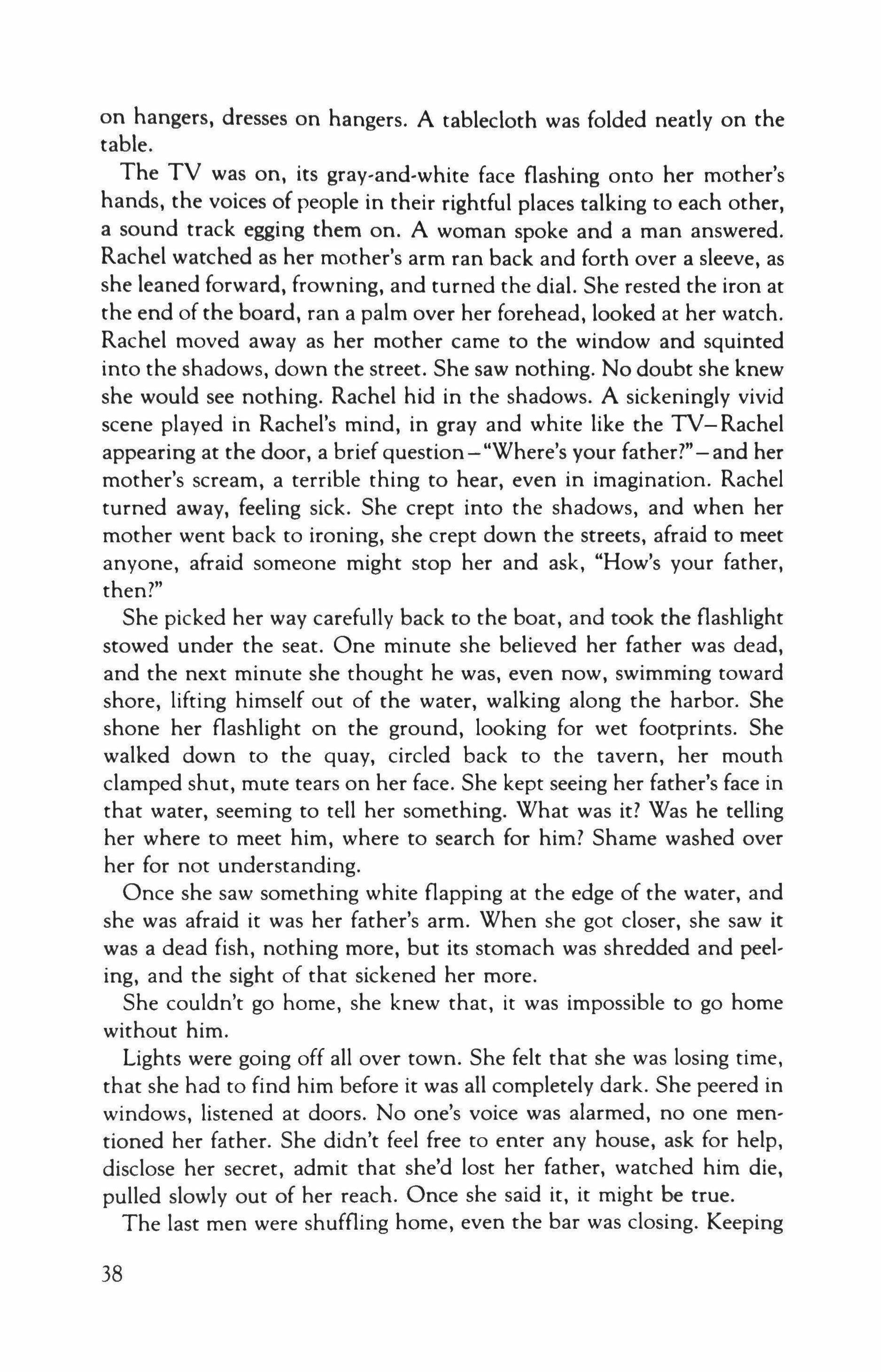
on hangers, dresses on hangers. A tablecloth was folded neatly on the table.
The TV was on, its gray-and-white face flashing onto her mother's hands, the voices of people in their rightful places talking to each other, a sound track egging them on. A woman spoke and a man answered. Rachel watched as her mother's arm ran back and forth over a sleeve, as she leaned forward, frowning, and turned the dial. She rested the iron at the end of the board, ran a palm over her forehead, looked at her watch. Rachel moved away as her mother came to the window and squinted into the shadows, down the street. She saw nothing. No doubt she knew she would see nothing. Rachel hid in the shadows. A sickeningly vivid scene played in Rachel's mind, in gray and white like the TV-Rachel appearing at the door, a brief question - "Where's your father?" - and her mother's scream, a terrible thing to hear, even in imagination. Rachel turned away, feeling sick. She crept into the shadows, and when her mother went back to ironing, she crept down the streets, afraid to meet anyone, afraid someone might stop her and ask, "How's your father, then?"
She picked her way carefully back to the boat, and took the flashlight stowed under the seat. One minute she believed her father was dead, and the next minute she thought he was, even now, swimming toward shore, lifting himself out of the water, walking along the harbor. She shone her flashlight on the ground, looking for wet footprints. She walked down to the quay, circled back to the tavern, her mouth clamped shut, mute tears on her face. She kept seeing her father's face in that water, seeming to tell her something. What was it? Was he telling her where to meet him, where to search for him? Shame washed over her for not understanding.
Once she saw something white flapping at the edge of the water, and she was afraid it was her father's arm. When she got closer, she saw it was a dead fish, nothing more, but its stomach was shredded and peeling, and the sight of that sickened her more.
She couldn't go home, she knew that, it was impossible to go home without him.
Lights were going off all over town. She felt that she was losing time, that she had to find him before it was all completely dark. She peered in windows, listened at doors. No one's voice was alarmed, no one mentioned her father. She didn't feel free to enter any house, ask for help, disclose her secret, admit that she'd lost her father, watched him die, pulled slowly out of her reach. Once she said it, it might be true.
The last men were shuffling home, even the bar was closing. Keeping
38
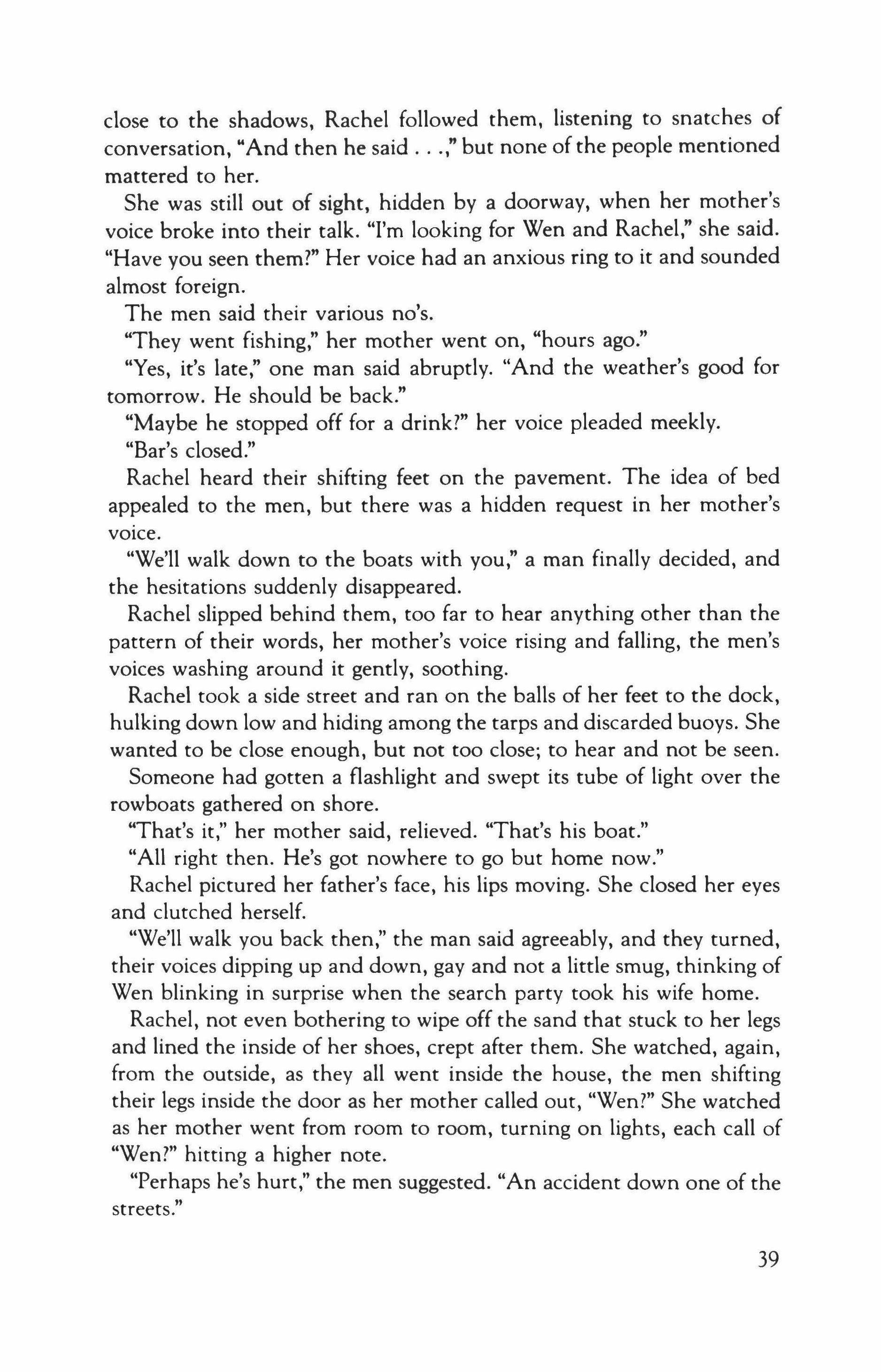
close to the shadows, Rachel followed them, listening to snatches of conversation, "And then he said ," but none of the people mentioned mattered to her.
She was still out of sight, hidden by a doorway, when her mother's voice broke into their talk. "I'm looking for Wen and Rachel," she said. "Have you seen them?" Her voice had an anxious ring to it and sounded almost foreign.
The men said their various no's.
"They went fishing," her mother went on, "hours ago."
"Yes, it's late," one man said abruptly. "And the weather's good for tomorrow. He should be back."
"Maybe he stopped off for a drink?" her voice pleaded meekly.
"Bar's closed."
Rachel heard their shifting feet on the pavement. The idea of bed appealed to the men, but there was a hidden request in her mother's voice.
"We'll walk down to the boats with you," a man finally decided, and the hesitations suddenly disappeared.
Rachel slipped behind them, too far to hear anything other than the pattern of their words, her mother's voice rising and falling, the men's voices washing around it gently, soothing.
Rachel took a side street and ran on the balls of her feet to the dock, hulking down low and hiding among the tarps and discarded buoys. She wanted to be close enough, but not too close; to hear and not be seen.
Someone had gotten a flashlight and swept its tube of light over the rowboats gathered on shore.
"That's it," her mother said, relieved. "That's his boat."
"All right then. He's got nowhere to go but home now."
Rachel pictured her father's face, his lips moving. She closed her eyes and clutched herself.
"We'll walk you back then," the man said agreeably, and they turned, their voices dipping up and down, gay and not a little smug, thinking of Wen blinking in surprise when the search party took his wife home.
Rachel, not even bothering to wipe off the sand that stuck to her legs and lined the inside of her shoes, crept after them. She watched, again, from the outside, as they all went inside the house, the men shifting their legs inside the door as her mother called out, "Wen?" She watched as her mother went from room to room, turning on lights, each call of "Wen?" hitting a higher note.
"Perhaps he's hurt," the men suggested. "An accident down one of the streets."
39
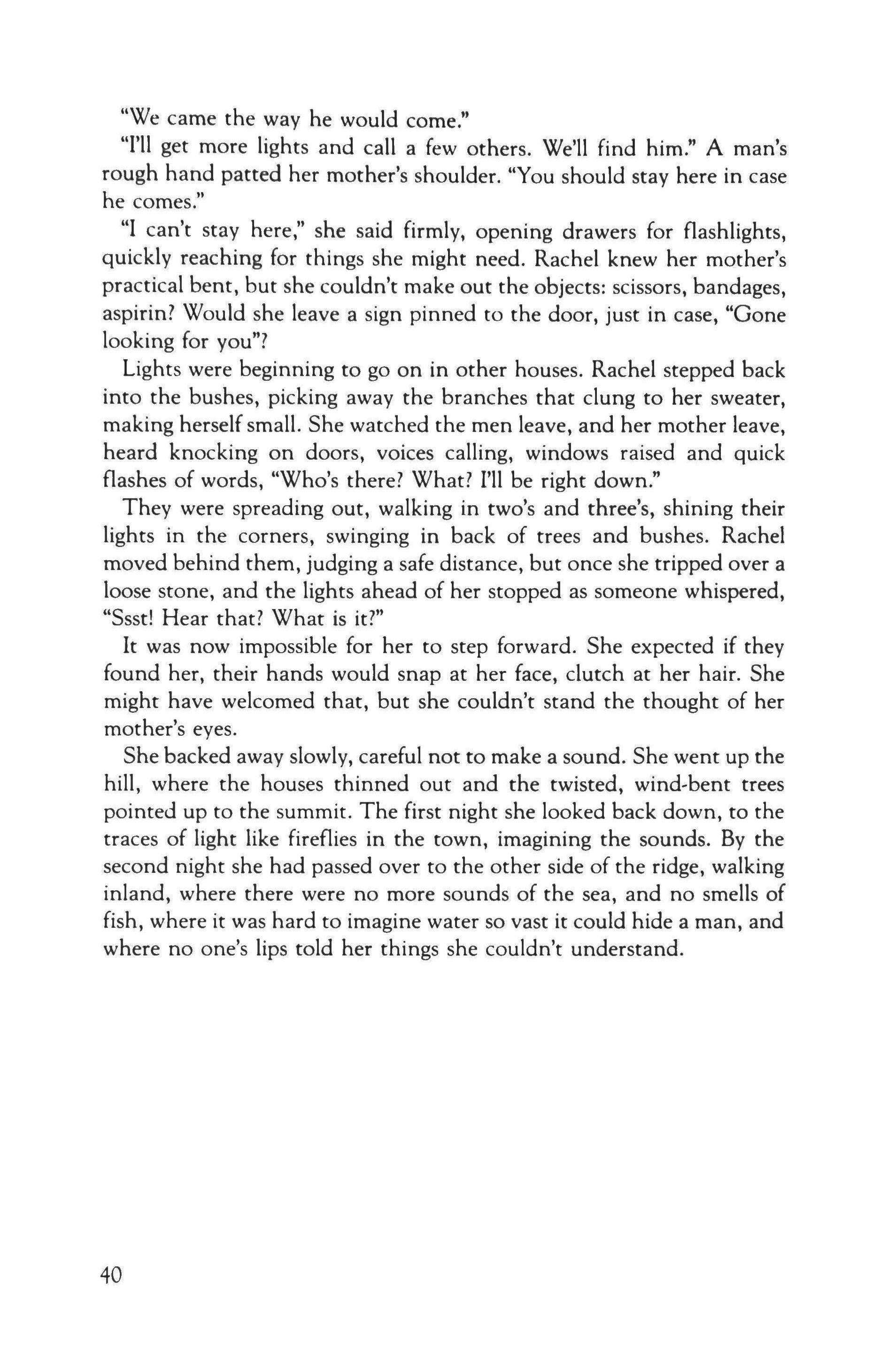
"We came the way he would come."
"I'll get more lights and call a few others. We'll find him." A man's rough hand patted her mother's shoulder. "You should stay here in case he comes."
"I can't stay here," she said firmly, opening drawers for flashlights, quickly reaching for things she might need. Rachel knew her mother's practical bent, but she couldn't make out the objects: scissors, bandages, aspirin? Would she leave a sign pinned to the door, just in case, "Gone looking for you"?
Lights were beginning to go on in other houses. Rachel stepped back into the bushes, picking away the branches that clung to her sweater, making herself small. She watched the men leave, and her mother leave, heard knocking on doors, voices calling, windows raised and quick flashes of words, "Who's there? What? I'll be right down."
They were spreading out, walking in two's and three's, shining their lights in the corners, swinging in back of trees and bushes. Rachel moved behind them, judging a safe distance, but once she tripped over a loose stone, and the lights ahead of her stopped as someone whispered, "Ssst! Hear that? What is it?"
It was now impossible for her to step forward. She expected if they found her, their hands would snap at her face, clutch at her hair. She might have welcomed that, but she couldn't stand the thought of her mother's eyes.
She backed away slowly, careful not to make a sound. She went up the hill, where the houses thinned out and the twisted, wind-bent trees pointed up to the summit. The first night she looked back down, to the traces of light like fireflies in the town, imagining the sounds. By the second night she had passed over to the other side of the ridge, walking inland, where there were no more sounds of the sea, and no smells of fish, where it was hard to imagine water so vast it could hide a man, and where no one's lips told her things she couldn't understand.
40
Perjury
Russell Working
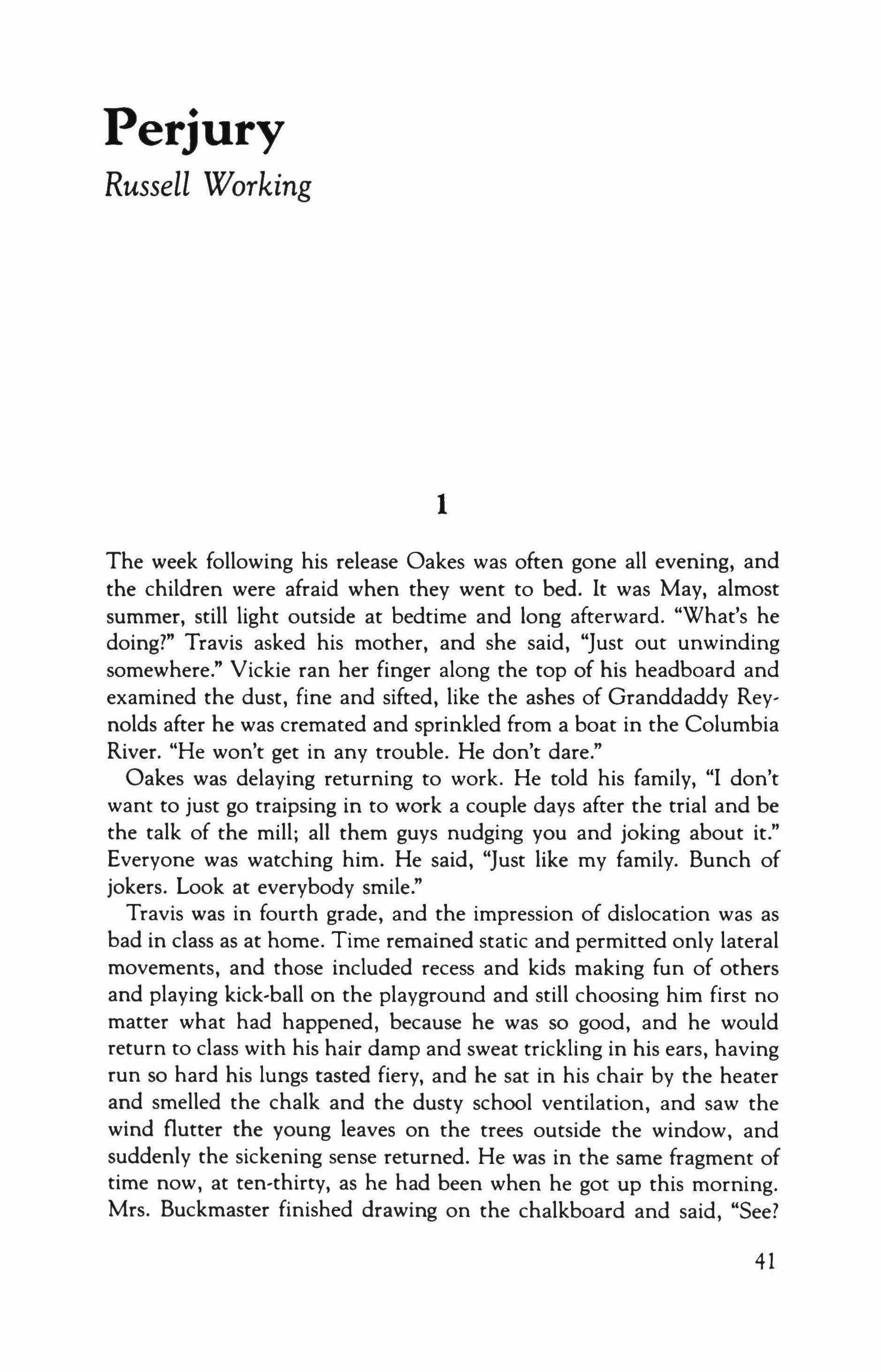
1
The week following his release Oakes was often gone all evening, and the children were afraid when they went to bed. It was May, almost summer, still light outside at bedtime and long afterward. "What's he doing?" Travis asked his mother, and she said, "Just out unwinding somewhere." Vickie ran her finger along the top of his headboard and examined the dust, fine and sifted, like the ashes of Granddaddy Reynolds after he was cremated and sprinkled from a boat in the Columbia River. "He won't get in any trouble. He don't dare."
Oakes was delaying returning to work. He told his family, "I don't want to just go traipsing in to work a couple days after the trial and be the talk of the mill; all them guys nudging you and joking about it." Everyone was watching him. He said, "Just like my family. Bunch of jokers. Look at everybody smile."
Travis was in fourth grade, and the impression of dislocation was as bad in class as at home. Time remained static and permitted only lateral movements, and those included recess and kids making fun of others and playing kick-ball on the playground and still choosing him first no matter what had happened, because he was so good, and he would return to class with his hair damp and sweat trickling in his ears, having run so hard his lungs tasted fiery, and he sat in his chair by the heater and smelled the chalk and the dusty school ventilation, and saw the wind flutter the young leaves on the trees outside the window, and suddenly the sickening sense returned. He was in the same fragment of time now, at ten-thirty, as he had been when he got up this morning. Mrs. Buckmaster finished drawing on the chalkboard and said, "See?
41
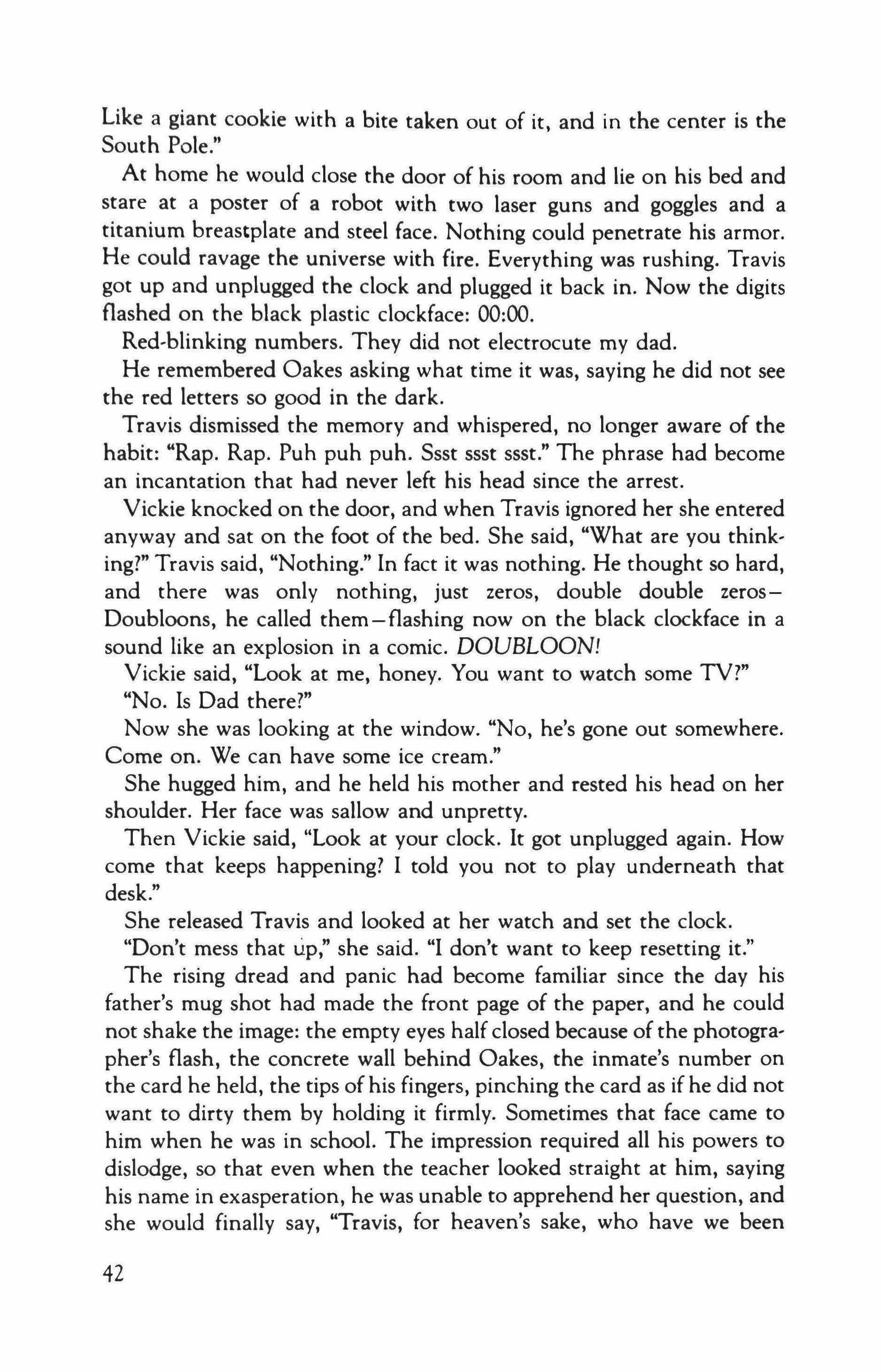
Like a giant cookie with a bite taken out of it, and in the center is the South Pole."
At home he would close the door of his room and lie on his bed and stare at a poster of a robot with two laser guns and goggles and a titanium breastplate and steel face. Nothing could penetrate his armor. He could ravage the universe with fire. Everything was rushing. Travis got up and unplugged the clock and plugged it back in. Now the digits flashed on the black plastic clockface: 00:00.
Red-blinking numbers. They did not electrocute my dad.
He remembered Oakes asking what time it was, saying he did not see the red letters so good in the dark.
Travis dismissed the memory and whispered, no longer aware of the habit: "Rap. Rap. Puh puh puh. Ssst ssst ssst." The phrase had become an incantation that had never left his head since the arrest.
Vickie knocked on the door, and when Travis ignored her she entered anyway and sat on the foot of the bed. She said, "What are you thinking?" Travis said, "Nothing." In fact it was nothing. He thought so hard, and there was only nothing, just zeros, double double zerosDoubloons, he called them - flashing now on the black clockface in a sound like an explosion in a comic. DOUBLOON!
Vickie said, "Look at me, honey. You want to watch some TV?"
"No. Is Dad there?"
Now she was looking at the window. "No, he's gone out somewhere. Come on. We can have some ice cream."
She hugged him, and he held his mother and rested his head on her shoulder. Her face was sallow and unpretty.
Then Vickie said, "Look at your clock. It got unplugged again. How come that keeps happening? I told you not to play underneath that desk."
She released Travis and looked at her watch and set the clock.
"Don't mess that up," she said. "1 don't want to keep resetting it."
The rising dread and panic had become familiar since the day his father's mug shot had made the front page of the paper, and he could not shake the image: the empty eyes half closed because of the photographer's flash, the concrete wall behind Oakes, the inmate's number on the card he held, the tips of his fingers, pinching the card as if he did not want to dirty them by holding it firmly. Sometimes that face came to him when he was in school. The impression required all his powers to dislodge, so that even when the teacher looked straight at him, saying his name in exasperation, he was unable to apprehend her question, and she would finally say, "Travis, for heaven's sake, who have we been
42
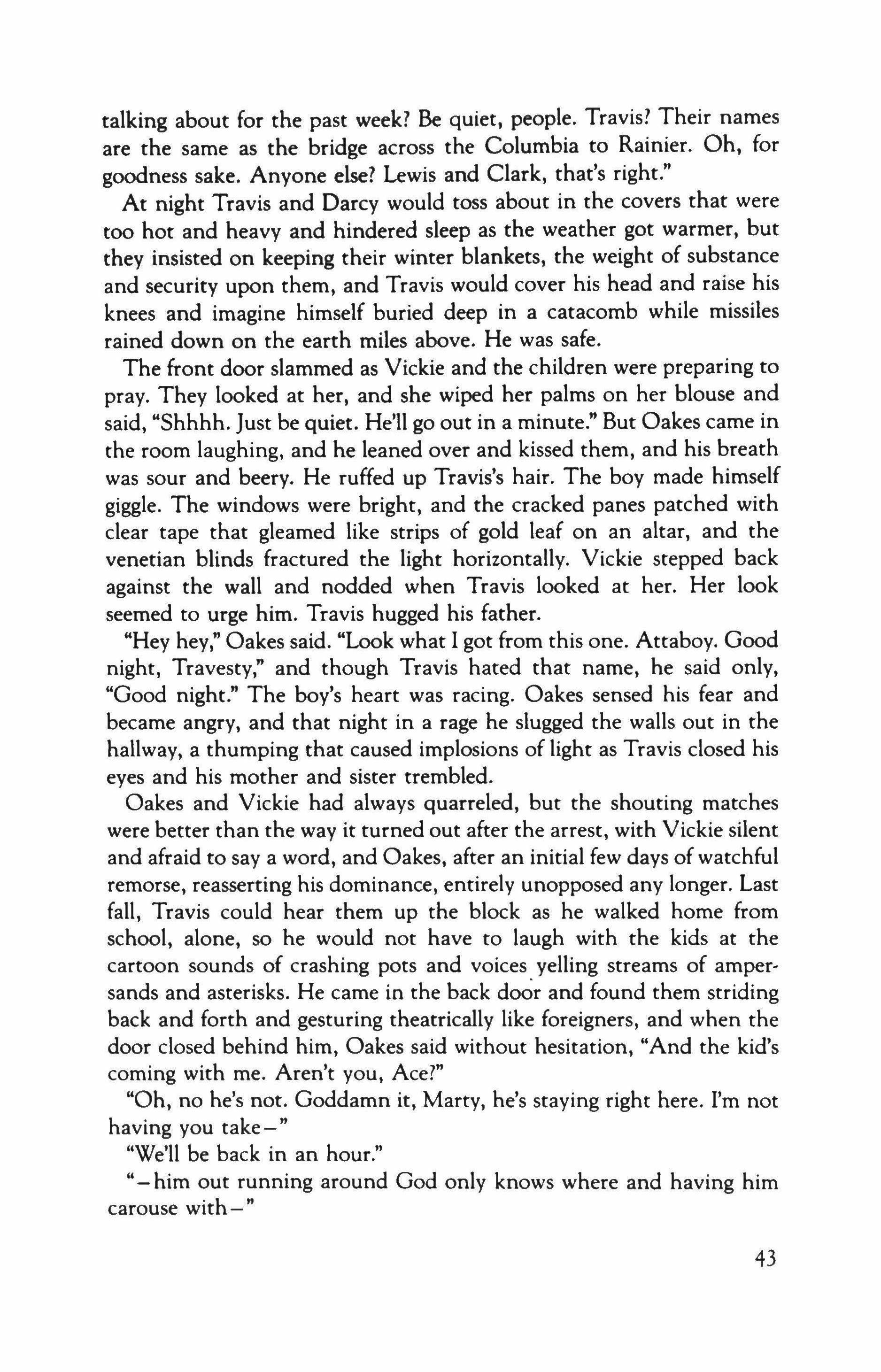
talking about for the past week? Be quiet, people. Travis? Their names are the same as the bridge across the Columbia to Rainier. Oh, for goodness sake. Anyone else? Lewis and Clark, that's right."
At night Travis and Darcy would toss about in the covers that were too hot and heavy and hindered sleep as the weather got warmer, but they insisted on keeping their winter blankets, the weight of substance and security upon them, and Travis would cover his head and raise his knees and imagine himself buried deep in a catacomb while missiles rained down on the earth miles above. He was safe.
The front door slammed as Vickie and the children were preparing to pray. They looked at her, and she wiped her palms on her blouse and said, "Shhhh. Just be quiet. He'll go out in a minute." But Oakes came in the room laughing, and he leaned over and kissed them, and his breath was sour and beery. He ruffed up Travis's hair. The boy made himself giggle. The windows were bright, and the cracked panes patched with clear tape that gleamed like strips of gold leaf on an altar, and the venetian blinds fractured the light horizontally. Vickie stepped back against the wall and nodded when Travis looked at her. Her look seemed to urge him. Travis hugged his father.
"Hey hey," Oakes said. "Look what I got from this one. Attaboy. Good night, Travesty," and though Travis hated that name, he said only, "Good night." The boy's heart was racing. Oakes sensed his fear and became angry, and that night in a rage he slugged the walls out in the hallway, a thumping that caused implosions of light as Travis closed his eyes and his mother and sister trembled.
Oakes and Vickie had always quarreled, but the shouting matches were better than the way it turned out after the arrest, with Vickie silent and afraid to say a word, and Oakes, after an initial few days of watchful remorse, reasserting his dominance, entirely unopposed any longer. Last fall, Travis could hear them up the block as he walked home from school, alone, so he would not have to laugh with the kids at the cartoon sounds of crashing pots and voices yelling streams of ampersands and asterisks. He came in the back door and found them striding back and forth and gesturing theatrically like foreigners, and when the door closed behind him, Oakes said without hesitation, "And the kid's coming with me. Aren't you, Ace?"
"Oh, no he's not. Goddamn it, Marty, he's staying right here. I'm not having you take -"
"We'll be back in an hour."
- him out running around God only knows where and having him carouse with -
43

"Carouse! Shit. He's ten years old."
yes, carouse, with you and your pals and learn your tricks"Jesus! What are you talking about, fucking trained-monkey tricks? Ooka, ooka, ook!"
"-I'm talking. I'm talking. And learn your tricks and your drinking and your smoking dope and whatever else you and your pervert friends d0-
"You watch your fucking lip, lady. Pervert."
They were silent a moment, and Oakes seized the moment to say, "So why don't we let him decide? Do you want to go out with the men, or you want to stay home with this old witch?"
"Witch! Don't you call me a witch in front of my children."
As Travis and his father pulled out from the curb in the Bronco, Vickie appeared in the living-room window next to the chimney. Oakes did not notice, and the droplets on the panes obscured her, so that her face was only a fleshy smudge framed in mullions and bright maple leaves. Oakes and Travis cruised around town in the rain, and Oakes turned on the wipers only when the windshield got so rainspattered you could hardly see. The wipers swept the water away, and Oakes turned them back off.
He stopped at a store and told Travis to wait in the car. The boy could see him inside, through the Washington state seal on the window, standing with his hands in his hip pockets as he surveyed the shelves full of bright-labeled bottles as multifarious and pleasing in form as figures. He came back out with a bottle in a paper bag, and they drove a few blocks and parked on a levee overlooking the swift, marble-surfaced Cowlitz River, sandstone-colored with the grit that washed off the flanks of the volcano. Oakes said the river had once been clear and green and deep, and powerboats would whine upstream on summer days. "That was when you was just a baby," he said. "Before Helen blew. God, was it really that long ago?" They sat with the windshield wipers off and let the car steam up. Oakes tore away the brown paper and unscrewed the cap, and the smell made Travis sneeze. Oakes swigged at the bottle. The drink was the color of tea, and the bottle was dusty. Oakes urged Travis to take a sip.
"Drink up," Oakes said. "Come on. You never tasted nothing like that in your entire life. Tastes like fire."
Travis started to raise the bottle to his lips, and Oakes patted him and said, "A small sip. Start small. That'll scorch you down inside in your little belly."
44
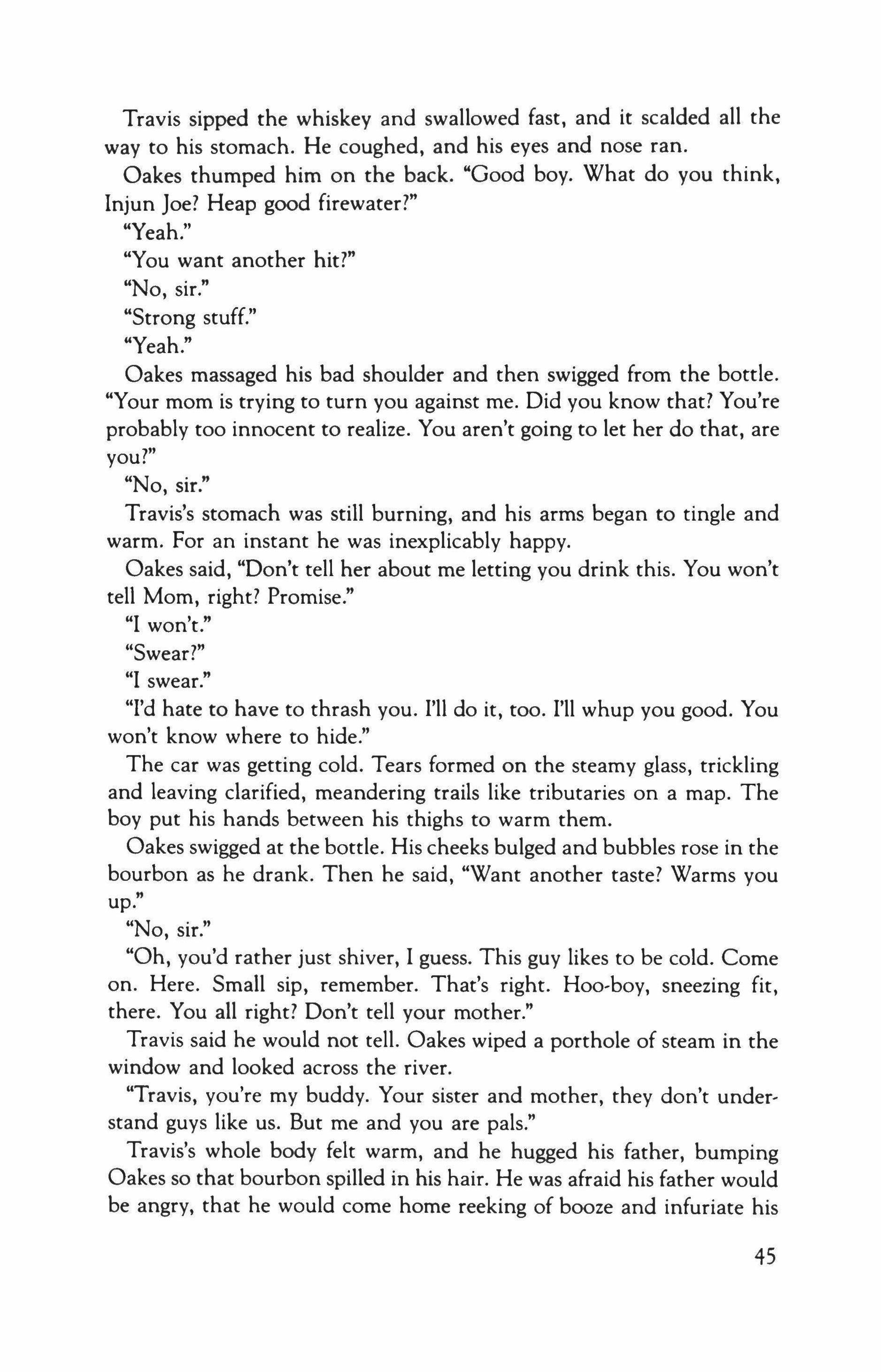
Travis sipped the whiskey and swallowed fast, and it scalded all the way to his stomach. He coughed, and his eyes and nose ran.
Oakes thumped him on the back. "Good boy. What do you think, Injun Joe? Heap good firewater?"
"Yeah."
"You want another hit?"
"No, sir."
"Strong stuff."
"Yeah."
Oakes massaged his bad shoulder and then swigged from the bottle. "Your mom is trying to turn you against me. Did you know that? You're probably too innocent to realize. You aren't going to let her do that, are you?"
"No, sir."
Travis's stomach was still burning, and his arms began to tingle and warm. For an instant he was inexplicably happy.
Oakes said, "Don't tell her about me letting you drink this. You won't tell Mom, right? Promise."
"I won't."
"Swear?"
"I swear."
"I'd hate to have to thrash you. I'll do it, too. I'll whup you good. You won't know where to hide."
The car was getting cold. Tears formed on the steamy glass, trickling and leaving clarified, meandering trails like tributaries on a map. The boy put his hands between his thighs to warm them.
Oakes swigged at the bottle. His cheeks bulged and bubbles rose in the bourbon as he drank. Then he said, "Want another taste? Warms you " up.
"No, sir."
"Oh, you'd rather just shiver, I guess. This guy likes to be cold. Come on. Here. Small sip, remember. That's right. Hoo-bov, sneezing fit, there. You all right? Don't tell your mother."
Travis said he would not tell. Oakes wiped a porthole of steam in the window and looked across the river.
"Travis, you're my buddy. Your sister and mother, they don't understand guys like us. But me and you are pals."
Travis's whole body felt warm, and he hugged his father, bumping Oakes so that bourbon spilled in his hair. He was afraid his father would be angry, that he would come home reeking of booze and infuriate his
45

mother, but Oakes kept holding him and saying, "I like that. You hug good, Travesty."
The morning after Oakes slugged the wall, the children studied the fist holes in the plaster by daylight, craters in the white plane that stretched for hundreds of miles like an Antarctic desert if you put your cheek to the surface. "What are you doing?" Darcy said.
"Shh!" Travis hissed. "Don't talk by the stairway."
"But why are you -"
Travis clamped his hand over her mouth and whispered, "Shut up! Do you hear me? Do you want to wake Dad? Do you? You know what he'll do if he gets mad."
Darcy became quiet, and she cried silently as she followed him around the kitchen and poured cereal in her bowl and added milk, more in imitation of his task than out of any desire for breakfast. She followed him into the den, where he turned the television on low and flipped through the Sunday morning church broadcasts.
When Oakes came down and sat on the couch behind them, his knuckles were swollen and bruised. He drank beer and tomato juice for breakfast.
"Look at that guy," he said. "Shouting and working up a sweat. 'You're all going to hell.' What a dick. Why do you guys watch this stuff, Travesty? Isn't there anything better on?"
Vickie appeared in the doorway eating an apple.
"What a hangover," Oakes said cheerfully. "I think I'm still drunk. That's never happened to me before."
The children, who were sitting on the floor, quietly ate their cereal, spooning out the colored circlets from the lakes of pink milk, hesitating to pick up their bowls and drink in the presence of their parents. Travis glanced at his father. Oakes lifted the curtain and stared out the window.
"I think I'm going to go to work Tuesday," Oakes said. "Start out on graveyard. What do you all think? What does my opinionated family think? God, I'm hungry. I'm so hungry I could gobble up my kids like a big native cannibal man." With his foot he nudged Travis in the small of the back. "What do you think, big chief? What do you say you and me leave the womenfolk and powwow this afternoon?"
46
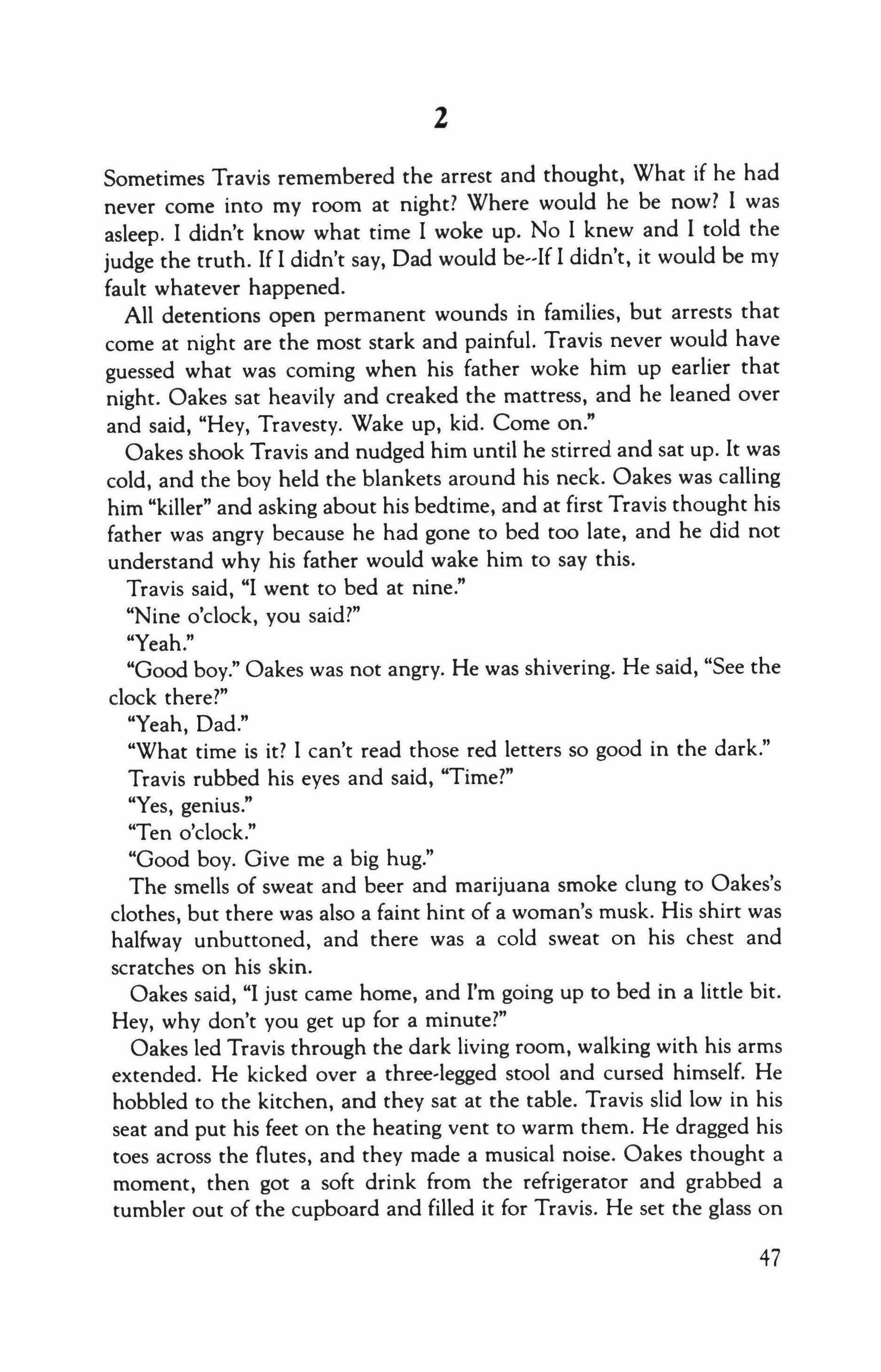
Sometimes Travis remembered the arrest and thought, What if he had never come into my room at night? Where would he be now? I was asleep. I didn't know what time I woke up. No I knew and I told the judge the truth. If I didn't say, Dad would be-If 1 didn't, it would be my fault whatever happened.
All detentions open permanent wounds in families, but arrests that come at night are the most stark and painful. Travis never would have guessed what was coming when his father woke him up earlier that night. Oakes sat heavily and creaked the mattress, and he leaned over and said, "Hey, Travesty. Wake up, kid. Come on."
Oakes shook Travis and nudged him until he stirred and sat up. It was cold, and the boy held the blankets around his neck. Oakes was calling him "killer" and asking about his bedtime, and at first Travis thought his father was angry because he had gone to bed too late, and he did not understand why his father would wake him to say this.
Travis said, "I went to bed at nine."
"Nine o'clock, you said?"
"Yeah."
"Good boy." Oakes was not angry. He was shivering. He said, "See the clock there?"
"Yeah, Dad."
"What time is it? I can't read those red letters so good in the dark."
Travis rubbed his eyes and said, "Time?"
"Yes, genius."
"Ten o'clock."
"Good boy. Give me a big hug."
The smells of sweat and beer and marijuana smoke clung to Oakes's clothes, but there was also a faint hint of a woman's musk. His shirt was halfway unbuttoned, and there was a cold sweat on his chest and scratches on his skin.
Oakes said, "I just came home, and I'm going up to bed in a little bit. Hey, why don't you get up for a minute?"
Oakes led Travis through the dark living room, walking with his arms extended. He kicked over a three-legged stool and cursed himself. He hobbled to the kitchen, and they sat at the table. Travis slid low in his seat and put his feet on the heating vent to warm them. He dragged his toes across the flutes, and they made a musical noise. Oakes thought a moment, then got a soft drink from the refrigerator and grabbed a tumbler out of the cupboard and filled it for Travis. He set the glass on
2
47
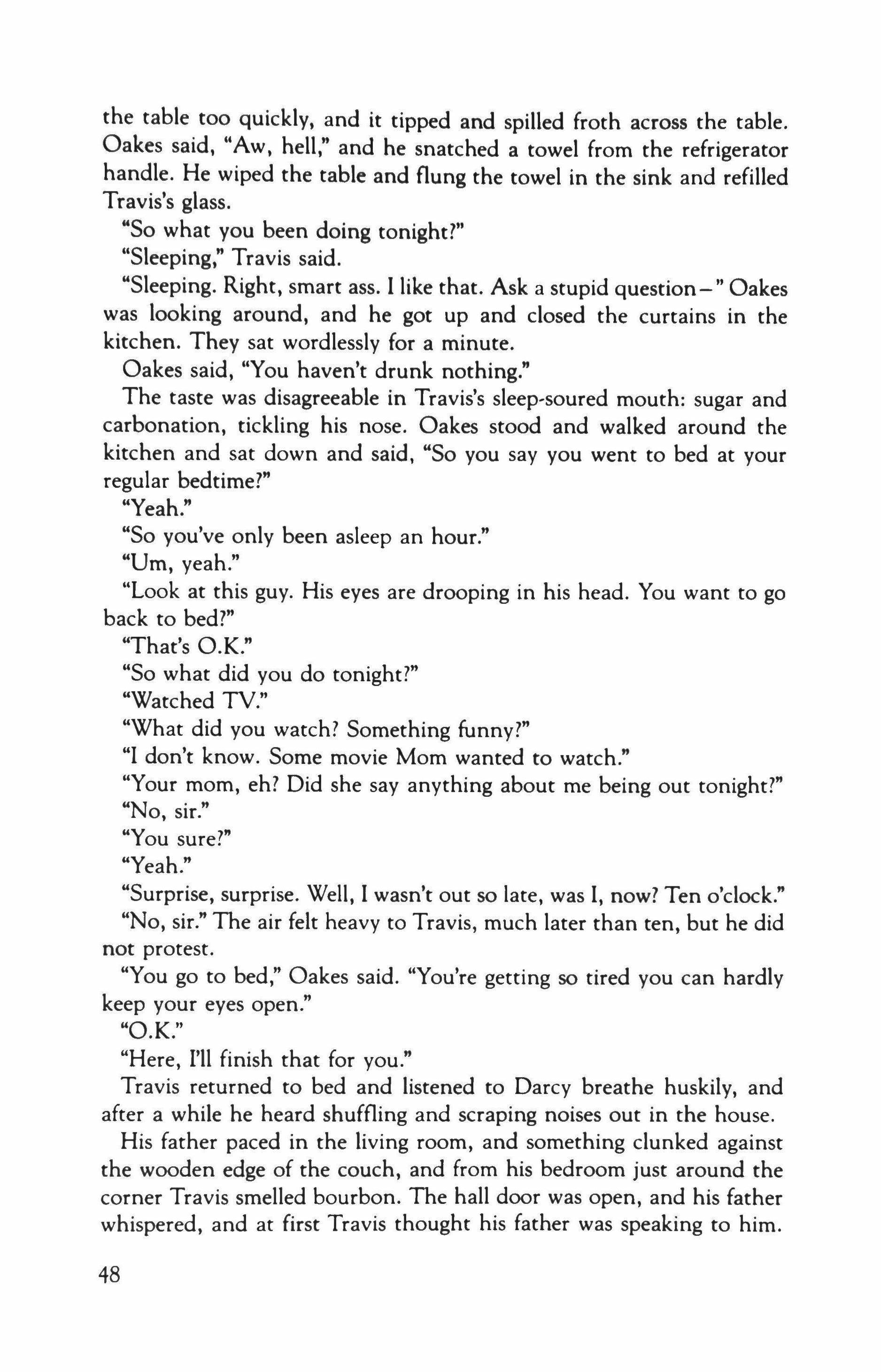
the table too quickly, and it tipped and spilled froth across the table. Oakes said, "Aw, hell," and he snatched a towel from the refrigerator handle. He wiped the table and flung the towel in the sink and refilled Travis's glass.
"So what you been doing tonight?"
"Sleeping," Travis said.
"Sleeping. Right, smart ass. I like that. Ask a stupid question-" Oakes was looking around, and he got up and closed the curtains in the kitchen. They sat wordlessly for a minute.
Oakes said, "You haven't drunk nothing."
The taste was disagreeable in Travis's sleep-soured mouth: sugar and carbonation, tickling his nose. Oakes stood and walked around the kitchen and sat down and said. "So you say you went to bed at your regular bedtime?"
"Yeah."
"So you've only been asleep an hour."
"Urn, yeah."
"Look at this guy. His eyes are drooping in his head. You want to go back to bed?"
"That's O.K."
"So what did you do tonight?"
"Watched TV."
"What did you watch? Something funny?"
"I don't know. Some movie Mom wanted to watch."
"Your mom, eh? Did she say anything about me being out tonight?"
"No. sir."
"You sure?"
"Yeah."
"Surprise, surprise. Well, I wasn't out so late, was I, now? Ten o'clock."
"No, sir." The air felt heavy to Travis, much later than ten, but he did not protest.
"You go to bed," Oakes said. "You're getting so tired you can hardly keep your eyes open."
"O.K."
"Here, I'll finish that for you."
Travis returned to bed and listened to Darcy breathe huskily, and after a while he heard shuffling and scraping noises out in the house.
His father paced in the living room, and something clunked against the wooden edge of the couch, and from his bedroom just around the corner Travis smelled bourbon. The hall door was open, and his father whispered, and at first Travis thought his father was speaking to him.
48
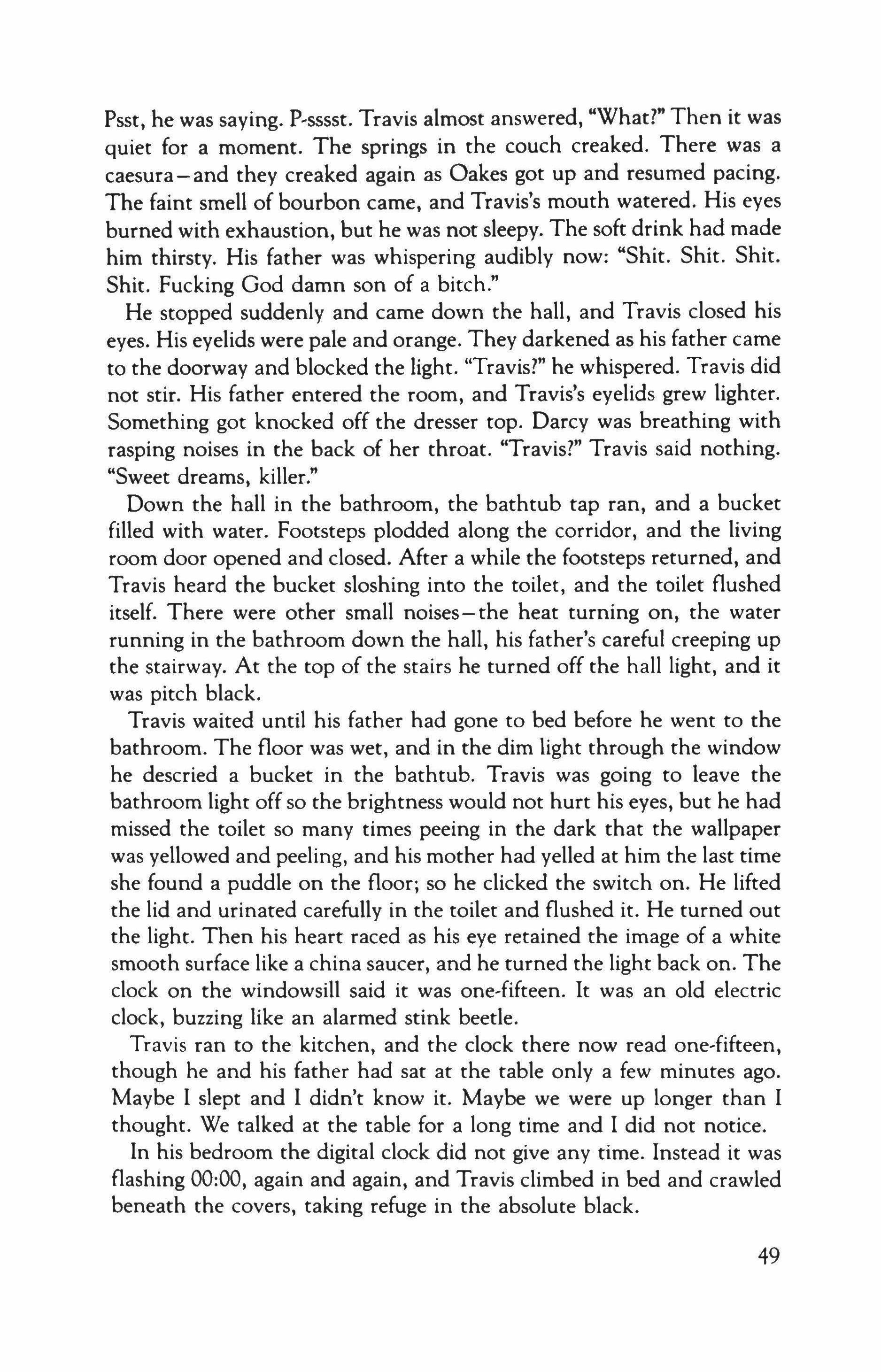
Psst, he was saying. P-sssst. Travis almost answered, "What?" Then it was quiet for a moment. The springs in the couch creaked. There was a caesura - and they creaked again as Oakes got up and resumed pacing. The faint smell of bourbon came, and Travis's mouth watered. His eyes burned with exhaustion, but he was not sleepy. The soft drink had made him thirsty. His father was whispering audibly now: "Shit. Shit. Shit. Shit. Fucking God damn son of a bitch."
He stopped suddenly and came down the hall, and Travis closed his eyes. His eyelids were pale and orange. They darkened as his father came to the doorway and blocked the light. "Travis?" he whispered. Travis did not stir. His father entered the room, and Travis's eyelids grew lighter. Something got knocked off the dresser top. Darcy was breathing with rasping noises in the back of her throat. "Travis?" Travis said nothing. "Sweet dreams, killer."
Down the hall in the bathroom, the bathtub tap ran, and a bucket filled with water. Footsteps plodded along the corridor, and the living room door opened and closed. After a while the footsteps returned, and Travis heard the bucket sloshing into the toilet, and the toilet flushed itself. There were other small noises - the heat turning on, the water running in the bathroom down the hall, his father's careful creeping up the stairway. At the top of the stairs he turned off the hall light, and it was pitch black.
Travis waited until his father had gone to bed before he went to the bathroom. The floor was wet, and in the dim light through the window he descried a bucket in the bathtub. Travis was going to leave the bathroom light off so the brightness would not hurt his eyes, but he had missed the toilet so many times peeing in the dark that the wallpaper was yellowed and peeling, and his mother had yelled at him the last time she found a puddle on the floor; so he clicked the switch on. He lifted the lid and urinated carefully in the toilet and flushed it. He turned out the light. Then his heart raced as his eye retained the image of a white smooth surface like a china saucer, and he turned the light back on. The clock on the windowsill said it was one-fifteen. It was an old electric clock, buzzing like an alarmed stink beetle.
Travis ran to the kitchen, and the clock there now read one-fifteen, though he and his father had sat at the table only a few minutes ago. Maybe I slept and I didn't know it. Maybe we were up longer than I thought. We talked at the table for a long time and I did not notice.
In his bedroom the digital clock did not give any time. Instead it was flashing 00:00, again and again, and Travis climbed in bed and crawled beneath the covers, taking refuge in the absolute black.
49
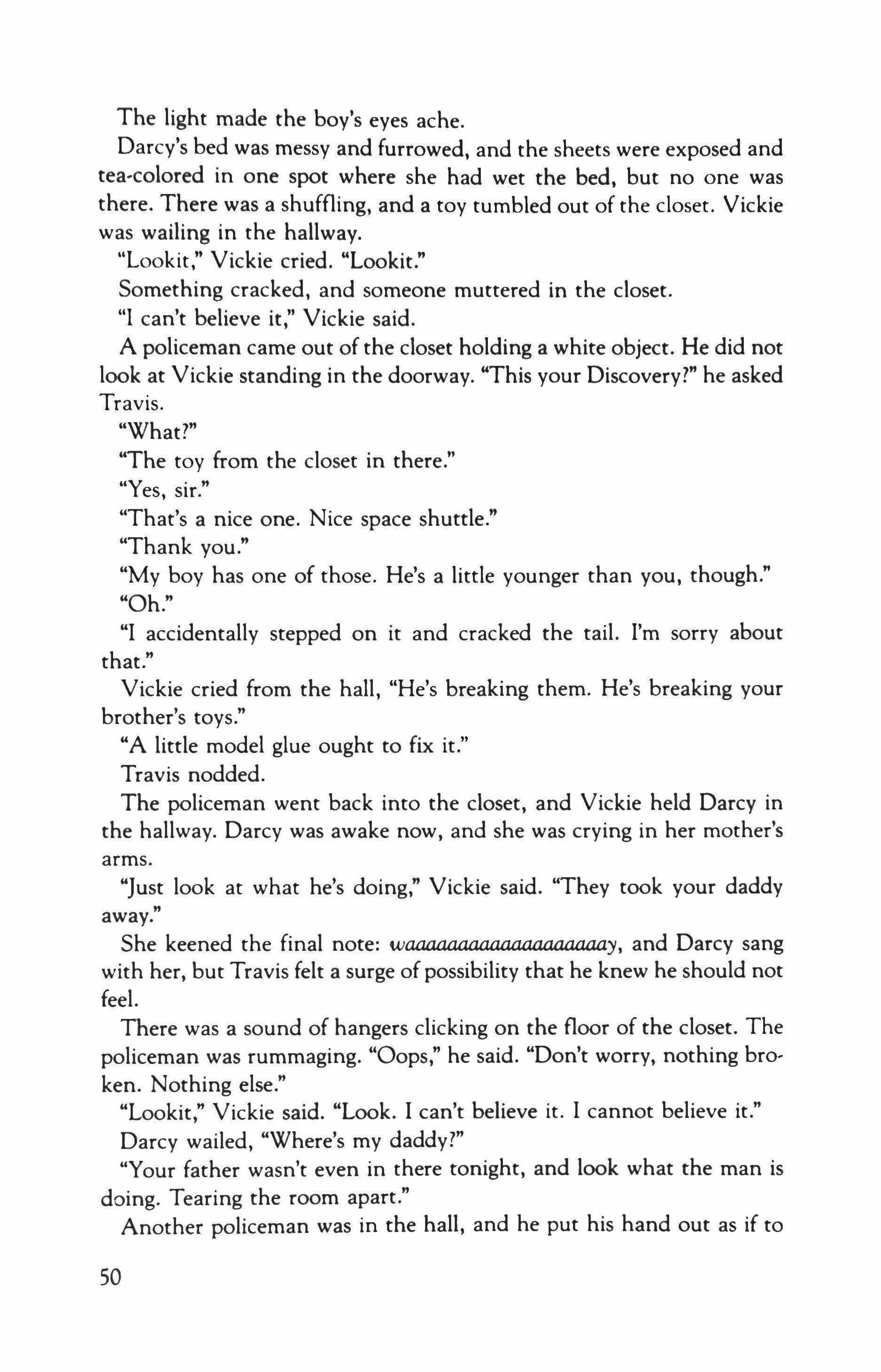
The light made the boy's eyes ache.
Darcy's bed was messy and furrowed, and the sheets were exposed and tea-colored in one spot where she had wet the bed, but no one was there. There was a shuffling, and a toy tumbled out of the closet. Vickie was wailing in the hallway.
"Lookit," Vickie cried. "Lookit,"
Something cracked, and someone muttered in the closet.
"I can't believe it," Vickie said.
A policeman came out of the closet holding a white object. He did not look at Vickie standing in the doorway. "This your Discovery?" he asked Travis.
"What?"
"The toy from the closet in there."
"Yes, sir."
"That's a nice one. Nice space shuttle."
"Thank you."
"My boy has one of those. He's a little younger than you, though." "Oh."
"I accidentally stepped on it and cracked the tail. I'm sorry about that."
Vickie cried from the hall, "He's breaking them. He's breaking your brother's toys."
"A little model glue ought to fix it."
Travis nodded.
The policeman went back into the closet, and Vickie held Darcy in the hallway. Darcy was awake now, and she was crying in her mother's arms.
"Just look at what he's doing," Vickie said. "They took your daddy away."
She keened the final note: wooooooooooooooaooooy, and Darcy sang with her, but Travis felt a surge of possibility that he knew he should not feel.
There was a sound of hangers clicking on the floor of the closet. The policeman was rummaging. "Oops," he said. "Don't worry, nothing broken. Nothing else."
"Lookit," Vickie said. "Look. I can't believe it. I cannot believe it."
Darcy wailed, "Where's my daddy?"
"Your father wasn't even in there tonight, and look what the man is doing. Tearing the room apart."
Another policeman was in the hall, and he put his hand out as if to
50
pat Vickie on the back, then arrested the gesture. "Mr. Oakes says he was, ma'am. Claims he was with his son at the time of the incident."
"Where's my daddy?" Darcy cried. "I want my daddy."
"What incident? Look at that! It's all a lie. Make him stop throwing the children's toys around, I'll call. I'll call."
Travis looked in the closet. The policeman was squatting and shuffling about in a drum of toys.
"What are you doing?"
The policeman said, "I'm sorry about the Discovery. It'll glue back just fine. It broke on a seam, see?"
Vickie's voice came from the hallway.
"I told him at least to stay out of the children's room. Look at him. What do the children got to do with this?"
"You saw the search warrant, ma'am. I'm sorry."
"Where's my daddy? I want my daddy!"
"They arrested your father. They took him away. These men. Look at them."
Darcy's cry rose to a squeal.
Vickie said, "He did nothing. They're trying to make me think things, make us think, and they took him away to jail."
The policeman closed the drum of toys.
"Why were you looking in there?" Travis said.
"Oh, just snooping around."
"What did my dad do?"
The policeman took off his hat and roughed up his flattop. He was very young, and he had a haircut just like Travis's.
"We took him away for a few days. You'll get him back soon. I'm sorry about the spaceship. Your dad can fix it for you. Fix it when he gets out, I mean. He'll be back any time, I'm sure."
The next morning the bucket was still in the tub, and the clock was flashing 00:00. The policeman had never noticed.

3
The day after the arrest they got the Bronco back, and it took hours to clean because the police had covered it inside and out with fingerprint dust-an infuriating nuisance to Vickie because, as she would say later, of course they did not find the so-called victim's fingerprints in the car; she never was in this car. Vickie discovered the mess as she started out
51
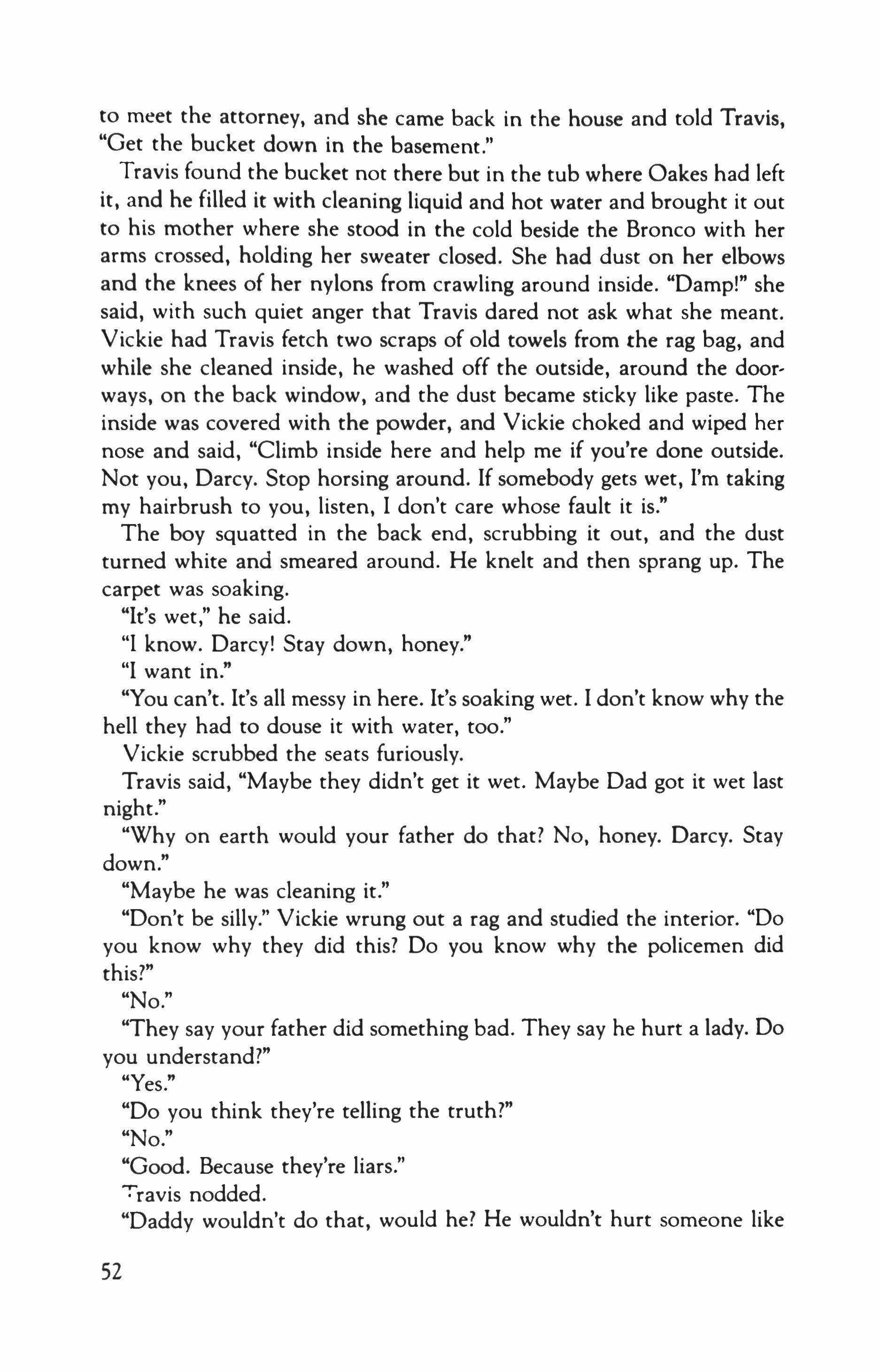
to meet the attorney, and she came back in the house and told Travis, "Get the bucket down in the basement."
Travis found the bucket not there but in the tub where Oakes had left it, and he filled it with cleaning liquid and hot water and brought it out to his mother where she stood in the cold beside the Bronco with her arms crossed, holding her sweater closed. She had dust on her elbows and the knees of her nylons from crawling around inside. "Damp!" she said, with such quiet anger that Travis dared not ask what she meant. Vickie had Travis fetch two scraps of old towels from the rag bag, and while she cleaned inside, he washed off the outside, around the doorways, on the back window, and the dust became sticky like paste. The inside was covered with the powder, and Vickie choked and wiped her nose and said, "Climb inside here and help me if you're done outside. Not you, Darcy. Stop horsing around. If somebody gets wet, I'm taking my hairbrush to you, listen, I don't care whose fault it is."
The boy squatted in the back end, scrubbing it out, and the dust turned white and smeared around. He knelt and then sprang up. The carpet was soaking.
"It's wet," he said.
"I know. Darcy! Stay down, honey."
"I want in."
"You can't. It's all messy in here. It's soaking wet. I don't know why the hell they had to douse it with water, too."
Vickie scrubbed the seats furiously.
Travis said, "Maybe they didn't get it wet. Maybe Dad got it wet last night."
"Why on earth would your father do that? No, honey. Darcy. Stay down."
"Maybe he was cleaning it."
"Don't be silly." Vickie wrung out a rag and studied the interior. "Do you know why they did this? Do you know why the policemen did this?"
"No."
"They say your father did something bad. They say he hurt a lady. Do you understand?"
"Yes."
"Do you think they're telling the truth?" "No."
"Good. Because they're liars."
Travis nodded.
"Daddy wouldn't do that, would he? He wouldn't hurt someone like
52
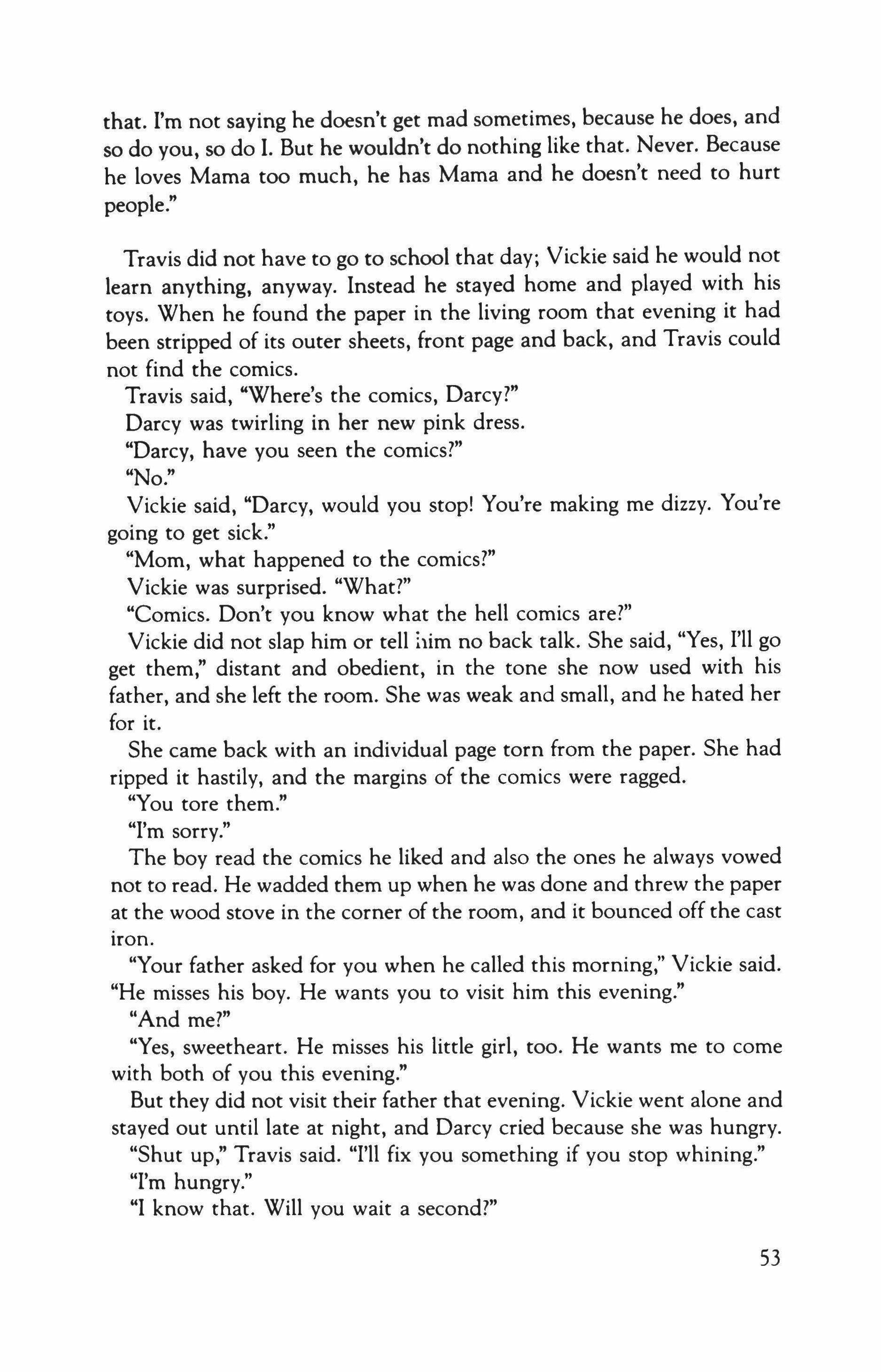
that. I'm not saying he doesn't get mad sometimes, because he does, and so do you, so do 1. But he wouldn't do nothing like that. Never. Because he loves Mama too much, he has Mama and he doesn't need to hurt people."
Travis did not have to go to school that day: Vickie said he would not learn anything, anyway. Instead he stayed home and played with his toys. When he found the paper in the living room that evening it had been stripped of its outer sheets, front page and back, and Travis could not find the comics.
Travis said, "Where's the comics, Darcy?"
Darcy was twirling in her new pink dress.
"Darcy, have you seen the comics?" "No."
Vickie said, "Darcy, would you stop! You're making me dizzy. You're going to get sick."
"Mom, what happened to the comics?"
Vickie was surprised. "What?"
"Comics. Don't you know what the hell comics are?"
Vickie did not slap him or tell him no back talk. She said, "Yes, I'll go get them," distant and obedient, in the tone she now used with his father, and she left the room. She was weak and small, and he hated her for it.
She came back with an individual page torn from the paper. She had ripped it hastily, and the margins of the comics were ragged.
"You tore them."
"I'm sorry."
The boy read the comics he liked and also the ones he always vowed not to read. He wadded them up when he was done and threw the paper at the wood stove in the corner of the room, and it bounced off the cast iron.
"Your father asked for you when he called this morning," Vickie said. "He misses his boy. He wants you to visit him this evening."
"And me?"
"Yes, sweetheart. He misses his little girl, too. He wants me to come with both of you this evening."
But they did not visit their father that evening. Vickie went alone and stayed out until late at night, and Darcy cried because she was hungry.
"Shut up," Travis said. "I'll fix you something if you stop whining."
"I'm hungry."
"I know that. Will you wait a second?"
53
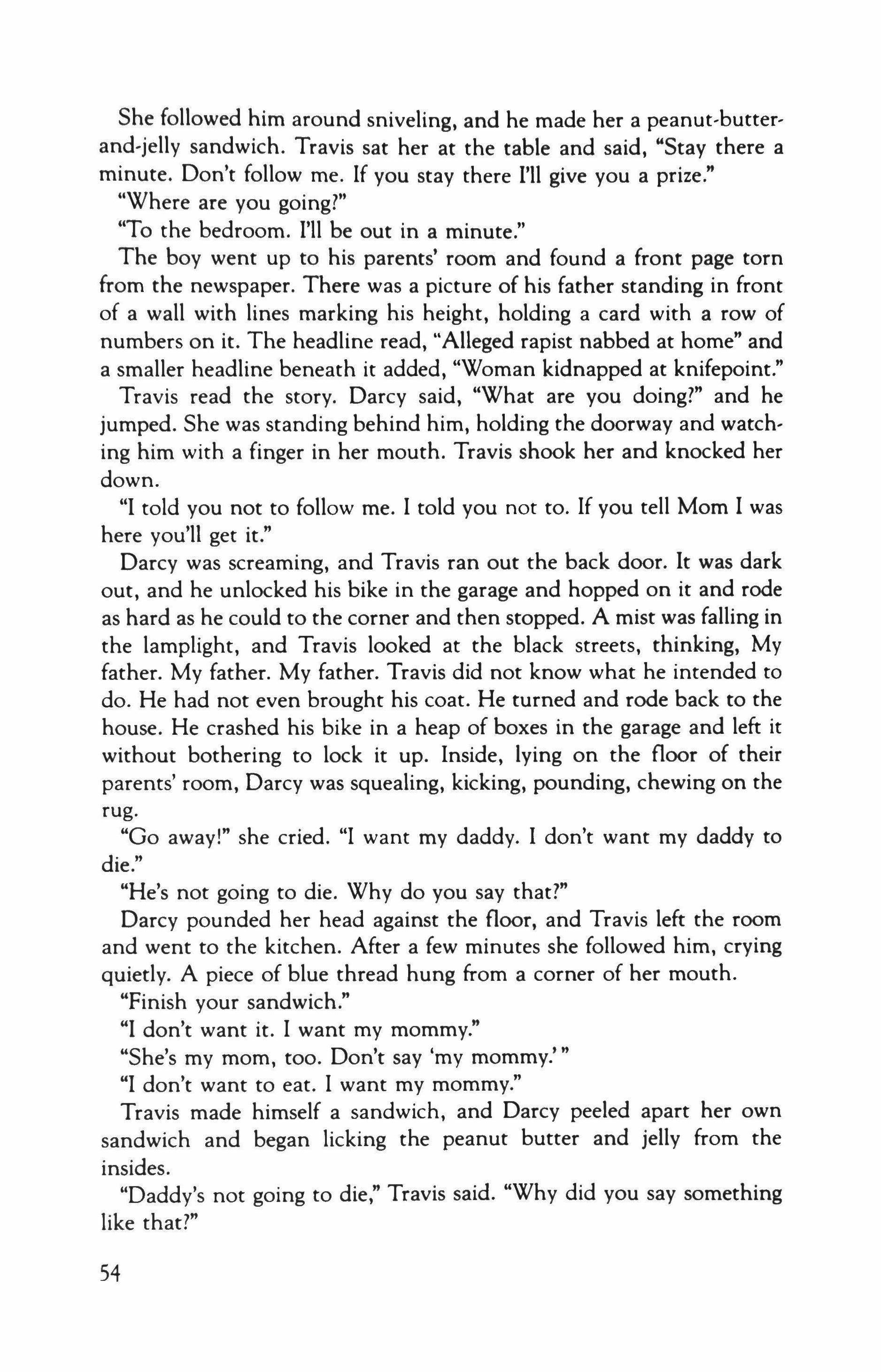
She followed him around sniveling, and he made her a peanut-butterand-jelly sandwich. Travis sat her at the table and said, "Stay there a minute. Don't follow me. If you stay there l'll give you a prize."
"Where are you going?"
"To the bedroom. I'll be out in a minute."
The boy went up to his parents' room and found a front page torn from the newspaper. There was a picture of his father standing in front of a wall with lines marking his height, holding a card with a row of numbers on it. The headline read, "Alleged rapist nabbed at home" and a smaller headline beneath it added, "Woman kidnapped at knifepoint."
Travis read the story. Darcy said, "What are you doing?" and he jumped. She was standing behind him, holding the doorway and watching him with a finger in her mouth. Travis shook her and knocked her down.
"I told you not to follow me. I told you not to. If you tell Mom I was here you'll get it."
Darcy was screaming, and Travis ran out the back door. It was dark out, and he unlocked his bike in the garage and hopped on it and rode as hard as he could to the corner and then stopped. A mist was falling in the lamplight, and Travis looked at the black streets, thinking, My father. My father. My father. Travis did not know what he intended to do. He had not even brought his coat. He turned and rode back to the house. He crashed his bike in a heap of boxes in the garage and left it without bothering to lock it up. Inside, lying on the floor of their parents' room, Darcy was squealing, kicking, pounding, chewing on the rug.
"Go away!" she cried. "I want my daddy. I don't want my daddy to die."
"He's not going to die. Why do you say that?"
Darcy pounded her head against the floor, and Travis left the room and went to the kitchen. After a few minutes she followed him, crying quietly. A piece of blue thread hung from a corner of her mouth.
"Finish your sandwich."
"I don't want it. I want my mommy."
"She's my mom, too. Don't say 'my mommy.'''
"I don't want to eat. I want my mommy."
Travis made himself a sandwich, and Darcy peeled apart her own sandwich and began licking the peanut butter and jelly from the insides.
"Daddy's not going to die," Travis said. "Why did you say something like that?"
54

Darcy licked her fingers.
Travis said, "Until Mom's home I'm boss, and I can tell you what to do. I don't want you to talk about that. You be good or I'm telling on you."
Darcy took a knife and spread some more jelly on her bread, then began to eat from the jar with her knife, and the boy permitted her, for certain transgressions can be overlooked when a great iniquity has shaken the equilibrium of a household.
By the weekend they were used to the quiet. They went to church on Sunday, although Vickie said she had not gone since she was a girl, and the teacher made the children sit around a table, put their heads down, and think of secret things about themselves to tell God, things nobody could guess by looking at them. Then she read about Moses, Elijah and Jesus, and the class made paper transfigurations with cotton balls for clouds. The boy drew the three disciples spindly and small, like cockroaches, irrelevant to the glory. Across the bottom of the page he wrote the words of God from the cloud: THIS IS MY SON, WHOM I LOVE; WITH HIM I AM WELL PLEASED.
At home that afternoon the boy was allowed to light the fire in the wood stove, and he watched the invisible flame move across the newspaper, turning it black and crumbling it into delicate dried rose petals but leaving the words untouched so that you could still read them. They sat on the living-room floor holding hands and prayed that the police would stop lying about Daddy. "Make him be innocent," Vickie prayed. "I will give thee everything and even that thought which is in my heart but he must be innocent. Don't let them hurt him in jail." Travis could not imagine someone getting hurt in jail; there you were safe, and the only thing that could happen to you was maybe getting your head caught if you stuck it between the bars to yell at the guards. You had a cot and magazines. It was boring, but that was your punishment.
That night there was no noise except the television and one dog barking out on the street. The children kept the TV on, even when they were not watching, because otherwise they heard the wind in the trees and they were afraid. They spread their toys on the floor and arranged them silently into accusing opposite forces like the terra-cotta armies protecting the tomb of the Chinese Emperor. Vickie served bowls of lime sherbet, and Darcy and Travis stuck out their green tongues at each other.
Sometimes at night long after bedtime, Travis awoke and thought, He's home. Then he kept his eyes closed and pretended to sleep and
55
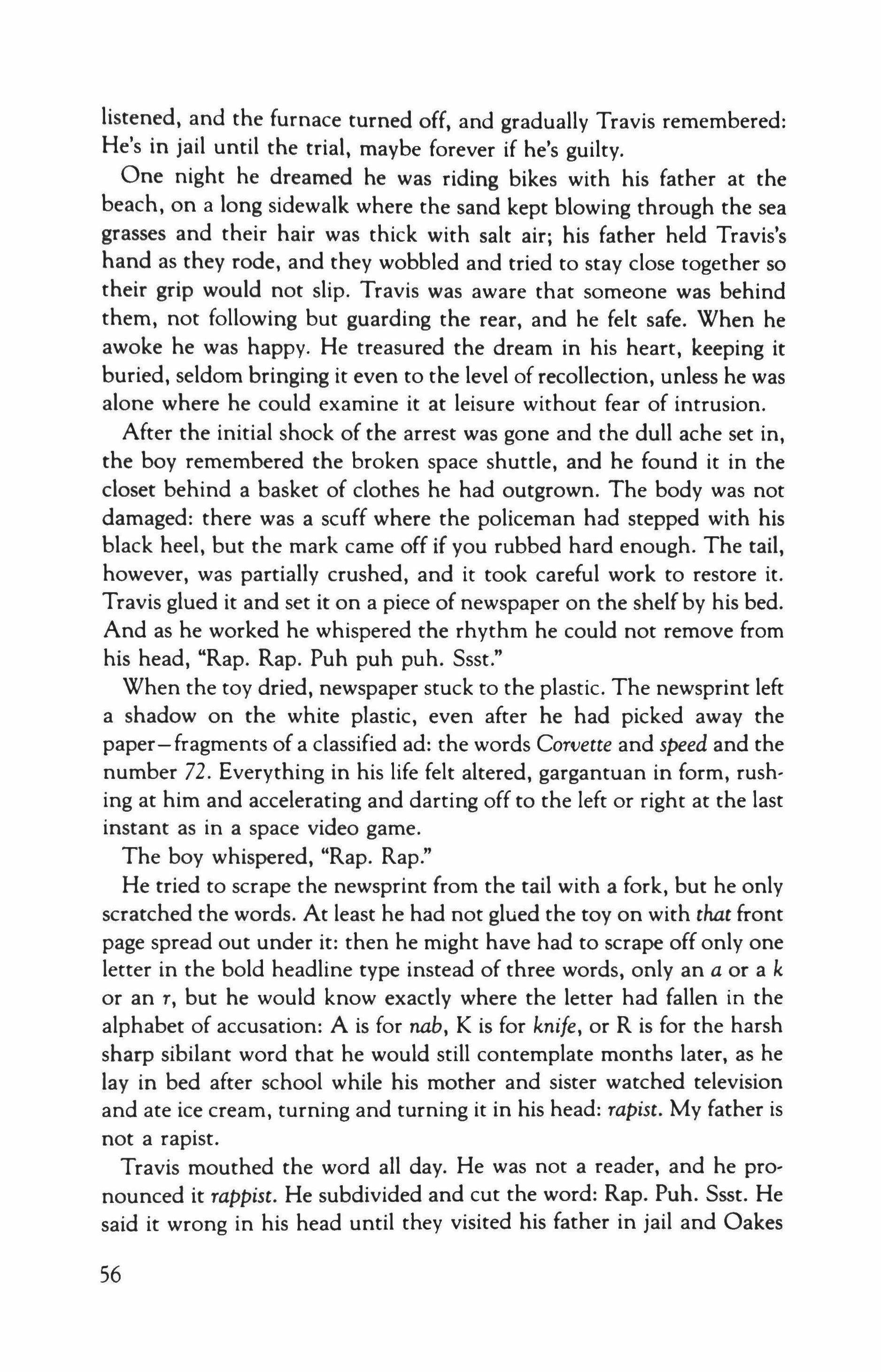
listened, and the furnace turned off, and gradually Travis remembered: He's in jail until the trial, maybe forever if he's guilty.
One night he dreamed he was riding bikes with his father at the beach, on a long sidewalk where the sand kept blowing through the sea grasses and their hair was thick with salt air; his father held Travis's hand as they rode, and they wobbled and tried to stay close together so their grip would not slip. Travis was aware that someone was behind them, not following but guarding the rear, and he felt safe. When he awoke he was happy. He treasured the dream in his heart, keeping it buried, seldom bringing it even to the level of recollection, unless he was alone where he could examine it at leisure without fear of intrusion.
After the initial shock of the arrest was gone and the dull ache set in, the boy remembered the broken space shuttle, and he found it in the closet behind a basket of clothes he had outgrown. The body was not damaged: there was a scuff where the policeman had stepped with his black heel, but the mark came off if you rubbed hard enough. The tail, however, was partially crushed, and it took careful work to restore it. Travis glued it and set it on a piece of newspaper on the shelf by his bed. And as he worked he whispered the rhythm he could not remove from his head, "Rap. Rap. Puh puh puh. Ssst."
When the toy dried, newspaper stuck to the plastic. The newsprint left a shadow on the white plastic, even after he had picked away the paper-fragments of a classified ad: the words Corvette and speed and the number 72. Everything in his life felt altered, gargantuan in form, rushing at him and accelerating and darting off to the left or right at the last instant as in a space video game.
The boy whispered, "Rap. Rap."
He tried to scrape the newsprint from the tail with a fork, but he only scratched the words. At least he had not glued the toy on with that front page spread out under it: then he might have had to scrape off only one letter in the bold headline type instead of three words, only an a or a k or an r, but he would know exactly where the letter had fallen in the alphabet of accusation: A is for nab, K is for knife, or R is for the harsh sharp sibilant word that he would still contemplate months later, as he lay in bed after school while his mother and sister watched television and ate ice cream, turning and turning it in his head: rapist. My father is not a rapist.
Travis mouthed the word all day. He was not a reader, and he pronounced it tappist, He subdivided and cut the word: Rap. Puh. Ssst. He said it wrong in his head until they visited his father in jail and Oakes
56

said rapist over the phone in the visitors' area, but by then the rnispronunciation was embedded in his mind.
Travis brought the shuttle into the living room and scraped at the newspaper letters.
"What are you doing with that good kitchen fork?" Vickie said. Travis ignored her and whispered to himself as he scraped the toy. Puh. Ssst.
Vickie snatched the fork and demanded, "What did you say?"
"Nothing."
"Did you say something about your mother? Did you call your mother a bitch?"
"Nosireebob,"
"If you use that smart-aleck tone with me, I'm going to box your ears."
The boy glowered, and his scorn seemed to wilt her, and she took the fork from him and left the room. "Bitch," he said, loud enough to be daring but not to be heard.
When they visited Oakes, he was sitting at a counter in a long line of men who were separated from their visitors by a window, so that they had to talk on phones. The window was made of plastic, and there were burnt holes in it. Oakes wore white clothes, and when he turned to leave they saw the word JAIL on the back. The sign behind him said NO SMOKING, but he puffed a cigarette and tapped the ashes on the floor.
A voice squawked on the intercom, and although the family could not hear Oakes except on the phone, they could hear the intercom on their side of the glass: "Oakes, put out the cigarette."
Oakes ground out the butt on the counter and flung it over his shoulder.
Oakes was talking to Vickie through the receiver.
Vickie nodded and told him, "We'll give him a turn in a minute. I got to talk to you. We got to figure out finances."
Oakes talked.
Vickie said, "Well, I just want one minute. You can see him right here. He ain't going nowhere."
Oakes spoke angrily, and Vickie replied, � All right, for Christ's sake." She flung the receiver at Travis and started to walk over to the metal door to press the button for the guard to let her out, then changed her mind and returned.
Oakes said the word the right way, and Travis was surprised at the sound.
57
"You know what they say 1 did? They say I'm a rapist." "I know."
"Your mother thinks you don't know. How'd you find out?"
Travis looked at him.
Oakes said, "I know. You don't want her to hear. Let me guess. You read it in the paper?" "Yeah."
"Hey, first guess. You know what a rapist is?" "Yeah."
"Well, I'm not. They're lying. You understand? Some very bad motherfuckers want to keep your old man behind bars for good. You understand?"
Vickie said, "Here, Darcy wants a turn. Give Darcy the phone."
Darcy grabbed at the phone.
"Tell your mother to bug off if she's trying to move you along."
"Dad says bug off."
"Good boy," Oakes said. "Now, you remember me visiting you? Don't say it. Nod or shake your head."
Travis shrugged.
Oakes looked panicked. "In your God damn room the other night." "Oh," Travis nodded. "Sorry."
"Did you mention it to the cops when they asked?" "Yeah."
Oakes glanced over his shoulder and said, "You remember the time 1 was there? Don't say it. I don't trust this phone. Hold up your fingers."
Travis held up ten fingers.
"Good boy. Good boy. That's my boy."
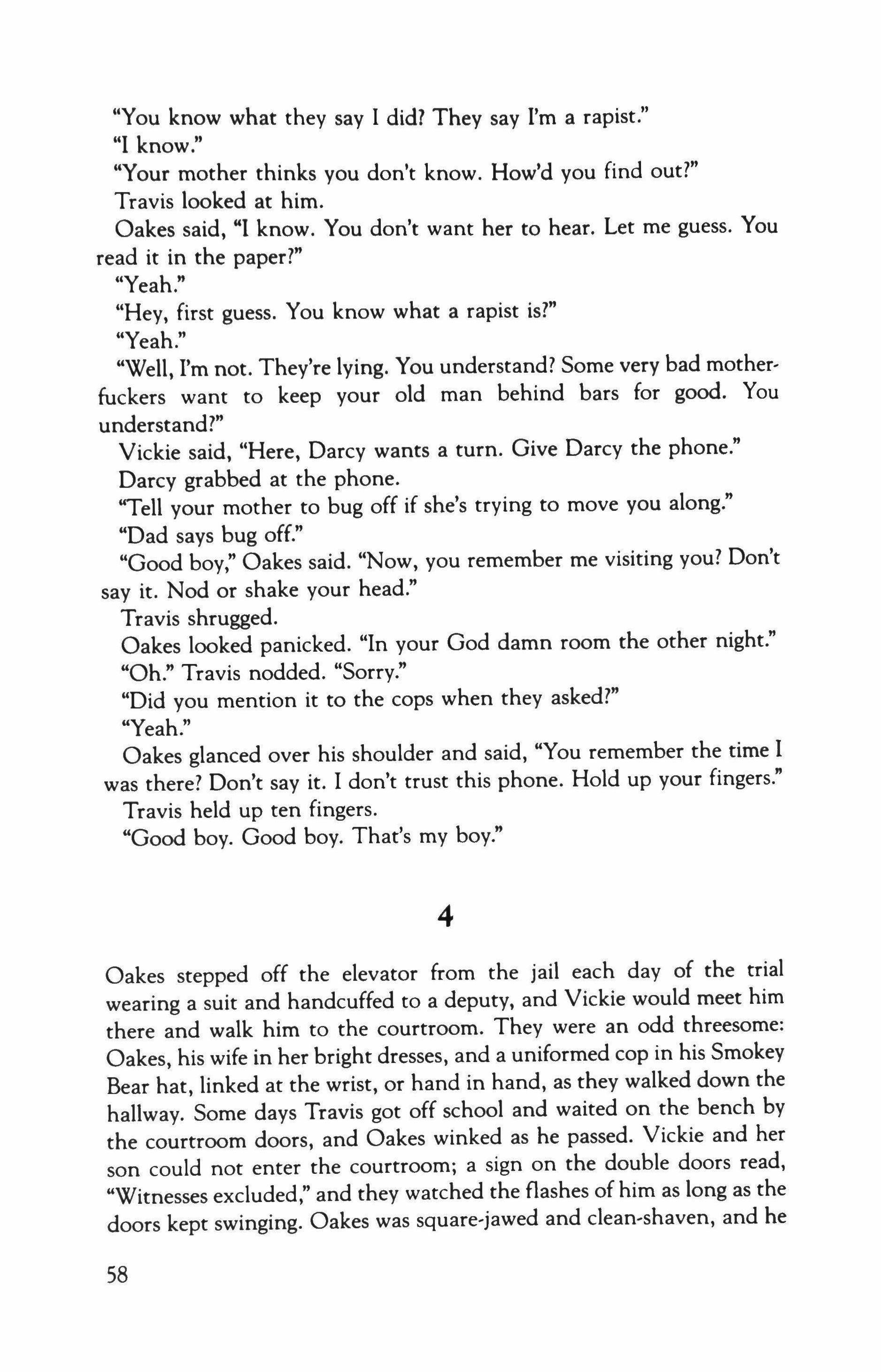
Oakes stepped off the elevator from the jail each day of the trial wearing a suit and handcuffed to a deputy, and Vickie would meet him there and walk him to the courtroom. They were an odd threesome: Oakes, his wife in her bright dresses, and a uniformed cop in his Smokey Bear hat, linked at the wrist, or hand in hand, as they walked down the hallway. Some days Travis got off school and waited on the bench by the courtroom doors, and Oakes winked as he passed. Vickie and her son could not enter the courtroom; a sign on the double doors read, "Witnesses excluded," and they watched the flashes of him as long as the doors kept swinging. Oakes was square-jawed and clean-shaven, and he
4
58

combed his hair back and oiled it flat on his head. Vickie had bought two dresses for the trial, and she alternated them day by day, red and then blue, identical in style and pattern, with sylvan designs and garish monotone galahs and koalas amid the leaves.
Vickie could not quite comprehend what was occurring. She would start into the courtroom, and a deputy would touch her on the shoulder and say, "Sorry ma'am, you're not allowed. You're a witness." Her son tugged on her elbow to restrain her. She looked around her in confusion, glancing up quickly to meet the eyes of those who were crowding into the doorway, and she gave Travis a brave smile that faded at once. She took up her post by the doorway, sitting on a stiff wooden bench with a slatted back, and waited; she neither read nor knitted, but simply stared the length of the hallway. Sometimes she brought Darcy, who galloped up and down the hall and talked in a loud voice to clerks and typists and traffic-court offenders about her daddy, and her brother had to be the one to quiet her and settle her down on a bench with her coloring book while Vickie tried to hear through the doors what was happening inside.
The day Travis testified, before he went into court, he threw up in the men's-room sink, and his mother made him gargle in the drinking fountain and gave him a breath mint to suck on. He was afraid of the judge, an ancient, ape-like man barely visible over his desk, who would shift his glasses on his nose, peer at a paper an attendant handed him, then squint at the attorney and ask a question. When the judge explained Travis's duty as a witness, he craned his scrawny neck to look down and spoke carefully and slowly in a sharp, low voice, as if he were talking to a grown-up. Behind the old man's ear and running into his diaphanous hair was a swath of scarlet birthmarks, which the boy could see when he leaned forward. Travis tried not to look at the judge's head. When the judge sat back in his chair, Travis could not see him behind the bench. He expected the judge at any moment to lean forward and say, "Now son, you're going to have to stop this lying and tell us what you know."
Oakes's attorney also was intimidated by the judge. When the judge spoke he listened with his lips parted and his head bobbed in agreement. When the attorney questioned Travis, he paced back and forth and wadded a silk handkerchief in his hand, like an infantry captain who had torn down a surrender flag from a soldier's bayonet. He asked questions about Oakes coming in late one night, and the boy, trying hard to think what the right answer would be, said either "No" or "Yes," and then added, "sir."
59
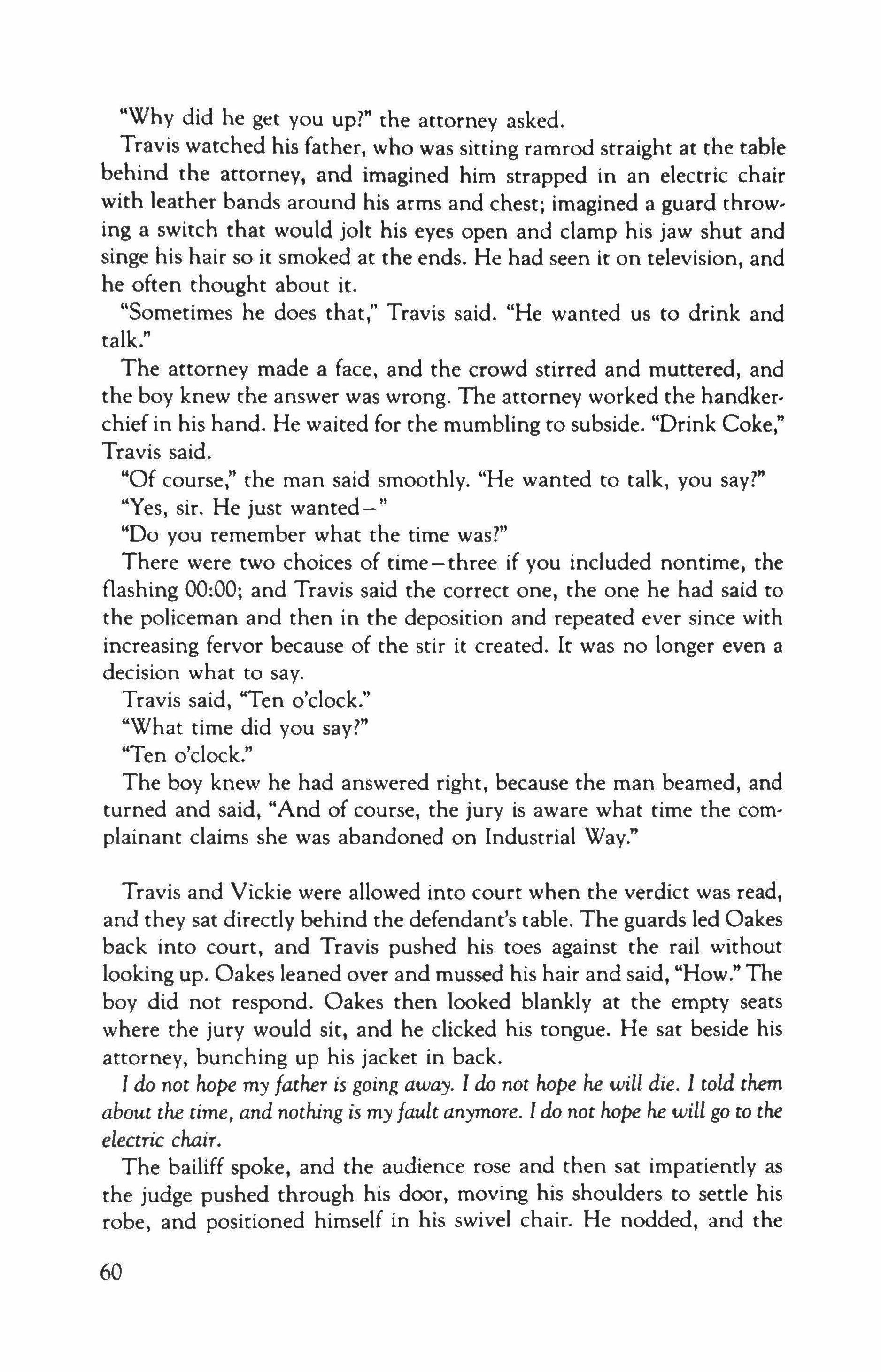
"Why did he get you up?" the attorney asked. Travis watched his father, who was sitting ramrod straight at the table behind the attorney, and imagined him strapped in an electric chair with leather bands around his arms and chest; imagined a guard throwing a switch that would jolt his eyes open and clamp his jaw shut and singe his hair so it smoked at the ends. He had seen it on television, and he often thought about it.
"Sometimes he does that," Travis said. "He wanted us to drink and talk."
The attorney made a face, and the crowd stirred and muttered, and the boy knew the answer was wrong. The attorney worked the handkerchief in his hand. He waited for the mumbling to subside. "Drink Coke," Travis said.
"Of course," the man said smoothly. "He wanted to talk, you say?"
"Yes, sir. He just wanted-"
"Do you remember what the time was?"
There were two choices of time-three if you included nontime, the flashing 00:00; and Travis said the correct one, the one he had said to the policeman and then in the deposition and repeated ever since with increasing fervor because of the stir it created. It was no longer even a decision what to say.
Travis said, "Ten o'clock."
"What time did you say?"
"Ten o'clock."
The boy knew he had answered right, because the man beamed, and turned and said, "And of course, the jury is aware what time the complainant claims she was abandoned on Industrial Way."
Travis and Vickie were allowed into court when the verdict was read, and they sat directly behind the defendant's table. The guards led Oakes back into court, and Travis pushed his toes against the rail without looking up. Oakes leaned over and mussed his hair and said, "How." The boy did not respond. Oakes then looked blankly at the empty seats where the jury would sit, and he clicked his tongue. He sat beside his attorney, bunching up his jacket in back.
I do not hope my father is going away. I do not hope he will die. I told them about the time, and nothing is my fault anymore. I do not hope he will go to the electric chair.
The bailiff spoke, and the audience rose and then sat impatiently as the judge pushed through his door, moving his shoulders to settle his robe, and positioned himself in his swivel chair. He nodded, and the
60
bailiff left the room and returned a moment later with the jury. The judge dug at his ears and scanned the jury severely and spoke to the foreman. And although the boy watched the exchange between the men, intent on every word, nothing registered until the foreman said, "Not guilty, your honor," and a din rose in the room. Oakes jumped up and slapped the arm of his attorney, who gaped at the eleven men and one woman in frank surprise. Vickie leaned over the rail, and Oakes laughed and bussed her. Oakes freed himself from Vickie's embrace and grabbed his son and picked him up over the rail, so that Travis was on the criminals' side with his father's breath in his ear: "Hey, we did it, kid. We did it."
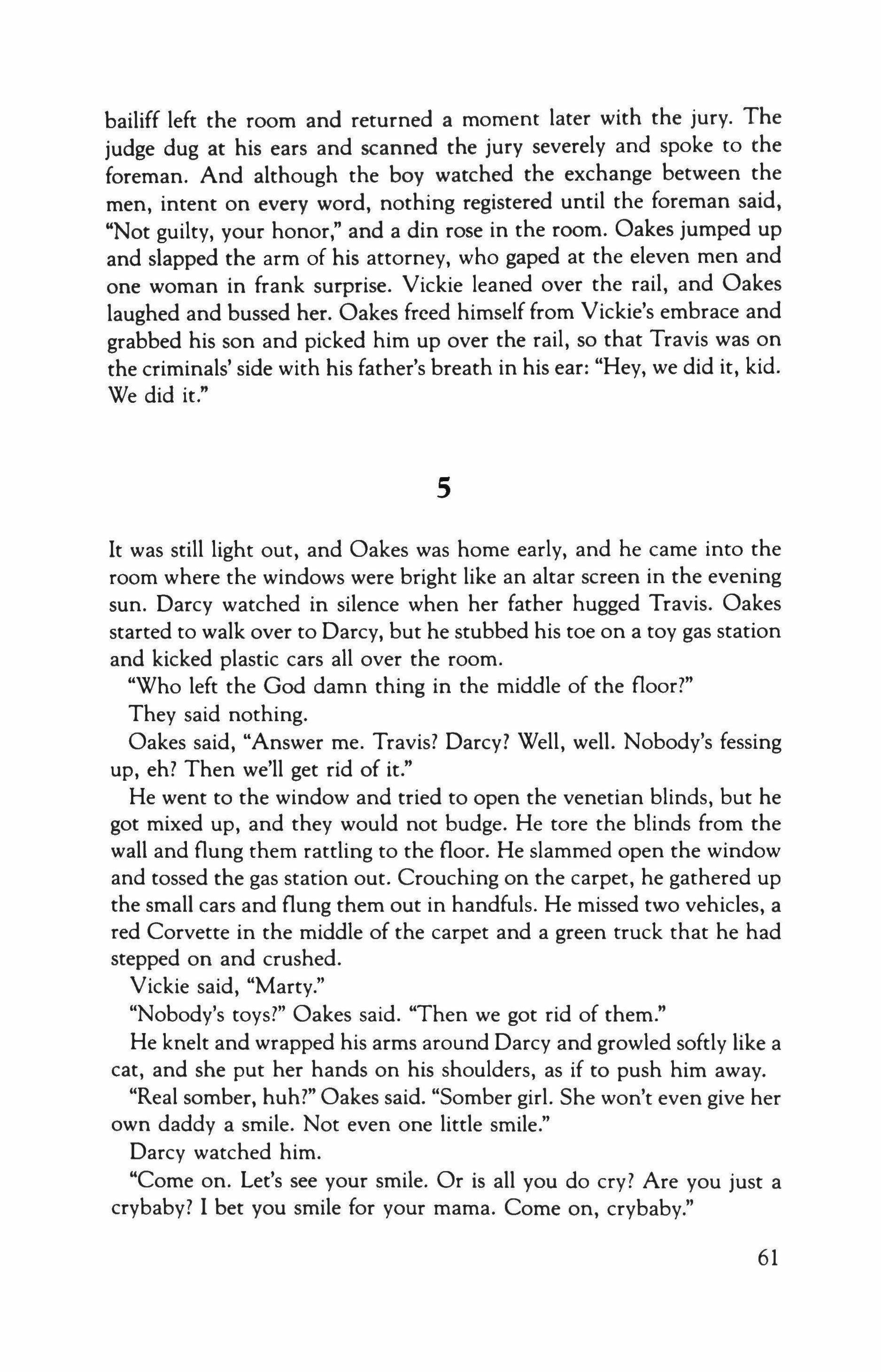
It was still light out, and Oakes was home early, and he came into the room where the windows were bright like an altar screen in the evening sun. Darcy watched in silence when her father hugged Travis. Oakes started to walk over to Darcy, but he stubbed his toe on a toy gas station and kicked plastic cars all over the room.
"Who left the God damn thing in the middle of the floor?"
They said nothing.
Oakes said, "Answer me. Travis? Darcy? Well, well. Nobodv's fessing up, eh? Then we'll get rid of it."
He went to the window and tried to open the venetian blinds, but he got mixed up, and they would not budge. He tore the blinds from the wall and flung them rattling to the floor. He slammed open the window and tossed the gas station out. Crouching on the carpet, he gathered up the small cars and flung them out in handfuls. He missed two vehicles, a red Corvette in the middle of the carpet and a green truck that he had stepped on and crushed.
Vickie said, "Marty."
"Nobody's toys?" Oakes said. "Then we got rid of them."
He knelt and wrapped his arms around Darcy and growled softly like a cat, and she put her hands on his shoulders, as if to push him away.
"Real somber, huh?" Oakes said. "Somber girl. She won't even give her own daddy a smile. Not even one little smile."
Darcy watched him.
"Come on. Let's see your smile. Or is all you do cry? Are you just a crybaby? I bet you smile for your mama. Come on, crybaby."
5
61
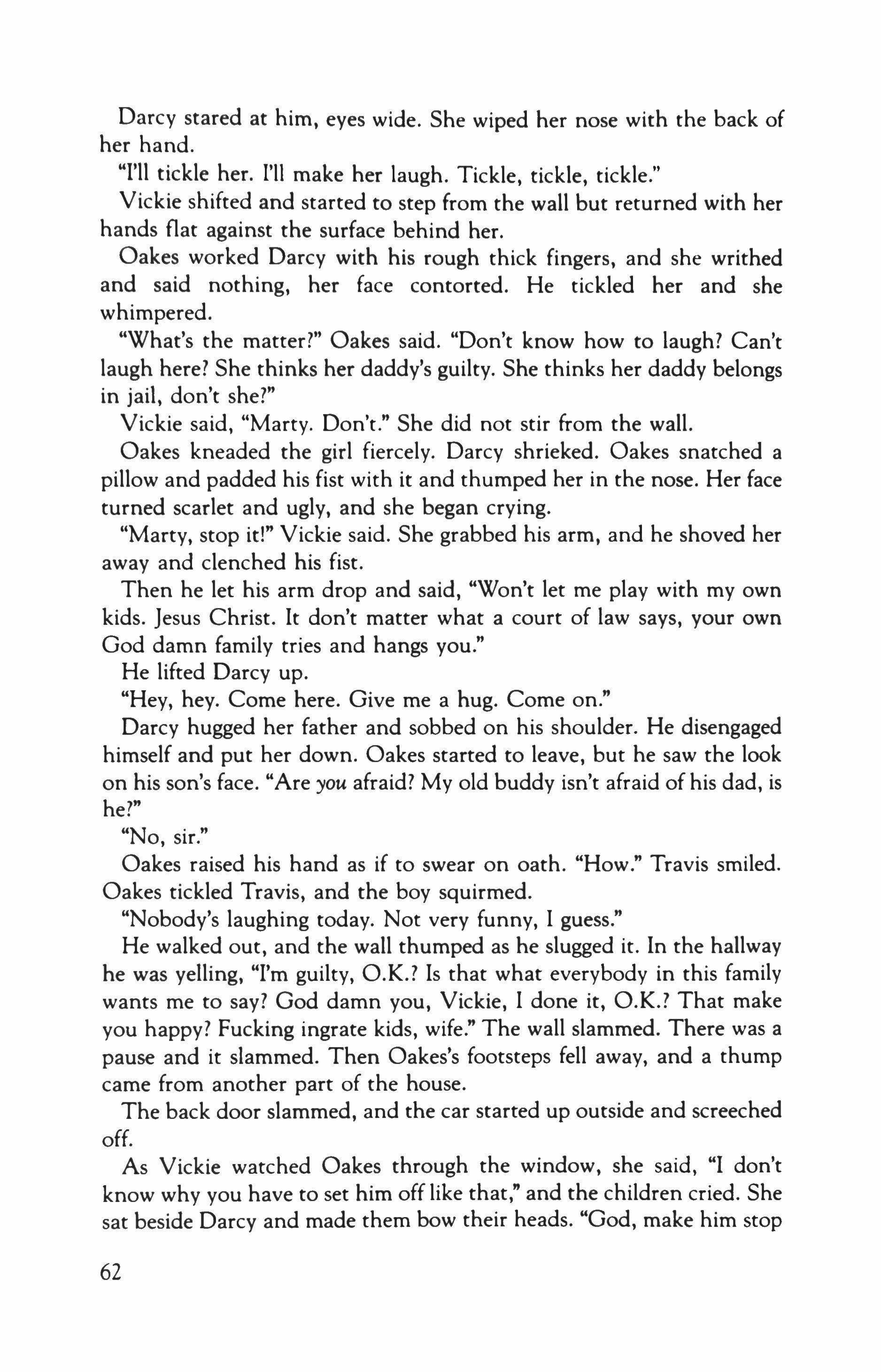
Darcy stared at him, eyes wide. She wiped her nose with the back of her hand.
"I'll tickle her. I'll make her laugh. Tickle, tickle, tickle."
Vickie shifted and started to step from the wall but returned with her hands flat against the surface behind her.
Oakes worked Darcy with his rough thick fingers, and she writhed and said nothing, her face contorted. He tickled her and she whimpered.
"What's the matter?" Oakes said. "Don't know how to laugh? Can't laugh here? She thinks her daddy's guilty. She thinks her daddy belongs in jail, don't she?"
Vickie said, "Marty. Don't." She did not stir from the wall.
Oakes kneaded the girl fiercely. Darcy shrieked. Oakes snatched a pillow and padded his fist with it and thumped her in the nose. Her face turned scarlet and ugly, and she began crying.
"Marty, stop it!" Vickie said. She grabbed his arm, and he shoved her away and clenched his fist.
Then he let his arm drop and said, "Won't let me play with my own kids. Jesus Christ. It don't matter what a court of law says, your own God damn family tries and hangs you."
He lifted Darcy up.
"Hey, hey. Come here. Give me a hug. Come on."
Darcy hugged her father and sobbed on his shoulder. He disengaged himself and put her down. Oakes started to leave, but he saw the look on his son's face. "Are you afraid? Myoid buddy isn't afraid of his dad, is he?"
"No, sir."
Oakes raised his hand as if to swear on oath. "How." Travis smiled. Oakes tickled Travis, and the boy squirmed.
"Nobodv's laughing today. Not very funny, I guess."
He walked out, and the wall thumped as he slugged it. In the hallway he was yelling, "I'm guilty, O.K.? Is that what everybody in this family wants me to say? God damn you, Vickie, I done it, O.K.? That make you happy? Fucking ingrate kids, wife." The wall slammed. There was a pause and it slammed. Then Oakes's footsteps fell away, and a thump came from another part of the house.
The back door slammed, and the car started up outside and screeched off.
As Vickie watched Oakes through the window, she said, "I don't know why you have to set him off like that," and the children cried. She sat beside Darcy and made them bow their heads. "God, make him stop
62

it," Travis prayed. "Make him stop punching Mom and Darcy, and tickling us and everything. Make him go away." Vickie's face stiffened, and she put her fingers on Travis's lips and said, "Shh. Don't say that. He's your father." Darcy kept crying quietly through the prayer time until Vickie said, "That's enough. Now shut up!" and Darcy lapsed into indignant silence.
But Travis insisted, "Why is he like that?"
"Don't ask that. He's your father."
"Why does he have to do stuff to us?"
"It's hard for him after the trial. Everybody thinks- He doesn't have any friends anymore."
"I still don't see why."
"Why?" said Darcy, repeating it mindlessly as a mantra. "Why, why, why?"
"You two be quiet and go to your room and get ready for bed or I'll paddle you good. Not one peep."
Vickie was already in her nightgown with the sleeves pushed up around her elbows, and through the fabric the boy could see the peaks ofher nipples, the indentation of her navel, a dark triangle of pubic hair. When she leaned over to hug Darcy, her nightgown hung open at the neck, revealing her breasts to him. She stared blankly at her son, then noticed his stare and glanced away.
"You worry me," she said. "I don't trust that look in your eye."
That night the boy could not sleep, and he tried to recall the dream of the beach and riding bikes with his father, but it would not come. He rose and wandered around the lightless house, weaving through the ghostly forms of stuffed chairs as if guided by an innate recognition: this couch, this footrest, this hallway where I must turn by instinct as I make my way through the swinging door, these fiber-edged fist holes where Dad was punching tonight, this life predicted in advance, foretold action by action, somewhere distant, engraved on the scepter of God. In the kitchen he climbed on the counter next to the sink and knelt in the droplets of cold water that soaked through his pajamas. The tile hurt his knees. He opened the small cupboard that ran along the ceiling above the sink, and surveyed the collection of bottles by the moonlight through the window. There were two tones of drink at night: gray and clear. The brandy would taste sweet, but there was only a thin syrup dried on the bottom of the bottle. His mother had noticed the last time he drank the Irish cream, and had blamed his father, though not to his face. Travis picked up the bottle, the body, the torso, and longed for the
63

smooth cool sticky liqueur. He nearly dropped it in the sink and kept himself from gasping in the rush of horror that followed. He shoved the bottle back in the cupboard. Then he found, hidden in the dark at the back of the shelf against the wall, the bourbon, which Oakes drank in such quantities he never noticed anything was missing. The boy hopped down and opened another cupboard and got out a cup, the one, he could tell by the shape, that bore the legend, "Thou shalt not bullshit," He poured himself a shot and turned on the tap and ran the water over his wrist until it was icy, then added some to the drink.
Whispering, "Rap," stuck on the syllable, unable to move on: "Rap."
64
Good Samaritans
R. D. Skillings
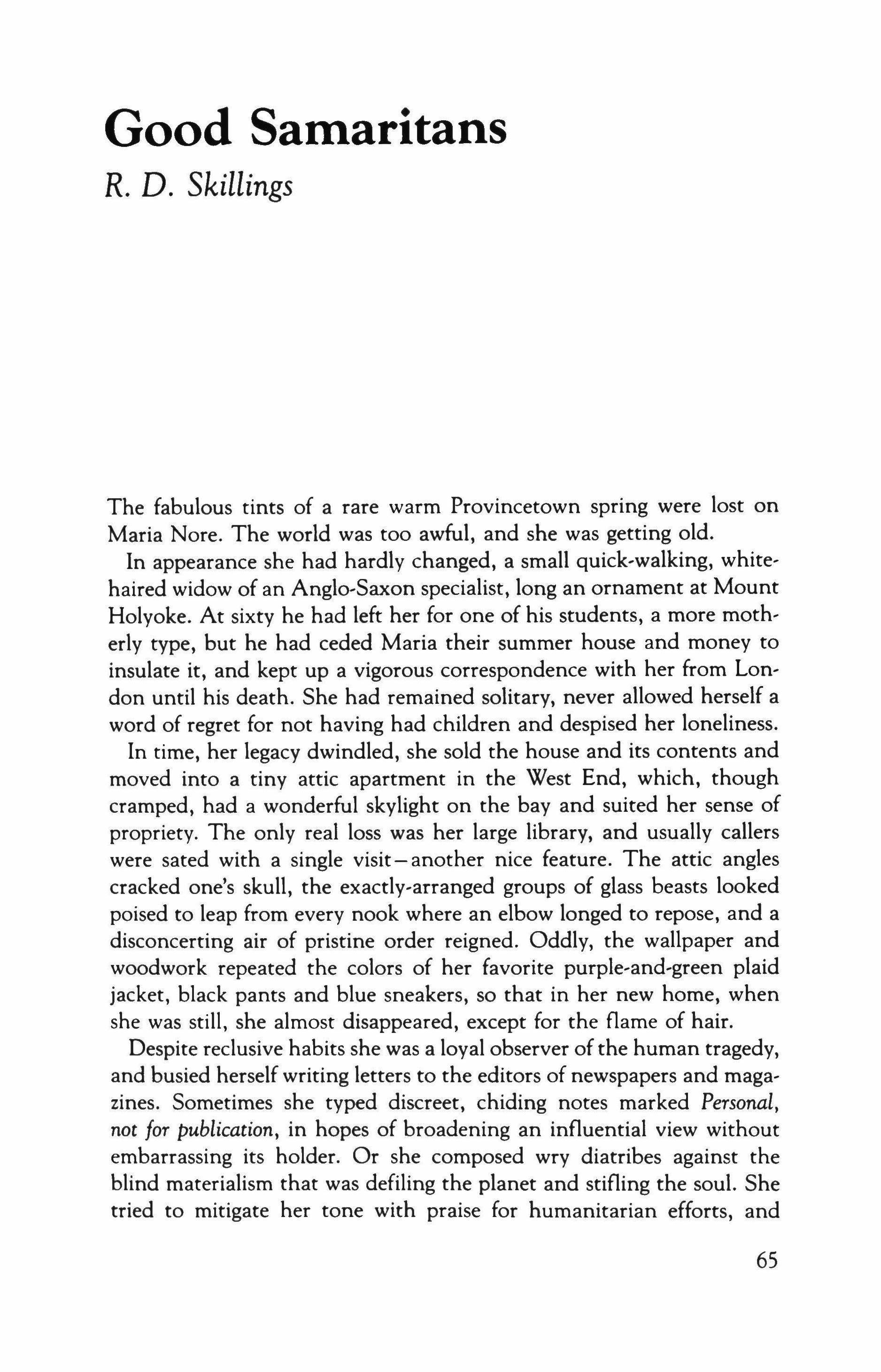
The fabulous tints of a rare warm Provincetown spring were lost on Maria Nore. The world was too awful, and she was getting old.
In appearance she had hardly changed, a small quick-walking, whitehaired widow of an Anglo-Saxon specialist, long an ornament at Mount Holyoke. At sixty he had left her for one of his students, a more motherly type, but he had ceded Maria their summer house and money to insulate it, and kept up a vigorous correspondence with her from London until his death. She had remained solitary, never allowed herself a word of regret for not having had children and despised her loneliness. In time, her legacy dwindled, she sold the house and its contents and moved into a tiny attic apartment in the West End, which, though cramped, had a wonderful skylight on the bay and suited her sense of propriety. The only real loss was her large library, and usually callers were sated with a single visit-another nice feature. The attic angles cracked one's skull, the exactly-arranged groups of glass beasts looked poised to leap from every nook where an elbow longed to repose, and a disconcerting air of pristine order reigned. Oddly, the wallpaper and woodwork repeated the colors of her favorite purple-and-green plaid jacket, black pants and blue sneakers, so that in her new home, when she was still, she almost disappeared, except for the flame of hair.
Despite reclusive habits she was a loyal observer of the human tragedy, and busied herself writing letters to the editors of newspapers and magazines. Sometimes she typed discreet, chiding notes marked Personal, not for publication, in hopes of broadening an influential view without embarrassing its holder. Or she composed wry diatribes against the blind materialism that was defiling the planet and stifling the soul. She tried to mitigate her tone with praise for humanitarian efforts, and
65

always ended by expressing faith in the clear-eyed internationalist youth of the day.
Seldom to be met on the street without some somber periodical demurely but firmly pressed to her heart, she would intercept one, no matter one's rush, and laying the tips of her fingers upon one's wrist would spin forth her day's alarm-the nuclear doom, the dying seas, the plight of minorities - always starting, in a little girl's voice, with the plaintive, plangent phrase, "One simply doesn't know what one ought to do."
Like stones thrown in a pond, her words rippled out till the whole surface was agitated. She went from one catastrophic topic to the next as though bedeviled, and once caught it was nearly impossible to escape, for she had a way of fixing your eye - the issues were serious, after all, and she was eloquent-speaking so urgently that it seemed wrong to walk off in medias res, yet no end ever came.
"She'll chew your ear to a bloody pulp!" an old friend once exclaimed in a bad moment, then made amends next time they met by standing blandly in the rain for half an hour while she lamented the victims of religious strife in Sri Lanka.
Spring for Maria, despite its renewals, was always a sort of halting entrance into exile. The growing weekend tourist hordes and awakening sybaritic world isolated her. She loved the bleak winters, the rain, mists and wind, the casual meeting of friends on the street; but at length the sun got stronger, the town swarmed and familiar faces disappeared, lost in making money. An annual milestone along this road in late May was the removal of the coffee table from the Odd Item Grocery, where the neighborhood women gossip in the off-season.
Maria was reading the papers and having her afternoon tea for the last time, acutely minding her imminent expulsion, for the place provided a cozy respite halfway to and from town, and company in small doses.
The day's papers were not unusual-certainly there was no good news- but they somehow brought her to tears. Wars, famine, refugees, racism, sexism, classism, rape, murder, robbery, and in Colorado a derelict who reported being taken aboard a spaceship, transmuted into another dimension and shown a godlike civilization of robots.
The tears drenched Maria's cheeks and blinded her. She choked down an urge to scream, took off her glasses, blotted her face with one sleeve, put aside the Times, Globe and Monitor, and with grim pertinacity began to scan the Cape Journal-thinking that here at least things were not so bad-and met the exhilarating sight of her latest letter to the editor, her only effort of the last month, entirely forgotten in her general dismay.
66
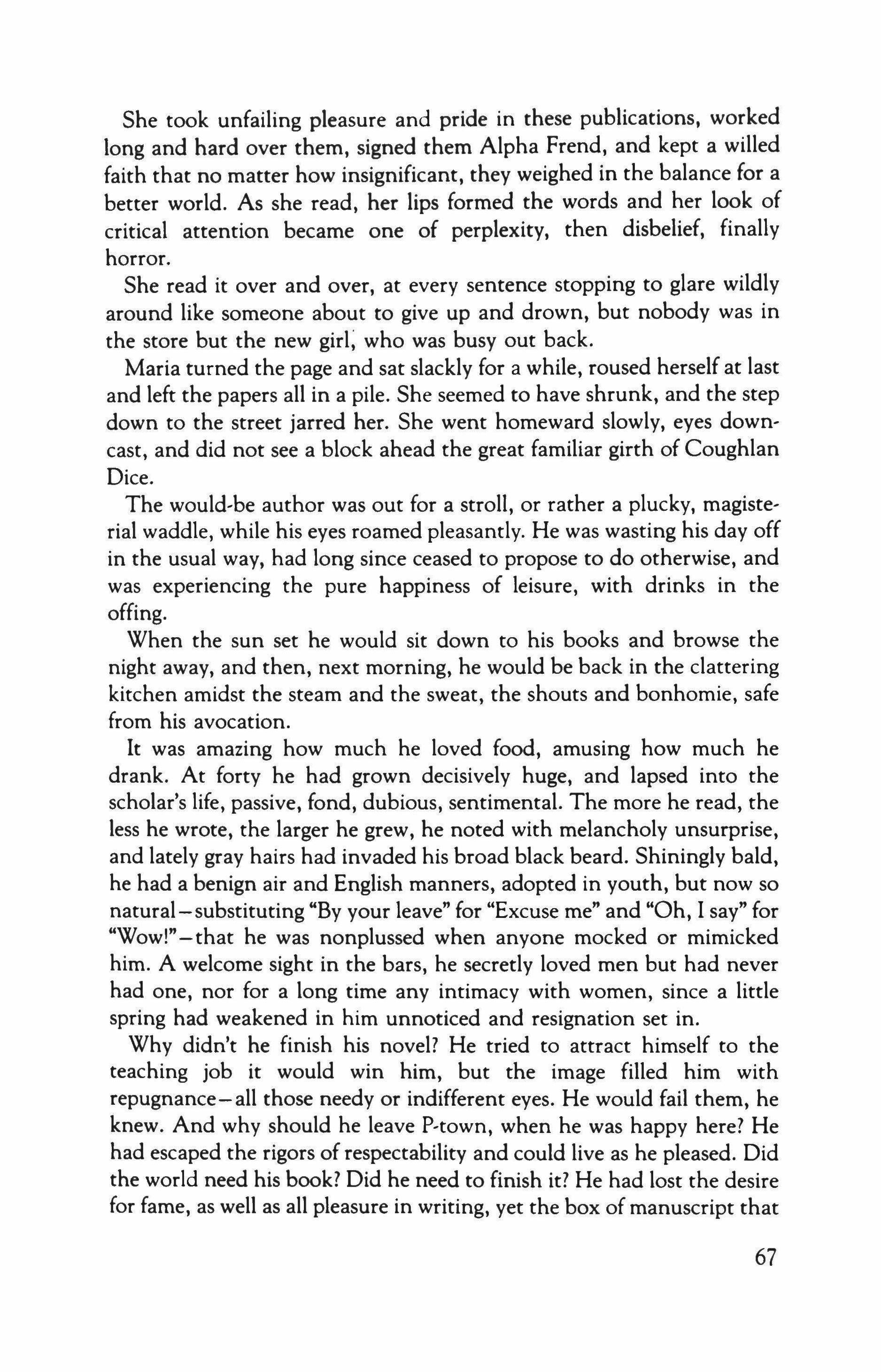
She took unfailing pleasure and pride in these publications, worked long and hard over them, signed them Alpha Frend, and kept a willed faith that no matter how insignificant, they weighed in the balance for a better world. As she read, her lips formed the words and her look of critical attention became one of perplexity, then disbelief, finally horror.
She read it over and over, at every sentence stopping to glare wildly around like someone about to give up and drown, but nobody was in the store but the new girl; who was busy out back.
Maria turned the page and sat slackly for a while, roused herself at last and left the papers all in a pile. She seemed to have shrunk, and the step down to the street jarred her. She went homeward slowly, eyes downcast, and did not see a block ahead the great familiar girth of Coughlan Dice.
The would-be author was out for a stroll, or rather a plucky, magisterial waddle, while his eyes roamed pleasantly. He was wasting his day off in the usual way, had long since ceased to propose to do otherwise, and was experiencing the pure happiness of leisure, with drinks in the offing.
When the sun set he would sit down to his books and browse the night away, and then, next morning, he would be back in the clattering kitchen amidst the steam and the sweat, the shouts and bonhomie, safe from his avocation.
It was amazing how much he loved food, amusing how much he drank. At forty he had grown decisively huge, and lapsed into the scholar's life, passive, fond, dubious, sentimental. The more he read, the less he wrote, the larger he grew, he noted with melancholy unsurprise, and lately gray hairs had invaded his broad black beard. Shiningly bald, he had a benign air and English manners, adopted in youth, but now so natural-substituting "By your leave" for "Excuse me" and "Oh, I say" for "Wow!"-that he was nonplussed when anyone mocked or mimicked him. A welcome sight in the bars, he secretly loved men but had never had one, nor for a long time any intimacy with women, since a little spring had weakened in him unnoticed and resignation set in.
Why didn't he finish his novel? He tried to attract himself to the teaching job it would win him, but the image filled him with repugnance-all those needy or indifferent eyes. He would fail them, he knew. And why should he leave P#town, when he was happy here? He had escaped the rigors of respectability and could live as he pleased. Did the world need his book? Did he need to finish it? He had lost the desire for fame, as well as all pleasure in writing, yet the box of manuscript that
67
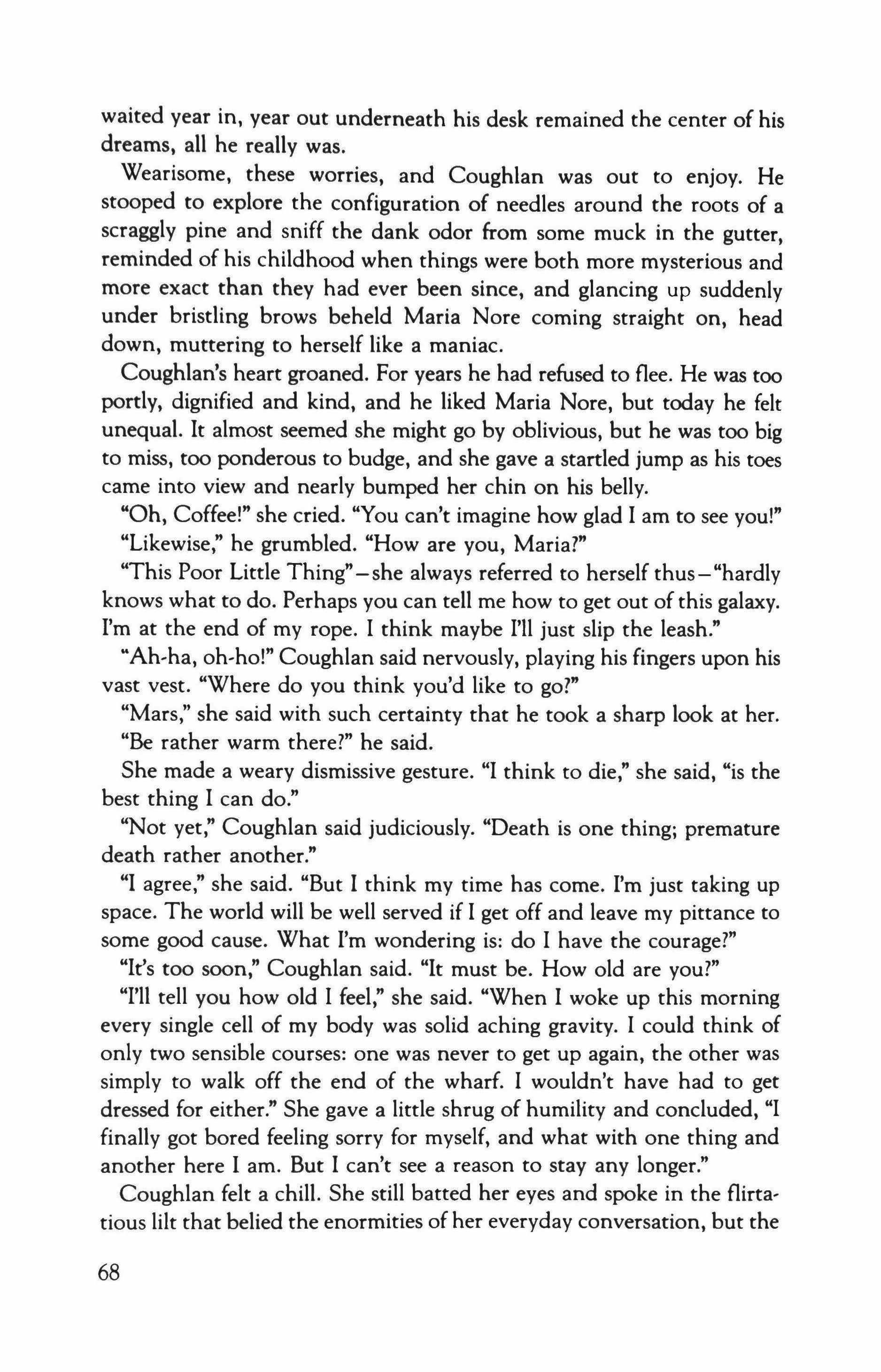
waited year in, year out underneath his desk remained the center of his dreams, all he really was.
Wearisome, these worries, and Coughlan was out to enjoy. He stooped to explore the configuration of needles around the roots of a scraggly pine and sniff the dank odor from some muck in the gutter, reminded of his childhood when things were both more mysterious and more exact than they had ever been since, and glancing up suddenly under bristling brows beheld Maria Nore coming straight on, head down, muttering to herself like a maniac.
Coughlan's heart groaned. For years he had refused to flee. He was too portly, dignified and kind, and he liked Maria Nore, but today he felt unequal. It almost seemed she might go by oblivious, but he was too big to miss, too ponderous to budge, and she gave a startled jump as his toes came into view and nearly bumped her chin on his belly.
"Oh, Coffee!" she cried. "You can't imagine how glad I am to see you!"
"Likewise," he grumbled. "How are you, Maria?"
"This Poor Little Thing" - she always referred to herself thus - "hardly knows what to do. Perhaps you can tell me how to get out of this galaxy. I'm at the end of my rope. I think maybe I'll just slip the leash."
Ah-ha, oh-hol" Coughlan said nervously, playing his fingers upon his vast vest. "Where do you think you'd like to go?"
"Mars," she said with such certainty that he took a sharp look at her.
"Be rather warm there?" he said.
She made a weary dismissive gesture. "I think to die," she said, "is the best thing I can do."
"Not yet," Coughlan said judiciously. "Death is one thing; premature death rather another."
"I agree," she said. "But I think my time has come. I'm just taking up space. The world will be well served if I get off and leave my pittance to some good cause. What I'm wondering is: do I have the courage?"
"It's too soon," Coughlan said. "It must be. How old are you?"
"I'll tell you how old I feel," she said. "When I woke up this morning every single cell of my body was solid aching gravity. I could think of only two sensible courses: one was never to get up again, the other was simply to walk off the end of the wharf. I wouldn't have had to get dressed for either." She gave a little shrug of humility and concluded, "I finally got bored feeling sorry for myself, and what with one thing and another here I am. But I can't see a reason to stay any longer."
Coughlan felt a chill. She still batted her eyes and spoke in the flirtatious lilt that belied the enormities of her everyday conversation, but the
68
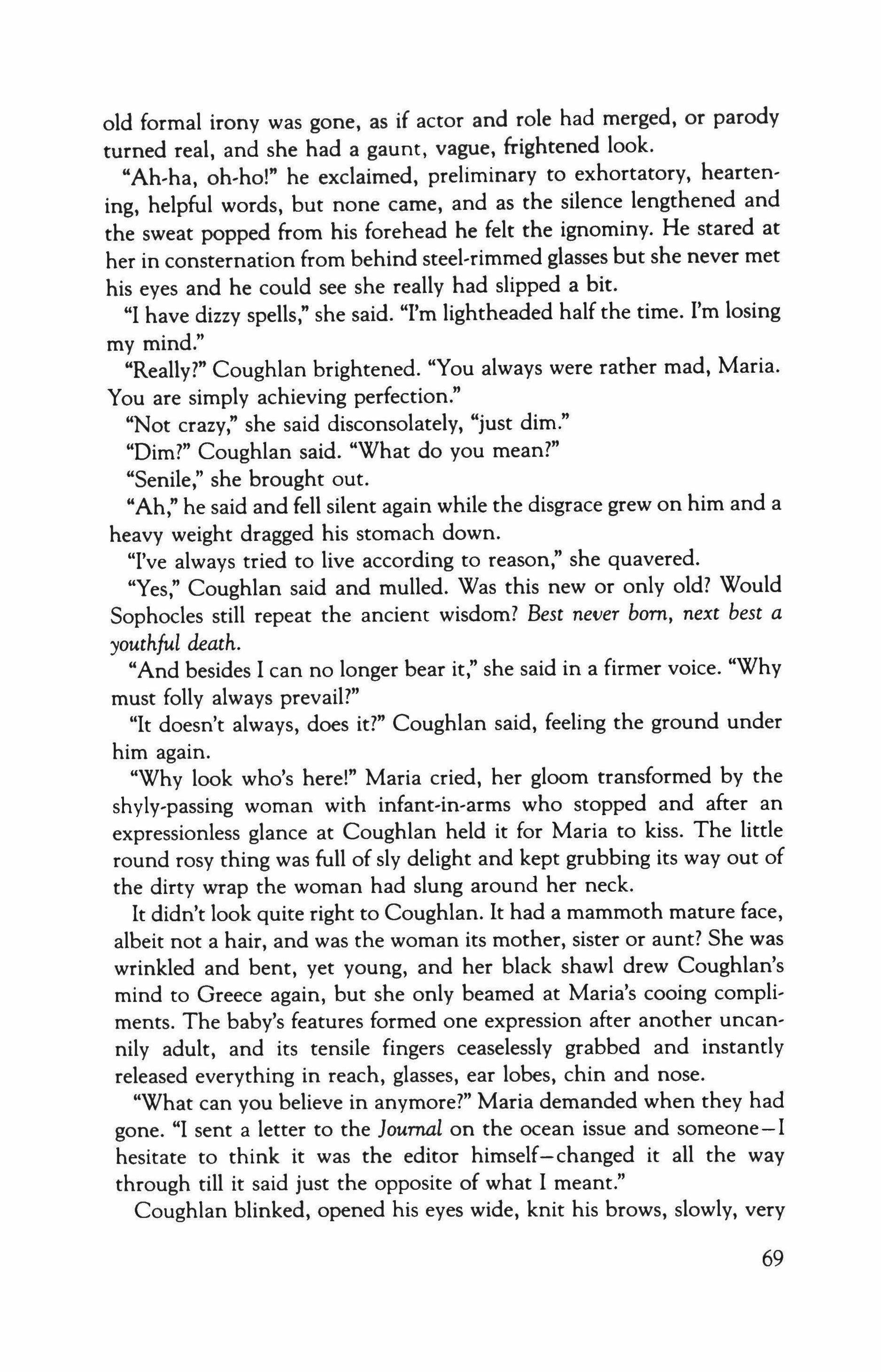
old formal irony was gone, as if actor and role had merged, or parody turned real, and she had a gaunt, vague, frightened look.
"Ah-ha, oh-hol" he exclaimed, preliminary to exhortatory, heartening, helpful words, but none came, and as the silence lengthened and the sweat popped from his forehead he felt the ignominy. He stared at her in consternation from behind steel-rimmed glasses but she never met his eyes and he could see she really had slipped a bit.
"I have dizzy spells," she said. "I'm lightheaded half the time. I'm losing my mind."
"Really?" Coughlan brightened. "You always were rather mad, Maria. You are simply achieving perfection."
"Not crazy," she said disconsolately, "just dim."
"Dim?" Coughlan said. "What do you mean?"
"Senile," she brought out.
"Ah," he said and fell silent again while the disgrace grew on him and a heavy weight dragged his stomach down.
"I've always tried to live according to reason," she quavered.
"Yes," Coughlan said and mulled. Was this new or only old? Would Sophocles still repeat the ancient wisdom? Best never born, next best a youthful death.
"And besides I can no longer bear it," she said in a firmer voice. "Why must folly always prevail?"
"It doesn't always, does it?" Coughlan said, feeling the ground under him again.
"Why look who's here!" Maria cried, her gloom transformed by the shyly-passing woman with infant-in-arms who stopped and after an expressionless glance at Coughlan held it for Maria to kiss. The little round rosy thing was full of sly delight and kept grubbing its way out of the dirty wrap the woman had slung around her neck.
It didn't look quite right to Coughlan. It had a mammoth mature face, albeit not a hair, and was the woman its mother, sister or aunt? She was wrinkled and bent, yet young, and her black shawl drew Coughlan's mind to Greece again, but she only beamed at Maria's cooing compliments. The baby's features formed one expression after another uncannily adult, and its tensile fingers ceaselessly grabbed and instantly released everything in reach, glasses, ear lobes, chin and nose.
"What can you believe in anymore?" Maria demanded when they had gone. "I sent a letter to the Journal on the ocean issue and someone-I hesitate to think it was the editor himself-changed it all the way through till it said just the opposite of what I meant."
Coughlan blinked, opened his eyes wide, knit his brows, slowly, very
69
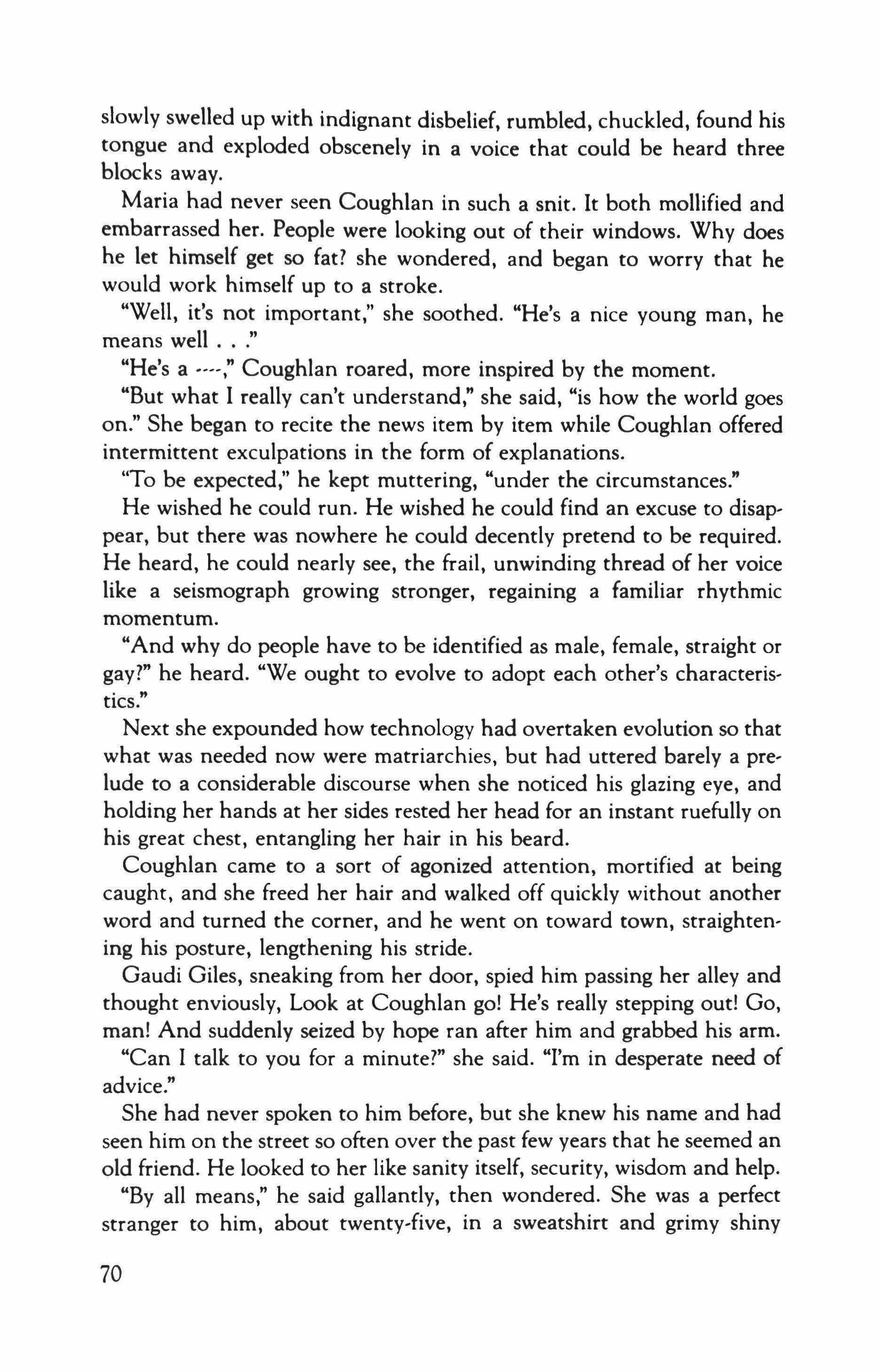
slowly swelled up with indignant disbelief. rumbled. chuckled. found his tongue and exploded obscenely in a voice that could be heard three blocks away.
Maria had never seen Coughlan in such a snit. It both mollified and embarrassed her. People were looking out of their windows. Why does he let himself get so fat? she wondered. and began to worry that he would work himself up to a stroke.
"Well. it's not important." she soothed. "He's a nice young man. he means well
"He's a ....• Coughlan roared. more inspired by the moment.
"But what I really can't understand." she said. "is how the world goes on." She began to recite the news item by item while Coughlan offered intermittent exculpations in the form of explanations.
"To be expected." he kept muttering. "under the circumstances."
He wished he could run. He wished he could find an excuse to disappear. but there was nowhere he could decently pretend to be required. He heard. he could nearly see. the frail. unwinding thread of her voice like a seismograph growing stronger. regaining a familiar rhythmic momentum.
"And why do people have to be identified as male. female. straight or gay?" he heard. "We ought to evolve to adopt each other's characteristics."
Next she expounded how technology had overtaken evolution so that what was needed now were matriarchies, but had uttered barely a prelude to a considerable discourse when she noticed his glazing eye. and holding her hands at her sides rested her head for an instant ruefully on his great chest, entangling her hair in his beard.
Coughlan came to a sort of agonized attention. mortified at being caught, and she freed her hair and walked off quickly without another word and turned the corner. and he went on toward town. straightening his posture. lengthening his stride.
Gaudi Giles. sneaking from her door. spied him passing her alley and thought enviously. Look at Coughlan go! He's really stepping out! Go, man! And suddenly seized by hope ran after him and grabbed his arm.
"Can I talk to you for a minute?" she said. "I'm in desperate need of advice."
She had never spoken to him before. but she knew his name and had seen him on the street so often over the past few years that he seemed an old friend. He looked to her like sanity itself. security, wisdom and help.
"By all means." he said gallantly. then wondered. She was a perfect stranger to him. about twenty-five, in a sweatshirt and grimy shiny
70
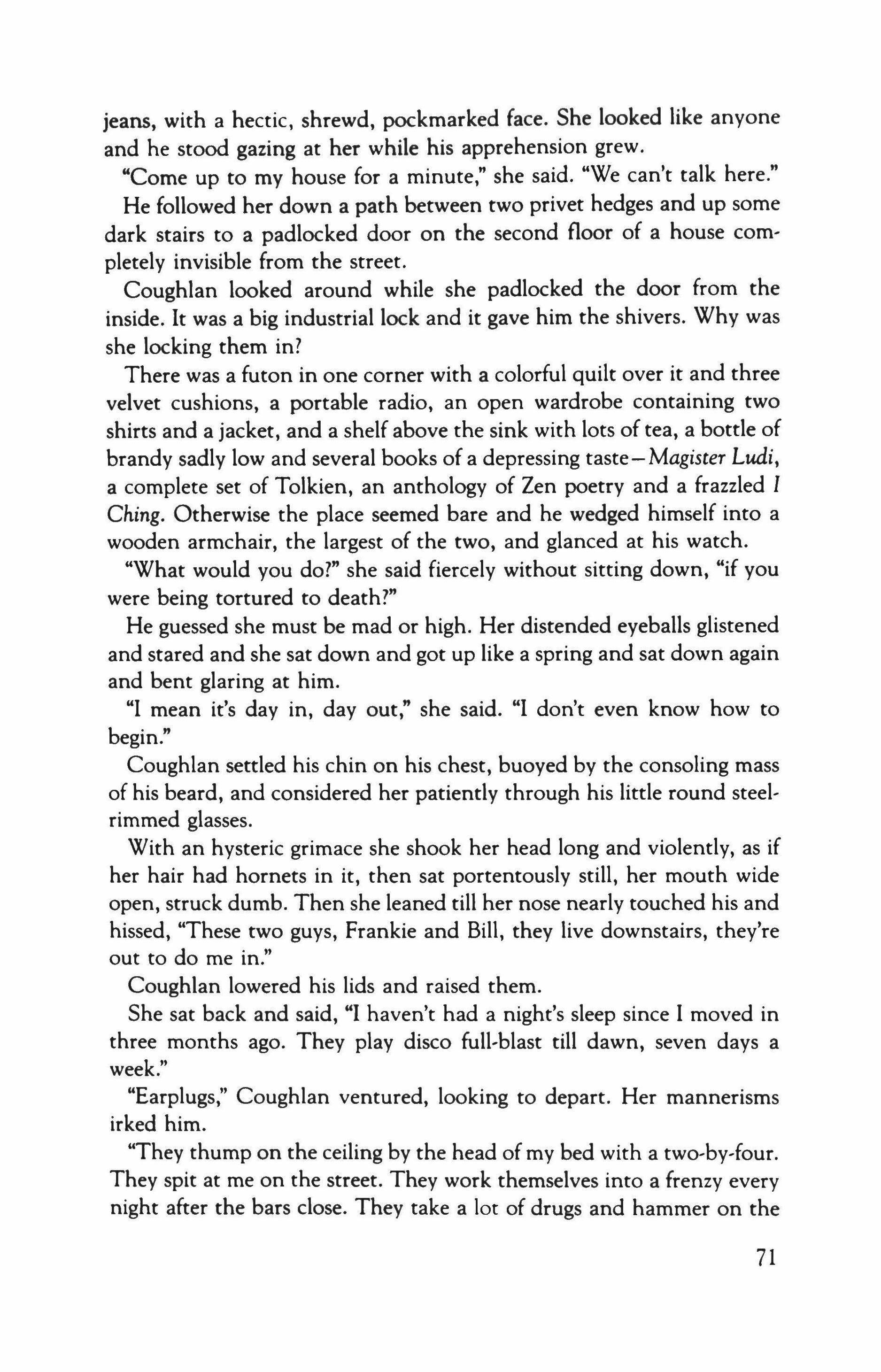
jeans, with a hectic, shrewd, pockmarked face. She looked like anyone and he stood gazing at her while his apprehension grew.
"Come up to my house for a minute," she said. "We can't talk here."
He followed her down a path between two privet hedges and up some dark stairs to a padlocked door on the second floor of a house completely invisible from the street.
Coughlan looked around while she padlocked the door from the inside. It was a big industrial lock and it gave him the shivers. Why was she locking them in?
There was a futon in one corner with a colorful quilt over it and three velvet cushions, a portable radio, an open wardrobe containing two shirts and a jacket, and a shelf above the sink with lots of tea, a bottle of brandy sadly low and several books of a depressing taste-Magister Ludi, a complete set of Tolkien, an anthology of Zen poetry and a frazzled I Ching. Otherwise the place seemed bare and he wedged himself into a wooden armchair, the largest of the two, and glanced at his watch.
"What would you do?" she said fiercely without sitting down, "if you were being tortured to death?"
He guessed she must be mad or high. Her distended eyeballs glistened and stared and she sat down and got up like a spring and sat down again and bent glaring at him.
"I mean it's day in, day out," she said. "I don't even know how to begin."
Coughlan settled his chin on his chest, buoyed by the consoling mass of his beard, and considered her patiently through his little round steelrimmed glasses.
With an hysteric grimace she shook her head long and violently, as if her hair had hornets in it, then sat portentously still, her mouth wide open, struck dumb. Then she leaned till her nose nearly touched his and hissed, "These two guys, Frankie and Bill, they live downstairs, they're out to do me in."
Coughlan lowered his lids and raised them.
She sat back and said, "I haven't had a night's sleep since I moved in three months ago. They play disco full-blast till dawn, seven days a week."
"Earplugs," Coughlan ventured, looking to depart. Her mannerisms irked him.
"They thump on the ceiling by the head of my bed with a two-by-four. They spit at me on the street. They work themselves into a frenzy every night after the bars close. They take a lot of drugs and hammer on the
71

pipes and yell threats. One of them has a gun, he showed it to me. I mean their main occupation is terrorizing me."
"Why?" Coughlan said, taken aback.
"I have no idea," she said. "I went down the first night and knocked. I intended only the friendliest of complaints, but they both squeezed into the doorway with looks of such diabolical malice I could hardly speak."
"And then?" Coughlan said reluctantly.
"My whole life became a phantasmagoria," she said. "They slashed my bicycle tires, they threw firecrackers at my dog that was dying, they broke in when I went away for a few days, and stole my liquor and dope and defecated on my pillow. They howl when they catch me in the hall."
"Perhaps you require the assistance of the law," he said.
"Ah, yes, the police," Gaudi said. "They've been here a dozen times. Frankie and Bill are great actors, they always seem to be asleep when the police arrive. They deny everything.
"I even had them before the magistrate. They showed up with this loud lawyer, my landlord and his wife, who are friends of theirs, plus three other witnesses I'd never even seen before. They claimed I was psychotic, that it was me who was the troublemaker.
"The magistrate couldn't figure it out, but he finally issued a restrain' ing order, which they trampled on the steps when we got back from court, unfortunately at the very same moment.
"They wouldn't let me in the house so I ran straight to the nearest phone booth, but they went indoors and got their call in to the police first and said I'd threatened them with a knife.
"So the cops came, I demanded they arrest them. Frankie and Bill were saying it was all my fault. I was enraged at the police, I yelled, 'You feeble fucking assholes!' You know they never would have let that go on if I was a townie. I demanded my rights, they didn't like my yelling at them either. Finally they just gave up and walked off. It was too much for them. Now they hate the sight of me, they keep having to come over, but nothing happens. One of them said, 'If you repeat this in court I'll deny I ever said it, but you should get someone to beat them up.'''
"Who are these people?" Coughlan said, not quite believing her.
"Slime Eyes and Diarrhea Face, I call them," she asserted grimly. "They're gay, they used to be pretty but they're getting wizened fast. And they're madly jealous. If one of them even glances at another man there's such a row when they get home that the whole house shakes and next day you see them limping or bandaged or bruised. They're about
72

thirty but they've still got all their adolescent energy. They're like some kind of horrid twins."
"What purpose have they in tormenting you?" Coughlan wondered, and felt a twinge of fear that two such monsters might well be right downstairs.
"I truly think it's because I'm an independent woman," Gaudi said. "I tried to make friends with them right after that first night. 1 even invited them for tea but they just came up and prowled around and left. They never spoke one word."
"Pleasant fellows," Coughlan allowed.
"If you only knew how many bored or indifferent or useless men I've told this to!" she exclaimed. "Nobody cares a damn really."
"You decline to move," Coughlan surmised, surveying the compact space and airy windows.
"Cor-rect!" she said. "I've been camping in dumps for years waiting for a decent year-round place 1 could afford. 1 love this place. I called the landlord even before I called the police. He said he couldn't believe anything like that about Frankie and Bill. They're both extremely wellmannered, they can be completely charming. Maybe they're all in cahoots. The landlord used to be gay, 1 happen to know. His wife's a nut. The day 1 moved in here 1 thought I'd made it into heaven."
"Splendid flat," Coughlan agreed. It looked as if the artist Himbal Washnez had lived in it. The bare board walls were coliaged with polished bits of furniture, banisters, fishing gear, machine parts and the like - the fascination grew on him as he gazed.
"I was really just getting into my drawing," she averred, opening her sketchbook. "That's the worst thing of all, the timing of this. 1 know I could do it now-there's great vibes here-if it weren't for S.E. and D.F. down there."
"Resident Porlockians," Coughlan murmured.
"Would you like a smoke, perchance?" she said. "I have just about a joint of fine Colombian Gold."
Coughlan didn't favor pot; it tended to rattle him. He would have liked the brandy but there was so little he was loath to ask.
Deftly she rolled a needle-thin joint, leaving not a fleck in her tin box with its two kinds of papers and hash pipe; he meanwhile leafed through her novice's drawings, untutored, trite female faces, sexy figures and fuzzy dune-scapes.
They duly smoked the dope down to a last fingertip of ash, each glancing out a different window, while they rested and took stock. She
73

craved the safety of company. He was wondering how to leave, and what to say.
"Could your father be of use?" he tried.
She shook her head. "All my family have disowned each other."
"Just as well," Coughlan sighed, "oft as not."
He began to stand but found he was stuck in his chair, and after several clandestine efforts to free himself relapsed and gazed at the walls.
"I also write poetry," she said.
Coughlan warily received the notebook she handed him and skimmed some pages. She was no poet though the surrounding doodles were luxuriant and rich, and he studied them while pretending to read. Then he tried to get up again, pushing down on the arms of the chair.
"I hope you like them," she said. "I like sharing them with people."
A guilty monstrous sense of his own pathos quelled any polite response. Not only was he not at his desk where he belonged, he was not even outdoors imbibing the balmy, blooming air. How far he had imperceptibly gone from his own innocence and vows this strange girl's illusions reminded him, and he felt how tricky life was, how ugly and unfair.
"Weill," he finally expelled in a great bluff sigh, "I wish you luck with your muse. Myself must sally forth into the realms of day," and he struggled once more with the ever-clasping chair, getting loose at last only with her help.
He made his careful panicky way down the dark stairs, still calling You're Welcomes to her cascade of thanks for coming up, for listening to her woes, the unvoiced question heavy in every silence, till the outside door closed on his heels.
What could he do, after all? He was relieved to be back on the street, and it was only 3:30, a good hour to belly up to the bar at the Corporal Bisbrane. He went onwards, puffing with vexation.
Frankie and Bill were slumbering in their bedroom. The Hulk and Sharlane lounged on the living-room couch half-dressed, still groggy from the night before. Nineteen, they were staying with Frankie and Bill while they tried to decide whether to get a place in P-town or go on to Santa Fe in the Hulk's van.
"They're a couple of cool queers all right," the Hulk repeated, thinking this time of their supply of Quaaludes.
"They're letting us stay here free, remember," Sharlane reproved. She had grown up with Frankie's younger brother in North Andover.
"So what? They're still queer," said the Hulk, who came honestly by
74

his name, straight from the comics, movies and TV. He was massive, clumsy and shambling, with overhanging black hair and impassive eyes, sloping shoulders and soft luminous white skin like a woman's. He was too smart for school, but didn't want to learn anything. He had been watching with interest Frankie and Bill's war on Gaudi. "Because she's a bitch!" they had explained to Sharlane.
"You ought to rape her," the Hulk had said, and laughed to see the revulsion on Frankie and Bill's faces. He himself had caught several glimpses of Gaudi and had got a hard-on from thinking about her upstairs all alone.
Sharlane was a working-class tomboy and called herself the Hulk's sidekick. When they first met he had carried her everywhere for months effortlessly, uncomplainingly, proudly, while her leg was in a cast. She had to use crutches only when he was out of earshot, and one night he had carried her a mile through the woods to a beach party and back. It had nearly killed him but she had wanted to go real bad. "For me he's a pussycat," she told her friends.
Now that she could walk by herself, Sharlane no longer liked the Hulk so much. He had the van and the money his father had given him to see the country with before finding a job-but he had begun to go berserk when he drank. It was like following a tornado, and the odd thing was he never seemed mad. Only a week ago he had sawed down a row of fir trees in front of the house they were staying next to in Orleans. Luckily no one was home and they were leaving anyway.
"I figure it's art," was all the Hulk would say. He could do ludes or coke or smack or LSD even maybe and nooo problem, but not gin and beer. Last night though he had been fine, grooving on Frankie and Bill, who brought some wine when they came back from dancing at the B,Room, and then laid open their medicine chest.
Sharlane yawned around the dark plush fastidious apartment with its bluish lighting and not a beam of sun. "Want to go out?" she said, but he didn't. Lately all he cared about was partying. She made her way bare' foot down to the beach. The summerish stillness disturbed her. The air was cooling, the sand was cold, and the swollen bay, just at dead high tide, for a moment glowed like gold. I should have been here at noon, she thought with disgust, and turned back to try to make the Hulk come for a walk, but stopped to watch a cat and dog that were tensed to spring, glaring, noses nearly touching through the chain link fence between them.
"Go to it!" yelled a boy on a bicycle, grinning at Sharlane. Not a tooth
75
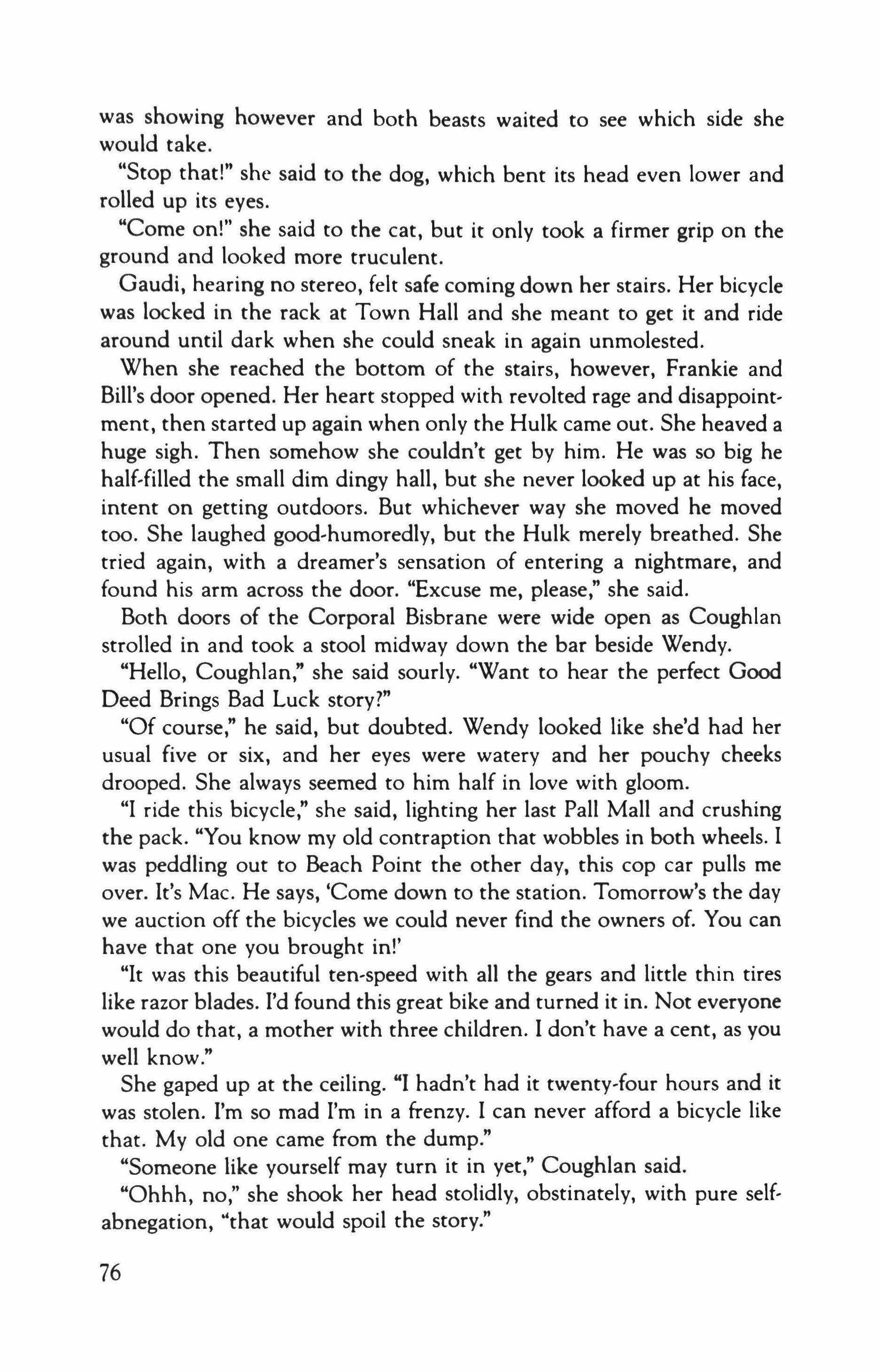
was showing however and both beasts waited to see which side she would take.
"Stop that!" she said to the dog, which bent its head even lower and rolled up its eyes.
"Come on!" she said to the cat, but it only took a firmer grip on the ground and looked more truculent.
Gaudi, hearing no stereo, felt safe coming down her stairs. Her bicycle was locked in the rack at Town Hall and she meant to get it and ride around until dark when she could sneak in again unmolested.
When she reached the bottom of the stairs, however, Frankie and Bill's door opened. Her heart stopped with revolted rage and disappointment, then started up again when only the Hulk came out. She heaved a huge sigh. Then somehow she couldn't get by him. He was so big he half-filled the small dim dingy hall, but she never looked up at his face, intent on getting outdoors. But whichever way she moved he moved too. She laughed good-hurnoredly, but the Hulk merely breathed. She tried again, with a dreamer's sensation of entering a nightmare, and found his arm across the door. "Excuse me, please," she said.
Both doors of the Corporal Bisbrane were wide open as Coughlan strolled in and took a stool midway down the bar beside Wendy.
"Hello, Coughlan," she said sourly. "Want to hear the perfect Good Deed Brings Bad Luck story?"
"Of course," he said, but doubted. Wendy looked like she'd had her usual five or six, and her eyes were watery and her pouchy cheeks drooped. She always seemed to him half in love with gloom.
"I ride this bicycle," she said, lighting her last Pall Mall and crushing the pack. "You know myoid contraption that wobbles in both wheels. I was peddling out to Beach Point the other day, this cop car pulls me over. It's Mac. He says, 'Come down to the station. Tomorrow's the day we auction off the bicycles we could never find the owners of. You can have that one you brought in!'
"It was this beautiful ten-speed with all the gears and little thin tires like razor blades. I'd found this great bike and turned it in. Not everyone would do that, a mother with three children. I don't have a cent, as you well know."
She gaped up at the ceiling. "I hadn't had it twenty-four hours and it was stolen. I'm so mad I'm in a frenzy. I can never afford a bicycle like that. Myoid one came from the dump."
"Someone like yourself may turn it in yet," Coughlan said.
"Ohhh, no," she shook her head stolidly, obstinately, with pure selfabnegation, "that would spoil the story."
76

The Hulk wouldn't let Gaudi go. He didn't speak but kept his mouth open and breathed evenly, audibly, in and out. She nearly whispered for fear of waking Frankie and Bill, who seemed somehow to have spawned a monster.
"What right do you have to keep me here?" she hissed.
He almost smiled, as always surprised at people's assumptions. He wondered how long it would take her to learn about rights. He had no plans exactly, just a vague notion to capture her for a while and give her a bad time.
When she tried to get past him by force he grabbed her and threw her bruisingly against the stairs, where she stayed half-crouching. Now, he thought, I'll train her to love me.
Wendy had lapsed into thought. Coughlan looked around uncomfortably; the beer burned his stomach. He resolved to smoke no more pot, which always darkened his view and nerved him up. Outside the day had barely started down, but something drab and grim overlay his reflections and the sociable pleasures of the bar were not yet at hand, it still being a bit early.
Two boys were playing pool and again and again Coughlan's eyes sought their buttocks and intent faces. These longings shook him with despair and he emptied his mug and decided that food might help.
As he crossed Lopes Square he saw Sadie Rush sashaying between bars, her face ablaze with sexual delight. "Ooh-weeh!" she called, giving him a giddy little lurch of her hips, "watch out for this weather!"
He produced a grunt and entered the Warfwale, took his favorite table and picked up the menu.
The Hulk now sat down beside Gaudi and began to romance her with a connoisseur's sure hand, gently, pleasurably. He touched his chin to her petrified shoulder and said, "I didn't mean to hurt you."
She sat still; it was horrible, but it was safer than resistance. He turned her away and massaged her back and shoulders expertly. "What are you afraid ofl" he said. "I like you." He felt her gradually relax and his penis began to ache.
"Come on!" Sharlane insisted.
Grudgingly, with enormous exactions, the cat turned away, one step at a time, never taking its eyes off the dog, which waited till it had gone a whole yard, then lifted one lip and released a little growl.
With the same profound deliberation, the cat went back to the fence and crouched fiercely with its nose to the wire.
Sharlane laughed so sincerely that both animals laid their ears back a trifle.
77
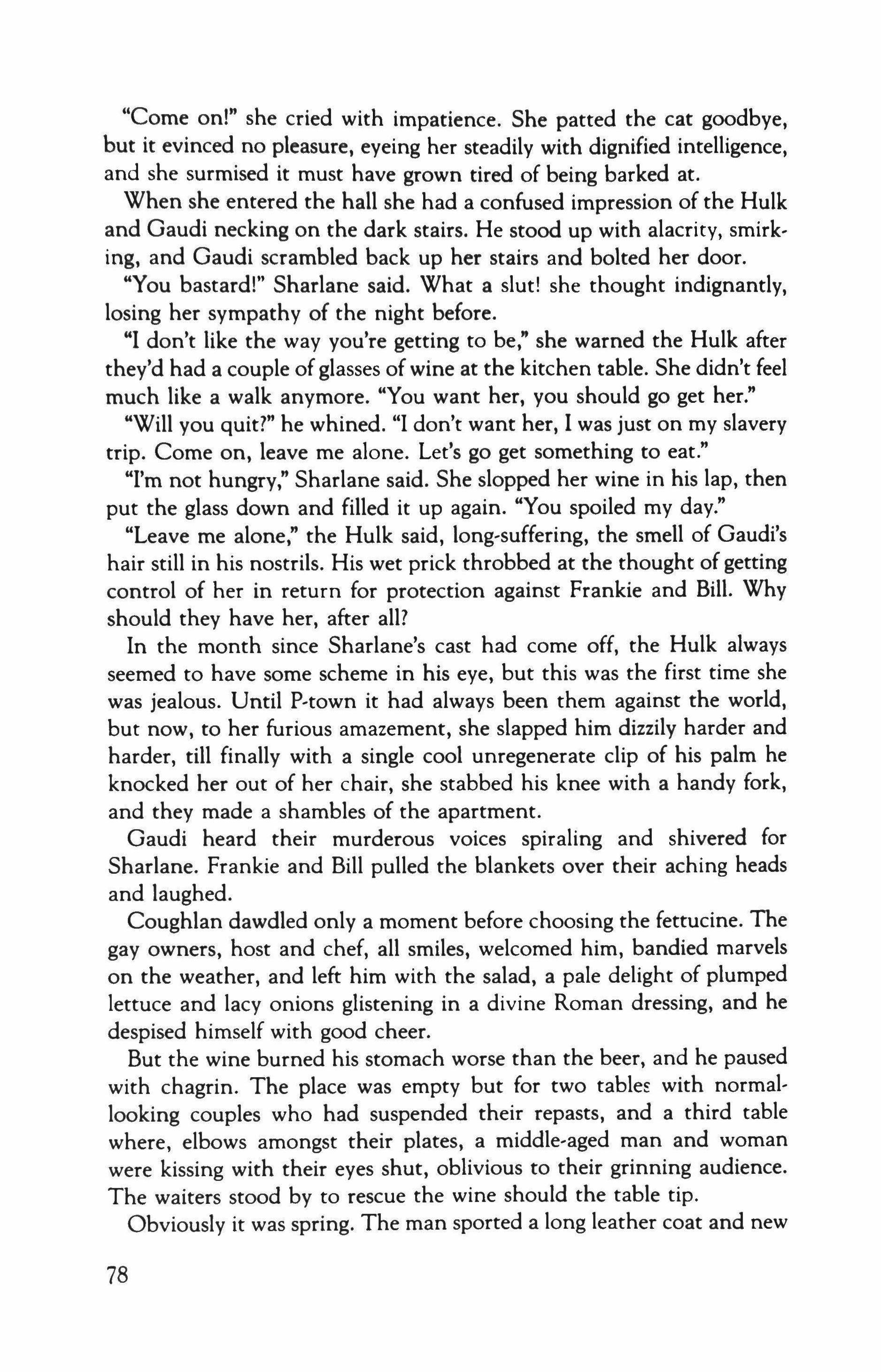
"Come on!" she cried with impatience. She patted the cat goodbye, but it evinced no pleasure, eyeing her steadily with dignified intelligence, and she surmised it must have grown tired of being barked at.
When she entered the hall she had a confused impression of the Hulk and Gaudi necking on the dark stairs. He stood up with alacrity, smirking, and Gaudi scrambled back up her stairs and bolted her door.
"You bastard!" Sharlane said. What a slut! she thought indignantly, losing her sympathy of the night before.
"I don't like the way you're getting to be," she warned the Hulk after they'd had a couple ofglasses of wine at the kitchen table. She didn't feel much like a walk anymore. "You want her, you should go get her."
"Will you quit?" he whined. "I don't want her, I was just on my slavery trip. Come on, leave me alone. Let's go get something to eat."
"I'm not hungry," Sharlane said. She slopped her wine in his lap, then put the glass down and filled it up again. "You spoiled my day."
"Leave me alone," the Hulk said, long-suffering, the smell of Gaudi's hair still in his nostrils. His wet prick throbbed at the thought of getting control of her in return for protection against Frankie and Bill. Why should they have her, after all?
In the month since Sharlane's cast had come off, the Hulk always seemed to have some scheme in his eye, but this was the first time she was jealous. Until P-town it had always been them against the world, but now, to her furious amazement, she slapped him dizzily harder and harder, till finally with a single cool unregenerate clip of his palm he knocked her out of her chair, she stabbed his knee with a handy fork, and they made a shambles of the apartment.
Gaudi heard their murderous voices spiraling and shivered for Sharlane. Frankie and Bill pulled the blankets over their aching heads and laughed.
Coughlan dawdled only a moment before choosing the fettucine. The gay owners, host and chef, all smiles, welcomed him, bandied marvels on the weather, and left him with the salad, a pale delight of plumped lettuce and lacy onions glistening in a divine Roman dressing, and he despised himself with good cheer.
But the wine burned his stomach worse than the beer, and he paused with chagrin. The place was empty but for two tables with normallooking couples who had suspended their repasts, and a third table where, elbows amongst their plates, a middle-aged man and woman were kissing with their eyes shut, oblivious to their grinning audience. The waiters stood by to rescue the wine should the table tip.
Obviously it was spring. The man sported a long leather coat and new
78

pants brightly, hugely plaid; she wore a voluptuous sweater, turquoise bracelets and Mardi Gras beads. They would sit back dazedlv, eat a sheepish bite, and look up. Then their eyes would swim again and drown, and after an interlude of dreamy goggling he would strain off his seat and she, trying to demur, could deny him nothing for long and leant to meet him.
Coughlan harrumphed, reflecting that this was a constant aberration of short duration, that a certain number of people were always so entranced.
Still, it heartened him and he tore into his dinner with grave gusto, making the lettuce fly and the sauce dribble down his beard. It was terribly good, and it was gone. He looked up and found all eyesincluding the lovers' -glancing away with smiles. He felt like eating a chocolate cake and a quart of spumoni, but succeeded with a semblance of dignity in arising without upsetting the table, paying the bill, passing more pleasantries and departing.
Too soon on the street he felt elephantine and bitterly hungry. He had a desolate sense of his day off having gone awry, of there being nothing left of his little safari but the walk home. He tried to console himself with his resolve to abjure pot. Then he nursed his revulsion against Gaudi's tormenters, then he damned the police, finally grew resentful of Gaudi herself, her oddities and trouble. Majestically he made his way back along Front Street, parting the oncoming shoals of tourists. Sometimes the world seemed boobytrapped; he should have stayed home until dark.
Gaudi, terrified by the screams and crashes downstairs, called the police, disguising her voice, and said someone was being killed at Frankie and Bill's.
The temptation to maim Sharlane was overcoming the Hulk, and she, recognizing the remote stare she had heretofore seen directed only at others, fled into the parking lot. The mud puddle there was big with a week of rain. He chased her down and considered drowning her, imagined grinding her face in the gravel at the bottom, knowing he wouldn't do it, almost knowing it, but goading himself to the edge, cuffing her face to and fro with one hand, holding her shirt with the other.
It was twilight but the blood was visible to Eddie Souda who-dressed in his best, carrying fifths of Wild Turkey, J&B and Stolichnaya-just couldn't see letting some guy beat up some chick.
"Hey, come on now," he said in the presumptive tones of one accustomed to the public, "you're friends, aren't you? I thought you were friends."
79
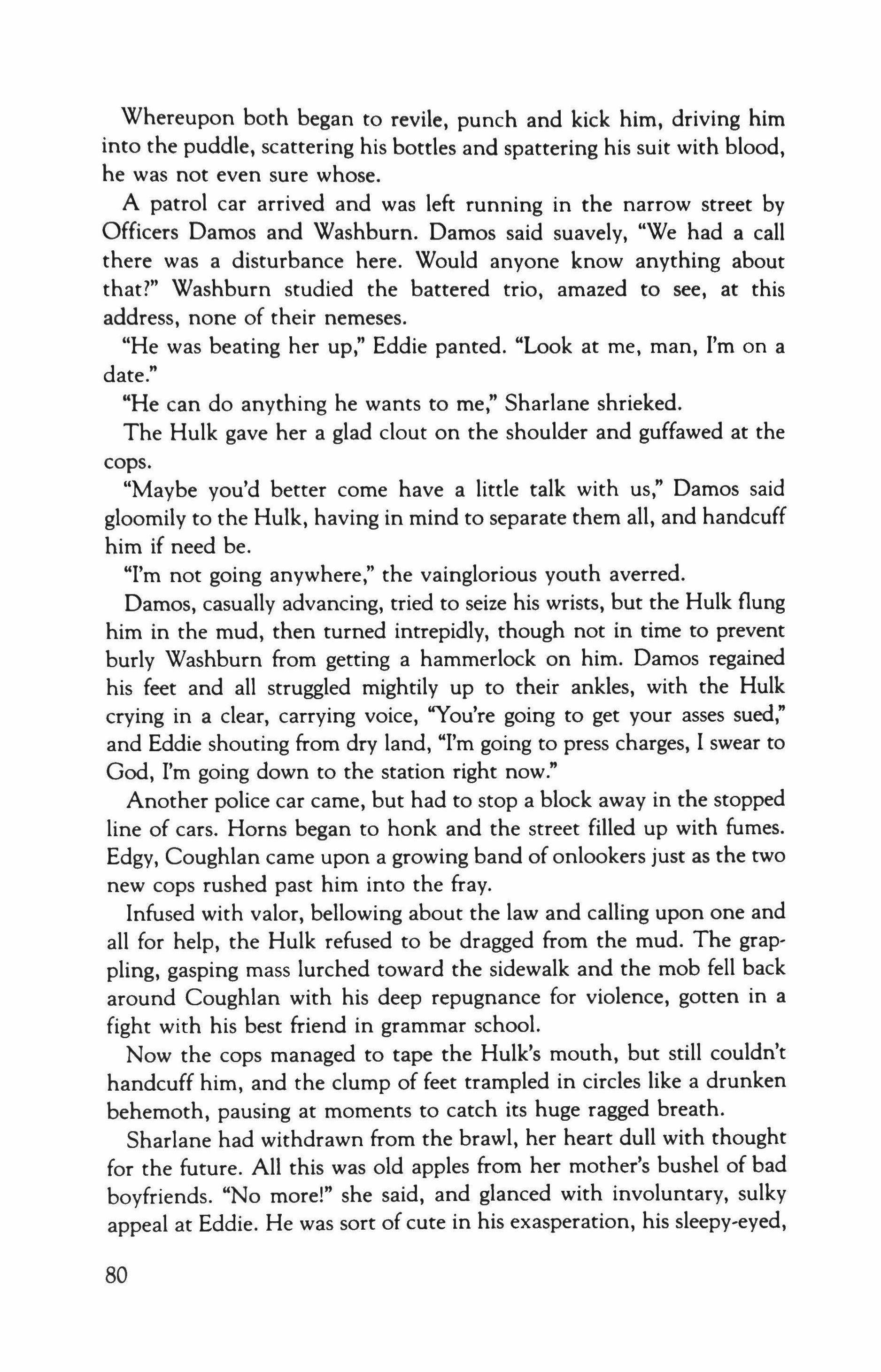
Whereupon both began to revile, punch and kick him, driving him into the puddle, scattering his bottles and spattering his suit with blood, he was not even sure whose.
A patrol car arrived and was left running in the narrow street by Officers Damos and Washburn. Damos said suavely, "We had a call there was a disturbance here. Would anyone know anything about that?" Washburn studied the battered trio, amazed to see, at this address, none of their nemeses.
"He was beating her up," Eddie panted. "Look at me, man, I'm on a date."
"He can do anything he wants to me," Sharlane shrieked.
The Hulk gave her a glad clout on the shoulder and guffawed at the cops.
"Maybe you'd better come have a little talk with us," Damos said gloomily to the Hulk, having in mind to separate them all, and handcuff him if need be.
"I'm not going anywhere," the vainglorious youth averred.
Damos, casually advancing, tried to seize his wrists, but the Hulk flung him in the mud, then turned intrepidly, though not in time to prevent burly Washburn from getting a hammerlock on him. Damos regained his feet and all struggled mightily up to their ankles, with the Hulk crying in a clear, carrying voice, "You're going to get your asses sued," and Eddie shouting from dry land, "I'm going to press charges, I swear to God, I'm going down to the station right now."
Another police car came, but had to stop a block away in the stopped line of cars. Horns began to honk and the street filled up with fumes. Edgy, Coughlan came upon a growing band of onlookers just as the two new cops rushed past him into the fray.
Infused with valor, bellowing about the law and calling upon one and all for help, the Hulk refused to be dragged from the mud. The grappling, gasping mass lurched toward the sidewalk and the mob fell back around Coughlan with his deep repugnance for violence, gotten in a fight with his best friend in grammar school.
Now the cops managed to tape the Hulk's mouth, but still couldn't handcuff him, and the clump of feet trampled in circles like a drunken behemoth, pausing at moments to catch its huge ragged breath.
Sharlane had withdrawn from the brawl, her heart dull with thought for the future. All this was old apples from her mother's bushel of bad boyfriends. "No more!" she said, and glanced with involuntary, sulky appeal at Eddie. He was sort of cute in his exasperation, his sleepy-eyed,
80
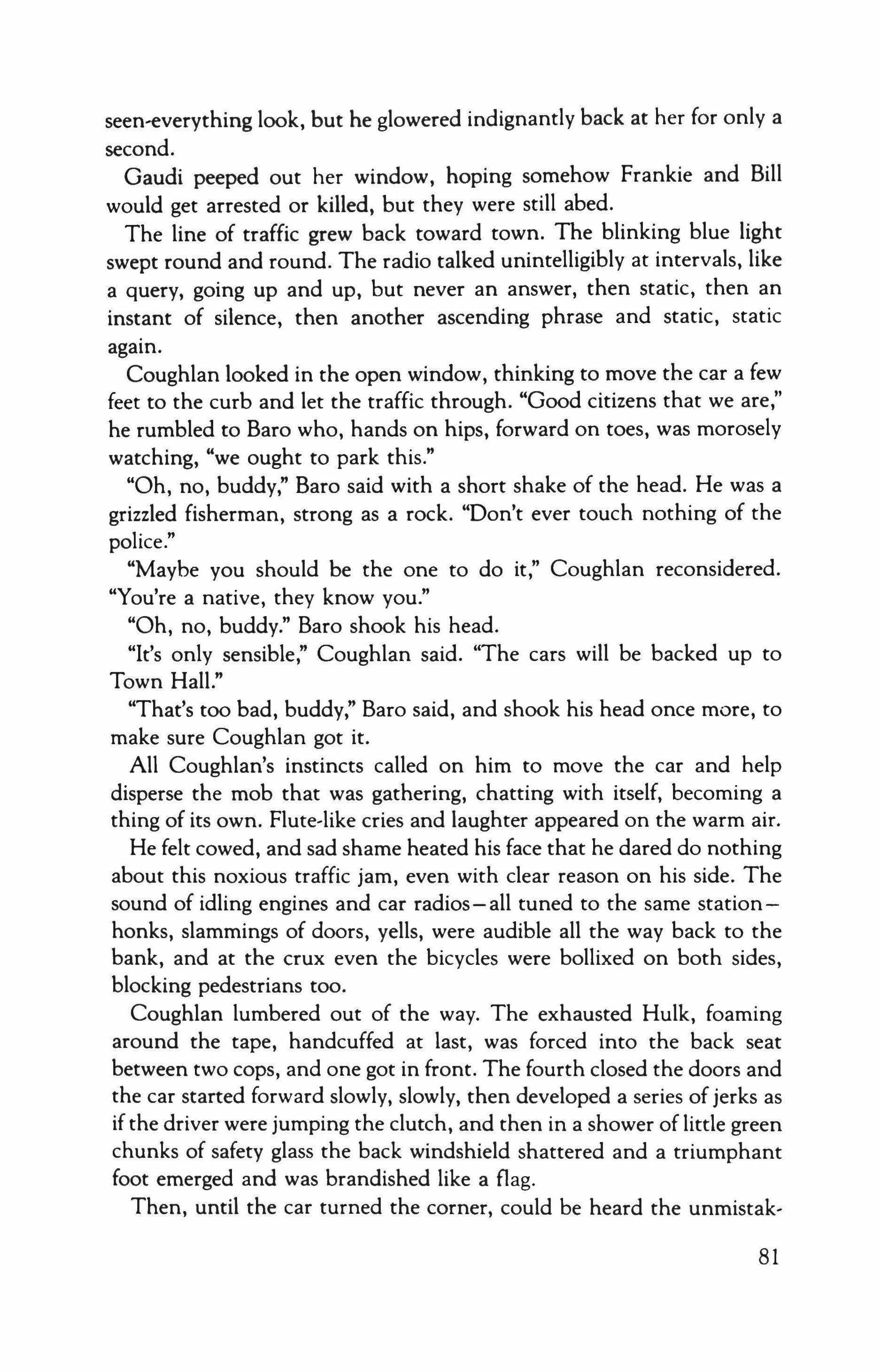
seen-everything look, but he glowered indignantly back at her for only a second.
Gaudi peeped out her window, hoping somehow Frankie and Bill would get arrested or killed, but they were still abed.
The line of traffic grew back toward town. The blinking blue light swept round and round. The radio talked unintelligibly at intervals, like a query, going up and up, but never an answer, then static, then an instant of silence, then another ascending phrase and static, static again.
Coughlan looked in the open window, thinking to move the car a few feet to the curb and let the traffic through. "Good citizens that we are," he rumbled to Baro who, hands on hips, forward on toes, was morosely watching, "we ought to park this."
"Oh, no, buddy," Baro said with a short shake of the head. He was a grizzled fisherman, strong as a rock. "Don't ever touch nothing of the police."
"Maybe you should be the one to do it," Coughlan reconsidered. "You're a native, they know you."
"Oh, no, buddy." Baro shook his head.
"It's only sensible," Coughlan said. "The cars will be backed up to Town Hall."
"That's too bad, buddy," Baro said, and shook his head once more, to make sure Coughlan got it.
All Coughlan's instincts called on him to move the car and help disperse the mob that was gathering, chatting with itself, becoming a thing of its own. Flute-like cries and laughter appeared on the warm air.
He felt cowed, and sad shame heated his face that he dared do nothing about this noxious traffic jam, even with clear reason on his side. The sound of idling engines and car radios-all tuned to the same stationhonks, slammings of doors, yells, were audible all the way back to the bank, and at the crux even the bicycles were bollixed on both sides, blocking pedestrians too.
Coughlan lumbered out of the way. The exhausted Hulk, foaming around the tape, handcuffed at last, was forced into the back seat between two cops, and one got in front. The fourth closed the doors and the car started forward slowly, slowly, then developed a series ofjerks as if the driver were jumping the clutch, and then in a shower of little green chunks of safety glass the back windshield shattered and a triumphant foot emerged and was brandished like a flag.
Then, until the car turned the corner, could be heard the unmistak-
81
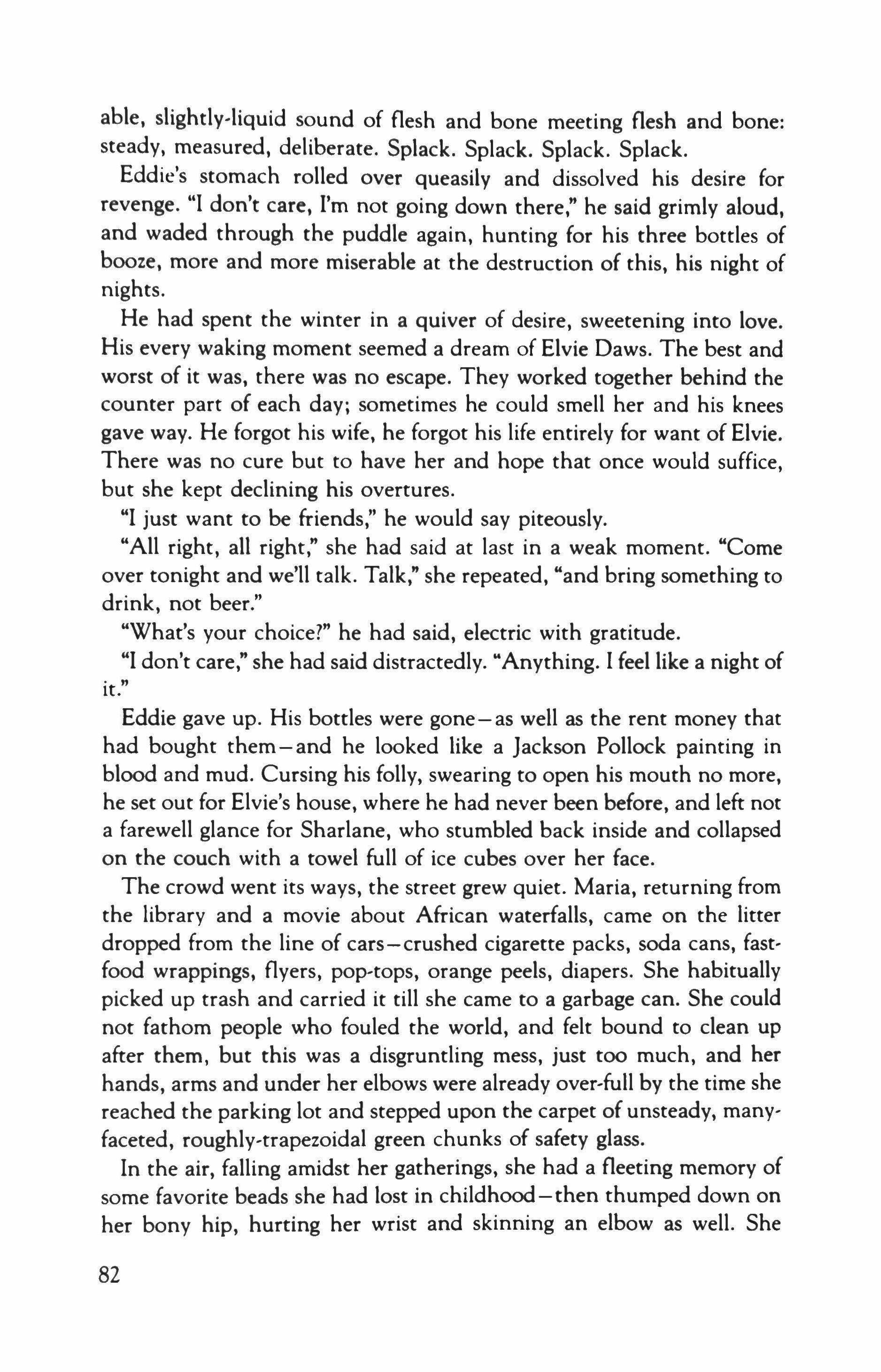
able, slightly-liquid sound of flesh and bone meeting flesh and bone: steady, measured, deliberate. Splack. Splack. Splack. Splack.
Eddie's stomach rolled over queasily and dissolved his desire for revenge. "I don't care, I'm not going down there," he said grimly aloud, and waded through the puddle again, hunting for his three bottles of booze, more and more miserable at the destruction of this, his night of nights.
He had spent the winter in a quiver of desire, sweetening into love. His every waking moment seemed a dream of Elvie Daws. The best and worst of it was, there was no escape. They worked together behind the counter part of each day; sometimes he could smell her and his knees gave way. He forgot his wife, he forgot his life entirely for want of Elvie. There was no cure but to have her and hope that once would suffice, but she kept declining his overtures.
"I just want to be friends," he would say piteously.
"All right, all right," she had said at last in a weak moment. "Come over tonight and we'll talk. Talk," she repeated, "and bring something to drink, not beer."
"What's your choice?" he had said, electric with gratitude. "I don't care," she had said distractedly. "Anything. I feel like a night of it."
Eddie gave up. His bottles were gone-as well as the rent money that had bought them - and he looked like a Jackson Pollock painting in blood and mud. Cursing his folly, swearing to open his mouth no more, he set out for Elvie's house, where he had never been before, and left not a farewell glance for Sharlane, who stumbled back inside and collapsed on the couch with a towel full of ice cubes over her face.
The crowd went its ways, the street grew quiet. Maria, returning from the library and a movie about African waterfalls, came on the litter dropped from the line of cars-crushed cigarette packs, soda cans, fastfood wrappings, flyers, pop-tops, orange peels, diapers. She habitually picked up trash and carried it till she came to a garbage can. She could not fathom people who fouled the world, and felt bound to clean up after them, but this was a disgruntling mess, just too much, and her hands, arms and under her elbows were already over-full by the time she reached the parking lot and stepped upon the carpet of unsteady, manyfaceted, roughly-trapezoidal green chunks of safety glass.
In the air, falling amidst her gatherings, she had a fleeting memory of some favorite beads she had lost in childhood-then thumped down on her bony hip, hurting her wrist and skinning an elbow as well. She
82
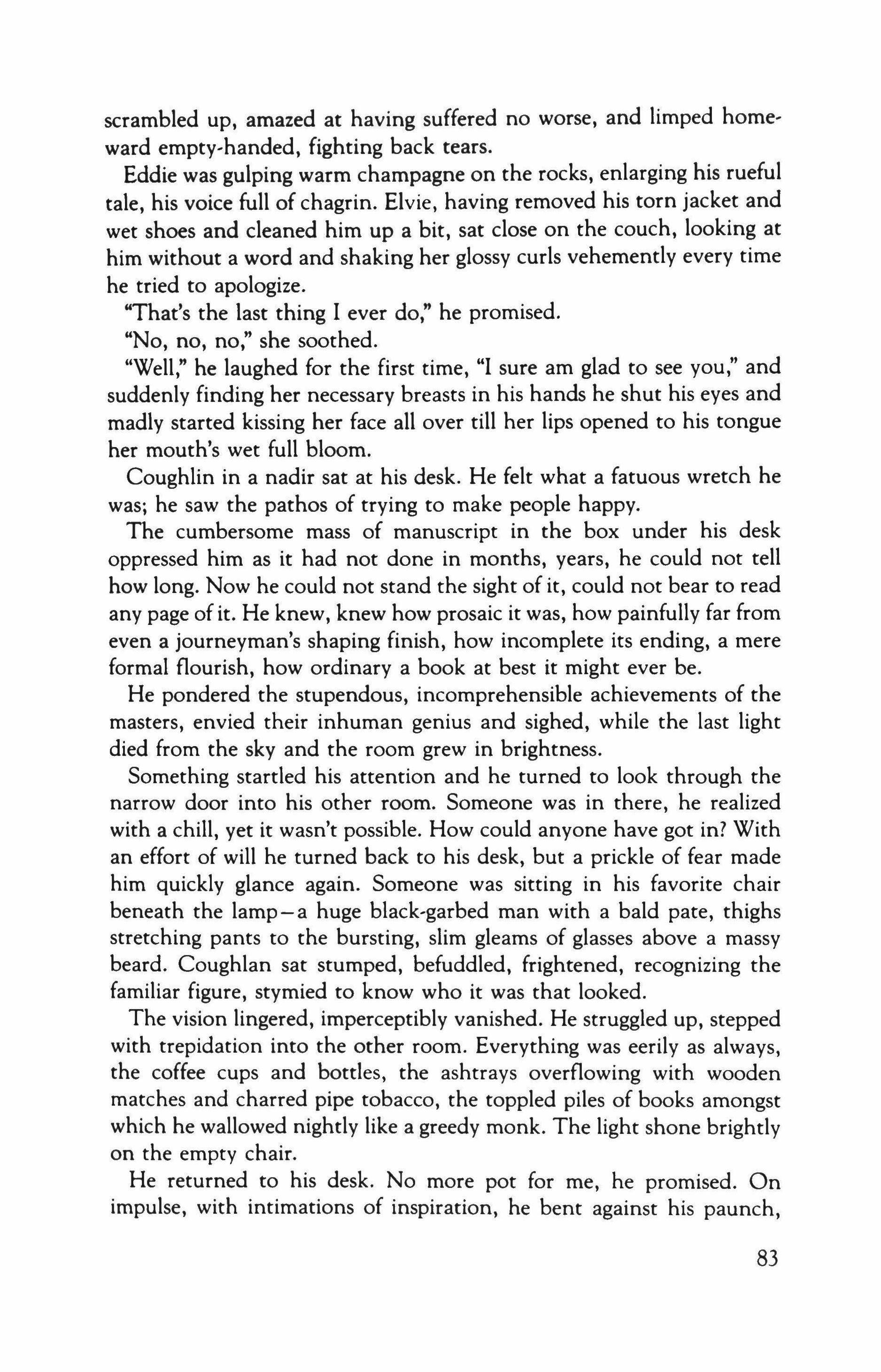
scrambled up, amazed at having suffered no worse, and limped home' ward empty-handed, fighting back tears.
Eddie was gulping warm champagne on the rocks, enlarging his rueful tale, his voice full of chagrin. Elvie, having removed his torn jacket and wet shoes and cleaned him up a bit, sat close on the couch, looking at him without a word and shaking her glossy curls vehemently every time he tried to apologize.
"That's the last thing I ever do," he promised. "No, no, no," she soothed.
"Well," he laughed for the first time, "I sure am glad to see you," and suddenly finding her necessary breasts in his hands he shut his eyes and madly started kissing her face all over till her lips opened to his tongue her mouth's wet full bloom.
Coughlin in a nadir sat at his desk. He felt what a fatuous wretch he was; he saw the pathos of trying to make people happy.
The cumbersome mass of manuscript in the box under his desk oppressed him as it had not done in months, years, he could not tell how long. Now he could not stand the sight of it, could not bear to read any page of it. He knew, knew how prosaic it was, how painfully far from even a journeyman's shaping finish, how incomplete its ending, a mere formal flourish, how ordinary a book at best it might ever be.
He pondered the stupendous, incomprehensible achievements of the masters, envied their inhuman genius and sighed, while the last light died from the sky and the room grew in brightness.
Something startled his attention and he turned to look through the narrow door into his other room. Someone was in there, he realized with a chill, yet it wasn't possible. How could anyone have got in? With an effort of will he turned back to his desk, but a prickle of fear made him quickly glance again. Someone was sitting in his favorite chair beneath the lamp - a huge black-garbed man with a bald pate, thighs stretching pants to the bursting, slim gleams of glasses above a massy beard. Coughlan sat stumped, befuddled, frightened, recognizing the familiar figure, stymied to know who it was that looked.
The vision lingered, imperceptibly vanished. He struggled up, stepped with trepidation into the other room. Everything was eerily as always, the coffee cups and bottles, the ashtrays overflowing with wooden matches and charred pipe tobacco, the toppled piles of books amongst which he wallowed nightly like a greedy monk. The light shone brightly on the empty chair.
He returned to his desk. No more pot for me, he promised. On impulse, with intimations of inspiration, he bent against his paunch,
83
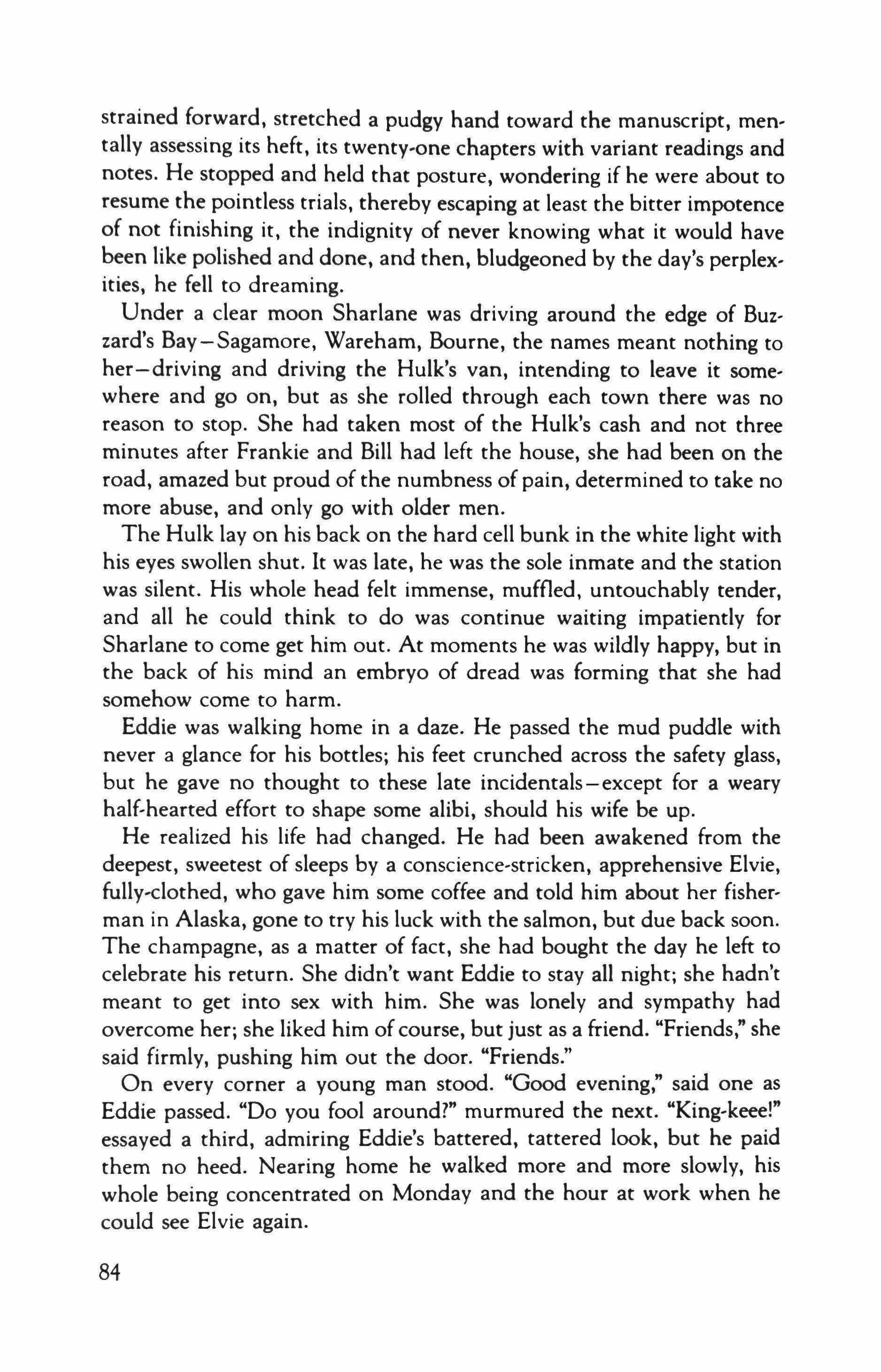
strained forward, stretched a pudgy hand toward the manuscript, mentally assessing its heft, its twenty-one chapters with variant readings and notes. He stopped and held that posture, wondering if he were about to resume the pointless trials, thereby escaping at least the bitter impotence of not finishing it, the indignity of never knowing what it would have been like polished and done, and then, bludgeoned by the day's perplexities, he fell to dreaming.
Under a clear moon Sharlane was driving around the edge of Buzzard's Bay-Sagamore, Wareham, Bourne, the names meant nothing to her-driving and driving the Hulk's van, intending to leave it somewhere and go on, but as she rolled through each town there was no reason to stop. She had taken most of the Hulk's cash and not three minutes after Frankie and Bill had left the house, she had been on the road, amazed but proud of the numbness of pain, determined to take no more abuse, and only go with older men.
The Hulk lay on his back on the hard cell bunk in the white light with his eyes swollen shut. It was late, he was the sole inmate and the station was silent. His whole head felt immense, muffled, untouchably tender, and all he could think to do was continue waiting impatiently for Sharlane to come get him out. At moments he was wildly happy, but in the back of his mind an embryo of dread was forming that she had somehow come to harm.
Eddie was walking home in a daze. He passed the mud puddle with never a glance for his bottles; his feet crunched across the safety glass, but he gave no thought to these late incidentals-except for a weary half-hearted effort to shape some alibi, should his wife be up.
He realized his life had changed. He had been awakened from the deepest, sweetest of sleeps by a conscience-stricken, apprehensive Elvie, fully-clothed, who gave him some coffee and told him about her fisherman in Alaska, gone to try his luck with the salmon, but due back soon. The champagne, as a matter of fact, she had bought the day he left to celebrate his return. She didn't want Eddie to stay all night; she hadn't meant to get into sex with him. She was lonely and sympathy had overcome her; she liked him of course, but just as a friend. "Friends," she said firmly, pushing him out the door. "Friends."
On every corner a young man stood. "Good evening," said one as Eddie passed. "Do you fool around?" murmured the next. "King-keeel" essayed a third, admiring Eddie's battered, tattered look, but he paid them no heed. Nearing home he walked more and more slowly, his whole being concentrated on Monday and the hour at work when he could see Elvie again.
84
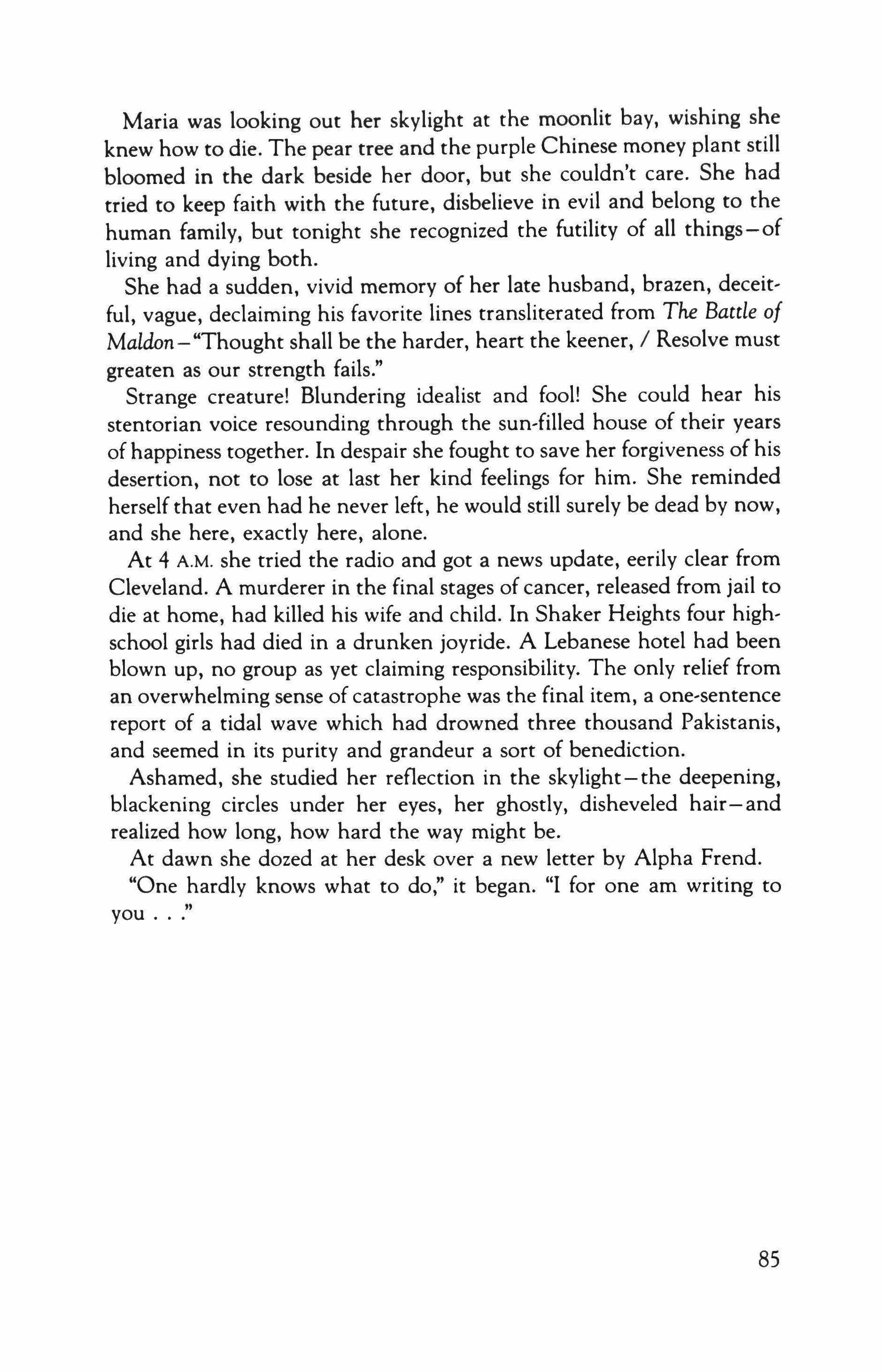
Maria was looking out her skylight at the moonlit bay, wishing she knew how to die. The pear tree and the purple Chinese money plant still bloomed in the dark beside her door, but she couldn't care. She had tried to keep faith with the future, disbelieve in evil and belong to the human family, but tonight she recognized the futility of all things-of living and dying both.
She had a sudden, vivid memory of her late husband, brazen, deceit, ful, vague, declaiming his favorite lines transliterated from The Battle of Maldon - "Thought shall be the harder, heart the keener, / Resolve must greaten as our strength fails."
Strange creature! Blundering idealist and fool! She could hear his stentorian voice resounding through the sun-filled house of their years ofhappiness together. In despair she fought to save her forgiveness of his desertion, not to lose at last her kind feelings for him. She reminded herself that even had he never left, he would still surely be dead by now, and she here, exactly here, alone.
At 4 A.M. she tried the radio and got a news update, eerily clear from Cleveland. A murderer in the final stages of cancer, released from jail to die at home, had killed his wife and child. In Shaker Heights four highschool girls had died in a drunken joyride. A Lebanese hotel had been blown up, no group as yet claiming responsibility. The only relief from an overwhelming sense of catastrophe was the final item, a one-sentence report of a tidal wave which had drowned three thousand Pakistanis, and seemed in its purity and grandeur a sort of benediction.
Ashamed, she studied her reflection in the skylight - the deepening, blackening circles under her eyes, her ghostly, disheveled hair-and realized how long, how hard the way might be.
At dawn she dozed at her desk over a new letter by Alpha Frend. "One hardly knows what to do," it began. "I for one am writing to you
85
Retreat
Arthur Morey

Matty agreed that Thursday night Otis could return to pack his clothes and books; he had to be gone for good by Friday. His lawyer assured him that this was the best deal they could cut.
Dead broke, Otis moved out of the motel and began to spend nights in his office at the radio station. Each evening, he stayed at his desk after the others left, listening to the taped broadcasts. At eleven or so, just as his own show began, he would turn out the lights and stretch out on the carpet, staring into dark corners, as the old do, neither dreaming nor thinking. The rigging of the venetian blind in his window had rotted and snapped. Otis stuck a box of quarter-inch tape edgewise between the louvers to hold them apart. The glow from the mercury streetlamps suffused the room like fog. The white noise ofthe city was like the surfof a dead sea. He wondered if the boy heard it too. Otis would never again miss Matty but he would miss the idea of her, the form in which he imagined her. There is hurting and there is pain and Otis had passed them somewhere up the coast and gone beyond to deeper water.
Come morning he would find himself, as in a jump cut, exactly where he had lain down on the floor, the daylight oozing through the chink in the blinds. He would try to read meaning into the watermarks on the ceiling or he would pick at pieces of chewing gum, black as old pitch, in the carpet, rubbing at them until they came out in little mouse-turd balls under his fingertips. He would breakfast on graham crackers and coffee from yesterday and hit the streets before the secretary arrived.
Matty opened the door herself Thursday. She grimaced, turned, and strode back into the kitchen. She was as she had been for most of the two years since she became pregnant: Something was going to get hit. A
86

moment later he heard the screen door slam and her heavy steps going down the back stairs. To Edward's, he thought, for tea. Otis felt only the memory of sorrow. He had lost his wife long since, even before she'd begun visiting Edward or disappeared with him, before her success as a merchant, even before the weekend she packed her belongings and announced she was taking the baby to live on some kind of communal farm. He'd lost her as you lose a cat who wants to be petted but claws when you hold it close.
He heard Edward's door shut. Rita, Matty's daughter, fourteen, entered on cue. "Miles is still awake," she said, her delivery wooden. "You can sit with him."
"Do you want to talk?"
"I'm staying with friends, thanks."
They were not good actors, Matty and Rita. They confused themselves with their roles and they changed roles often. But they had a natural instinct for melodrama that Otis admired.
When Rita left too, man and boy were alone. On the sun porch, Miles was working out in his crib, talking to himself. The sun was nearly down and he must have seen the man as a shadow at first because he cried out in alarm and then giggled at the smell or sound of his father. Omphalos, Otis thought. The laugh came from the navel of the universe. Hearing it, he was drawn into the baby's world ofperfect benignity, knew the sun was the eye of God looking with tender concern over all aching creation, smiling, even, on tormented Matty and abraded Rita as on this sweet child and on Otis himself for all his mistakes. For a few minutes he and the baby bit chin and then Otis changed him and rocked him until he submerged in sleep, nearly sinking his father with him.
This was one of the things Otis would not give up, the sight of the boy sleeping, the terrestrial nirvana radiating out from him. He would fight to keep this, though he was not a talented fighter. Laying his son down in the crib, Otis imagined he heard from his own heart a gasp like the wheeze of a punctured accordion. There was a pain, too, like that of an abscessed tooth above his throat, back of his eyes, where tears lodge. Had he needed to speak, he knew his voice would be strangled and screened, like the voice of a shipwrecked movie alien whimpering to return to the ammonia seas of its native planet.
Matty and Rita had apparently spent the week streamlining. Otis's gear, making room for theirs, had been tossed into giant, damp, usesoftened cartons. All were half-empty and there was no order in the arrangement: ties snaked through paperbacks, sweatshirts held flowerpots, chopsticks were stubbed into audio cassettes. His file folders were
87
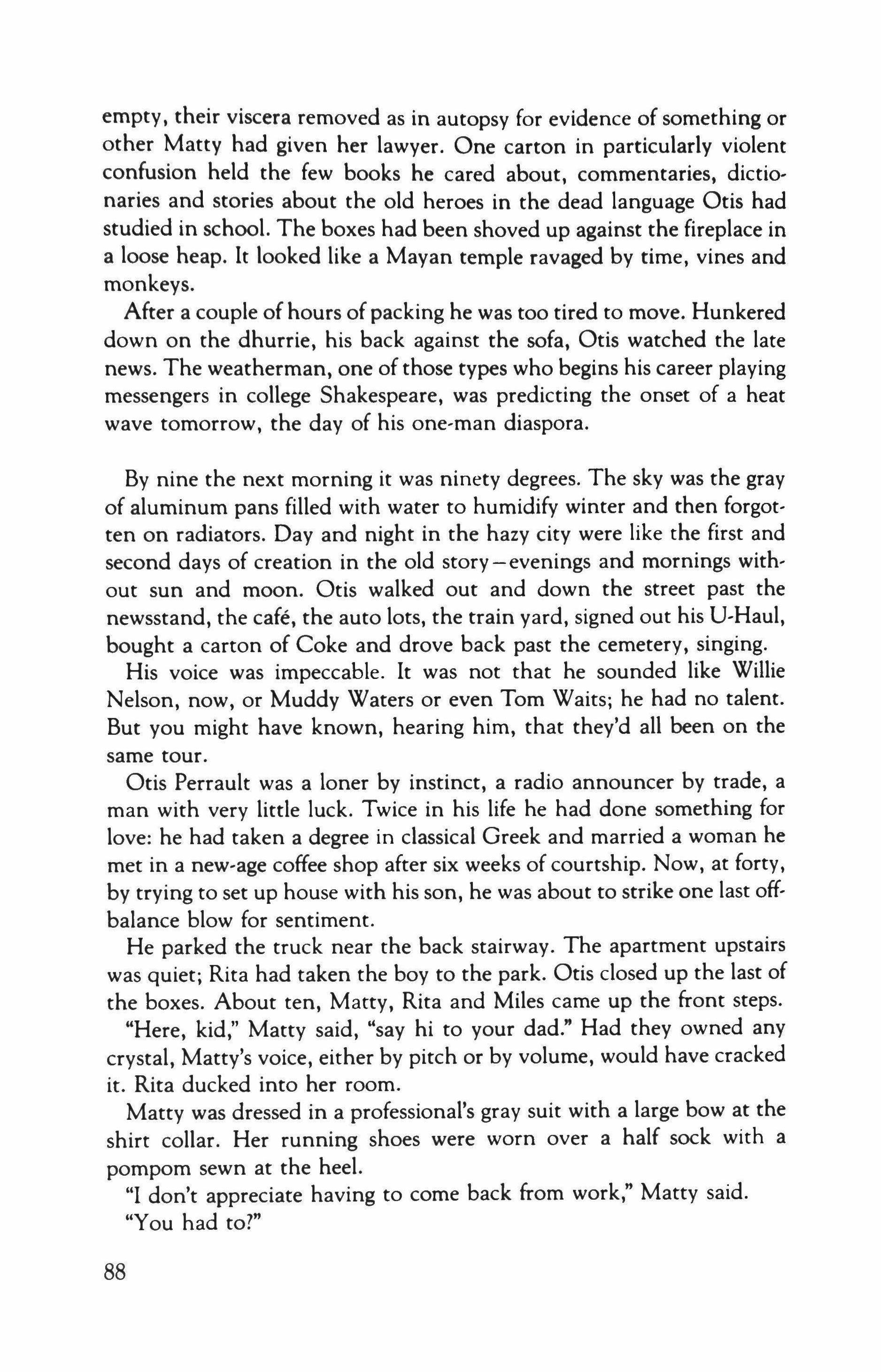
empty, their viscera removed as in autopsy for evidence of something or other Matty had given her lawyer. One carton in particularly violent confusion held the few books he cared about, commentaries, dictionaries and stories about the old heroes in the dead language Otis had studied in school. The boxes had been shoved up against the fireplace in a loose heap. It looked like a Mayan temple ravaged by time, vines and monkeys.
After a couple of hours of packing he was too tired to move. Hunkered down on the dhurrie, his back against the sofa, Otis watched the late news. The weatherman, one of those types who begins his career playing messengers in college Shakespeare, was predicting the onset of a heat wave tomorrow, the day of his one-man diaspora.
By nine the next morning it was ninety degrees. The sky was the gray of aluminum pans filled with water to humidify winter and then forgotten on radiators. Day and night in the hazy city were like the first and second days of creation in the old story - evenings and mornings without sun and moon. Otis walked out and down the street past the newsstand, the cafe, the auto lots, the train yard, signed out his Ll-Haul, bought a carton of Coke and drove back past the cemetery, singing. His voice was impeccable. It was not that he sounded like Willie Nelson, now, or Muddy Waters or even Tom Waits; he had no talent. But you might have known, hearing him, that they'd all been on the same tour.
Otis Perrault was a loner by instinct, a radio announcer by trade, a man with very little luck. Twice in his life he had done something for love: he had taken a degree in classical Greek and married a woman he met in a new-age coffee shop after six weeks of courtship. Now, at forty, by trying to set up house with his son, he was about to strike one last offbalance blow for sentiment.
He parked the truck near the back stairway. The apartment upstairs was quiet; Rita had taken the boy to the park. Otis closed up the last of the boxes. About ten, Matty, Rita and Miles came up the front steps. "Here, kid," Matty said, "say hi to your dad." Had they owned any crystal, Matty's voice, either by pitch or by volume, would have cracked it. Rita ducked into her room.
Matty was dressed in a professional's gray suit with a large bow at the shirt collar. Her running shoes were worn over a half sock with a pompom sewn at the heel.
"1 don't appreciate having to come back from work," Matty said. "You had to?"
88
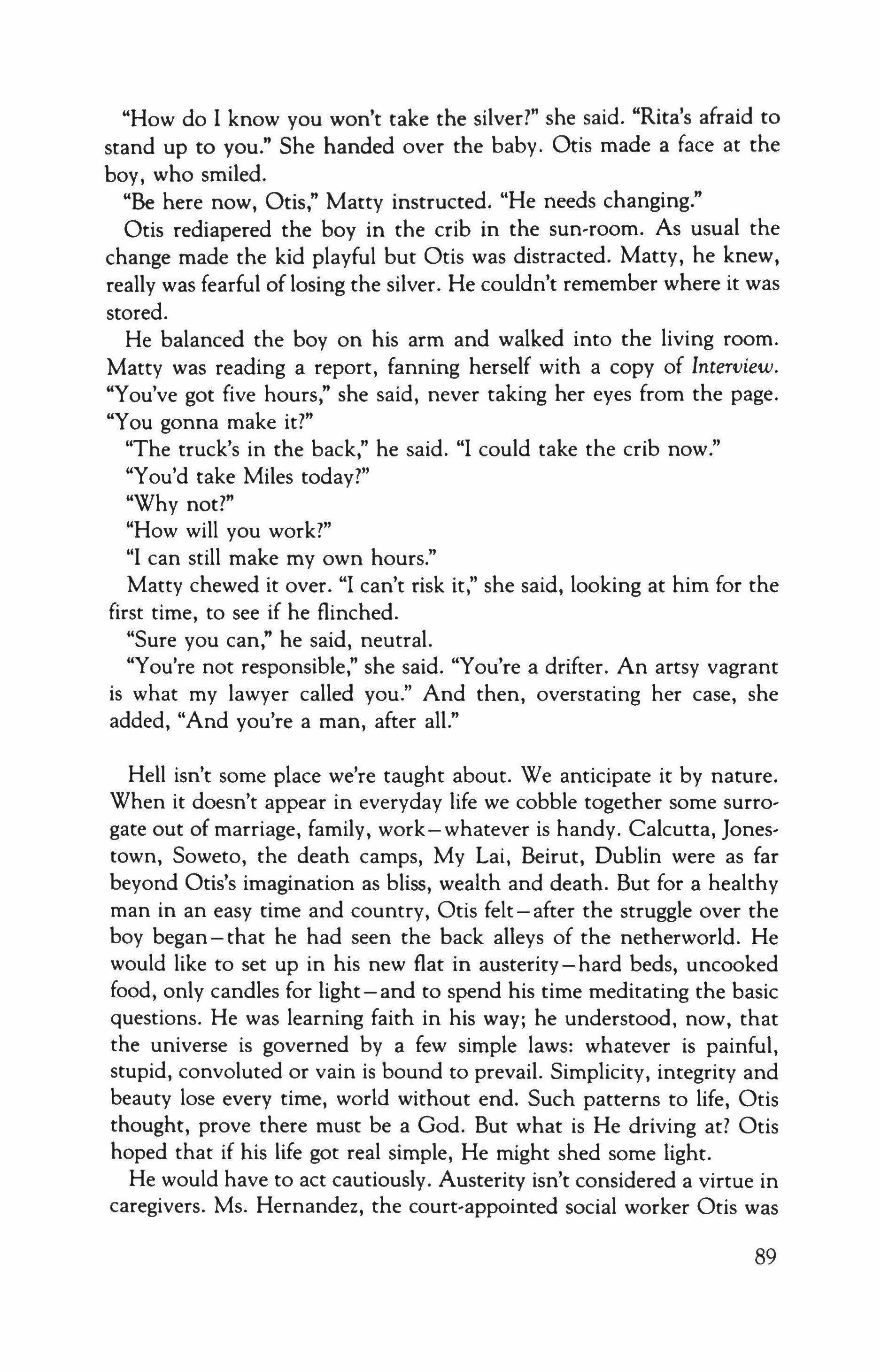
"How do 1 know you won't take the silver?" she said. "Rita's afraid to stand up to you." She handed over the baby. Otis made a face at the boy, who smiled.
"Be here now, Otis," Matty instructed. "He needs changing."
Otis rediapered the boy in the crib in the sun-room. As usual the change made the kid playful but Otis was distracted. Matty, he knew, really was fearful of losing the silver. He couldn't remember where it was stored.
He balanced the boy on his arm and walked into the living room. Matty was reading a report, fanning herself with a copy of Interview. "You've got five hours," she said, never taking her eyes from the page. "You gonna make it?"
"The truck's in the back," he said. "I could take the crib now."
"You'd take Miles today?"
"Why not?"
"How will you work?"
"I can still make my own hours."
Matty chewed it over. "1 can't risk it," she said, looking at him for the first time, to see if he flinched.
"Sure you can," he said, neutral.
"You're not responsible," she said. "You're a drifter. An artsy vagrant is what my lawyer called you." And then, overstating her case, she added, "And you're a man, after all."
Hell isn't some place we're taught about. We anticipate it by nature. When it doesn't appear in everyday life we cobble together some surrogate out of marriage, family, work-whatever is handy. Calcutta, Jonestown, Soweto, the death camps, My Lai, Beirut, Dublin were as far beyond Otis's imagination as bliss, wealth and death. But for a healthy man in an easy time and country, Otis felt-after the struggle over the boy began - that he had seen the back alleys of the netherworld. He would like to set up in his new flat in austerity - hard beds, uncooked food, only candles for light-and to spend his time meditating the basic questions. He was learning faith in his way; he understood, now, that the universe is governed by a few simple laws: whatever is painful, stupid, convoluted or vain is bound to prevail. Simplicity, integrity and beauty lose every time, world without end. Such patterns to life, Otis thought, prove there must be a God. But what is He driving at? Otis hoped that if his life got real simple, He might shed some light. He would have to act cautiously. Austerity isn't considered a virtue in caregivers. Ms. Hernandez, the court-appointed social worker Otis was
89
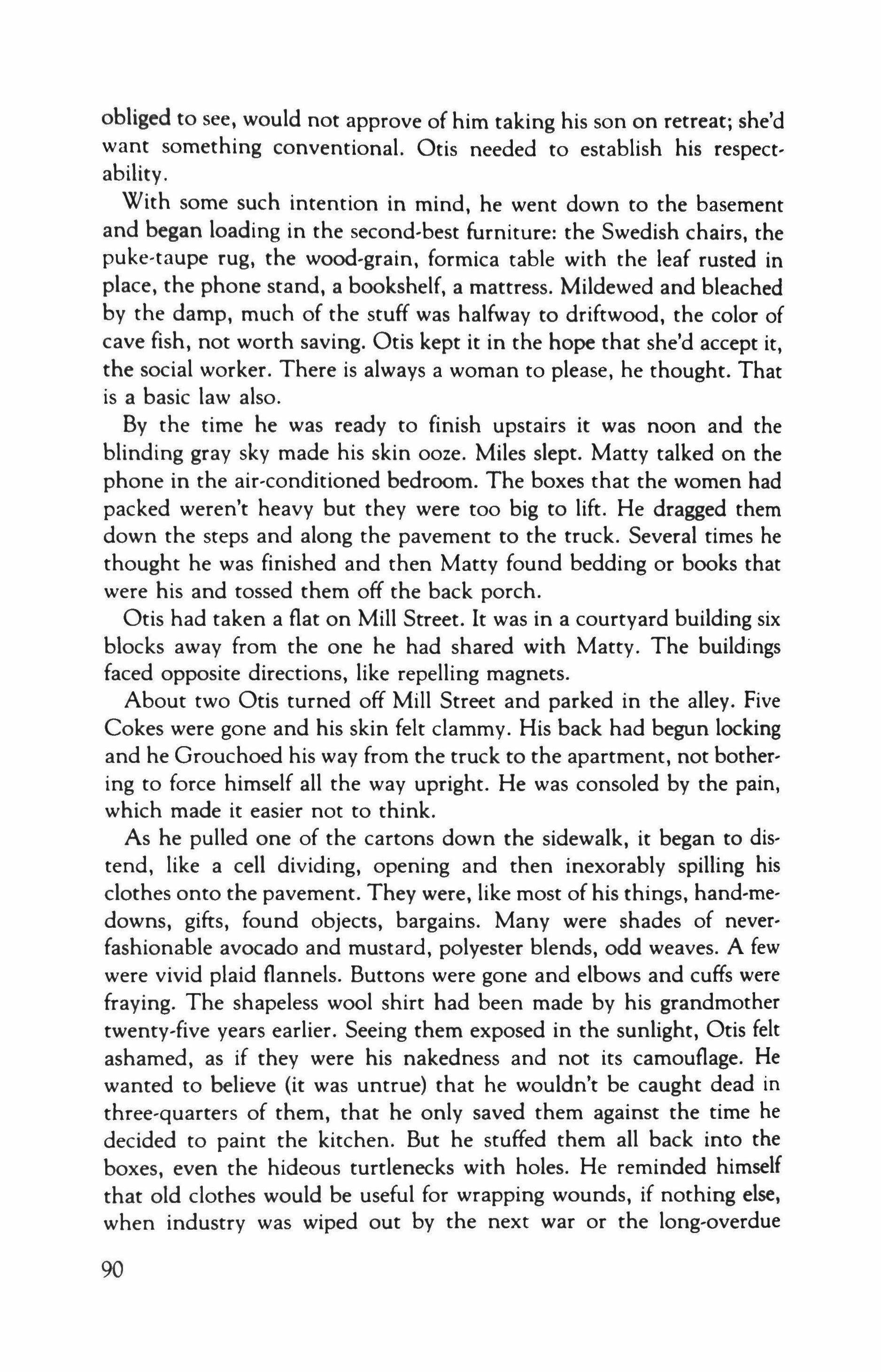
obliged to see, would not approve of him taking his son on retreat; she'd want something conventional. Otis needed to establish his respectability.
With some such intention in mind, he went down to the basement and began loading in the second-best furniture: the Swedish chairs, the puke-taupe rug, the wood-grain, formica table with the leaf rusted in place, the phone stand, a bookshelf, a mattress. Mildewed and bleached by the damp, much of the stuff was halfway to driftwood, the color of cave fish, not worth saving. Otis kept it in the hope that she'd accept it, the social worker. There is always a woman to please, he thought. That is a basic law also.
By the time he was ready to finish upstairs it was noon and the blinding gray sky made his skin ooze. Miles slept. Matty talked on the phone in the air-conditioned bedroom. The boxes that the women had packed weren't heavy but they were too big to lift. He dragged them down the steps and along the pavement to the truck. Several times he thought he was finished and then Matty found bedding or books that were his and tossed them off the back porch.
Otis had taken a flat on Mill Street. It was in a courtyard building six blocks away from the one he had shared with Matty. The buildings faced opposite directions, like repelling magnets.
About two Otis turned off Mill Street and parked in the alley. Five Cokes were gone and his skin felt clammy. His back had begun locking and he Grouchoed his way from the truck to the apartment, not bothering to force himself all the way upright. He was consoled by the pain, which made it easier not to think.
As he pulled one of the cartons down the sidewalk, it began to distend, like a cell dividing, opening and then inexorably spilling his clothes onto the pavement. They were, like most of his things, hand-medowns, gifts, found objects, bargains. Many were shades of neverfashionable avocado and mustard, polyester blends, odd weaves. A few were vivid plaid flannels. Buttons were gone and elbows and cuffs were fraying. The shapeless wool shirt had been made by his grandmother twenty-five years earlier. Seeing them exposed in the sunlight, Otis felt ashamed, as if they were his nakedness and not its camouflage. He wanted to believe (it was untrue) that he wouldn't be caught dead in three-quarters of them, that he only saved them against the time he decided to paint the kitchen. But he stuffed them all back into the boxes, even the hideous turtlenecks with holes. He reminded himself that old clothes would be useful for wrapping wounds, if nothing else, when industry was wiped out by the next war or the long-overdue
90
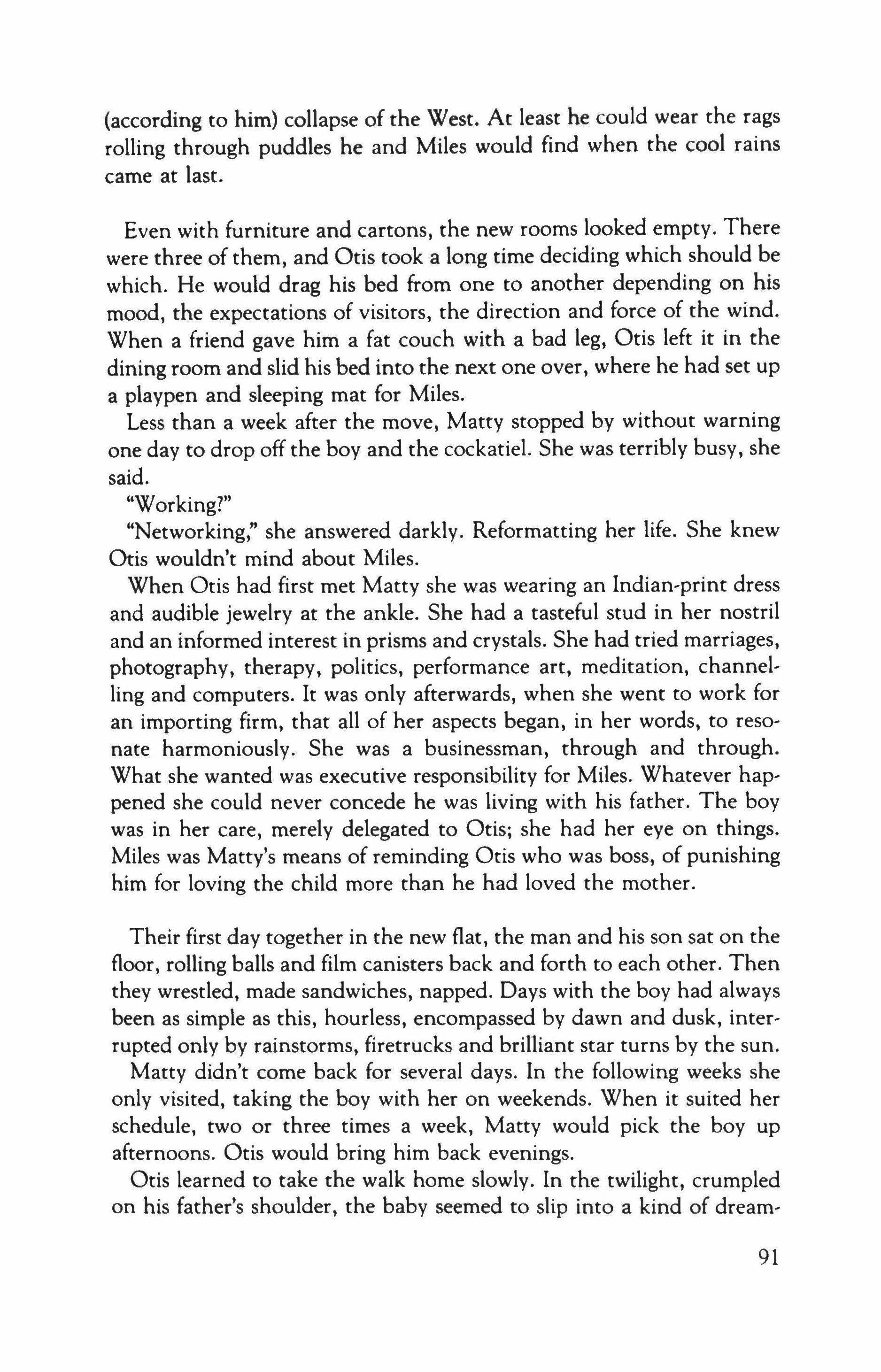
(according to him) collapse of the West. At least he could wear the rags rolling through puddles he and Miles would find when the cool rains came at last.
Even with furniture and cartons, the new rooms looked empty. There were three of them, and Otis took a long time deciding which should be which. He would drag his bed from one to another depending on his mood, the expectations of visitors, the direction and force of the wind. When a friend gave him a fat couch with a bad leg, Otis left it in the dining room and slid his bed into the next one over, where he had set up a playpen and sleeping mat for Miles.
Less than a week after the move, Matty stopped by without warning one day to drop off the boy and the cockatiel. She was terribly busy, she said.
"Working?"
"Networking," she answered darkly. Reformatting her life. She knew Otis wouldn't mind about Miles.
When Otis had first met Matty she was wearing an Indian-print dress and audible jewelry at the ankle. She had a tasteful stud in her nostril and an informed interest in prisms and crystals. She had tried marriages, photography, therapy, politics, performance art, meditation, channelling and computers. It was only afterwards, when she went to work for an importing firm, that all of her aspects began, in her words, to resonate harmoniously. She was a businessman, through and through. What she wanted was executive responsibility for Miles. Whatever happened she could never concede he was living with his father. The boy was in her care, merely delegated to Otis; she had her eye on things. Miles was Matty's means of reminding Otis who was boss, of punishing him for loving the child more than he had loved the mother.
Their first day together in the new flat, the man and his son sat on the floor, rolling balls and film canisters back and forth to each other. Then they wrestled, made sandwiches, napped. Days with the boy had always been as simple as this, hourless, encompassed by dawn and dusk, interrupted only by rainstorms, firetrucks and brilliant star turns by the sun.
Matty didn't come back for several days. In the following weeks she only visited, taking the boy with her on weekends. When it suited her schedule, two or three times a week, Matty would pick the boy up afternoons. Otis would bring him back evenings.
Otis learned to take the walk home slowly. In the twilight, crumpled on his father's shoulder, the baby seemed to slip into a kind of dream-
91

time. He cooed and waved, flirting with streetlights, the moon and the stars. He was enraptured by the flickering reflections of television sets, which made the bay windows of the two-flats look like aquariums. At home, too, Miles wooed light. Naked bulbs and candles sent spasms of joy through his whole body. Otis attached a long pullcord to the fixture in his closet. Sitting on Otis's arm, the boy clowned, did takes, looked for photo opportunities as he turned the light on and off.
Their life in the first weeks on Mill Street began to fall into a routine. Lunch, for example, had its liturgy. They sang their way through it-a small man-and-boy's choir - adding their own percussive imitations of animals, backhoes and locomotives. The boy made faces and Otis mimicked them. Or vice versa. He teased, offering and then pulling back crumbs when his father went for them. Miles's cheerful egotism seemed innate and essential. He insisted on sitting in doorways to play and Otis stumbled over his toys every time he passed. The boy refused to be ignored and Otis, as though acting on instinct, could not help but pay attention.
They walked everywhere together, the boy on the man's arm, face to face. Otis could see his own features in the boy's expressions. But when Miles fell asleep, his face, with its plummy mouth and his thin, halfclosed eyelids, was entirely his own. He's imprinting on you, someone said, but Otis thought it might be the other way around. After a few months, Otis began to feel sure that he and the baby were not distinct. He couldn't reconstruct the time, not much more than a year ago, when Miles wasn't present. His son seemed always to have been somewhere, laughing, observing, diverting, gurgling in Otis's ear, waiting in the wings. Their ideas (one using words, one not) marched lockstep. The two were matched: Friday and Crusoe marooned, Lennon and McCartney, Bergen and McCarthy, Jules and Jim, Butch and Sundance, Quixote and Sancho. Each was the other's best audience. They were a circular folie a deux. Only when they were at odds did Miles seem a baby. The boy was becoming his father's perfect master. Otis studied: how does he grow? Do I teach him or is the person he is meant to be simply blooming? Using tools like a spoon or a ball, the boy imitated the man. But at the tap, for example, he handled the cup his own way, learning about water from water itself.
Otis held to the idea that he was on retreat. He had no direct experience of the contemplative life, but in the seventies he had known a couple of gurus socially. Meg, who ran the toy store-an attractive, fortyish, Episcopalian lady-instructed him a little. She took occasional
92

weekends with friends from her church and returned pensive and soothed, like a woman who has come from a tryst. Otis imagined a retreat as a kind of research without books. The hermit, he assumed, moved logically from one insight to the next, progressing systematically towards some essential truth. It was not working out that way for him. Unlike most hermits, Otis had gone into his wilderness with a small boy. Learning from Miles, Otis's understanding of things grew the way a tree does, in every direction at once, with epiphanies blooming, without warning, at no predictable place. After all the advice given him by lawyers and friends, he would have liked-though he made his livelihood from talk - to take a vow of silence. But it would have been dishonest. He had been in conversation with the boy since the day he was born.
The social worker, Ms. Hernandez-an exhausted woman who had truly seen everything-was not sympathetic to Otis. "When he's older," she said, "you can teach him to play ball. That's not enough?" Late in September, man and wife appeared in court. Miles, reluctantly, stayed with the sitter. The judge agreed that Matty should be listed as primary caretaker. Details were to be resolved. The lawyers obligingly returned to their offices and labored on in their lonely, unappreciated calling, communicating with Otis and Matty only through runic bills, drawing up a schedule for the boy-largely fictitious-that would look good to the judge and the social workers.
Two weeks later, Otis's radio show was canceled. No one noticed. Fallen from grace on the airwaves, he was put to work selling advertising time to local businessmen. Many were flattered to be called by a lowmagnitude celebrity who knew how very special their establishments were. Otis went to his office only a few days a week. He contacted clients during the boy's naps, always pretending to be calling from a pay phone at O'Hare, on his way to an important meeting.
Otis and son spent their daylight hours that autumn on the circuit of local playgrounds, deciding which swings swung most smoothly, which slides had the finest views. Miles liked best playing hunter-gatherer, loping across the grasslands of a nearby field on his stubby legs, looking for dogs, airplanes, rabbits. Routines came and went, were conceived, tested and then discarded unsentimentally. For three days in a row, for example, the boy galloped everywhere, always right foot first. Then he stopped and never did it again. In the rows of great dying elms that stood watch over the streets, their leaves thinning in the cold and rain, man and boy played hide-and-seek endlessly, reenacting the fears each
93
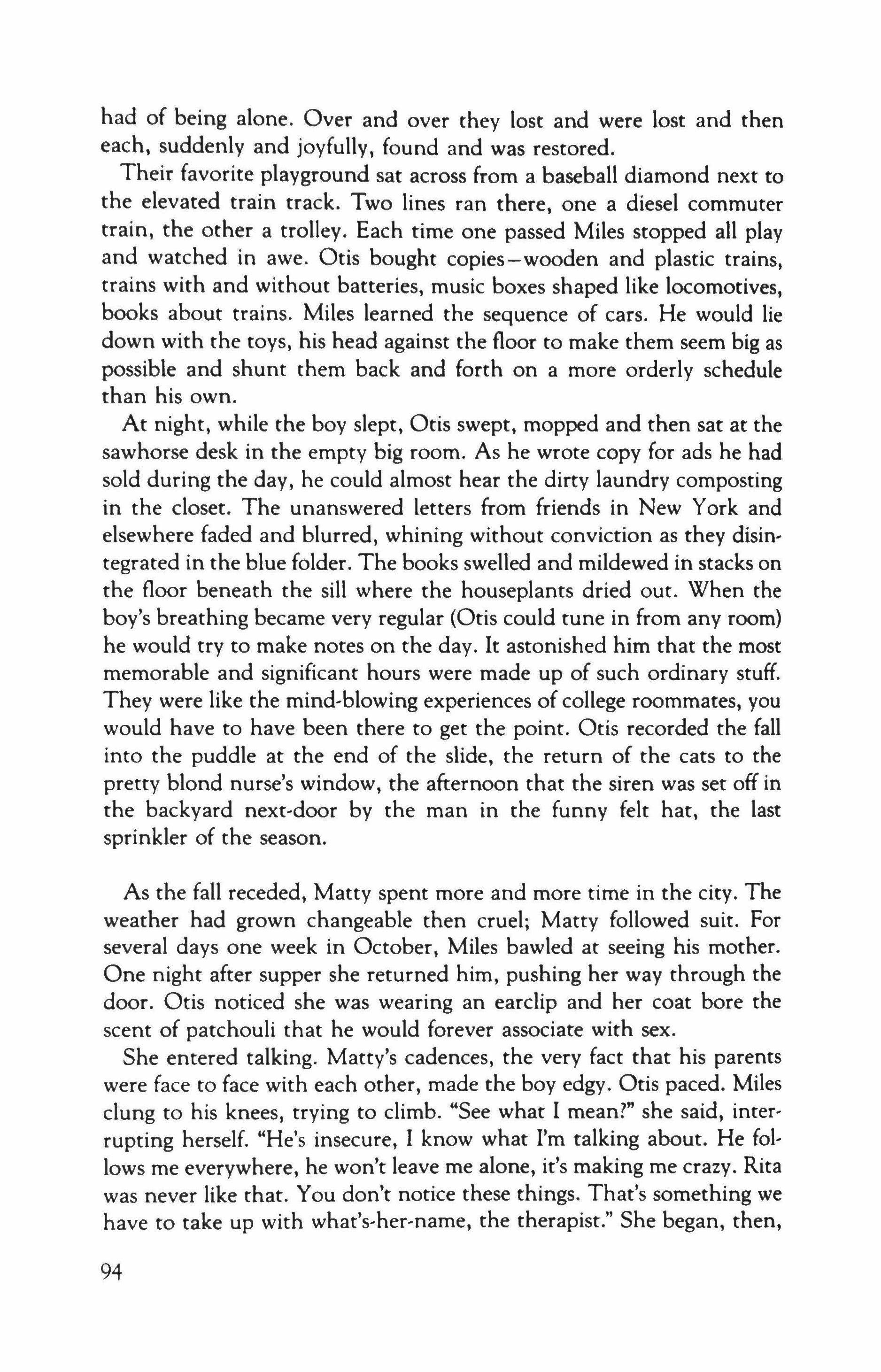
had of being alone. Over and over they lost and were lost and then each, suddenly and joyfully, found and was restored.
Their favorite playground sat across from a baseball diamond next to the elevated train track. Two lines ran there, one a diesel commuter train, the other a trolley. Each time one passed Miles stopped all play and watched in awe. Otis bought copies-wooden and plastic trains, trains with and without batteries, music boxes shaped like locomotives, books about trains. Miles learned the sequence of cars. He would lie down with the toys, his head against the floor to make them seem big as possible and shunt them back and forth on a more orderly schedule than his own.
At night, while the boy slept, Otis swept, mopped and then sat at the sawhorse desk in the empty big room. As he wrote copy for ads he had sold during the day, he could almost hear the dirty laundry composting in the closet. The unanswered letters from friends in New York and elsewhere faded and blurred, whining without conviction as they disintegrated in the blue folder. The books swelled and mildewed in stacks on the floor beneath the sill where the houseplants dried out. When the boy's breathing became very regular (Otis could tune in from any room) he would try to make notes on the day. It astonished him that the most memorable and significant hours were made up of such ordinary stuff. They were like the mind-blowing experiences of college roommates, you would have to have been there to get the point. Otis recorded the fall into the puddle at the end of the slide, the return of the cats to the pretty blond nurse's window, the afternoon that the siren was set off in the backyard next-door by the man in the funny felt hat, the last sprinkler of the season.
As the fall receded, Matty spent more and more time in the city. The weather had grown changeable then cruel; Matty followed suit. For several days one week in October, Miles bawled at seeing his mother. One night after supper she returned him, pushing her way through the door. Otis noticed she was wearing an earclip and her coat bore the scent of patchouli that he would forever associate with sex.
She entered talking. Matty's cadences, the very fact that his parents were face to face with each other, made the boy edgy. Otis paced. Miles clung to his knees, trying to climb. "See what I mean?" she said, interrupting herself. "He's insecure, I know what I'm talking about. He follows me everywhere, he won't leave me alone, it's making me crazy. Rita was never like that. You don't notice these things. That's something we have to take up with what's-her-name, the therapist." She began, then,
94
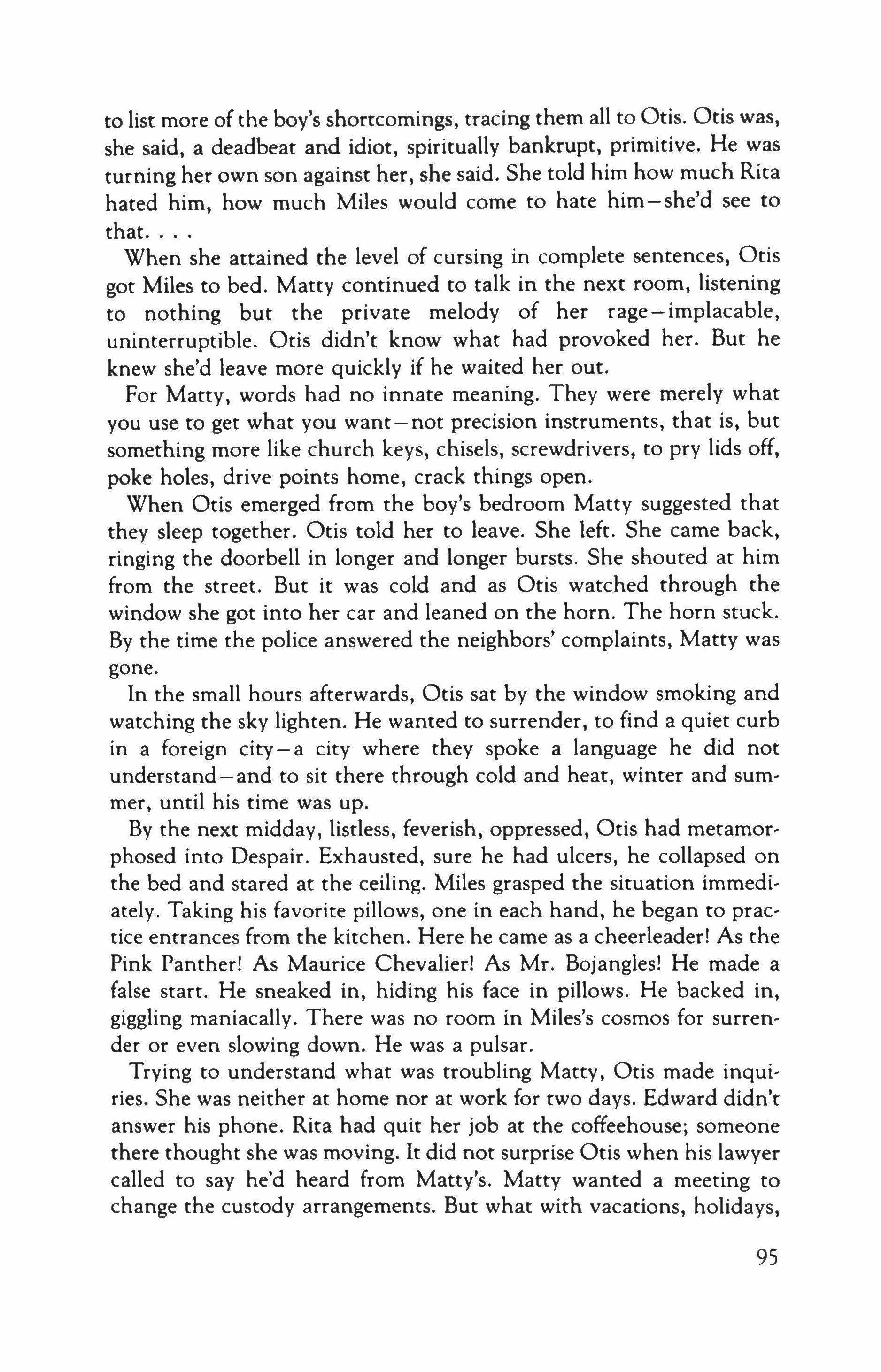
to list more of the boy's shortcomings, tracing them all to Otis. Otis was, she said, a deadbeat and idiot, spiritually bankrupt, primitive. He was turning her own son against her, she said. She told him how much Rita hated him, how much Miles would come to hate him-she'd see to that
When she attained the level of cursing in complete sentences, Otis got Miles to bed. Matty continued to talk in the next room, listening to nothing but the private melody of her rage- implacable, uninterruptible. Otis didn't know what had provoked her. But he knew she'd leave more quickly if he waited her out.
For Matty, words had no innate meaning. They were merely what you use to get what you want-not precision instruments, that is, but something more like church keys, chisels, screwdrivers, to pry lids off, poke holes, drive points home, crack things open.
When Otis emerged from the boy's bedroom Matty suggested that they sleep together. Otis told her to leave. She left. She came back, ringing the doorbell in longer and longer bursts. She shouted at him from the street. But it was cold and as Otis watched through the window she got into her car and leaned on the horn. The horn stuck. By the time the police answered the neighbors' complaints, Matty was gone.
In the small hours afterwards, Otis sat by the window smoking and watching the sky lighten. He wanted to surrender, to find a quiet curb in a foreign city-a city where they spoke a language he did not understand-and to sit there through cold and heat, winter and summer, until his time was up.
By the next midday, listless, feverish, oppressed, Otis had metamorphosed into Despair. Exhausted, sure he had ulcers, he collapsed on the bed and stared at the ceiling. Miles grasped the situation immediately. Taking his favorite pillows, one in each hand, he began to practice entrances from the kitchen. Here he came as a cheerleader! As the Pink Panther! As Maurice Chevalier! As Mr. Bojangles! He made a false start. He sneaked in, hiding his face in pillows. He backed in, giggling maniacally. There was no room in Miles's cosmos for surrender or even slowing down. He was a pulsar.
Trying to understand what was troubling Matty, Otis made inquiries. She was neither at home nor at work for two days. Edward didn't answer his phone. Rita had quit her job at the coffeehouse; someone there thought she was moving. It did not surprise Otis when his lawyer called to say he'd heard from Matty's. Matty wanted a meeting to change the custody arrangements. But what with vacations, holidays,
95
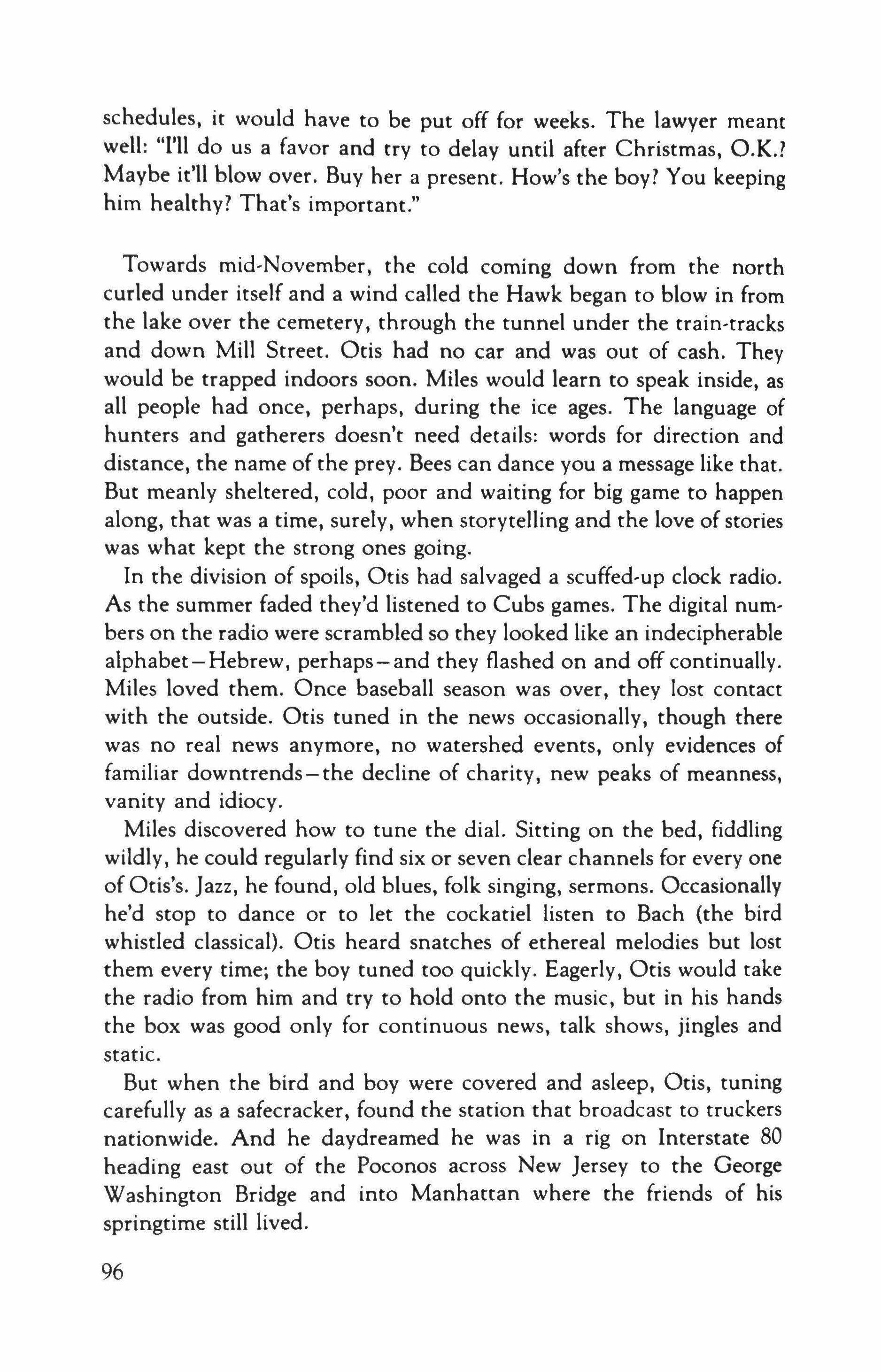
schedules, it would have to be put off for weeks. The lawyer meant well: "I'll do us a favor and try to delay until after Christmas, O.K.? Maybe it'll blow over. Buy her a present. How's the boy? You keeping him healthy? That's important."
Towards mid-November, the cold coming down from the north curled under itself and a wind called the Hawk began to blow in from the lake over the cemetery, through the tunnel under the train-tracks and down Mill Street. Otis had no car and was out of cash. They would be trapped indoors soon. Miles would learn to speak inside, as all people had once, perhaps, during the ice ages. The language of hunters and gatherers doesn't need details: words for direction and distance, the name of the prey. Bees can dance you a message like that. But meanly sheltered, cold, poor and waiting for big game to happen along, that was a time, surely, when storytelling and the love of stories was what kept the strong ones going.
In the division of spoils, Otis had salvaged a scuffed-up clock radio. As the summer faded they'd listened to Cubs games. The digital numbers on the radio were scrambled so they looked like an indecipherable alphabet-Hebrew, perhaps-and they flashed on and off continually. Miles loved them. Once baseball season was over, they lost contact with the outside. Otis tuned in the news occasionally, though there was no real news anymore, no watershed events, only evidences of familiar downtrends - the decline of charity, new peaks of meanness, vanity and idiocy.
Miles discovered how to tune the dial. Sitting on the bed, fiddling wildly, he could regularly find six or seven clear channels for everyone of Otis's. Jazz, he found, old blues, folk singing, sermons. Occasionally he'd stop to dance or to let the cockatiel listen to Bach (the bird whistled classical). Otis heard snatches of ethereal melodies but lost them every time; the boy tuned too quickly. Eagerly, Otis would take the radio from him and try to hold onto the music, but in his hands the box was good only for continuous news, talk shows, jingles and static.
But when the bird and boy were covered and asleep, Otis, tuning carefully as a safecracker, found the station that broadcast to truckers nationwide. And he daydreamed he was in a rig on Interstate 80 heading east out of the Poconos across New Jersey to the George Washington Bridge and into Manhattan where the friends of his springtime still lived.
96
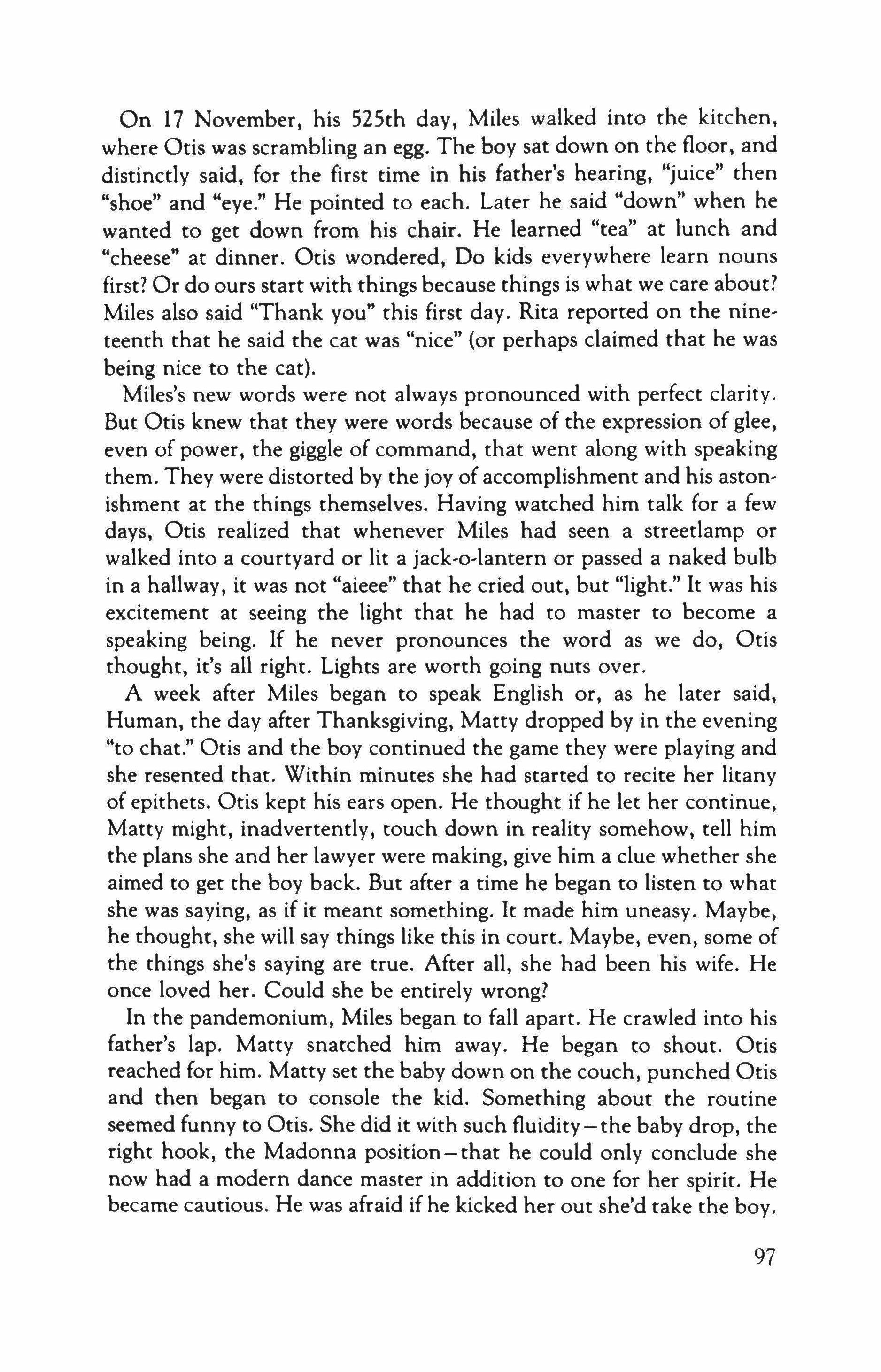
On 17 November, his 525th day, Miles walked into the kitchen, where Otis was scrambling an egg. The boy sat down on the floor, and distinctly said, for the first time in his father's hearing, "juice" then "shoe" and "eye." He pointed to each. Later he said "down" when he wanted to get down from his chair. He learned "tea" at lunch and "cheese" at dinner. Otis wondered, Do kids everywhere learn nouns first? Or do ours start with things because things is what we care about? Miles also said "Thank you" this first day. Rita reported on the nineteenth that he said the cat was "nice" (or perhaps claimed that he was being nice to the cat).
Miles's new words were not always pronounced with perfect clarity. But Otis knew that they were words because of the expression of glee, even of power, the giggle of command, that went along with speaking them. They were distorted by the joy of accomplishment and his astonishment at the things themselves. Having watched him talk for a few days, Otis realized that whenever Miles had seen a streetlamp or walked into a courtyard or lit a jack-o-lantern or passed a naked bulb in a hallway, it was not "aieee" that he cried out, but "light." It was his excitement at seeing the light that he had to master to become a speaking being. If he never pronounces the word as we do, Otis thought, it's all right. Lights are worth going nuts over.
A week after Miles began to speak English or, as he later said, Human, the day after Thanksgiving, Matty dropped by in the evening "to chat." Otis and the boy continued the game they were playing and she resented that. Within minutes she had started to recite her litany of epithets. Otis kept his ears open. He thought if he let her continue, Matty might, inadvertently, touch down in reality somehow, tell him the plans she and her lawyer were making, give him a clue whether she aimed to get the boy back. But after a time he began to listen to what she was saying, as if it meant something. It made him uneasy. Maybe, he thought, she will say things like this in court. Maybe, even, some of the things she's saying are true. After all, she had been his wife. He once loved her. Could she be entirely wrong?
In the pandemonium, Miles began to fall apart. He crawled into his father's lap. Matty snatched him away. He began to shout. Otis reached for him. Matty set the baby down on the couch, punched Otis and then began to console the kid. Something about the routine seemed funny to Otis. She did it with such fluidity - the baby drop, the right hook, the Madonna position-that he could only conclude she now had a modern dance master in addition to one for her spirit. He became cautious. He was afraid if he kicked her out she'd take the boy.
97
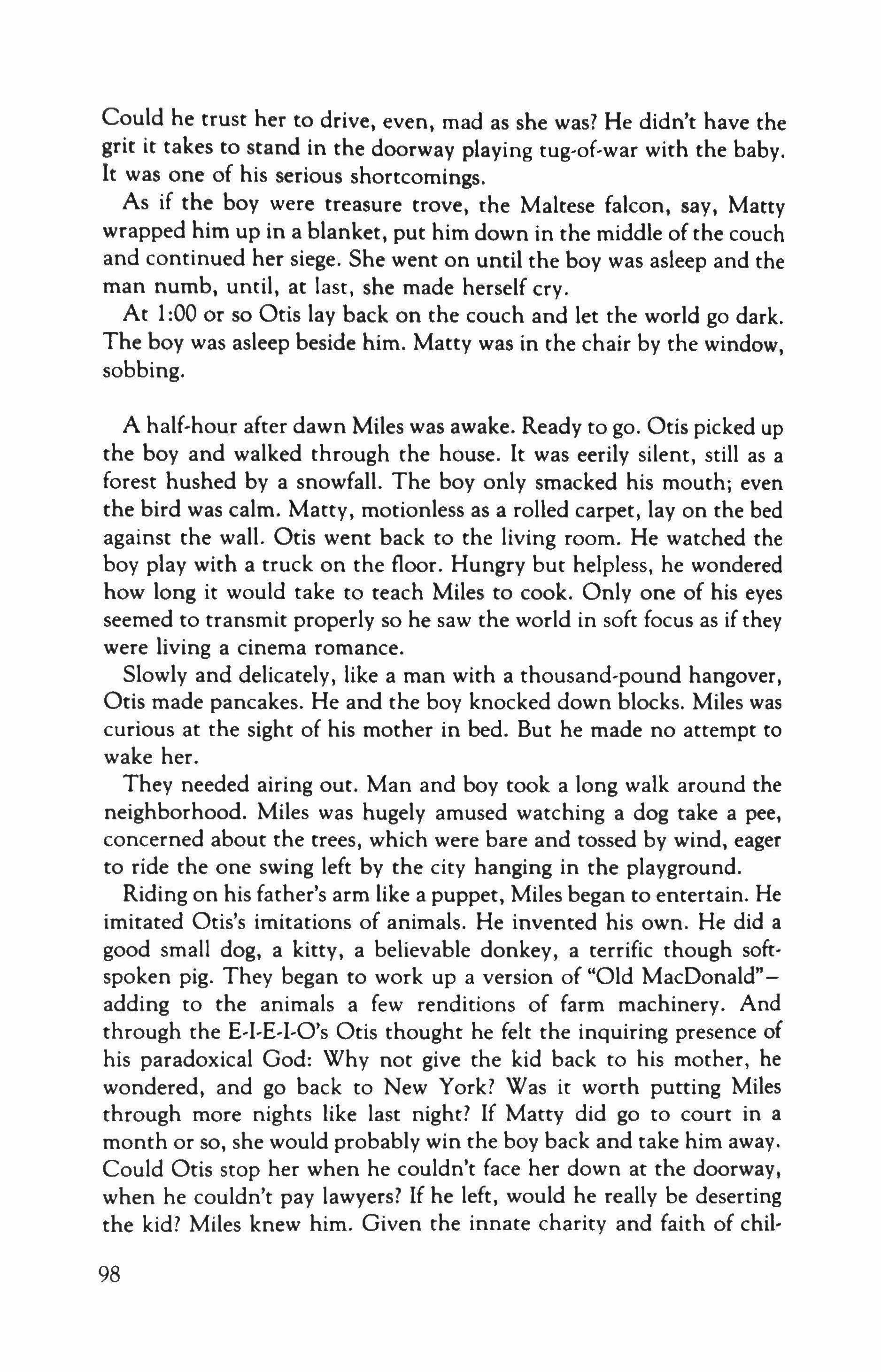
Could he trust her to drive, even, mad as she was? He didn't have the grit it takes to stand in the doorway playing tug-of-war with the baby. It was one of his serious shortcomings.
As if the boy were treasure trove, the Maltese falcon, say, Matty wrapped him up in a blanket, put him down in the middle of the couch and continued her siege. She went on until the boy was asleep and the man numb, until, at last, she made herself cry.
At 1 :00 or so Otis lay back on the couch and let the world go dark. The boy was asleep beside him. Matty was in the chair by the window, sobbing.
A half-hour after dawn Miles was awake. Ready to go. Otis picked up the boy and walked through the house. It was eerily silent, still as a forest hushed by a snowfall. The boy only smacked his mouth; even the bird was calm. Matty, motionless as a rolled carpet, lay on the bed against the wall. Otis went back to the living room. He watched the boy play with a truck on the floor. Hungry but helpless, he wondered how long it would take to teach Miles to cook. Only one of his eyes seemed to transmit properly so he saw the world in soft focus as if they were living a cinema romance.
Slowly and delicately, like a man with a thousand-pound hangover, Otis made pancakes. He and the boy knocked down blocks. Miles was curious at the sight of his mother in bed. But he made no attempt to wake her.
They needed airing out. Man and boy took a long walk around the neighborhood. Miles was hugely amused watching a dog take a pee, concerned about the trees, which were bare and tossed by wind, eager to ride the one swing left by the city hanging in the playground. Riding on his father's arm like a puppet, Miles began to entertain. He imitated Otis's imitations of animals. He invented his own. He did a good small dog, a kitty, a believable donkey, a terrific though softspoken pig. They began to work up a version of "Old MacDonald"adding to the animals a few renditions of farm machinery. And through the E-I-E-I-O's Otis thought he felt the inquiring presence of his paradoxical God: Why not give the kid back to his mother, he wondered, and go back to New York? Was it worth putting Miles through more nights like last night? If Matty did go to court in a month or so, she would probably win the boy back and take him away. Could Otis stop her when he couldn't face her down at the doorway, when he couldn't pay lawyers? If he left, would he really be deserting the kid? Miles knew him. Given the innate charity and faith of chil-
98
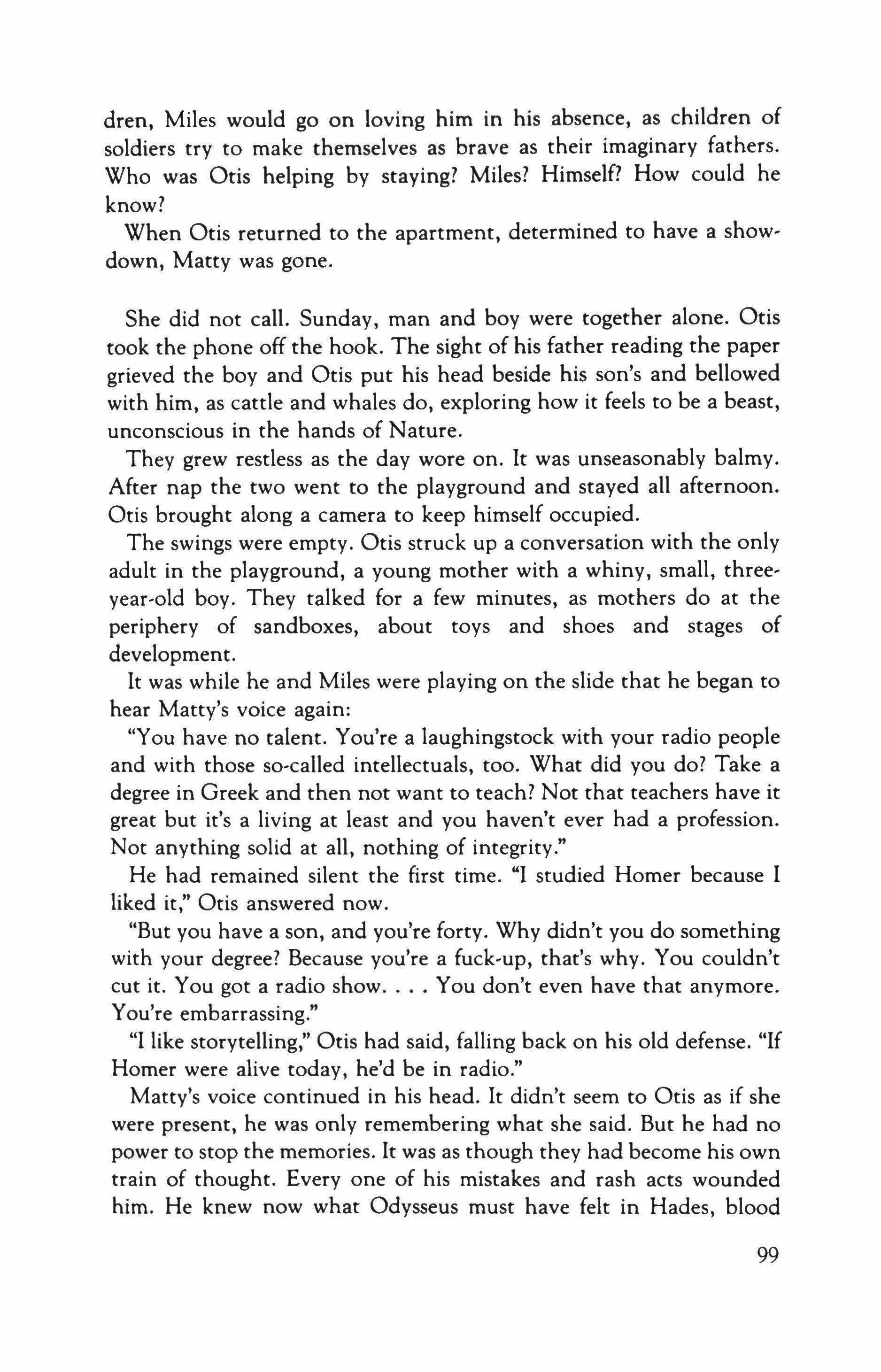
dren, Miles would go on loving him in his absence, as children of soldiers try to make themselves as brave as their imaginary fathers. Who was Otis helping by staying? Miles? Himself? How could he know?
When Otis returned to the apartment, determined to have a show, down, Matty was gone.
She did not call. Sunday, man and boy were together alone. Otis took the phone off the hook. The sight of his father reading the paper grieved the boy and Otis put his head beside his son's and bellowed with him, as cattle and whales do, exploring how it feels to be a beast, unconscious in the hands of Nature.
They grew restless as the day wore on. It was unseasonably balmy. After nap the two went to the playground and stayed all afternoon. Otis brought along a camera to keep himself occupied.
The swings were empty. Otis struck up a conversation with the only adult in the playground, a young mother with a whiny, small, three, year-old boy. They talked for a few minutes, as mothers do at the periphery of sandboxes, about toys and shoes and stages of development.
It was while he and Miles were playing on the slide that he began to hear Matty's voice again:
lOyou have no talent. You're a laughingstock with your radio people and with those so-called intellectuals, too. What did you do? Take a degree in Greek and then not want to teach? Not that teachers have it great but it's a living at least and you haven't ever had a profession. Not anything solid at all, nothing of integrity."
He had remained silent the first time. "I studied Homer because I liked it," Otis answered now.
"But you have a son, and you're forty. Why didn't you do something with your degree? Because you're a fuck-up, that's why You couldn't cut it. You got a radio show You don't even have that anymore. You're embarrassing."
"I like storytelling," Otis had said, falling back on his old defense. "If Homer were alive today, he'd be in radio."
Matty's voice continued in his head. It didn't seem to Otis as if she were present, he was only remembering what she said. But he had no power to stop the memories. It was as though they had become his own train of thought. Everyone of his mistakes and rash acts wounded him. He knew now what Odysseus must have felt in Hades, blood
99
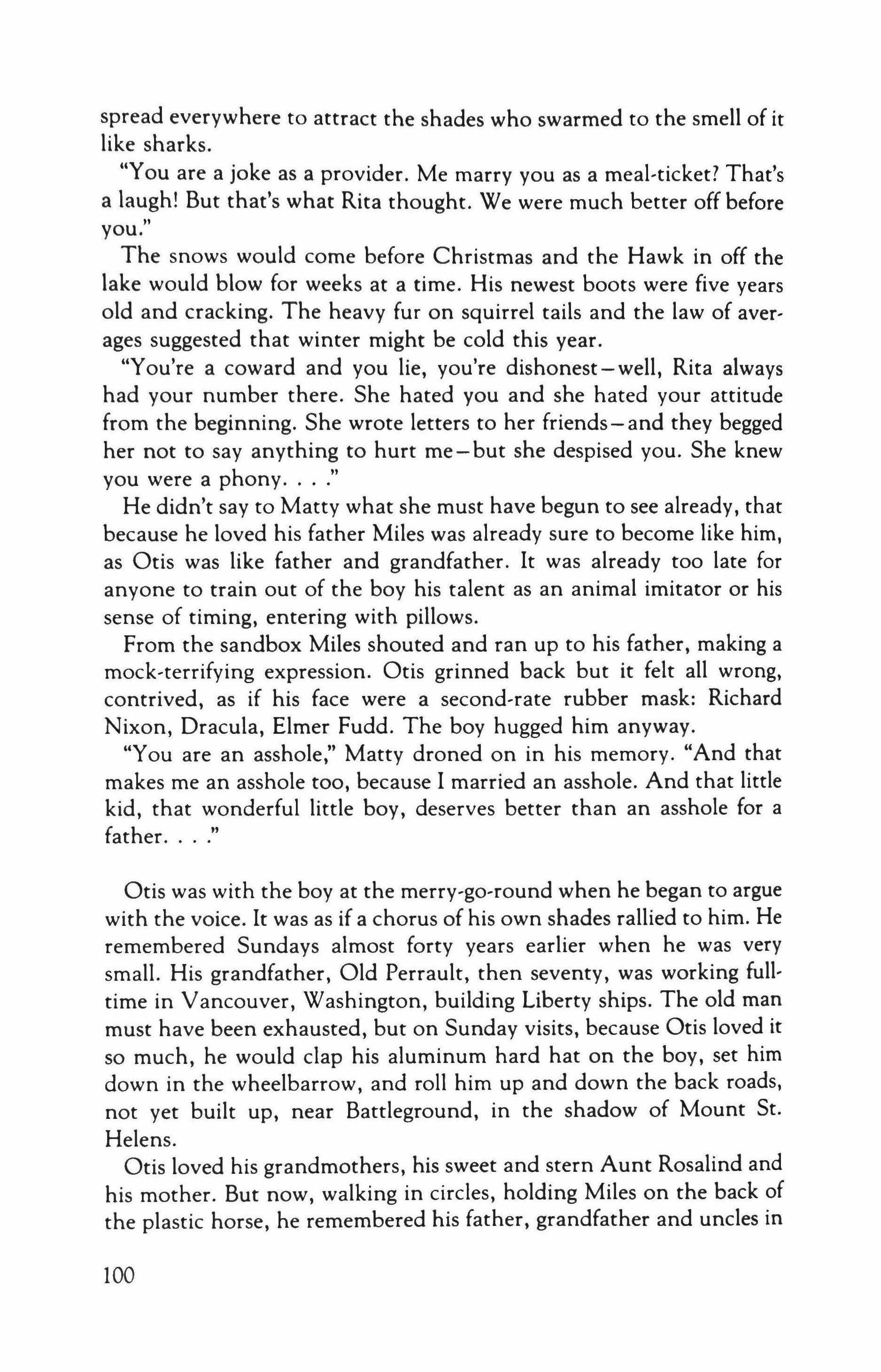
spread everywhere to attract the shades who swarmed to the smell of it like sharks.
"You are a joke as a provider. Me marry you as a meal-ticket? That's a laugh! But that's what Rita thought. We were much better off before you."
The snows would come before Christmas and the Hawk in off the lake would blow for weeks at a time. His newest boots were five years old and cracking. The heavy fur on squirrel tails and the law of averages suggested that winter might be cold this year.
"You're a coward and you lie, you're dishonest - well, Rita always had your number there. She hated you and she hated your attitude from the beginning. She wrote letters to her friends-and they begged her not to say anything to hurt me-but she despised you. She knew you were a phony
He didn't say to Matty what she must have begun to see already, that because he loved his father Miles was already sure to become like him, as Otis was like father and grandfather, It was already too late for anyone to train out of the boy his talent as an animal imitator or his sense of timing, entering with pillows.
From the sandbox Miles shouted and ran up to his father, making a mock-terrifying expression. Otis grinned back but it felt all wrong, contrived, as if his face were a second-rate rubber mask: Richard Nixon, Dracula, Elmer Fudd. The boy hugged him anyway.
"You are an asshole," Matty droned on in his memory. "And that makes me an asshole too, because I married an asshole. And that little kid, that wonderful little boy, deserves better than an asshole for a father ,"
Otis was with the boy at the merry-go-round when he began to argue with the voice. It was as if a chorus of his own shades rallied to him. He remembered Sundays almost forty years earlier when he was very small. His grandfather, Old Perrault, then seventy, was working fulltime in Vancouver, Washington, building Liberty ships. The old man must have been exhausted, but on Sunday visits, because Otis loved it so much, he would clap his aluminum hard hat on the boy, set him down in the wheelbarrow, and roll him up and down the back roads, not yet built up, near Battleground, in the shadow of Mount St. Helens.
Otis loved his grandmothers, his sweet and stern Aunt Rosalind and his mother. But now, walking in circles, holding Miles on the back of the plastic horse, he remembered his father, grandfather and uncles in
100
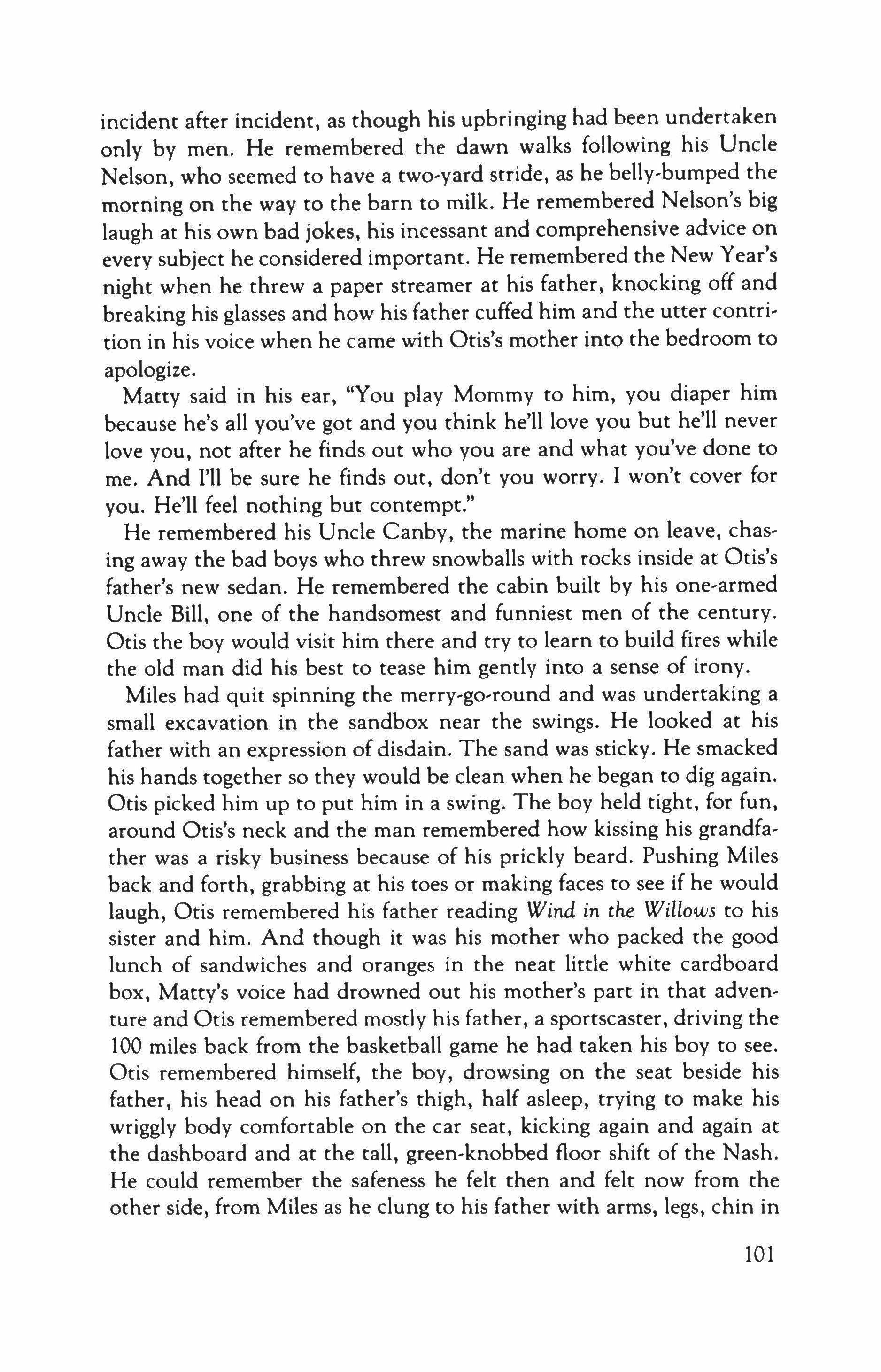
incident after incident, as though his upbringing had been undertaken only by men. He remembered the dawn walks following his Uncle Nelson, who seemed to have a two-yard stride, as he belly-bumped the morning on the way to the barn to milk. He remembered Nelson's big laugh at his own bad jokes, his incessant and comprehensive advice on every subject he considered important. He remembered the New Year's night when he threw a paper streamer at his father, knocking off and breaking his glasses and how his father cuffed him and the utter contrition in his voice when he came with Otis's mother into the bedroom to apologize.
Matty said in his ear, "You play Mommy to him, you diaper him because he's all you've got and you think he'll love you but he'll never love you, not after he finds out who you are and what you've done to me. And I'll be sure he finds out, don't you worry. I won't cover for you. He'll feel nothing but contempt."
He remembered his Uncle Canby, the marine home on leave, chasing away the bad boys who threw snowballs with rocks inside at Otis's father's new sedan. He remembered the cabin built by his one-armed Uncle Bill, one of the handsomest and funniest men of the century. Otis the boy would visit him there and try to learn to build fires while the old man did his best to tease him gently into a sense of irony.
Miles had quit spinning the merry-go-round and was undertaking a small excavation in the sandbox near the swings. He looked at his father with an expression of disdain. The sand was sticky. He smacked his hands together so they would be clean when he began to dig again. Otis picked him up to put him in a swing. The boy held tight, for fun, around Otis's neck and the man remembered how kissing his grandfather was a risky business because of his prickly beard. Pushing Miles back and forth, grabbing at his toes or making faces to see if he would laugh, Otis remembered his father reading Wind in the Willows to his sister and him. And though it was his mother who packed the good lunch of sandwiches and oranges in the neat little white cardboard box, Matty's voice had drowned out his mother's part in that adventure and Otis remembered mostly his father, a sportscaster, driving the 100 miles back from the basketball game he had taken his boy to see. Otis remembered himself, the boy, drowsing on the seat beside his father, his head on his father's thigh, half asleep, trying to make his wriggly body comfortable on the car seat, kicking again and again at the dashboard and at the tall, green-knobbed floor shift of the Nash. He could remember the safeness he felt then and felt now from the other side, from Miles as he clung to his father with arms, legs, chin in
101
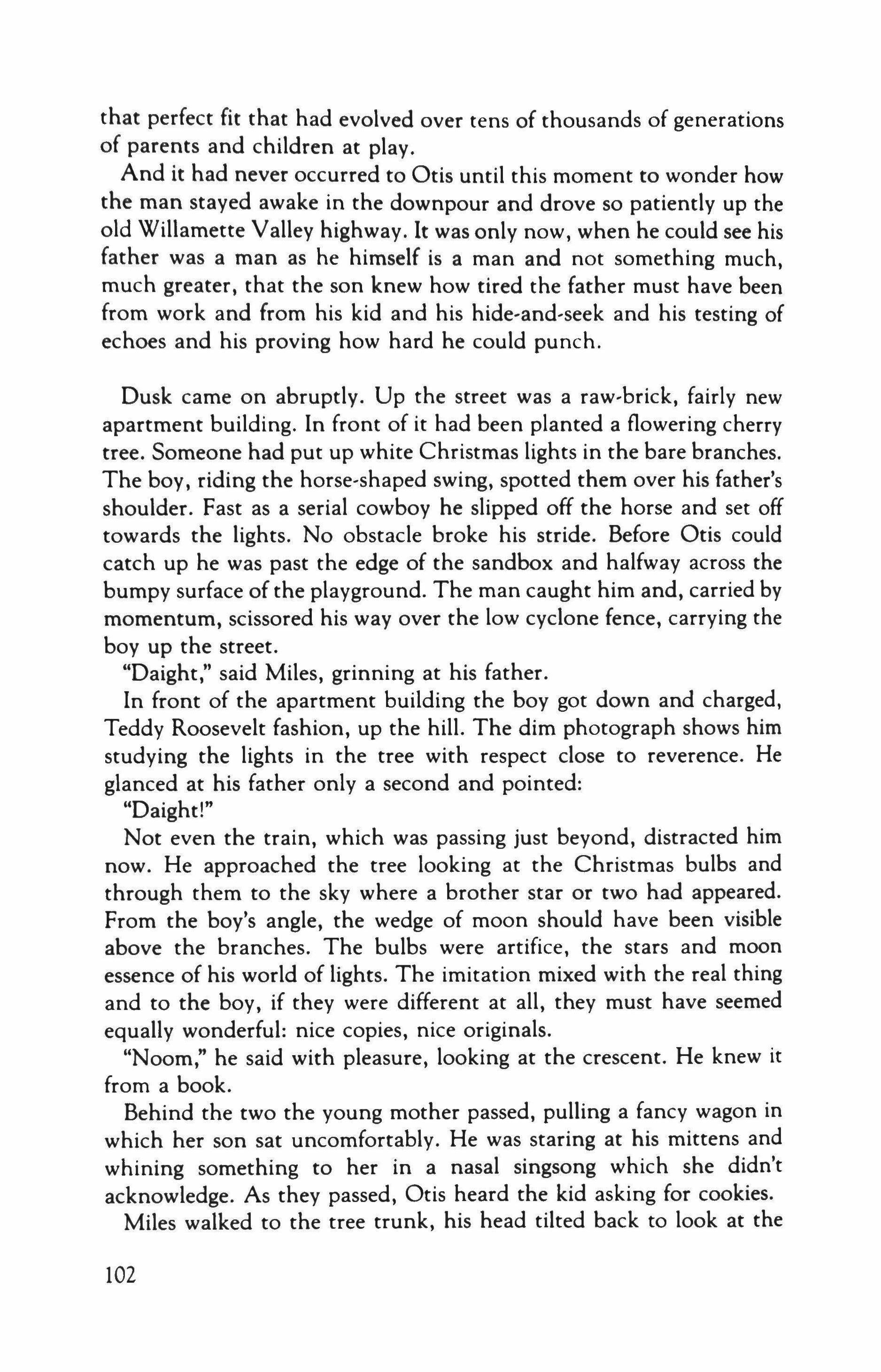
that perfect fit that had evolved over tens of thousands of generations of parents and children at play.
And it had never occurred to Otis until this moment to wonder how the man stayed awake in the downpour and drove so patiently up the old Willamette Valley highway. It was only now, when he could see his father was a man as he himself is a man and not something much, much greater, that the son knew how tired the father must have been from work and from his kid and his hide-and-seek and his testing of echoes and his proving how hard he could punch.
Dusk came on abruptly. Up the street was a raw-brick, fairly new apartment building. In front of it had been planted a flowering cherry tree. Someone had put up white Christmas lights in the bare branches. The boy, riding the horse-shaped swing, spotted them over his father's shoulder. Fast as a serial cowboy he slipped off the horse and set off towards the lights. No obstacle broke his stride. Before Otis could catch up he was past the edge of the sandbox and halfway across the bumpy surface of the playground. The man caught him and, carried by momentum, scissored his way over the low cyclone fence, carrying the boy up the street.
"Daight," said Miles, grinning at his father.
In front of the apartment building the boy got down and charged, Teddy Roosevelt fashion, up the hill. The dim photograph shows him studying the lights in the tree with respect close to reverence. He glanced at his father only a second and pointed:
"Daight!"
Not even the train, which was passing just beyond, distracted him now. He approached the tree looking at the Christmas bulbs and through them to the sky where a brother star or two had appeared. From the boy's angle, the wedge of moon should have been visible above the branches. The bulbs were artifice, the stars and moon essence of his world of lights. The imitation mixed with the real thing and to the boy, if they were different at all, they must have seemed equally wonderful: nice copies, nice originals.
"Noom," he said with pleasure, looking at the crescent. He knew it from a book.
Behind the two the young mother passed, pulling a fancy wagon in which her son sat uncomfortably. He was staring at his mittens and whining something to her in a nasal singsong which she didn't acknowledge. As they passed, Otis heard the kid asking for cookies. Miles walked to the tree trunk, his head tilted back to look at the
102

lights and beyond to deep space. The tree that supported the lights must have seemed to support the real stars, the moon, the clouds and the airplanes as well. Almost solemnly-with goodwill and fellow feeling-the boy reached out and patted the bark, showing his admiration and offering encouragement. He called to his father and after a moment the man walked up the hill and stood next to the boy looking up at the lights for himself.
103
Fireflies
David Michael Kaplan
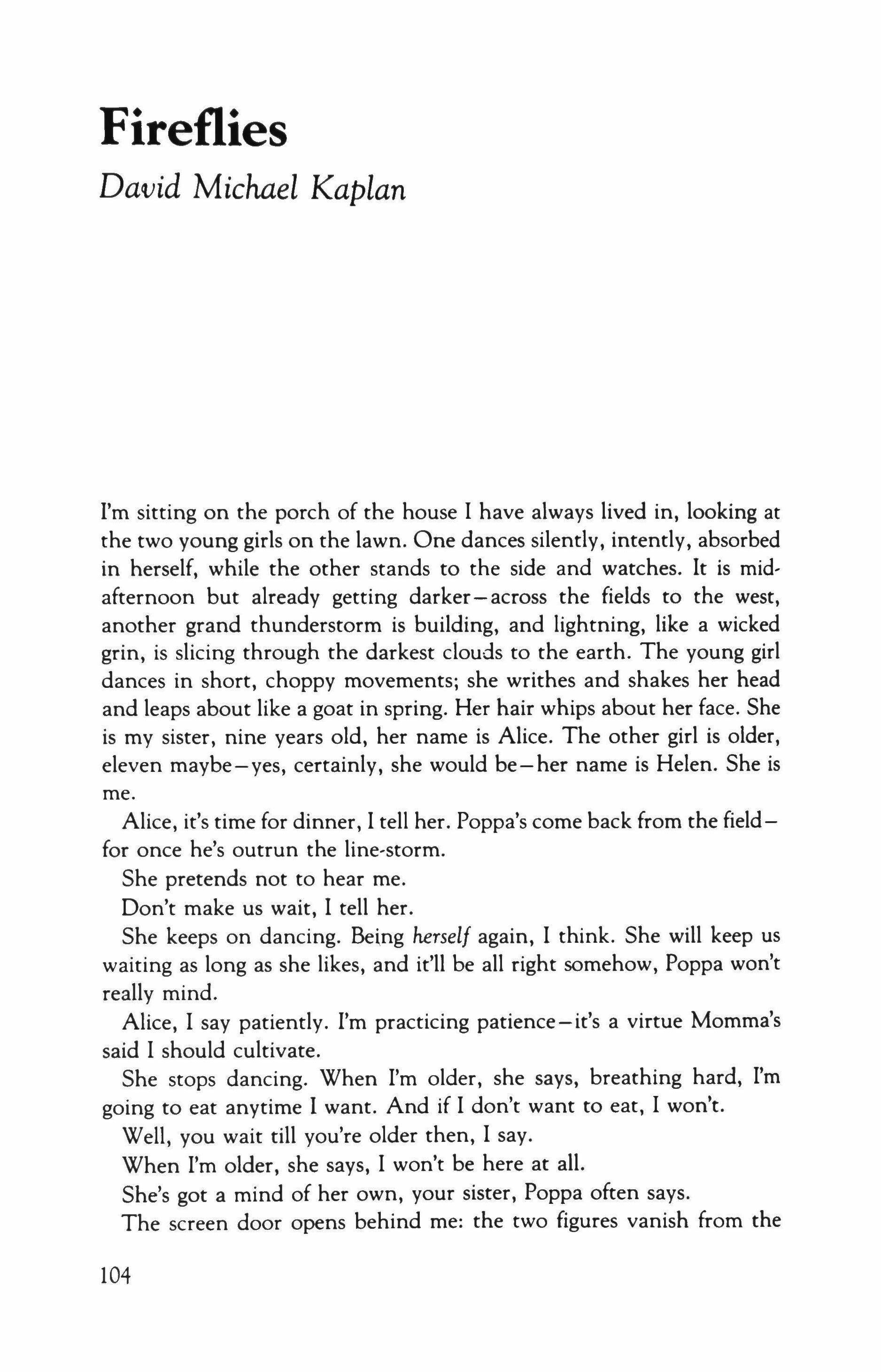
I'm sitting on the porch of the house I have always lived in, looking at the two young girls on the lawn. One dances silently, intently, absorbed in herself, while the other stands to the side and watches. It is midafternoon but already getting darker - across the fields to the west, another grand thunderstorm is building, and lightning, like a wicked grin, is slicing through the darkest clouds to the earth. The young girl dances in short, choppy movementSj she writhes and shakes her head and leaps about like a goat in spring. Her hair whips about her face. She is my sister, nine years old, her name is Alice. The other girl is older, eleven maybe-yes, certainly, she would be-her name is Helen. She is me.
Alice, it's time for dinner, I tell her. Poppa's come back from the fieldfor once he's outrun the line-storm.
She pretends not to hear me.
Don't make us wait, I tell her.
She keeps on dancing. Being herself again, I think. She will keep us waiting as long as she likes, and it'll be all right somehow, Poppa won't really mind.
Alice, I say patiently. I'm practicing patience-it's a virtue Momma's said I should cultivate.
She stops dancing. When I'm older, she says, breathing hard, I'm going to eat anytime I want. And if I don't want to eat, I won't.
Well, you wait till you're older then, I say.
When I'm older, she says, I won't be here at all.
She's got a mind of her own, your sister, Poppa often says.
The screen door opens behind me: the two figures vanish from the
104

lawn. I don't turn around, because I know who's there. I listen for her to pull up a chair.
"Hot," Alice says. "So goddamn hot." She pours a vodka tonic from the pitcher she's made and sits down beside me. "Why don't you get this place air-conditioned?"
"We've never had air conditioning here, Alice. Momma and Poppa never wanted it."
"Well, they're not here anymore. You are."
I think for a moment. "It wouldn't smell the same. It just wouldn't be the same old house."
She looks at me, shakes her head.
"I was just thinking about us," I say. "I was remembering how you used to dance on the lawn out there." I point to the spot I'd been staring at. "You used to jump around like a billy goat."
"I did?" She seems surprised.
"I used to watch you and wonder, What's she thinking about when she jumps around like that? You were in your own little world."
"I don't remember that at all."
"I used to think about you a lot," I tell her.
My sister is visiting me from San Diego, where she's been living the past three years. Before that she was in Los Angeles; before that, Portland, Maine. She's always put at least half a continent between here and wherever she's gone. "Why don't you consider Chicago sometime?" I've asked her. "Or St. Louis? Someplace that's closer to me and Poppa. Especially since he's gotten so sick."
"I don't think I could be that close," she tells me. "I've gotten spoiled by cities."
"St. Louis is a city," I tell her.
"Faraway cities," she says. "You know what I mean."
Your sister's a free spirit, my father used to say, smiling.
Yet she does come back in times of personal crisis. One night she called to say Frankie, her second husband, the tree trimmer, had just tried to run her over with the pickup. She came and stayed with me for a week. Another time she had a strange-looking mole removed and was sure it would be found malignant. She had to wait four days for the biopsy, so she came out and waited with me. Both times we drank a lot, and I reassured her a lot, and indeed the mole was benign (I held her hand while she phoned the doctor in San Diego), and she did go back to Frankie, although later they divorced anyway.
This time she's here because her lover of seven months, Kevin, has
105
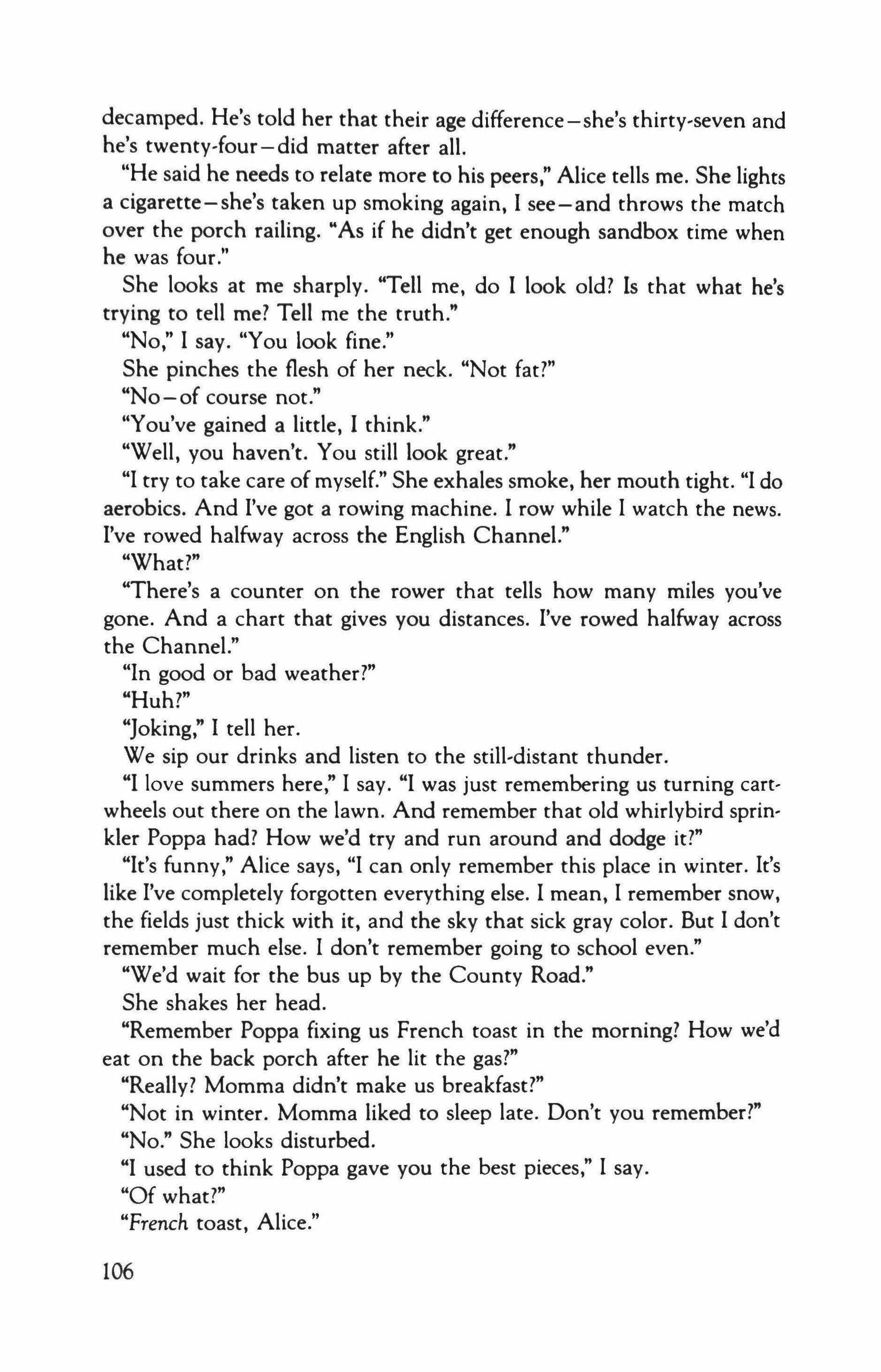
decamped. He's told her that their age difference-she's thirty-seven and he's twenty-four - did matter after all.
"He said he needs to relate more to his peers." Alice tells me. She lights a cigarette-she's taken up smoking again, I see-and throws the match over the porch railing. "As if he didn't get enough sandbox time when he was four."
She looks at me sharply. "Tell me, do I look old? Is that what he's trying to tell me? Tell me the truth."
"No," I say. "You look fine."
She pinches the flesh of her neck. "Not fat?"
"No - of course not."
"You've gained a little, I think."
"Well, you haven't. You still look great."
"I try to take care of myself." She exhales smoke. her mouth tight. "I do aerobics. And I've got a rowing machine. I row while I watch the news. I've rowed halfway across the English Channel."
"What?"
"There's a counter on the rower that tells how many miles you've gone. And a chart that gives you distances. I've rowed halfway across the Channel."
"In good or bad weather?"
"Huh?"
"Joking," I tell her.
We sip our drinks and listen to the still-distant thunder.
"I love summers here," I say. "I was just remembering us turning cartwheels out there on the lawn. And remember that old whirlybird sprinkler Poppa had? How we'd try and run around and dodge it?"
"It's funny," Alice says, "I can only remember this place in winter. It's like I've completely forgotten everything else. I mean, I remember snow, the fields just thick with it, and the sky that sick gray color. But I don't remember much else. I don't remember going to school even."
"We'd wait for the bus up by the County Road."
She shakes her head.
"Remember Poppa fixing us French toast in the morning? How we'd eat on the back porch after he lit the gas?"
"Really? Momma didn't make us breakfast?"
"Not in winter. Momma liked to sleep late. Don't you remember?"
"No." She looks disturbed.
"I used to think Poppa gave you the best pieces," I say.
"Of what?"
"French toast, Alice."
106
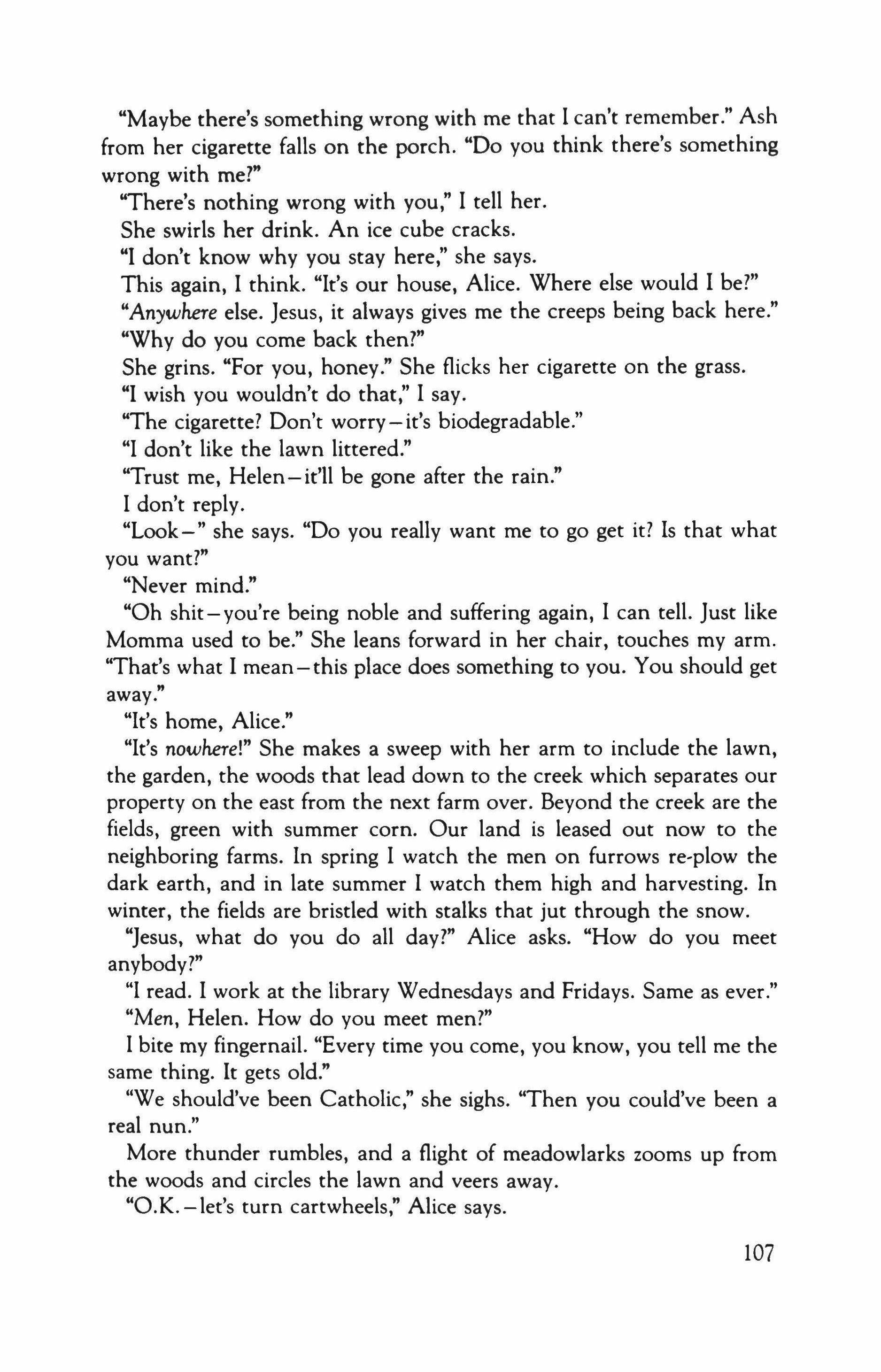
"Maybe there's something wrong with me that I can't remember." Ash from her cigarette falls on the porch. "Do you think there's something wrong with me?"
"There's nothing wrong with you," I tell her. She swirls her drink. An ice cube cracks.
"I don't know why you stay here," she says. This again, I think. "It's our house, Alice. Where else would 1 be?"
"Anywhere else. Jesus, it always gives me the creeps being back here."
"Why do you come back then?"
She grins. "For you, honey." She flicks her cigarette on the grass.
"1 wish you wouldn't do that," I say.
"The cigarette? Don't worry-it's biodegradable."
"I don't like the lawn littered."
"Trust me, Helen-it'll be gone after the rain."
I don't reply.
"Look-" she says. "Do you really want me to go get it? Is that what you want?"
"Never mind."
"Oh shit-you're being noble and suffering again, I can tell. Just like Momma used to be." She leans forward in her chair, touches my arm. "That's what I mean - this place does something to you. You should get away."
"It's home, Alice."
"It's nowhere!" She makes a sweep with her arm to include the lawn, the garden, the woods that lead down to the creek which separates our property on the east from the next farm over. Beyond the creek are the fields, green with summer corn. Our land is leased out now to the neighboring farms. In spring I watch the men on furrows re-plow the dark earth, and in late summer I watch them high and harvesting. In winter, the fields are bristled with stalks that jut through the snow.
"Jesus, what do you do all day?" Alice asks. "How do you meet anybody?"
"I read. I work at the library Wednesdays and Fridays. Same as ever."
"Men, Helen. How do you meet men?"
I bite my fingernail. "Every time you come, you know, you tell me the same thing. It gets old."
"We should've been Catholic," she sighs. "Then you could've been a real nun."
More thunder rumbles, and a flight of meadowlarks zooms up from the woods and circles the lawn and veers away.
"O.K. -let's turn cartwheels," Alice says.
107
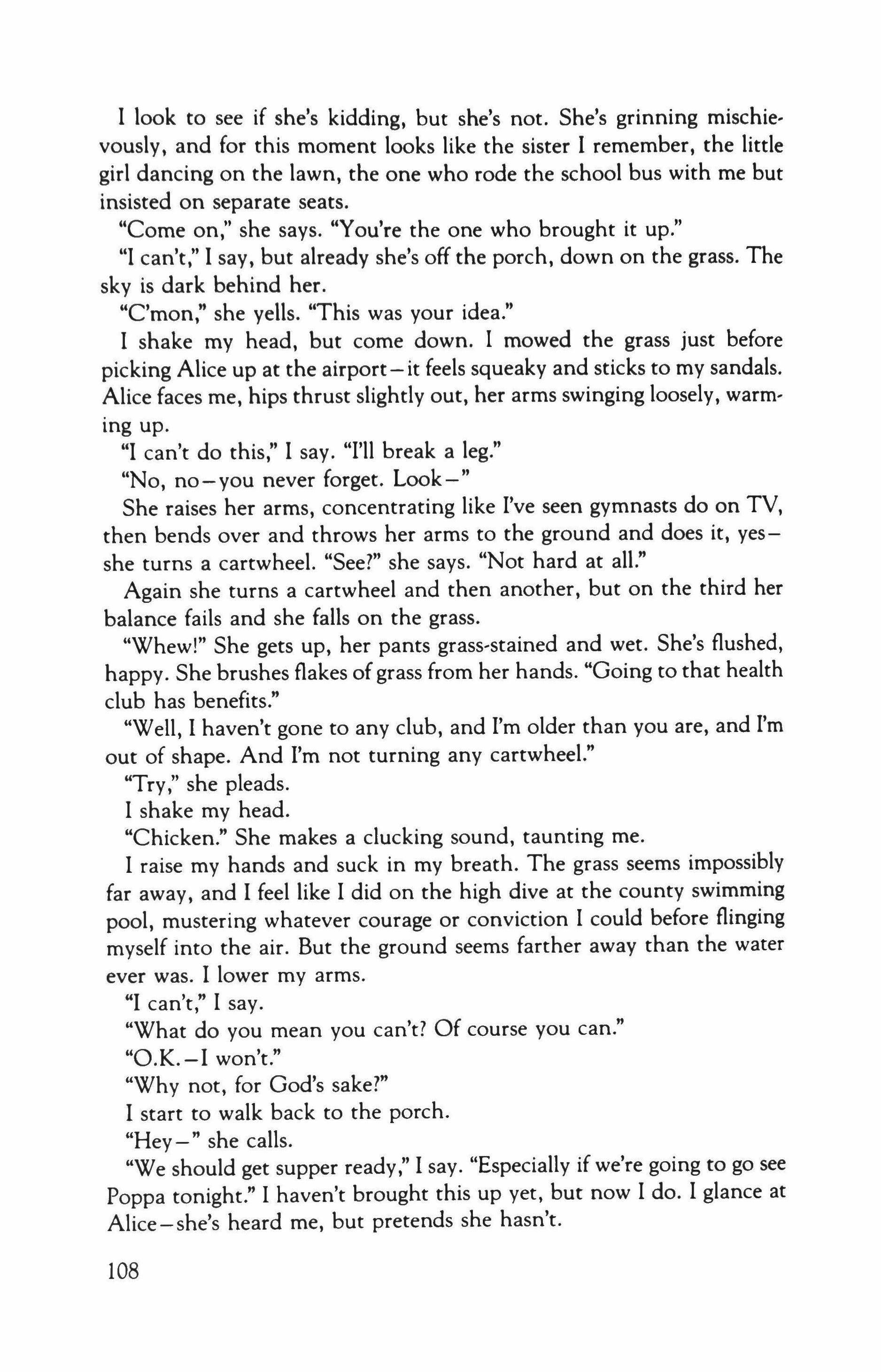
I look to see if she's kidding, but she's not. She's grinning mischievously, and for this moment looks like the sister I remember, the little girl dancing on the lawn, the one who rode the school bus with me but insisted on separate seats.
"Come on," she says. "You're the one who brought it up."
"I can't," I say, but already she's off the porch, down on the grass. The sky is dark behind her.
"C'mon," she yells. "This was your idea."
I shake my head, but come down. I mowed the grass just before picking Alice up at the airport-it feels squeaky and sticks to my sandals. Alice faces me, hips thrust slightly out, her arms swinging loosely, warming up.
"I can't do this," I say. "I'll break a leg."
"No, no-you never forget. Look-"
She raises her arms, concentrating like I've seen gymnasts do on TV, then bends over and throws her arms to the ground and does it, yesshe turns a cartwheel. "See?" she says. "Not hard at all."
Again she turns a cartwheel and then another, but on the third her balance fails and she falls on the grass.
"Whew!" She gets up, her pants grass-stained and wet. She's flushed, happy. She brushes flakes of grass from her hands. "Going to that health club has benefits."
"Well, I haven't gone to any club, and I'm older than you are, and I'm out of shape. And I'm not turning any cartwheel."
"Try," she pleads.
1 shake my head.
"Chicken." She makes a clucking sound, taunting me.
I raise my hands and suck in my breath. The grass seems impossibly far away, and I feel like I did on the high dive at the county swimming pool, mustering whatever courage or conviction I could before flinging myself into the air. But the ground seems farther away than the water ever was. I lower my arms.
"I can't," I say.
"What do you mean you can't? Of course you can."
"O.K.-I won't."
"Why not, for God's sake?"
1 start to walk back to the porch.
"Hey -" she calls.
"We should get supper ready," I say. "Especially if we're going to go see Poppa tonight." 1 haven't brought this up yet, but now I do. I glance at Alice-she's heard me, but pretends she hasn't.
108
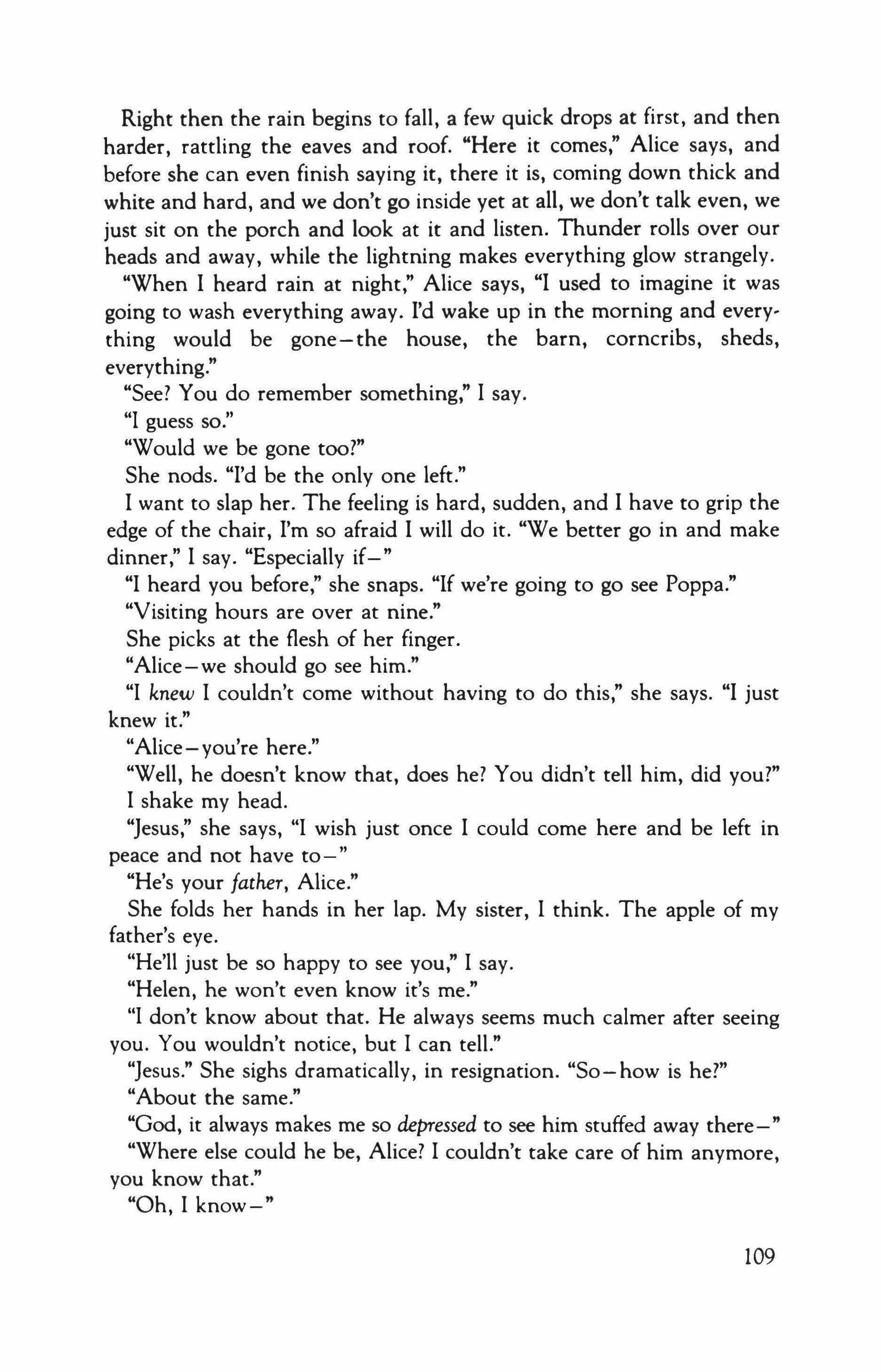
Right then the rain begins to fall, a few quick drops at first, and then harder, rattling the eaves and roof. "Here it comes," Alice says, and before she can even finish saying it, there it is, coming down thick and white and hard, and we don't go inside yet at all, we don't talk even, we just sit on the porch and look at it and listen. Thunder rolls over our heads and away, while the lightning makes everything glow strangely.
"When 1 heard rain at night," Alice says, "I used to imagine it was going to wash everything away. I'd wake up in the morning and everything would be gone-the house, the barn, corncribs, sheds, everything."
"See? You do remember something," 1 say.
"I guess so."
"Would we be gone too?"
She nods. "I'd be the only one left."
1 want to slap her. The feeling is hard, sudden, and 1 have to grip the edge of the chair, I'm so afraid 1 will do it. "We better go in and make dinner," 1 say. "Especially if -
"I heard you before," she snaps. "If we're going to go see Poppa,"
"Visiting hours are over at nine."
She picks at the flesh of her finger.
"Alice-we should go see him."
"I knew 1 couldn't come without having to do this," she says. "I just knew it."
"Alice-you're here."
"Well, he doesn't know that, does he? You didn't tell him, did you?"
1 shake my head.
"Jesus," she says, "I wish just once 1 could come here and be left in peace and not have to -
"He's your father, Alice."
She folds her hands in her lap. My sister, 1 think. The apple of my father's eye.
"He'll just be so happy to see you," 1 say.
"Helen, he won't even know it's me."
"I don't know about that. He always seems much calmer after seeing you. You wouldn't notice, but 1 can tell."
"Jesus." She sighs dramatically, in resignation. "So-how is he?"
"About the same."
"God, it always makes me so depressed to see him stuffed away there-"
"Where else could he be, Alice? 1 couldn't take care of him anymore, you know that."
"Oh, 1 know-"
109
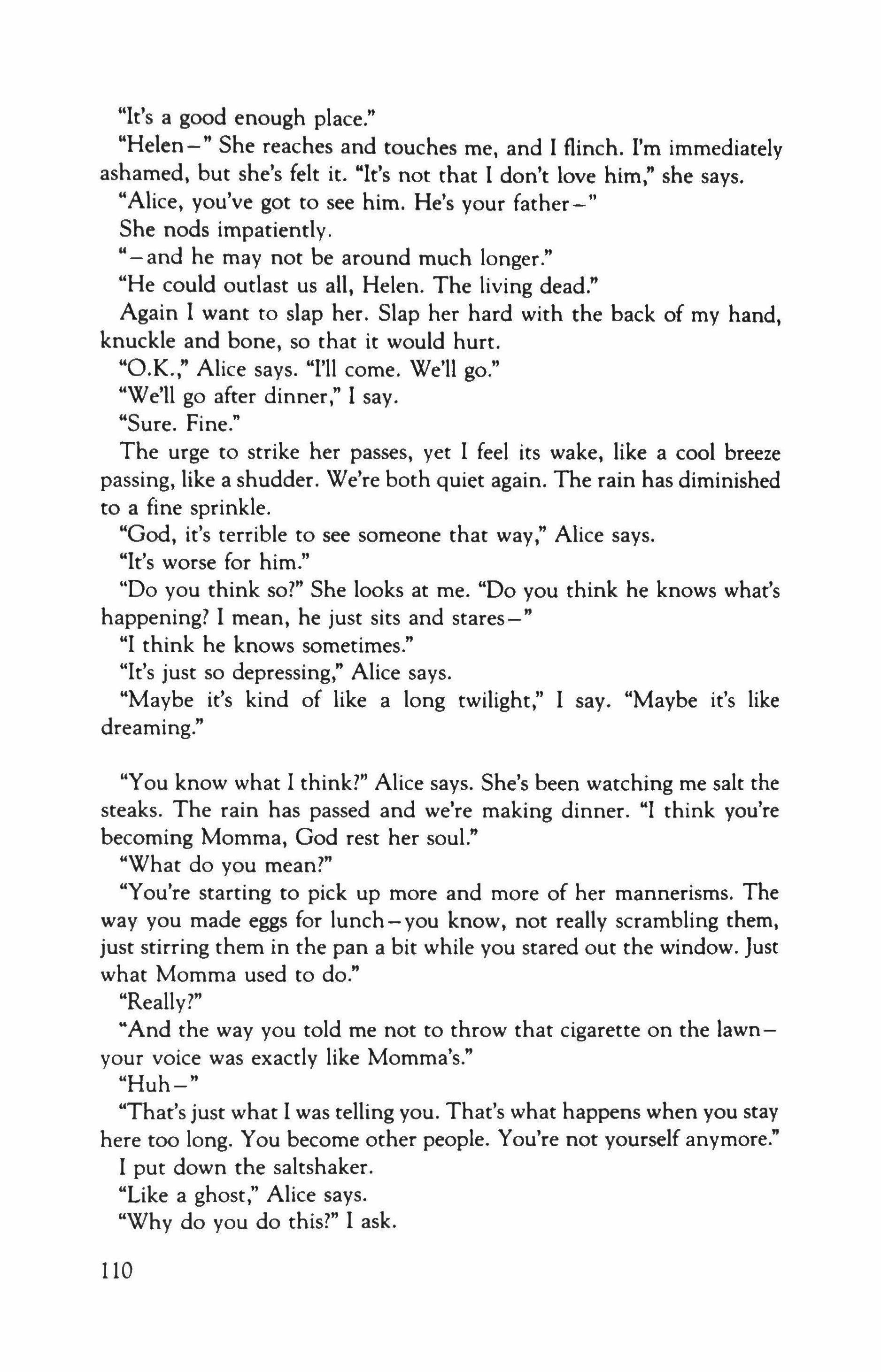
"It's a good enough place."
"Helen -" She reaches and touches me, and I flinch. I'm immediately ashamed, but she's felt it. "It's not that I don't love him," she says.
"Alice, you've got to see him. He's your father-" She nods impatiently.
" - and he may not be around much longer."
"He could outlast us all, Helen. The living dead."
Again I want to slap her. Slap her hard with the back of my hand, knuckle and bone, so that it would hurt.
"O.K.," Alice says. "I'll come. We'll go."
"We'll go after dinner," I say.
"Sure. Fine."
The urge to strike her passes, yet I feel its wake, like a cool breeze passing, like a shudder. We're both quiet again. The rain has diminished to a fine sprinkle.
"God, it's terrible to see someone that way," Alice says.
"It's worse for him."
"Do you think so?" She looks at me. "Do you think he knows what's happening? I mean, he just sits and stares -"
"I think he knows sometimes."
"It's just so depressing," Alice says.
"Maybe it's kind of like a long twilight," I say. "Maybe it's like dreaming."
"You know what I think?" Alice says. She's been watching me salt the steaks. The rain has passed and we're making dinner. "I think you're becoming Momma, God rest her soul."
"What do you mean?"
"You're starting to pick up more and more of her mannerisms. The way you made eggs for lunchyou know, not really scrambling them, just stirring them in the pan a bit while you stared out the window. Just what Momma used to do."
"Really?"
"And the way you told me not to throw that cigarette on the lawnyour voice was exactly like Momma's."
"Huh-"
"That's just what I was telling you. That's what happens when you stay here too long. You become other people. You're not yourself anymore." I put down the saltshaker.
"Like a ghost," Alice says.
"Why do you do this?" I ask.
110

"Do what?"
"You come here and you tell me I'm not living right. Just what do you want me to do? Get up, sell the place, move to San Diego? Join your health club?"
"O.K. Forget it. I'm sorry."
"Leave Poppa?"
"What good are you doing him here, Helen? Just tell me."
I put the steaks in the oven beside the potatoes. "It makes him happy when I visit."
"Bullshit. He doesn't even know you're there."
"Sometimes he does. I know he does." I start cutting carrots. "He's not dead, you know. You may think he is, but he isn't."
"Helen - I don't think he's dead."
"Well, you talk like you do."
"Oh, forget it."
"Why don't you help a bit?" I say. "Why don't you make a dressing?"
Alice sighs and goes to the refrigerator for the mayonnaise. We work silently for awhile, me cutting vegetables, her making the dressing. And then I just can't take it anymore.
"Don't tell me how to lead my life." My voice is quavering. "I'm doing fine, just fine."
"Helen, let's just drop it. Please."
"You know," I tell her, "if I wasn't here, you wouldn't have any place to come running back to. When your life falls apart. Did you ever think of that?"
"Please let's not fight." She sounds weary. "What does it matter? Look at us-two childless, unmarried old ladies. After you and me and Poppa are gone, it'll all be over anyway."
It smells so nice and fresh outside, and the sky has such a golden glow, that we take our dessert-a sponge cake I baked-onto the porch. The air is thick and musky. We've agreed, without saying so, to stop arguing.
"Remember how after a really heavy rain," I tell Alice, "there'd always be so many fireflies?"
"Fireflies -"
"We'd really look forward to evening because we knew there'd be millions of them."
She smiles. "I used to think there were little explosions going off inside them, and that's why they glowed."
We laugh.
111

"Alice, remember how we'd catch them in a jar? If you got enough, it'd be like a lantern. You could almost read by it."
"I don't remember that," she says.
"Do you remember how you tried to thread a bunch of them once?" "No-" She looks puzzled. "What do you mean?"
"You got a needle and thread. You wanted to thread them together to make a firefly necklace."
"Oh no-not really?"
I nod. "You actually tried, but the fireflies kept dying. 'Their glow goes out,' you said. You were so disappointed."
"I can't believe I did that." She seems disturbed. "You're not making that up, are you?"
I shake my head. "You kept trying. You were so persistent."
"I wish you hadn't told me that." She puts down her plate. She's staring at me, and I smile, and then I realize there are tears in her eyes, my sister is crying.
"Oh, why can't I remember anything?" she says. "What's wrong with me? I can't remember anything that happens to me. I'm crying about Kevin and in a year I won't remember him. Why can't I just remember?" She wipes her eyes and sniffs, and then folds her hands in her lap, primly almost, like I've seen old women do. And I see her sitting exactly the same way on another evening on another porch, the smell of rain and onions in the air like now, summer. She sits with her hands folded, she is old, she is trying to remember something. She is trying to remember this evening, us, now. She is trying to remember me. And I think how we exist as much in each other's minds as in our own lives, ghosts as much as flesh and blood. The thought makes my stomach flip-flop, as if I've come down a very fast elevator.
"We should get going," I say. "We don't want to miss visiting hours."
The nursing home is some twenty miles away, and for a while we drive on the interstate. Alice is quiet. She rolls down a window and lights a cigarette. The air smells wet and freshly turned.
"All this rain," she says. "And it's still hot. God."
We turn off the interstate onto New Dairy Road. When I was a child, Poppa used to take us out here on drives after church. Much of it has now been turned into housing subdivisions, shopping centers, a new county high school. But I can still see them, the farms that used to be here.
Alice stares out the window, drums her fingers against her knee. And
112
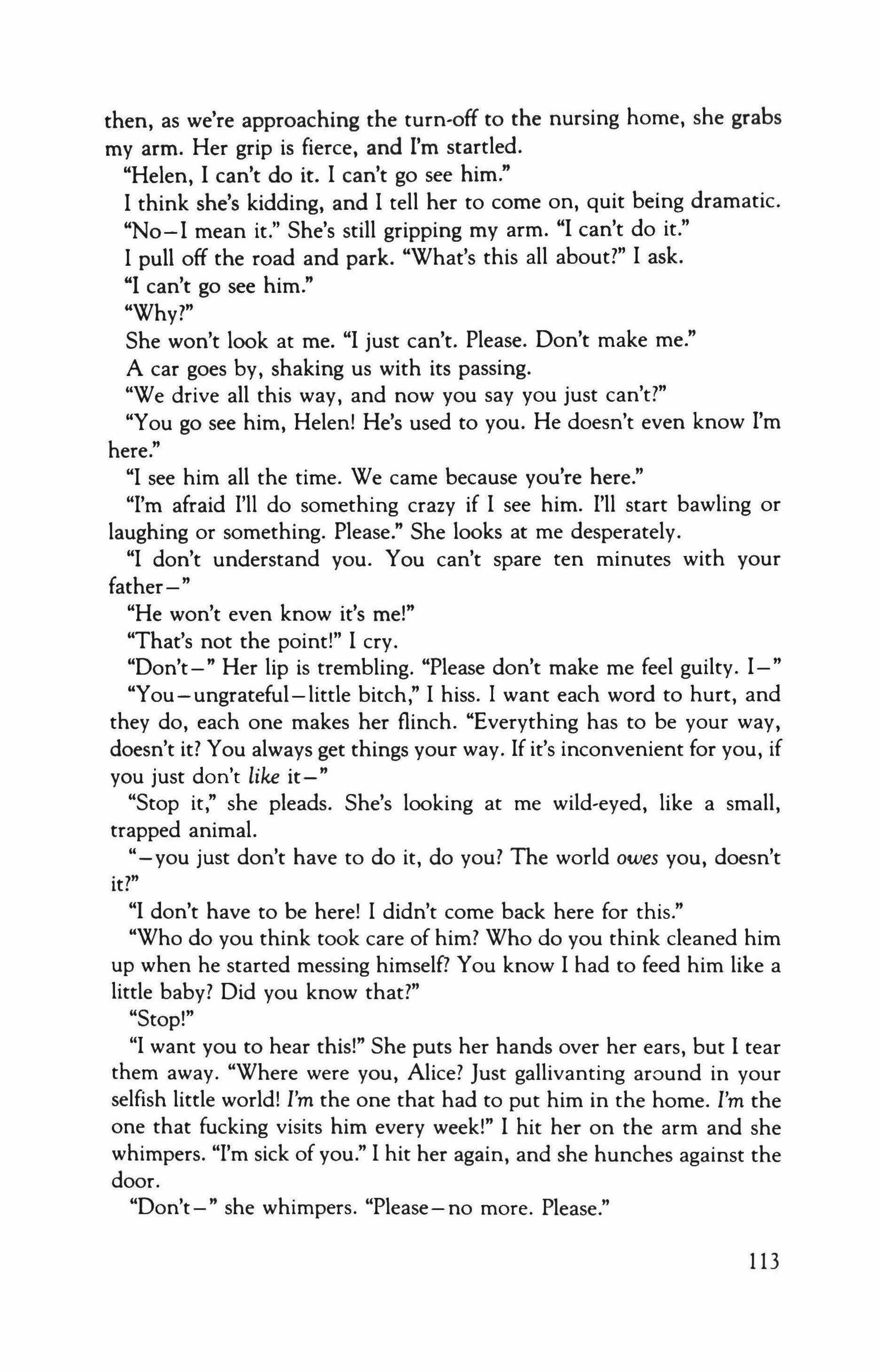
then, as we're approaching the turn-off to the nursing home, she grabs my arm. Her grip is fierce, and I'm startled.
"Helen, 1 can't do it. 1 can't go see him."
1 think she's kidding, and 1 tell her to come on, quit being dramatic.
"No-I mean it." She's still gripping my arm. "I can't do it."
1 pull off the road and park. "What's this all about?" 1 ask.
"I can't go see him."
"Why?"
She won't look at me. "I just can't. Please. Don't make me."
A car goes by, shaking us with its passing.
"We drive all this way, and now you say you just can't?"
"You go see him, Helen! He's used to you. He doesn't even know I'm here."
"I see him all the time. We came because you're here."
"I'm afraid I'll do something crazy if 1 see him. I'll start bawling or laughing or something. Please." She looks at me desperately.
"I don't understand you. You can't spare ten minutes with your father-"
"He won't even know it's me!"
"That's not the point!" 1 cry.
"Don't -" Her lip is trembling. "Please don't make me feel guilty. 1 -"
"You - ungrateful-little bitch," 1 hiss. 1 want each word to hurt, and they do, each one makes her flinch. "Everything has to be your way, doesn't it? You always get things your way. If it's inconvenient for you, if you just don't like it-"
"Stop it," she pleads. She's looking at me wild-eyed, like a small, trapped animal.
"-you just don't have to do it, do you? The world owes you, doesn't it?"
"I don't have to be here! 1 didn't come back here for this."
"Who do you think took care of him? Who do you think cleaned him up when he started messing himself? You know I had to feed him like a little baby? Did you know that?"
"Stop!"
"I want you to hear this!" She puts her hands over her ears, but I tear them away. "Where were you, Alice? Just gallivanting around in your selfish little world! I'm the one that had to put him in the home. I'm the one that fucking visits him every week!" 1 hit her on the arm and she whimpers. "I'm sick of you." 1 hit her again, and she hunches against the door.
"Don't-" she whimpers. "Please-no more. Please."
113
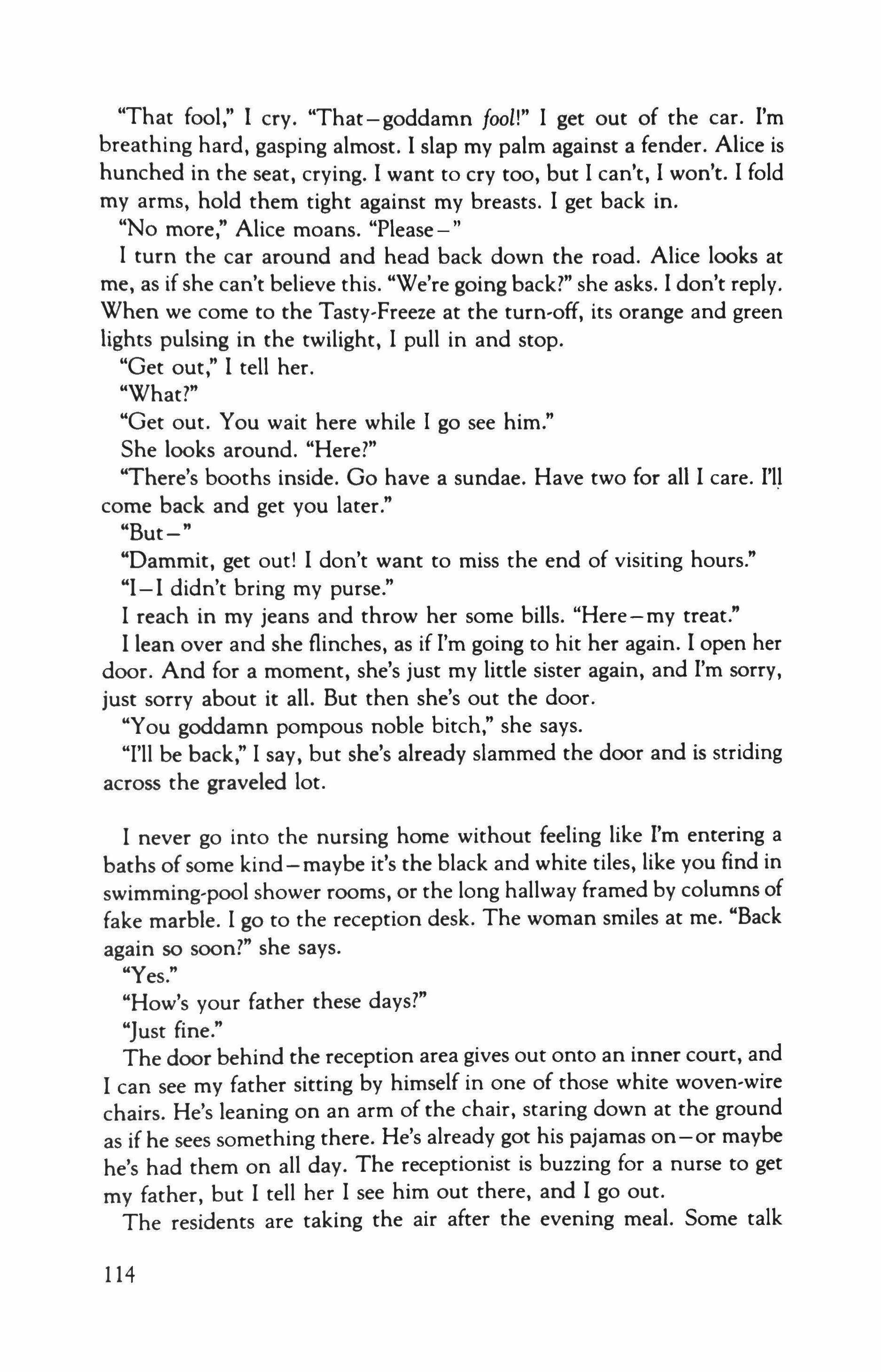
"That fool," I cry. "That-goddamn fool!" I get out of the car. I'm breathing hard, gasping almost. I slap my palm against a fender. Alice is hunched in the seat, crying. I want to cry too, but I can't, I won't. I fold my arms, hold them tight against my breasts. I get back in.
"No more," Alice moans. "Please-"
I turn the car around and head back down the road. Alice looks at me, as if she can't believe this. "We're going back?" she asks. I don't reply. When we come to the Tasty-Freeze at the turn-off, its orange and green lights pulsing in the twilight, I pull in and stop.
"Get out," I tell her.
"What?"
"Get out. You wait here while I go see him."
She looks around. "Here?"
"There's booths inside. Go have a sundae. Have two for all I care. I'U come back and get you later."
"But-"
"Damrnit, get out! I don't want to miss the end of visiting hours."
"I - I didn't bring my purse."
I reach in my jeans and throw her some bills. "Here-my treat."
I lean over and she flinches, as if I'm going to hit her again. I open her door. And for a moment, she's just my little sister again, and I'm sorry, just sorry about it all. But then she's out the door.
"You goddamn pompous noble bitch," she says.
"I'll be back," I say, but she's already slammed the door and is striding across the graveled lot.
I never go into the nursing home without feeling like I'm entering a baths of some kind - maybe it's the black and white tiles, like you find in swimming-pool shower rooms, or the long hallway framed by columns of fake marble. I go to the reception desk. The woman smiles at me. "Back again so soon?" she says.
"Yes."
"How's your father these days?"
"Just fine."
The door behind the reception area gives out onto an inner court, and I can see my father sitting by himself in one of those white woven-wire chairs. He's leaning on an arm of the chair, staring down at the ground as if he sees something there. He's already got his pajamas on-or maybe he's had them on all day. The receptionist is buzzing for a nurse to get my father, but I tell her I see him out there, and I go out.
The residents are taking the air after the evening meal. Some talk
114
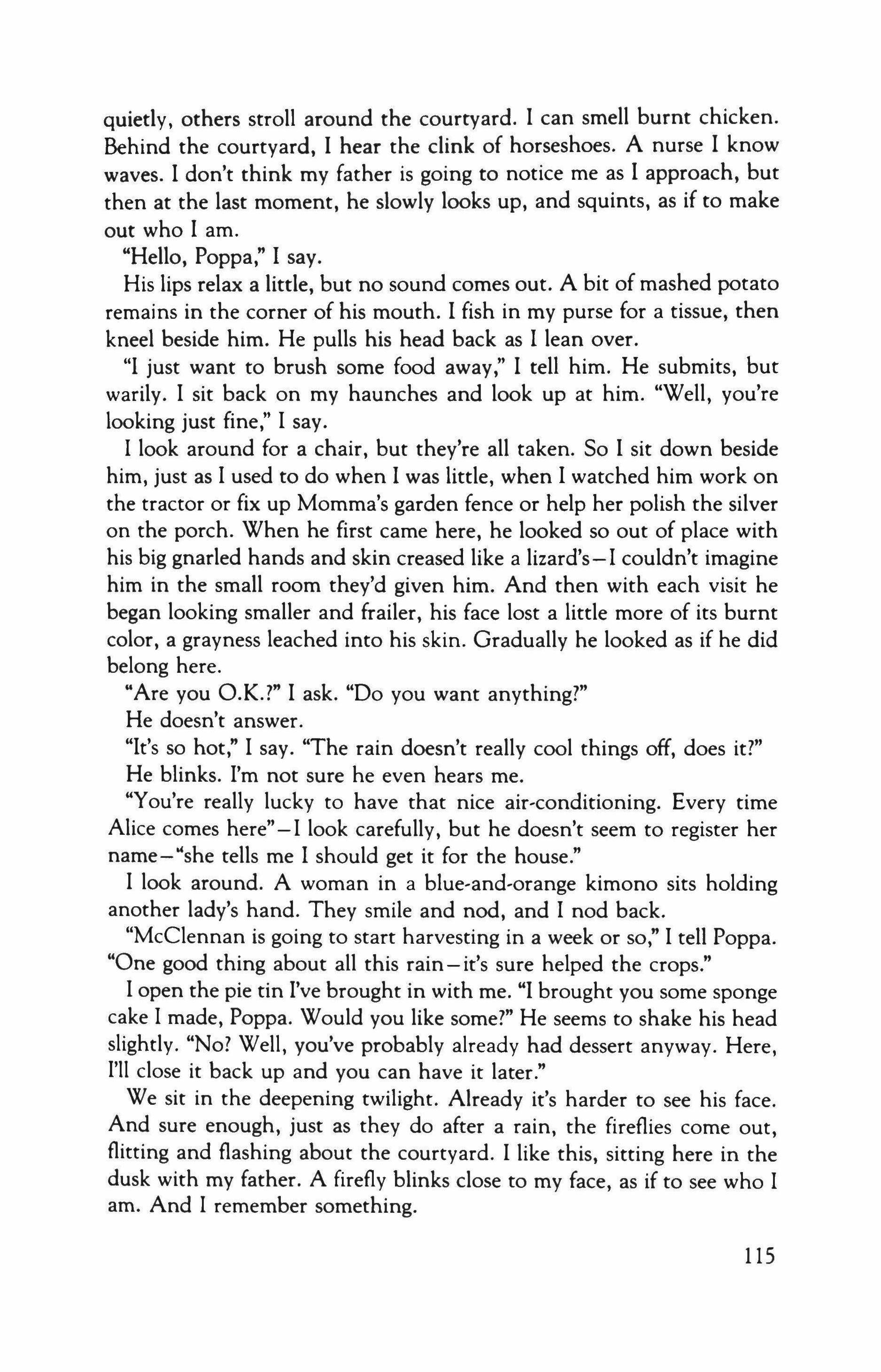
quietly, others stroll around the courtyard. I can smell burnt chicken. Behind the courtyard, I hear the clink of horseshoes. A nurse I know waves. I don't think my father is going to notice me as I approach, but then at the last moment, he slowly looks up, and squints, as if to make out who I am.
"Hello, Poppa," I say.
His lips relax a little, but no sound comes out. A bit of mashed potato remains in the corner of his mouth. I fish in my purse for a tissue, then kneel beside him. He pulls his head back as I lean over.
"I just want to brush some food away," I tell him. He submits, but warily. I sit back on my haunches and look up at him. "Well, you're looking just fine," I say.
I look around for a chair, but they're all taken. So I sit down beside him, just as I used to do when I was little, when I watched him work on the tractor or fix up Momma's garden fence or help her polish the silver on the porch. When he first came here, he looked so out of place with his big gnarled hands and skin creased like a lizard's-I couldn't imagine him in the small room they'd given him. And then with each visit he began looking smaller and frailer, his face lost a little more of its burnt color, a grayness leached into his skin. Gradually he looked as if he did belong here.
"Are you O.K.?" I ask. "Do you want anything?"
He doesn't answer.
"It's so hot," I say. "The rain doesn't really cool things off, does it?"
He blinks. I'm not sure he even hears me.
"You're really lucky to have that nice air-conditioning. Every time Alice comes here"-I look carefully, but he doesn't seem to register her name- "she tells me I should get it for the house."
I look around. A woman in a blue-and-orange kimono sits holding another lady's hand. They smile and nod, and I nod back.
"McClennan is going to start harvesting in a week or so," I tell Poppa. "One good thing about all this rain - it's sure helped the crops."
I open the pie tin I've brought in with me. "I brought you some sponge cake I made, Poppa. Would you like some?" He seems to shake his head slightly. "No? Well, you've probably already had dessert anyway. Here, I'll close it back up and you can have it later."
We sit in the deepening twilight. Already it's harder to see his face. And sure enough, just as they do after a rain, the fireflies come out, flitting and flashing about the courtyard. I like this, sitting here in the dusk with my father. A firefly blinks close to my face, as if to see who I am. And I remember something.
115

"Poppa - remember that Fourth ofJuly when you had to work out late in the fields, way after dark? Because harvest was so early? And Alice and I were all upset because you weren't back and we wanted to light our sparklers?"
He turns his head - he's listening, I know.
"Momma packed us up in the car and drove us out to the fields and we saw you there, riding high on the combine. Oh, you looked like a king, Poppa! We walked over, and you got down, and we all lit sparklers. And we just stood there with our sparklers, the four of us."
His lower lip is trembling-he does remember!
"But the greatest thing was the fireflies. There were fireflies all around us-thousands of them. Remember?" I squeeze his hand. "The sparklers were like fireflies, and the fireflies were like sparklers. It was just magic. Alice wondered if the fireflies were celebrating too."
His lip is trembling harder- he is trying to say something to me.
"Poppa?" 1 say. "What?"
Alice," he says. His only word all evening. Alice.
I put my hand on his knee and grip it hard. "She's here, Poppa. She came to visit this weekend."
His eyes open wider.
"But she's not here, Poppa. 1 wanted her to come see you, but she didn't want to." A tremor seems to pass through his leg. 1 hold it tighter. "She's waiting down the road -I'm going to pick her up on my way back. She didn't want to see you, Poppa."
He seems to stiffen and shrink back within himself, and immediately I'm sorry. "Please -" 1 say, "I shouldn't have said anything, Poppa. I'm sorry." I press his knee. "Please, Poppa-I'm sorry." The cloth of his pants feels hot, and for a moment I panic, imagining that something precious and fluid, his very soul, is leaking from him. And then 1 realize and pull my hand away. My father is staring straight ahead, and he is urinating.
About a mile from the nursing home my headlights pick up a figure walking along the berm. It's my sister. I stop and back up. Blinded by the lights, she didn't even notice it was me. She blinks and shades her eyes as I pull up, not sure who I am, then recognizes the car. She opens the door. Before 1 can ask what she's going here, she cries, "I was coming, Helen! I was coming to see him."
1 shake my head.
"Can't we go see him?"
"It's too late. Visiting hours are over."
116

She gets in and slumps in her seat. We say nothing more all the way back to the house.
Alice gets the pitcher of vodka tonics from the refrigerator. We sit on the porch, watching the fireflies, listening to the crickets and the whipporwill down by the creek.
"Two crazy old sisters," Alice says.
"Yes," I say.
"I can see what's going to happen," she says. "Nothing's really going to work out. I won't get married again, and you won't either. Eventually I'll be old, and you'll be old, and I'll drift back here. We'll be sitting on this porch together just like this. Just watch."
"Maybe that won't happen at all," I say "You deserve something better than me."
"You're my destiny, Helen," she says. "You'll get me yet."
I sit and watch the darkness and breathe in the night's warmth, the smell of loamed earth, the sound of corn rustling, like a thousand green whispers. They are out there, I think: there are spirits in the fields, the lawn, the garden. The dead are not under the earth.
Alice is crying again, softly.
"What is it?" I ask. "What is it now?"
"It was just so cruel." I start-how could she know? "The fireflies," she says. "How could I have done that to them? Why didn't you stop me? How could we have been so cruel?"
117

Twenty nine Modern Indian Poems

Translated from Hindi and Marathi with a Foreword and Afterword
by Vinay Dharwadker

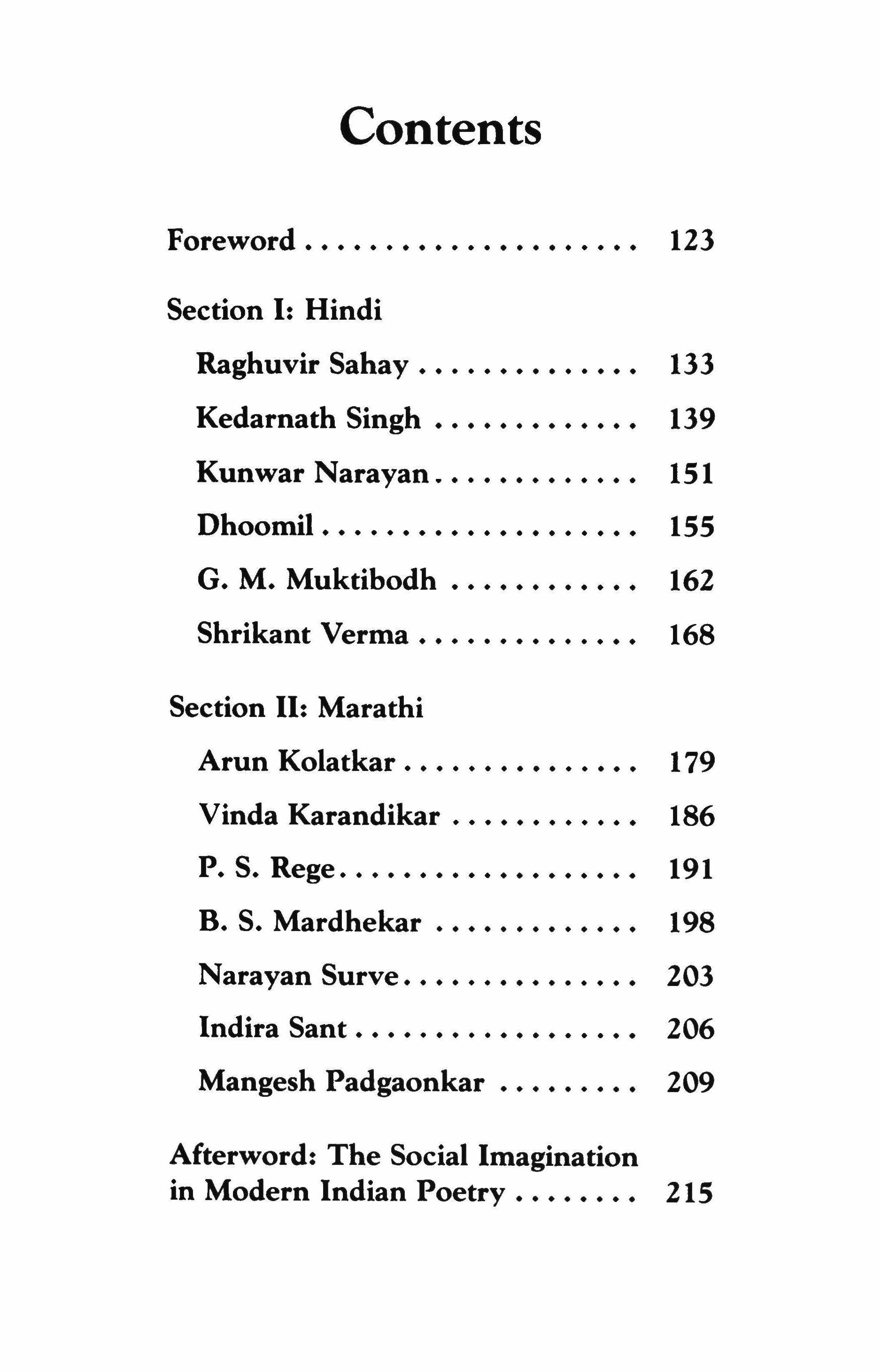
Contents Foreword. • 123 Section I: Hindi Raghuvir Sahay .• 133 Kedarnath Singh. 139 Kunwar Narayan. 151 Dhoomil • .• 155 G. M. Muktibodh •.•••• 162 Shrikant Verma • • 168 Section II: Marathi Arun Kolatkar •. 179 Vinda Karandikar .• 186 P. S. Rege 191 B. S. Mardhekar .•••. 198 Narayan Surve. .• 203 Indira Sant • .• 206 Mangesh Padgaonkar ..•. 209 Afterword: The Social Imagination in Modern Indian Poetry 215

Foreword
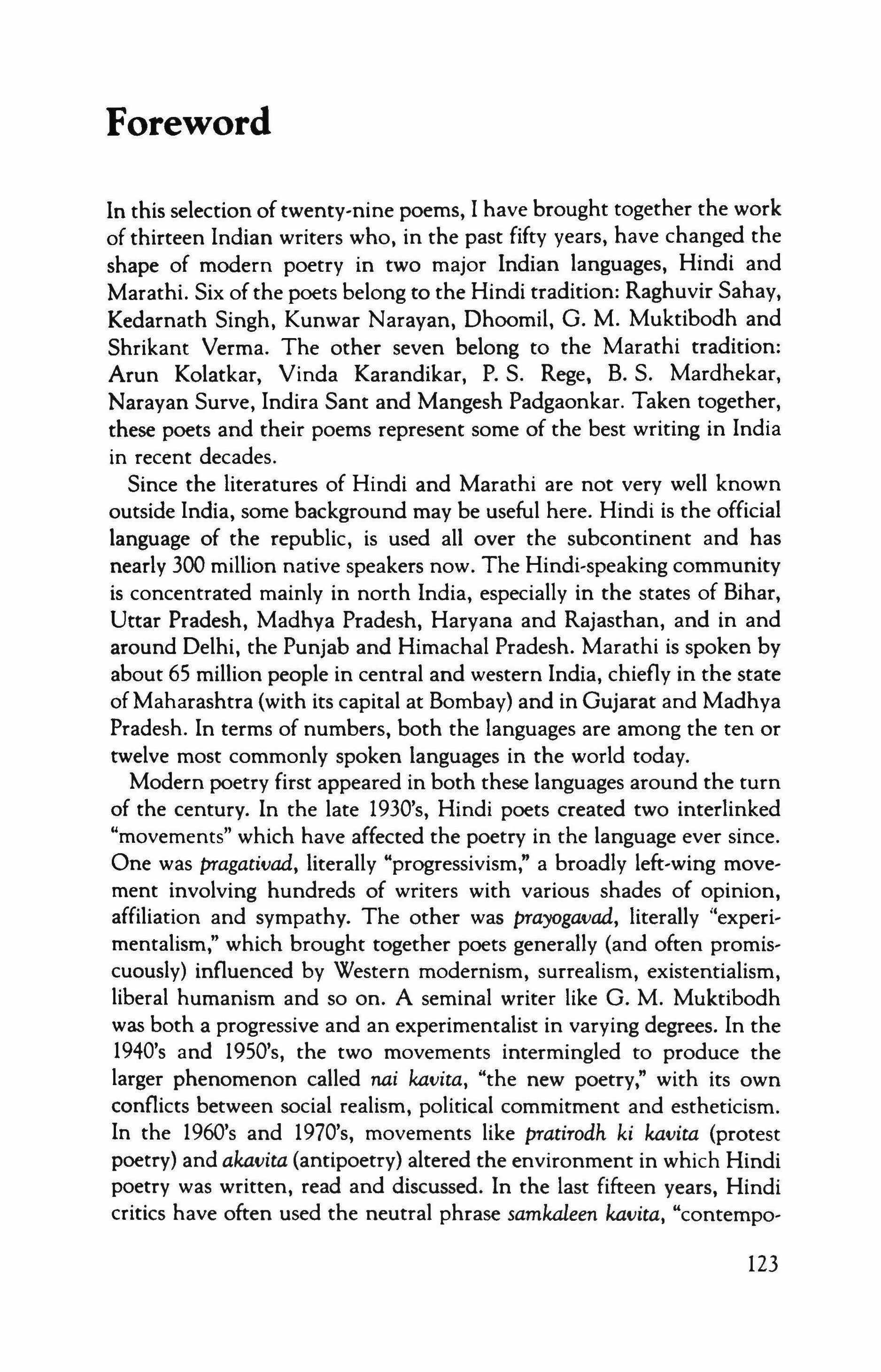
In this selection of twenty-nine poems, I have brought together the work of thirteen Indian writers who, in the past fifty years, have changed the shape of modern poetry in two major Indian languages, Hindi and Marathi. Six of the poets belong to the Hindi tradition: Raghuvir Sahay, Kedamath Singh, Kunwar Narayan, Dhoomil, G. M. Muktibodh and Shrikant Verma. The other seven belong to the Marathi tradition: Arun Kolatkar, Vinda Karandikar, P. S. Rege, B. S. Mardhekar, Narayan Surve, Indira Sant and Mangesh Padgaonkar. Taken together, these poets and their poems represent some of the best writing in India in recent decades.
Since the literatures of Hindi and Marathi are not very well known outside India, some background may be useful here. Hindi is the official language of the republic, is used all over the subcontinent and has nearly 300 million native speakers now. The Hindi-speaking community is concentrated mainly in north India, especially in the states of Bihar, Uttar Pradesh, Madhya Pradesh, Haryana and Rajasthan, and in and around Delhi, the Punjab and Himachal Pradesh. Marathi is spoken by about 65 million people in central and western India, chiefly in the state of Maharashtra (with its capital at Bombay) and in Gujarat and Madhya Pradesh. In terms of numbers, both the languages are among the ten or twelve most commonly spoken languages in the world today.
Modern poetry first appeared in both these languages around the turn of the century. In the late 1930's, Hindi poets created two interlinked "movements" which have affected the poetry in the language ever since. One was pragativad, literally "progressivism," a broadly left-wing movement involving hundreds of writers with various shades of opinion, affiliation and sympathy. The other was prayogavad, literally "experimentalism," which brought together poets generally (and often promiscuously) influenced by Western modernism, surrealism, existentialism, liberal humanism and so on. A seminal writer like G. M. Muktibodh was both a progressive and an experimentalist in varying degrees. In the 1940's and 1950's, the two movements intermingled to produce the larger phenomenon called nai kavita, "the new poetry," with its own conflicts between social realism, political commitment and estheticism. In the 1960's and 1970's, movements like pratirodh ki kavita (protest poetry) and akavita (antipoetry) altered the environment in which Hindi poetry was written, read and discussed. In the last fifteen years, Hindi critics have often used the neutral phrase samkaleen kavita, "conternpo-
123

rary poetry," to describe recent writing, but this label merely hides the persistent strains of the progressive, the experimental and the new poetry in the work of writers like Raghuvir Sahay, Kedarnath Singh, Kunwar Narayan, Dhoomil and Shrikant Verma.
The sequence of literary events has been different in Marathi. In the late 1930's and in the 1940's, Marathi poets launched a "movement" called natJa kavya, which also means "the new poetry." Its two earliest practitioners were P. S. Rege and B. S. Mardhekar, now often regarded as the two antitheses of twentieth-century poetry in the language. Partly in Mardhekar's poetry, and especially in the work of Vinda Karandikar, the new poetry acquired strong left-wing associations. At the same time, in the work of poets like Rege and the early Mangesh Padgaonkar and Indira Sant, the new poetry retained its links with an older, clearly conservative Marathi lyricism. In the 1960's, two very different "movements" pushed natJa kavya into the background. One was the "avantgarde" movement centered around poets like Arun Kolatkar, influenced simultaneously by European symbolism and surrealism and by premodern Marathi bhakti poetry. The other was the movement involving Dalit writers, former untouchables who converted to Buddhism in the late 1950's in an attempt to break down the Hindu caste system, and began writing poetry and fiction with a powerful social and political message. In the last two decades, these two movements have created a completely new atmosphere in the Mararhi literary world, and have changed the concerns even of the older natJa kavya poets, such as Sant and Padgaonkar.
These contexts, which I have simplified here for the sake of a beginning, will become more meaningful in the notes on the individual poets and poems that accompany the translations that follow. As far as the translations themselves are concerned, like other translators of poetry I have pursued two contradictory ends. On the one hand, I have tried [0 keep my versions faithful to the Hindi and Marathi poems in a variety of ways, so that they become, as it were, pure mediums of transmission. On the other hand, I have tried to make them work poetically and independently in English, so that they strike the reader's imagination the way poems written in this language do, without needing the prop of commentary or the excuse of being translations. Since this is a double standard and I have inevitably made a number of compromises, a few remarks on what my versions do and do not reflect may be helpful, especially to those readers who have no independent access to modern poetry in the Indian languages.
I have translated all twenty-nine poems into free verse because free
124

verse in English is the equivalent of what most of them achieve in their respective languages, and because even in the case of the few poems written in meter and rhyme, free verse now seems to me to be the most effective means of translation. In general I have used the freedom to maintain a close correspondence between an English version and the original poem at several levels-from punctuation, lineation and the arrangement of the poem on the page, to its overall poetic argument and, perhaps most importantly, its tone.
In Kendarnath Singh's "The Carpenter and the Bird," for instance, I have omitted all punctuation and have run consecutive sentences into each other without marking the transitions typographically because that is precisely what Singh does in Hindi. Nevertheless, there is an unavoidable gap between my version and the original poem even at this elernentary level, since there are no capital letters in the Devanagari script. I could have translated the poem into English without using capitals, but such a rendering would have made it feel different from Singh's poem in Hindi. In contrast, in Arun Kolatkar's four poems-"Buildings," "Bread," "Licked Clean" and "The Alphabet"-1 have eliminated all punctuation and capitalization, because there such devices produce exactly the kind of texture and effect Kolatkar achieves in Marathi, a quality that also marks him off from the twelve poets whose company he keeps here. In Singh's poem, again, I have preserved the appearance of the poem on the page: my seven verse-paragraphs mimic the seven corresponding units in the Hindi poem, although 1 have broken the lines a little differently for their rhythm and flow in English, and my version therefore contains thirty-two lines to his thirty. In Kolatkar's poems, however, I have been able to maintain a greater parity of stanzas and lines, and often even of what and how much each line says.
In several other cases, the relation between lineation, syntax, punctuation and meaning is more intricate, and after exploring various possibilities I have chosen the alternative that seemed to be poetically the most effective in English. Dhoornil, for example, punctuates "Twenty Years After Independence" and "The City, Evening, and an Old Man: Me" in Hindi, but he removes all commas, leaving behind only the strong breaks in sense and structure-periods, dashes, exclamation points, question marks, ellipses and parentheses. This means that between any two full stops Dhoomil usually brings together two or more phrases, clauses or sentences without marked transitions-except for line breaks that coincide with breaks in the syntax - and thus gives his poetic argument an unusual immediacy, fluidity and surreal, collage-like quality. I found that I could not replicate the strategy in English without making
125
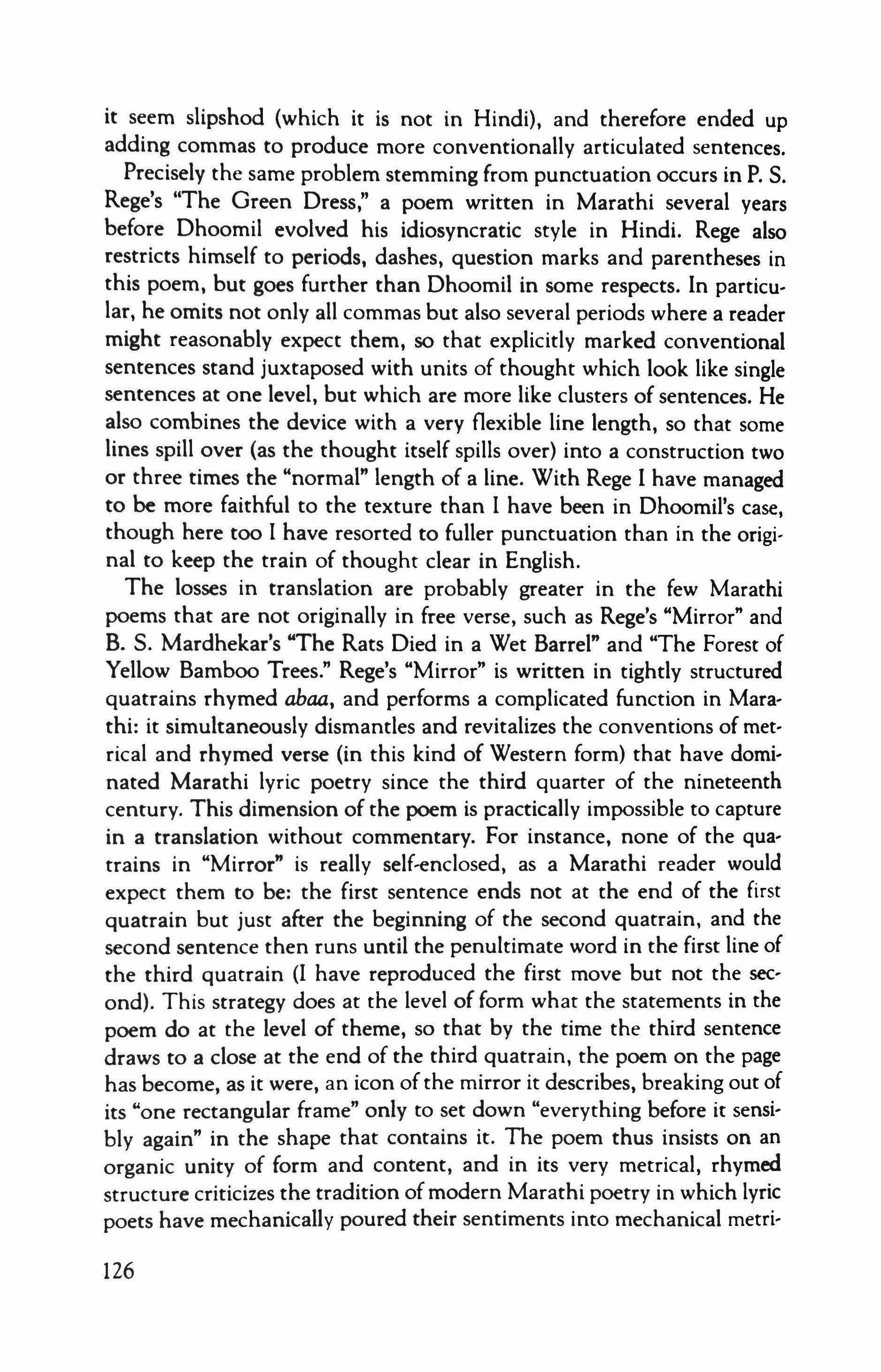
it seem slipshod (which it is not in Hindi), and therefore ended up adding commas to produce more conventionally articulated sentences.
Precisely the same problem stemming from punctuation occurs in P. S. Rege's "The Green Dress," a poem written in Marathi several years before Dhoomil evolved his idiosyncratic style in Hindi. Rege also restricts himself to periods, dashes, question marks and parentheses in this poem, but goes further than Dhoomil in some respects. In particular, he omits not only all commas but also several periods where a reader might reasonably expect them, so that explicitly marked conventional sentences stand juxtaposed with units of thought which look like single sentences at one level, but which are more like clusters of sentences. He also combines the device with a very flexible line length, so that some lines spill over (as the thought itself spills over) into a construction two or three times the "normal" length of a line. With Rege I have managed to be more faithful to the texture than I have been in Dhoomil's case, though here too I have resorted to fuller punctuation than in the original to keep the train of thought clear in English.
The losses in translation are probably greater in the few Marathi poems that are not originally in free verse, such as Rege's "Mirror" and B. S. Mardhekar's "The Rats Died in a Wet Barrel" and "The Forest of Yellow Bamboo Trees." Rege's "Mirror" is written in tightly structured quatrains rhymed abaa, and performs a complicated function in Marathi: it simultaneously dismantles and revitalizes the conventions of metrical and rhymed verse (in this kind of Western form) that have dominated Marathi lyric poetry since the third quarter of the nineteenth century. This dimension of the poem is practically impossible to capture in a translation without commentary. For instance, none of the quatrains in "Mirror" is really self-enclosed, as a Marathi reader would expect them to be: the first sentence ends not at the end of the first quatrain but just after the beginning of the second quatrain, and the second sentence then runs until the penultimate word in the first line of the third quatrain (I have reproduced the first move but not the second). This strategy does at the level of form what the statements in the poem do at the level of theme, so that by the time the third sentence draws to a close at the end of the third quatrain, the poem on the page has become, as it were, an icon ofthe mirror it describes, breaking out of its "one rectangular frame" only to set down "everything before it sensibly again" in the shape that contains it. The poem thus insists on an organic unity of form and content, and in its very metrical, rhymed structure criticizes the tradition of modern Marathi poetry in which lyric poets have mechanically poured their sentiments into mechanical metri-
126
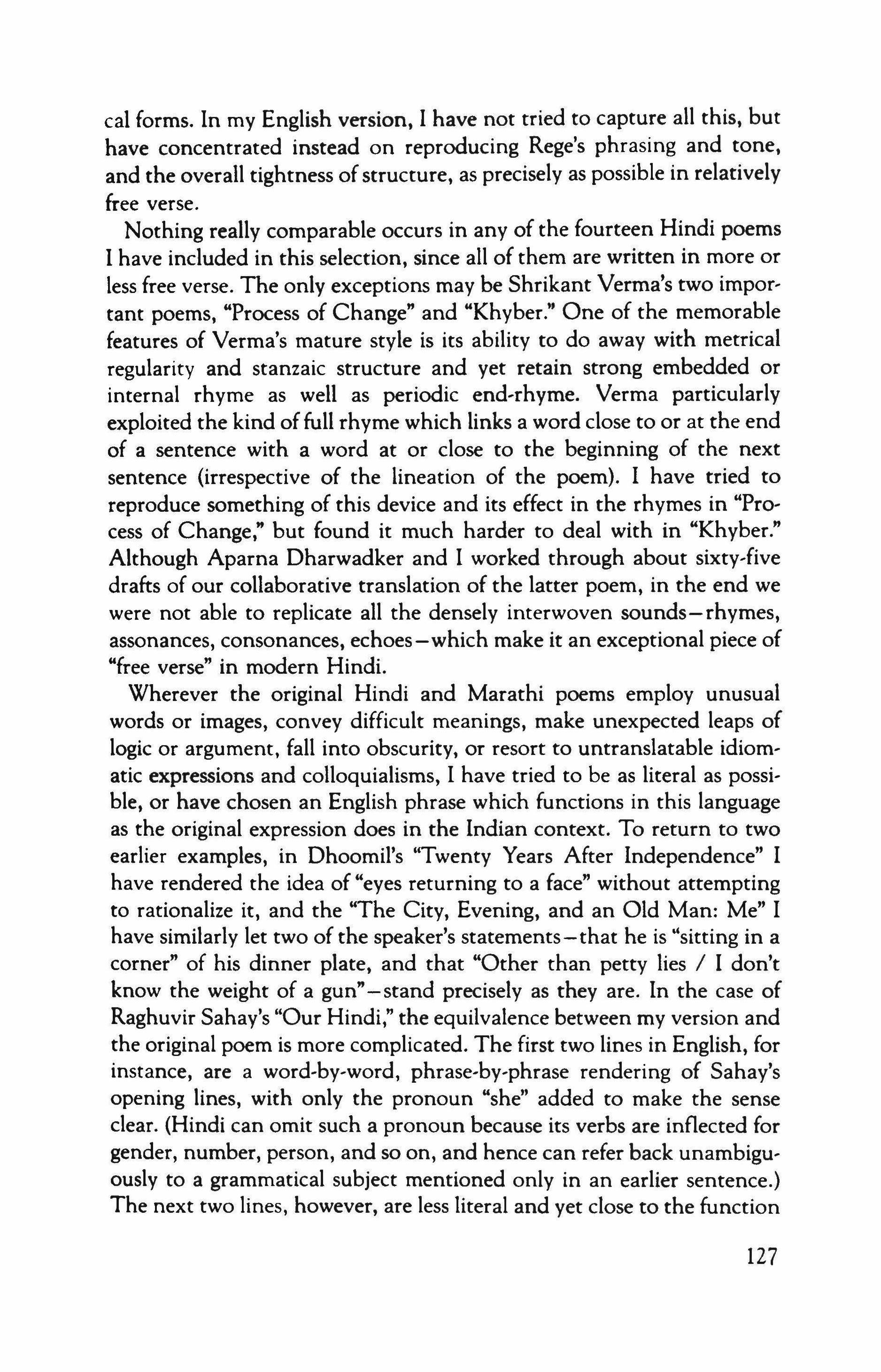
cal forms. In my English version, I have not tried to capture all this, but have concentrated instead on reproducing Rege's phrasing and tone, and the overall tightness of structure, as precisely as possible in relatively free verse.
Nothing really comparable occurs in any of the fourteen Hindi poems I have included in this selection, since all of them are written in more or less free verse. The only exceptions may be Shrikant Verma's two important poems, "Process of Change" and "Khyber." One of the memorable features of Verma's mature style is its ability to do away with metrical regularity and stanzaic structure and yet retain strong embedded or internal rhyme as well as periodic end-rhyme. Verma particularly exploited the kind offull rhyme which links a word close to or at the end of a sentence with a word at or close to the beginning of the next sentence (irrespective of the lineation of the poem). I have tried to reproduce something of this device and its effect in the rhymes in "Pro' cess of Change," but found it much harder to deal with in "Khyber."
Although Aparna Dharwadker and I worked through about sixty-five drafts of our collaborative translation of the latter poem, in the end we were not able to replicate all the densely interwoven sounds-rhymes, assonances, consonances, echoes-which make it an exceptional piece of "free verse" in modern Hindi.
Wherever the original Hindi and Marathi poems employ unusual words or images, convey difficult meanings, make unexpected leaps of logic or argument, fall into obscurity, or resort to untranslatable idiom, atic expressions and colloquialisms, I have tried to be as literal as possible, or have chosen an English phrase which functions in this language as the original expression does in the Indian context. To return to two earlier examples, in Dhoomil's ''Twenty Years After Independence" I have rendered the idea of "eyes returning to a face" without attempting to rationalize it, and the "The City, Evening, and an Old Man: Me" I have similarly let two of the speaker's statements-that he is "sitting in a corner" of his dinner plate, and that "Other than petty lies / I don't know the weight of a gun"-stand precisely as they are. In the case of Raghuvir Sahay's "Our Hindi," the equilvalence between my version and the original poem is more complicated. The first two lines in English, for instance, are a word-by-word, phrase-by-phrase rendering of Sahay's opening lines, with only the pronoun "she" added to make the sense clear. (Hindi can omit such a pronoun because its verbs are inflected for gender, number, person, and so on, and hence can refer back unarnbiguously to a grammatical subject mentioned only in an earlier sentence.) The next two lines, however, are less literal and yet close to the function
127
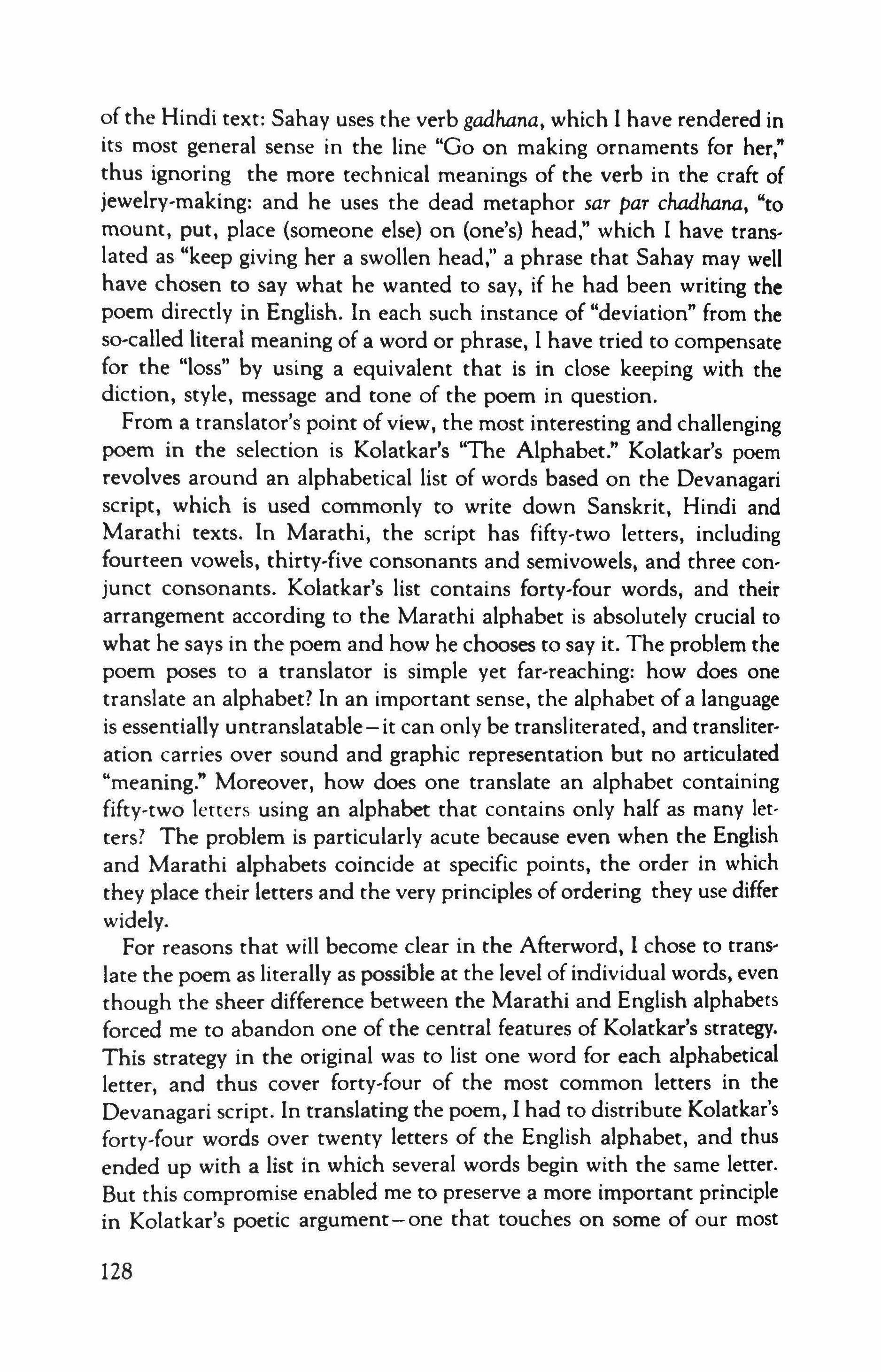
of the Hindi text: Sahay uses the verb gadhana, which I have rendered in its most general sense in the line "Go on making ornaments for her," thus ignoring the more technical meanings of the verb in the craft of jewelry-making: and he uses the dead metaphor sar par chadhana, "to mount, put, place {someone else} on {one's} head," which I have translated as "keep giving her a swollen head," a phrase that Sahay may well have chosen to say what he wanted to say, if he had been writing the poem directly in English. In each such instance of "deviation" from the so-called literal meaning of a word or phrase, I have tried to compensate for the "loss" by using a equivalent that is in close keeping with the diction, style, message and tone of the poem in question.
From a translator's point of view, the most interesting and challenging poem in the selection is Kolatkar's "The Alphabet." Kolatkar's poem revolves around an alphabetical list of words based on the Devanagari script, which is used commonly to write down Sanskrit, Hindi and Marathi texts. In Marathi, the script has fifty-two letters, including fourteen vowels, thirty-five consonants and semivowels, and three conjunct consonants. Kolatkar's list contains forty-four words, and their arrangement according to the Marathi alphabet is absolutely crucial to what he says in the poem and how he chooses to say it. The problem the poem poses to a translator is simple yet far-reaching: how does one translate an alphabet? In an important sense, the alphabet of a language is essentially untranslatable- it can only be transliterated, and transliteration carries over sound and graphic representation but no articulated "meaning." Moreover, how does one translate an alphabet containing fifty-two letters using an alphabet that contains only half as many letters? The problem is particularly acute because even when the English and Marathi alphabets coincide at specific points, the order in which they place their letters and the very principles of ordering they use differ widely.
For reasons that will become clear in the Afterword, I chose to translate the poem as literally as possible at the level of individual words, even though the sheer difference between the Marathi and English alphabets forced me to abandon one of the central features of Kolatkar's strategy. This strategy in the original was to list one word for each alphabetical letter, and thus cover forty-four of the most common letters in the Devanagari script. In translating the poem, I had to distribute Kolatkar's forty-four words over twenty letters of the English alphabet, and thus ended up with a list in which several words begin with the same letter. But this compromise enabled me to preserve a more important principle in Kolatkar's poetic argument-one that touches on some of our most
128
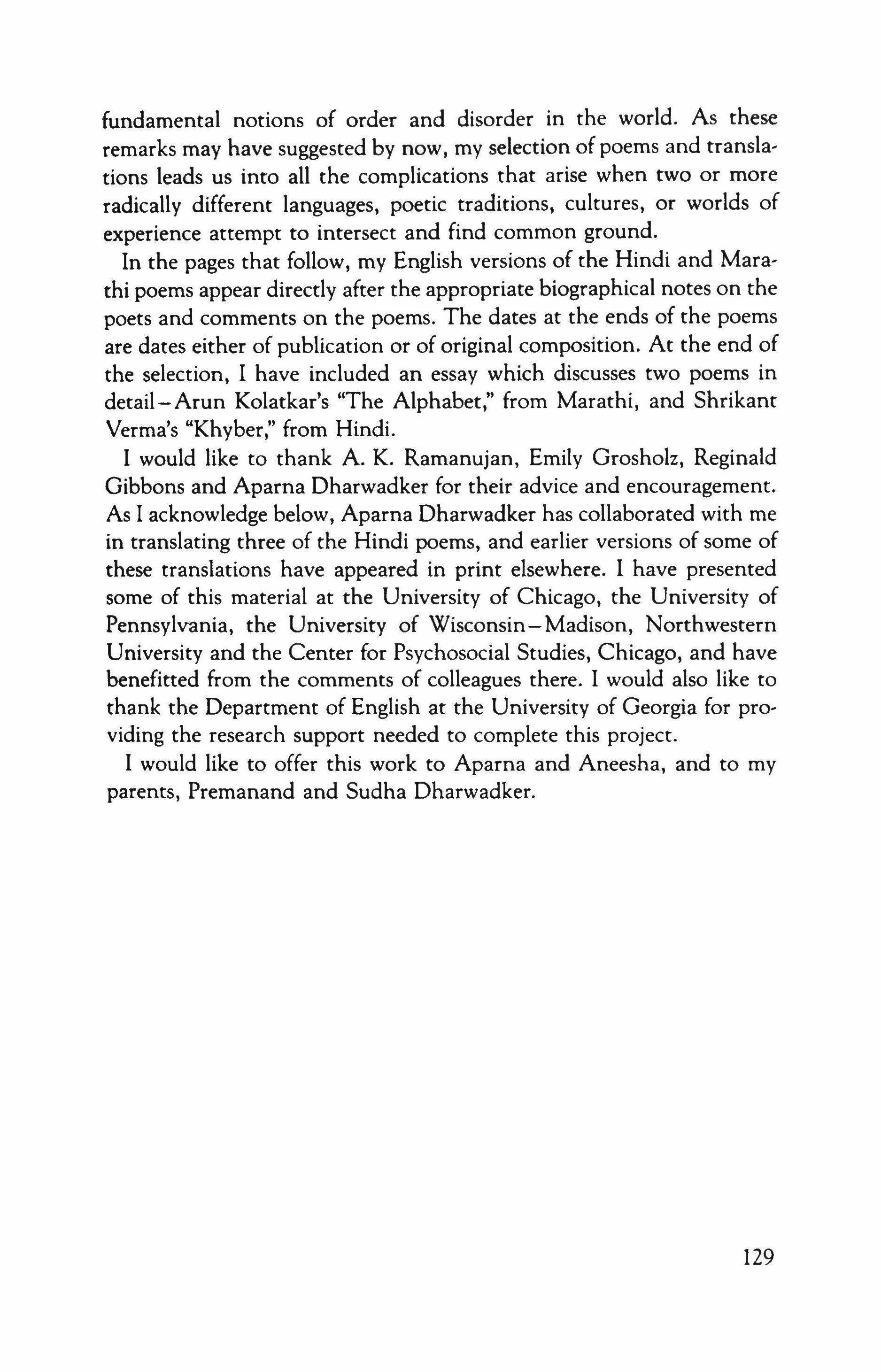
fundamental notions of order and disorder in the world. As these remarks may have suggested by now, my selection of poems and translations leads us into all the complications that arise when two or more radically different languages, poetic traditions, cultures, or worlds of experience attempt to intersect and find common ground.
In the pages that follow, my English versions of the Hindi and Marathi poems appear directly after the appropriate biographical notes on the poets and comments on the poems. The dates at the ends of the poems are dates either of publication or of original composition. At the end of the selection, I have included an essay which discusses two poems in detail- Arun Kolatkar's "The Alphabet," from Marathi, and Shrikant Verma's "Khyber," from Hindi.
I would like to thank A. K. Ramanujan, Emily Grosholz, Reginald Gibbons and Aparna Dharwadker for their advice and encouragement. As I acknowledge below, Aparna Dharwadker has collaborated with me in translating three of the Hindi poems, and earlier versions of some of these translations have appeared in print elsewhere. I have presented some of this material at the University of Chicago, the University of Pennsylvania, the University of Wisconsin-Madison, Northwestern University and the Center for Psychosocial Studies, Chicago, and have benefitted from the comments of colleagues there. I would also like to thank the Department of English at the University of Georgia for providing the research support needed to complete this project.
I would like to offer this work to Aparna and Aneesha, and to my parents, Premanand and Sudha Dharwadker.
129


Hindi


Raghuvir Sahay
Raghuvir Sahay (1929- ) was born in Lucknow and graduated from Lucknow University with a master's degree in 1951. Since the early 1950's he has worked as a journalist, editor and broadcaster in New Delhi. During the 1970's, he was associated with the Hindi newsweekly, Dinman. During the last few years, he has been on the staff of the Navbharar Times, the principal Hindi daily in north India. Sahay has published a dozen books of poetry, plays, short fiction and essays. He is an important commentator on contemporary Hindi letters and an excellent translator of Shakespeare. In the 1950's and 1960's, he was associated with the nai kavira and pragativad movements, and has remained one of the most active "committed" intellectuals in the Hindi literary world.
The poems I have translated here are "Haman hindi," in Sahay, Atmahatya ke viruddha (Delhi: Rajkamal Prakashan, 1967), pp. 78-79; and "Sanskrit," in Sahay, Hanso hanso jaldi hanso (Delhi: National Publishing House, 1975), p. 17. A slightly different version of"Our Hindi" appeared in Daedalus.
133
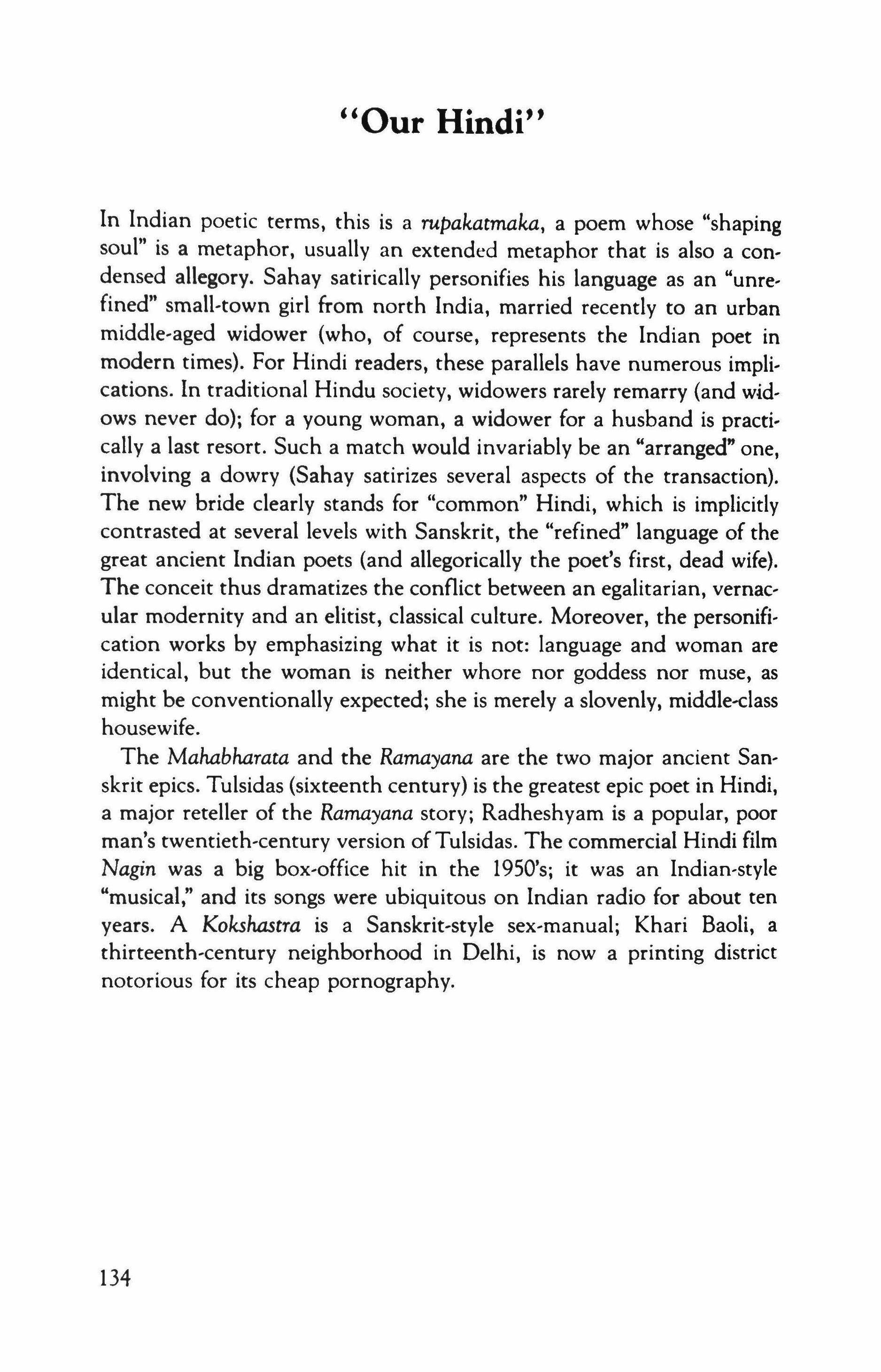
"Our Hindi"
In Indian poetic terms, this is a rupakatmaka, a poem whose "shaping soul" is a metaphor, usually an extended metaphor that is also a condensed allegory. Sahay satirically personifies his language as an "unrefined" small-town girl from north India, married recently to an urban middle-aged widower (who, of course, represents the Indian poet in modern times). For Hindi readers, these parallels have numerous implications. In traditional Hindu society, widowers rarely remarry (and widows never do); for a young woman, a widower for a husband is practically a last resort. Such a match would invariably be an "arranged" one, involving a dowry (Sahay satirizes several aspects of the transaction). The new bride clearly stands for "common" Hindi, which is implicitly contrasted at several levels with Sanskrit, the "refined" language of the great ancient Indian poets (and allegorically the poet's first, dead wife). The conceit thus dramatizes the conflict between an egalitarian, vernacular modernity and an elitist, classical culture. Moreover, the personification works by emphasizing what it is not: language and woman are identical, but the woman is neither whore nor goddess nor muse, as might be conventionally expected; she is merely a slovenly, middle-class housewife.
The Mahabharata and the Ramayana are the two major ancient Sanskrit epics. Tulsidas (sixteenth century) is the greatest epic poet in Hindi, a major reteller of the Ramayana story; Radheshyam is a popular, poor man's twentieth-century version of Tulsidas. The commercial Hindi film Nagin was a big box-office hit in the 1950's; it was an Indian-style "musical," and its songs were ubiquitous on Indian radio for about ten years. A Kokshastra is a Sanskrit-style sex-manual; Khari Baoli, a thirteenth-century neighborhood in Delhi, is now a printing district notorious for its cheap pornography.
134
Our Hindi
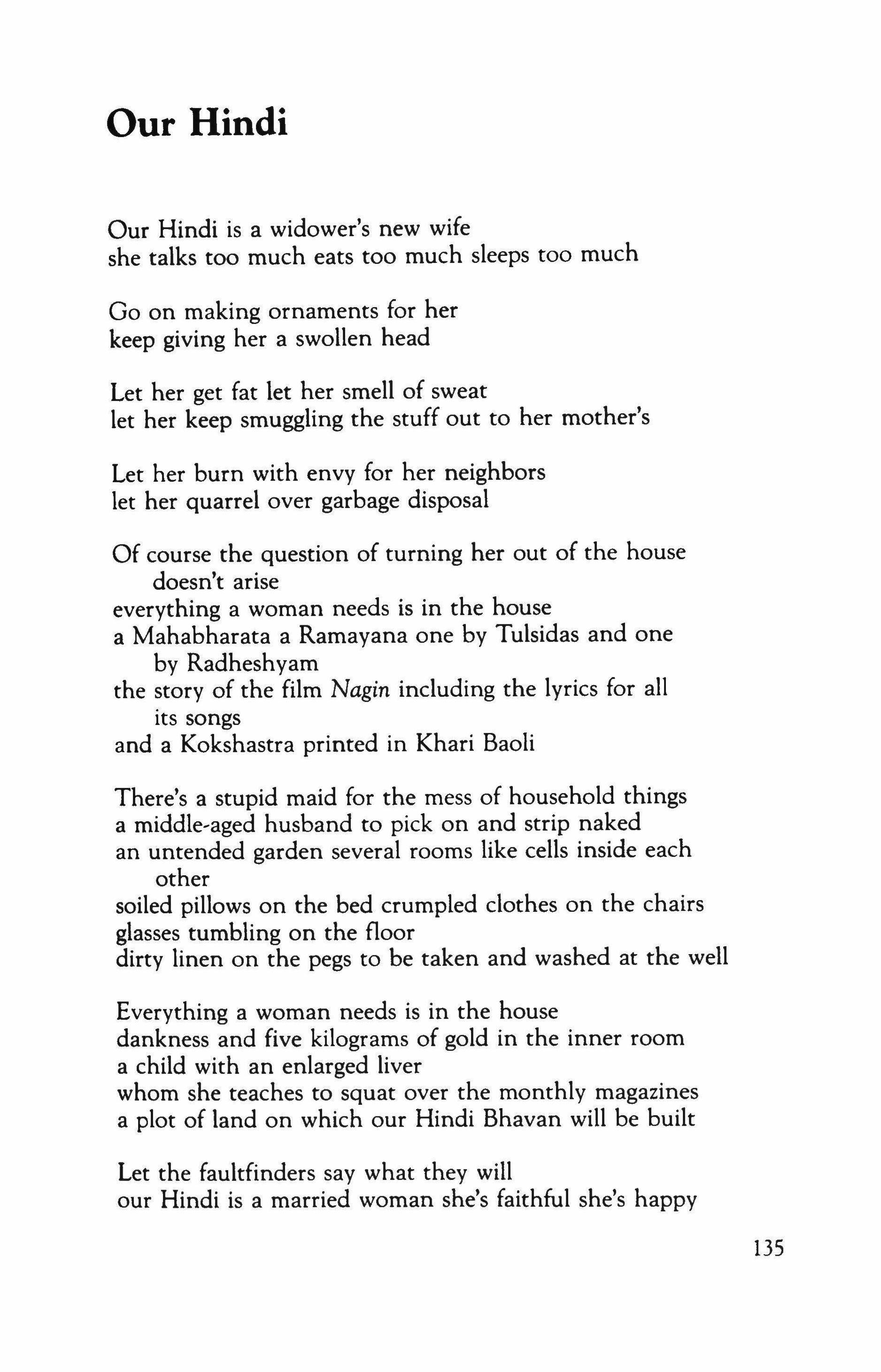
Our Hindi is a widower's new wife she talks too much eats too much sleeps too much
Go on making ornaments for her keep giving her a swollen head
Let her get fat let her smell of sweat let her keep smuggling the stuff out to her mother's
Let her burn with envy for her neighbors let her quarrel over garbage disposal
Of course the question of turning her out of the house doesn't arise
everything a woman needs is in the house a Mahabharata a Ramayana one by Tulsidas and one by Radheshyam the story of the film Nagin including the lyrics for all its songs and a Kokshastra printed in Khari Baoli
There's a stupid maid for the mess of household things a middle-aged husband to pick on and strip naked an untended garden several rooms like cells inside each other soiled pillows on the bed crumpled clothes on the chairs glasses tumbling on the floor dirty linen on the pegs to be taken and washed at the well
Everything a woman needs is in the house dankness and five kilograms of gold in the inner room a child with an enlarged liver whom she teaches to squat over the monthly magazines a plot of land on which our Hindi Bhavan will be built
Let the faultfinders say what they will our Hindi is a married woman she's faithful she's happy
135
she wants to die before her husband dies everything's okay but first her husband must survive her for how else can she have her wish

1967
136

"Sanskrit"
This poem complements "Our Hindi" in obvious ways. The mango tree is one of the most common (and economically and culturally most valued) trees in the north Indian countryside. Along with the banyan tree (Ficus benghalensis) and the pipal tree (Ficus religiosus, the tree under which the Buddha received his enlightenment), it dominates the physical landscape and the literary landscape; all three trees have religious and ritual significance. The "wise old Sanskrit scholars" are patriarchal, authoritative, learned Brahmins concerned only with performing the right rituals in the right way. The right way is set down in the shastras, here simply the ancient, canonical books that provide the instructions to be followed and the texts to be recited at Hindu rituals.
137
Sanskrit

Armies kill men then dig themselves in and set up camp somehow the mango tree survives
The two armies come to an agreement to go fight somewhere else
The departure ceremony takes place under that mango tree
It was under the same tree that they had tied up and shot those eighteen-vear-old boys from the Hindi-speaking village who had refused to give in
And now these wise old Sanskrit scholars have come to sing the shastric praises of the mango tree under that tree
1975
138
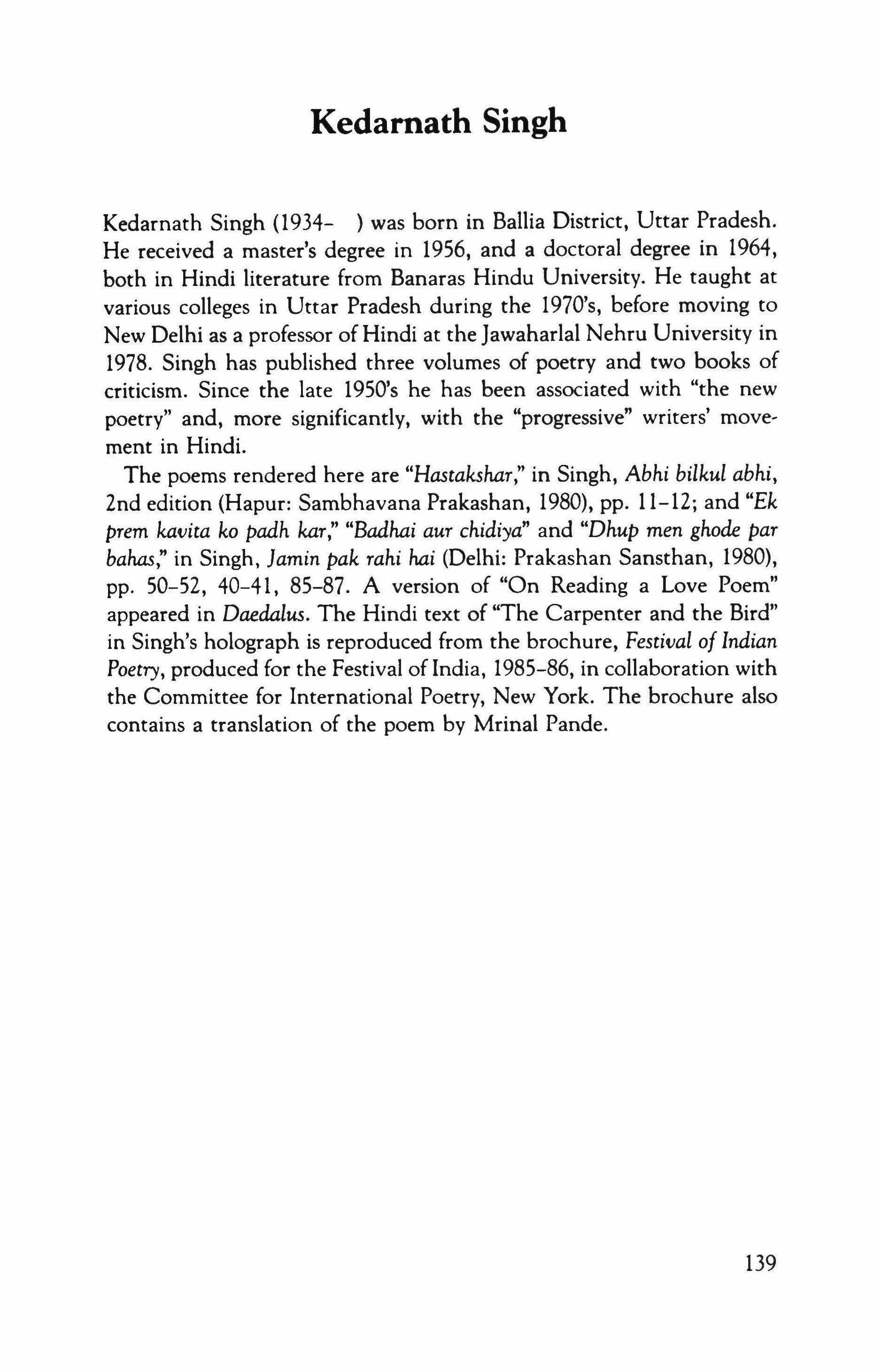
Kedamath Singh
Kedarnath Singh (1934- ) was born in Ballia District, Uttar Pradesh. He received a master's degree in 1956, and a doctoral degree in 1964, both in Hindi literature from Banaras Hindu University. He taught at various colleges in Uttar Pradesh during the 1970's, before moving to New Delhi as a professor of Hindi at the Jawaharlal Nehru University in 1978. Singh has published three volumes of poetry and two books of criticism. Since the late 1950's he has been associated with "the new poetry" and, more significantly, with the "progressive" writers' movement in Hindi.
The poems rendered here are "Hastakshar," in Singh, Abhi bilkul abhi, 2nd edition (Hapur: Sambhavana Prakashan, 1980), pp. 11-12; and "Ek prem kavita ko pooh kar," "BOOhai aur chidiya" and "Dhup men ghode par bahas," in Singh, lamin pak rahi hai (Delhi: Prakashan Sansthan, 1980), pp. 50-52, 40-41, 85-87. A version of "On Reading a Love Poem" appeared in Daedalus. The Hindi text of "The Carpenter and the Bird" in Singh's holograph is reproduced from the brochure, Festival of Indian Poetry, produced for the Festival of India, 1985-86, in collaboration with the Committee for International Poetry, New York. The brochure also contains a translation of the poem by Mrinal Pande.
139
Signature

The day has begun. Before its noise begins, on the unseen unimprinted roads that open up across the land I sign my name.
I enter houses and homes. Quietly I pick up the featureless things left lying here and there and set them down again in a new sequence, and on a doubt crouching in a corner somewhere I sign my name.
I enter the rivers. I clear away the moss gathered on their surfaces, I shake up their waters, and somewhere on the deep still riverbeds I sign my name.
140
I enter the seasons. I separate the living threads of hope and desire from the bark of the sad broken ocher trees and tangle them up with the wings of every directionless bird before it flies away, and somewhere on the daily wagers of life I sign my name.
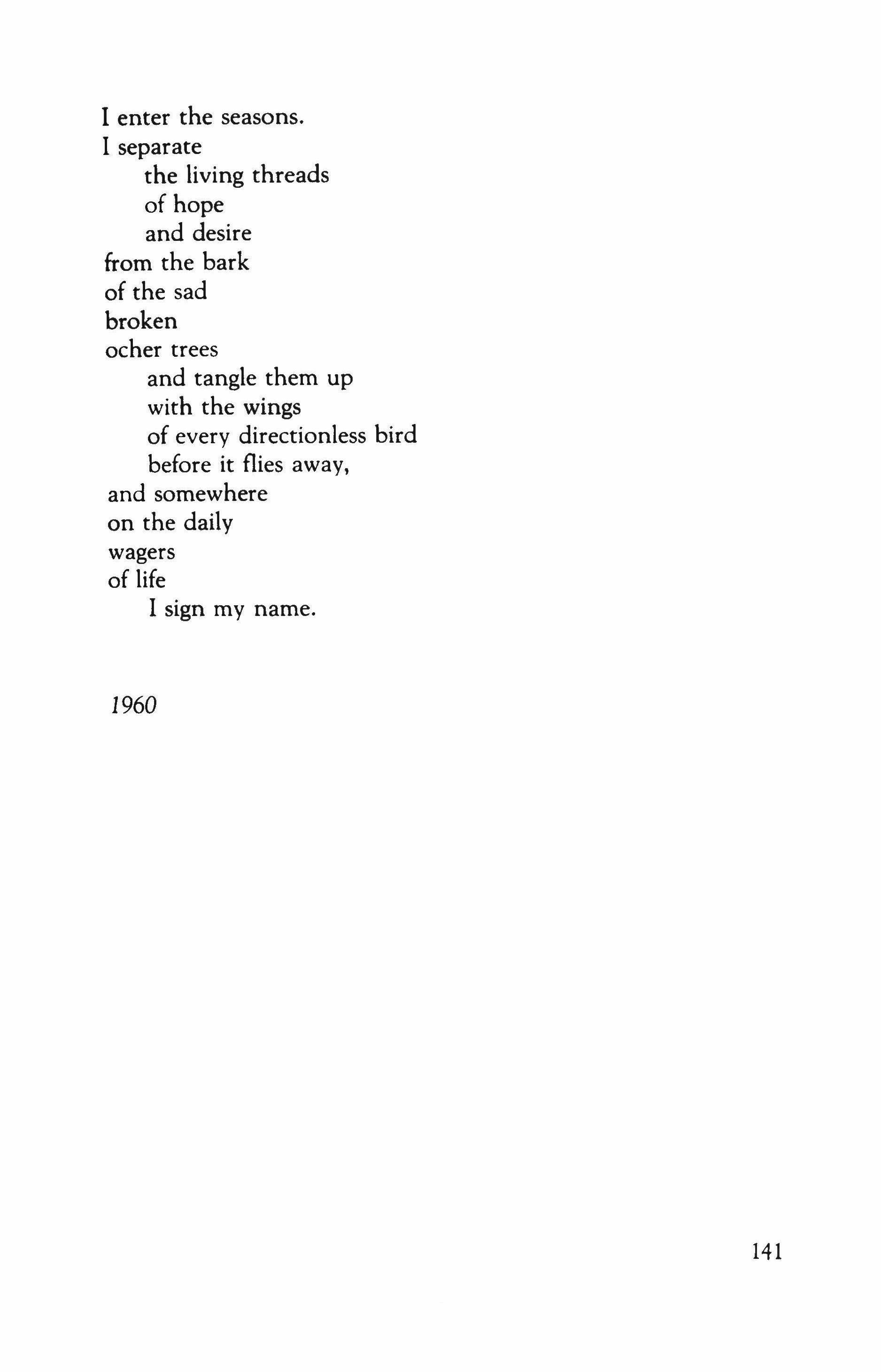
1960
141

"On Reading a Love Poem"
In this poem, Singh expects the Hindi reader to recognize the general allusion to poems like Neruda's "Elemental Odes" and (possibly) Seamus Heaney's "Digging." In Singh's recent work, vegetables have a strong political significance; in the Indian context, in the last three decades the potato especially has become "the poor man's food." Here it represents "everyday reality" and something "silent and solid," like the woman it is associated with in the poem.
142
On Reading a Love Poem
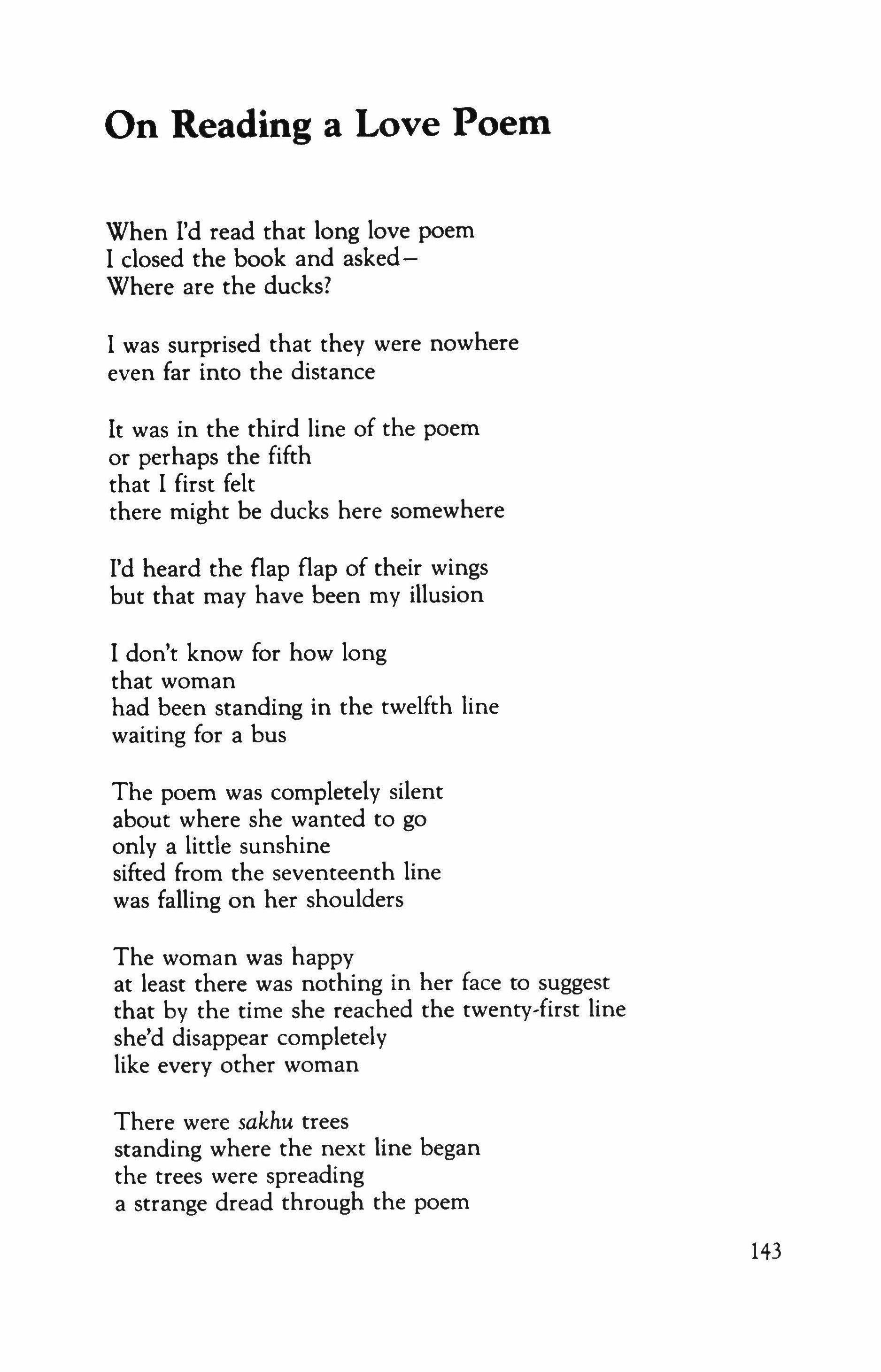
When I'd read that long love poem I closed the book and askedWhere are the ducks?
I was surprised that they were nowhere even far into the distance
It was in the third line of the poem or perhaps the fifth that I first felt there might be ducks here somewhere
I'd heard the flap flap of their wings but that may have been my illusion
I don't know for how long that woman had been standing in the twelfth line waiting for a bus
The poem was completely silent about where she wanted to go only a little sunshine sifted from the seventeenth line was falling on her shoulders
The woman was happy at least there was nothing in her face to suggest that by the time she reached the twenty-first line she'd disappear completely like every other woman
There were sakhu trees standing where the next line began the trees were spreading a strange dread through the poem
143
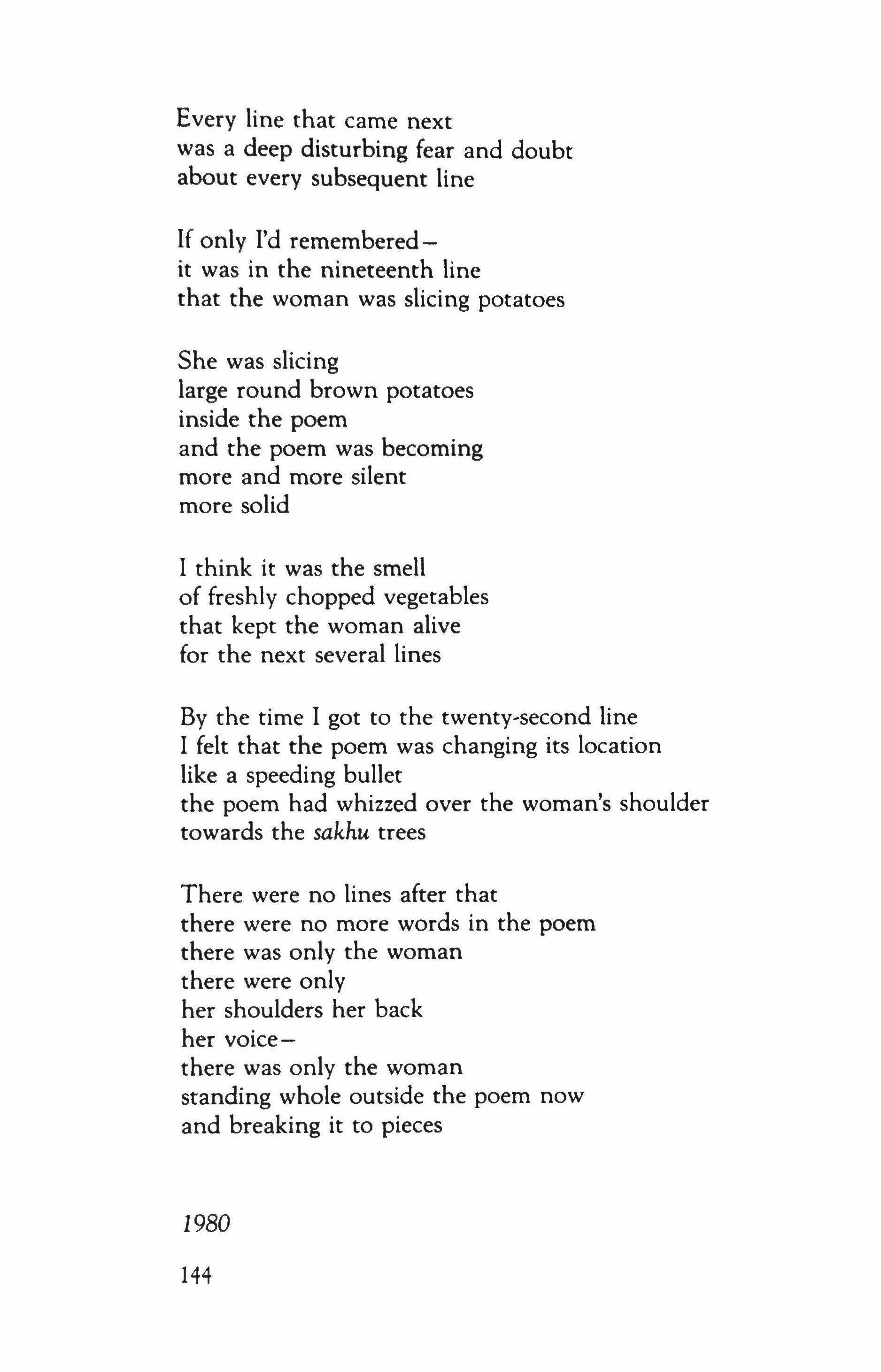
Every line that came next was a deep disturbing fear and doubt about every subsequent line
If only I'd rememberedit was in the nineteenth line that the woman was slicing potatoes
She was slicing large round brown potatoes inside the poem and the poem was becoming more and more silent more solid
I think it was the smell of freshly chopped vegetables that kept the woman alive for the next several lines
By the time I got to the twenty-second line I felt that the poem was changing its location like a speeding bullet the poem had whizzed over the woman's shoulder towards the sakhu trees
There were no lines after that there were no more words in the poem there was only the woman there were only her shoulders her back her voicethere was only the woman standing whole outside the poem now and breaking it to pieces
1980 144
The Carpenter and the Bird
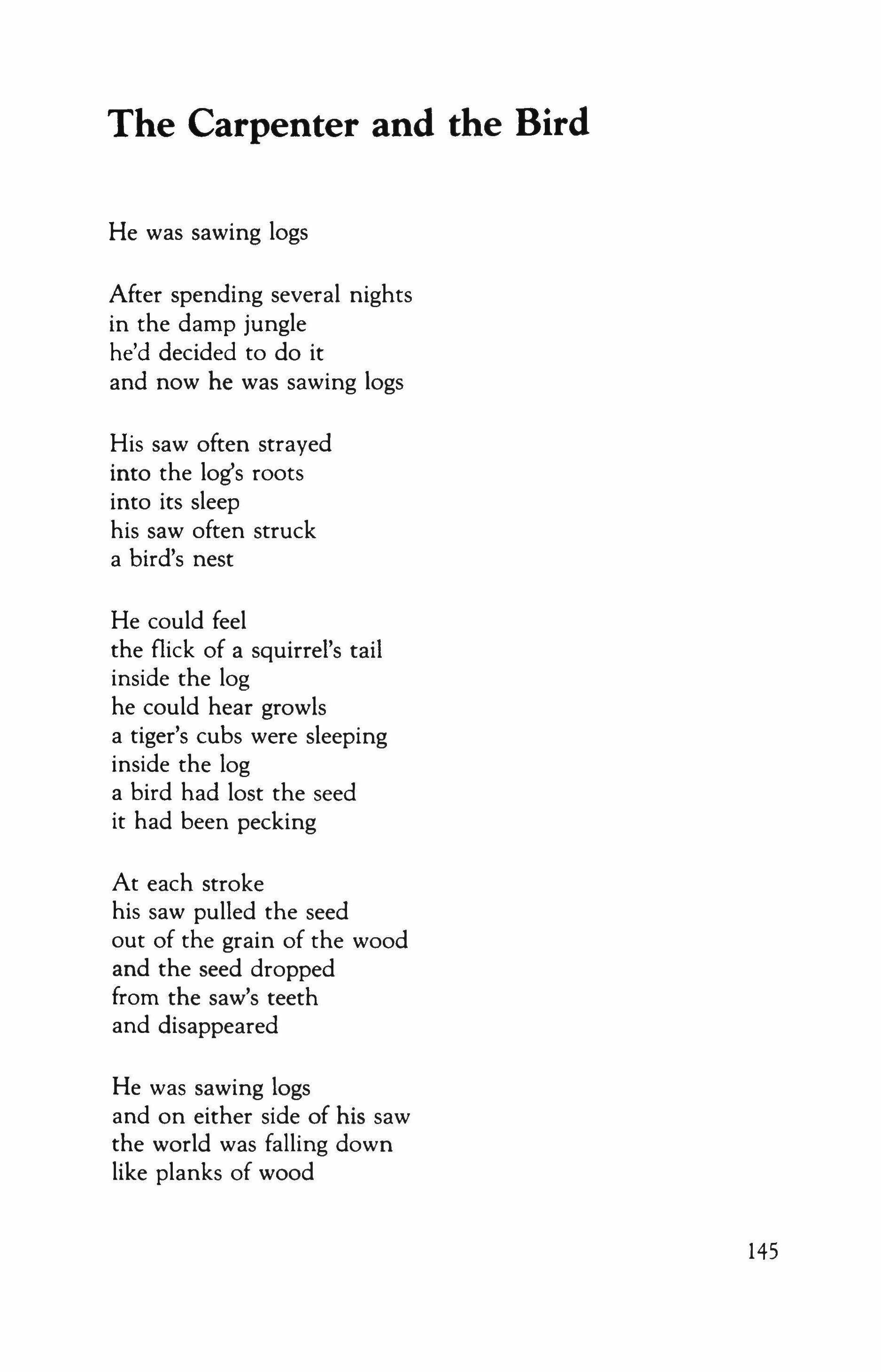
He was sawing logs
After spending several nights in the damp jungle he'd decided to do it and now he was sawing logs
His saw often strayed into the log's roots into its sleep his saw often struck a bird's nest
He could feel the flick of a squirrel's tail inside the log he could hear growls a tiger's cubs were sleeping inside the log a bird had lost the seed it had been pecking
At each stroke his saw pulled the seed out of the grain of the wood and the seed dropped from the saw's teeth and disappeared
He was sawing logs and on either side of his saw the world was falling down like planks of wood
145
The seed wasn't outside the log that's why the bird was sure it was still somewhere inside the wood
He was sawing logs and the bird was somewhere inside the wood and it was shrieking

1980
146
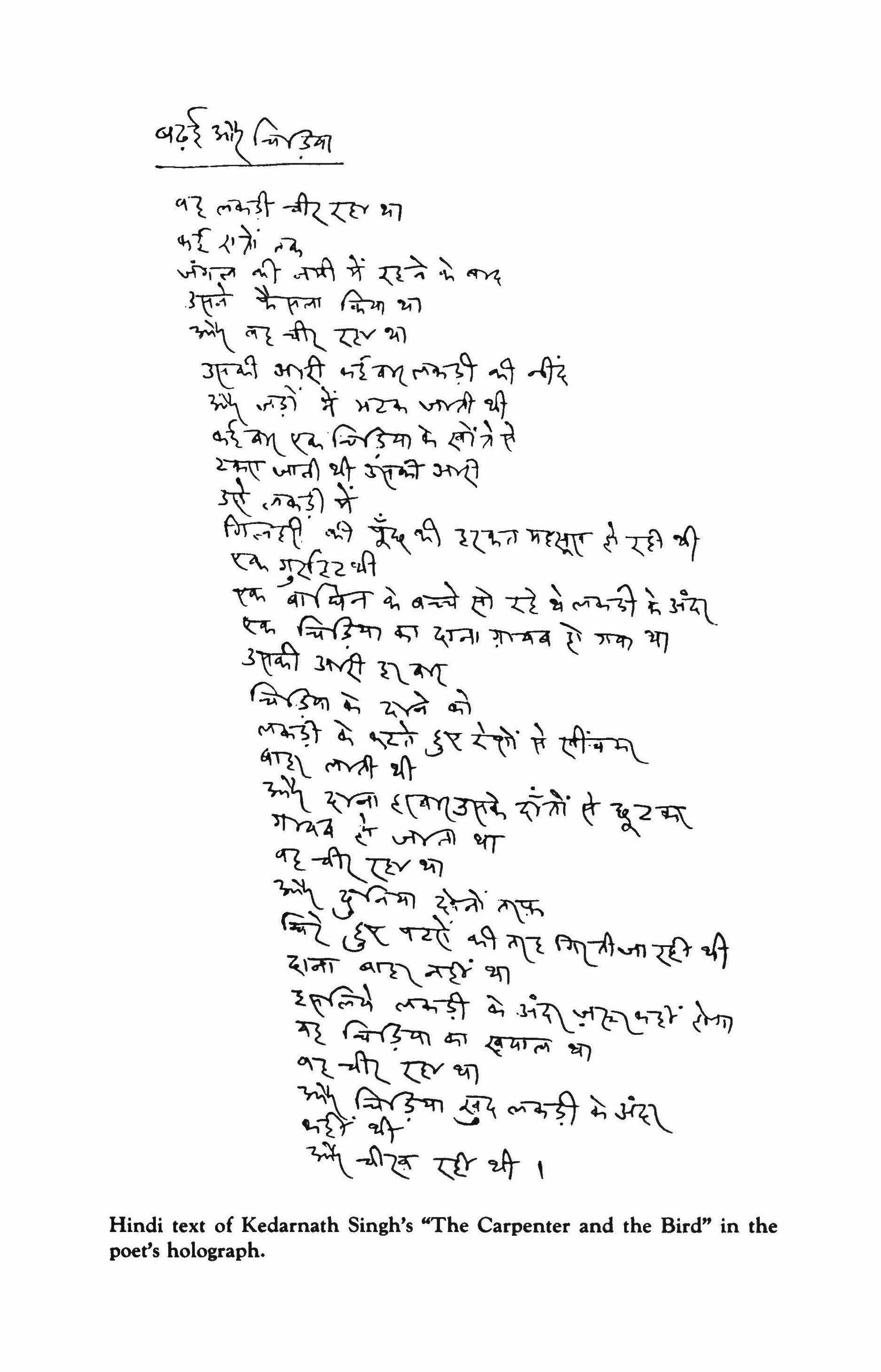
f K d th Singh's "The Carpenter and the Bird" in the Hind. text 0 e arna poet's holograph.
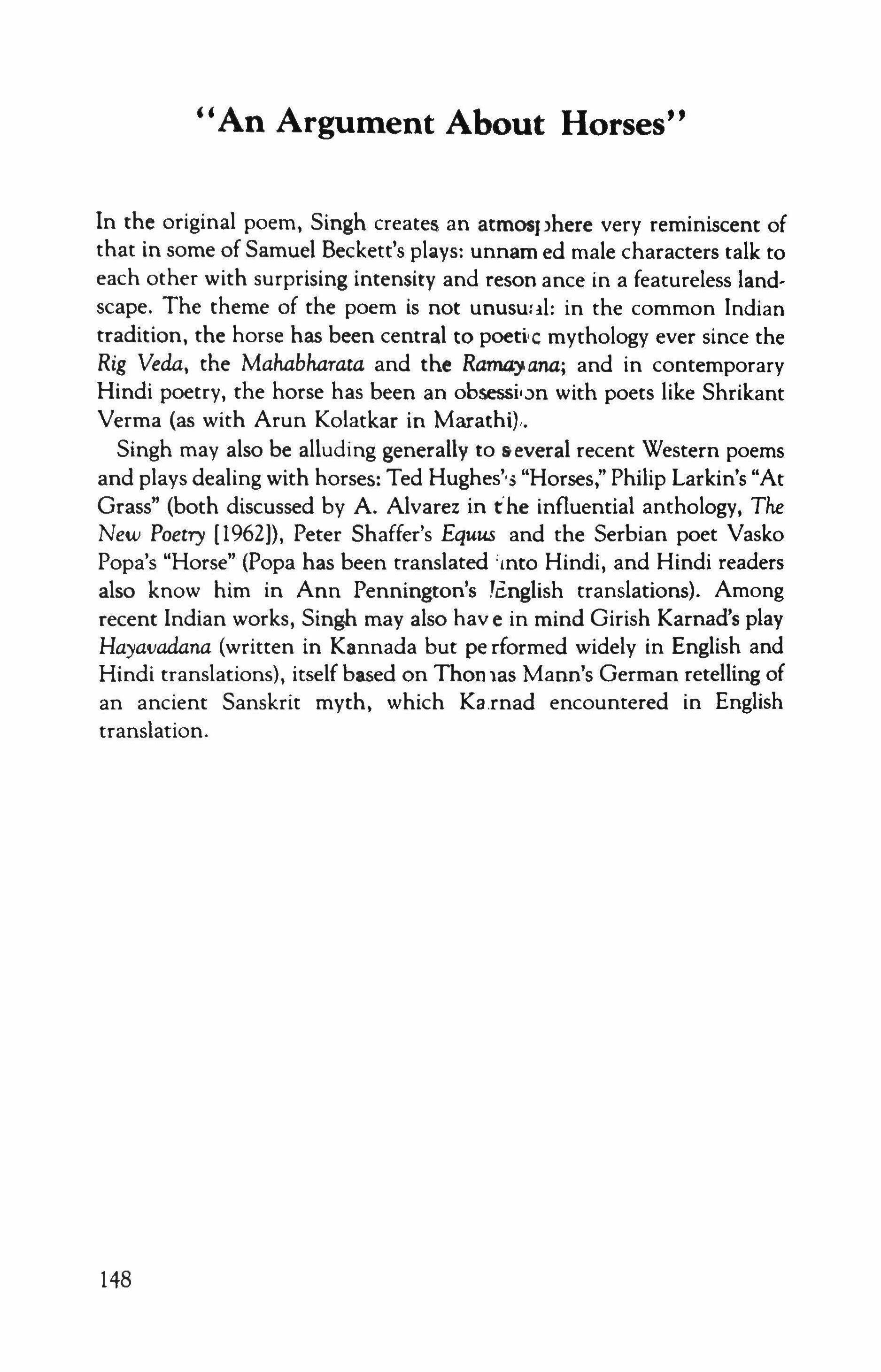
"An Argument About Horses"
In the original poem, Singh creates an atmosj shere very reminiscent of that in some of Samuel Beckett's plays: unnam ed male characters talk to each other with surprising intensity and reson ance in a featureless landscape. The theme of the poem is not unusual: in the common Indian tradition, the horse has been central to poeti-c mythology ever since the Rig Veda, the Mahabharata and the Rama)&ana; and in contemporary Hindi poetry, the horse has been an obsession with poets like Shrikant Verma (as with Arun Kolatkar in Marathi),
Singh may also be alluding generally to s everal recent Western poems and plays dealing with horses: Ted Hughes's "Horses," Philip Larkin's "At Grass" (both discussed by A. Alvarez in rhe influential anthology, The New Poetry [1962]), Peter Shaffer's Equus and the Serbian poet Vasko Popa's "Horse" (Popa has been translated 'mto Hindi, and Hindi readers also know him in Ann Pennington's Yenglish translations). Among recent Indian works, Singh may also have in mind Girish Karnad's play Hayavadana {written in Kannada but pe rformed widely in English and Hindi translations}, itself based on Thon las Mann's German retelling of an ancient Sanskrit myth, which Ka.rnad encountered in English translation.
148
An Argument About Horses
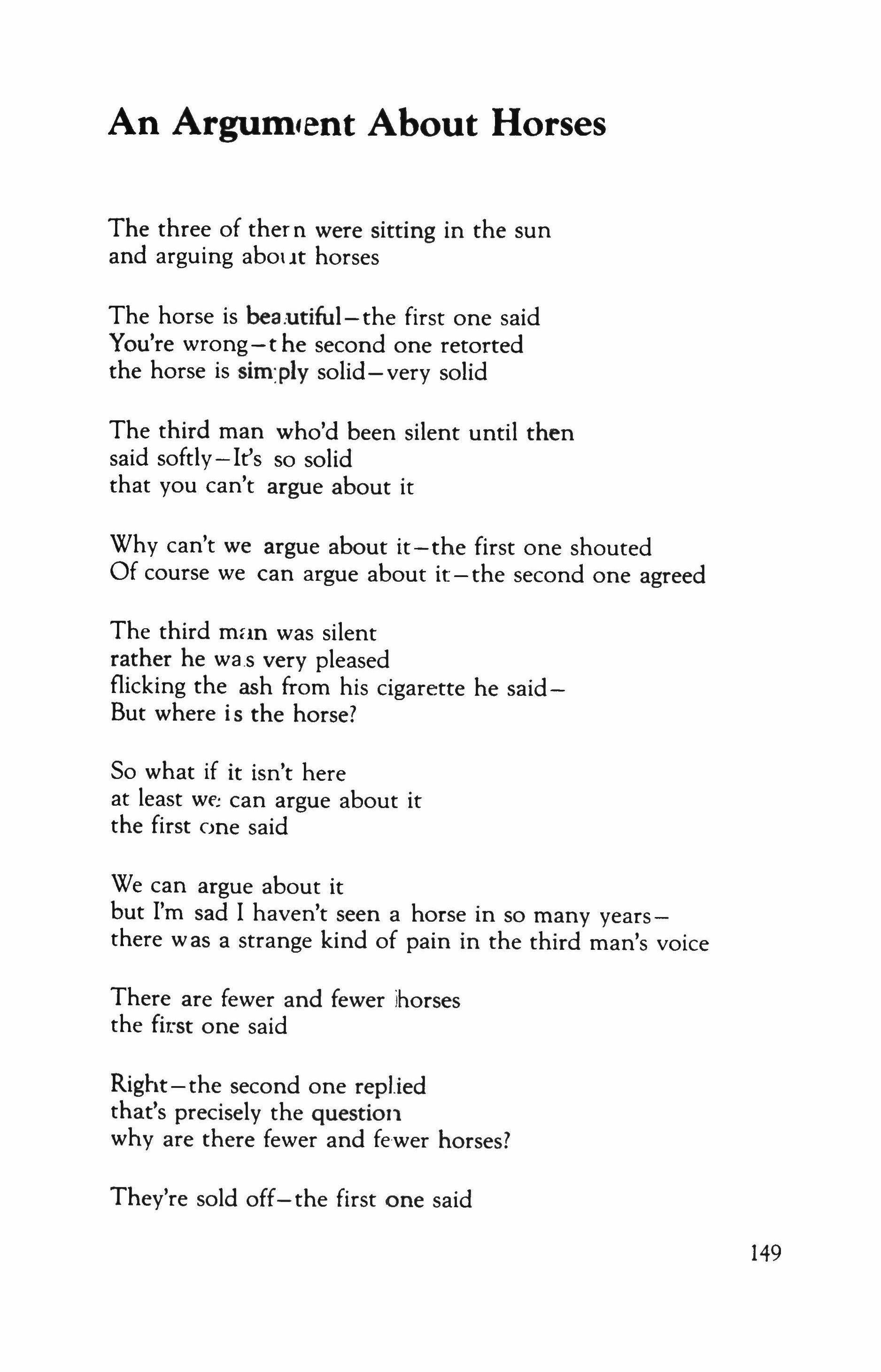
The three of ther n were sitting in the sun and arguing aboi it horses
The horse is beauriful=the first one said You're wrong - t he second one retorted the horse is simplv solid-very solid
The third man who'd been silent until then said softly-It's so solid that you can't argue about it
Why can't we argue about it-the first one shouted Of course we can argue about it-the second one agreed
The third man was silent rather he W3.S very pleased flicking the ash from his cigarette he saidBut where is the horse?
So what if it isn't here at least we; can argue about it the first one said
We can argue about it but I'm sad I haven't seen a horse in so many yearsthere was a strange kind of pain in the third man's voice
There are fewer and fewer ihorses the first one said
Right - the second one replied that's precisely the question why are there fewer and fewer horses?
They're sold off-the first one said
149
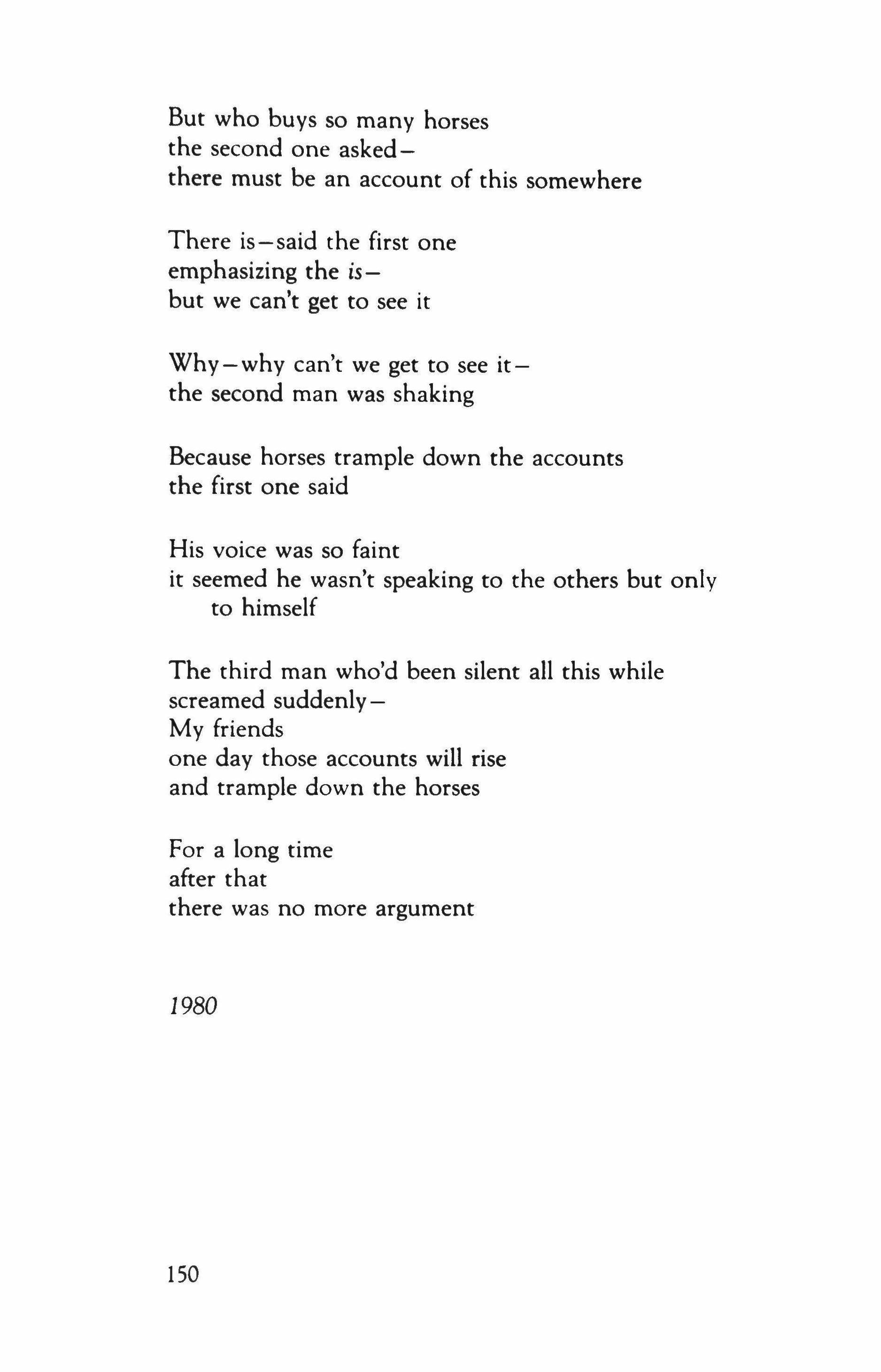
But who buys so many horses the second one askedthere must be an account of this somewhere
There is-said the first one emphasizing the isbut we can't get to see it
Why-why can't we get to see itthe second man was shaking
Because horses trample down the accounts the first one said
His voice was so faint it seemed he wasn't speaking to the others but only to himself
The third man who'd been silent all this while screamed suddenlyMy friends one day those accounts will rise and trample down the horses
For a long time after that there was no more argument
1980 150

Kunwar Narayan
Kunwar Narayan (1927- ) was born in Faizabad, Uttar Pradesh. He received a master's degree in English literature from Lucknow University soon after Independence (August 1947), and wrote some poetry and prose in English during those years. Since the 1950's, however, he has been writing verse and short fiction in Hindi. He is a businessman by profession, and lives in Lucknow. Narayan has published four volumes of poetry and one of short stories, besides selections of his work in anthologies. Since the mid-1950's he has been associated with the nai kavita movement, and for a long time has been considered a difficult, "experimental" poet.
The Hindi originals rendered here are "Dilli ki tara!" and "Ek ajib din," in Narayan, Apne samane (New Delhi: Rajkamal Prakashan, 1979), pp. 25, 87. Aparna Dharwadker collaborated with me in translating these two poems.
151

"Towards Delhi"
This poem is about the Emergency, which Mrs. Indira Gandhi imposed on India between June 1975 and March 1977. Narayan conflates Mrs. Gandhi's "fascism" with what has been often characterized as the "despotism" of earlier rulers of north India, especially the Muslim kings and Mughal emperors who used "an iron hand" to govern much of the subcontinent from Delhi.
152
Towards Delhi
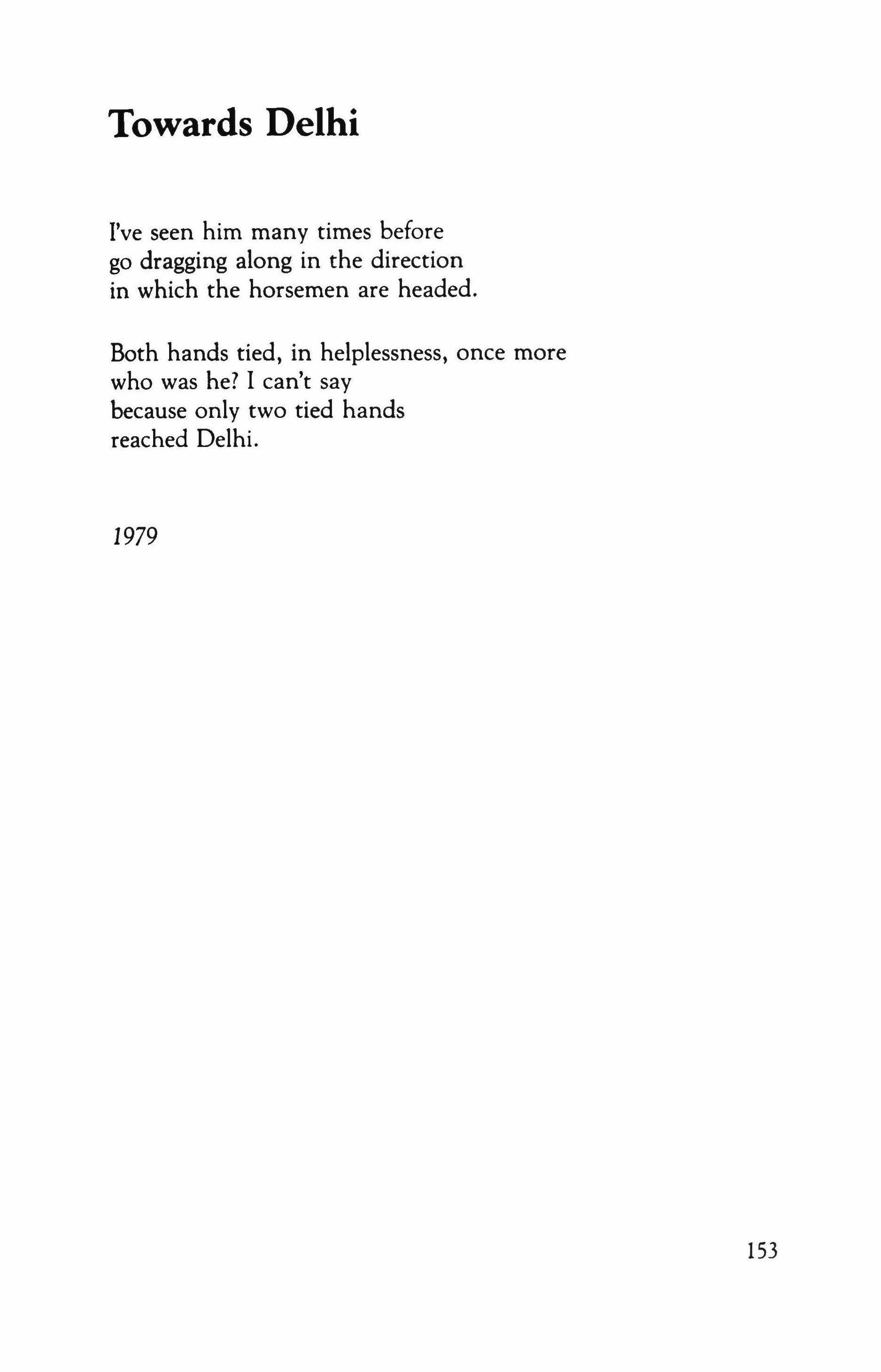
I've seen him many times before go dragging along in the direction in which the horsemen are headed.
Both hands tied, in helplessness, once more who was he? I can't say because only two tied hands reached Delhi.
1979
153
An Unusual Day
I was out wandering all day today and nothing unfortunate happened. I met people all day today and wasn't insulted anywhere. I didn't lie all day today and no one took exception. I trusted everyone today and wasn't swindled anywhere.
And the biggest surprise was when I got back home and found it wasn't someone else but I who had returned.

1979
154

Dhoomil
Dhoomil (1935-75), whose real name was Sudama Pandeya, lived and worked in Allahabad, where he died at the age of forty. He published only one book of poems in his lifetime, and his wife collected some of his later work in a posthumous volume. Despite the small output and the early death, Dhoomil's reputation as one of the best modern poets in Hindi has remained intact. His work is often politically extreme and reveals an intensity of social engagement that is rare even in modern Hindi poetry.
The following poems are versions of"Bees sool baad" and "Shahar, sham aur ek budha: main," in Dhoomil, Sansad se sadak ttik (Delhi: Rajkamal Prakashan, 1972), pp. 11-12, 79-81. The latter poem was first translated into English by Arvind Krishna Mehrotra, in New Writing in India, ed. Adil Jussawalla (Harmondsworth: Penguin Books, 1974), pp. 65-66.
155
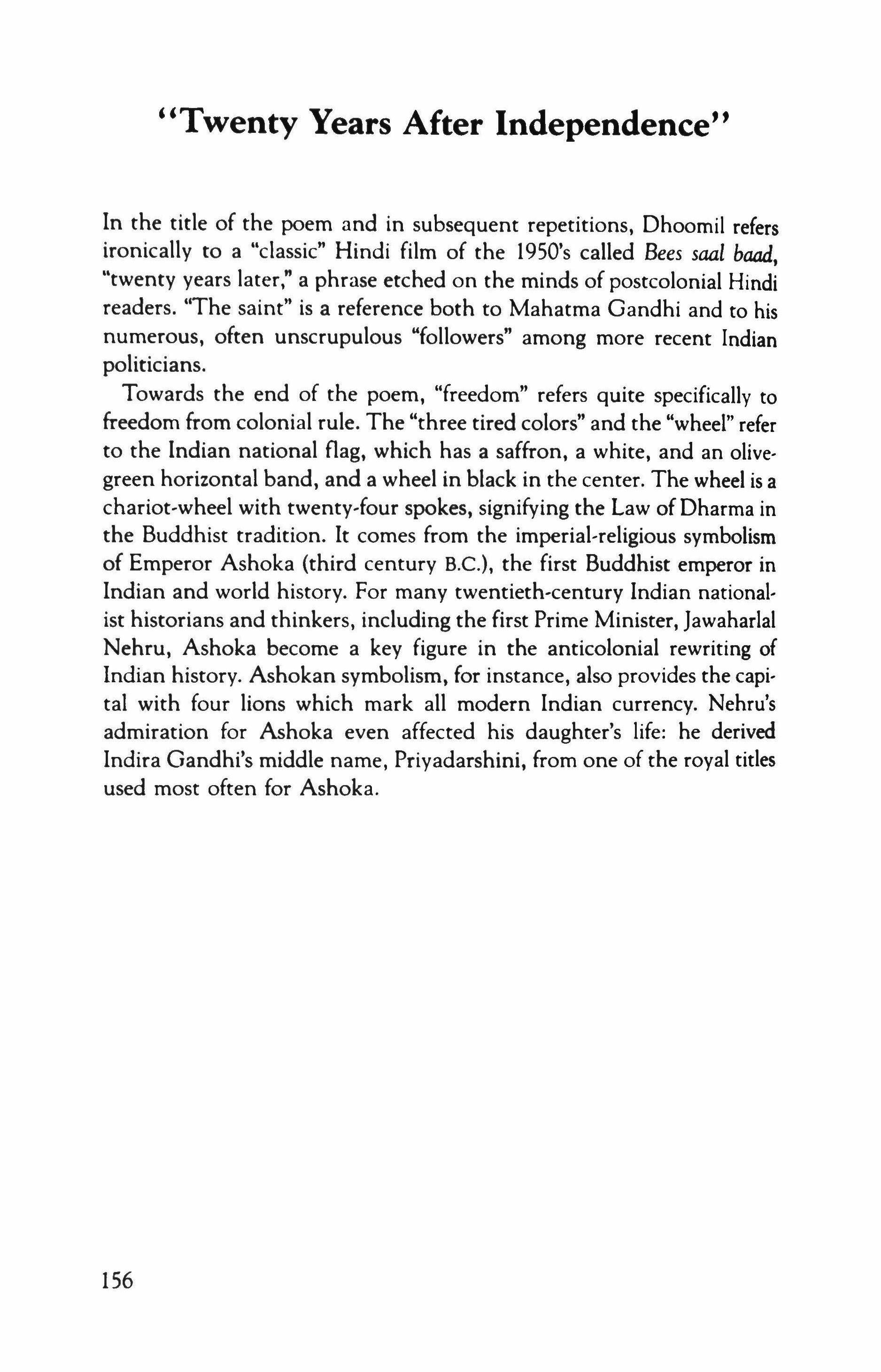
"Twenty Years After Independence"
In the title of the poem and in subsequent repetitions, Dhoomil refers ironically to a "classic" Hindi film of the 1950's called Bees sool baad, "twenty years later," a phrase etched on the minds of postcolonial Hindi readers. "The saint" is a reference both to Mahatma Gandhi and to his numerous, often unscrupulous "followers" among more recent Indian politicians.
Towards the end of the poem, "freedom" refers quite specifically to freedom from colonial rule. The "three tired colors" and the "wheel" refer to the Indian national flag, which has a saffron, a white, and an olivegreen horizontal band, and a wheel in black in the center. The wheel is a chariot-wheel with twenty-four spokes, signifying the Law of Dharma in the Buddhist tradition. It comes from the imperial-religious symbolism of Emperor Ashoka (third century B.C.), the first Buddhist emperor in Indian and world history. For many twentieth-century Indian nationalist historians and thinkers, including the first Prime Minister, Jawaharlal Nehru, Ashoka become a key figure in the anticolonial rewriting of Indian history. Ashokan symbolism, for instance, also provides the capital with four lions which mark all modern Indian currency. Nehru's admiration for Ashoka even affected his daughter's life: he derived Indira Gandhi's middle name, Priyadarshini, from one of the royal titles used most often for Ashoka.
156
Twenty Years After Independence
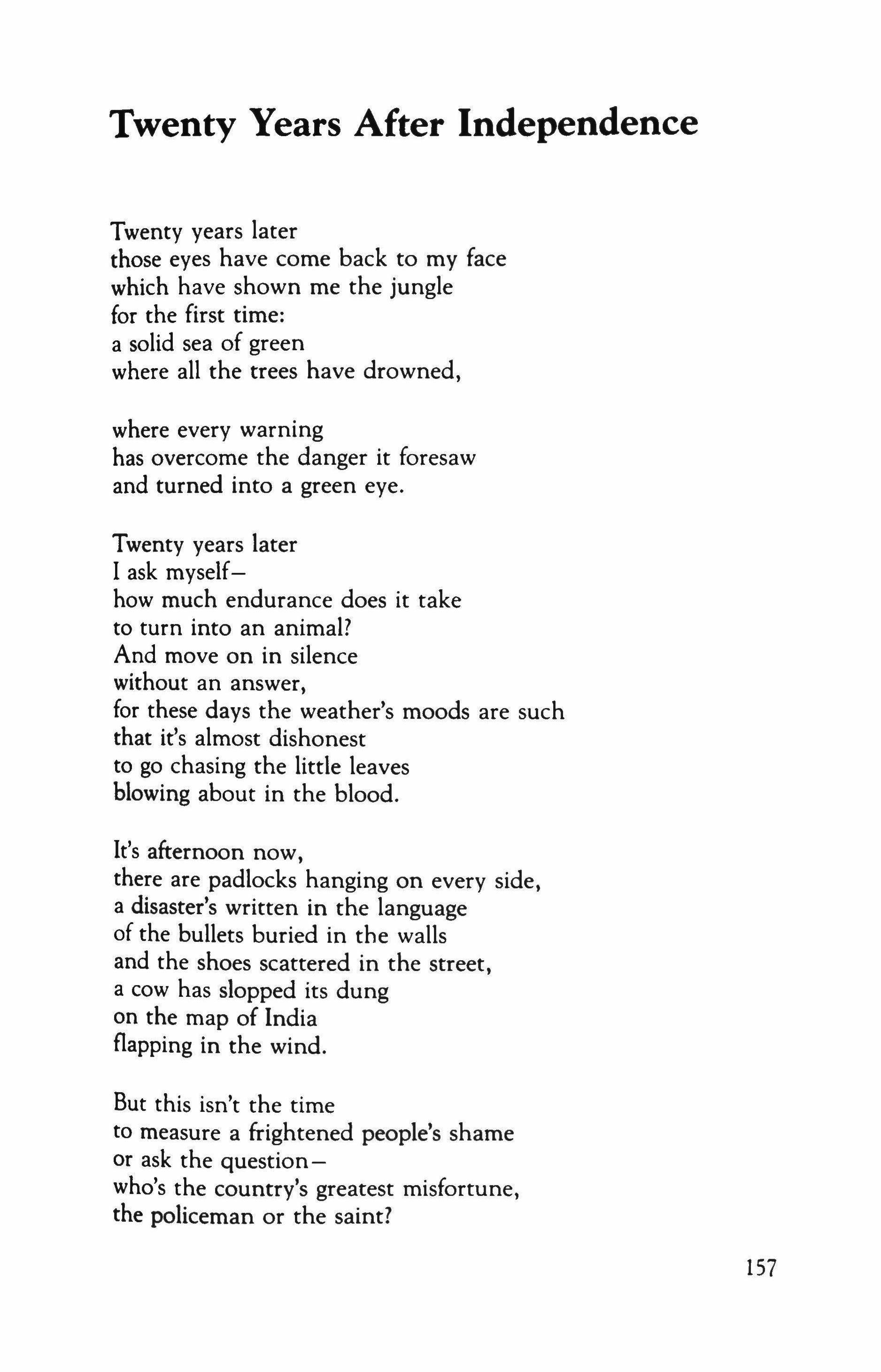
Twenty years later those eyes have come back to my face which have shown me the jungle for the first time: a solid sea of green where all the trees have drowned, where every warning has overcome the danger it foresaw and turned into a green eye.
Twenty years later I ask myselfhow much endurance does it take to turn into an animal? And move on in silence without an answer, for these days the weather's moods are such that it's almost dishonest to go chasing the little leaves blowing about in the blood.
It's afternoon now, there are padlocks hanging on every side, a disaster's written in the language of the bullets buried in the walls and the shoes scattered in the street, a cow has slopped its dung on the map of India flapping in the wind.
But this isn't the time to measure a frightened people's shame or ask the questionwho's the country's greatest misfortune, the policeman or the saint?
157
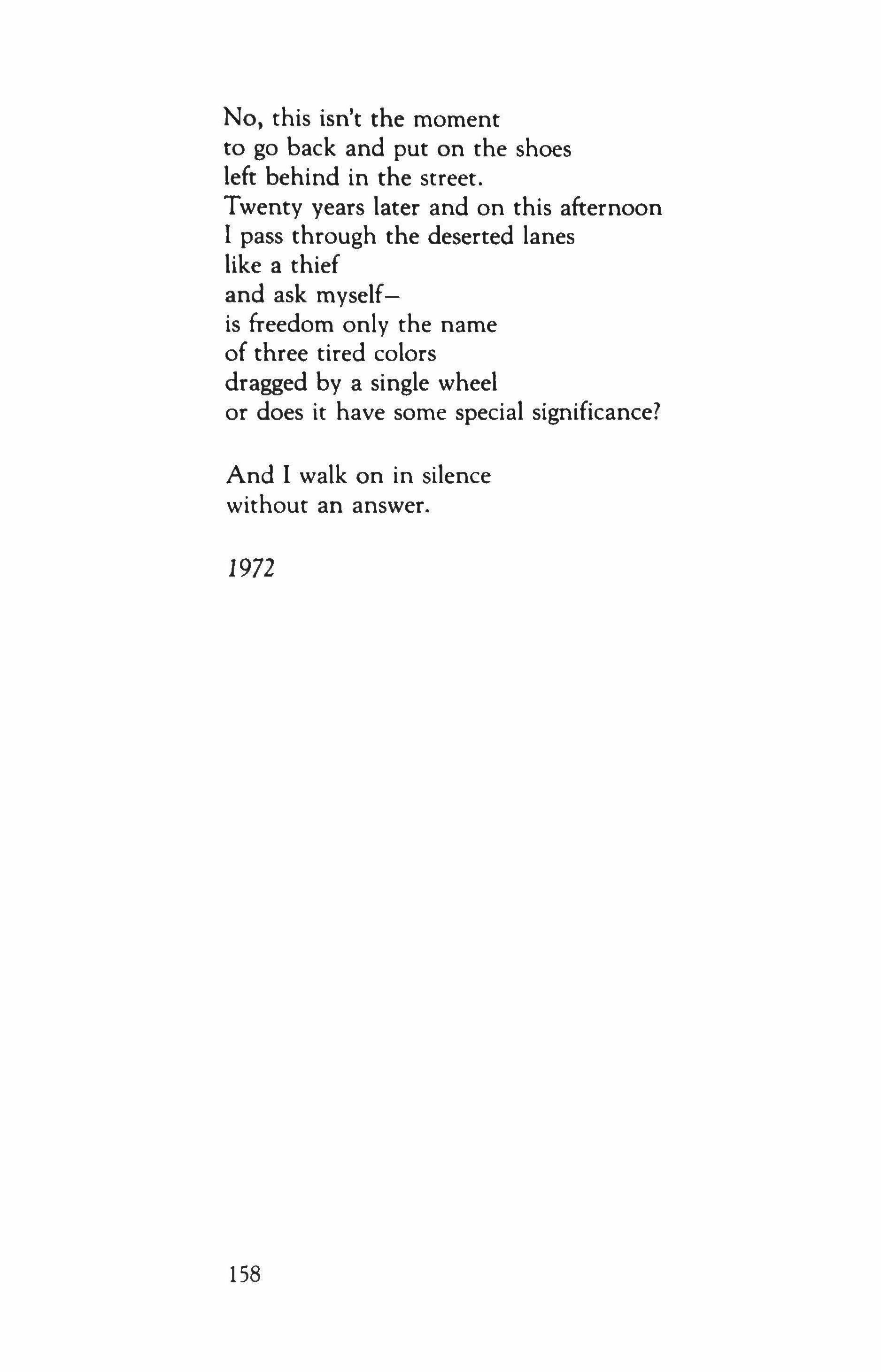
No, this isn't the moment to go back and put on the shoes left behind in the street. Twenty years later and on this afternoon 1 pass through the deserted lanes like a thief and ask myselfis freedom only the name of three tired colors dragged by a single wheel or does it have some special significance?
And I walk on in silence without an answer. 1972
158

"The City, Evening, and an Old Man: Me"
In the opening verse-paragraphs, Dhoomil mocks the common middleclass Indian tendency to treat a man who smokes cigarettes and drinks "foreign" liquor (whiskey, rum, gin, etc.) as a "bad" character. He also mocks Indians who regard smoking in the presence of one's elders as an act of disrespect.
In the fourth verse, Dhoomil puns politically on the fact that Indian traffic, modeled on the British pattern, keeps to the left side of the road. The popular American writer Dale Carnegie's "how-to" books about influencing people and succeeding in life were, until recently, read rather widely in India.
159
The City, Evening, and an Old Man: Me
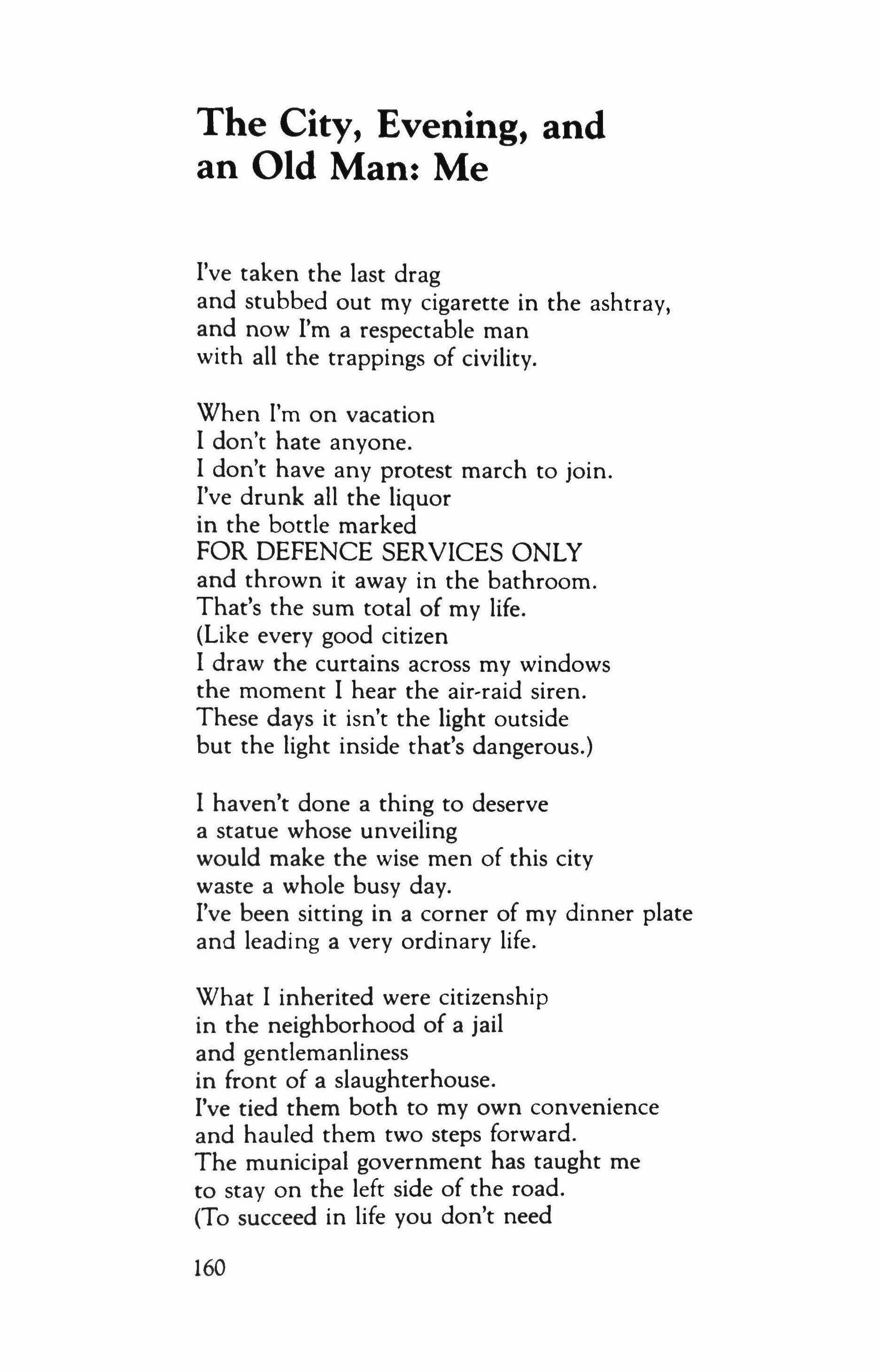
I've taken the last drag and stubbed out my cigarette in the ashtray, and now I'm a respectable man with all the trappings of civility.
When I'm on vacation I don't hate anyone. I don't have any protest march to join. I've drunk all the liquor in the bottle marked FOR DEFENCE SERVICES ONLY and thrown it away in the bathroom. That's the sum total of my life. (Like every good citizen I draw the curtains across my windows the moment I hear the air-raid siren. These days it isn't the light outside but the light inside that's dangerous.)
I haven't done a thing to deserve a statue whose unveiling would make the wise men of this city waste a whole busy day. I've been sitting in a corner of my dinner plate and leading a very ordinary life.
What I inherited were citizenship in the neighborhood of a jail and gendemanliness in front of a slaughterhouse. I've tied them both to my own convenience and hauled them two steps forward. The municipal government has taught me to stay on the left side of the road. (To succeed in life you don't need
160
to read Dale Carnegie's book but to understand traffic signs.)
Other than petty lies
I don't know the weight of a gun. On the face of the traffic policeman doing his drill in the square I've always seen the map of democracy.
And now I don't have a single worry, I don't have to do a thing. I've reached the stage in life when files begin to close. I'm sitting in my own chair on the verandah without any qualms. The sun's setting on the toe of my shoe. A bugle's blowing in the distance. This is the time when the soldiers come back, and the possessed city is now slowly turning its madness into windowpanes and lights.
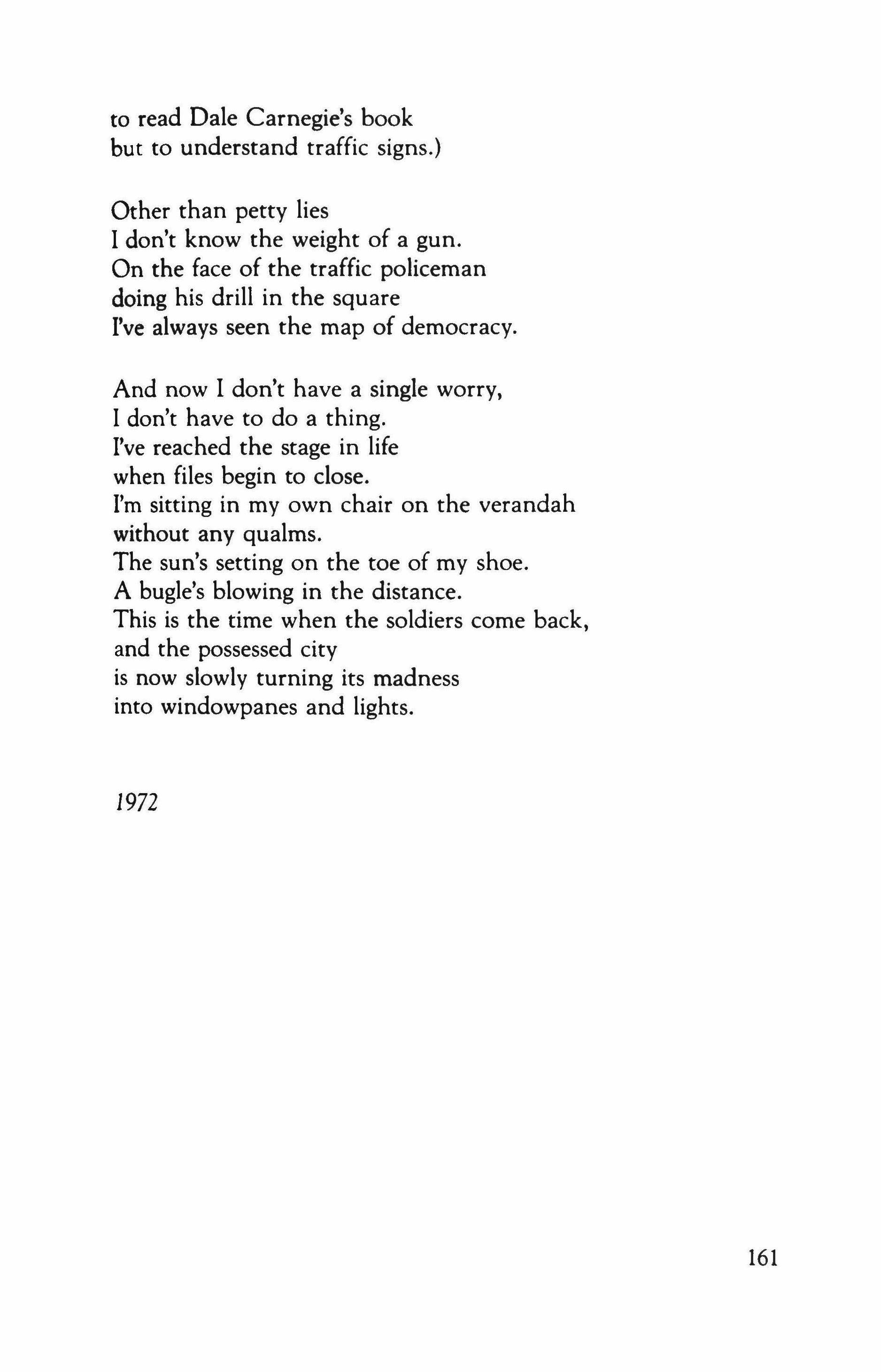
1972
161

G. M. Muktibodh
Gajanan Madhav Muktibodh (1917-64) worked in Madhya Pradesh as a high-school teacher for most of his adult life and died in New Delhi following a long illness. He was a prolific writer of poetry, short and novelistic fiction, and essays. Much of his important writing, however, was collected only after his death. His collected works now fill six large volumes. Many readers consider him the most important Hindi writer in the twentieth century, but he remains largely untranslated and untranslatable. He was associated variously with nai kavita, prayogvad and ptagativad in the course of his career. Significantly enough, he belonged to a Marathi-speaking family, and his younger brother, Sharatchandra Muktibodh, became one of the foremost left-wing writers in Marathi between the 1950's and 1980's.
My translations here are based on "Shunya" and "Main tum logon se dur hun," in Nemichandra Jain, ed., Muktibodh rachanavali, vol. 2 (New Delhi: Rajkamal Prakashan, 1980), pp. 236-38. Vishnu Khare, Adil Jussawalla and Arvind Krishna Mehrotra first translated these poems almost fifteen years ago, in New Writing in India, ed. [ussawalla, pp. 196-98.
162
The Void
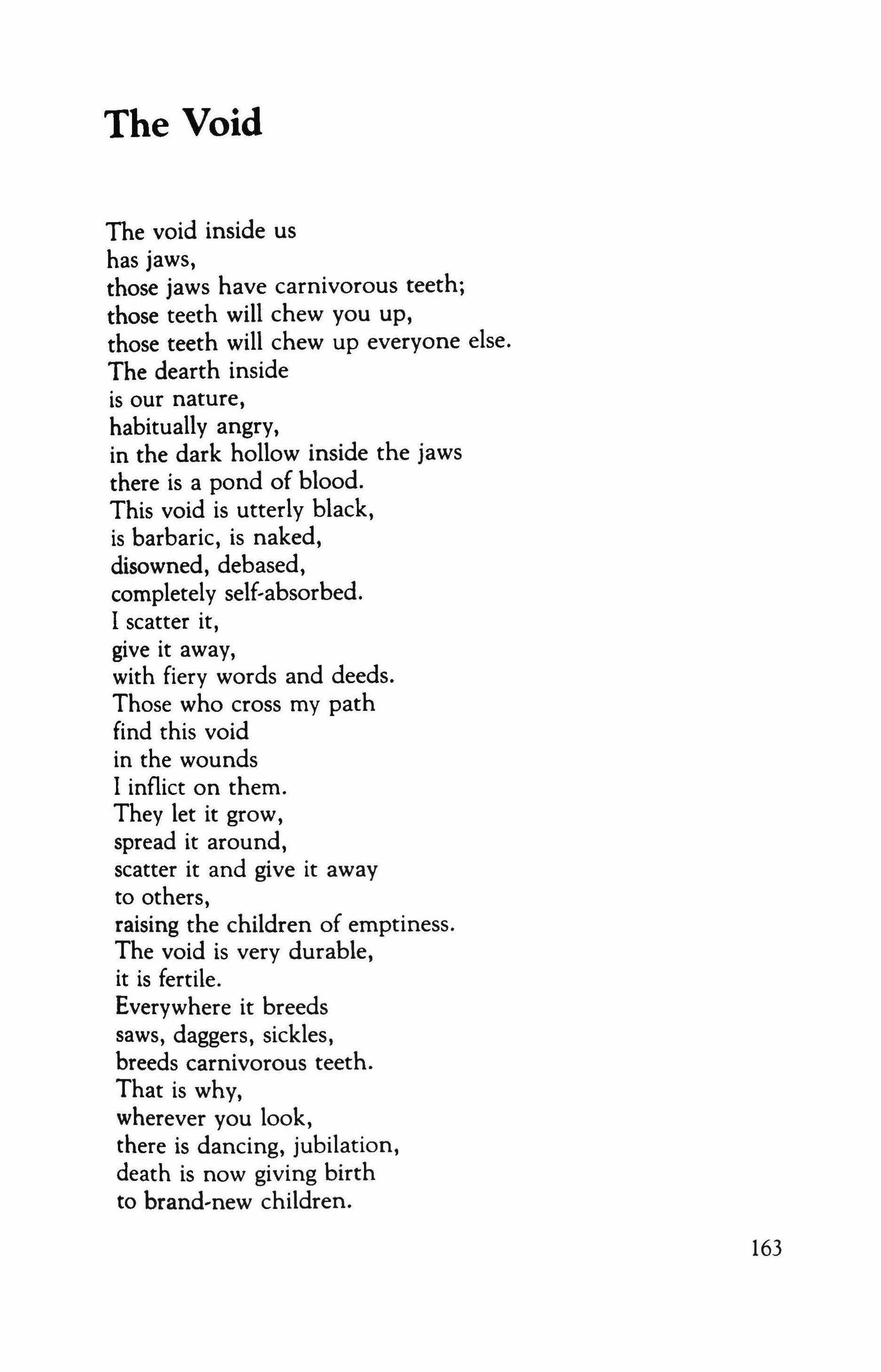
The void inside us has jaws, those jaws have carnivorous teeth; those teeth will chew you up, those teeth will chew up everyone else. The dearth inside is our nature, habitually angry, in the dark hollow inside the jaws there is a pond of blood. This void is utterly black, is barbaric, is naked, disowned, debased, completely self-absorbed. I scatter it, give it away, with fiery words and deeds. Those who cross my path find this void in the wounds I inflict on them. They let it grow, spread it around, scatter it and give it away to others, raising the children of emptiness. The void is very durable, it is fertile. Everywhere it breeds saws, daggers, sickles, breeds carnivorous teeth. That is why, wherever you look, there is dancing, jubilation, death is now giving birth to brand-new children.
163
Everywhere there are oversights with the teeth of saws, there are heavily armed mistakes: the world looks at them and walks on, rubbing its hands.

1960-61
164
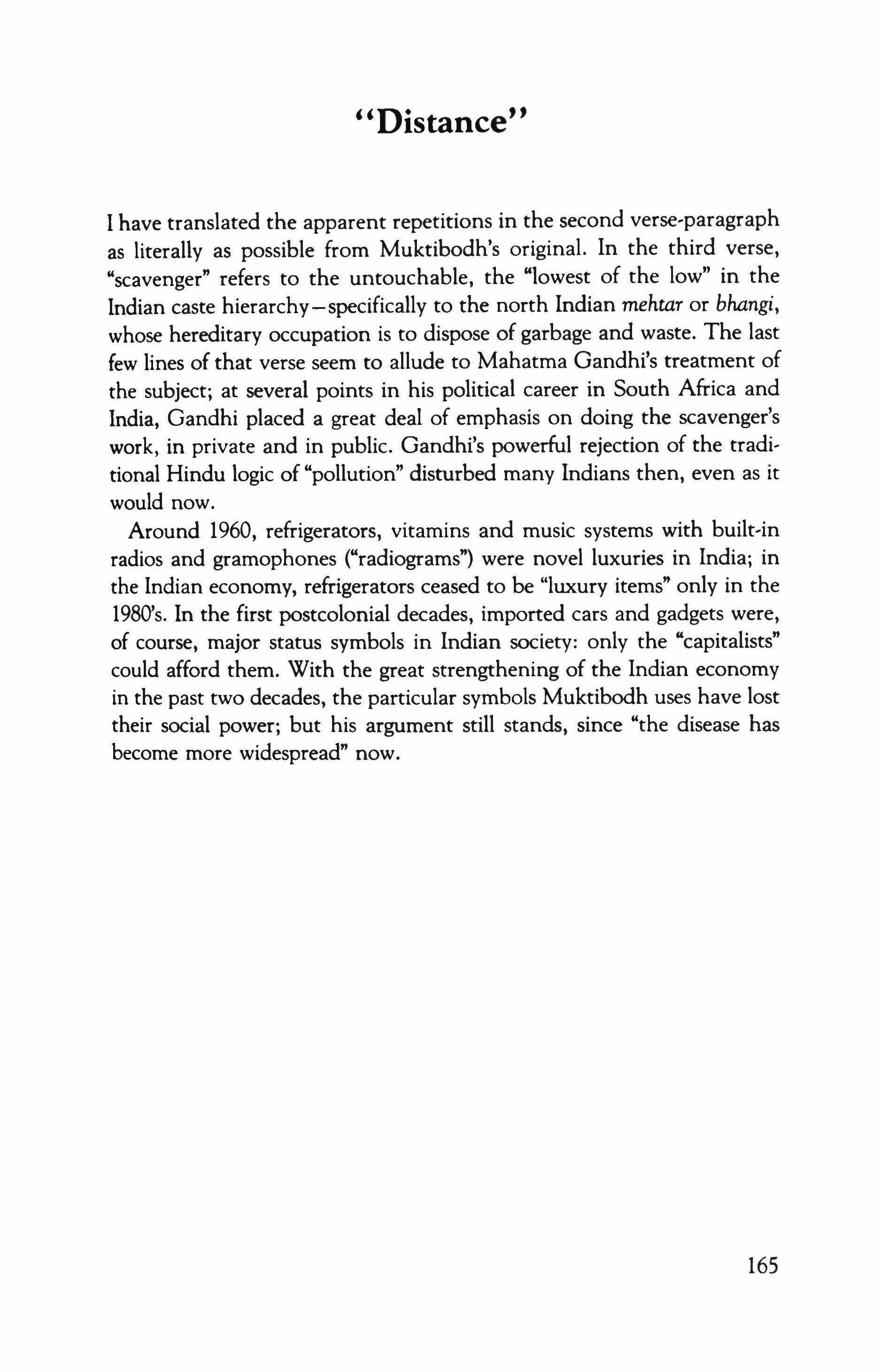
"Distance"
I have translated the apparent repetitions in the second verse-paragraph as literally as possible from Muktibodh's original. In the third verse, "scavenger" refers to the untouchable, the "lowest of the low" in the Indian caste hierarchy-specifically to the north Indian mehtar or bhangi, whose hereditary occupation is to dispose of garbage and waste. The last few lines of that verse seem to allude to Mahatma Gandhi's treatment of the subject; at several points in his political career in South Africa and India, Gandhi placed a great deal of emphasis on doing the scavenger's work, in private and in public. Gandhi's powerful rejection of the traditional Hindu logic of "pollution" disturbed many Indians then, even as it would now.
Around 1960, refrigerators, vitamins and music systems with built-in radios and gramophones {"radiograms"} were novel luxuries in India; in the Indian economy, refrigerators ceased to be "luxury items" only in the 1980's. In the first postcolonial decades, imported cars and gadgets were, of course, major status symbols in Indian society: only the "capitalists" could afford them. With the great strengthening of the Indian economy in the past two decades, the particular symbols Muktibodh uses have lost their social power; but his argument still stands, since "the disease has become more widespread" now.
165
Distance
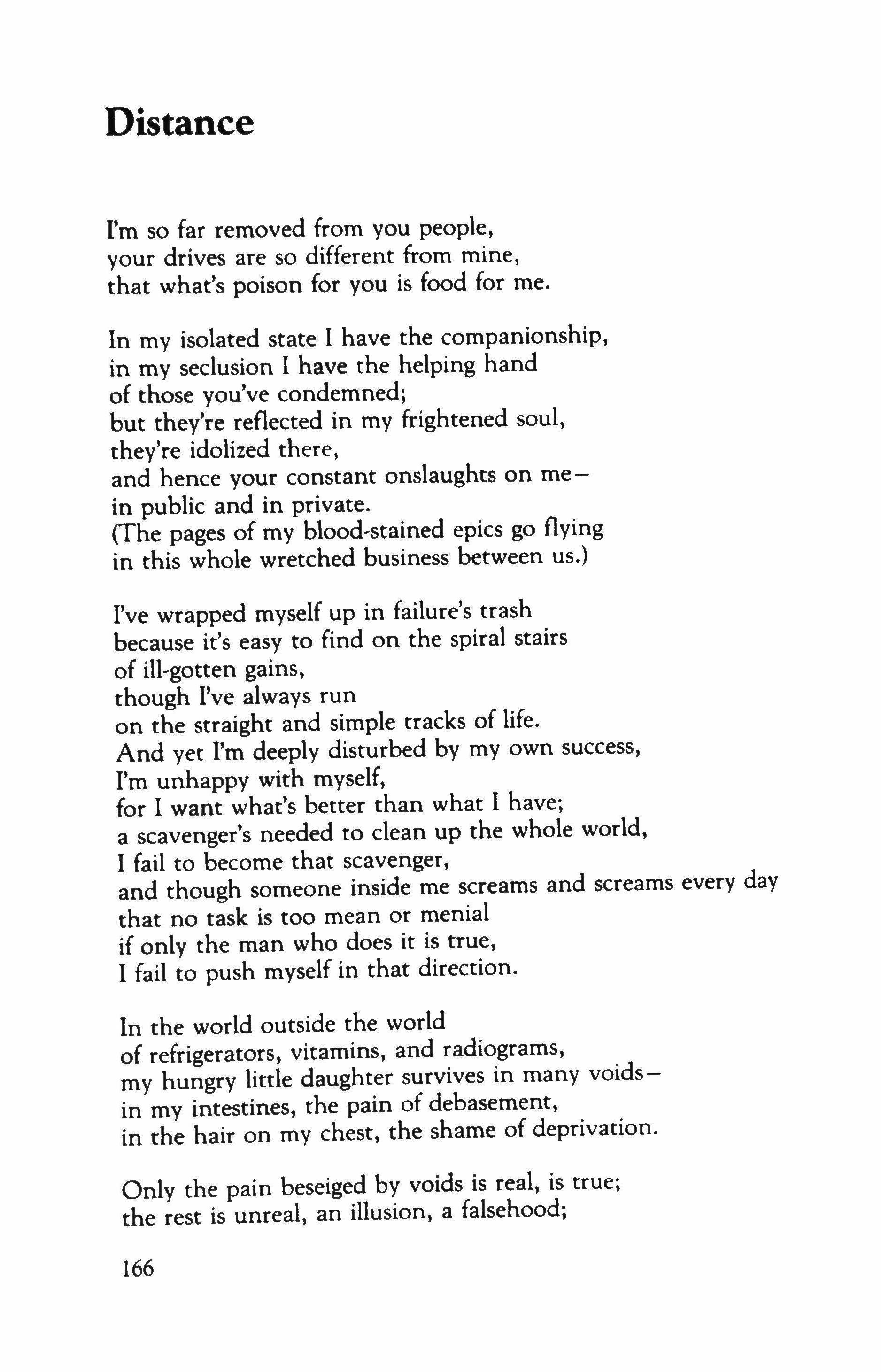
I'm so far removed from you people, your drives are so different from mine, that what's poison for you is food for me.
In my isolated state I have the companionship, in my seclusion I have the helping hand of those you've condemned; but they're reflected in my frightened soul, they're idolized there, and hence your constant onslaughts on mein public and in private. (The pages of my blood-stained epics go flying in this whole wretched business between us.)
I've wrapped myself up in failure's trash because it's easy to find on the spiral stairs of ill-gotten gains, though I've always run on the straight and simple tracks of life. And yet I'm deeply disturbed by my own success, I'm unhappy with myself, for I want what's better than what I have; a scavenger's needed to clean up the whole world, I fail to become that scavenger, and though someone inside me screams and screams every day that no task is too mean or menial if only the man who does it is true, I fail to push myself in that direction.
In the world outside the world of refrigerators, vitamins, and radiograms, my hungry little daughter survives in many voidsin my intestines, the pain of debasement, in the hair on my chest, the shame of deprivation.
Only the pain beseiged by voids is real, is true; the rest is unreal, an illusion, a falsehood;
166
there's only one truth, and that's the steady stream of sorrows.
I'm deaf, I'm base, I lie under your imported Dodges and Chevrolets, I mend their parts in my oil-stained clothes, I bear the burden of your commands.
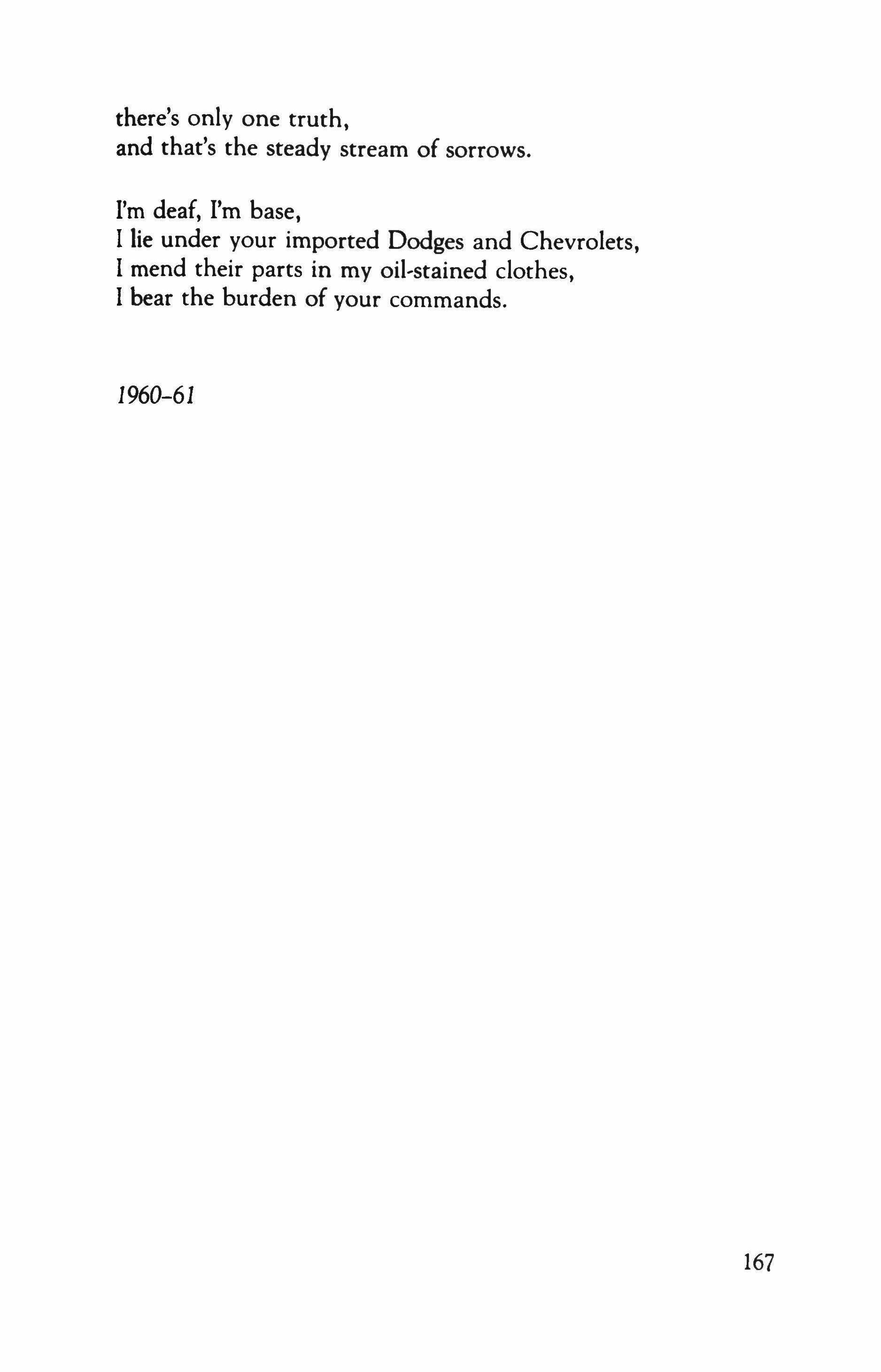
1960-61
167

Shrikant Verma
Shrikant Verma (1931-86) was born in Jabalpur, Madhya Pradesh, and was educated there and in Nagpur. In the mid-1950's, he moved to Delhi, where for nearly twenty years he worked intermittently as a journalist. He was a colleague of Raghuvir Sahay on the staffof Dinman. In 1976 he was elected a member of the Rajya Sabha, the upper house of the Indian Parliament, and between 1980 and 1984 served as a general secretary of the All-India Congress Committee, first under Indira Gandhi and subsequently under Rajiv Gandhi. He died in New York in 1986. Verma published about fifteen books, including collections of poetry, short fiction, novelistic fiction, essays and interviews with writers. He remained on the fringes of the nai kavita and pragativad movements in the 1960's, and his later political associations frequently made his work controversial.
The Hindi poems rendered here are "Prakriya" and "Khyber," in Verma, lalsaghar (New Delhi: Rajkamal Prakashan, 1973), pp. 79-80, 21-23. Earlier versions of "Process of Change" have appeared in Mundus Artium and London Magazine. Aparna Dharwadker collaborated with me on the translation of "Khyber."
168
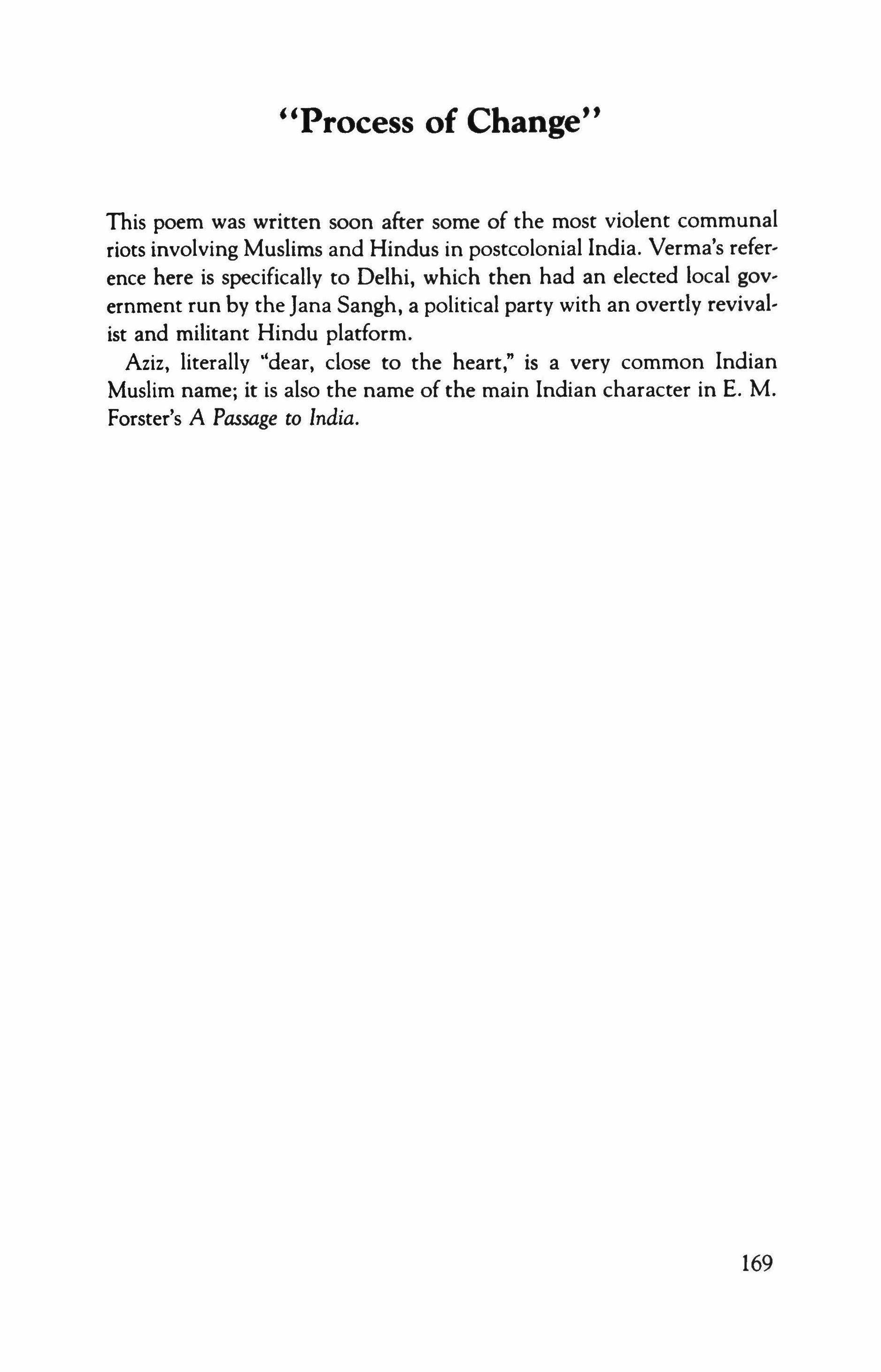
"Process of Change"
This poem was written soon after some of the most violent communal riots involving Muslims and Hindus in postcolonial India. Verma's reference here is specifically to Delhi, which then had an elected local gov� ernment run by the Jana Sangh, a political party with an overtly revivalist and militant Hindu platform.
Aziz, literally "dear, close to the heart," is a very common Indian Muslim name; it is also the name of the main Indian character in E. M. Forster's A Passage to India.
169
Process of Change
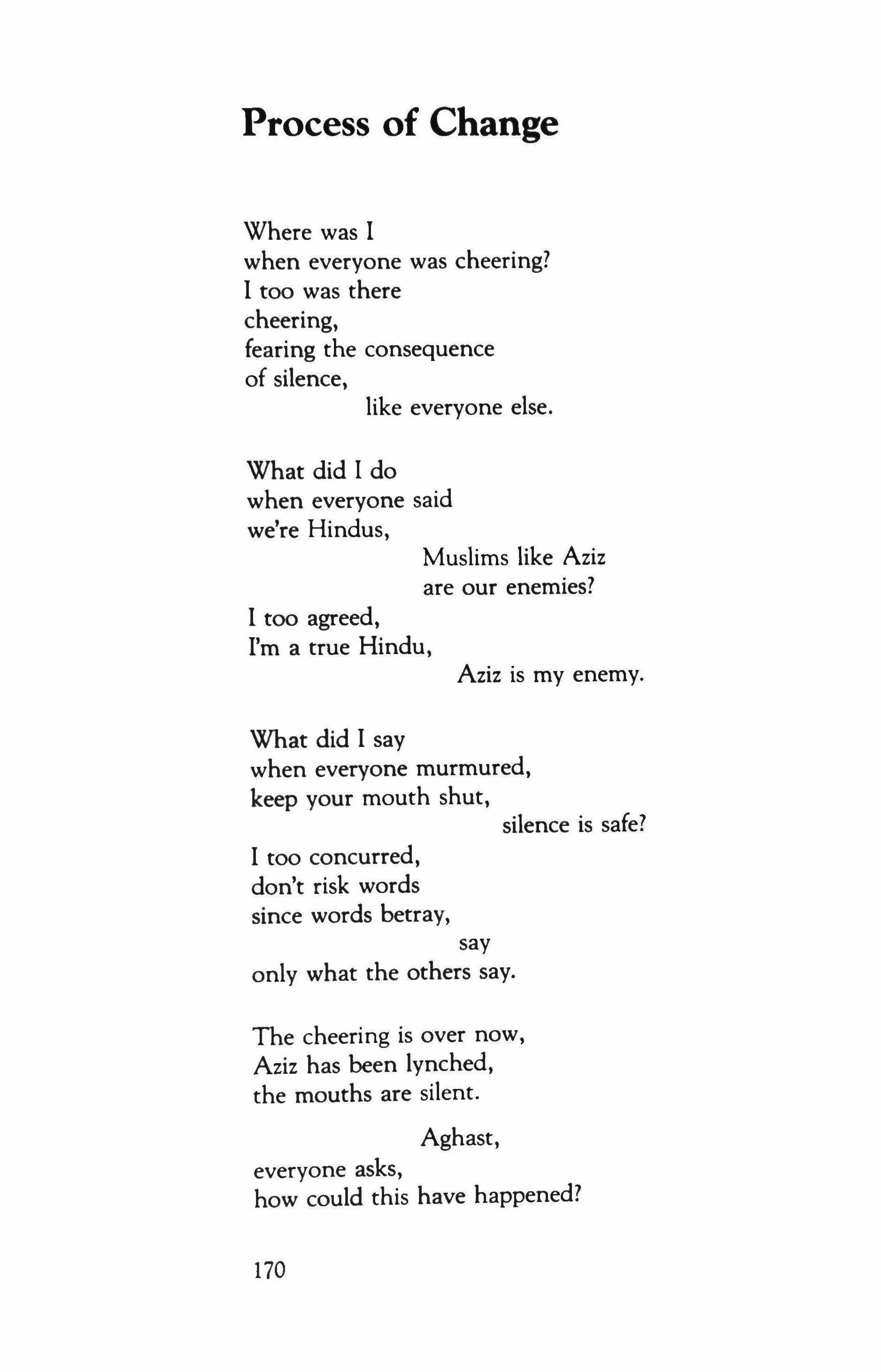
Where was I when everyone was cheering? I too was there cheering, fearing the consequence of silence, like everyone else.
What did I do when everyone said we're Hindus, Muslims like Aziz are our enemies?
I too agreed, I'm a true Hindu, Aziz is my enemy.
What did I say when everyone murmured, keep your mouth shut, silence is safe?
I too concurred, don't risk words since words betray, say only what the others say.
The cheering is over now, Aziz has been lynched, the mouths are silent.
Aghast, everyone asks, how could this have happened?
170
And I, like everyone else, repeat the question. How did this happen? Why?
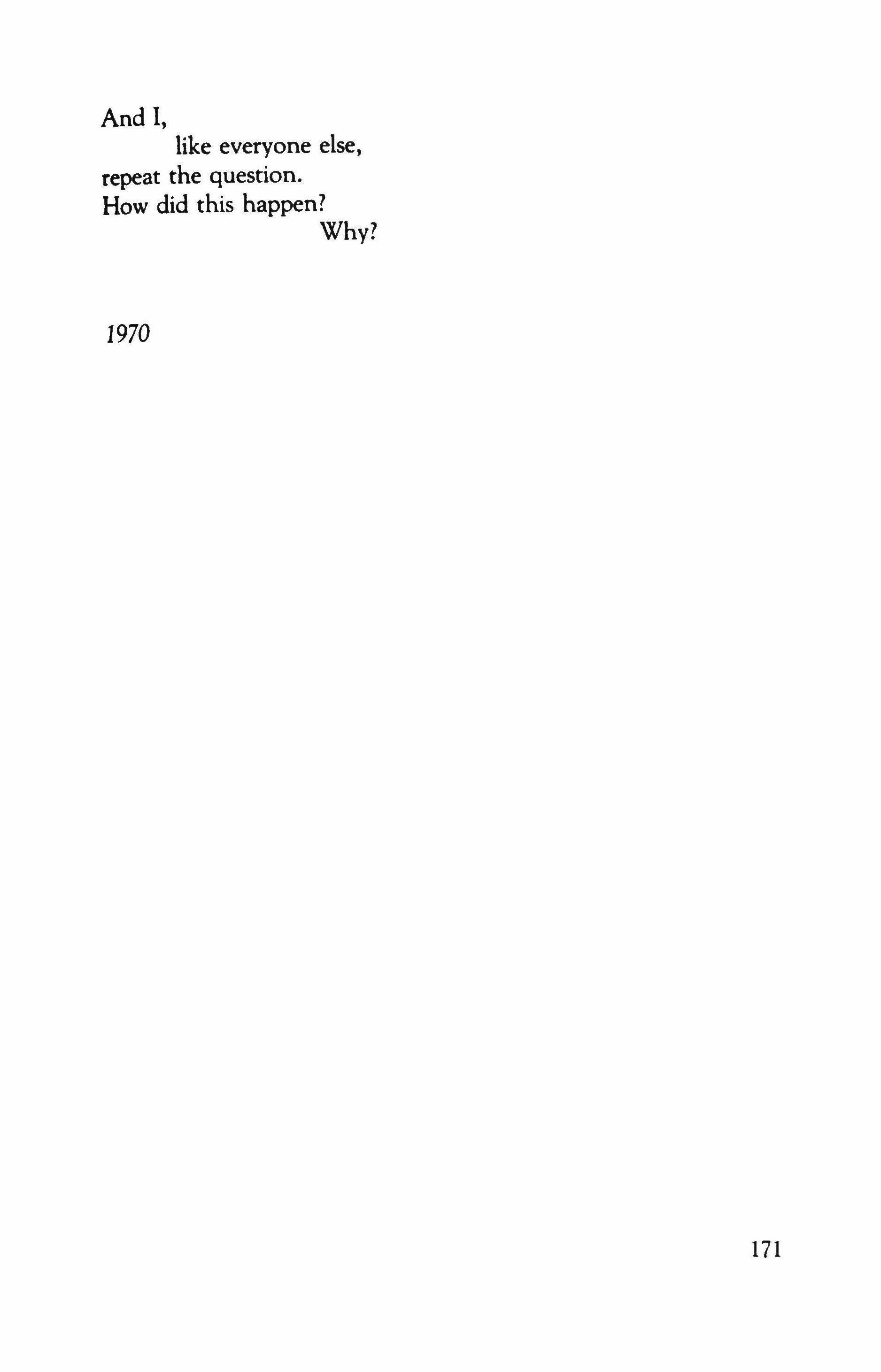
1970
171
Khyber
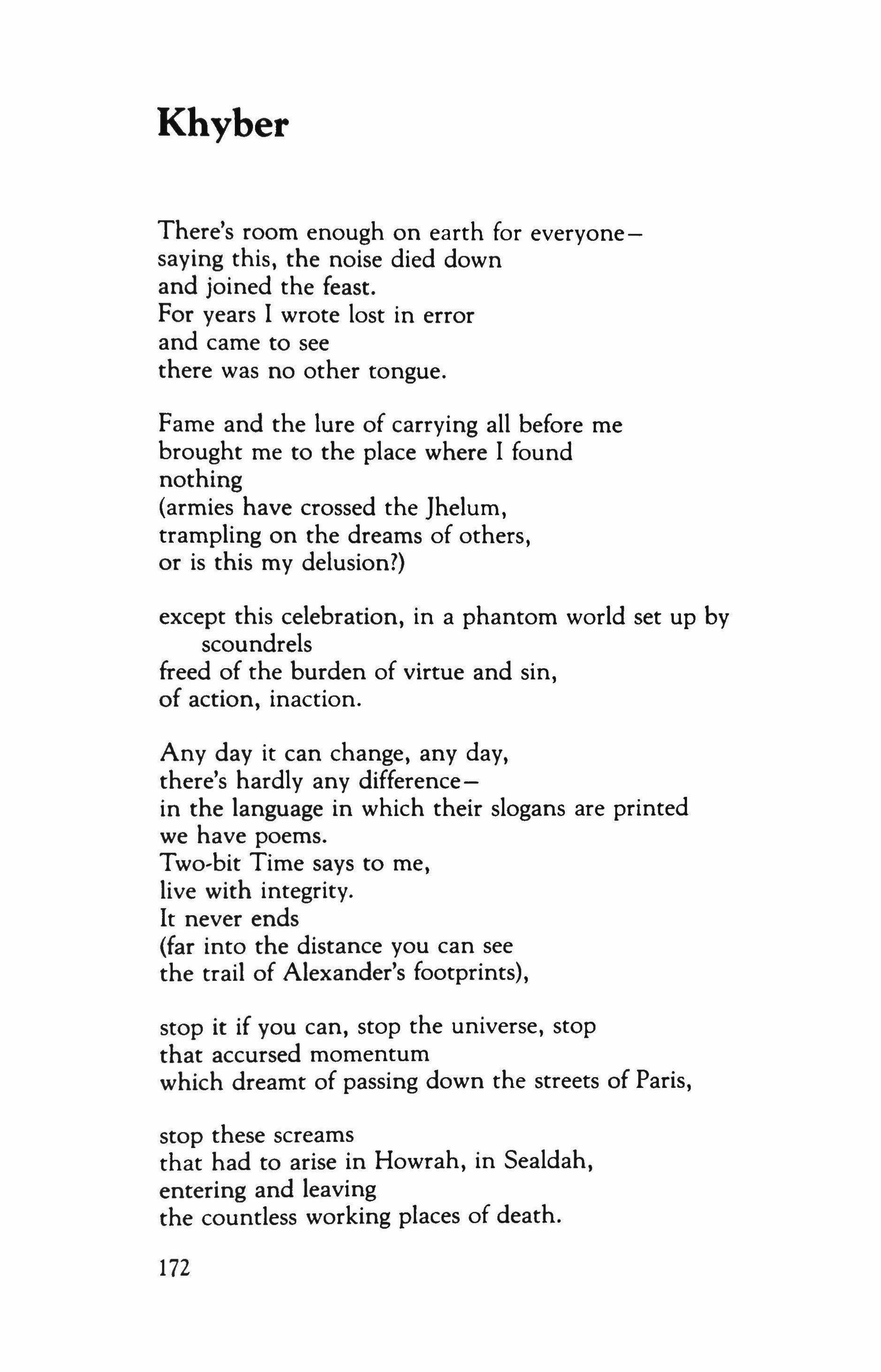
There's room enough on earth for everyonesaying this, the noise died down and joined the feast. For years I wrote lost in error and came to see there was no other tongue.
Fame and the lure of carrying all before me brought me to the place where I found nothing (armies have crossed the Jhelum, trampling on the dreams of others, or is this my delusion?)
except this celebration, in a phantom world set up by scoundrels freed of the burden of virtue and sin, of action, inaction.
Any day it can change, any day, there's hardly any differencein the language in which their slogans are printed we have poems. Two-bit Time says to me, live with integrity. It never ends (far into the distance you can see the trail of Alexander's footprints),
stop it if you can, stop the universe, stop that accursed momentum which dreamt of passing down the streets of Paris, stop these screams that had to arise in Howrah, in Sealdah, entering and leaving the countless working places of death.
172
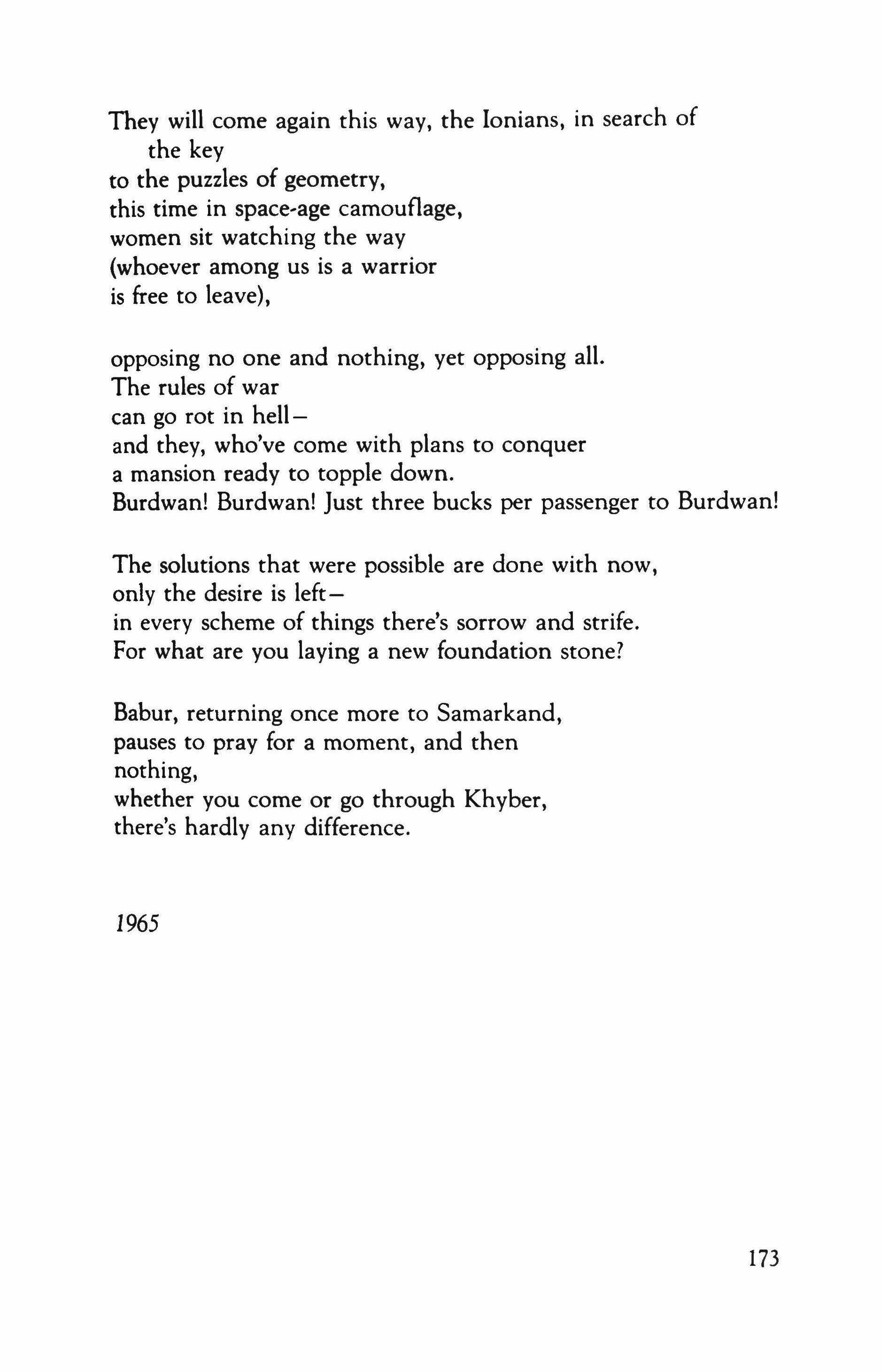
They will come again this way, the Ionians, in search of the key to the puzzles of geometry, this time in space-age camouflage, women sit watching the way (whoever among us is a warrior is free to leave),
opposing no one and nothing, yet opposing all. The rules of war can go rot in helland they, who've come with plans to conquer a mansion ready to topple down. Burdwan! Burdwan! Just three bucks per passenger to Burdwan!
The solutions that were possible are done with now, only the desire is leftin every scheme of things there's sorrow and strife.
For what are you laying a new foundation stone?
Babur, returning once more to Samarkand, pauses to pray for a moment, and then nothing, whether you come or go through Khyber, there's hardly any difference. 1965
173
�cit- � � � �� � ��'*'A :uQtS\ � � � ��I �aa=;.� §>��� ���, ���...-:t�1
:1� � � � �1� a:)f" l\l_,i,6\ � 5;:( ���""� �...&(� � ::t=CiIt:;:\ � '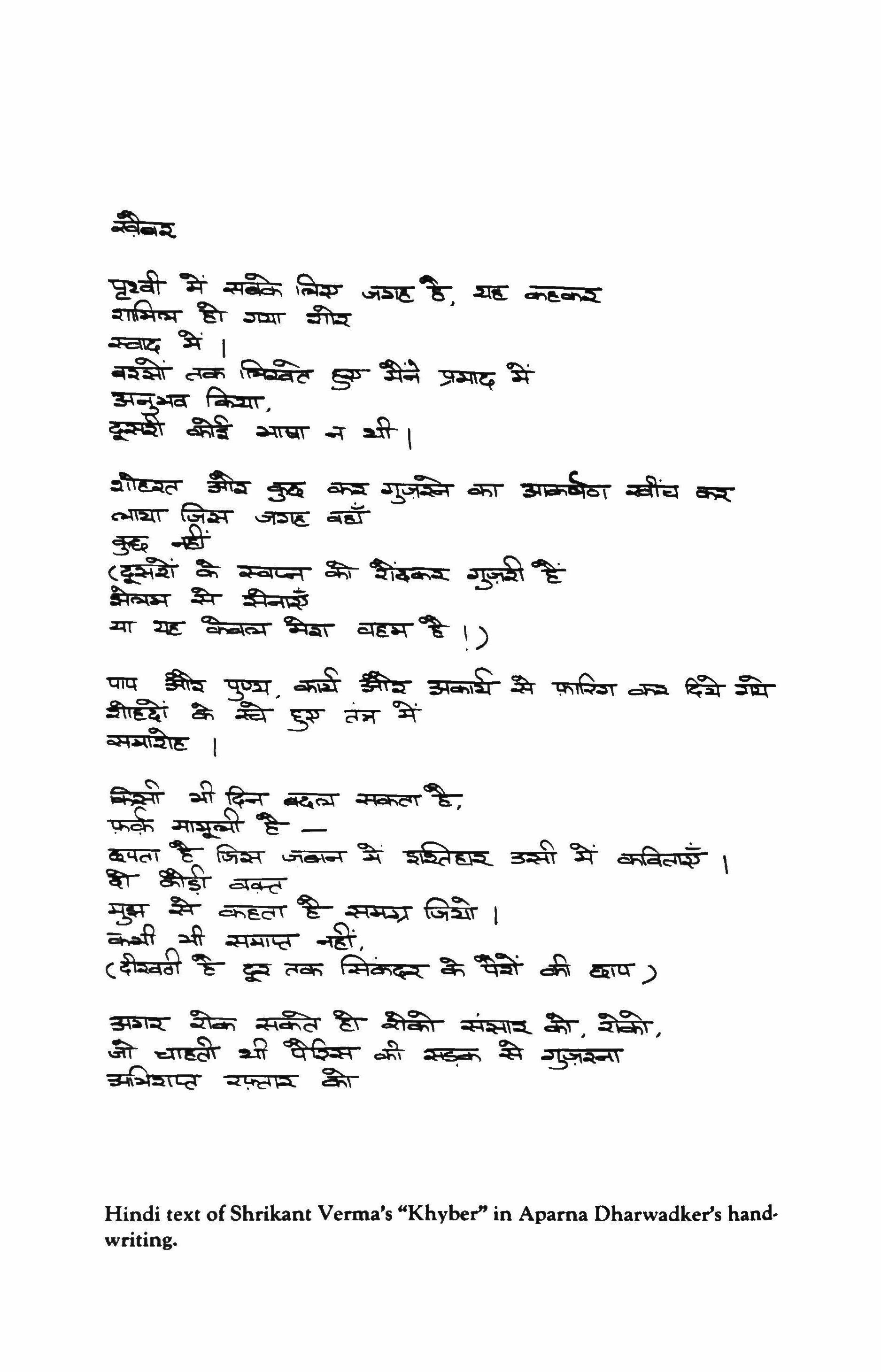
Hindi text ofShrikant Verma's "Khyber" in Apama Dharwadker's handwriting.
���)
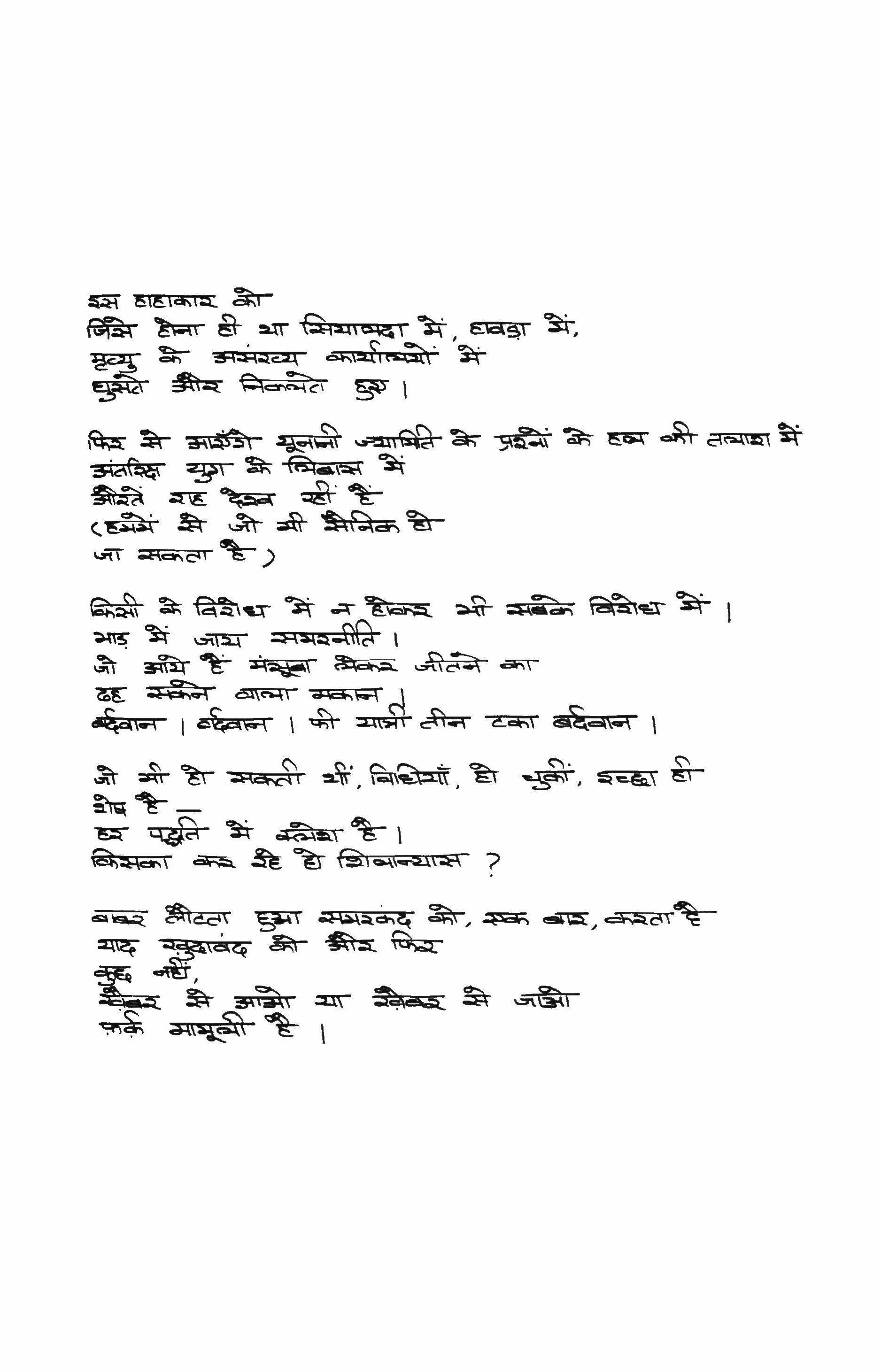
�
� � � � � �£t\CGalI � ��, �. ��.'�' � Ch 5"1S4:Jic:::t( Cii';\\ _, � � P\c:r1Q"C\ � \ � !R- ��I �� -.rw\'iq\:l; 'a:; 9�\ � � � � � ::5'\af� � � f21_\� � ����� <.� � � � ��d"\� 1..:11\ �a-,�' �) � � Q'tIU' � � �� � �'"*" �c;;.T � I � � �\5l"" :;s:{S(:s:J10 \ ������� � � � ......a:;�c4 �� \ a�� \ � � � � &l�Ci>\\W\
616:lam:r.


Marathi

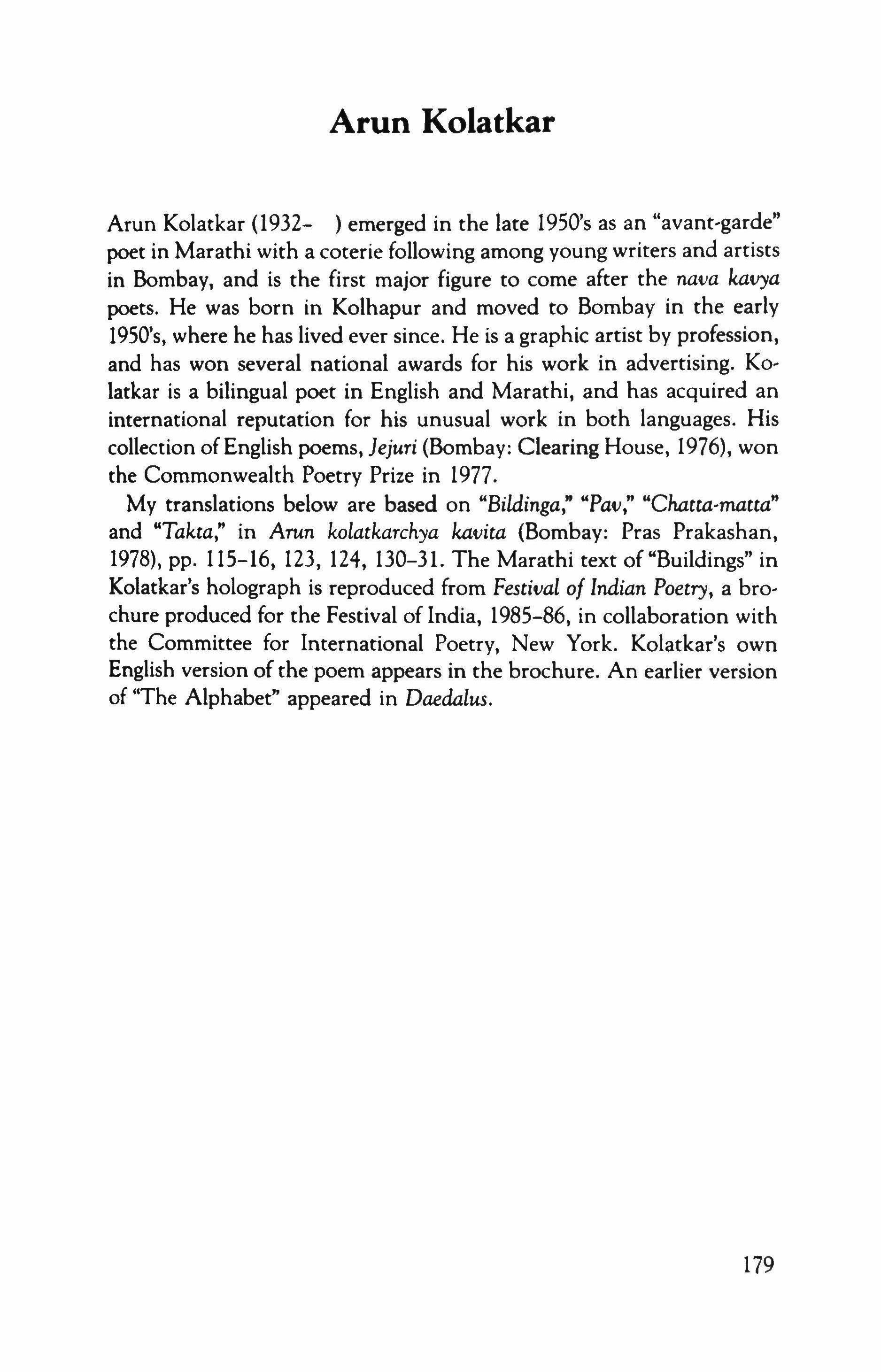
Arun Kolatkar
Arun Kolatkar (1932- ) emerged in the late 1950's as an "avant-garde" poet in Marathi with a coterie following among young writers and artists in Bombay, and is the first major figure to come after the nava kavya poets. He was born in Kolhapur and moved to Bombay in the early 1950's, where he has lived ever since. He is a graphic artist by profession, and has won several national awards for his work in advertising. Kolatkar is a bilingual poet in English and Marathi, and has acquired an international reputation for his unusual work in both languages. His collection of English poems, Jejuri (Bombay; Clearing House, 1976), won the Commonwealth Poetry Prize in 1977.
My translations below are based on "Bildinga: "Pav," "Chatta,matta" and "Takta," in Arun kolatkarchya kaoita (Bombay; Pras Prakashan, 1978), pp. 115-16, 123, 124, 130-31. The Marathi text of "Buildings" in Kolatkar's holograph is reproduced from Festival of Indian Poetry, a brochure produced for the Festival of India, 1985-86, in collaboration with the Committee for International Poetry, New York. Kolatkar's own English version of the poem appears in the brochure. An earlier version of "The Alphabet" appeared in Daedalus.
179
Buildings

at first one of the buildings starts swaying where it stands then it bends down a little and rubs its head against the gulmohar's bole
now it has thrust its tusks under the roots and is shaking the whole tree
number fourteen sees the example of number eleven and starts shaking the intentions of building number thirteen also don't look too good look its eyes are rolling in its head and it's foaming at the mouth
the windows are jostling the walls are sliding into each other
look kilachand's bedroom wall has moved to the left patel's drawingroom wall has slipped in quietly and taken its place
the smokestack at mukesh mills seems to be moving a little the smokestack at mukesh mills has suddenly shot up into the air
the smokestack at mukesh mills is coming down like a pestle to pound the mill
look in the meantime number eleven has gone into convulsions it's shuddering like a huge battle tank in its last throes the room on its roof is spinning and spinning like a crazy turret
the big fifty-five-foot cannon that has appeared in bartakke's bedroom window is snorting and sniffing at the horizon on all four sides
1978 180
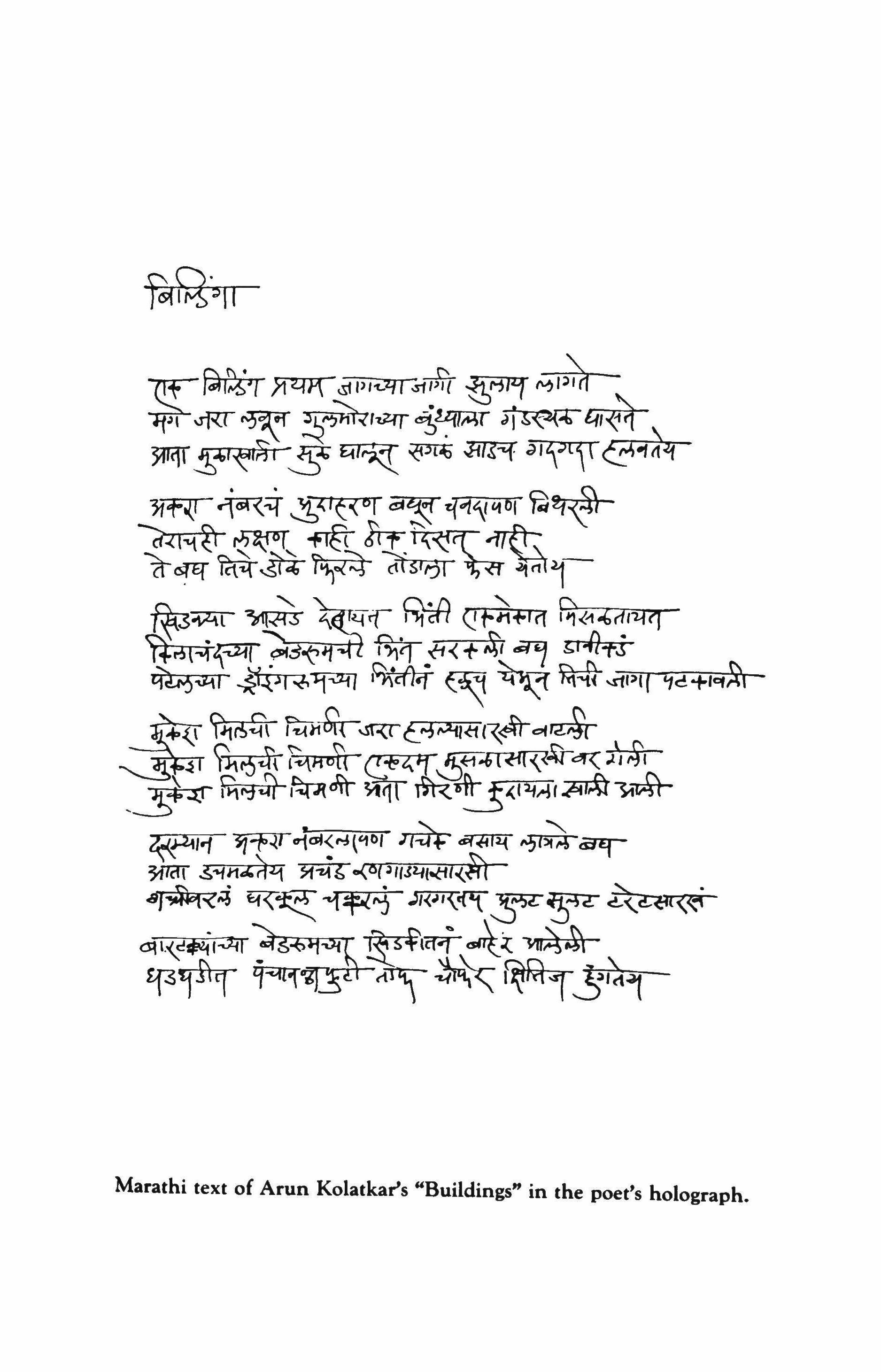
text of Arun Kolatkar's "Buildings" in the poet's holograph.
Marathi
Bread

sit on the table of madness like a loaf of bread
when the bag tears all your slices will tumble out
that's all that will happen you'll have been sliced up much earlier 1978
182
Licked Clean
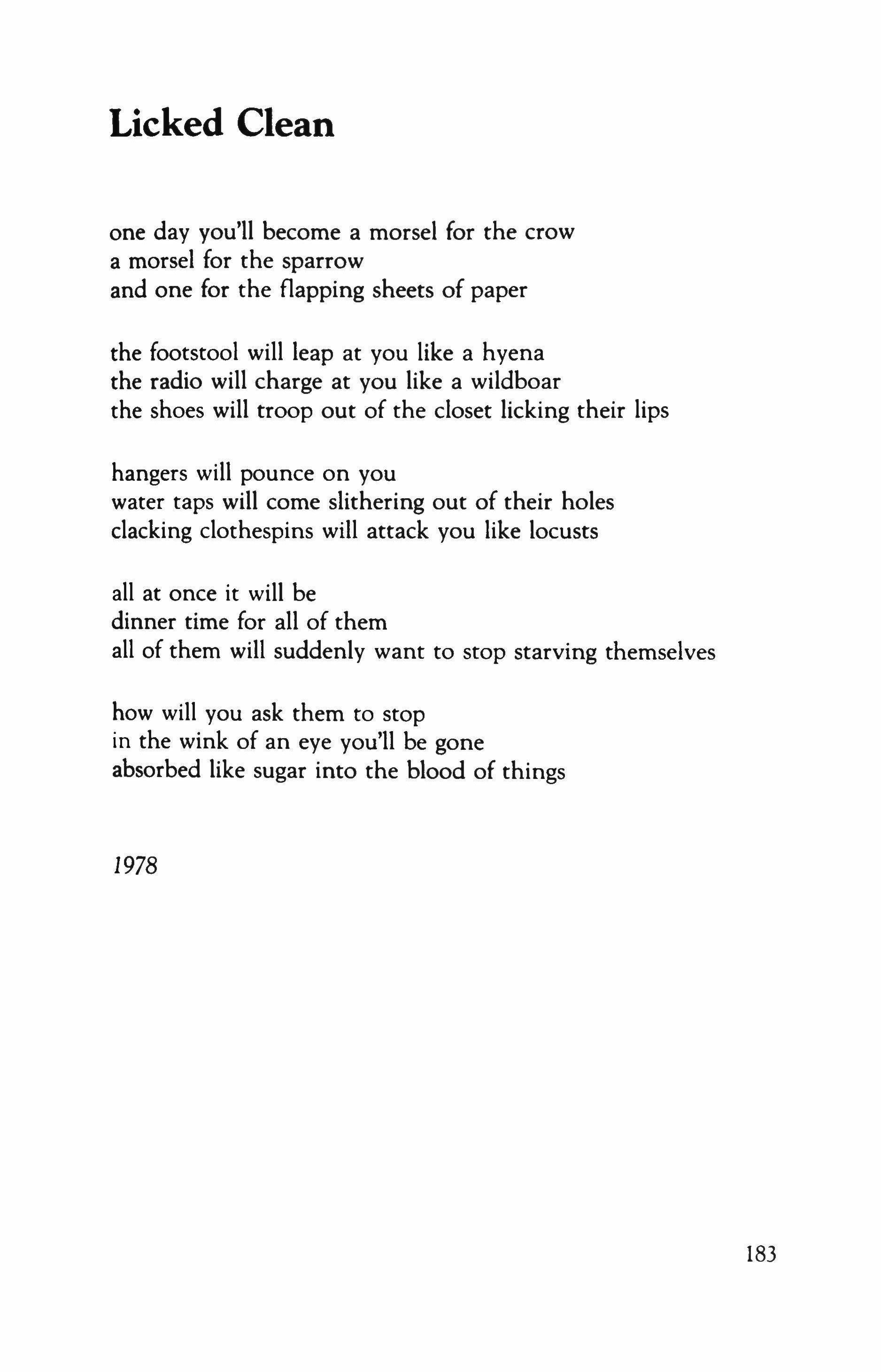
one day you'll become a morsel for the crow a morsel for the sparrow and one for the flapping sheets of paper
the footstool will leap at you like a hyena the radio will charge at you like a wildboar the shoes will troop out of the closet licking their lips
hangers will pounce on you water taps will come slithering out of their holes clacking clothespins will attack you like locusts
all at once it will be dinner time for all of them all of them will suddenly want to stop starving themselves
how will you ask them to stop in the wink of an eye you'll be gone absorbed like sugar into the blood of things
1978 183
The Alphabet
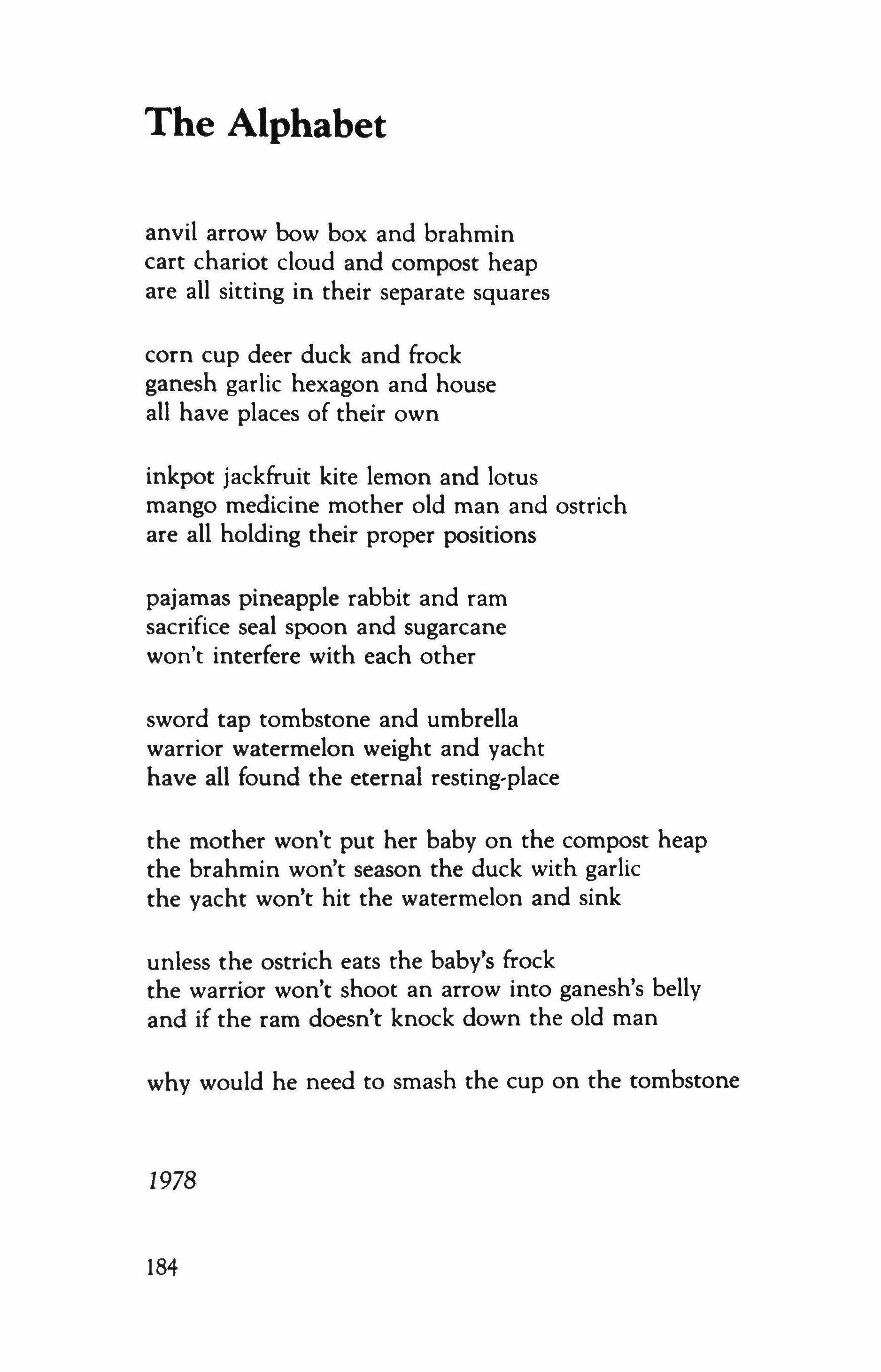
anvil arrow bow box and brahmin
cart chariot cloud and compost heap are all sitting in their separate squares
corn cup deer duck and frock
ganesh garlic hexagon and house all have places of their own
inkpot jackfruit kite lemon and lotus
mango medicine mother old man and ostrich are all holding their proper positions
pajamas pineapple rabbit and ram sacrifice seal spoon and sugarcane won't interfere with each other
sword tap tombstone and umbrella warrior watermelon weight and yacht have all found the eternal resting-place
the mother won't put her baby on the compost heap the brahmin won't season the duck with garlic the yacht won't hit the watermelon and sink
unless the ostrich eats the baby's frock the warrior won't shoot an arrow into ganesh's belly and if the ram doesn't knock down the old man
why would he need to smash the cup on the tombstone 1978
184
a"t'1rt� � 4(0\1::( � €.s@�3�t106 350ff am'a- .::(J3'*'1 � ?i1\Qlct'(:i 4\�Cii � ci1��(i .- 3'ftOlal � a1\ft3, �
a;cr � CJIDIQrn ��
�dl 002::{\'C-z.tl .q::a(lI"iZl1 �1Id1a;1'C-'i:n � :31le{'4
� � -att;IG1 31Tfa" �1Si6" M\\i1 o;m- � aar �� !O('M$ a1\ C41Q(I"':t\\ � 0Tm" a1\SCrl di:HC!t(\ -...
M(i1aR � b��651 �aiiE � Cf')OI� � � .:fIdOI � � �6l;\C"\ 3C1?\a ��OZH:c:n �f�0\ � ��UdQW( �&1Ifi3\ �� ,q2�f1 � e::?,D( � ernfar� � �dloo�I�I=t:I 31cOS4q EH06Itr111
�cala:il(!tl 3�061('1 'lOf1(Yi oCR � (1i$\11A, cNq&1IC!'1 (1q'\ 01\ t:.\/"\ cfflsoT\ � D(\� � c��\j1I(1'1' �S�04 �el\il �&idl DII:< � �\��I �",-fc, � �� �f?\Z\qOI d\OILtctli2l1 LI'ICI<1 �(f\I=<b(R -- �Cfi'tl� ::¥fIO\oill('i\ ea:a;ot �.,.n€\-
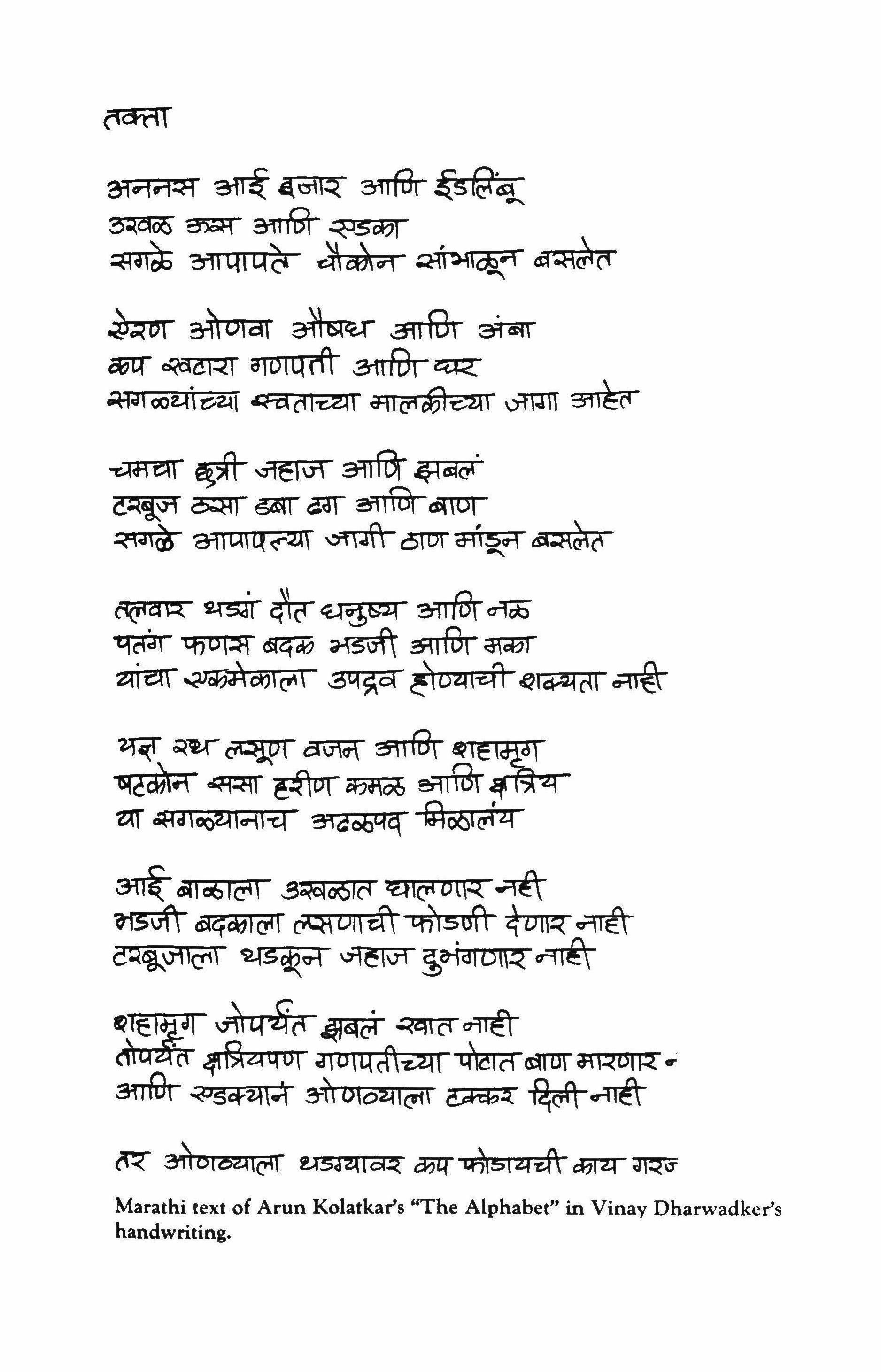
Marathi text of Arun Kolatkar's "The Alphabet" in Vinay Dharwadker's handwriting.
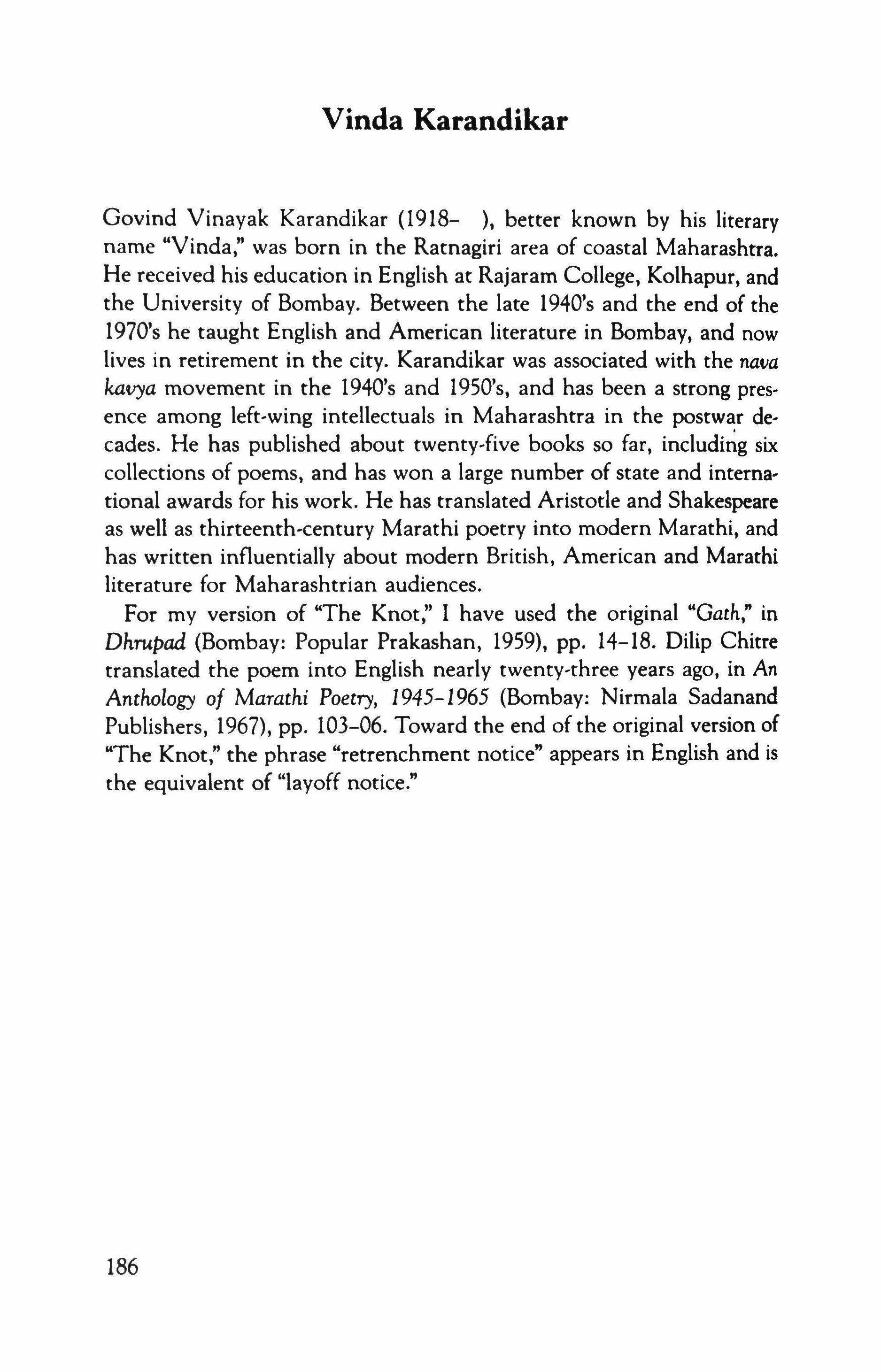
Vinda Karandikar
Govind Vinayak Karandikar (1918- ), better known by his literary name "Vinda," was born in the Ratnagiri area of coastal Maharashtra. He received his education in English at Rajaram College, Kolhapur, and the University of Bombay. Between the late 1940's and the end of the 1970'5 he taught English and American literature in Bombay, and now lives in retirement in the city. Karandikar was associated with the natJa kavya movement in the 1940's and 1950's, and has been a strong presence among left-wing intellectuals in Maharashtra in the postwar decades. He has published about twenty-five books so far, including six collections of poems, and has won a large number of state and international awards for his work. He has translated Aristotle and Shakespeare as well as thirteenth-century Marathi poetry into modern Marathi, and has written influentially about modern British, American and Marathi literature for Maharashtrian audiences.
For my version of "The Knot:' I have used the original "Gath," in Dhrupad (Bombay: Popular Prakashan, 1959), pp. 14-18. Dilip Chitre translated the poem into English nearly twenty-three years ago, in An Anthology of Marathi Poetry, 1945-1965 (Bombay: Nirmala Sadanand Publishers, 1967), pp. 103-06. Toward the end of the original version of "The Knot," the phrase "retrenchment notice" appears in English and is the equivalent of "layoff notice."
186
The Knot
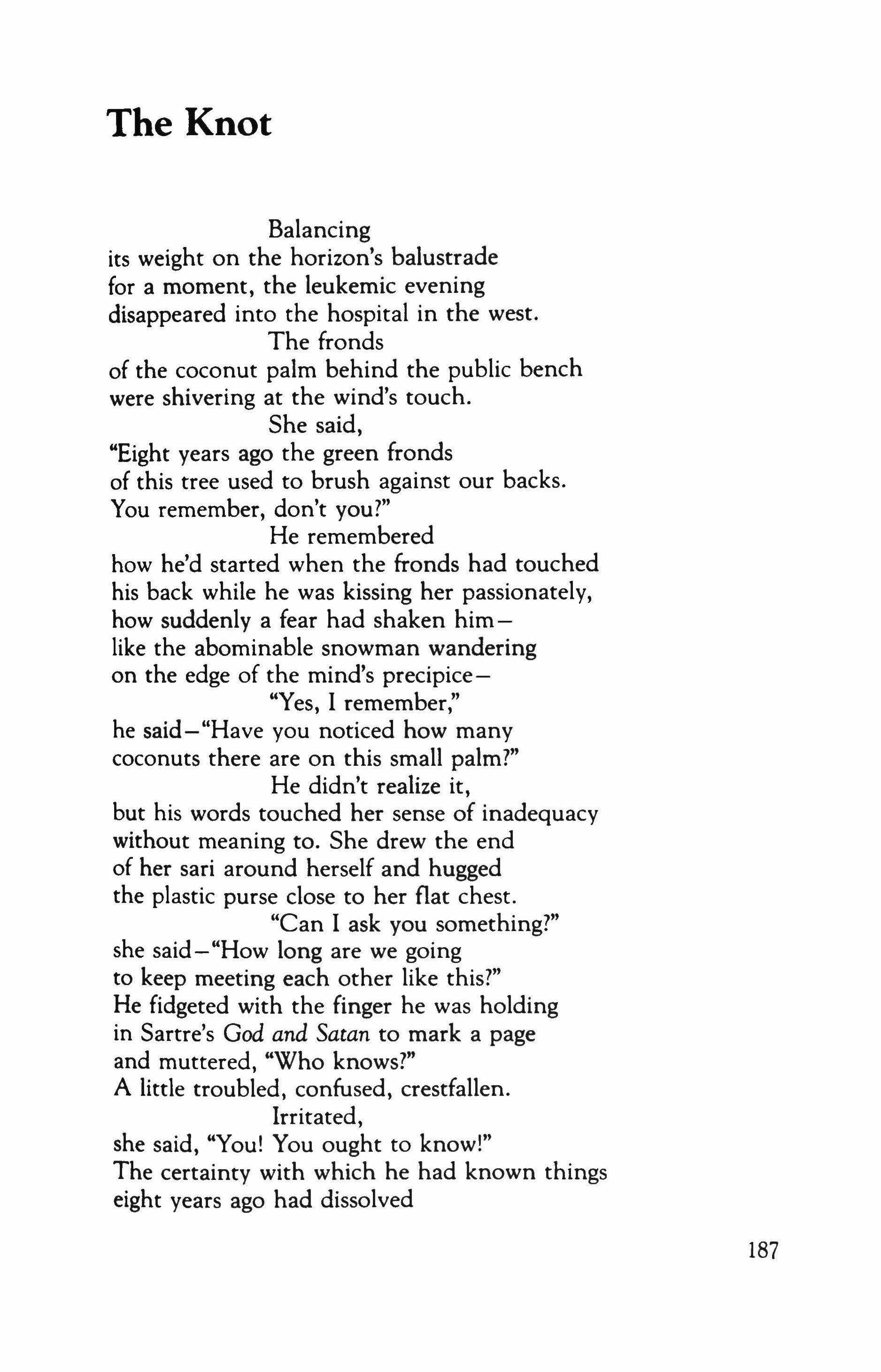
Balancing
its weight on the horizon's balustrade for a moment, the leukemic evening disappeared into the hospital in the west.
The fronds of the coconut palm behind the public bench were shivering at the wind's touch.
She said, "Eight years ago the green fronds of this tree used to brush against our backs. You remember, don't you?"
He remembered how he'd started when the fronds had touched his back while he was kissing her passionately, how suddenly a fear had shaken himlike the abominable snowman wandering on the edge of the mind's precipice-
"Yes, I remember," he said-"Have you noticed how many coconuts there are on this small palm?"
He didn't realize it, but his words touched her sense of inadequacy without meaning to. She drew the end of her sari around herself and hugged the plastic purse close to her flat chest.
"Can I ask you something?" she said - "How long are we going to keep meeting each other like this?"
He fidgeted with the finger he was holding in Sartre's God and Satan to mark a page and muttered, "Who knows?"
A little troubled, confused, crestfallen. Irritated, she said, "You! You ought to know!"
The certainty with which he had known things eight years ago had dissolved
187

in the cesspool of his circumstances. He remembered the great critique of the War he'd composed; the expectations he'd built up; the castles he'd built on the future's mist - now all crumbling. A parade celebrating the fourth anniversary of the end of the War was passing down the street in front of them, cheering the reign of peace in its voice of steel.
Just then he was struck by an earlier memoryanother girl-another ruptured momentthose days, premature, twisted out of shape, running around in circles round the fire. Their endless wealth of anguish, now lost. "No! Impossible!" he said to himself, laughing at his own dead self.
"I couldn't have done it! But if I hadif I had - if only I were man enough!"
He muttered, "Whaes bound to happen, happens:' The late April sun had beaded the two furrows on his brow with sweat.
"You know,"
she said, "you ought to know:' in a provocative tone. (In other words, a tone of voice shed learnt by heart while going around with Eknath Samant. - If Eknath hadn't won himself a permanent commission-then maybebut why-the lousy bastard!)
"You know,"
she said, "you know. It seems you've forgotten'When the War has ended: you'd said:' "Yes, I'd said it. When my health has improved a little, when my life has become stable."
Playing with her buttons, she pretended that she wasn't angry, and muttered something inaudible. She was really very tired; very weary; that's why it wasn't going to do her any good
188
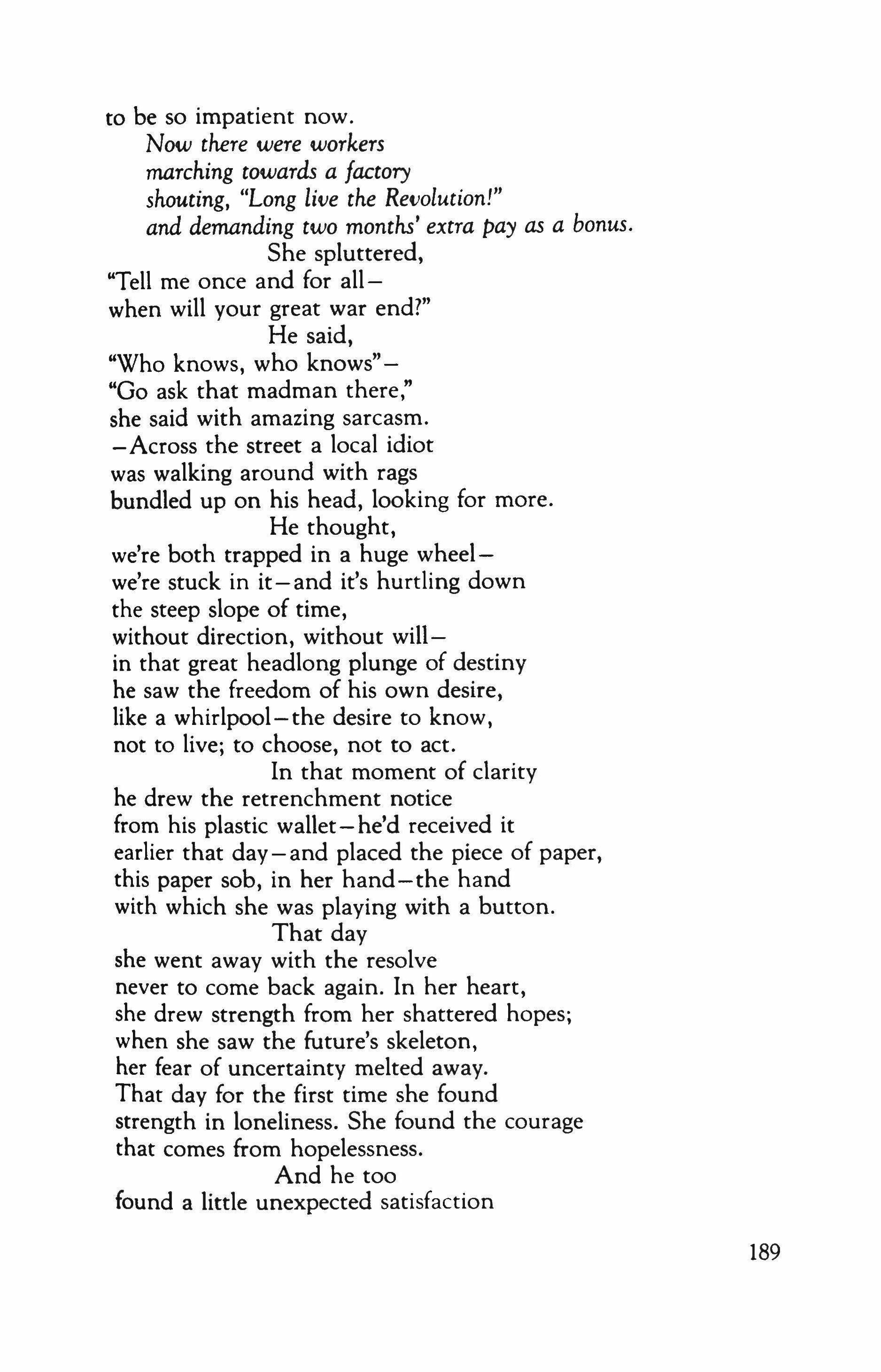
to be so impatient now.
Now there were workers marching towards a factory shouting, "Long live the RetlOlution!" and demanding two months' extra pay as a bonus.
She spluttered, "Tell me once and for allwhen will your great war end?"
He said, "Who knows, who knows""Go ask that madman there," she said with amazing sarcasm. - Across the street a local idiot was walking around with rags bundled up on his head, looking for more.
He thought, we're both trapped in a huge wheelwe're stuck in it-and it's hurtling down the steep slope of time, without direction, without willin that great headlong plunge of destiny he saw the freedom of his own desire, like a whirlpool- the desire to know, not to live; to choose, not to act.
In that moment of clarity he drew the retrenchment notice from his plastic wallet - he'd received it earlier that day-and placed the piece of paper, this paper sob, in her hand-the hand with which she was playing with a button.
That day she went away with the resolve never to come back again. In her heart, she drew strength from her shattered hopes; when she saw the future's skeleton, her fear of uncertainty melted away. That day for the first time she found strength in loneliness. She found the courage that comes from hopelessness. And he too found a little unexpected satisfaction
189
when she turned her back to himfor the first time in eight years he saw in her braided hair the knot of a braid of artificial hair.
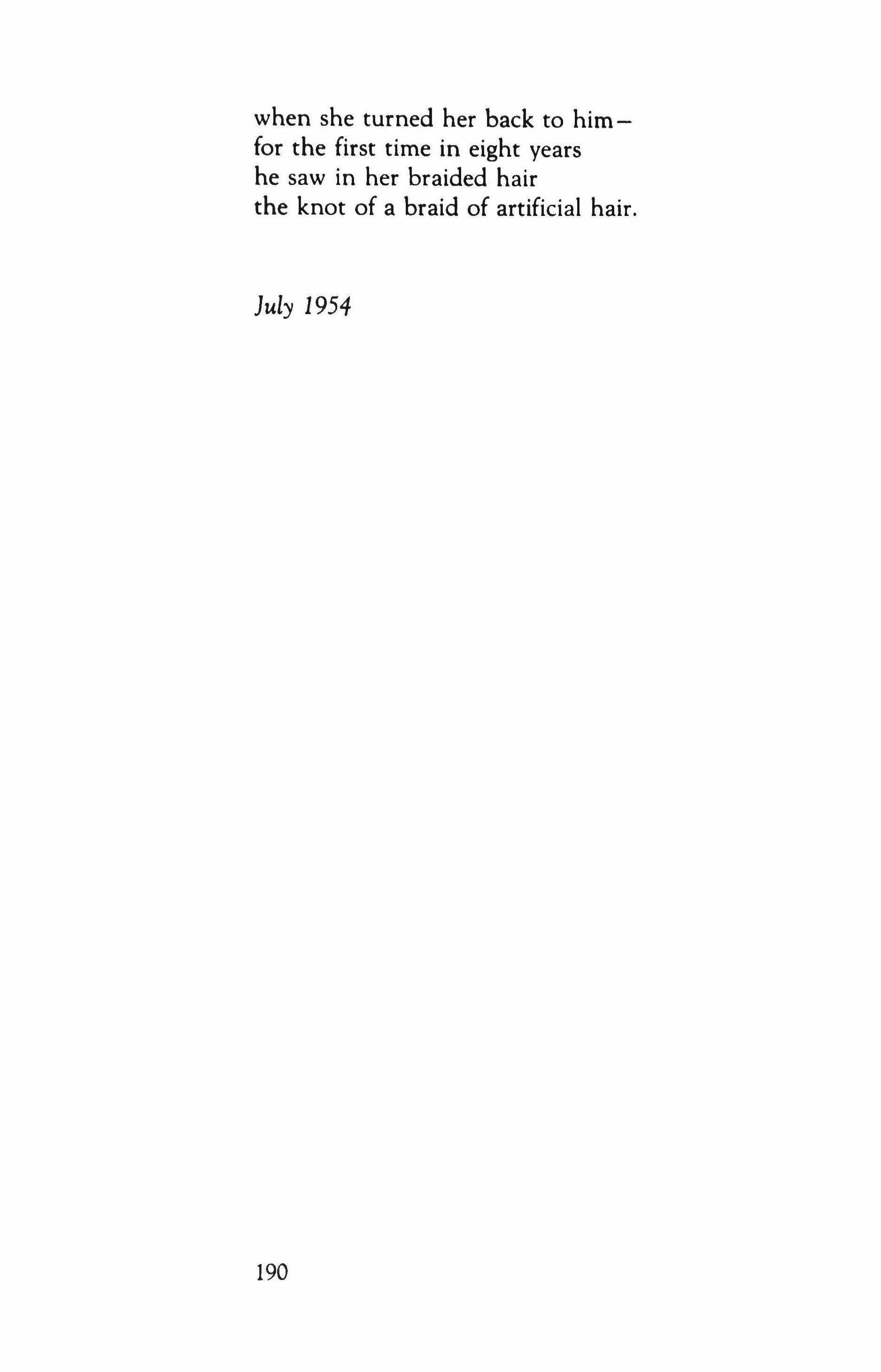
July 1954
190

P. s. Rege
Purushottam Shivram Rege (1910-78), who was also born in the Ramagiri district in the Konkan, studied economics in Bombay and London in the 1930's and returned to India to pursue an academic career in that discipline. He taught for over three decades at Elphinstone College, Bombay, and retired as its principal in the 1970's. Many readers regard him as the finest twentieth-century poet in Marathi. His work includes eight books of poems, two collections of short fiction, three novels and two volumes of criticism and essays. Together with B. S. Mardhekar and older writers like A. R. Deshpande ("Anil") he helped create the movement in Marathi called nava kavya.
The first two poems I have rendered are "Arsa kasa sagala ulta pahato" and "Tu alis tevha," in Rege, Dusara pakshi (Bombay: Mauj Prakashan, 1966), pp. 19,41-43; "Poem at Midnight" and "The Visit" are versions of two of the love poems in Priyala (Bombay, 1972).
191
See how the mirror sees everything the other way round, draws each object here into a perspective of its own, mixes up left and right without our knowing it, but then sets down everything before it sensibly again
in one rectangular frame. Its directions are different, its edges impartial, its textures finespun at close range, its patterns of light and shadow just as they are, the faces it makes, mute, apt - behind the opaque wall of our first incomprehensible encounter with it. There we suddenly find the faces we don't possess, their rage, greed, conflict, self-preservationand a trembling of lost colors, every now and then.
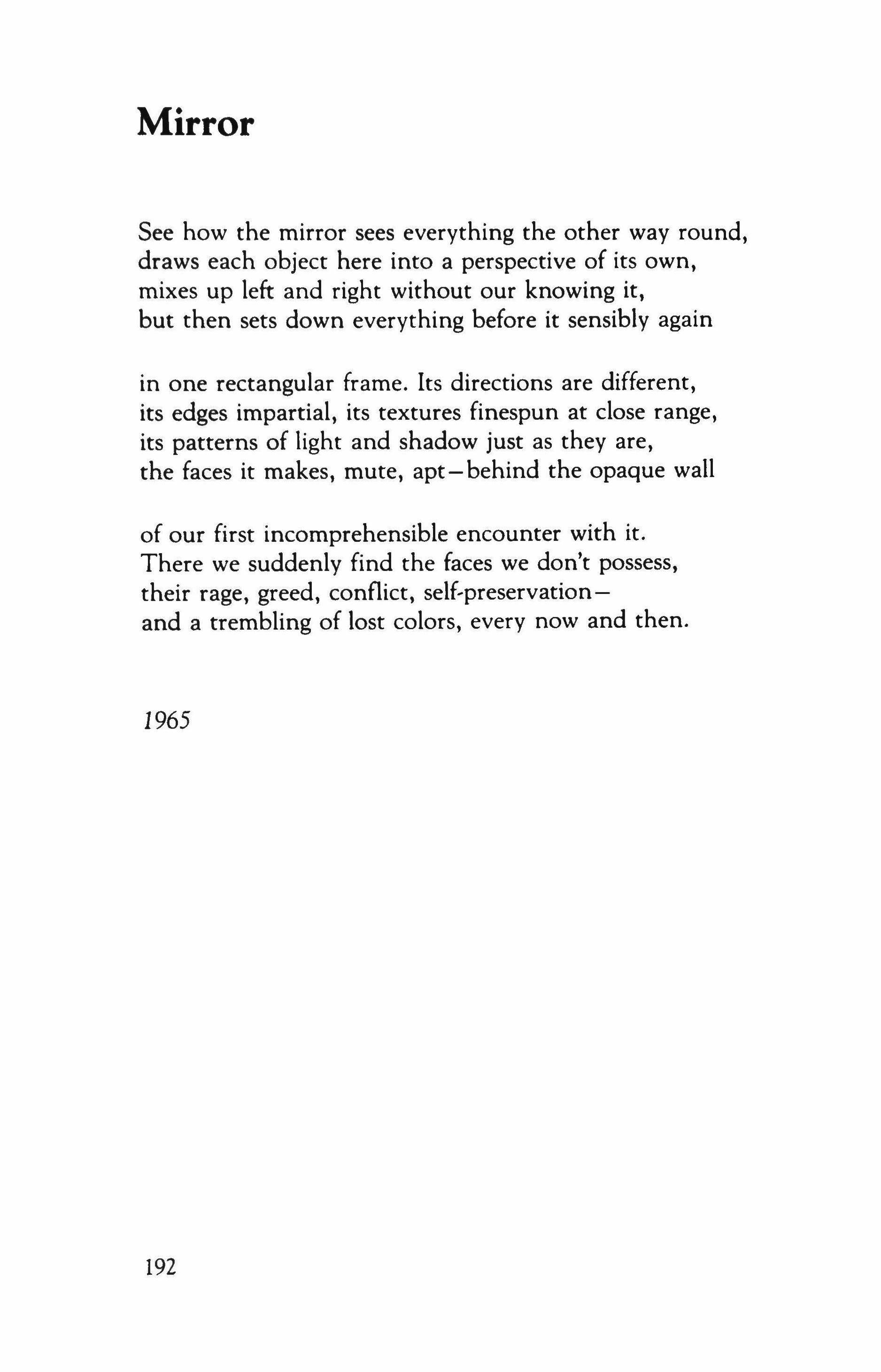
1965
Mirror
192
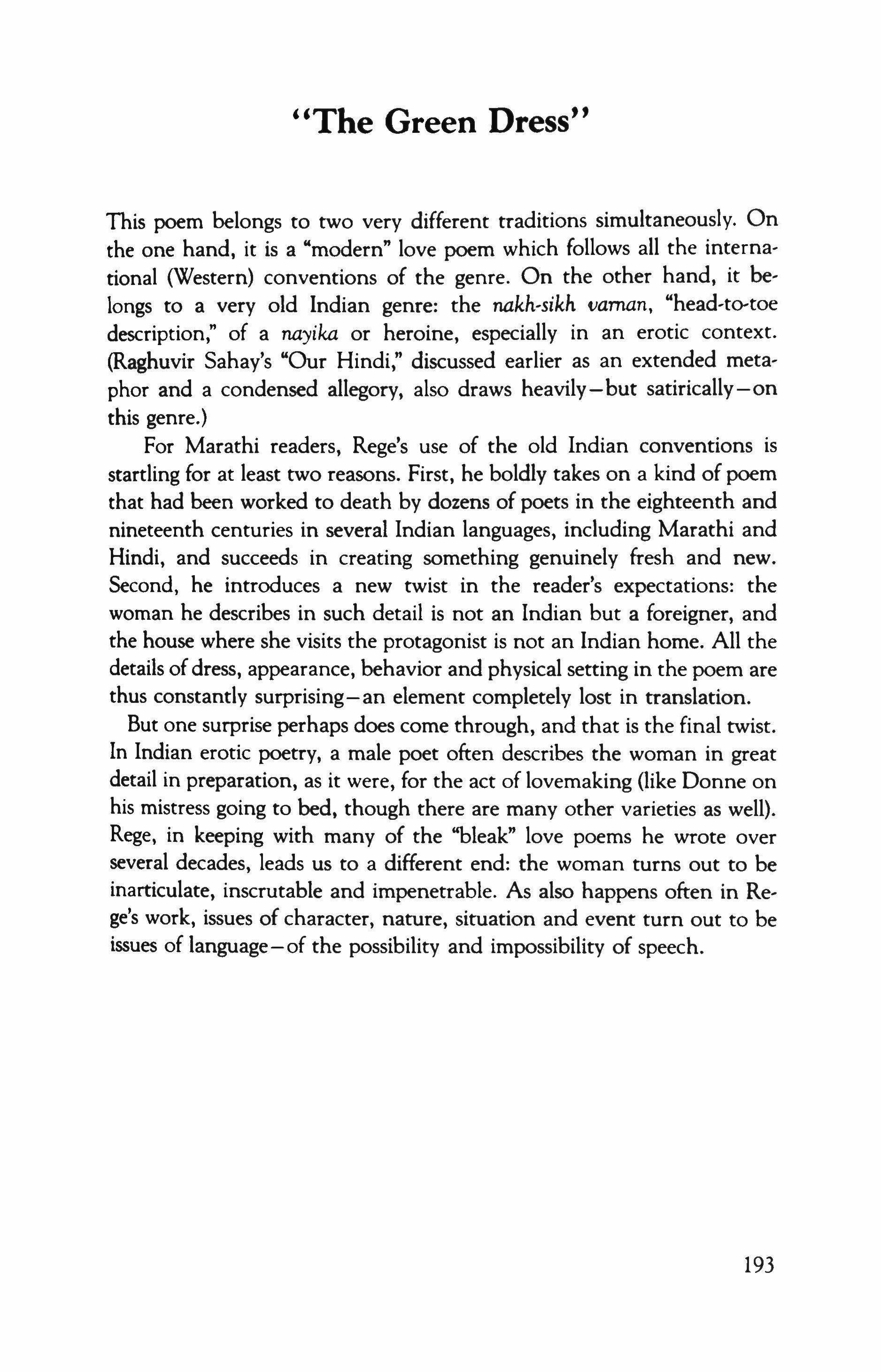
"The Green Dress"
This poem belongs to two very different traditions simultaneously. On the one hand, it is a "modern" love poem which follows all the international (Western) conventions of the genre. On the other hand, it belongs to a very old Indian genre: the nakh-sikh tlarnan, "head-to-toe description," of a nayika or heroine, especially in an erotic context. (Raghuvir Sahay's "Our Hindi," discussed earlier as an extended metaphor and a condensed allegory, also draws heavily-but satirically-on this genre.)
For Marathi readers, Rege's use of the old Indian conventions is startling for at least two reasons. First, he boldly takes on a kind of poem that had been worked to death by dozens of poets in the eighteenth and nineteenth centuries in several Indian languages, including Marathi and Hindi, and succeeds in creating something genuinely fresh and new. Second, he introduces a new twist in the reader's expectations: the woman he describes in such detail is not an Indian but a foreigner, and the house where she visits the protagonist is not an Indian horne. All the details ofdress, appearance, behavior and physical setting in the poem are thus constantly surprising-an element completely lost in translation. But one surprise perhaps does come through, and that is the final twist. In Indian erotic poetry, a male poet often describes the woman in great detail in preparation, as it were, for the act of lovemaking (like Donne on his mistress going to bed, though there are many other varieties as well). Rege, in keeping with many of the "bleak" love poems he wrote over several decades, leads us to a different end: the woman turns out to be inarticulate, inscrutable and impenetrable. As also happens often in Rege's work, issues of character, nature, situation and event turn out to be issues of language - of the possibility and impossibility of speech.
193
The Green Dress

What did you have when you came to me? What did you have the very first time?
When the housemaid came in and told me you were here, I came out of my room and saw you from the landing, standing at the bottom of the stairsat that moment what did you have? What was in your hands? Had you set foot on the stairs? (You hadn't set foot on the stairs, you did so a moment later when I said come and you didn't hesitate.)
Your thick beret was like the one in the picture you'd given me, it was the first thing I saw from the top of the stairs; the small pompom on it became the tip of the cone in which the whole scene spiraled up towards me. Your coat, blackyou didn't take it off in a hurry; the edge of white lace at the neck of your green dress; the gloves you had taken off when you came in and were holding in your right handwas this all you had at that moment?
Calmly you climbed the fourteen steps (seven yours, seven mine-two septets) up to my room with its three large frosted windows, a desk interrupted in the middle of work, a straight-backed chair near it, and a small armchair with blue cushions, an unlit fireplace, a closet along one wall, and my single bed against the other.
194
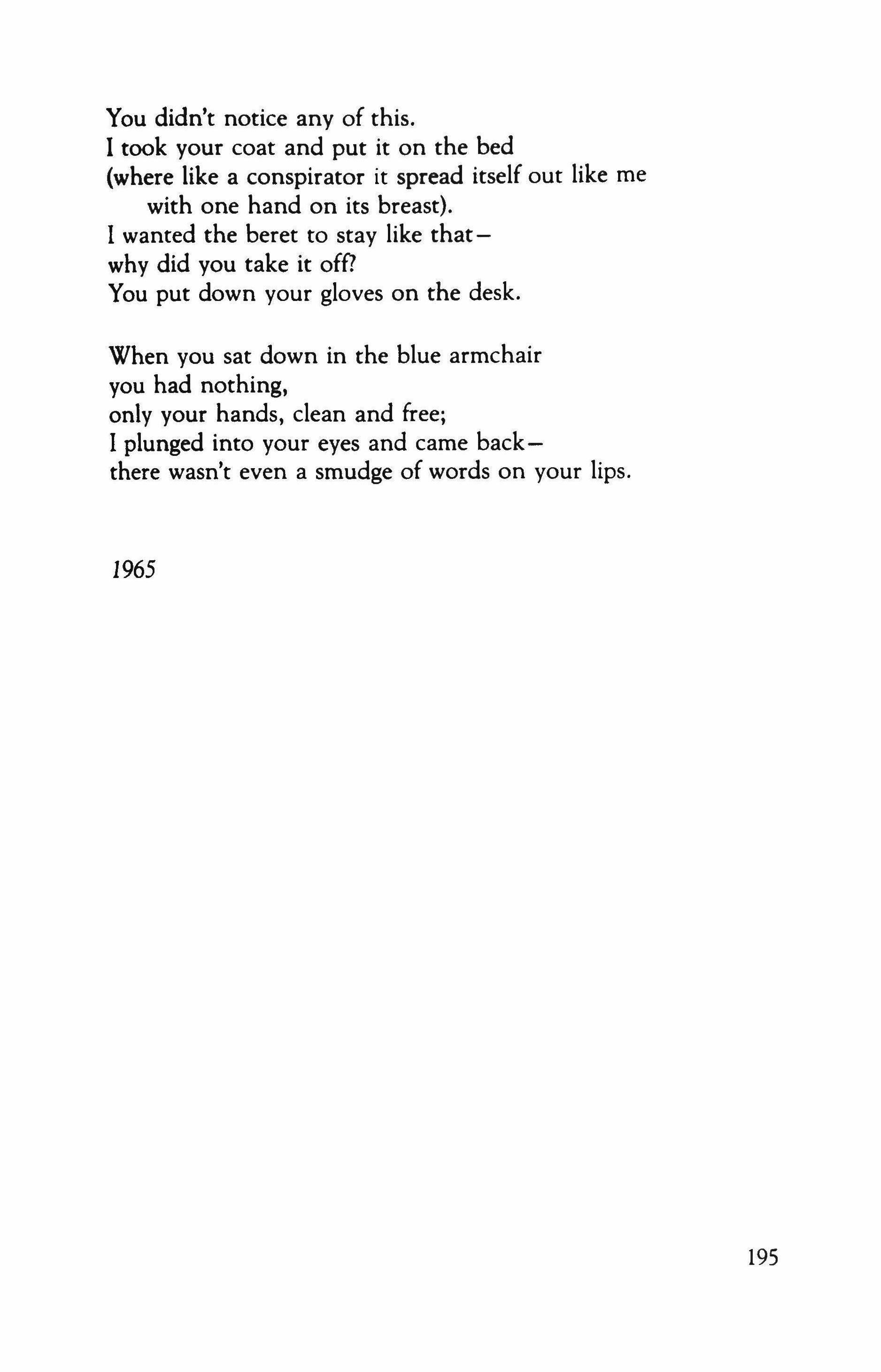
You didn't notice any of this. I took your coat and put it on the bed (where like a conspirator it spread itself out like me with one hand on its breast).
1 wanted the beret to stay like thatwhy did you take it off? You put down your gloves on the desk.
When you sat down in the blue armchair you had nothing, only your hands, clean and free; 1 plunged into your eyes and came backthere wasn't even a smudge of words on your lips. 1965
195
Poem at Midnight
There were two conditions to the pactthere were two conditions to the pact she and I made.
First: She could break it at any time. Second: I could never break it. We took our vows with the echo in the hills as our witness, made a bed of the wind, and drew the sheet of the stars over ourselvesand there was more, much more. But so far she hasn't kept her side of the bargain. What should I do now with the second condition? Is a pact merely a pact?
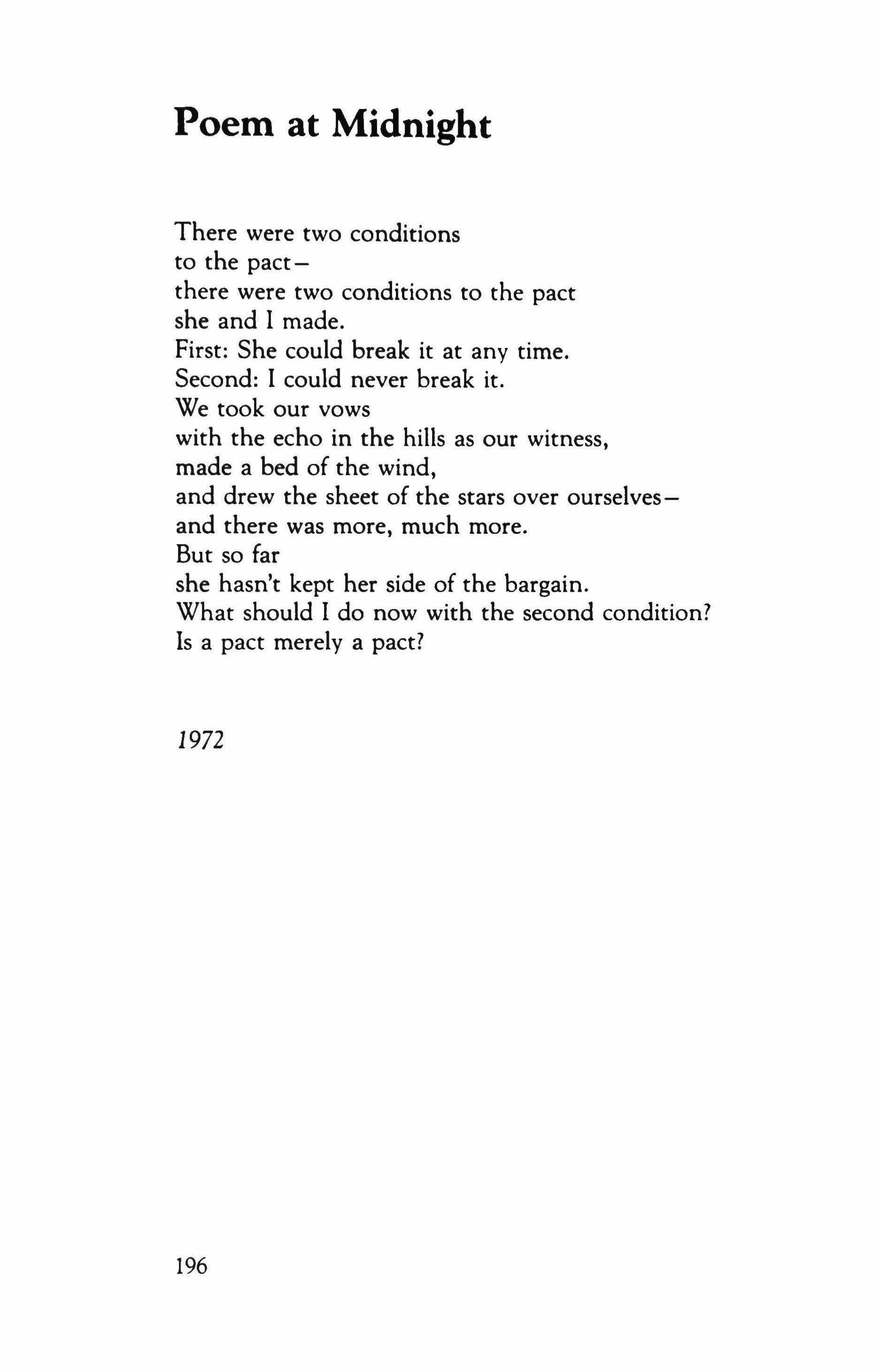
1972
196
The Visit
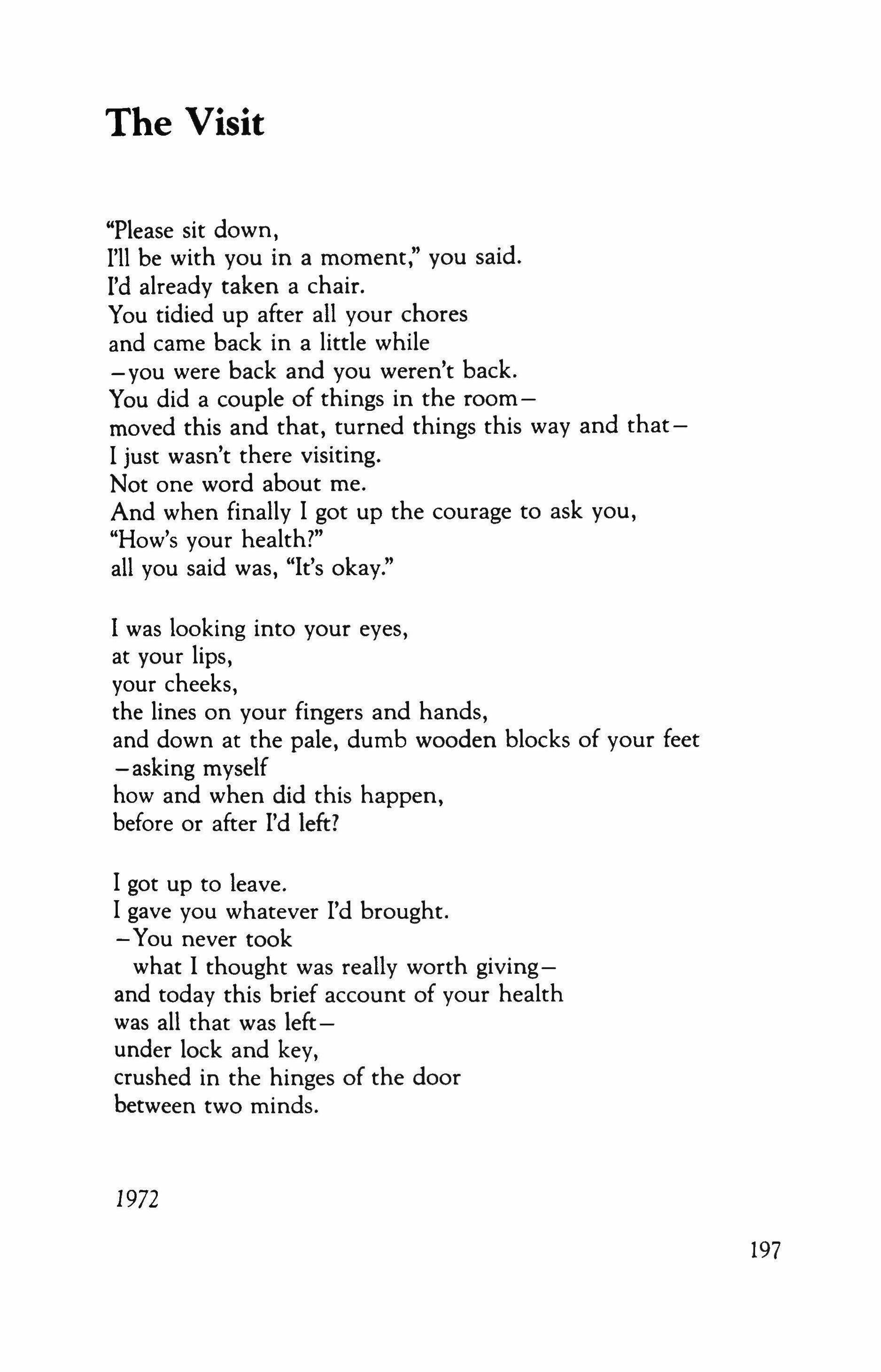
"Please sit down, I'll be with you in a moment:' you said. I'd already taken a chair. You tidied up after all your chores and came back in a little whileyou were back and you weren't back. You did a couple of things in the roommoved this and that, turned things this way and thatI just wasn't there visiting. Not one word about me. And when finally I got up the courage to ask you, "How's your health?" all you said was, "It's okay."
I was looking into your eyes, at your lips, your cheeks, the lines on your fingers and hands, and down at the pale, dumb wooden blocks of your feet - asking myself how and when did this happen, before or after I'd left?
I got up to leave. I gave you whatever I'd brought. - You never took what I thought was really worth givingand today this brief account of your health was all that was leftunder lock and key, crushed in the hinges of the door between two minds. 1972
197

B. S. Mardhekar
Bal Sitaram Mardhekar (1909-56) was educated in Bombay and at King's College, London. After an unsuccessful attempt at the Indian Civil Service examination in England, he returned to teach English in Maharashtra for several years in the 1930's. Subsequently, he joined AllIndia Radio, Bombay, as a producer, a position he held until his untimely death at the age of forty-seven. Since his death, most discussions of modern Mararhi poetry have begun with his work, and many readers still regard him as the greatest modern poet in the language. Although Mardhekar wrote poetry, criticism, novelistic fiction and drama, he has proved to be most influential as a poet and a critic. For a writer of his stature, his output is surprisingly small: his collected poems fill barely 125 pages in print. But then thousands of Maharashtrians still know his poems by heart.
The Marathi texts I have rendered here are ."Pimpat mele olya undiT" and "Ban bambuche pit/alya gate," in Mardhekaranchi kat/ita (Bombay: Mauj Prakashan, 1959; reprinted, 1982), pp. 41,74. Dilip Chitre's translations of these poems appear in his An Anthology of Marathi Poetry, 1945-1965 (Bombay: Nirmala Sadanand Publishers, 1967), pp. 55-56, 65-66.
198
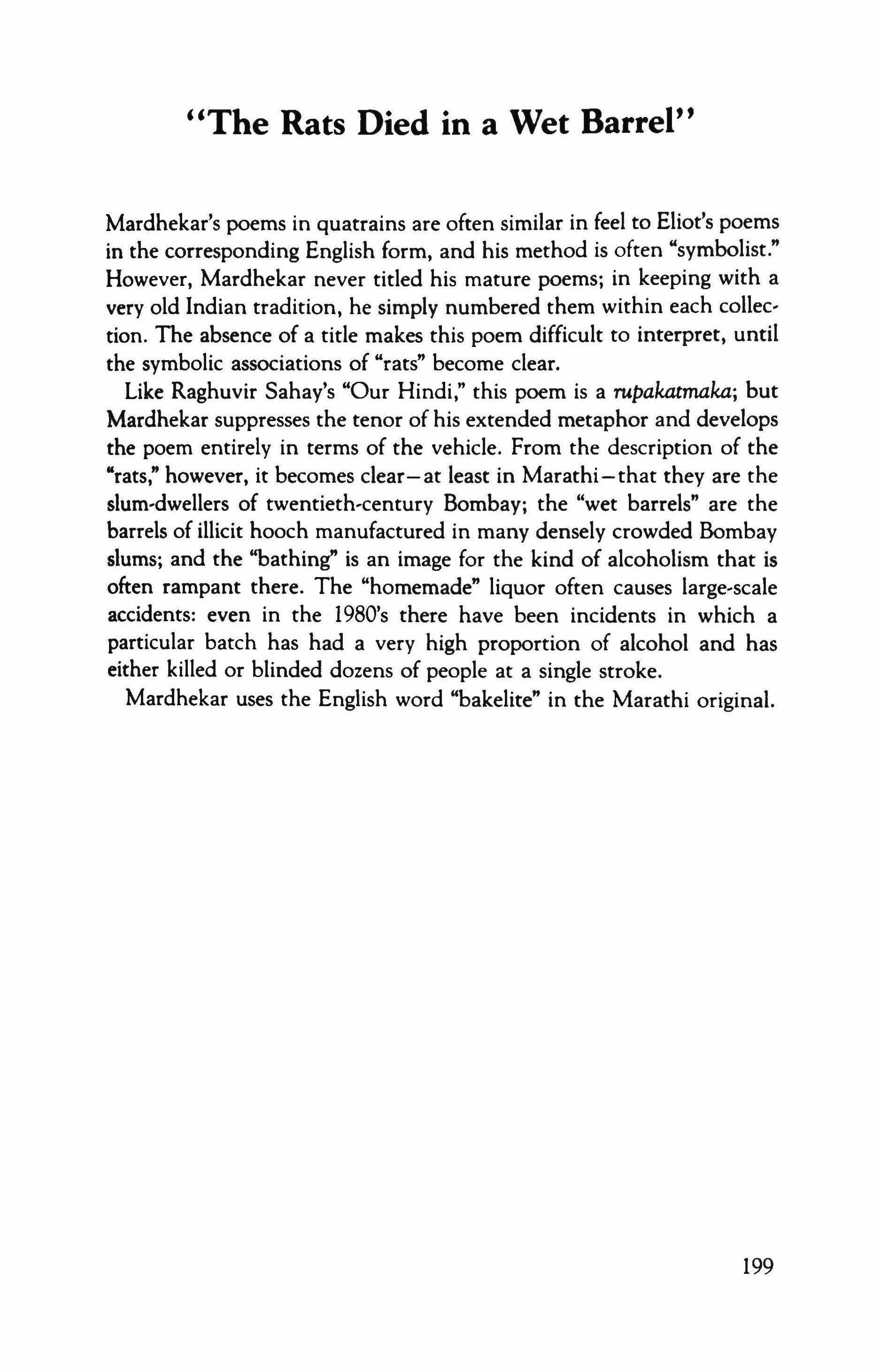
"The Rats Died in a Wet Barrel"
Mardhekar's poems in quatrains are often similar in feel to Eliot's poems in the corresponding English form, and his method is often "symbolist." However, Mardhekar never titled his mature poems; in keeping with a very old Indian tradition, he simply numbered them within each collection. The absence of a title makes this poem difficult to interpret, until the symbolic associations of "rats" become clear.
Like Raghuvir Sahay's "Our Hindi," this poem is a rupakatmaka; but Mardhekar suppresses the tenor of his extended metaphor and develops the poem entirely in terms of the vehicle. From the description of the "rats," however, it becomes clear-at least in Mararhi=that they are the slum-dwellers of twentieth-century Bombay; the "wet barrels" are the barrels of illicit hooch manufactured in many densely crowded Bombay slums; and the "bathing" is an image for the kind of alcoholism that is often rampant there. The "homemade" liquor often causes large-scale accidents: even in the 1980's there have been incidents in which a particular batch has had a very high proportion of alcohol and has either killed or blinded dozens of people at a single stroke.
Mardhekar uses the English word "bakelite" in the Marathi original.
199
The Rats Died in a Wet Barrel

The rats died in a wet barrel. Their heads rolled, though no one had wrung their necks. Their mouths touched each other's mouths, but their heads fell back, without desire.
The poor wretches lived in rat-holes and died hiccuping in the barrel; the day spilled out of their ash-gray eyes, and their limbs and crotches were washed clean.
Living has its compulsions; dying has its compulsions too.
Their unhappiness has venomous eyes, dead eyes that are made of glass; and the hives of flies swarming at their mouths are made of bakelite, of bakelite!
Their mouths were pressed to each other's mouths as they bathed and bathed in the barrel.
1947
200
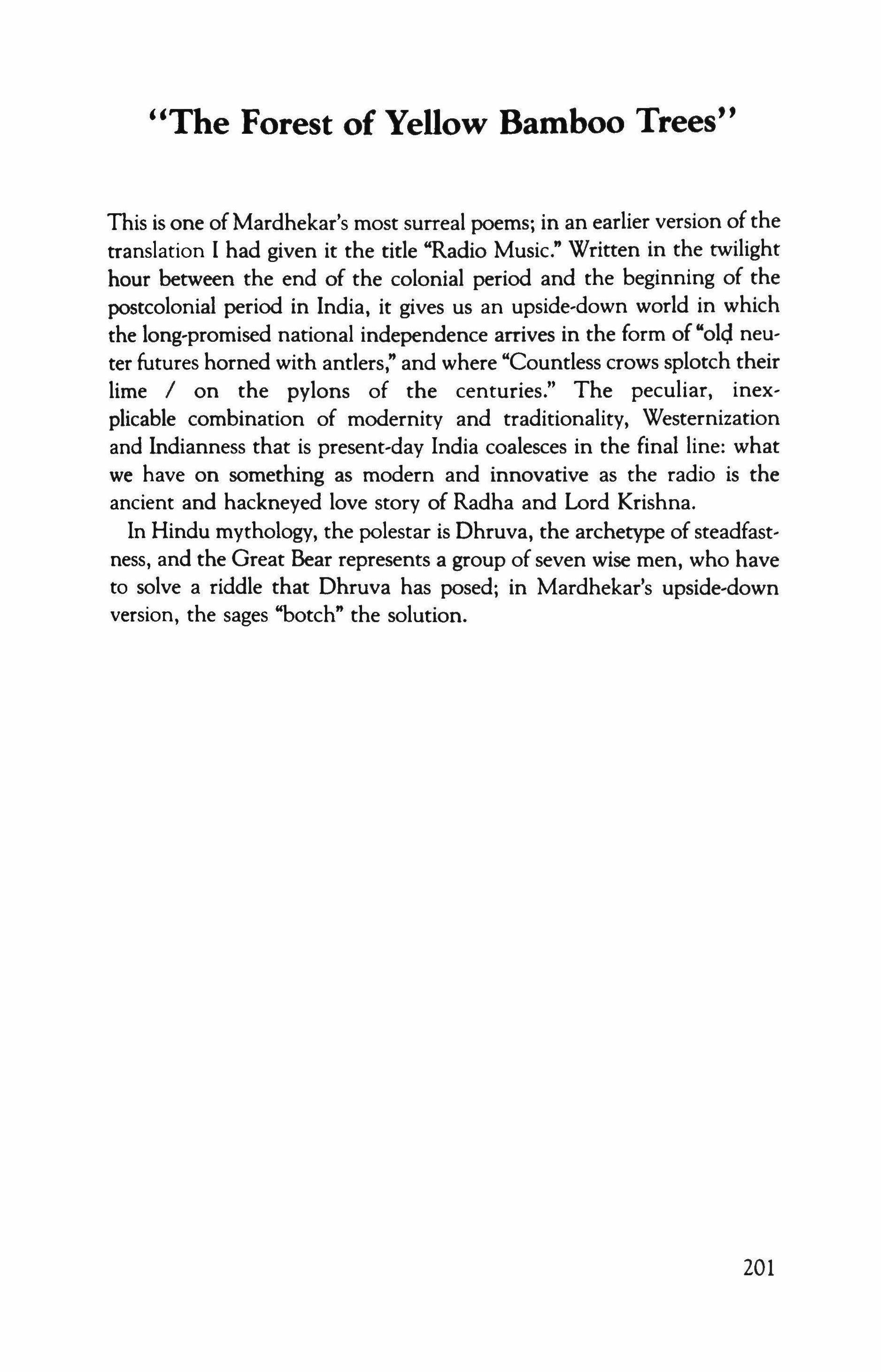
"The Forest of Yellow Bamboo Trees"
This is one ofMardhekar's most surreal poems; in an earlier version of the translation I had given it the title "Radio Music." Written in the twilight hour between the end of the colonial period and the beginning of the postcolonial period in India, it gives us an upside-down world in which the long-promised national independence arrives in the form of "014 neuter futures horned with antlers," and where "Countless crows splotch their lime / on the pylons of the centuries." The peculiar, inexplicable combination of modernity and traditionality, Westernization and Indianness that is present-day India coalesces in the final line: what we have on something as modern and innovative as the radio is the ancient and hackneyed love story of Radha and Lord Krishna. In Hindu mythology, the polestar is Dhruva, the archetype of steadfast, ness, and the Great Bear represents a group of seven wise men, who have to solve a riddle that Dhruva has posed; in Mardhekar's upside-down version, the sages "botch" the solution.
201
The Forest of Yellow Bamboo Trees
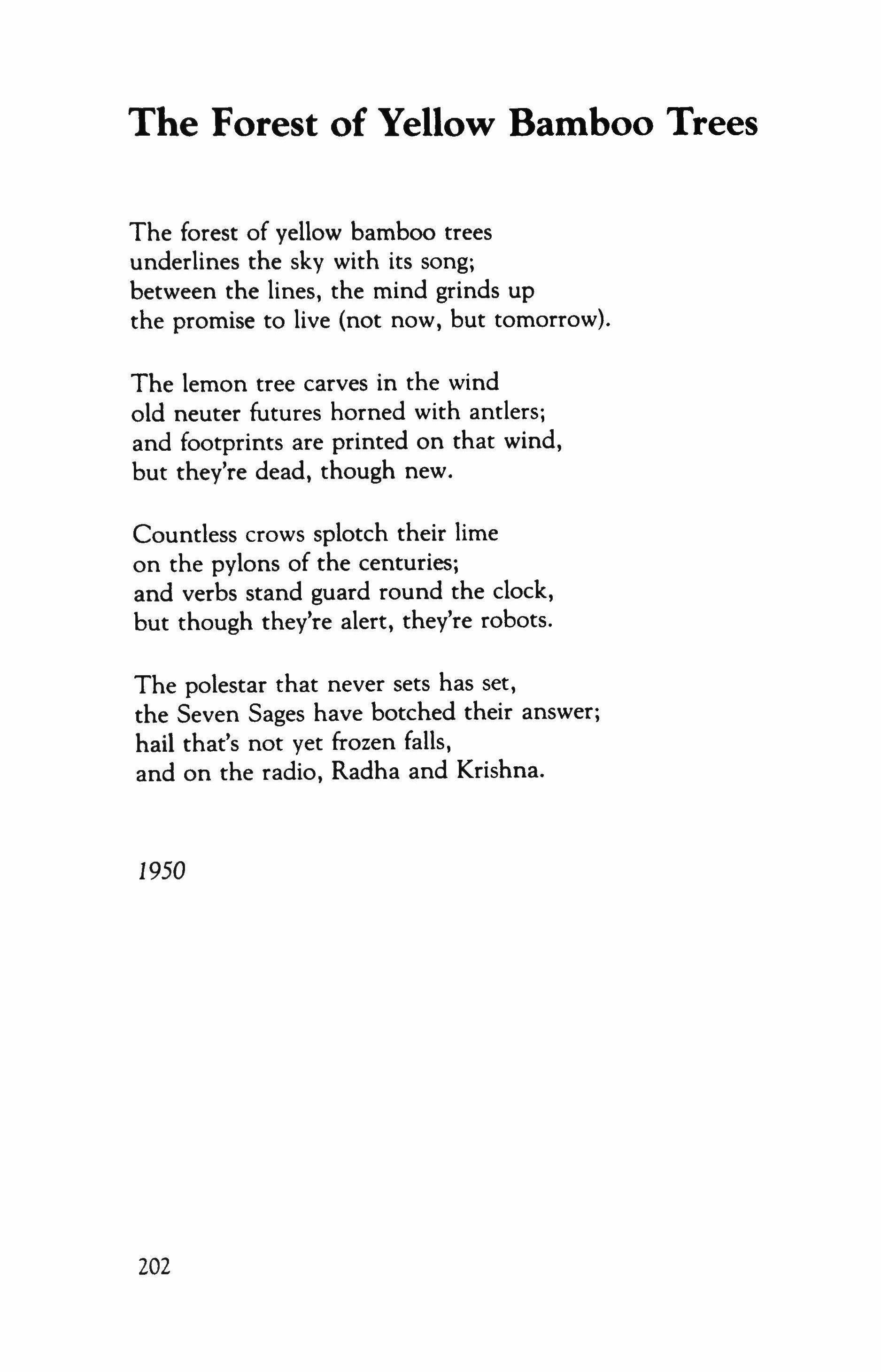
The forest of yellow bamboo trees underlines the sky with its song; between the lines, the mind grinds up the promise to live (not now, but tomorrow).
The lemon tree carves in the wind old neuter futures horned with antlers; and footprints are printed on that wind, but they're dead, though new.
Countless crows splotch their lime on the pylons of the centuries; and verbs stand guard round the clock, but though they're alert, they're robots.
The polestar that never sets has set, the Seven Sages have botched their answer; hail that's not yet frozen falls, and on the radio, Radha and Krishna. 1950
202

Narayan Surve
Narayan Surve (1926- ) has long been associated with the movement of protest poetry that emerged in Marathi in the early 1960's. He was born in utter poverty, orphaned soon after birth, and grew up on the sidewalks of Bombay, supporting himself as a child and as an adolescent by doing odd jobs and manual labor. He taught himself to read and write at a late age and published his first poems around 1960. Since the mid-1960's, Surve has often been praised and championed as a "truly proletarian" poet, in India as well as in Soviet Russia and various Eastern Bloc countries. Surve's output is relatively small and uneven by the international standards of "literature," but his best poems have a starkness, memorability and originality that one misses in many sophisticated, highly skilled writers.
The original Marathi poem I have translated here is "Betun dilele ayushya," in Surve, Majhe tlidyapith (Bombay: Popular Prakashan, 1966), p.44.
203

"Lifetime' ,
Since Surve was orphaned at birth or soon afterwards, in the Hindu caste system he is "casteless"; those without caste are placed along with the untouchables at the bottom of the hierarchy. Surve therefore counts himself among the lowest ofthe low- he has no choice in the matter-and speaks from this position in his personal and autobiographical poems. Here he refers to the fact that, in such a scheme of things, every aspect of his existence is "assigned" to him by the rules of caste. In the commonplace logic of the caste system, a member of a particular group in the hierarchy can "attain salvation" only by obeying the rules laid down for his or her particular situation; towards the end of the poem, this is the logic that Surve rebels against. The "four pillars" or cornerstones of the caste hierarchy are the four vamas or "color-categories": the brahmin, the kshatriya, the vaishya and the shudra. (The untouchables and the casteless are characterized as the atishudra, the extremely low.) In the Indian context, as in other cultures, spitting at someone or something is an act of extreme impertinence, insult and desecration; in the caste system, it is also associated with ritual pollution. Surve boldly completes his rejection of his inherited situation by spitting on the "sacred ground" enclosed by the four pillars.
204
Lifetime

A whole lifetime assigned to me: even the light when I was born was assigned to me; 1 said the things 1 was assigned to say. Cursing under my breath, 1 walked the street assigned to me; I came back to the room assigned to me; 1 lived the life I was assigned to live. They say we go to heaven if we follow the path assigned to us. Between the four pillars assigned to us I spit: there.
1966
20S
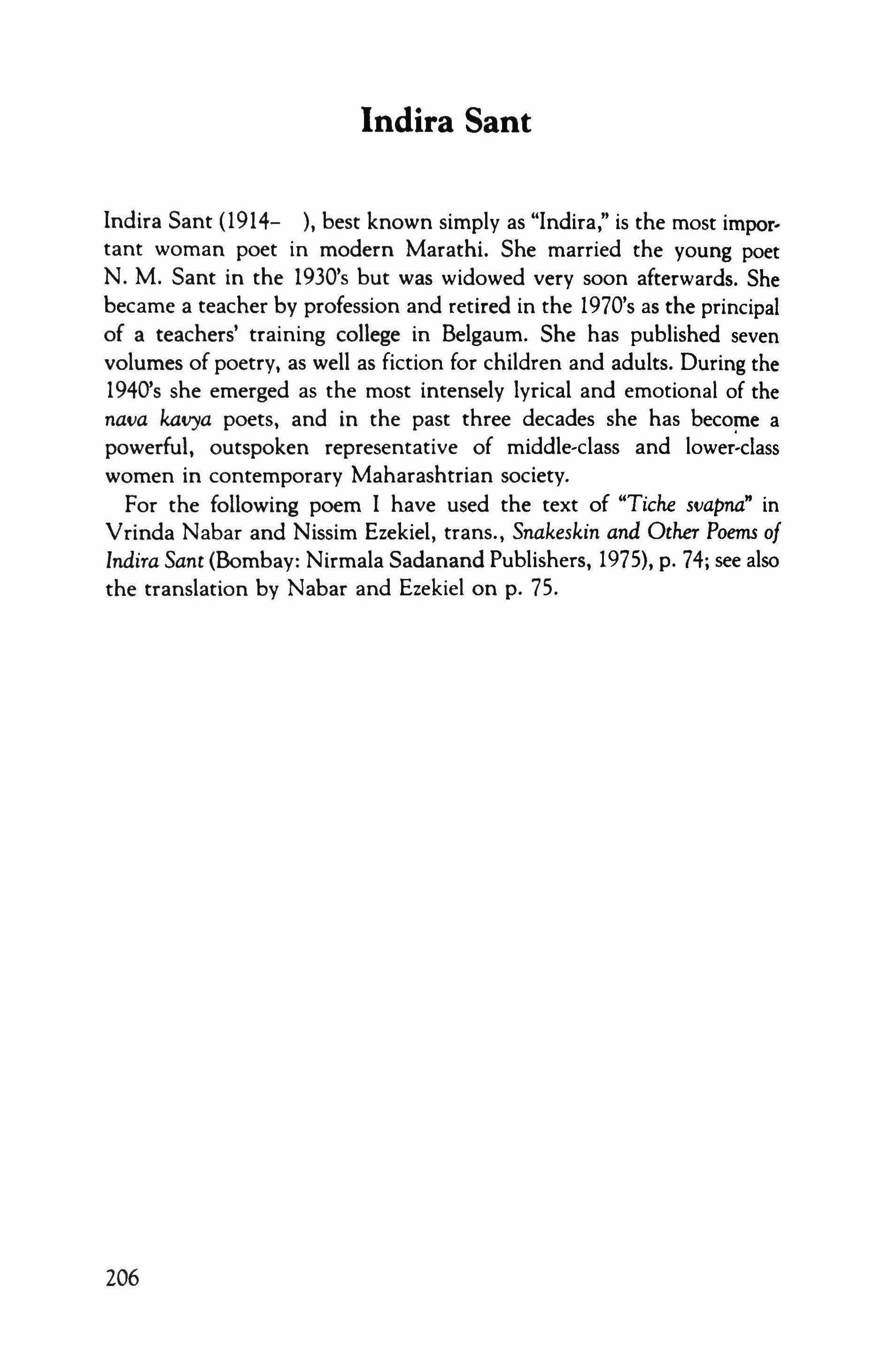
Indira Sant
Indira Sant (1914- ), best known simply as "Indira," is the most important woman poet in modern Marathi. She married the young poet N. M. Sant in the 1930's but was widowed very soon afterwards. She became a teacher by profession and retired in the 1970's as the principal of a teachers' training college in Belgaum. She has published seven volumes of poetry, as well as fiction for children and adults. During the 1940's she emerged as the most intensely lyrical and emotional of the nava kavya poets, and in the past three decades she has become a powerful, outspoken representative of middle-class and lower�class women in contemporary Maharashtrian society.
For the following poem I have used the text of "Tiche svapna" in Vrinda Nabar and Nissim Ezekiel, trans., Snakeskin and Other Poems of Indira Sam (Bornbav: Nirmala Sadanand Publishers, 1975), p. 74; see also the translation by Nabar and Ezekiel on p. 75.
206
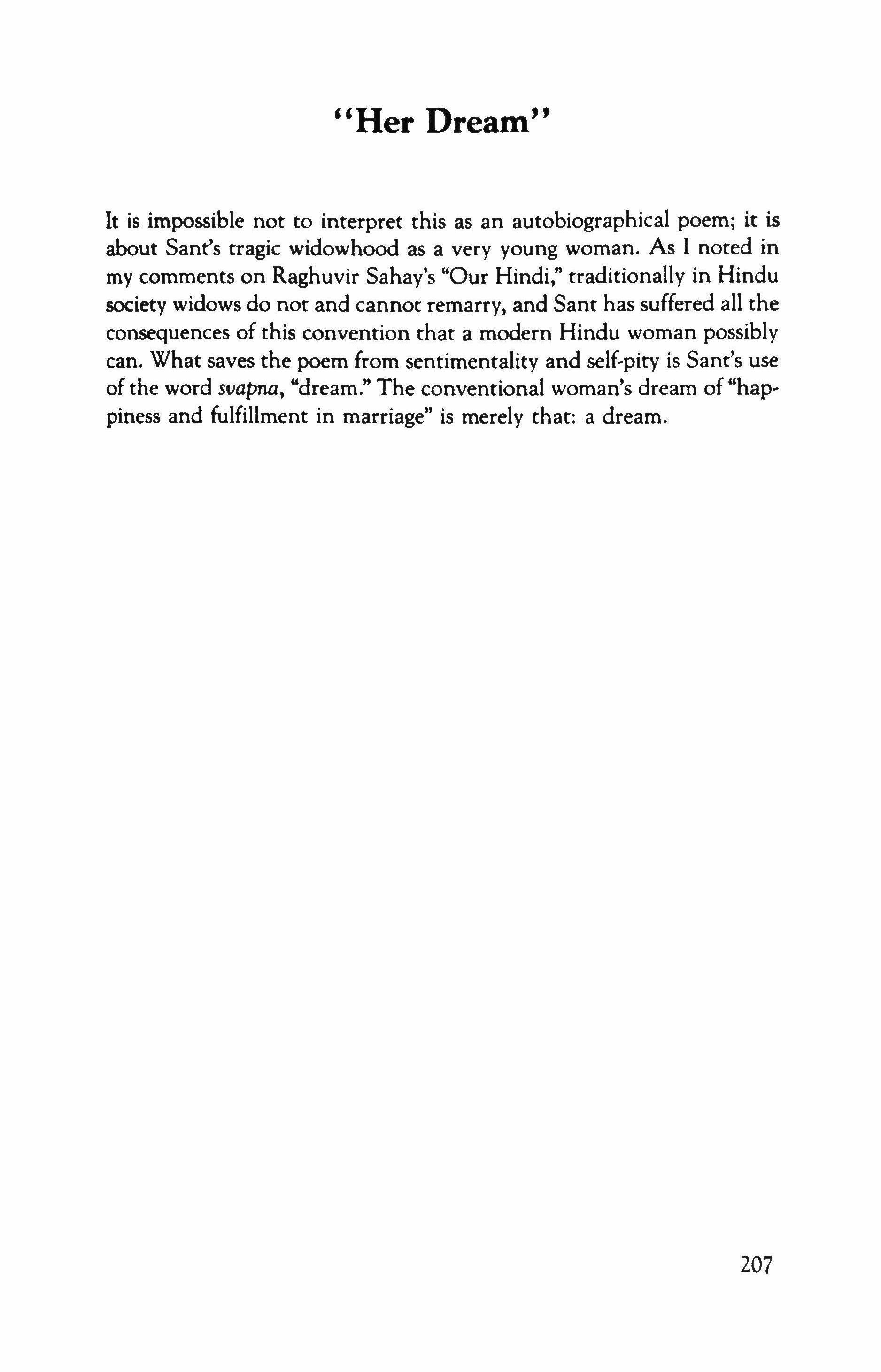
"Her Dream"
It is impossible not to interpret this as an autobiographical poem; it is about Sant's tragic widowhood as a very young woman. As I noted in my comments on Raghuvir Sahay's "Our Hindi," traditionally in Hindu society widows do not and cannot remarry, and Sant has suffered all the consequences of this convention that a modern Hindu woman possibly can. What saves the poem from sentimentality and self-pity is Sant's use of the word sC)apna, "dream." The conventional woman's dream of "happiness and fulfillment in marriage" is merely that: a dream.
207
Her Dream
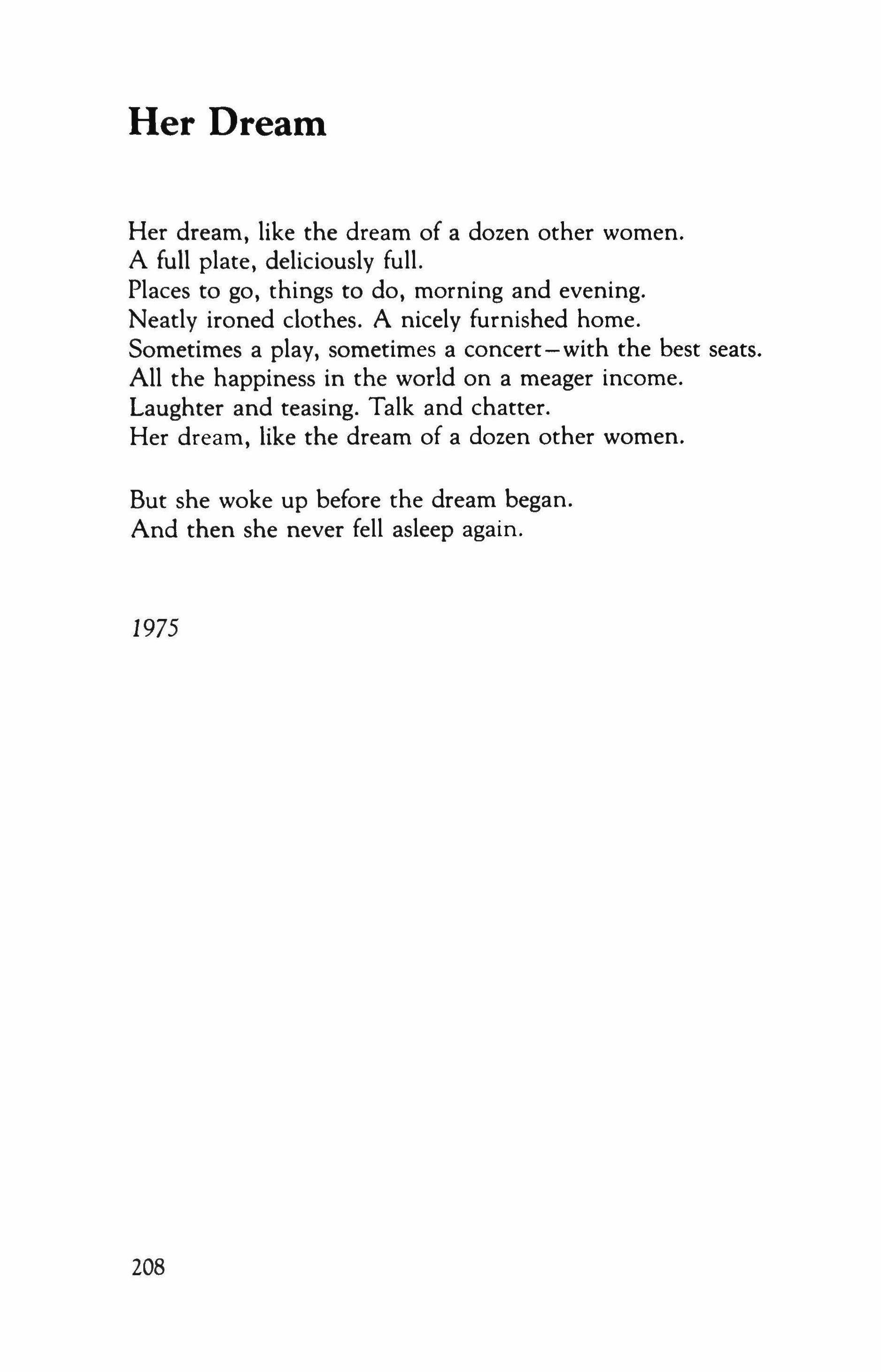
Her dream, like the dream of a dozen other women. A full plate, deliciously full.
Places to go, things to do, morning and evening. Neatly ironed clothes. A nicely furnished home. Sometimes a play, sometimes a concert-with the best seats. All the happiness in the world on a meager income. Laughter and teasing. Talk and chatter. Her dream, like the dream of a dozen other women.
But she woke up before the dream began. And then she never fell asleep again.
1975
208

Mangesh Padgaonkar
Mangesh Keshav Padgaonkar (1929- ) was the youngest of the nava kavya poets to emerge in the 1950's. He was born in Ratnagiri but has spent most of his life in Bombay, where he was educated in Marathi and Sanskrit. Since the early 1950's, he has tried a variety of professions, from tutor and school teacher to professor, broadcaster and editor. Since 1970 he has worked as an editor and translator for the United States Information Service in Bombay. Padgaonkar is a prolific and uneven poet, and has so far produced ten books of poems. He is best known as a lyric poet and a satirist, and has been very popular with Maharashtrian audiences for more than three decades now.
My versions here are based on "Pavneath" and "Salaam," in Pad, gaonkar, Salaam (Bombay: Mauj Prakashan, 1978), pp. 10, 1-4. A very different translation of the former poem appeared in the minnesota review; and slightly different versions of the latter were published in Lon, don Magazine and New England Review and Bread Loaf Quarterly.
209
Seven Forty-five in the Morning
A naked boy bathing in a sewage canal: seven years old, maybe even less. His eyes are human eyes, and yet more innocent than a bird's. Standing up again after a dip. Filthier than filth and cleaner than the Ganga. Immersed in filth, yet beyond it: because filth is, in the end, a concept in the mind.
A sewage canal that harrows the upper-class houses along its course: the foul smell blown in by the breeze, the slum of huts on its banks, the wretched men, the ugly scenes, the curses, the fights
The naked boy bathing in the drain dips and dips and grins with joy. When I pass him on the road and look at him with a civilized shudder, the time in my shock proof wristwatch is seven forty-five. In every human watch it's seven forty-five.

November 4, 1965
210
Salaam
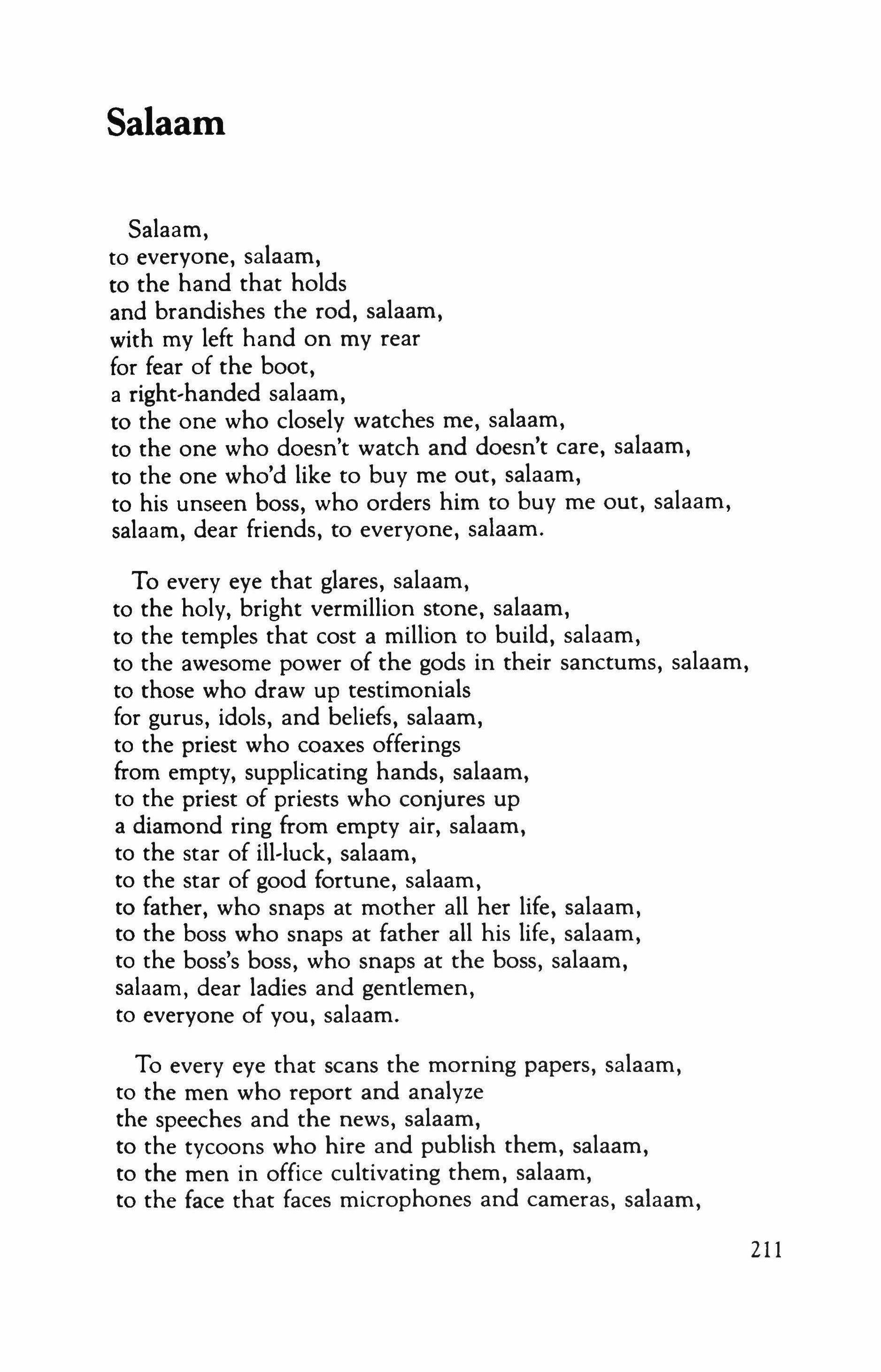
Salaam, to everyone, salaam, to the hand that holds and brandishes the rod, salaam, with my left hand on my rear for fear of the boot, a right-handed salaam, to the one who closely watches me, salaam, to the one who doesn't watch and doesn't care, salaam, to the one who'd like to buy me out, salaam, to his unseen boss, who orders him to buy me out, salaam, salaam, dear friends, to everyone, salaam.
To every eye that glares, salaam, to the holy, bright vermillion stone, salaam, to the temples that cost a million to build, salaam, to the awesome power of the gods in their sanctums, salaam, to those who draw up testimonials for gurus, idols, and beliefs, salaam, to the priest who coaxes offerings from empty, supplicating hands, salaam, to the priest of priests who conjures up a diamond ring from empty air, salaam, to the star of ill-luck, salaam, to the star of good fortune, salaam, to father, who snaps at mother all her life, salaam, to the boss who snaps at father all his life, salaam, to the boss's boss, who snaps at the boss, salaam, salaam, dear ladies and gentlemen, to everyone of you, salaam.
To every eye that scans the morning papers, salaam, to the men who report and analyze the speeches and the news, salaam, to the tycoons who hire and publish them, salaam, to the men in office cultivating them, salaam, to the face that faces microphones and cameras, salaam,
211

to the mouth that pours its verbiage into them, salaam, to the millions who wait and watch and listen and believe, salaam, to the master hypnotists who practice all their skills on them, salaam, salaam, dear friends, to everyone, salaam.
To the streetcorner tough, salaam, to the bootlegger, toiling incessantly, salaam, to the smuggler of contraband, salaam, to the scrupulous, efficient customs men who let him through, salaam, to the one who operates a chain of betting shops and gambling dens, salaam, to the cops on the beat who're fed and fattened by him, salaam, to the tyranny of the autocrat, salaam, to the tyranny of the people, also, salaam, to the man who drives the van of power, salaam, to the luckless wretches, the curs, who're crushed beneath its wheels, salaam, to the hand that draws the sword, salaam, to the hand that ejects a bomb from a plane, salaam, to the enormous traffickers in weaponry, salaam, to black-market men, salaam, to those who announce, at periodic intervals, that all black-market men shall soon be hanged, salaam, to doctors, surgeons, homeopaths, salaam, to their mounting cures and insurmountable bills, salaam, to those who retail the accessories for the last rites, salaam, to those who lend their shoulders to bear the last remains, salaam, to all who deal and delight in death, salaam, salaam, dear ladies, dear gentle men, to everyone of you, salaam.
To rat-holes, salaam, to the rats in those rat-holes, salaam, to the roaches who encroach on kitchens and cabinets, salaam, to the lice that breed in beards, salaam, 212
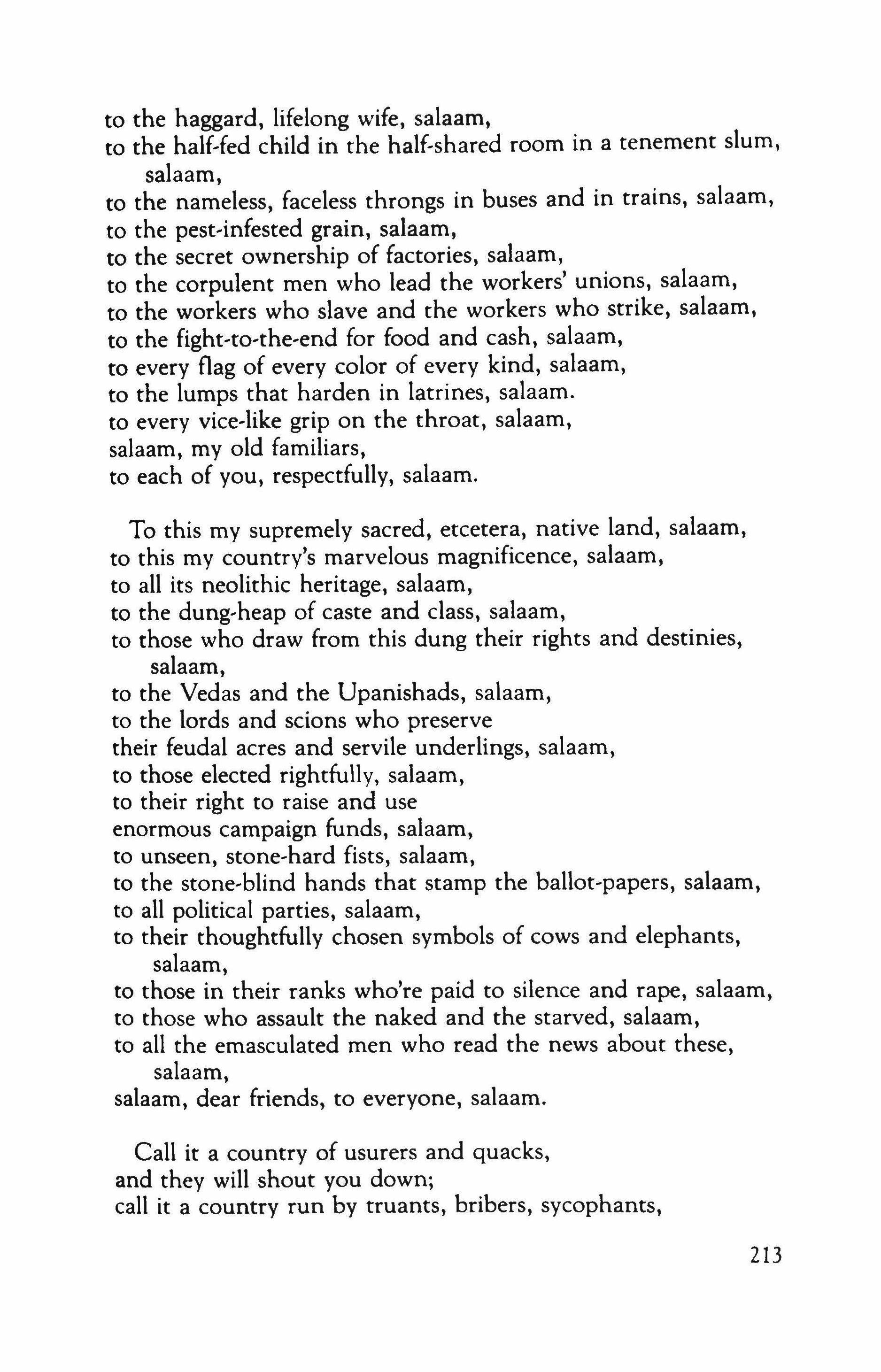
to the haggard, lifelong wife, salaam, to the half-fed child in the half-shared room in a tenement slum, salaam, to the nameless, faceless throngs in buses and in trains, salaam, to the pest-infested grain, salaam, to the secret ownership of factories, salaam, to the corpulent men who lead the workers' unions, salaam, to the workers who slave and the workers who strike, salaam, to the fight-to-the-end for food and cash, salaam, to every flag of every color of every kind, salaam, to the lumps that harden in latrines, salaam. to every vice-like grip on the throat, salaam, salaam, myoid familiars, to each of you, respectfully, salaam.
To this my supremely sacred, etcetera, native land, salaam, to this my country's marvelous magnificence, salaam, to all its neolithic heritage, salaam, to the dung-heap of caste and class, salaam, to those who draw from this dung their rights and destinies, salaam, to the Vedas and the Upanishads, salaam, to the lords and scions who preserve their feudal acres and servile underlings, salaam, to those elected rightfully, salaam, to their right to raise and use enormous campaign funds, salaam, to unseen, stone-hard fists, salaam, to the stone-blind hands that stamp the ballot-papers, salaam, to all political parties, salaam, to their thoughtfully chosen symbols of cows and elephants, salaam, to those in their ranks who're paid to silence and rape, salaam, to those who assault the naked and the starved, salaam, to all the emasculated men who read the news about these, salaam, salaam, dear friends, to everyone, salaam.
Call it a country of usurers and quacks, and they will shout you down; call it a country run by truants, bribers, sycophants,
213
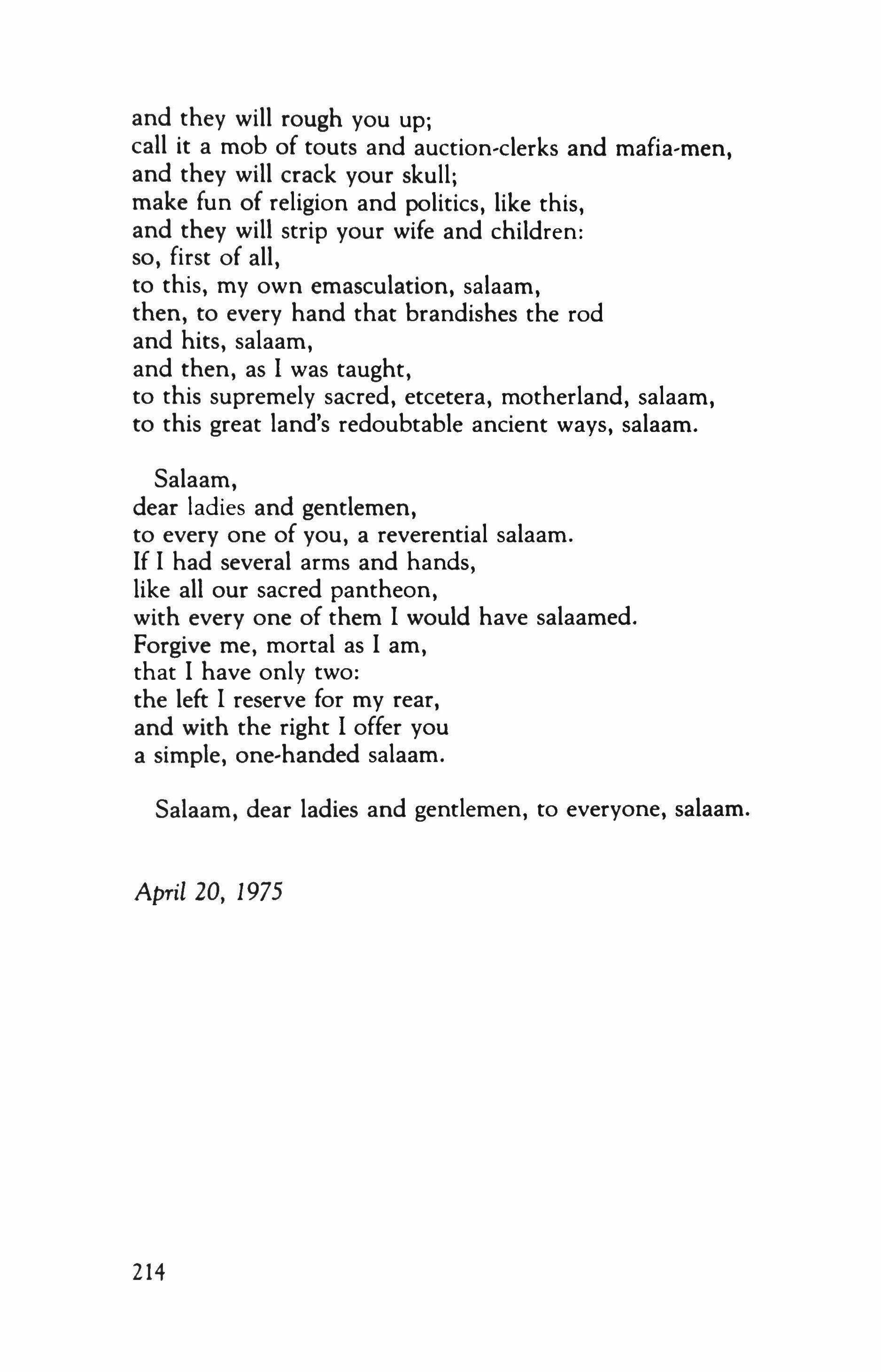
and they will rough you up; call it a mob of touts and auction-clerks and mafia-men, and they will crack your skull; make fun of religion and politics, like this, and they will strip your wife and children: so, first of all, to this, my own emasculation, salaam, then, to every hand that brandishes the rod and hits, salaam, and then, as I was taught, to this supremely sacred, etcetera, motherland, salaam, to this great land's redoubtable ancient ways, salaam.
Salaam, dear ladies and gentlemen, to everyone of you, a reverential salaam. If I had several arms and hands, like all our sacred pantheon, with everyone of them I would have salaamed. Forgive me, mortal as I am, that I have only two: the left I reserve for my rear, and with the right I offer you a simple, one-handed salaam.
Salaam, dear ladies and gentlemen, to everyone, salaam.
April 20, 1975
214
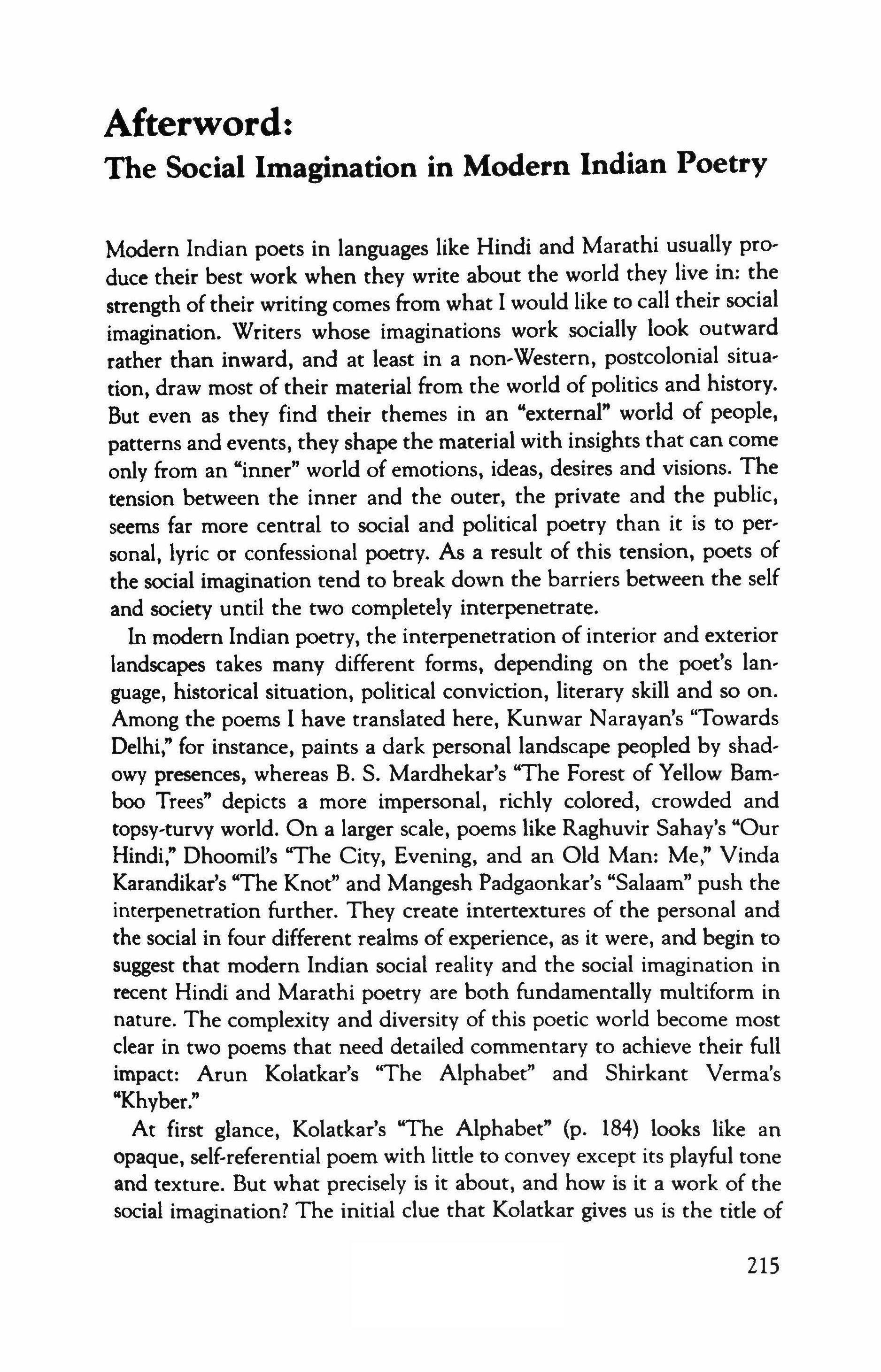
Afterword:
The Social Imagination in Modern Indian Poetry
Modern Indian poets in languages like Hindi and Marathi usually pro' duce their best work when they write about the world they live in: the strength oftheir writing comes from what I would like to call their social imagination. Writers whose imaginations work socially look outward rather than inward, and at least in a non,Western, postcolonial situation, draw most of their material from the world of politics and history. But even as they find their themes in an "external" world of people, patterns and events, they shape the material with insights that can come only from an "inner" world of emotions, ideas, desires and visions. The tension between the inner and the outer, the private and the public, seems far more central to social and political poetry than it is to per' sonal, lyric or confessional poetry. As a result of this tension, poets of the social imagination tend to break down the barriers between the self and society until the two completely interpenetrate. In modern Indian poetry, the interpenetration of interior and exterior landscapes takes many different forms, depending on the poet's Ianguage, historical situation, political conviction, literary skill and so on. Among the poems I have translated here, Kunwar Narayan's "Towards Delhi," for instance, paints a dark personal landscape peopled by shad, owy presences, whereas B. S. Mardhekar's "The Forest of Yellow Bam, boo Trees" depicts a more impersonal, richly colored, crowded and topsy-turvy world. On a larger scale, poems like Raghuvir Sahay's "Our Hindi," Dhoomil's "The City, Evening, and an Old Man: Me," Vinda Karandikar's "The Knot" and Mangesh Padgaonkar's "Salaam" push the interpenetration further. They create intertextures of the personal and the social in four different realms of experience, as it were, and begin to suggest that modern Indian social reality and the social imagination in recent Hindi and Marathi poetry are both fundamentally multiform in nature. The complexity and diversity of this poetic world become most clear in two poems that need detailed commentary to achieve their full impact: Arun Kolatkar's "The Alphabet" and Shirkant Verma's "Khyber."
At first glance, Kolatkar's "The Alphabet" (p. 184) looks like an opaque, self-referential poem with little to convey except its playful tone and texture. But what precisely is it about, and how is it a work of the social imagination? The initial clue that Kolatkar gives us is the title of
215
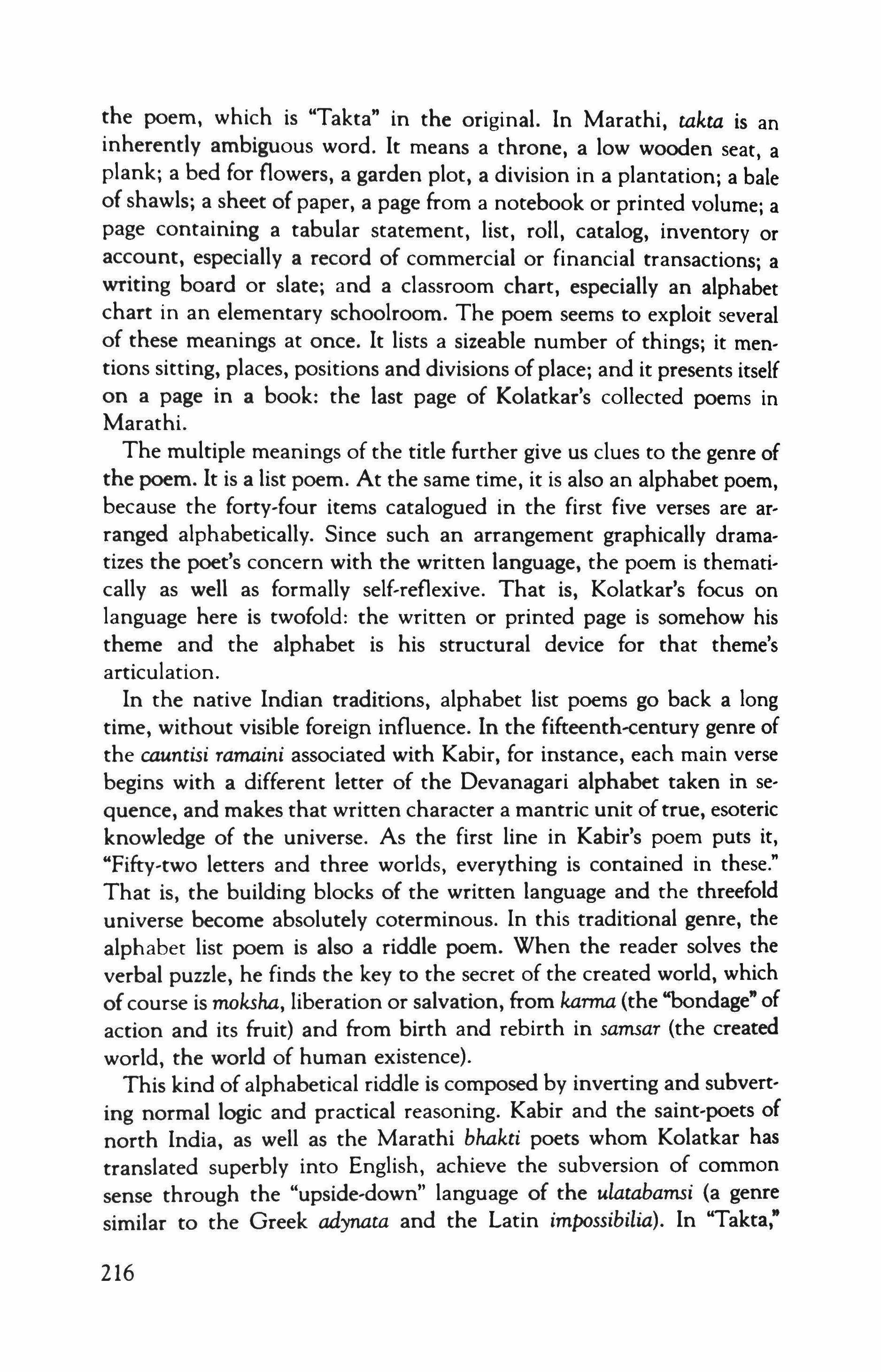
the poem, which is "Takta" in the original. In Marathi, takta is an inherently ambiguous word. It means a throne, a low wooden seat, a plank; a bed for flowers, a garden plot, a division in a plantation; a bale of shawls; a sheet of paper, a page from a notebook or printed volume; a page containing a tabular statement, list, roll, catalog, inventory or account, especially a record of commercial or financial transactions; a writing board or slate; and a classroom chart, especially an alphabet chart in an elementary schoolroom. The poem seems to exploit several of these meanings at once. It lists a sizeable number of things; it mentions sitting, places, positions and divisions of place; and it presents itself on a page in a book: the last page of Kolatkar's collected poems in Marathi.
The multiple meanings of the title further give us clues to the genre of the poem. It is a list poem. At the same time, it is also an alphabet poem, because the forty-four items catalogued in the first five verses are arranged alphabetically. Since such an arrangement graphically dramatizes the poet's concern with the written language, the poem is thematically as well as formally self-reflexive. That is, Kolatkar's focus on language here is twofold: the written or printed page is somehow his theme and the alphabet is his structural device for that theme's articulation.
In the native Indian traditions, alphabet list poems go back a long time, without visible foreign influence. In the fifteenth-centurv genre of the cauntisi ramaini associated with Kabir, for instance, each main verse begins with a different letter of the Devanagari alphabet taken in sequence, and makes that written character a mantric unit of true, esoteric knowledge of the universe. As the first line in Kabir's poem puts it, "Fifty-two letters and three worlds, everything is contained in these." That is, the building blocks of the written language and the threefold universe become absolutely coterminous. In this traditional genre, the alphabet list poem is also a riddle poem. When the reader solves the verbal puzzle, he finds the key to the secret of the created world, which of course is moksha, liberation or salvation, from karma (the "bondage" of action and its fruit) and from birth and rebirth in samsar (the created world, the world of human existence).
This kind of alphabetical riddle is composed by inverting and subverting normal logic and practical reasoning. Kabir and the saint-poets of north India, as well as the Marathi bhakti poets whom Kolatkar has translated superbly into English, achieve the subversion of common sense through the "upside-down" language of the ulatabamsi (a genre similar to the Greek adynata and the Latin impossibilia). In "Takta,"
216
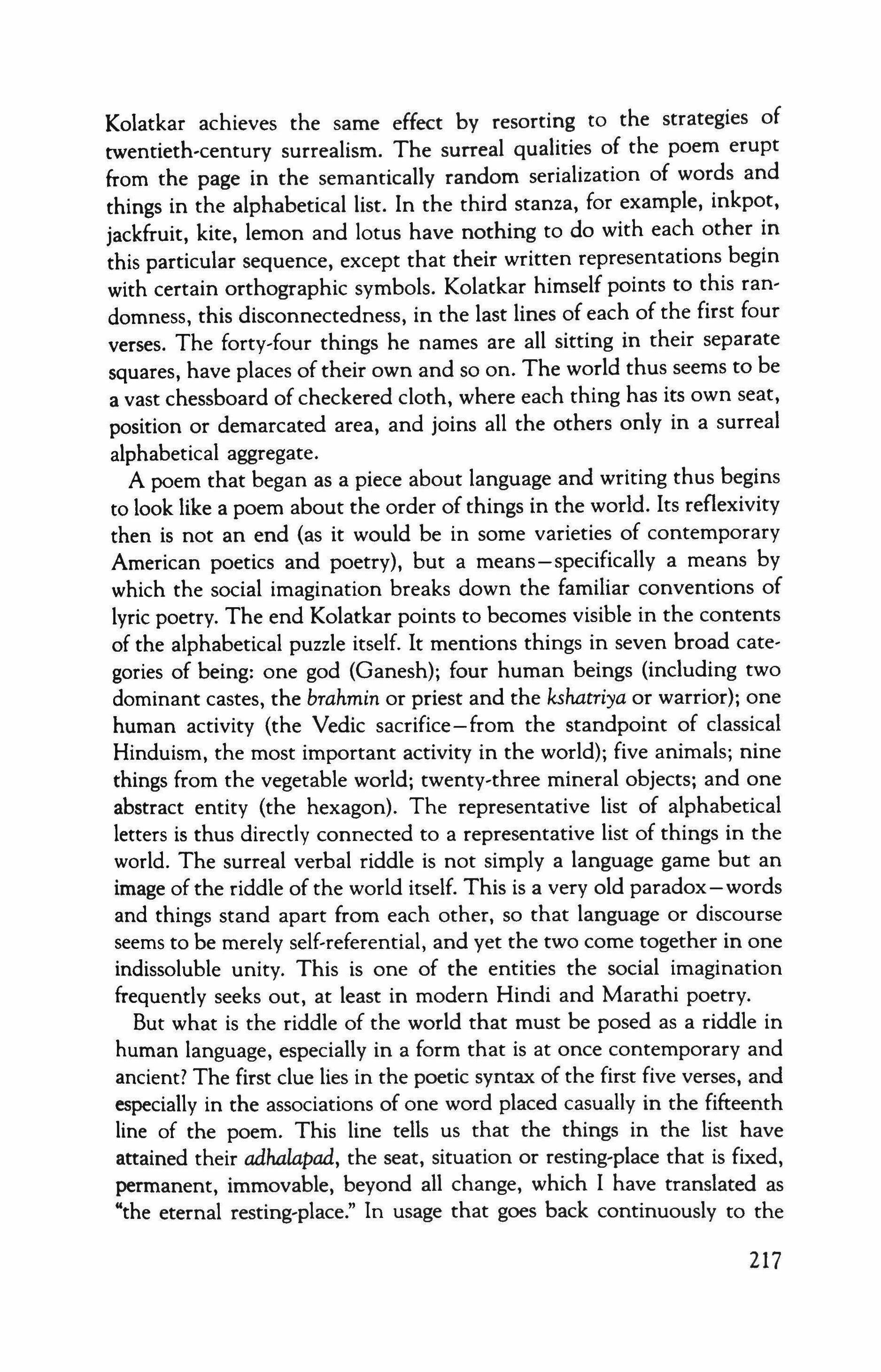
Kolatkar achieves the same effect by resorting to the strategies of twentieth-century surrealism. The surreal qualities of the poem erupt from the page in the semantically random serialization of words and things in the alphabetical list. In the third stanza, for example, inkpot, jackfruit, kite, lemon and lotus have nothing to do with each other in this particular sequence, except that their written representations begin with certain orthographic symbols. Kolatkar himself points to this randomness, this disconnectedness, in the last lines of each of the first four verses. The forty-four things he names are all sitting in their separate squares, have places of their own and so on. The world thus seems to be a vast chessboard of checkered cloth, where each thing has its own seat, position or demarcated area, and joins all the others only in a surreal alphabetical aggregate.
A poem that began as a piece about language and writing thus begins to look like a poem about the order of things in the world. Its reflexivity then is not an end (as it would be in some varieties of contemporary American poetics and poetry), but a means-specifically a means by which the social imagination breaks down the familiar conventions of lyric poetry. The end Kolatkar points to becomes visible in the contents of the alphabetical puzzle itself. It mentions things in seven broad categories of being: one god (Ganesh); four human beings (including two dominant castes, the brahmin or priest and the kshatriya or warrior); one human activity (the Vedic sacrifice-from the standpoint of classical Hinduism, the most important activity in the world); five animals; nine things from the vegetable world; twenty-three mineral objects; and one abstract entity (the hexagon). The representative list of alphabetical letters is thus directly connected to a representative list of things in the world. The surreal verbal riddle is not simply a language game but an image of the riddle of the world itself. This is a very old paradox-words and things stand apart from each other, so that language or discourse seems to be merely self-referential, and yet the two come together in one indissoluble unity. This is one of the entities the social imagination frequently seeks out, at least in modern Hindi and Marathi poetry. But what is the riddle of the world that must be posed as a riddle in human language, especially in a form that is at once contemporary and ancient? The first clue lies in the poetic syntax of the first five verses, and especially in the associations of one word placed casually in the fifteenth line of the poem. This line tells us that the things in the list have attained their adhalapad, the seat, situation or resting-place that is fixed, permanent, immovable, beyond all change, which I have translated as "the eternal resting-place." In usage that goes back continuously to the
217

first major Marathi poet, jnanesvar, in the late thirteenth century, adha. lapad refers to the exceptional fixity of things like the polestar, and to find one's adhalapad is to attain moksha, final release from birth and rebirth and the necessity of action. The surreal logic of the first five verses then exactly replicates the conventional logic of ka77J1a, dharma and moksha in the caste system.
In this logic, everything that exists in the world belongs to a specific jati (class, category, caste), and if it sticks by the rules of dharma (law, duty) to its particular cosmo-moral square on the world's checkerboard, then it inevitably attains its liberation from the cycle of existence. In human terms, this means that if a person follows precisely all the codes of conduct prescribed for his or her caste, then at the end ofthis lifetime he or she breaks out of the "bondage" of ka77J1a. (Narayan Surve also attacks this cornerstone of caste logic in his poem "Lifetime," p. 205.) This is why Hinduism is so fussy about every little action and ritualizes so much of one's daily life in an attempt to minimize the chances of doing "evil." The catch, of course, is that dharma-the law, the structure of duties and obligations, the body of principles governing the ethics of action-is extremely sukshma, subtle, so much so that practically no human being can sort out all the ethical dilemmas which surface at every turn in the everyday world, and therefore cannot do the right thing often enough to attain his or her moksha or adhalapad. In theory, however, every creature in the universe is capable of working out its salvation in the end - by "sitting," as Kolatkar puts it, in its "separate square," by "holding its proper position," by "not interfering with the others," and so on.
The second clue to the riddle of the world lies in the last seven lines of the poem, which are very different in form. Sixteen of the forty-four items on the list reappear here, this time in nonalphabetic order and in properly connected sentences. The sixth verse applies the categorical logic of the first five verses to establish causal connections and parallels between the three sets of things. Just as the mother, following the dharma proper to her "class" of human beings, will not throw her baby out onto the compost heap, so the faithful Brahmin will not eat garlic or duck, and so on (orthodox Brahmins are strict vegetarians for whom garlic is "taboo," because it is associated with the cooking of meat). But this set of relationships can also be restricted in the form of negative conditionals-if the ostrich does not eat the baby's frock, then the kshatriya will not shoot Ganesh in the belly. This, however, implies that if for some reason the bird does eat the garment, the warrior will kill the god, and ifsomehow the mother does discard her child, the Brahmin will
218
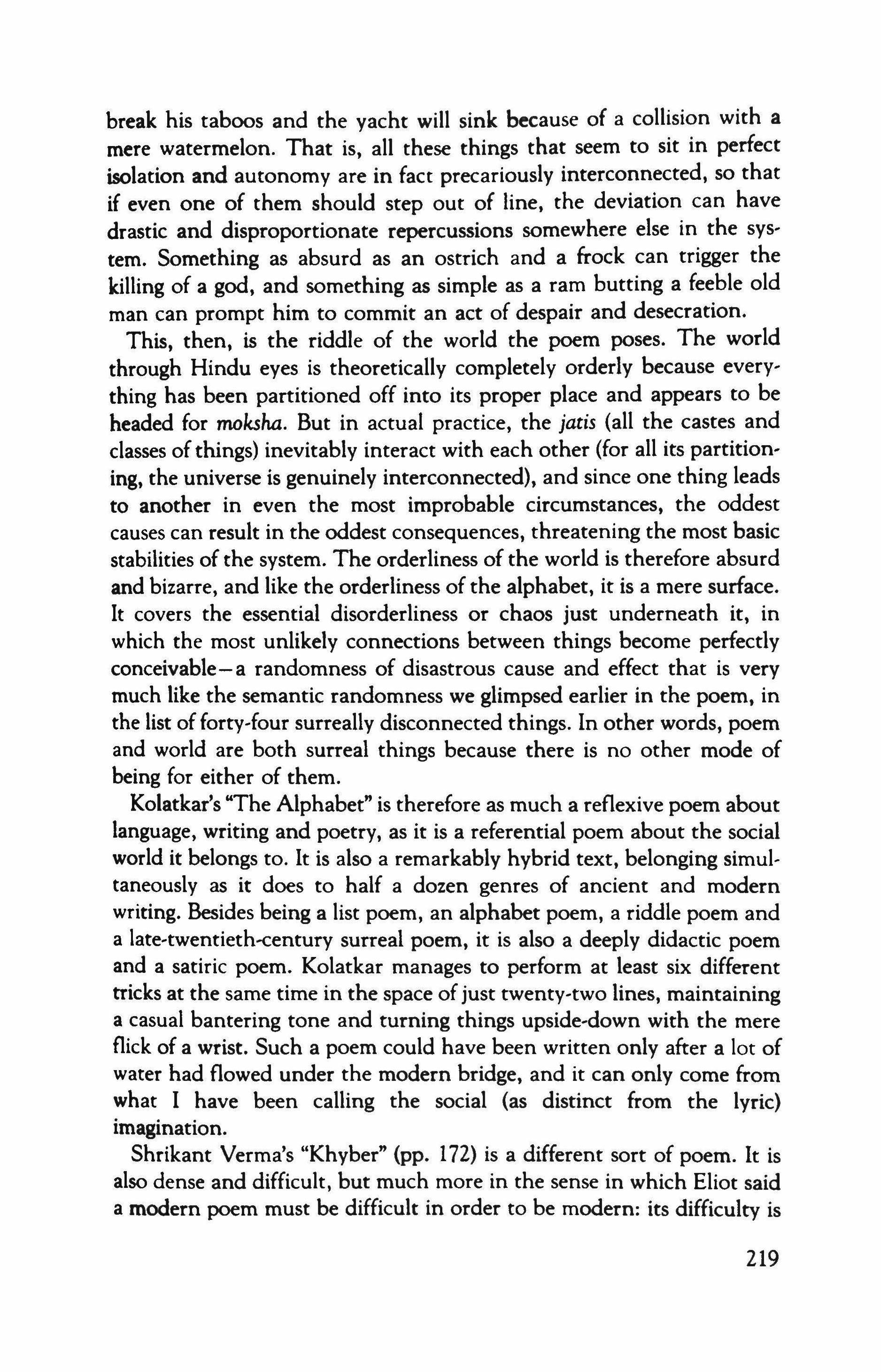
break his taboos and the yacht will sink because of a collision with a mere watermelon. That is, all these things that seem to sit in perfect isolation and autonomy are in fact precariously interconnected, so that if even one of them should step out of line, the deviation can have drastic and disproportionate repercussions somewhere else in the svstem. Something as absurd as an ostrich and a frock can trigger the killing of a god, and something as simple as a ram butting a feeble old man can prompt him to commit an act of despair and desecration.
This, then, is the riddle of the world the poem poses. The world through Hindu eyes is theoretically completely orderly because every' thing has been partitioned off into its proper place and appears to be headed for moksha. But in actual practice, the jatis (all the castes and classes ofthings) inevitably interact with each other (for all its partition' ing, the universe is genuinely interconnected), and since one thing leads to another in even the most improbable circumstances, the oddest causes can result in the oddest consequences, threatening the most basic stabilities of the system. The orderliness of the world is therefore absurd and bizarre, and like the orderliness of the alphabet, it is a mere surface. It covers the essential disorderliness or chaos just underneath it, in which the most unlikely connections between things become perfectly conceivable-a randomness of disastrous cause and effect that is very much like the semantic randomness we glimpsed earlier in the poem, in the list of forty-four surreally disconnected things. In other words, poem and world are both surreal things because there is no other mode of being for either of them.
Kolatkar's "The Alphabet" is therefore as much a reflexive poem about language, writing and poetry, as it is a referential poem about the social world it belongs to. It is also a remarkably hybrid text, belonging simultaneously as it does to half a dozen genres of ancient and modern writing. Besides being a list poem, an alphabet poem, a riddle poem and a late-twentieth-century surreal poem, it is also a deeply didactic poem and a satiric poem. Kolatkar manages to perform at least six different tricks at the same time in the space ofjust twenty'two lines, maintaining a casual bantering tone and turning things upside-down with the mere flick of a wrist. Such a poem could have been written only after a lot of water had flowed under the modern bridge, and it can only come from what I have been calling the social (as distinct from the lyric) imagination.
Shrikant Verma's "Khyber" (pp. 172) is a different sort of poem. It is also dense and difficult, but much more in the sense in which Eliot said a modern poem must be difficult in order to be modern: its difficulty is
219
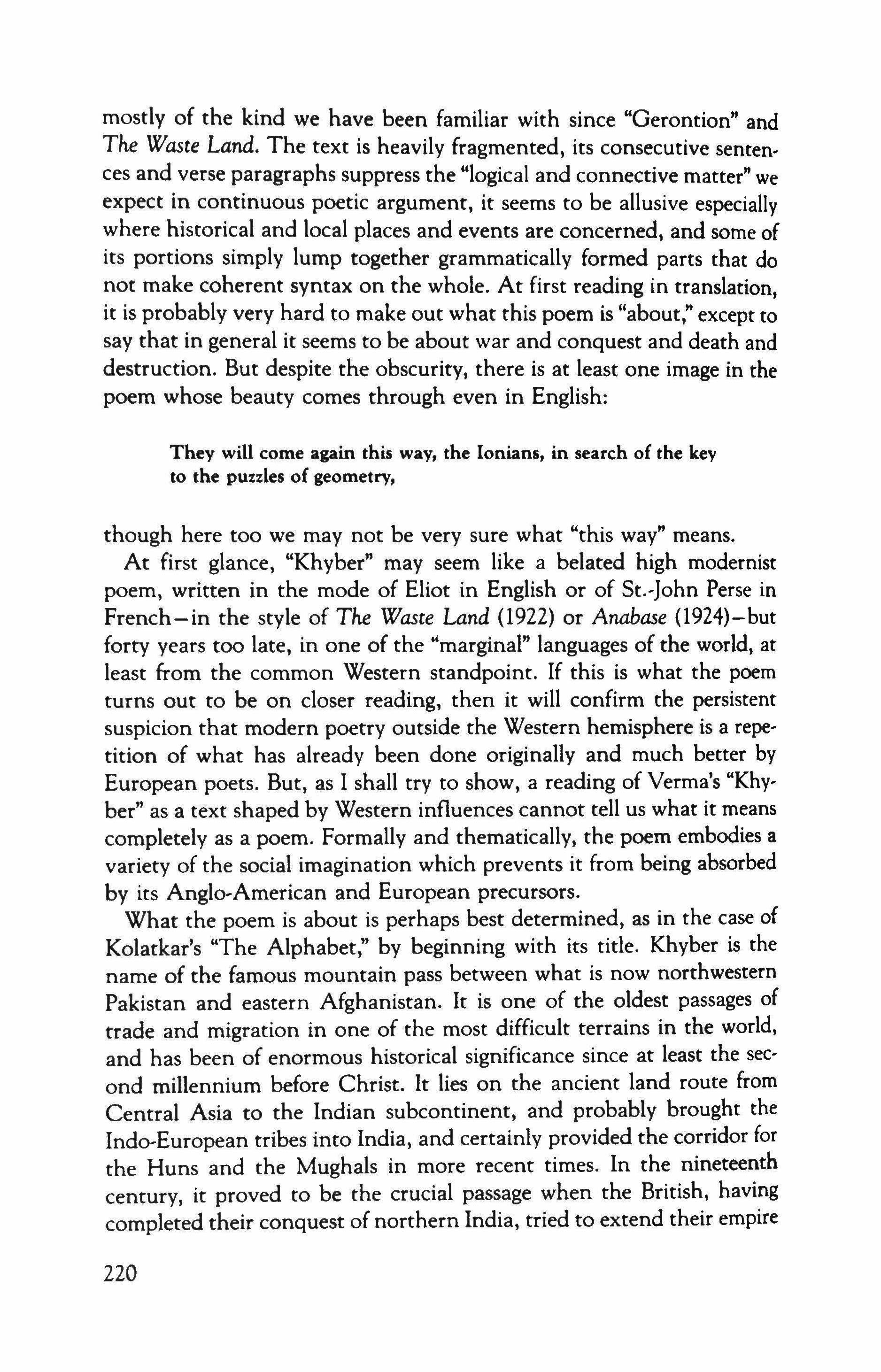
mostly of the kind we have been familiar with since "Gerontion" and The Waste Land. The text is heavily fragmented, its consecutive sentences and verse paragraphs suppress the "logical and connective matter" we expect in continuous poetic argument, it seems to be allusive especially where historical and local places and events are concerned, and some of its portions simply lump together grammatically formed parts that do not make coherent syntax on the whole. At first reading in translation, it is probably very hard to make out what this poem is "about," except to say that in general it seems to be about war and conquest and death and destruction. But despite the obscurity, there is at least one image in the poem whose beauty comes through even in English:
They will come again this way, the Ionians, in search of the key to the puzzles of geometry,
though here too we may not be very sure what "this way" means.
At first glance, "Khyber" may seem like a belated high modernist poem, written in the mode of Eliot in English or of St.-john Perse in French-in the style of The Waste Land (1922) or Anabase (1924)-but forty years too late, in one of the "marginal" languages of the world, at least from the common Western standpoint. If this is what the poem turns out to be on closer reading, then it will confirm the persistent suspicion that modern poetry outside the Western hemisphere is a repetition of what has already been done originally and much better by European poets. But, as I shall try to show, a reading of Verma's "Khyber" as a text shaped by Western influences cannot tell us what it means completely as a poem. Formally and thematically, the poem embodies a variety of the social imagination which prevents it from being absorbed by its Anglo-American and European precursors.
What the poem is about is perhaps best determined, as in the case of Kolatkar's "The Alphabet," by beginning with its title. Khyber is the name of the famous mountain pass between what is now northwestern Pakistan and eastern Afghanistan. It is one of the oldest passages of trade and migration in one of the most difficult terrains in the world, and has been of enormous historical significance since at least the second millennium before Christ. It lies on the ancient land route from Central Asia to the Indian subcontinent, and probably brought the Indo-European tribes into India, and certainly provided the corridor for the Huns and the Mughals in more recent times. In the nineteenth century, it proved to be the crucial passage when the British, having completed their conquest of northern India, tried to extend their empire
220

into Afghanistan. In the last ten years, the Khyber Pass has been an escape route for hundreds of thousands of refugees fleeing from the Russian occupation of Afghanistan. Of course, the Khyber Pass is not the only link between Central and South Asia, but it is the most negotiable and the most efficient route of exit and entry, if the Indian subcontinent is a military, commercial or migratory destination or origin. In this context, as several of its images indicate, Verma's poem is about the process of passing through, of "entering and leaving," arrival and departure.
It is also some sort of a historical poem about the subcontinent. This becomes clear when we look at the explicit references to several historical figures and events. It mentions Alexander of Macedonia, for example, the first European ruler to attempt a passage into India over land. Alexander journeyed across Persia and Sind, and crossed the Jhelum, the westernmost of the five major tributaries of the Indus River that arise in the Himalayas and flow through the Punjab (literally, "the land of the five rivers"). The Punjab has now been partitioned between India and Pakistan-a division that caused much bloodshed in 1947-48 and led to large-scale migrations across the new international boundary between the two nations - but its northern sector was once the unified site of the Hellenic-Indian culture of Kandahar ("Gandhara" in Western historiography), which flourished over two or three centuries under the Greek military protectors Alexander left behind around 330 B.C. The Punjab was also the site much earlier of the first Indo-European settlements on the Indian subcontinent, and the place where much of the early Vedic literature-a body of works that included the first Indian poems, myths, ritual texts and works of social theory-was composed. The mentions of Alexander and the Jhelum in the poem immediately evoke all these historical associations for Hindi and Indian readers.
What these general allusions or suggestions do, however, is very specific. The crucial fact is that Alexander did not pass through Khyber, taking instead an alternative southern route into and out of north India. This effectively makes the poem's thematic concern with journeys, comings and goings, arrivals and departures, a very general one. This generalization of theme, growing around the pretext of Khyber, is a significant part of Verma's overall strategy, as we shall see in a moment.
The Alexander theme occupies roughly the first half of the poem, but it is linked explicitly to a subtheme in the second half. The subtheme in question is the historical commonplace (in the modern Indian social imagination) that the Greeks traveled to India for two purposes. One was the search for India's fabled wealth - about which Herodotus, in his
221
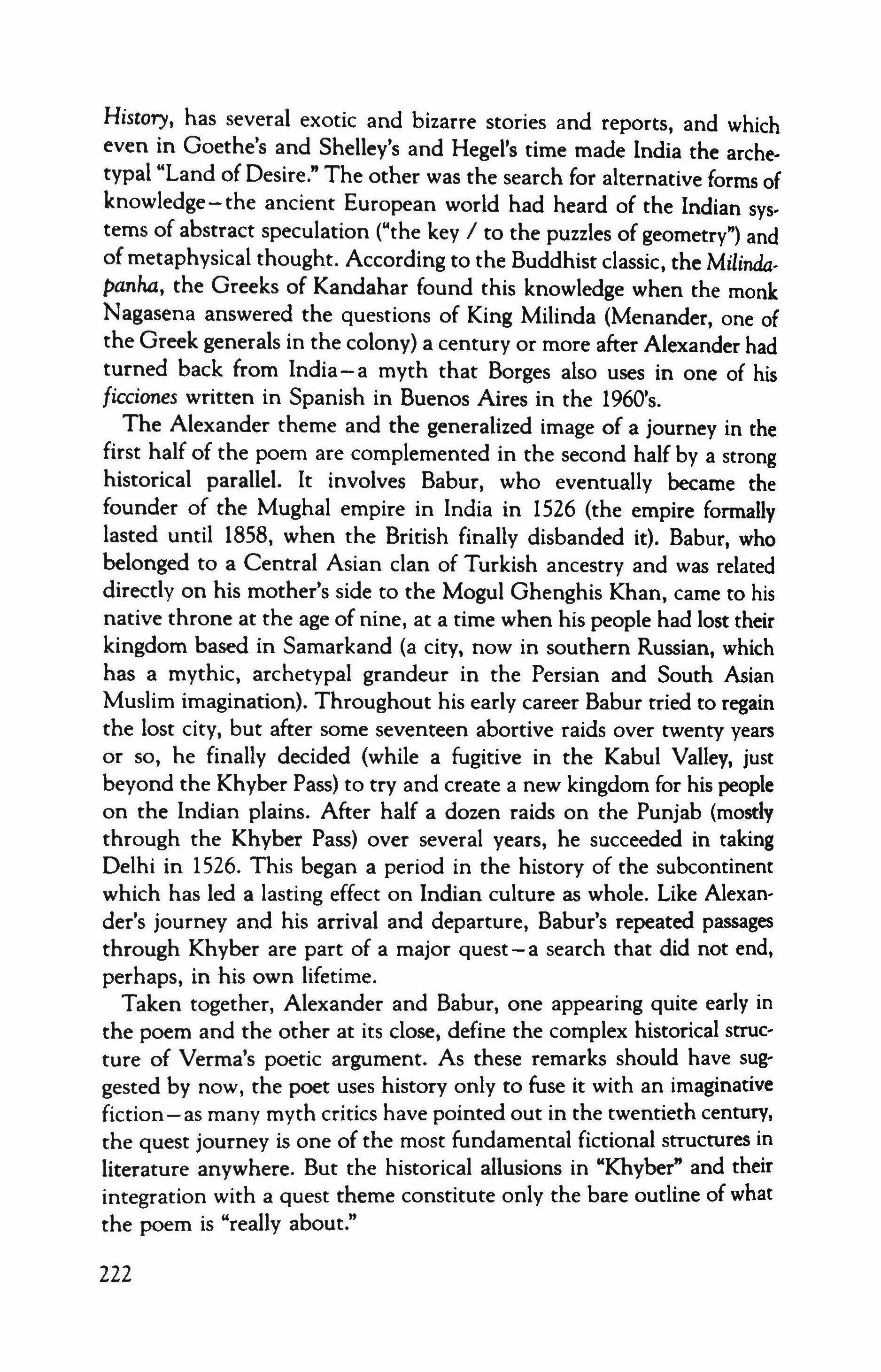
History, has several exotic and bizarre stories and reports, and which even in Goethe's and Shelley's and Hegel's time made India the archetypal "Land of Desire." The other was the search for alternative forms of knowledge-the ancient European world had heard of the Indian systems of abstract speculation ("the key / to the puzzles of geometry") and of metaphysical thought. According to the Buddhist classic, the Milindapanha, the Greeks of Kandahar found this knowledge when the monk Nagasena answered the questions of King Milinda (Menander, one of the Greek generals in the colony) a century or more after Alexander had turned back from India - a myth that Borges also uses in one of his ficciones written in Spanish in Buenos Aires in the 1960's.
The Alexander theme and the generalized image of a journey in the first half of the poem are complemented in the second half by a strong historical parallel. It involves Babur, who eventually became the founder of the Mughal empire in India in 1526 (the empire formally lasted until 1858, when the British finally disbanded it). Babur, who belonged to a Central Asian clan of Turkish ancestry and was related directly on his mother's side to the Mogul Ghenghis Khan, came to his native throne at the age of nine, at a time when his people had lost their kingdom based in Samarkand (a city, now in southern Russian, which has a mythic, archetypal grandeur in the Persian and South Asian Muslim imagination). Throughout his early career Babur tried to regain the lost city, but after some seventeen abortive raids over twenty years or so, he finally decided (while a fugitive in the Kabul Valley, just beyond the Khyber Pass) to try and create a new kingdom for his people on the Indian plains. After half a dozen raids on the Punjab (mostly through the Khyber Pass) over several years, he succeeded in taking Delhi in 1526. This began a period in the history of the subcontinent which has led a lasting effect on Indian culture as whole. Like Alexander's journey and his arrival and departure, Babur's repeated passages through Khyber are part of a major quest - a search that did not end, perhaps, in his own lifetime.
Taken together, Alexander and Babur, one appearing quite early in the poem and the other at its close, define the complex historical structure of Verma's poetic argument. As these remarks should have suggested by now, the poet uses history only to fuse it with an imaginative fiction - as many myth critics have pointed out in the twentieth century, the quest journey is one of the most fundamental fictional structures in literature anywhere. But the historical allusions in "Khyber" and their integration with a quest theme constitute only the bare outline of what the poem is "really about."
222

The poem begins elsewhere, with the statement that "There's room enough on earth for everyone." These words, cast in direct speech but without quotation marks (Verma uses a dash at the end of the line to set it off, another high modernist typographical convention which has become a staple of poetry in our times), are attributed to no specific speaker. They are "said" by "the noise" which dies down and joins the feast (more literally, the clamor that mingles with the taste). The noise here is straightforward metonymy - a trope which has acquired a peculiar importance in the West since the structuralism of the 1950's and 1960's, but which has been a dominant one in the Indian Sanskrit and mother-tongue traditions for a very long time. Metonymically, the noise stands for the crowd consisting of "everyone," all the racially and erhnically various people who make up the historical and cultural melting pot of India. This crowd, anonymous and shadowy in the poem, but very real for any native Indian, joins (melts into the taste of) "the feast" of "celebration," in "a phantom world set up by scoundrels" in the historical present.
At this point in the poem, the poet appears as a first-person speaker in the middle of the twentieth century who, having written poems "for many years lost in error," has now "come to see / there was no other tongue" in which to write, except the one that makes the noise and tastes the taste mentioned in the opening image-the tongue which is the language of that babble, of that mixed and mixed-up crowd joining the hedonistic feast of an unreal present world.
This dramatized author-figure or persona is a quester, a traveler in search of something. In English literature, protagonists on a quest journey are usually of two types. The first kind of quester is a Christian male figure in a Christian world seeking to find the lost grail of Arthurian romance. This is the kind offigure interpreters have found, for instance, in the shadowy modernist world of The Waste Land. The second kind, as in Joyce's Ulysses, is a quest figure who allegorically inhabits the rnvthological world of pre-Christian journeys, where Odysseus and Telemachus, for instance (paralleled by Leopold Bloom and Stephen DaedaIus in Dublin, on June 6, 1904), become father and son in search of each other. In the case of a modern Indian poem like "Khyber," the quest figure is a Hindu (in Verma's case, a "lapsed" Shaivite) in a non-Western world composed of ancient Greeks, medieval Turks and Mongols and Muslims, and omnipresent Hindus, among others (as we shall see in a moment). His quest is "fame," motivated by the desire "to carry everything" that stands before him, and to change all that has happened before his times.
223
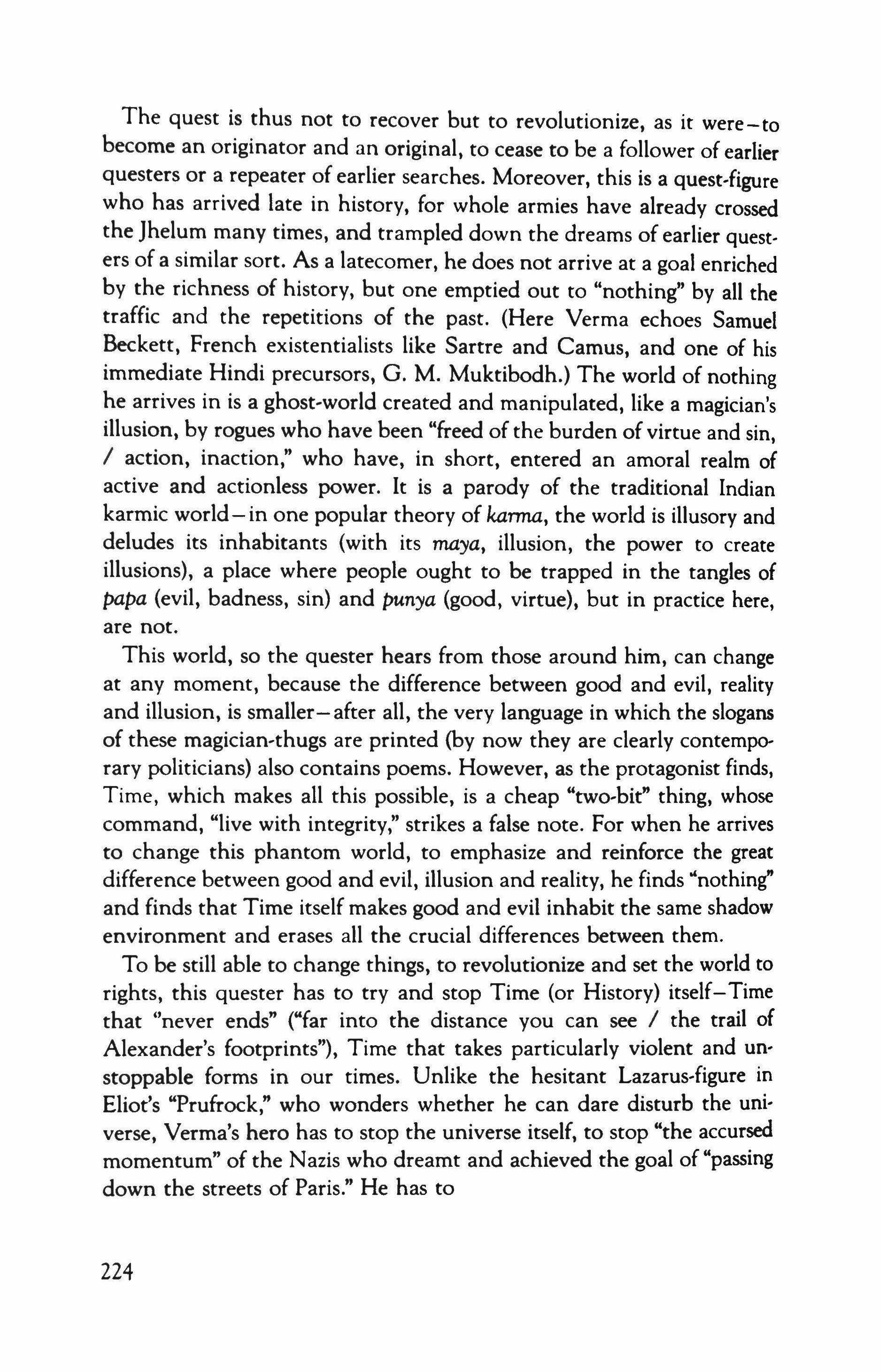
The quest is thus not to recover but to revolutionize, as it were-to become an originator and an original, to cease to be a follower of earlier questers or a repeater of earlier searches. Moreover, this is a quest-figure who has arrived late in history, for whole armies have already crossed the Jhelum many times, and trampled down the dreams of earlier questers of a similar sort. As a latecomer, he does not arrive at a goal enriched by the richness of history, but one emptied out to "nothing" by all the traffic and the repetitions of the past. (Here Verma echoes Samuel Beckett, French existentialists like Sartre and Camus, and one of his immediate Hindi precursors, G. M. Muktibodh.) The world of nothing he arrives in is a ghost-world created and manipulated, like a magician's illusion, by rogues who have been "freed of the burden of virtue and sin, / action, inaction," who have, in short, entered an amoral realm of active and actionless power. It is a parody of the traditional Indian karmic world - in one popular theory of karma, the world is illusory and deludes its inhabitants (with its maya, illusion, the power to create illusions), a place where people ought to be trapped in the tangles of papa (evil, badness, sin) and punya (good, virtue), but in practice here, are not.
This world, so the quester hears from those around him, can change at any moment, because the difference between good and evil, reality and illusion, is smaller-after all, the very language in which the slogans of these magician-thugs are printed (by now they are clearly contemporary politicians) also contains poems. However, as the protagonist finds, Time, which makes all this possible, is a cheap "two-bit" thing, whose command, "live with integrity," strikes a false note. For when he arrives to change this phantom world, to emphasize and reinforce the great difference between good and evil, illusion and reality, he finds "nothing" and finds that Time itself makes good and evil inhabit the same shadow environment and erases all the crucial differences between them.
To be still able to change things, to revolutionize and set the world to rights, this quester has to try and stop Time (or History) itself-Time that "never ends" ("far into the distance you can see / the trail of Alexander's footprints"), Time that takes particularly violent and unstoppable forms in our times. Unlike the hesitant Lazarus-figure in Eliot's "Prufrock," who wonders whether he can dare disturb the universe, Verma's hero has to stop the universe itself, to stop "the accursed momentum" of the Nazis who dreamt and achieved the goal of "passing down the streets of Paris." He has to
224

stop these screams that had to arise in Howrah, in Sealdah, entering and leaving the countless working places of death.
during and after the months following the British partition of subcontinental India into post-Independence India, West Pakistan, and East Pakistan (since 1971, Bangladesh).
Verma's poem thus spills rapidly over from the common Indian and European past into the more immediate postcolonial present. Howrah and Sealdah are the two major railway junctions in metropolitan Calcutta - major points of "exit and entry." In 1947-48, when Bengali Muslims fled to East Pakistan and Bengali Hindus poured into Calcutta to resettle themselves, trains arrived at both these railway stations with loads of slaughtered riot victims (a phenomenon captured graphically in the last episode of the British television series, The Jewel in the Crown). Verma's use of the eastern front proved peculiarly "prophetic" in this poem written in 1965 - in 1971, when India helped "liberate" Bangia, desh, the earlier pattern of killing and refugee migration was repeated at Howrah and Sealdah.
As a consequence, the quest-figure in "Khyber" is a skeptical or even a cynical one, embittered and angered by the very history he wants to sweep aside, a local revolutionary defeated by ancient and modern national and international history. His satirical skepticism can now foresee other questers-such as the Ionians-coming back in "space-age carnouflage," while the "women" (the passive East, the helpless Other half), sit waiting for one more onslaught, one more rape, this time in the guise of a peaceful mission, not in search of political dominion but of otherworldly knowledge ("the puzzles of geometry"). He can now see the peacefulness of the new enterprise ironically in the invitation to all the soldiers present on the scene to leave (this time there will be no violence, so they will have no role to play), and in his own pose-"opposing no one and nothing, yet opposing all." He thus resigns himself to the existential angst and dispiritedness generated by the situation:
The solutions that were possible are done with now, only the desire is leftin every scheme of things there's sorrow and strife. For what are you laying a new foundation stone?
In the end again there is "nothing" - it makes no difference whether you "come or go through Khyber." "There's hardly any difference" between
225
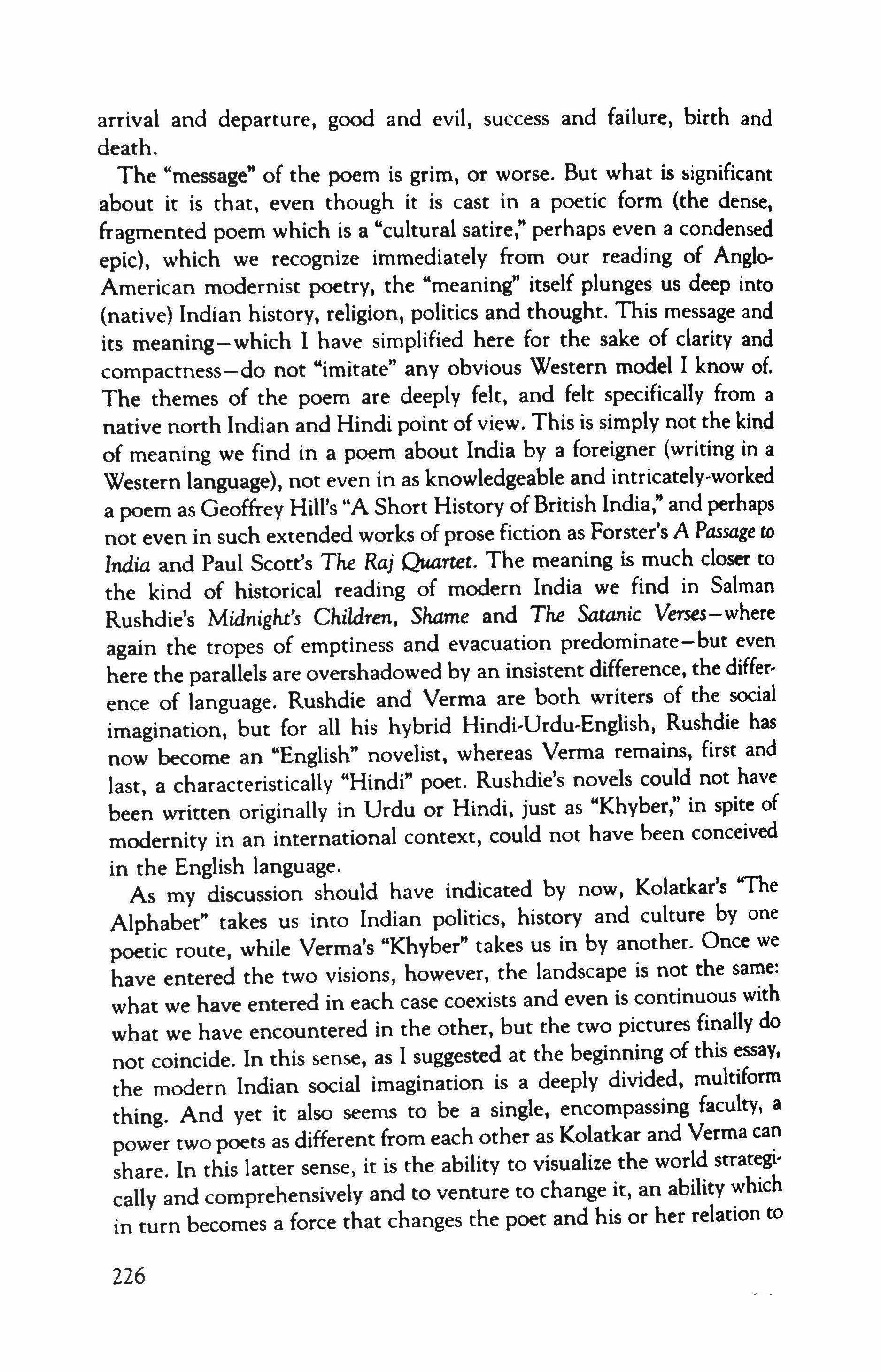
arrival and departure, good and evil, success and failure, birth and death.
The "message" of the poem is grim, or worse. But what is significant about it is that, even though it is cast in a poetic form (the dense, fragmented poem which is a "cultural satire," perhaps even a condensed epic), which we recognize immediately from our reading of AngloAmerican modernist poetry, the "meaning" itself plunges us deep into (native) Indian history, religion, politics and thought. This message and its meaning-which I have simplified here for the sake of clarity and compactness-do not "imitate" any obvious Western model I know of.
The themes of the poem are deeply felt, and felt specifically from a native north Indian and Hindi point of view. This is simply not the kind of meaning we find in a poem about India by a foreigner (writing in a Western language), not even in as knowledgeable and intricately-worked a poem as Geoffrey Hill's "A Short History of British India," and perhaps not even in such extended works of prose fiction as Forster's A Passage to India and Paul Scott's The Raj Quartet. The meaning is much closer to the kind of historical reading of modern India we find in Salman Rushdie's Midnight's Children, Shame and The Satanic Verses-where again the tropes of emptiness and evacuation predominate-but even here the parallels are overshadowed by an insistent difference, the difference of language. Rushdie and Verma are both writers of the social imagination, but for all his hybrid Hindi-Urdu-English, Rushdie has now become an "English" novelist, whereas Verma remains, first and last, a characteristically "Hindi" poet. Rushdie's novels could not have been written originally in Urdu or Hindi, just as "Khyber," in spite of modernity in an international context, could not have been conceived in the English language.
As my discussion should have indicated by now, Kolatkar's "The Alphabet" takes us into Indian politics, history and culture by one poetic route, while Verma's "Khyber" takes us in by another. Once we have entered the two visions, however, the landscape is not the same: what we have entered in each case coexists and even is continuous with what we have encountered in the other, but the two pictures finally do not coincide. In this sense, as I suggested at the beginning of this essay, the modern Indian social imagination is a deeply divided, multiform thing. And yet it also seems to be a single, encompassing faculty, a power two poets as different from each other as Kolatkar and Verma can share. In this latter sense, it is the ability to visualize the world strategically and comprehensively and to venture to change it, an ability which in turn becomes a force that changes the poet and his or her relation to
226
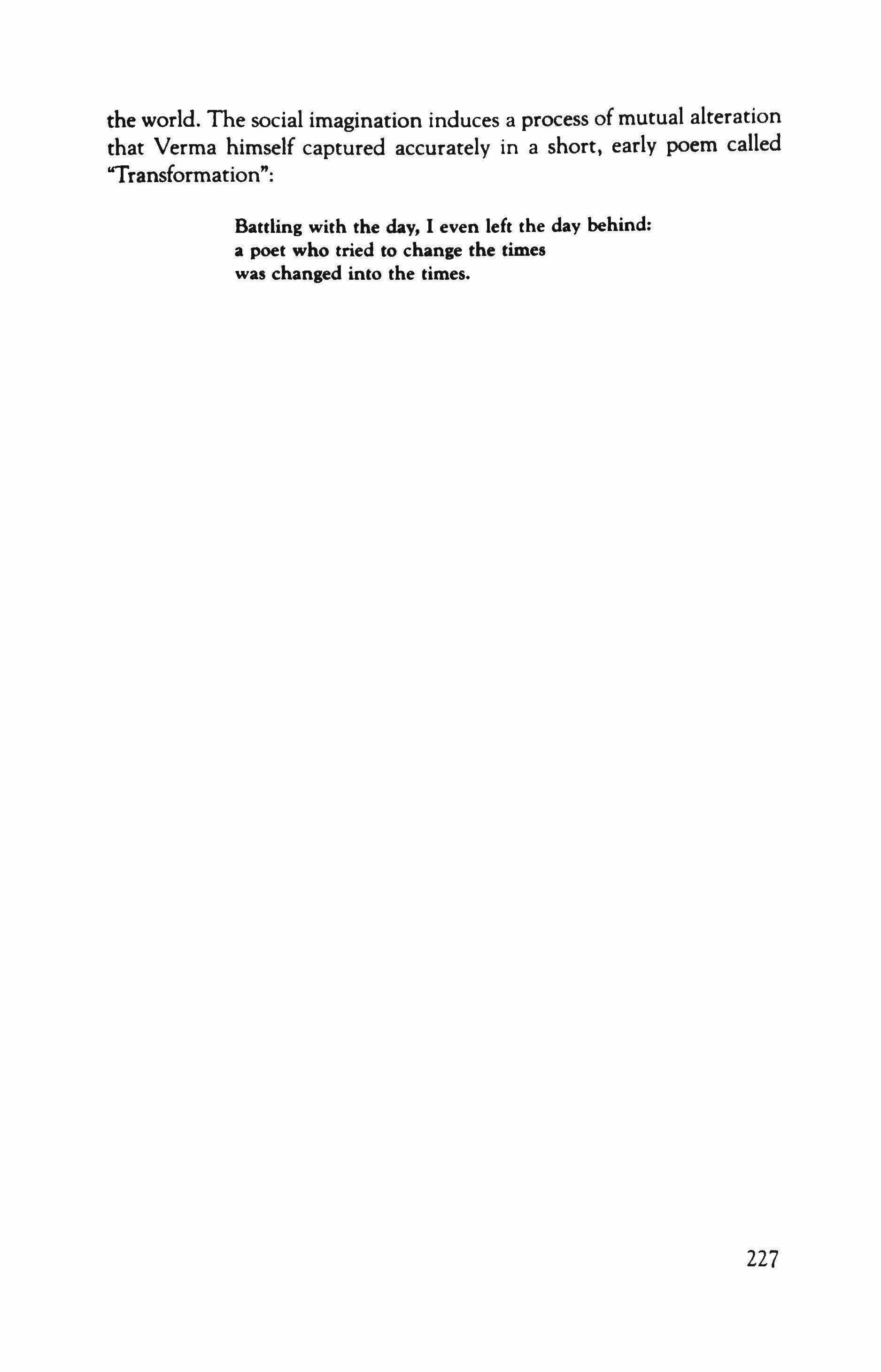
the world. The social imagination induces a process of mutual alteration that Verma himself captured accurately in a short, early poem called "Transformation":
Batding with the dav. I even left the day behind: a poet who tried to change the times was changed into the times.
227

Orpheus/Philomela
Subjection and Mastery in the Founding Stories of Poetic Production and in the
Logic of Our Practice
Allen Grossman
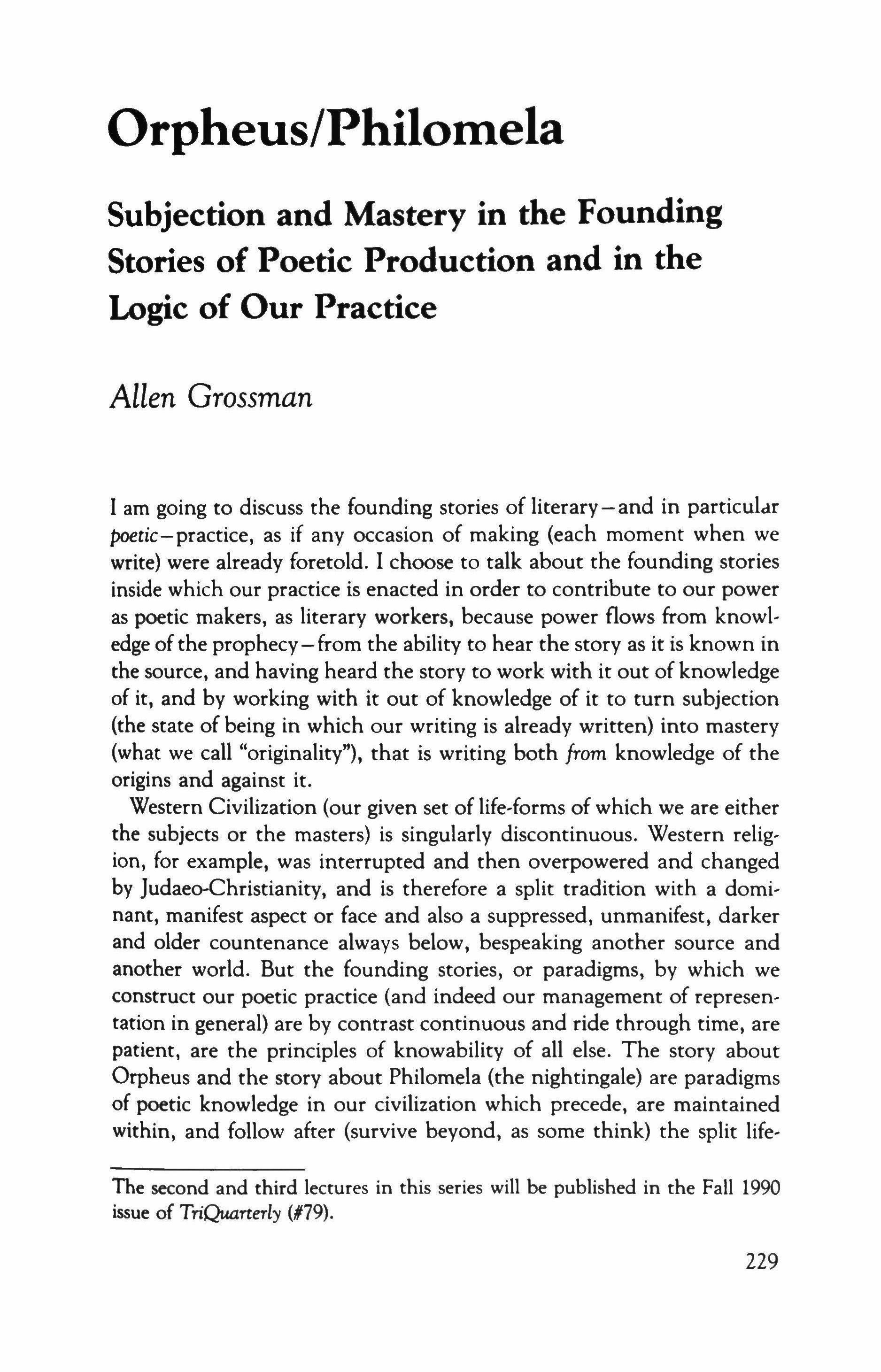
I am going to discuss the founding stories of literary-and in particular poetic-practice, as if any occasion of making (each moment when we write) were already foretold. I choose to talk about the founding stories inside which our practice is enacted in order to contribute to our power as poetic makers, as literary workers, because power flows from knowledge ofthe prophecy - from the ability to hear the story as it is known in the source, and having heard the story to work with it out of knowledge of it, and by working with it out of knowledge of it to turn subjection (the state of being in which our writing is already written) into mastery (what we call "originality"), that is writing both from knowledge of the origins and against it.
Western Civilization (our given set of life-forms of which we are either the subjects or the masters) is singularly discontinuous. Western religion, for example, was interrupted and then overpowered and changed by [udaeo-Christianirv, and is therefore a split tradition with a dominant, manifest aspect or face and also a suppressed, unmanifest, darker and older countenance always below, bespeaking another source and another world. But the founding stories, or paradigms, by which we construct our poetic practice (and indeed our management of representation in general) are by contrast continuous and ride through time, are patient, are the principles of knowability of all else. The story about Orpheus and the story about Philomela (the nightingale) are paradigms of poetic knowledge in our civilization which precede, are maintained within, and follow after (survive beyond, as some think) the split life-
The second and third lectures in this series will be published in the Fall 1990 issue of TriQuarterly (179).
229
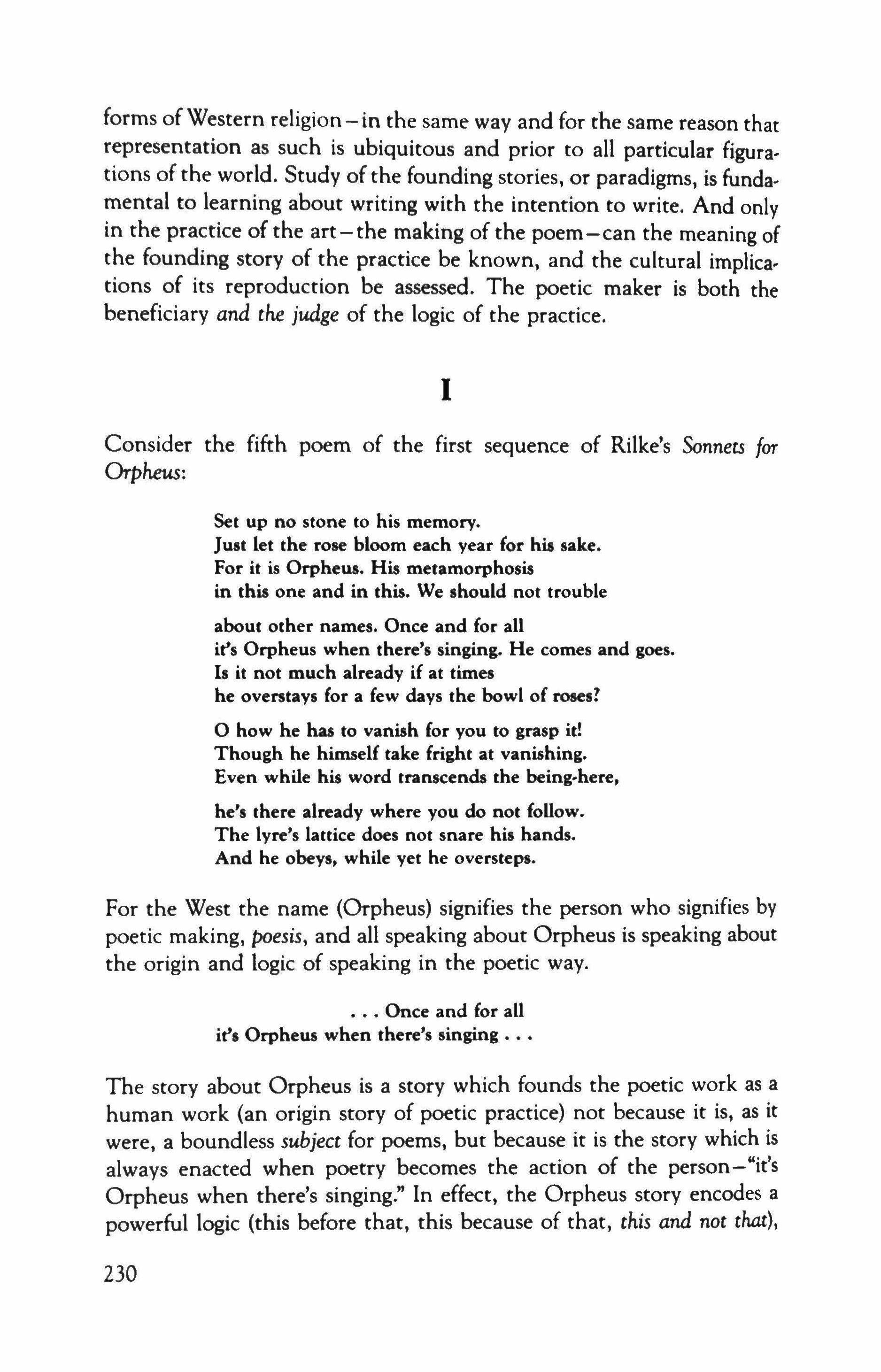
forms of Western religion-in the same way and for the same reason that representation as such is ubiquitous and prior to all particular figurations of the world. Study of the founding stories, or paradigms, is fundamental to learning about writing with the intention to write. And only in the practice of the art-the making of the poem-can the meaning of the founding story of the practice be known, and the cultural implications of its reproduction be assessed. The poetic maker is both the beneficiary and the judge of the logic of the practice.
IConsider the fifth poem of the first sequence of Rilke's Sonnets for Orpheus:
Set up no stone to his memory. Just let the rose bloom each year (or hit sake. For it is Orpheus. His metamorphosis in thit one and in this. We should not trouble about other names. Once and (or all it's Orpheus when there's singing. He comes and goes. Is it not much already if at times he overstays (or a few days the bowl of roses? o how he has to vanish (or you to grasp it! Though he himself take (right at vanishing. Even while his word transcends the being-here, he's there already where you do not follow. The lyre's lattice does not snare hit hands. And he obeys, while yet he oversteps.
For the West the name (Orpheus) signifies the person who signifies by poetic making, poesis, and all speaking about Orpheus is speaking about the origin and logic of speaking in the poetic way
Once and for all it's Orpheus when there's singing
The story about Orpheus is a story which founds the poetic work as a human work (an origin story of poetic practice) not because it is, as it were, a boundless subject for poems, but because it is the story which is always enacted when poetry becomes the action of the person - "it's Orpheus when there's singing." In effect, the Orpheus story encodes a powerful logic (this before that, this because of that, this and not that),
230
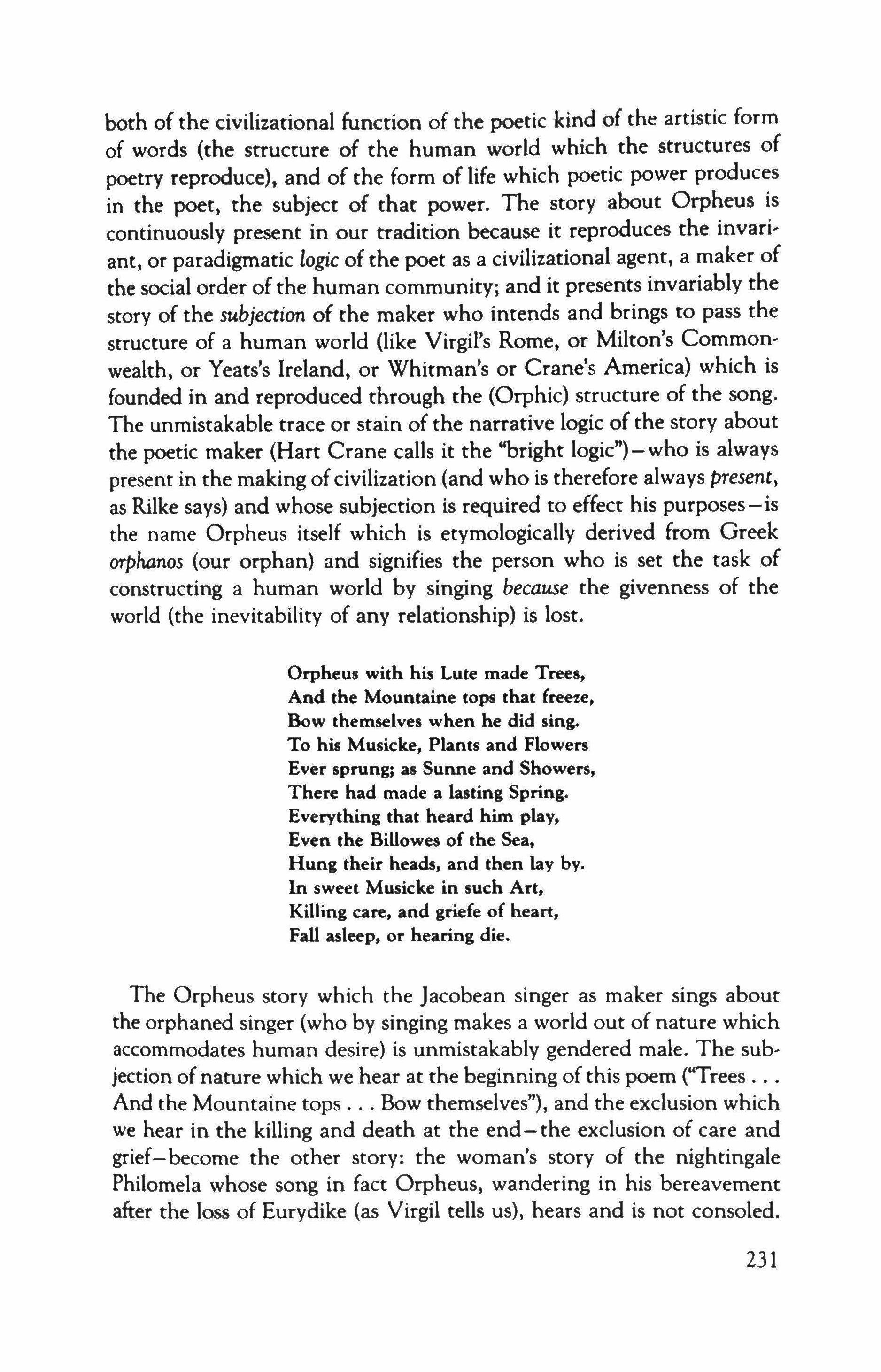
both of the civilizational function of the poetic kind of the artistic form of words (the structure of the human world which the structures of poetry reproduce), and of the form of life which poetic power produces in the poet, the subject of that power. The story about Orpheus is continuously present in our tradition because it reproduces the invariant, or paradigmatic logic of the poet as a civilizational agent, a maker of the social order of the human community; and it presents invariably the story of the subjection of the maker who intends and brings to pass the structure of a human world (like Virgil's Rome, or Milton's Commonwealth, or Yeats's Ireland, or Whitman's or Crane's America) which is founded in and reproduced through the (Orphic) structure of the song. The unmistakable trace or stain of the narrative logic of the story about the poetic maker (Hart Crane calls it the "bright logic") - who is always present in the making ofcivilization (and who is therefore always present, as Rilke says) and whose subjection is required to effect his purposes - is the name Orpheus itself which is etymologically derived from Greek orphanos (our orphan) and signifies the person who is set the task of constructing a human world by singing because the givenness of the world (the inevitability of any relationship) is lost.
Orpheus with his Lute made Trees, And the Mountaine tops that freeze, Bow themselves when he did sing. To his Musicke, Plants and Flowers Ever sprung; al Sunne and Showers, There had made a lasting Spring. Everything that heard him play, Even the BiUowes of the Sea, Hung their heads, and then lay by. In sweet Musicke in such Art, Killing care, and griefe of heart, Fall asleep, or hearing die.
The Orpheus story which the Jacobean singer as maker sings about the orphaned singer (who by singing makes a world out of nature which accommodates human desire) is unmistakably gendered male. The subjection of nature which we hear at the beginning of this poem ("Trees And the Mountaine tops Bow themselves"), and the exclusion which we hear in the killing and death at the end-the exclusion of care and grief - become the other story: the woman's story of the nightingale Philomela whose song in fact Orpheus, wandering in his bereavement after the loss of Eurydike (as Virgil tells us), hears and is not consoled.
231

Month in, month out, seven whole months, men say beneath a skevev cliff by lonely Strvmon's shore [Orpheus) wept, and deep in icy caverns, unfolding this his tale, charming tigers, and making the oaks attend his strain; even as the nightingale, mourning beneath the poplar's shade, bewails the loss of her brood, that a churlish ploughman hath espied and tom unfledged from the nest: but she weeps all night long and, perched on a spray, renews her piteous strain, filling the region with sad laments.
Philomela's song (the nightingale's song) is omnipresent in history in the same way that pain is omnipresent in history (and therefore mythographically older than Orphic logic, because always already there even for Orpheus in his pain), and is the female gendered response to the Orpheus song, defining the limits of the mastery of Orpheus's song and defining also the reality Orpheus's song subjects, figured as rape and infanticide. We hear Philomela's song in the seventh stanza of Keats's "Ode to a Nightingale" as the high requiem omnipresent in history and constituting the unity of history:
Thou wast not born for death, immortal Bird! No hungry generations tread thee down; The voice I hear this passing night was heard In ancient days by emperor and clown: Perhaps the self-same song that found a path Through the sad heart of Ruth, when sick, for home, She stood in tears amid the alien com; The same that oft-times hath Charmed magic casements, opening on the foam Of perilous seas, in faery lands forlorn.
This invariable song ("self-same," "The same that oft-times") produced as a single word forlorn is the other invariable song counter to the Orpheus song. It is Medea's song, Antigone's song, Sappho's song, Ophelia's song, Dickinson's song, Plath's song; but its word forlorn, though produced (as I argue) by the omnipresence of the civilizational Orpheus song, is also kindred (in the strange kinship of interrupted kinship) to that of Orpheus/orphanos-for both these originary stories of poetic practice are about the overcoming of blocked communication-communication blocked in the social world, the overcoming of which blockage generates the poetry that completes relationship another way in so far as poetry can.
Thus far I have spoken of the Orpheus story, gendered male, as constituting the omnipresent logic of civilizational order in the Westi and I have spoken of the Philomela story, gendered female, as constituting the omnipresent logic of pain. I have observed that these two stories
232

constitute (also) the originary narratives of the production of poetry (indeed of literary production in general in the West), and I have observed that each story (each logic, if there are two) seems both prior to and derived from the other. I will explain and amplify these matters. I wish, however, to dwell for a moment on the fact (as I understand the matter, and have already suggested) that these two stories or story systems function as paradigm stones, or ideal narrative patterns. By "paradigm stories" I mean stories which are transmitted across time and reproduced invariably by reason of their self-sameness, inside which selfsameness there is a logic (the deeply encoded features of the story that make it recognizable and reproducible across time) which bears upon poetic practice-yours and mine. Orpheus is always a civilizational hero who there/ore loses Eurydike and as a consequence sings with greater power. ("Once and for all / It's Orpheus when there's singing.' Philomela is always violated, infanticidal and in pain, as a result of which her song becomes, as Keats reminds us, a principle of universality in history. As poets, and writers, we are committed to poetic practice. The reason for my presentation of the myths and paradigms of that practice is to articulate its logic and to give an account of the implication of that logic for our practice-which has in any case been put severely in question elsewhere in the culture. At the end of this lecture I will introduce a myth of our practice and make some inferences about our situation.
II
But first I want to frame these stories by a larger structure of concern which contains them and is stated by them. What concerns me is the following: looking from the scene of our practice back at the paradigms-Orpheus and Philomela-we observe that all the founding stories of poetic discourse, the originary myths of the generation of song, are violent. This violence-indeed atrocity-so deeply encoded in the poetic logic of Western Civilization can be specified: it arises primarily within a life-and-death struggle, or warfare (generally, gods on one side and humankind on the other), between sponsors of competing descriptions of the human fact, the person who is the subject of art. Thus, the practice of art is urgent and dangerous, and (because the warfare is both external and internal to the mind of the maker) alienating. What is at stake in the competition for the power of description of human being is the value and status of the person in the cosmos and social order. The champion on the human part is the poet. For this reason, all poetic
233
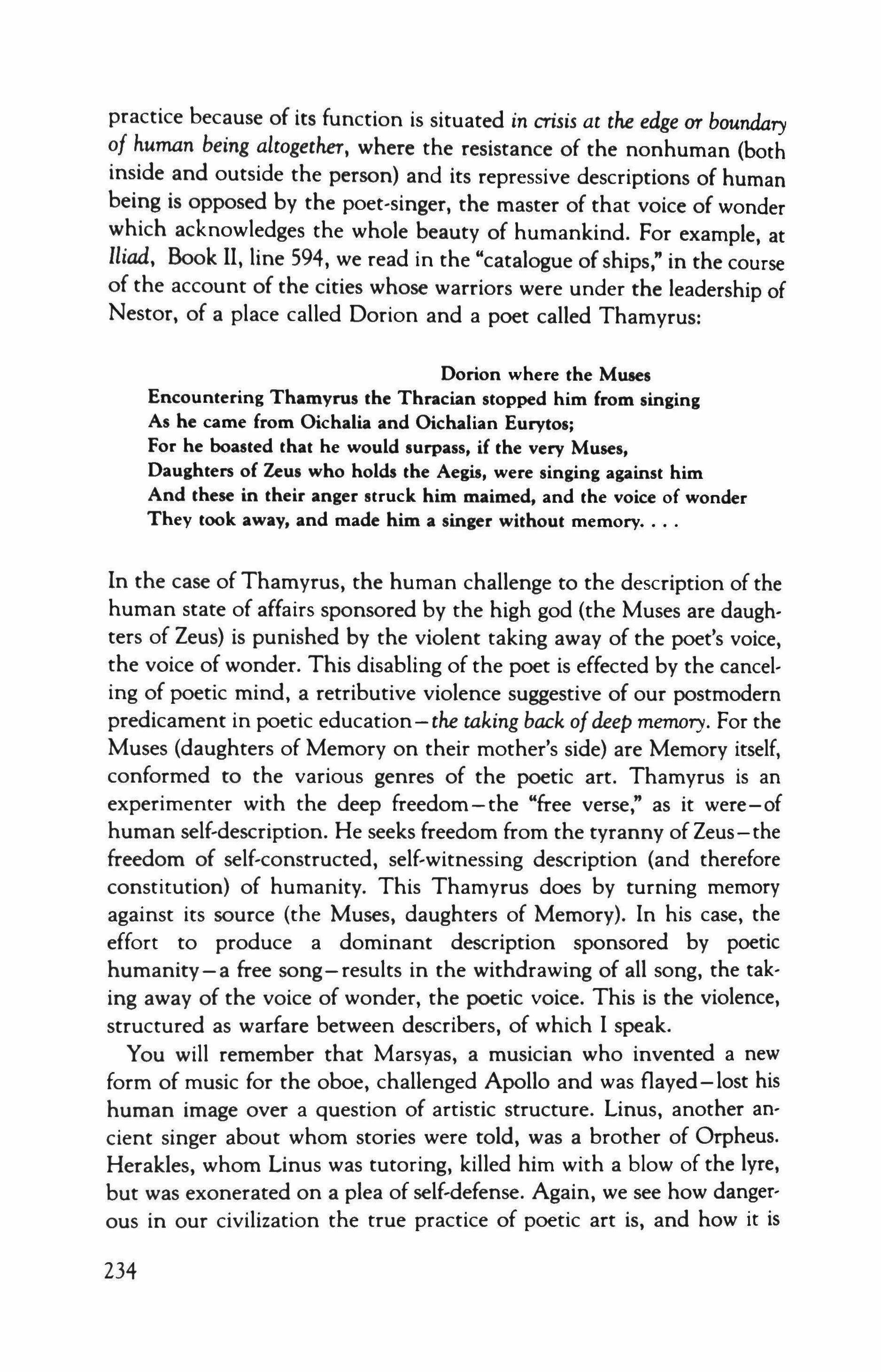
practice because of its function is situated in crisis at the edge or boundary of human being altogether, where the resistance of the nonhuman (both inside and outside the person) and its repressive descriptions of human being is opposed by the poet-singer, the master of that voice of wonder which acknowledges the whole beauty of humankind. For example, at Iliad, Book II, line 594, we read in the "catalogue of ships," in the course of the account of the cities whose warriors were under the leadership of Nestor, of a place called Dorion and a poet called Thamyrus:
Dorion where the Muses
Encountering Thamvrus the Thracian stopped him from singing
As he came from Oichalia and Oichalian Eurytos; For he boasted that he would surpass, if the very Muses, Daughters of Zeus who holds the Aegis, were singing against him And these in their anger struck him maimed, and the voice of wonder They took away, and made him a singer without memory
In the case of Thamyrus, the human challenge to the description of the human state of affairs sponsored by the high god (the Muses are daughters of Zeus) is punished by the violent taking away of the poet's voice, the voice of wonder. This disabling of the poet is effected by the canceling of poetic mind, a retributive violence suggestive of our postmodern predicament in poetic education-the taking back ofdeep memory. For the Muses (daughters of Memory on their mother's side) are Memory itself, conformed to the various genres of the poetic art. Thamyrus is an experimenter with the deep freedom-the "free verse," as it were-of human self-description. He seeks freedom from the tyranny of Zeus-the freedom of self-constructed, self-witnessing description (and therefore constitution) of humanity. This Thamyrus does by turning memory against its source (the Muses, daughters of Memory). In his case, the effort to produce a dominant description sponsored by poetic humanity-a free song-results in the withdrawing of all song, the taking away of the voice of wonder, the poetic voice. This is the violence, structured as warfare between describers, of which I speak.
You will remember that Marsyas, a musician who invented a new form of music for the oboe, challenged Apollo and was flayed-lost his human image over a question of artistic structure. Linus, another ancient singer about whom stories were told, was a brother of Orpheus. Herakles, whom Linus was tutoring, killed him with a blow of the lyre, but was exonerated on a plea of self-defense. Again, we see how dangerous in our civilization the true practice of poetic art is, and how it is
234
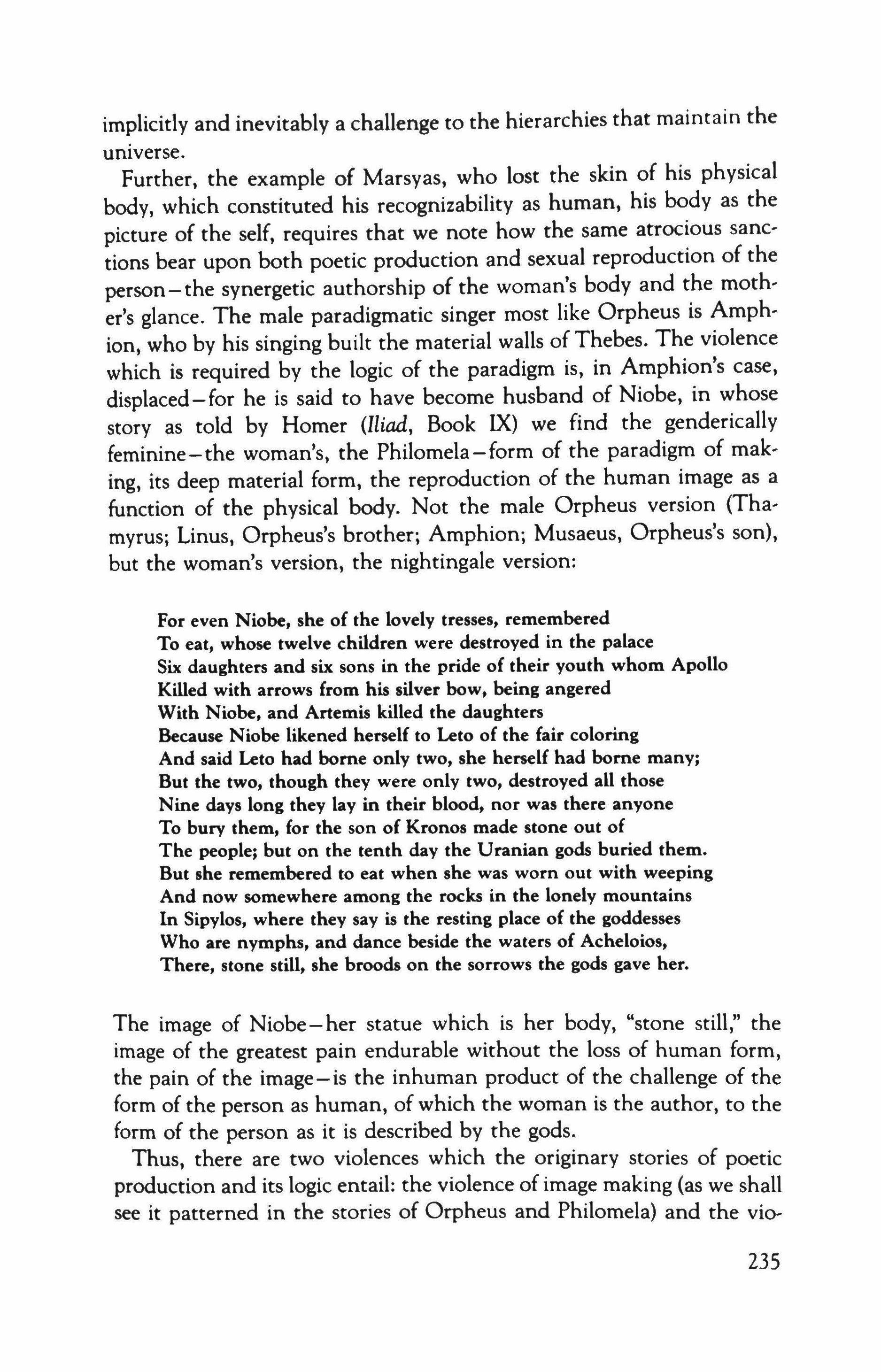
implicitly and inevitably a challenge to the hierarchies that maintain the universe.
Further, the example of Marsyas, who lost the skin of his physical body, which constituted his recognizability as human, his body as the picture of the self, requires that we note how the same atrocious sanetions bear upon both poetic production and sexual reproduction of the person - the synergetic authorship of the woman's body and the mother's glance. The male paradigmatic singer most like Orpheus is Amphion, who by his singing built the material walls of Thebes. The violence which is required by the logic of the paradigm is, in Amphion's case, displaced-for he is said to have become husband of Niobe, in whose story as told by Homer (Iliad, Book IX) we find the genderically feminine - the woman's, the Philomela - form of the paradigm of making, its deep material form, the reproduction of the human image as a function of the physical body. Not the male Orpheus version (Thamyrus; Linus, Orpheus's brother; Amphion; Musaeus, Orpheus's son), but the woman's version, the nightingale version:
For even Niobe, she of the lovely tresses, remembered To eat, whose twelve children were destroyed in the palace Six daughters and six sons in the pride of their youth whom Apollo Killed with arrows from his silver bow, being angered With Niobe, and Artemis killed the daughters Because Niobe likened herself to Leto of the fair coloring And said Leto had bome only two, she herself had bome many; But the two, though they were only two, destroyed all those Nine days long they lay in their blood, nor was there anyone To bury them, for the son of Kronos made stone out of The people; but on the tenth day the Uranian gods buried them. But she remembered to eat when she was worn out with weeping And now somewhere among the rocks in the lonely mountains In Sipylos, where they say is the resting place of the goddesses Who are nymphs, and dance beside the waters of Acheloios, There, stone still, she broods on the sorrows the gods gave her.
The image of Niobe-her statue which is her body, "stone still," the image of the greatest pain endurable without the loss of human form, the pain of the image-is the inhuman product of the challenge of the form of the person as human, of which the woman is the author, to the form of the person as it is described by the gods. Thus, there are two violences which the originary stories of poetic production and its logic entail: the violence of image making (as we shall see it patterned in the stories of Orpheus and Philomela) and the vio-
235
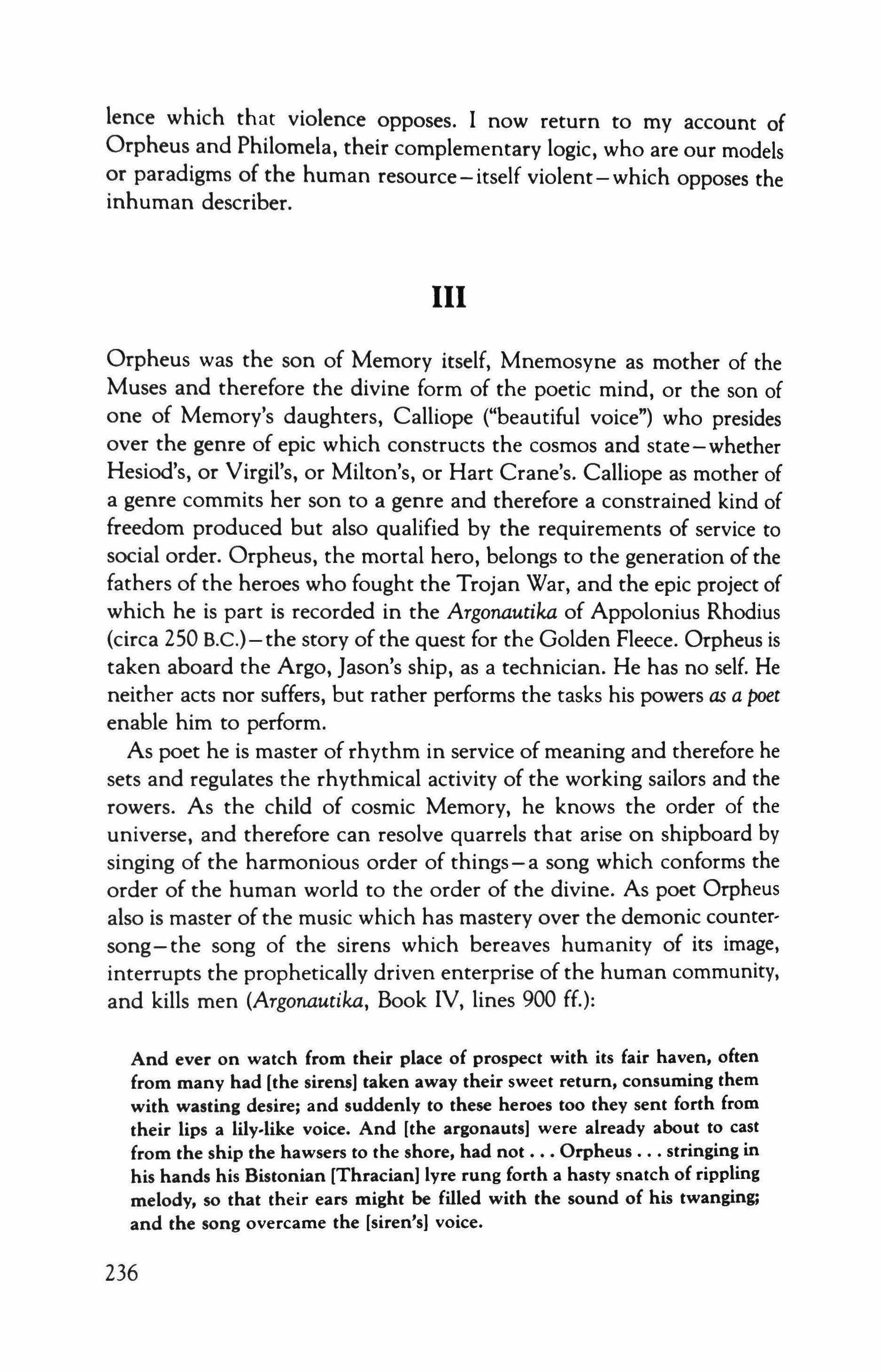
lence which that violence opposes. I now return to my account of Orpheus and Philomela, their complementary logic, who are our models or paradigms of the human resource - itself violent - which opposes the inhuman describer.
III
Orpheus was the son of Memory itself, Mnemosyne as mother of the Muses and therefore the divine form of the poetic mind, or the son of one of Memory's daughters, Calliope ("beautiful voice") who presides over the genre of epic which constructs the cosmos and state-whether Hesiod's, or Virgil's, or Milton's, or Hart Crane's. Calliope as mother of a genre commits her son to a genre and therefore a constrained kind of freedom produced but also qualified by the requirements of service to social order. Orpheus, the mortal hero, belongs to the generation of the fathers of the heroes who fought the Trojan War, and the epic project of which he is part is recorded in the Argonautika of Appolonius Rhodius (circa 250 B.C.)-the story of the quest for the Golden Fleece. Orpheus is taken aboard the Argo, Jason's ship, as a technician. He has no self. He neither acts nor suffers, but rather performs the tasks his powers as a poet enable him to perform.
As poet he is master of rhythm in service of meaning and therefore he sets and regulates the rhythmical activity of the working sailors and the rowers. As the child of cosmic Memory, he knows the order of the universe, and therefore can resolve quarrels that arise on shipboard by singing of the harmonious order of things - a song which conforms the order of the human world to the order of the divine. As poet Orpheus also is master of the music which has mastery over the demonic countersong-the song of the sirens which bereaves humanity of its image, interrupts the prophetically driven enterprise of the human community, and kills men (Argonautika, Book IV, lines 900 ff.):
And ever on watch from their place of prospect with its fair haven, often from many had [the sirens) taken away their sweet return, consuming them with wasting desire; and suddenly to these heroes too they sent forth from their lips a lily-like voice. And [the argonauts) were already about to cast from the ship the hawsers to the shore, had not Orpheus stringing in his hands his Bistonian [Thracian) lyre rung forth a hasty snatch of rippling melody, so that their ears might be filled with the sound of his twanging; and the song overcame the [siren's) voice.
236
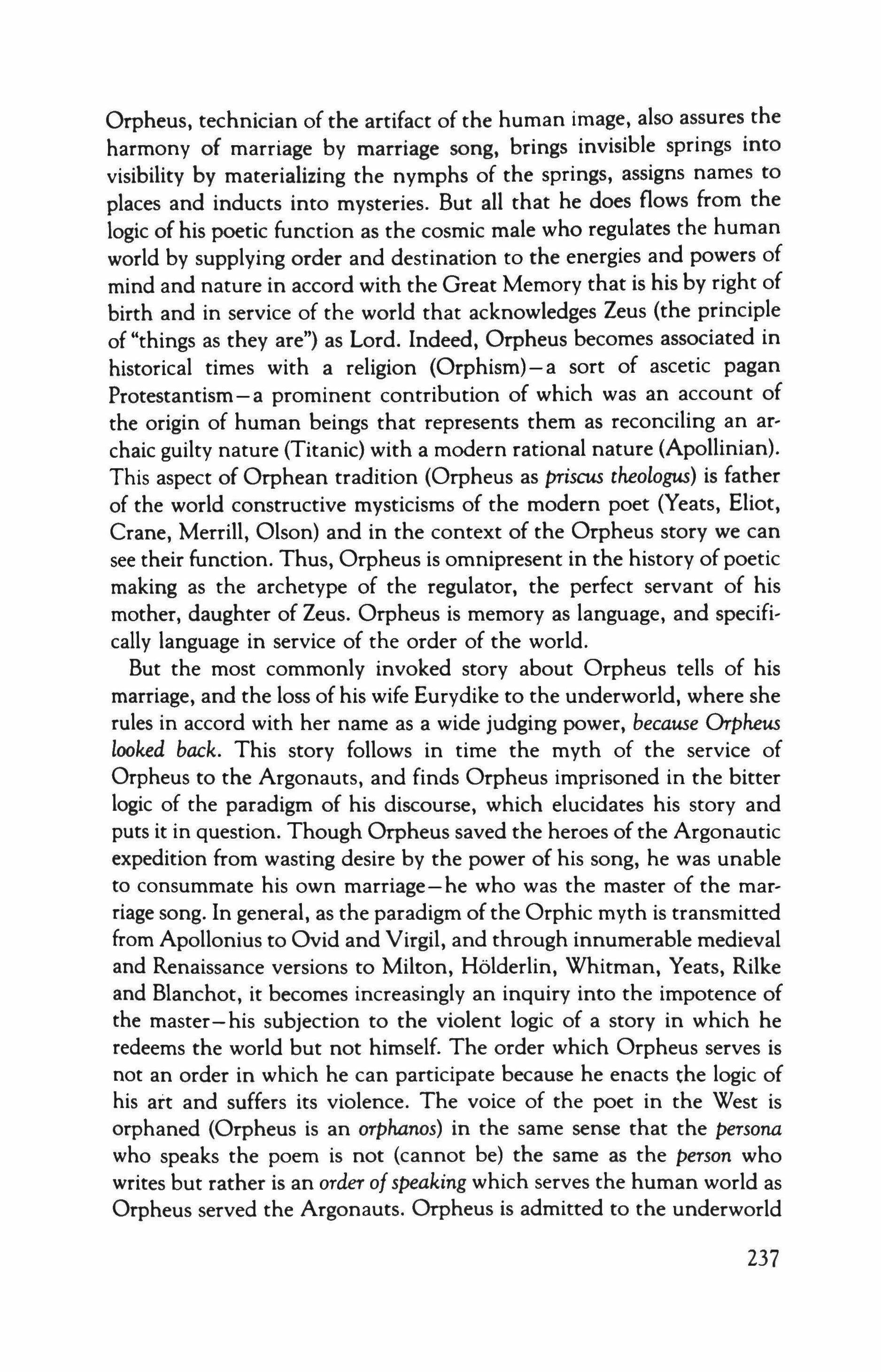
Orpheus, technician of the artifact of the human image, also assures the harmony of marriage by marriage song, brings invisible springs into visibility by materializing the nymphs of the springs, assigns names to places and inducts into mysteries. But all that he does flows from the logic of his poetic function as the cosmic male who regulates the human world by supplying order and destination to the energies and powers of mind and nature in accord with the Great Memory that is his by right of birth and in service of the world that acknowledges Zeus (the principle of "things as they are") as Lord. Indeed, Orpheus becomes associated in historical times with a religion (Orphism) - a sort of ascetic pagan Protestantism - a prominent contribution of which was an account of the origin of human beings that represents them as reconciling an archaic guilty nature (Titanic) with a modern rational nature (Apollinian). This aspect of Orphean tradition (Orpheus as ptiscus theologus) is father of the world constructive mysticisms of the modern poet (Yeats, Eliot, Crane, Merrill, Olson) and in the context of the Orpheus story we can see their function. Thus, Orpheus is omnipresent in the history of poetic making as the archetype of the regulator, the perfect servant of his mother, daughter of Zeus. Orpheus is memory as language, and specifically language in service of the order of the world.
But the most commonly invoked story about Orpheus tells of his marriage, and the loss of his wife Eurydike to the underworld, where she rules in accord with her name as a wide judging power, because Orpheus looked back. This story follows in time the myth of the service of Orpheus to the Argonauts, and finds Orpheus imprisoned in the bitter logic of the paradigm of his discourse, which elucidates his story and puts it in question. Though Orpheus saved the heroes of the Argonautic expedition from wasting desire by the power of his song, he was unable to consummate his own marriage-he who was the master of the marriage song. In general, as the paradigm of the Orphic myth is transmitted from Apollonius to Ovid and Virgil, and through innumerable medieval and Renaissance versions to Milton, Holderlin, Whitman, Yeats, Rilke and Blanchot, it becomes increasingly an inquiry into the impotence of the master- his subjection to the violent logic of a story in which he redeems the world but not himself. The order which Orpheus serves is not an order in which he can participate because he enacts the logic of his art and suffers its violence. The voice of the poet in the West is orphaned (Orpheus is an orphanos) in the same sense that the persona who speaks the poem is not (cannot be) the same as the person who writes but rather is an order ofspeaking which serves the human world as Orpheus served the Argonauts. Orpheus is admitted to the underworld
237
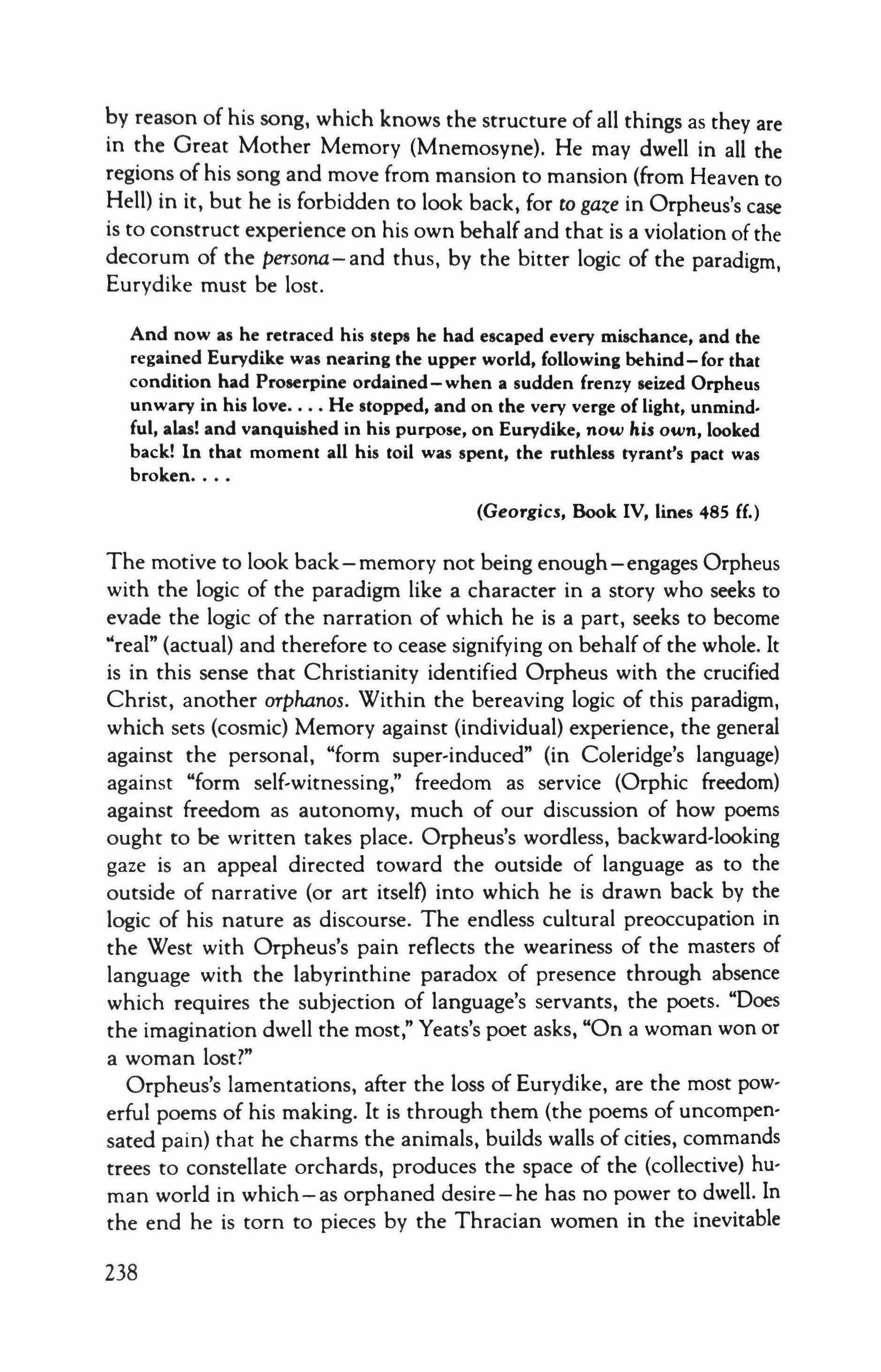
by reason of his song, which knows the structure of all things as they are in the Great Mother Memory (Mnemosyne). He may dwell in all the regions of his song and move from mansion to mansion (from Heaven to Hell) in it, but he is forbidden to look back, for to gaze in Orpheus's case is to construct experience on his own behalf and that is a violation ofthe decorum of the persona- and thus, by the bitter logic of the paradigm, Eurvdike must be lost.
And now as he retraced his steps he had escaped every mischance, and the regained Eurvdike was nearing the upper world, following behind-for that condition had Proserpine ordained - when a sudden frenzy seized Orpheus unwary in his love He stopped, and on the very verge of light, unmindful, alas! and vanquished in his purpose, on Eurvdike, now hiJ own, looked back! In that moment all his toil was spent, the ruthless tyrant's pact was broken
(Georgie!, Book IV, lines 485 ff.)
The motive to look back-memory not being enough-engages Orpheus with the logic of the paradigm like a character in a story who seeks to evade the logic of the narration of which he is a part, seeks to become "real" (actual) and therefore to cease signifying on behalf of the whole. It is in this sense that Christianity identified Orpheus with the crucified Christ, another orphanos. Within the bereaving logic of this paradigm, which sets (cosmic) Memory against (individual) experience, the general against the personal, "form super-induced" (in Coleridge's language) against "form self-witnessing," freedom as service (Orphic freedom) against freedom as autonomy, much of our discussion of how poems ought to be written takes place. Orpheus's wordless, backward,looking gaze is an appeal directed toward the outside of language as to the outside of narrative (or art itself) into which he is drawn back by the logic of his nature as discourse. The endless cultural preoccupation in the West with Orpheus's pain reflects the weariness of the masters of language with the labyrinthine paradox of presence through absence which requires the subjection of language's servants, the poets. "Does the imagination dwell the most," Yeats's poet asks, "On a woman won or a woman lost?"
Orpheus's lamentations, after the loss of Eurvdike, are the most pow, erful poems of his making. It is through them (the poems of uncompensated pain) that he charms the animals, builds walls of cities, commands trees to constellate orchards, produces the space of the (collective) human world in which-as orphaned desire-he has no power to dwell. In the end he is torn to pieces by the Thracian women in the inevitable
238
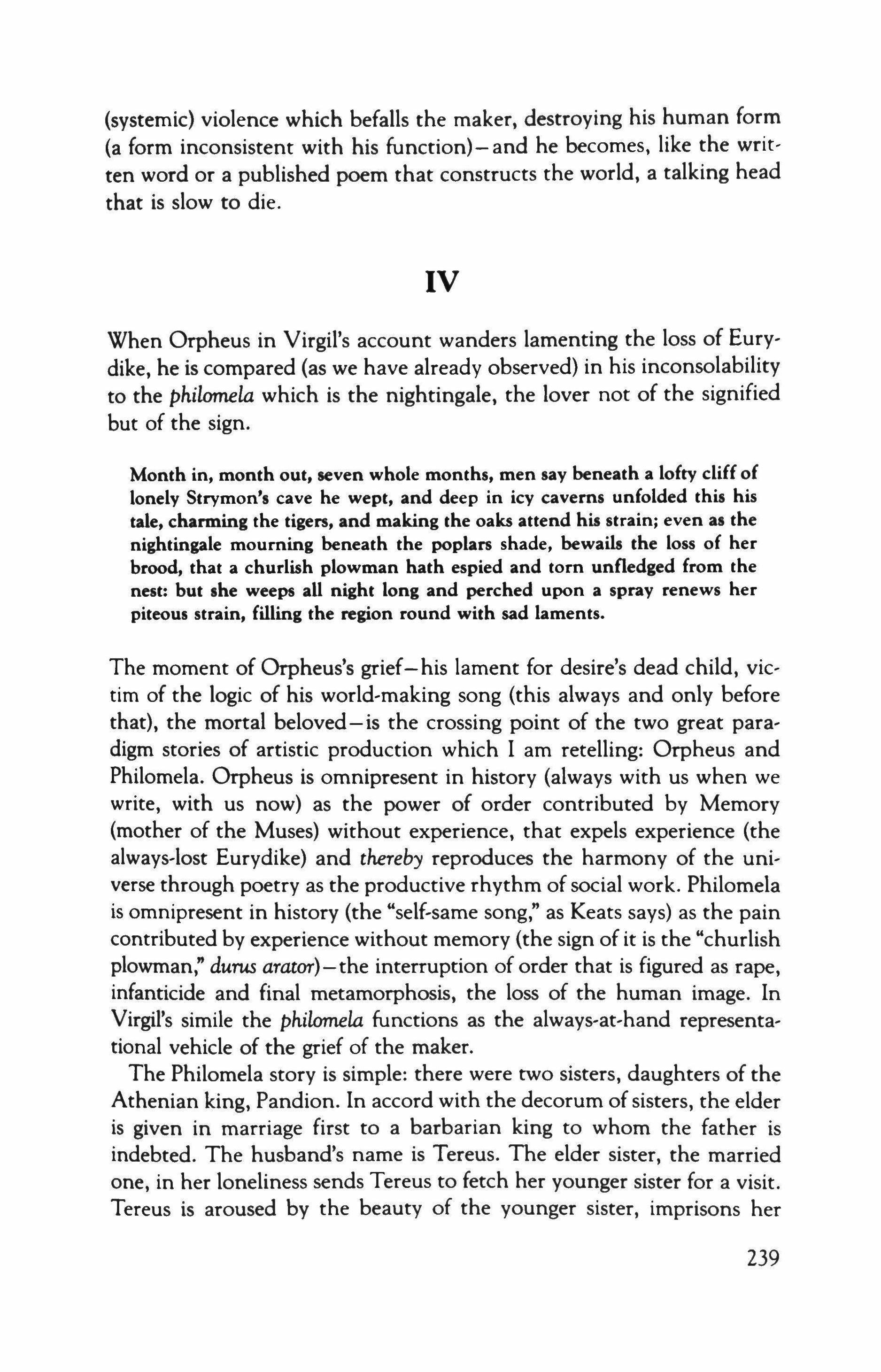
(systemic) violence which befalls the maker, destroying his human form (a form inconsistent with his function)- and he becomes, like the written word or a published poem that constructs the world, a talking head that is slow to die.
IV
When Orpheus in Virgil's account wanders lamenting the loss of Eurvdike, he is compared (as we have already observed) in his inconsolability to the philomela which is the nightingale, the lover not of the signified but of the sign.
Month in, month out, seven whole months, men say beneath a lofty cliff of lonely Strymon's cave he wept, and deep in icy caverns unfolded this his tale, charming the tigers, and making the oaks attend his strain; even as the nightingale mourning beneath the poplars shade, bewails the loss of her brood, that a churlish plowman hath espied and torn unfledged from the nest: but she weeps aU night long and perched upon a spray renews her piteous strain, filling the region round with sad laments.
The moment of Orpheus's grief-his lament for desire's dead child, victim of the logic of his world-making song (this always and only before that), the mortal beloved-is the crossing point of the two great paradigm stories of artistic production which I am retelling: Orpheus and Philomela. Orpheus is omnipresent in history (always with us when we write, with us now) as the power of order contributed by Memory (mother of the Muses) without experience, that expels experience (the always-lost Eurvdike) and thereby reproduces the harmony of the universe through poetry as the productive rhythm of social work. Philomela is omnipresent in history (the "self-same song," as Keats says) as the pain contributed by experience without memory (the sign of it is the "churlish plowman," durus arator)-the interruption of order that is figured as rape, infanticide and final metamorphosis, the loss of the human image. In Virgil's simile the philomela functions as the always-at-hand representational vehicle of the grief of the maker.
The Philomela story is simple: there were two sisters, daughters of the Athenian king, Pandion. In accord with the decorum of sisters, the elder is given in marriage first to a barbarian king to whom the father is indebted. The husband's name is Tereus. The elder sister, the married one, in her loneliness sends Tereus to fetch her younger sister for a visit. Tereus is aroused by the beauty of the younger sister, imprisons her
239
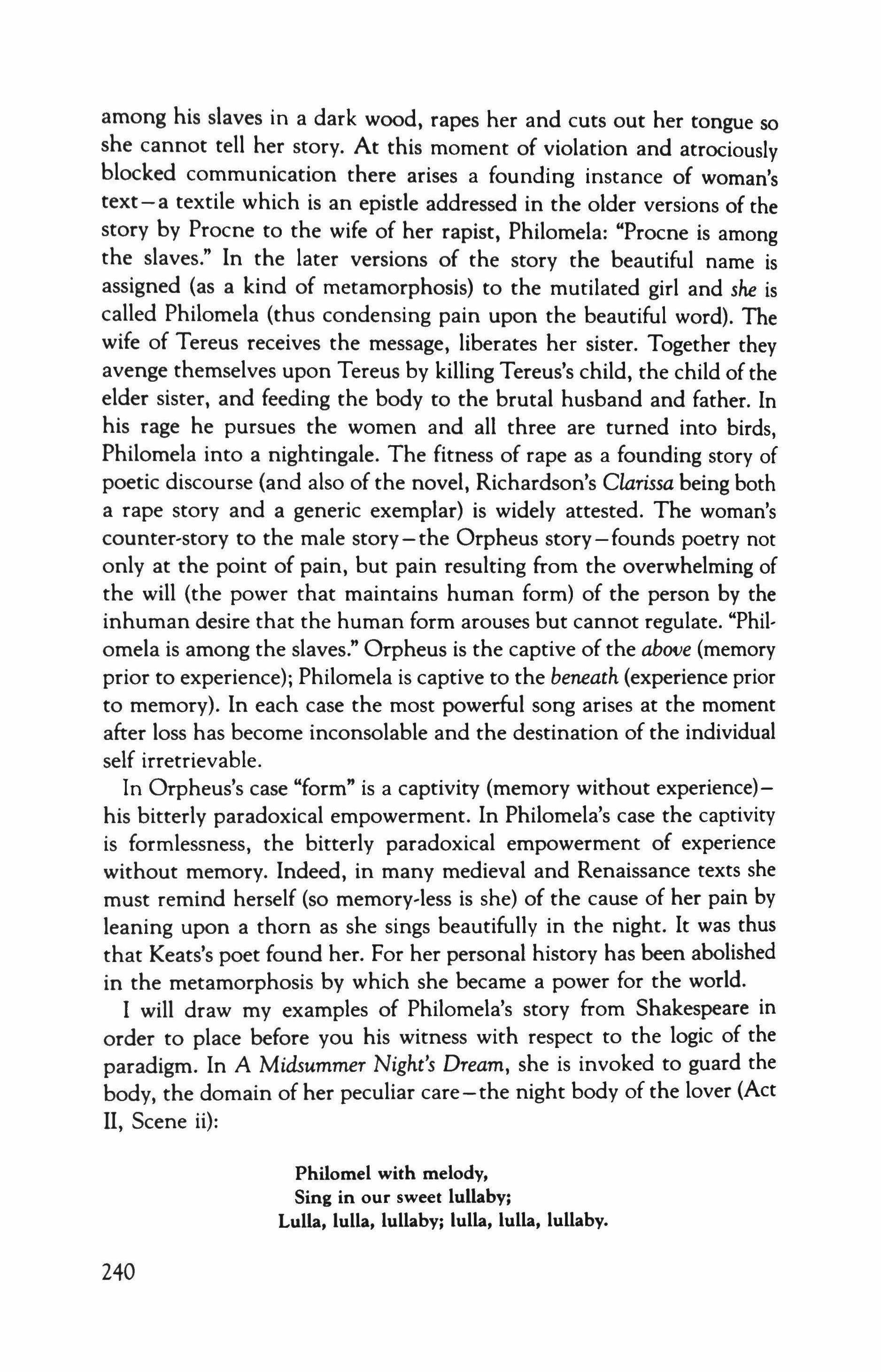
among his slaves in a dark wood, rapes her and cuts out her tongue so she cannot tell her story. At this moment of violation and atrociously blocked communication there arises a founding instance of woman's text - a textile which is an epistle addressed in the older versions of the story by Procne to the wife of her rapist, Philomela: "Procne is among the slaves." In the later versions of the story the beautiful name is assigned (as a kind of metamorphosis) to the mutilated girl and she is called Philomela (thus condensing pain upon the beautiful word). The wife of Tereus receives the message, liberates her sister. Together they avenge themselves upon Tereus by killing Tereus's child, the child of the elder sister, and feeding the body to the brutal husband and father. In his rage he pursues the women and all three are turned into birds, Philomela into a nightingale. The fitness of rape as a founding story of poetic discourse (and also of the novel, Richardson's Clarissa being both a rape story and a generic exemplar) is widely attested. The woman's counter-story to the male story-the Orpheus story-founds poetry not only at the point of pain, but pain resulting from the overwhelming of the will (the power that maintains human form) of the person by the inhuman desire that the human form arouses but cannot regulate. "Philomela is among the slaves." Orpheus is the captive of the above (memory prior to experience); Philomela is captive to the beneath (experience prior to memory). In each case the most powerful song arises at the moment after loss has become inconsolable and the destination of the individual self irretrievable.
In Orpheus's case "form" is a captivity (memory without experience)his bitterly paradoxical empowerment. In Philomela's case the captivity is formlessness, the bitterly paradoxical empowerment of experience without memory. Indeed, in many medieval and Renaissance texts she must remind herself (so memory-less is she) of the cause of her pain by leaning upon a thorn as she sings beautifully in the night. It was thus that Keats's poet found her. For her personal history has been abolished in the metamorphosis by which she became a power for the world.
I will draw my examples of Philomela's story from Shakespeare in order to place before you his witness with respect to the logic of the paradigm. In A Midsummer Night's Dream, she is invoked to guard the body, the domain of her peculiar care-the night body of the lover (Act II, Scene ii):
Philomel with melody, Sing in our sweet lullaby; Lulla, lulla, lullaby; lulla, lulla, lullaby.
240
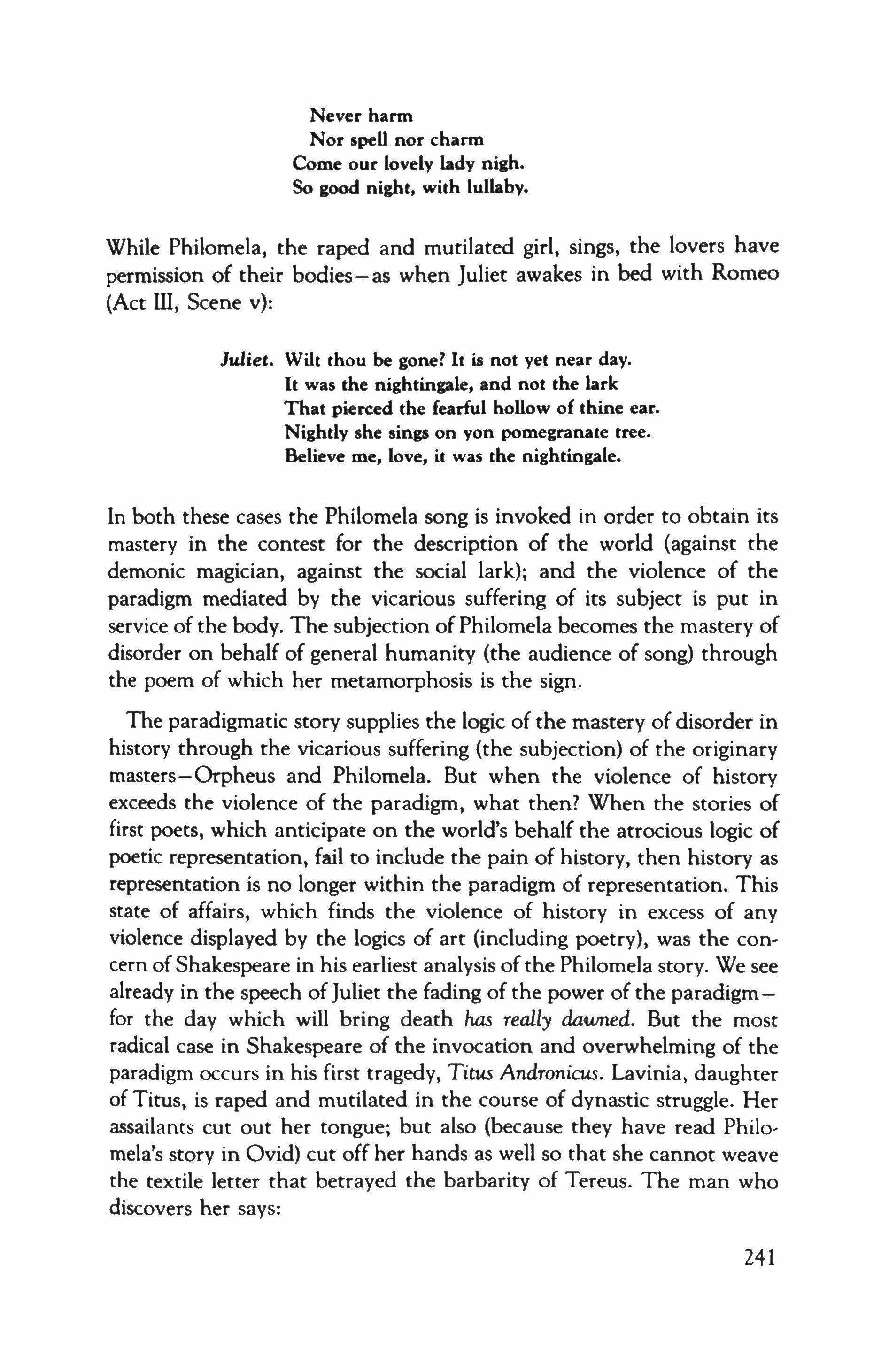
Never harm
Nor spell nor charm
Come our lovely lady nigh. So good night, with lullaby.
While Philomela, the raped and mutilated girl, sings, the lovers have permission of their bodies-as when Juliet awakes in bed with Romeo (Act ill, Scene v):
Juliet. Wilt thou be gone? It is not yet near day. It was the nightingale, and not the lark That pierced the fearful hollow of thine ear. Nightly she sings on yon pomegranate tree. Believe me, love, it was the nightingale.
In both these cases the Philomela song is invoked in order to obtain its mastery in the contest for the description of the world (against the demonic magician, against the social lark); and the violence of the paradigm mediated by the vicarious suffering of its subject is put in service of the body. The subjection of Philomela becomes the mastery of disorder on behalf of general humanity (the audience of song) through the poem of which her metamorphosis is the sign.
The paradigmatic story supplies the logic of the mastery of disorder in history through the vicarious suffering (the subjection) of the originary masters-Orpheus and Philomela. But when the violence of history exceeds the violence of the paradigm, what then? When the stories of first poets, which anticipate on the world's behalf the atrocious logic of poetic representation, fail to include the pain of history, then history as representation is no longer within the paradigm of representation. This state of affairs, which finds the violence of history in excess of any violence displayed by the logics of art (including poetry), was the concern of Shakespeare in his earliest analysis of the Philomela story. We see already in the speech ofJuliet the fading of the power of the paradigmfor the day which will bring death has really dawned. But the most radical case in Shakespeare of the invocation and overwhelming of the paradigm occurs in his first tragedy, Titus Andronicus. Lavinia, daughter of Titus, is raped and mutilated in the course of dynastic struggle. Her assailants cut out her tongue; but also (because they have read Philomela's story in Ovid) cut off her hands as well so that she cannot weave the textile letter that betrayed the barbarity of Tereus. The man who discovers her says:
241
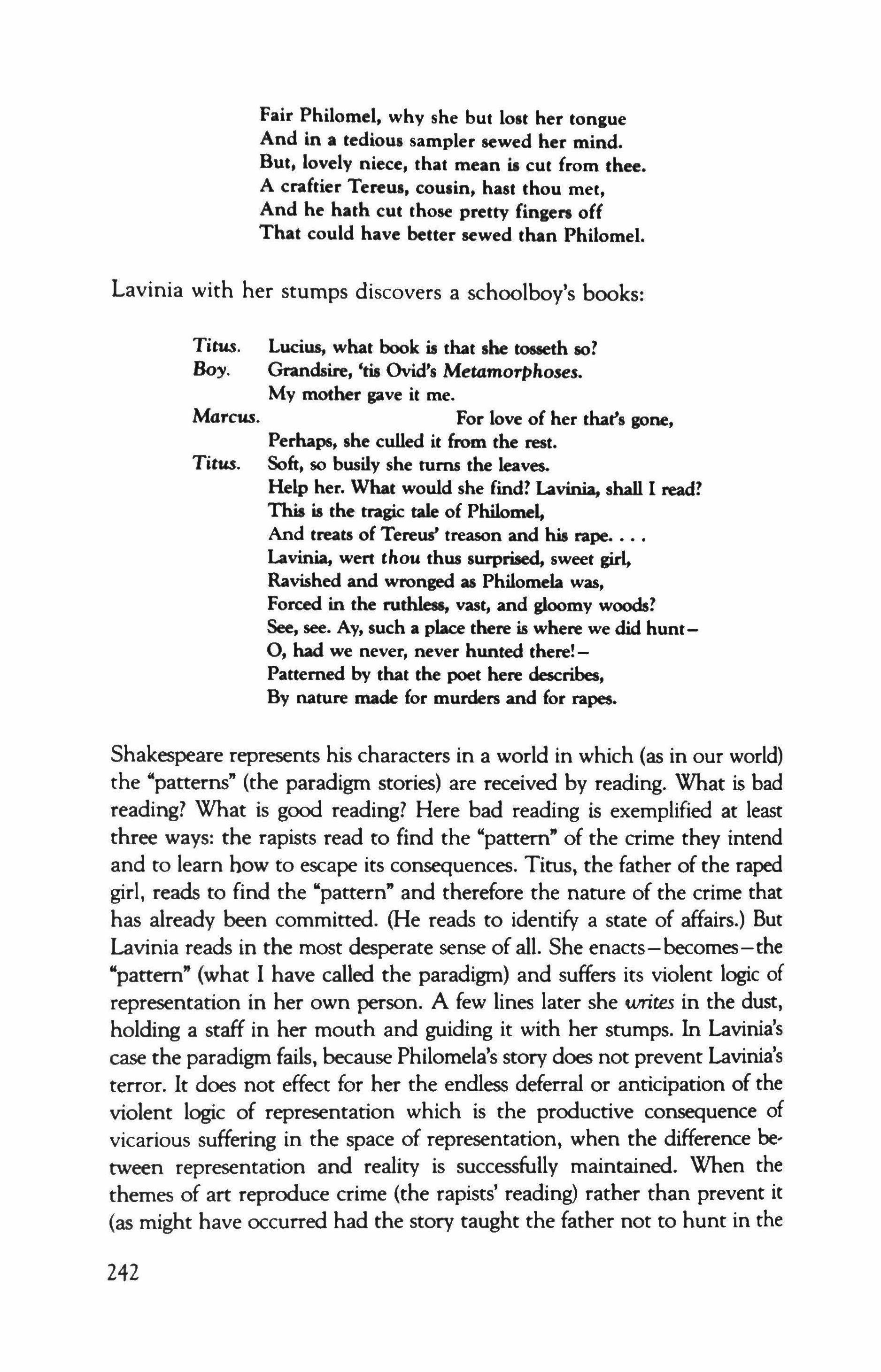
Fair Philomel, why she but lost her tongue And in a tedious sampler sewed her mind. But, lovely niece, that mean is cut from thee. A craftier Tereus, cousin, hast thou met, And he hath cut those pretty fingen 0(( That could have better sewed than Philomel.
Lavinia with her stumps discovers a schoolboy's books:
Titus. Lucius, what book is that she toueth so? Boy. Grandaire, 'tis Ovid's Metamorphoses. My mother gave it me.
Marcus. For love of her that's gone, Perhaps, she culled it from the rest. Titus. Soft, so busily she turns the leaves.
Help her. What would she find? Lavinia, shaUl read? This is the tragic tale of Philomel, And treats of Tereus' treason and his rape.
Lavinia, wert thou thus surprised, sweet girl, Ravished and wronged as Philomela was, Forced in the ruthlesa, vast, and gloomy woods? See, see. Ay, such a place there is where we did hunt0, had we never, never hunted there!Patterned by that the poet here describes, By nature made for murden and for rapes.
Shakespeare represents his characters in a world in which (as in our world) the "patterns" (the paradigm stories) are received by reading. What is bad reading? What is good reading? Here bad reading is exemplified at least three ways: the rapists read to find the "pattern" of the crime they intend and to learn how to escape its consequences. Titus, the father of the raped girl, reads to find the "pattern" and therefore the nature of the crime that has already been committed. (He reads to identify a state of affairs.) But Lavinia reads in the most desperate sense of all. She enacts-becomes-the "pattern" (what I have called the paradigm) and suffers its violent logic of representation in her own person. A few lines later she turites in the dust, holding a staff in her mouth and guiding it with her stumps. In Lavinia's case the paradigm fails, because Philomela's story does not prevent Lavinia's terror. It does not effect for her the endless deferral or anticipation of the violent logic of representation which is the productive consequence of vicarious suffering in the space of representation, when the difference between representation and reality is successfully maintained. When the themes of art reproduce crime (the rapists' reading) rather than prevent it (as might have occurred had the story taught the father not to hunt in the
242

"ruthless, vast and gloomy woods")-when, in short, the pattern becomes the fact - the pain of the paradigm becomes the pain of history and the competition for the description of the human world is lost to the energies that do not know human form (the durus arator), which clearly include the energies (together with their logic) that construct the human form-because the logic ofrepresentation is unendurable by the natural person. When the difference between representation and reality is lost, then we are all with Philomela among the slaves.
As we move from the Philomela of A Midsummer Night's Dream to the Philomela of Titus Andronicus (backward along the track of the Philomela narrative and backward through the history of Shakespeare's production) we move also from a song that is situated in the difference between art and life (the song sung by "fairies" who signify that difference) to the Philomela enactment of Lavinia in which no such difference can be made. The story Lavinia suffers in her own person is exactly a founding story of representation. Rape founds poetry because it is the radical challenge to the woman's self-characterization as human - the ultimate assault by the violence of the alien describer which drives into existence the counter-power on behalf of the woman's body and name: Philomela's letter and Philomela's song. Because the poetry, gendered female, is driven into existence by the body's pain (pain being the indescribability of the body, the final conquest of the alien describer of which "nuclear warfare" is one dire signifier) we must take care, for example in articulating a constructive program of our art and of our reception of art, not to abolish the difference between the paradigm and the reality even in the interest, as we may conceive, of the body. The poetry which facilitates the peace of the body is not a poetry without violence and alienation; but it is a poetry that by reason of the productive powers of alienation keeps the human image by keeping the difference of the counter-story to history, which is one of our few great allies against the force which would reduce us to the ash of its indifference-"so rudely forced."
Our Anglo-American poetry since Keats and Emily Dickinson tends toward the female model-the lyric, Philomela kind, the pain story-which engages the contest of describers at the point of threat to individual selfinvention. Orpheus, by contrast, the cosmic singer, the male epic-master alienated to the above, the technician of the social order, has become the implicit enemy of our project, especially in his high modern (for example, Yeatsian) character. The moment in the English poetic system which projects the (postmodern) crisis of the Orpheus paradigm is Milton's account in "Lvcidas" of the last segment of Orpheus's story: the segment of the Orpheus story which finds him expelled from personal life (and finally from
243
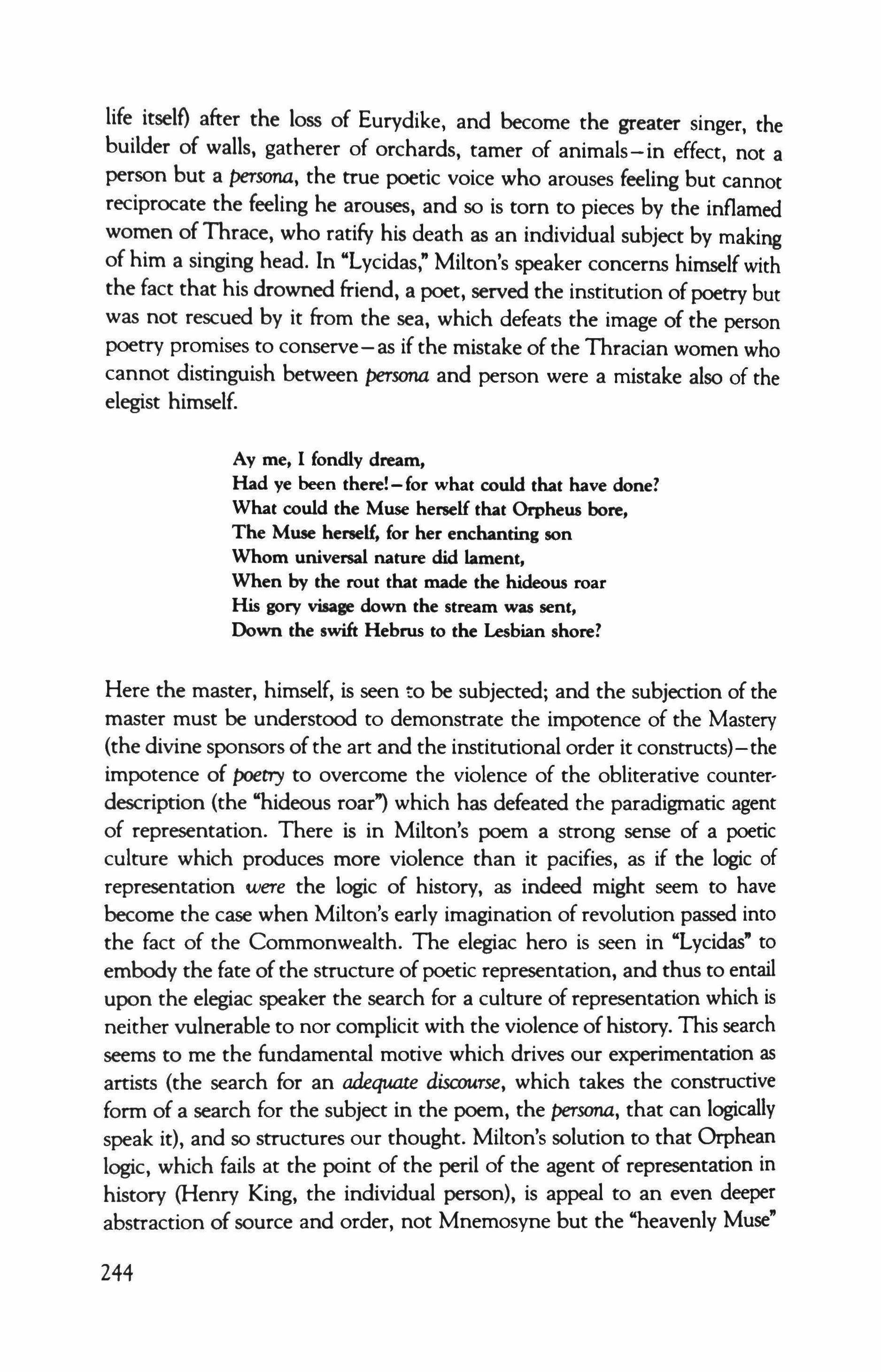
life itself) after the loss of Eurydike, and become the greater singer, the builder of walls, gatherer of orchards, tamer of animals - in effect, not a person but a persona, the true poetic voice who arouses feeling but cannot reciprocate the feeling he arouses, and so is tom to pieces by the inflamed women of Thrace, who ratify his death as an individual subject by making of him a singing head. In "Lvcidas," Milton's speaker concerns himself with the fact that his drowned friend, a poet, served the institution ofpoetry but was not rescued by it from the sea, which defeats the image of the person poetry promises to conserve - as if the mistake of the Thracian women who cannot distinguish between persona and person were a mistake also of the elegist himself.
Ay me, I fondly dream, Had ve been there! - for what could that have done? What could the Muse herself that Orpheus bore, The Muse herself, for her enchanting son Whom universal nature did lament, When by the rout that made the hideous roar His gory vUaBe down the stream was sent, Down the swift Hebrus to the Lesbian shore?
Here the master, himself, is seen to be subjected; and the subjection of the master must be understood to demonstrate the impotence of the Mastery (the divine sponsors ofthe art and the institutional order it constructs}-the impotence of poetry to overcome the violence of the obliterative counterdescription (the "hideous roar") which has defeated the paradigmatic agent of representation. There is in Milton's poem a strong sense of a poetic culture which produces more violence than it pacifies, as if the logic of representation were the logic of history, as indeed might seem to have become the case when Milton's early imagination of revolution passed into the fact of the Commonwealth. The elegiac hero is seen in "Lycidas" to embody the fate of the structure of poetic representation, and thus to entail upon the elegiac speaker the search for a culture of representation which is neither vulnerable to nor complicit with the violence ofhistory. This search seems to me the fundamental motive which drives our experimentation as artists (the search for an adequate discourse, which takes the constructive form of a search for the subject in the poem, the persona, that can logically speak it), and so structures our thought. Milton's solution to that Orphean logic, which fails at the point of the peril of the agent of representation in history (Henry King, the individual person), is appeal to an even deeper abstraction of source and order, not Mnemosyne but the "heavenly Muse"
244

Urania - as at the end of "Lycidas" or in Book VII of Paradise Lost at the beginning:
Still govern thou my song, Urania. and fit audience find, though few. But drive far off the barbarous dissonance Of Bacchus and his revelers, the race Of that wild rout that tore the Thracian bard In Rhodope, where woods and rocks had ears To rapture, till the savage clamor drowned Both harp and voice; nor could the Muse defend Her son. So fail not thou who thee implores; For thou art heav'nly, she an empty dream.
Milton here recomposes the last stage of Orpheus's story as a defeat of the champion of human representation, in the violent warfare ofdescribers, by "barbarous dissonance" and "savage clamor." Then as a poetic practitioner who intends, as an inherently poetic task, the reconstruction of the sufficient conditions of the representation of persons against the dissonant clamor ("barbarous" and "savage") or the demonic counter-powers who do not know the person, Milton summons by invocation a new source, more powerful for persons, Urania. The action of such invocation or "calling" is fundamental to (indeed, constitutive of) the effective cultural practice of the poet, and is the subject of the next lecture in this series. In so far as the "sufficient conditions of the representation of the person" can be accounted for in terms of a subject or agent who produces them, they are implicit in the logic of the founding stories of representation which have been the subject of this lecture. In so far as "the sufficient conditions of the representation of the person" are an appeal to, or restoration of, the facts of the world which the poet supplies to the culture he addresses, and in so far as they entail a specific structure of experience, they are the subject of the third lecture in this series. In any case, it is upon poetic practice, or practices structured like poetic practice, that the maintenance of the human image depends.
In this lecture I have stated (for the purpose of reminding both you and myself) the two paradigms of poetic production inside and between which we do our work as poets-the two stories which register the logic reproduced in our practice. I have laid stress on the genderic maleness of the Orphic story, its reference to the "above" and the great memory of the mother muse who takes historical and generic form as epic, on the function of poetry in the Orphic story as social reconciliation, the provision of productive work, the sanctioning of marriage and especially the defeat of
245

the inhuman form ofhuman energies by the ordering music ofthe lyre as in the overcoming of the sirens. I have also stressed the particular violence figured, for example, as the loss of Eurydike and the dismemberment of Orpheus entailed by the Orphic kind of making of the human world. In discussing the Philomela story, I have laid stress on its genderic femaleness, its reference to the beneath and, in particular, to unregulated energiesexperience without memory - which defeat the will toward the humanity of the body. I have stressed also the originary character of the Philomela story as a founding story ofpoetic reference especially to the body, and the power of poetry which it disposes (for example, in the Shakespearean song "Philomele with melody; toward the protection of the body as in the vulnerability of sleep. In my example from Titus Andronicus, I have articulated the terror which the Philomela story anticipates when the originary (and constructive) violence ofthe paradigm of representation becomes identical with the violence of history at the point of the abandonment of the regulatitJe [unction of practice.
I have framed this discussion within the contest, or warfare, of description-the urgent and always vitally undecided contestation in civilization of the violence of representation against the violence of indifference (figured provisionally as the "hideous roar," or dU7US arator-the hard plowman of history). And I have assumed that representation is ubiquitous, as (and also because) language is ubiquitous in civilization and that therefore the entailments of the "bright" logics of representation are continuous and prior to (for example) the logic of religion (the split tradition of world construction to which I referred at the beginning of this lecture) and that, therefore, the Orpheus and Philomela paradigms are systematically prior to and thematized within traditional religious cultures in the West. In the domain-thus deeply founded-of poetic discourse, violence is entailed in the founding moment of representation when the flesh is made word, as in the case of the first writing of the woman's text: "Philomela is among the slaves." And the same violence is reproduced whenever person is made persona (Orpheus loses Eurvdike), natural language is made poetic language (whether metrical or not), whenever little memory (as in the case of Orpheus) is overwhelmed by big Memory, the particular and personal destination of the self by the general and social, or when (as in the case of Philomela) the self-possessed body encounters experience and overcomes it by metamorphosis to the nonhuman principle of song. We are between the productive violence of representation and the destructive violence of history; only art engaged as practice, or something like it, can keep them apart. But the culture in which we live, including poetic culture, has grown weary of the productive violence (in a sense, the work) ofrepresentation and
246

has tended to identify it for reasons that are not trivial with the violence of history. Only at the point of practice will the matter be clarified, and practice must in my view be governed by vigilant attention to the productive outcomes which Orpheus and Eurvdike in their stories serve.
I will conclude with two examples, themselves originary, of the right functioning of the paradigms, by which you can see how the paradigms become part of human practice. The beginning of every historical literary system is seen to be announced by a "calling" of the person to conformity with the paradigm of the project of poetic representation - "a conversion of the mind" and an empowerment by means ofrepresentation with respect to origins. The story about Caedmon is drawn from Bede's Histary and gives an account of the Orphic commissioning of the first vernacular poet in the tradition of our language:
ICaedmon) had lived in the secular habit until he was well advanced in years and had never learned any songs. Hence sometimes at a feast, when for the sake of providing entertainment, it had been decided that they should all sing in tum, when he saw the harp approaching him, he would rise up in the middle of the feasting, go out, and return home.
On one such occasion when he did so, he left the place of feasting and went to the cattle bvre, as it was his tum to take charge of them that night. In due time he stretched himself out and went to sleep, whereupon he dreamt that someone stood by him, saluted him, and called him by name: "Caedmon," he said, "sing me something." Caedmon answered, "l cannot sing; that is why I left the feast because I could not sing." Once again the speaker said, "Nevertheless you must sing to meo" "What must I sing?" said Caedmon. "Sing," he said, "about the beginning of created things."
The second and final example is a poem by the first world-historical woman poet since Sappho, Emily Dickinson, who witnesses to the commissioning ofher mind in the scene of the reading of the nightingale voice of Elizabeth Barrett Browning, a metrical voice which sustains and amplifies time and the world and confers the great counter-power of Philomela's magic which contributes rest to the body:
I think I was enchanted When first a sombre GirlI read that Foreign LadyThe Dark-felt beautiful-
And whether it was noon at nightOr only Heaven-at NoonFor very Lunacy of light I had not power to tell-
247
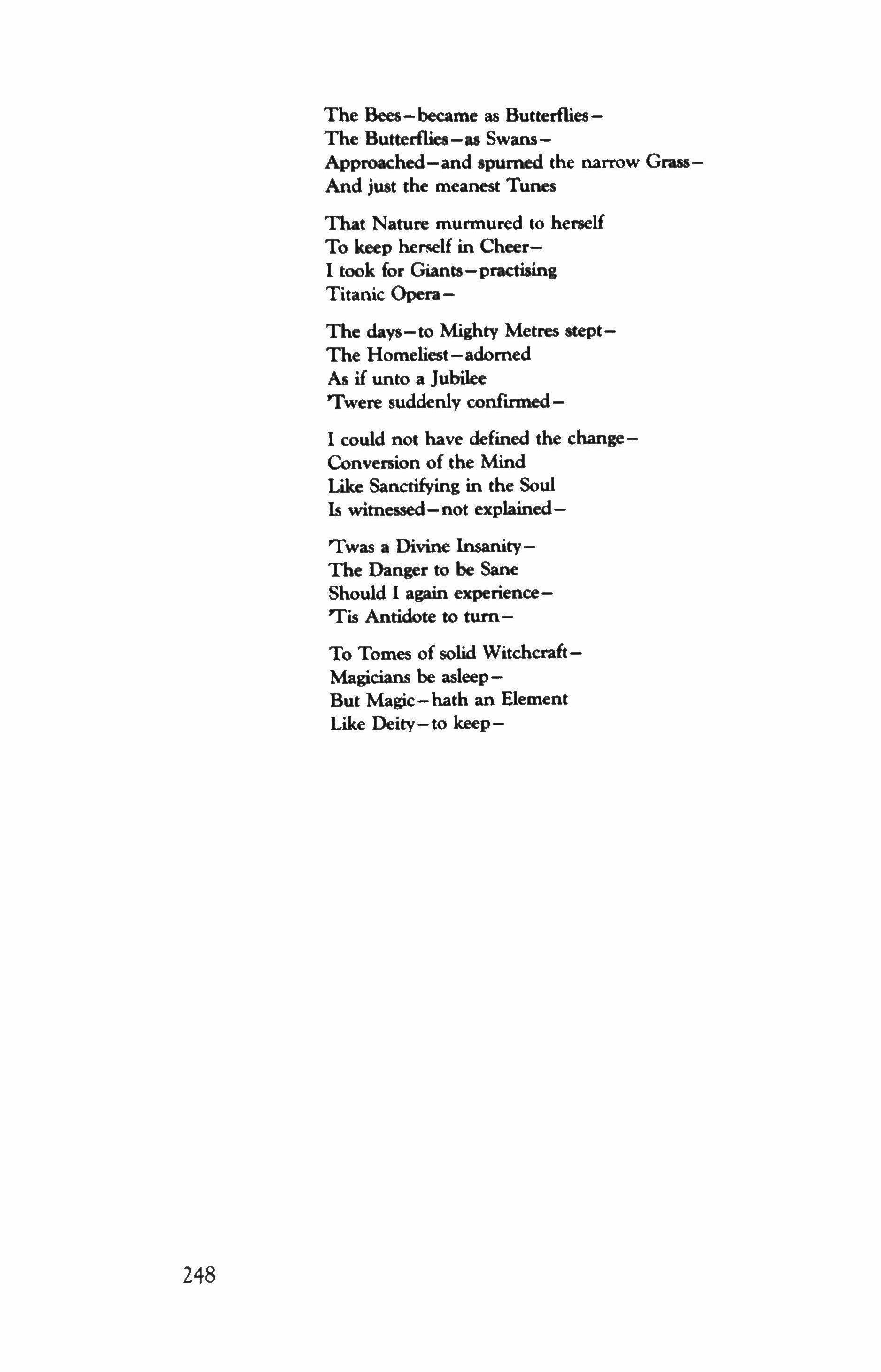
The Bees - became as ButterfliesThe Butterflies-as SwansApproached-and spumed the narrow GrassAnd just the meanest Tunes
That Nature murmured to herself To keep herself in CheerI took for Giants-practising Titanic Opera-
The days-to Mighty Metres steptThe Homeliest - adorned At, if unto a Jubilee 'Twere suddenly confmned-
I could not have defined the changeConversion of the Mind Like Sanctifying in the Soul Is witnessed - not explained-
'Twas a Divine InsanityThe Danger to be Sane Should 1 again experience'Tis Antidote to tum-
To Tomes of solid WitchcraftMagicians be asleepBut Magic-hath an Element Like Deity- to keep-
248
Four Poems
Eavan Boland
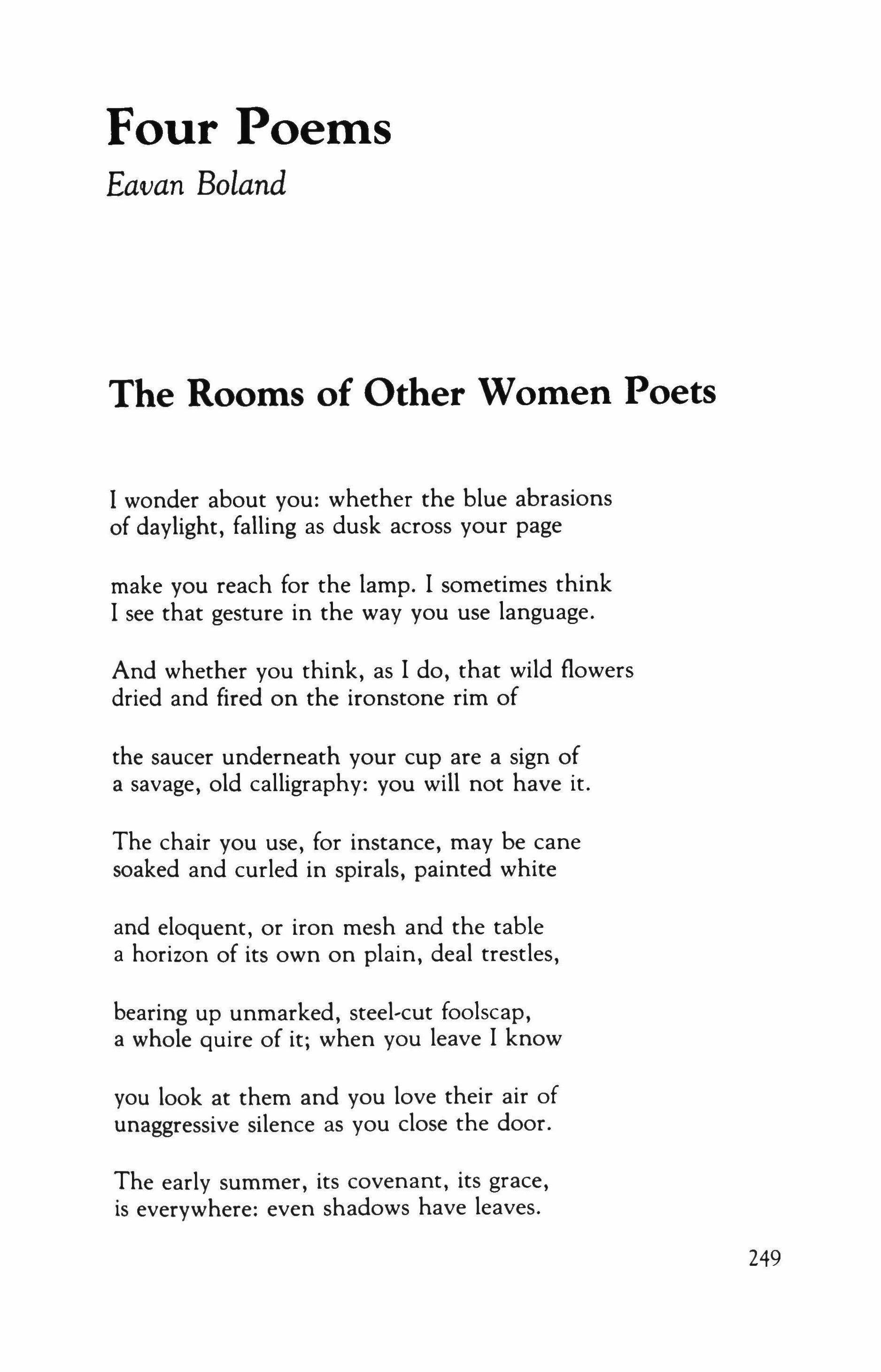
The Rooms of Other Women Poets
I wonder about you: whether the blue abrasions of daylight, falling as dusk across your page
make you reach for the lamp. I sometimes think I see that gesture in the way you use language.
And whether you think, as I do, that wild flowers dried and fired on the ironstone rim of
the saucer underneath your cup are a sign of a savage, old calligraphy: you will not have it.
The chair you use, for instance, may be cane soaked and curled in spirals, painted white and eloquent, or iron mesh and the table a horizon of its own on plain, deal trestles,
bearing up unmarked, steel-cut foolscap, a whole quire of it; when you leave I know you look at them and you love their air of unaggressive silence as you close the door.
The early summer, its covenant, its grace, is everywhere: even shadows have leaves.
249
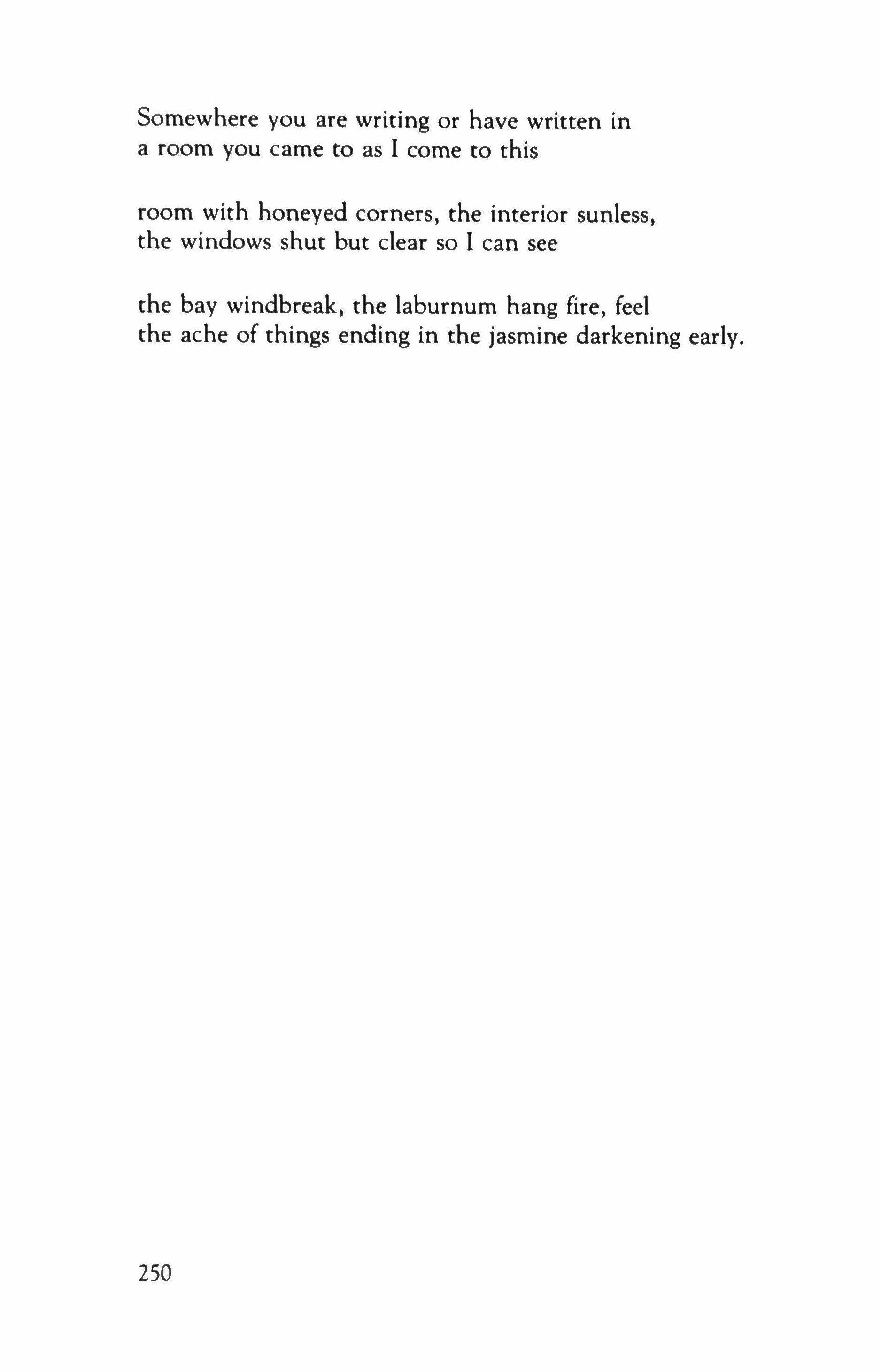
Somewhere you are writing or have written in a room you came to as I come to this
room with honeyed corners, the interior sunless, the windows shut but clear so I can see
the bay windbreak, the laburnum hang fire, feel the ache of things ending in the jasmine darkening early.
250
We Are Human History.
We Are Not Natural History.
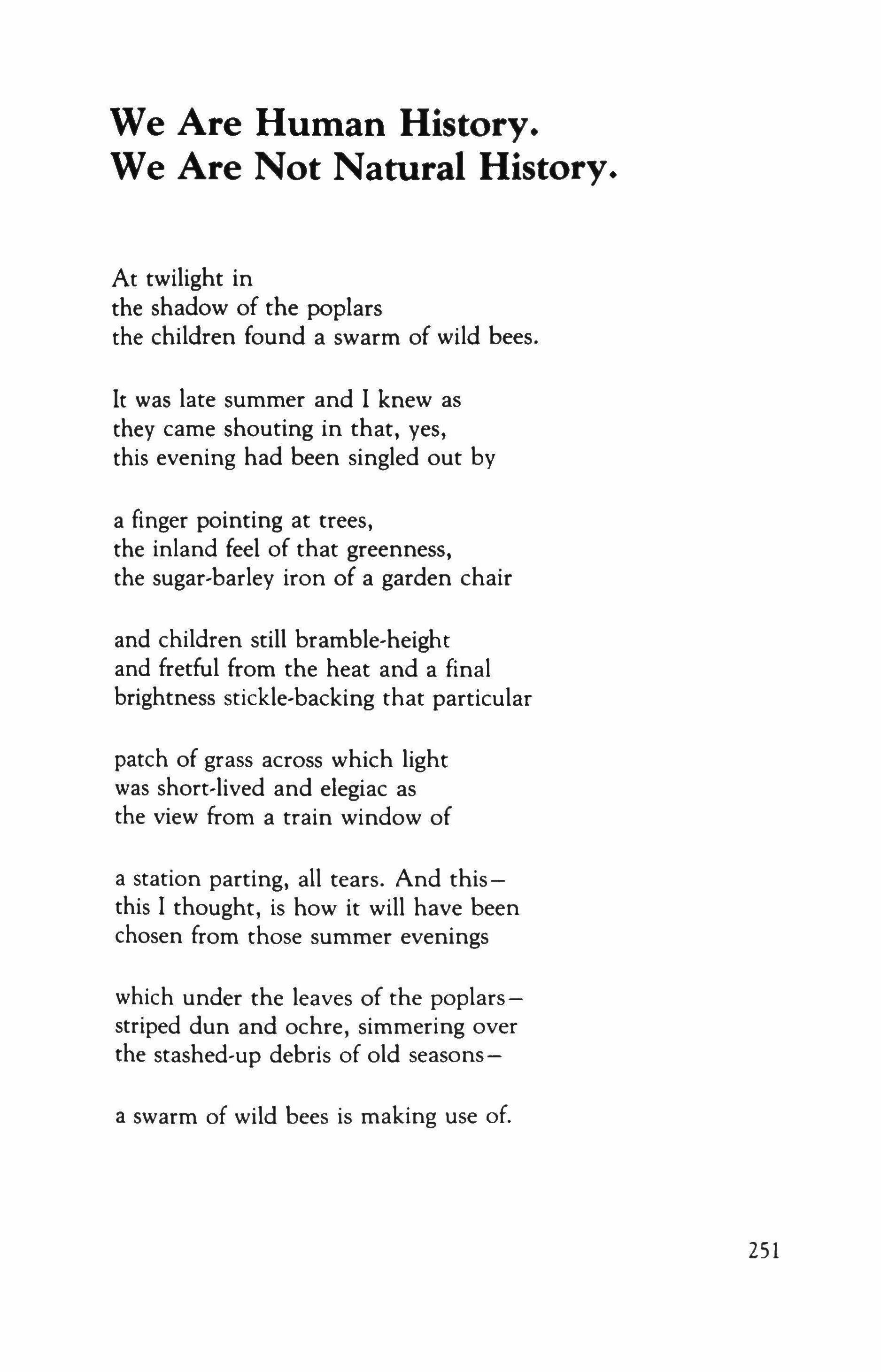
At twilight in the shadow of the poplars the children found a swarm of wild bees.
It was late summer and I knew as they came shouting in that, yes, this evening had been singled out by
a finger pointing at trees, the inland feel of that greenness, the sugar-barley iron of a garden chair and children still bramble-height and fretful from the heat and a final brightness stickle-backing that particular
patch of grass across which light was short-lived and elegiac as the view from a train window of
a station parting, all tears. And thisthis I thought, is how it will have been chosen from those summer evenings
which under the leaves of the poplarsstriped dun and ochre, simmering over the stashed-up debris of old seasons-
a swarm of wild bees is making use of.
251
Outside History
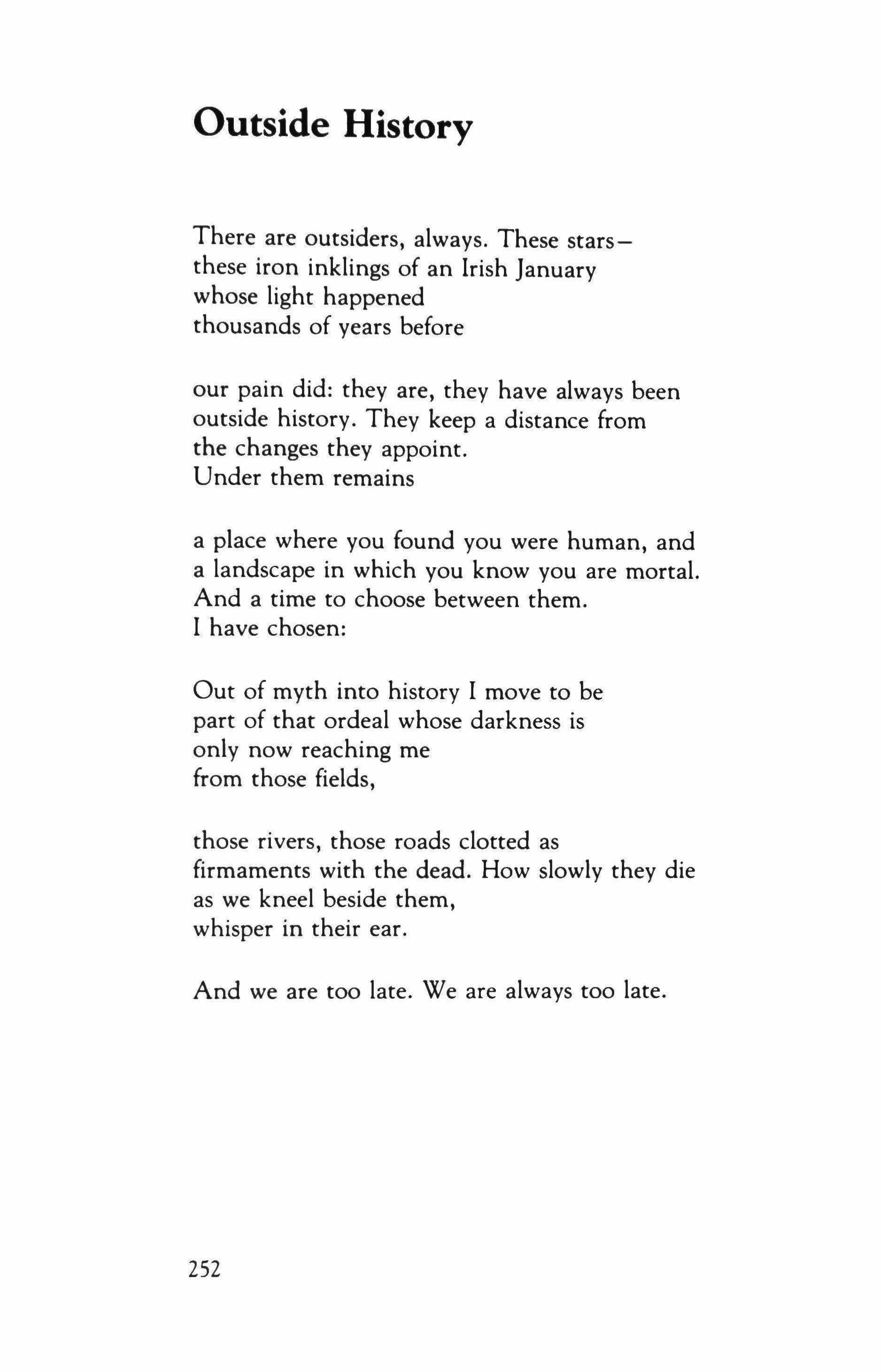
There are outsiders, always. These starsthese iron inklings of an Irish January whose light happened thousands of years before our pain did: they are, they have always been outside history. They keep a distance from the changes they appoint. Under them remains
a place where you found you were human, and a landscape in which you know you are mortal. And a time to choose between them. I have chosen:
Out of myth into history I move to be part of that ordeal whose darkness is only now reaching me from those fields, those rivers, those roads clotted as firmaments with the dead. How slowly they die as we kneel beside them, whisper in their ear.
And we are too late. We are always too late.
252
In Exile

The German girls who came to us that winter and the winter after and who helped my mother fuel the iron stove and arranged our clothes in wet thicknesses on the wooden rail after tea was over,
spoke no English, understood no French. They were sisters from a ruined city and they spoke rapidly in their own tongue: syllables in which pain was radical, integral; and with what sense of injury
the language angled for an unhurt kingdom - for the rise, curve, kill and swift return to the wrist, to the hood-I never knew. To me they were the sounds of evening only, of the cold, of the Irish dark and
continuous with all such recurrences: the drizzle in the lilac, the dusk always at the back door, like the tinkers I was threatened with, the cat inching closer to the fire with its screen of clothes, where
I am standing in the stone-flagged kitchen; there are bleached rags, perhaps, and a pot of tea on the stove. And I see myself, four years of age and looking up, storing such music-guttural, hurt to the quick-
as I hear now, forty years on and far from where I heard it first. Among these salt-boxes, marshes and the glove-tanned colors of the sugar-maples, in this New England town at the start of winter, I am so much South of it, the soft wet, the light and those early darks which strengthen the assassin's hand; and hide the wound. Here, in this scalding air, my speech will not heal. I do not want it to heal.
253
Two Poems
Li,¥oung Lee
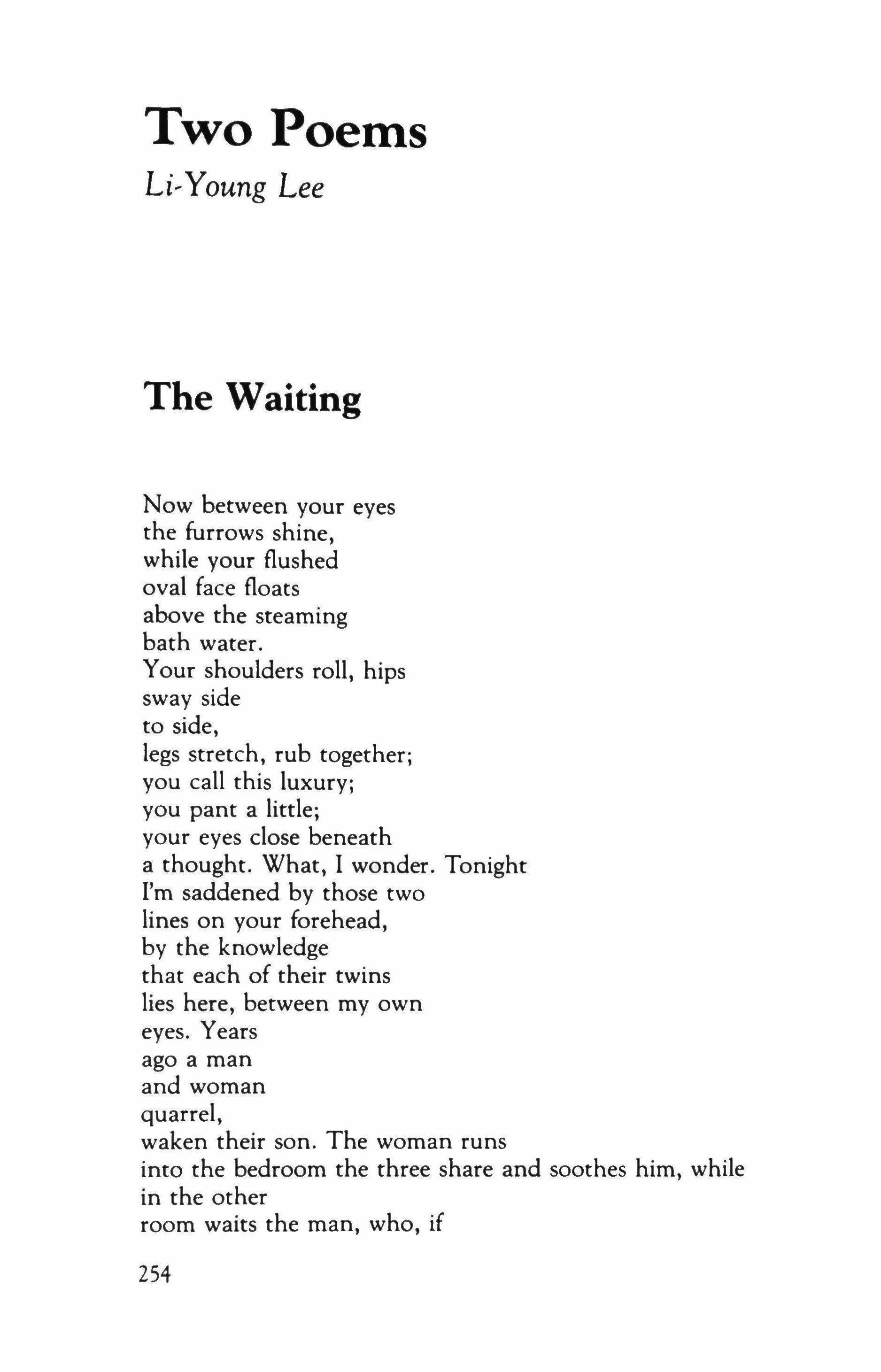
The Waiting
Now between your eyes the furrows shine, while your flushed oval face floats above the steaming bath water. Your shoulders roll, hips sway side to side, legs stretch, rub together; you call this luxury; you pant a little; your eyes close beneath a thought. What, I wonder Tonight I'm saddened by those two lines on your forehead, by the knowledge that each of their twins lies here, between my own eyes. Years ago a man and woman quarrel, waken their son. The woman runs into the bedroom the three share and soothes him, while in the other room waits the man, who, if
254
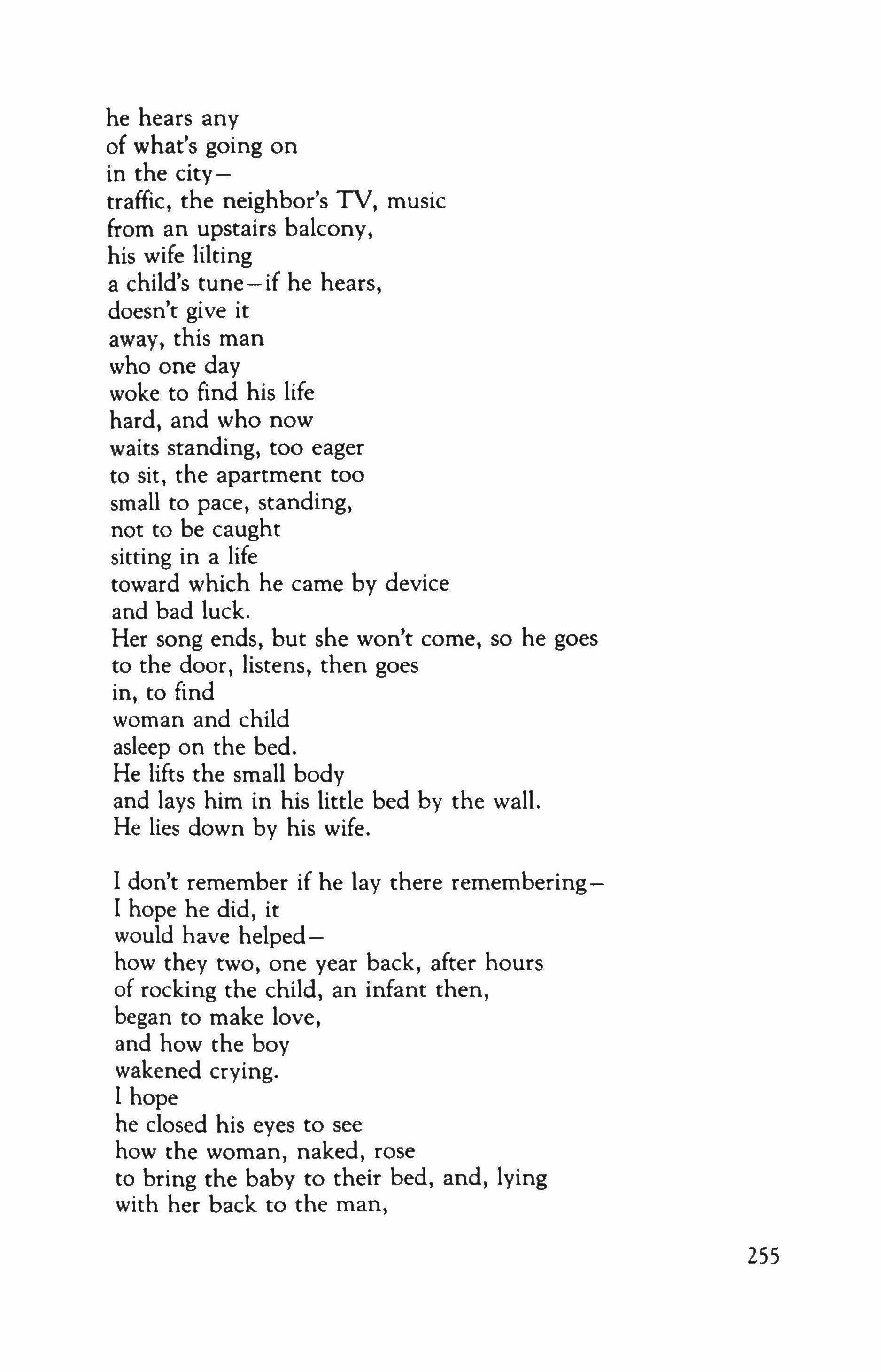
he hears any of what's going on in the citytraffic, the neighbor's TV, music from an upstairs balcony, his wife lilting a child's tune-if he hears, doesn't give it away, this man who one day woke to find his life hard, and who now waits standing, too eager to sit, the apartment too small to pace, standing, not to be caught sitting in a life toward which he came by device and bad luck. Her song ends, but she won't come, so he goes to the door, listens, then goes in, to find woman and child asleep on the bed. He lifts the small body and lays him in his little bed by the wall. He lies down by his wife.
I don't remember if he lay there rememberingI hope he did, it would have helpedhow they two, one year back, after hours of rocking the child, an infant then, began to make love, and how the boy wakened crying. I hope he closed his eyes to see how the woman, naked, rose to bring the baby to their bed, and, lying with her back to the man,
255
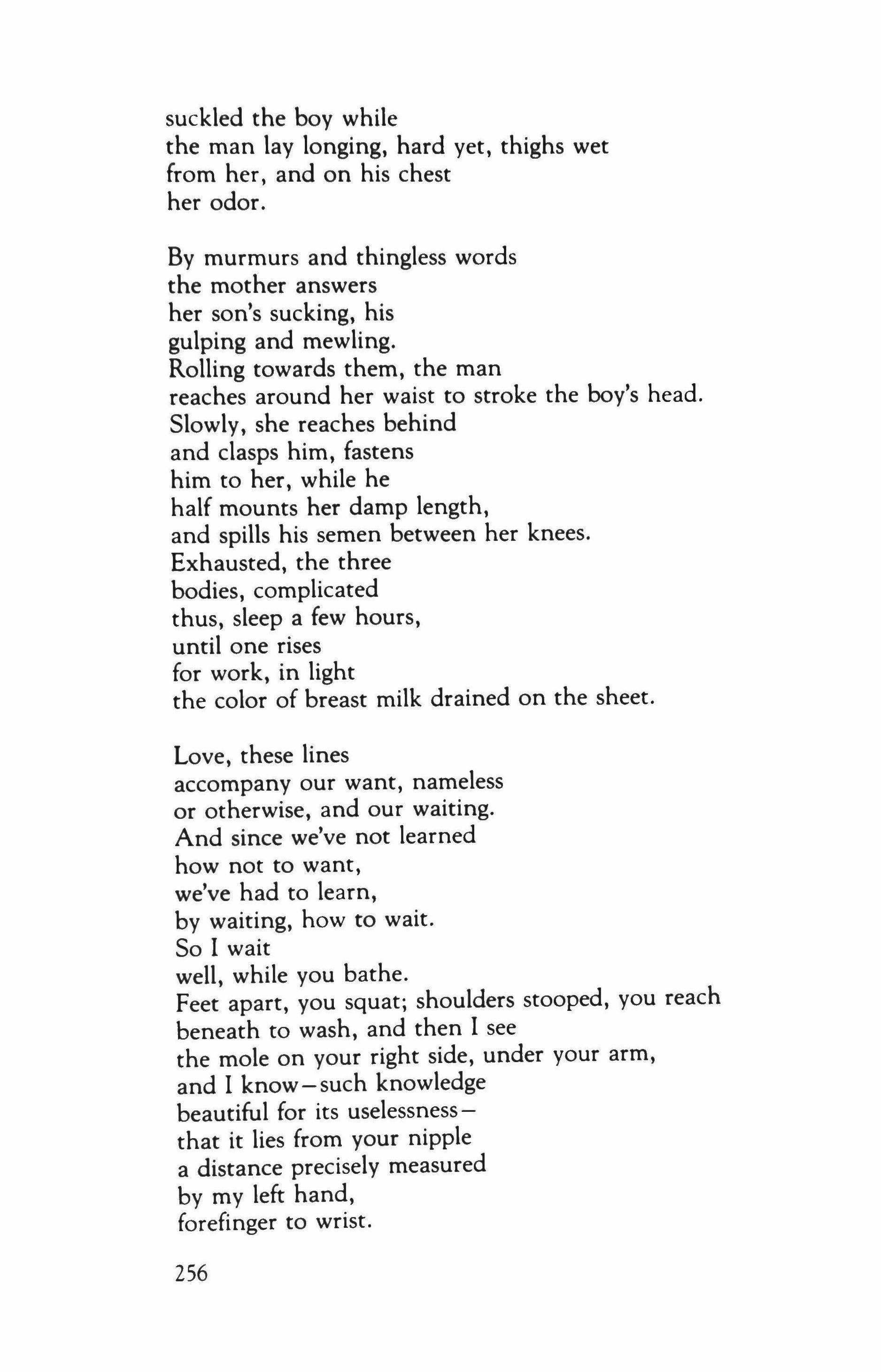
suckled the boy while the man lay longing, hard yet, thighs wet from her, and on his chest her odor.
By murmurs and thingless words the mother answers her son's sucking, his gulping and mewling. Rolling towards them, the man reaches around her waist to stroke the boy's head. Slowly, she reaches behind and clasps him, fastens him to her, while he half mounts her damp length, and spills his semen between her knees. Exhausted, the three bodies, complicated thus, sleep a few hours, until one rises for work, in light the color of breast milk drained on the sheet.
Love, these lines accompany our want, nameless or otherwise, and our waiting. And since we've not learned how not to want, we've had to learn, by waiting, how to wait. So I wait well, while you bathe. Feet apart, you squat; shoulders stooped, you reach beneath to wash, and then I see the mole on your right side, under your arm, and I know - such knowledge beautiful for its uselessnessthat it lies from your nipple a distance precisely measured by my left hand, forefinger to wrist.
256
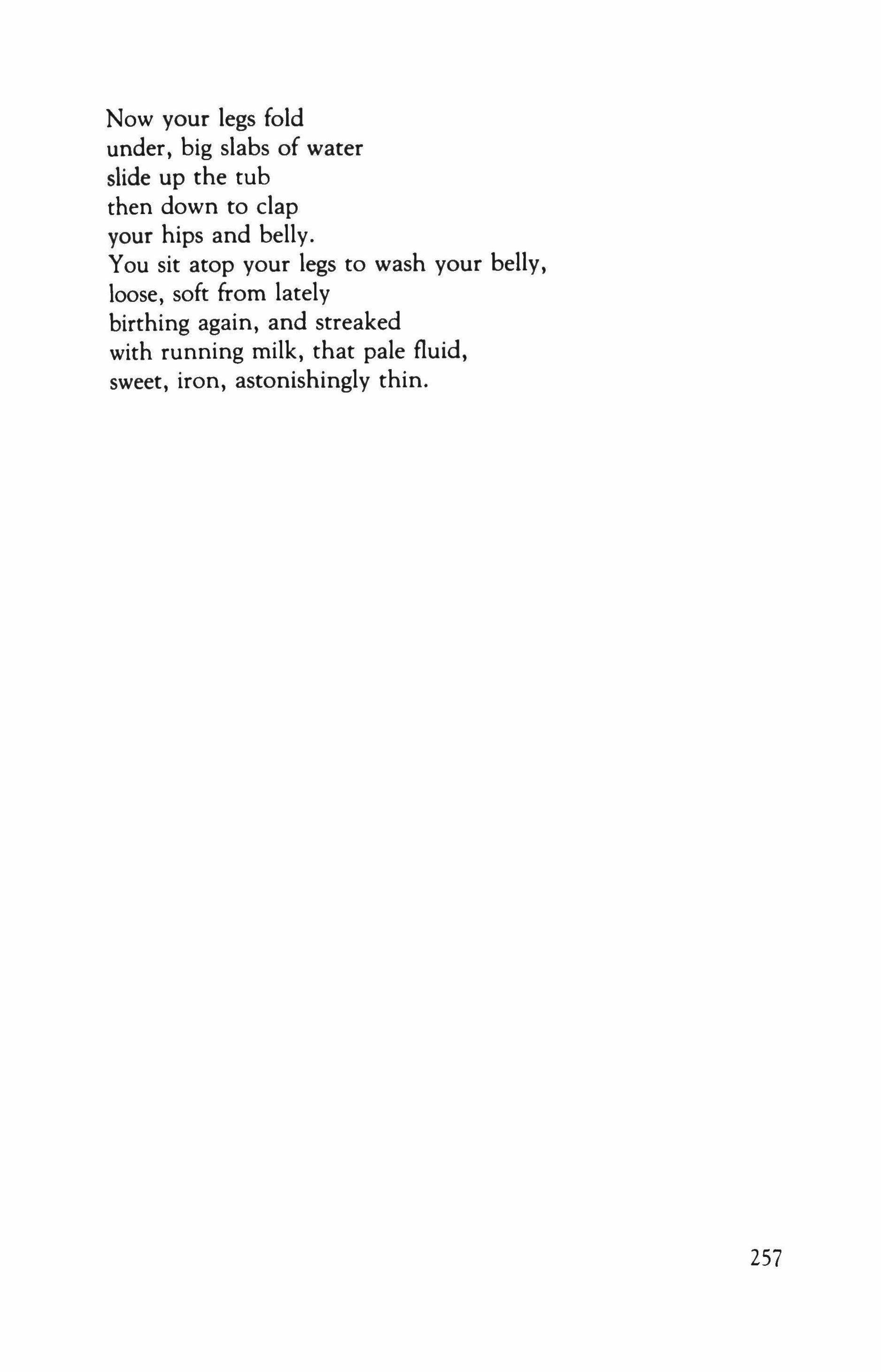
Now your legs fold under, big slabs of water slide up the tub then down to clap your hips and belly. You sit atop your legs to wash your belly, loose, soft from lately birthing again, and streaked with running milk, that pale fluid, sweet, iron, astonishingly thin.
257
The Cleaving
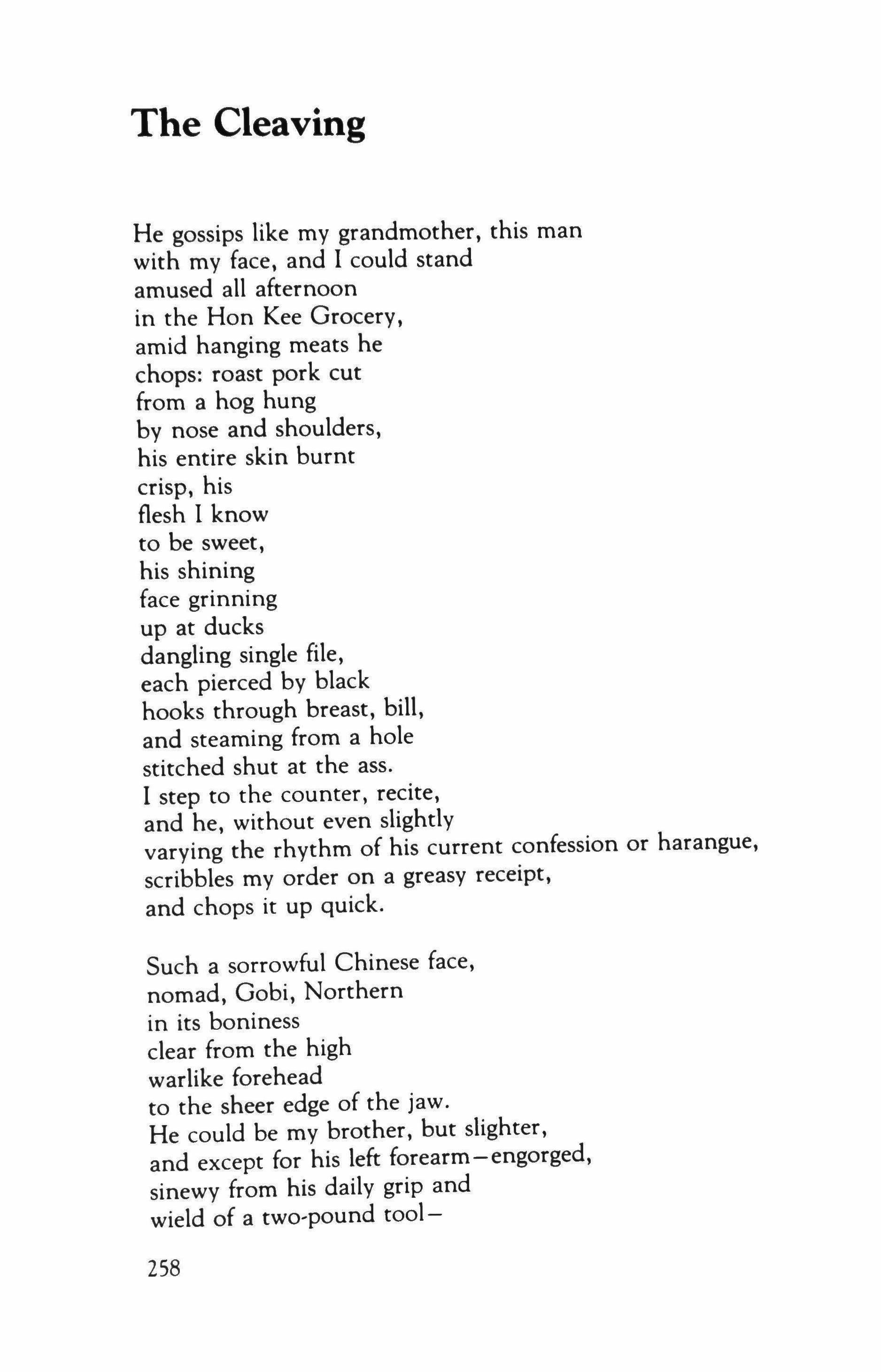
He gossips like my grandmother, this man with my face, and I could stand amused all afternoon in the Hon Kee Grocery, amid hanging meats he chops: roast pork cut from a hog hung by nose and shoulders, his entire skin burnt crisp, his flesh I know to be sweet, his shining face grinning up at ducks
dangling single file, each pierced by black hooks through breast, bill, and steaming from a hole stitched shut at the ass.
I step to the counter, recite, and he, without even slightly varying the rhythm of his current confession or harangue, scribbles my order on a greasy receipt, and chops it up quick.
Such a sorrowful Chinese face, nomad, Gobi, Northern in its boniness clear from the high warlike forehead to the sheer edge of the jaw. He could be my brother, but slighter, and except for his left forearm - engorged, sinewy from his daily grip and wield of a two-pound tool-
258
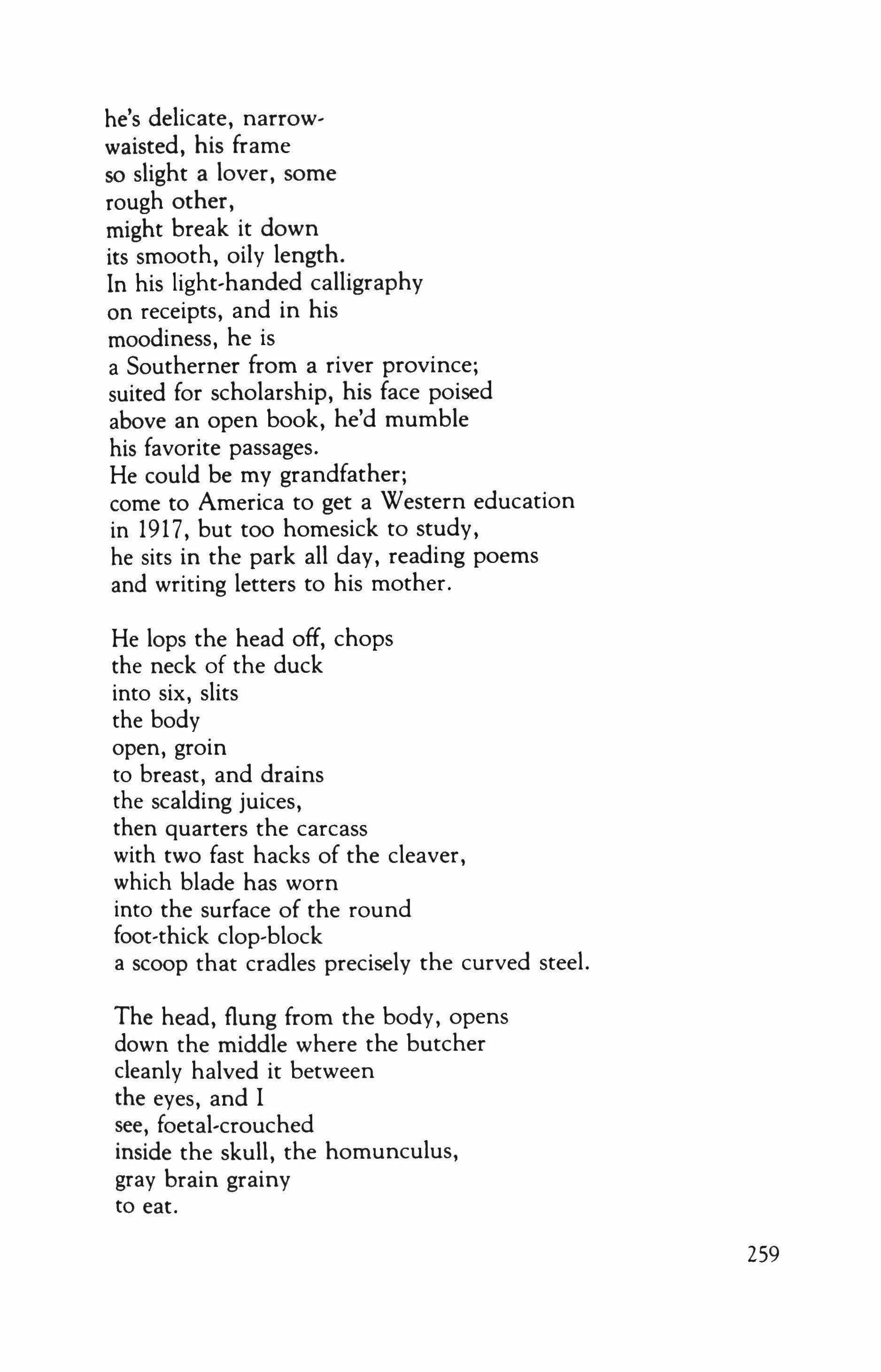
he's delicate, narrowwaisted, his frame so slight a lover, some rough other, might break it down its smooth, oily length. In his light-handed calligraphy on receipts, and in his moodiness, he is a Southerner from a river province; suited for scholarship, his face poised above an open book, he'd mumble his favorite passages. He could be my grandfather; come to America to get a Western education in 1917, but too homesick to study, he sits in the park all day, reading poems and writing letters to his mother.
He lops the head off, chops the neck of the duck into six, slits the body open, groin to breast, and drains the scalding juices, then quarters the carcass with two fast hacks of the cleaver, which blade has worn into the surface of the round foot-thick clop-block a scoop that cradles precisely the curved steel.
The head, flung from the body, opens down the middle where the butcher cleanly halved it between the eyes, and I see, foetal-crouched inside the skull, the homunculus, gray brain grainy to eat.
259
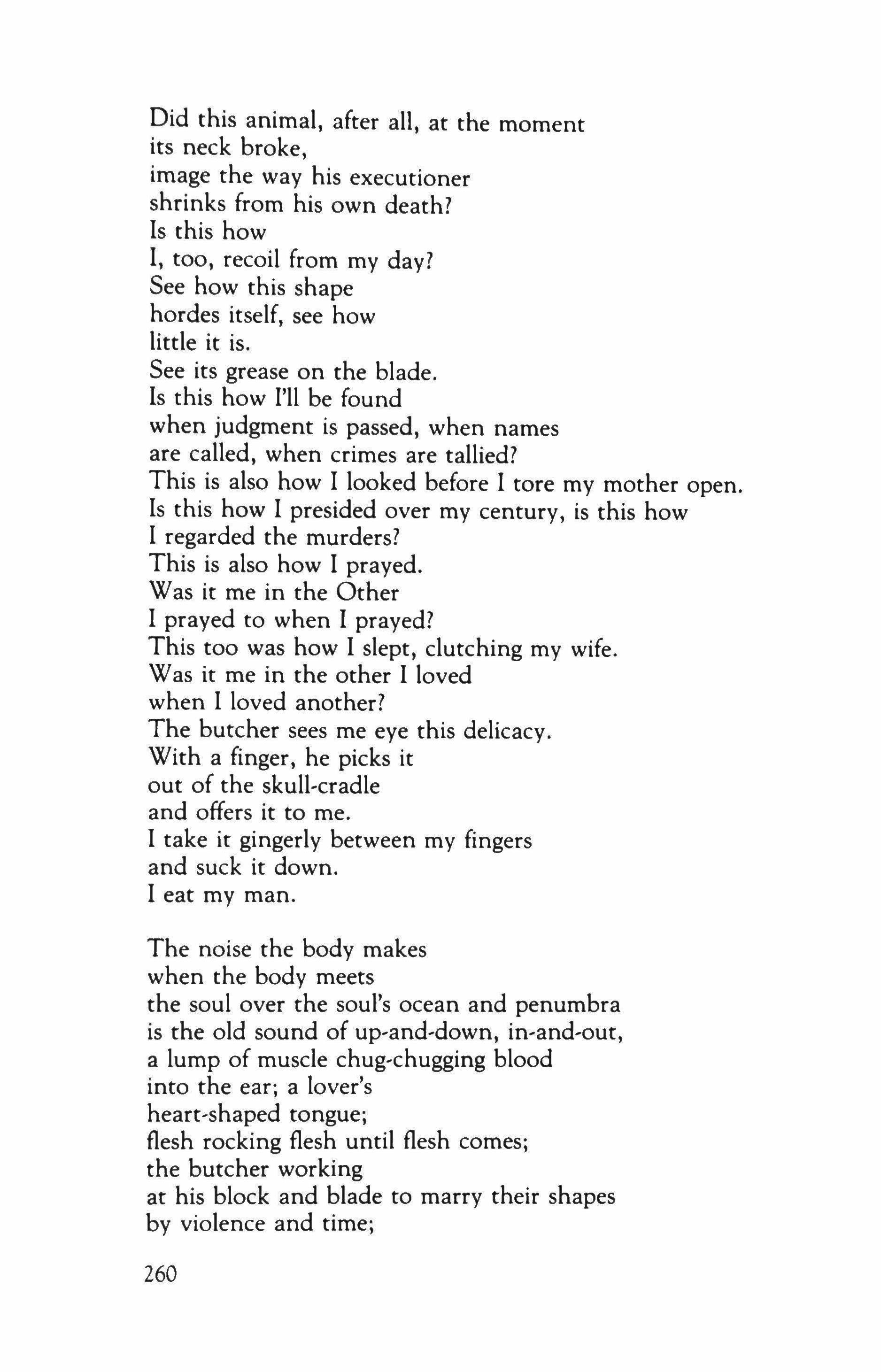
Did this animal, after all, at the moment its neck broke, image the way his executioner shrinks from his own death? Is this how I, too, recoil from my day? See how this shape hordes itself, see how little it is.
See its grease on the blade. Is this how I'll be found when judgment is passed, when names are called, when crimes are tallied? This is also how I looked before I tore my mother open. Is this how I presided over my century, is this how I regarded the murders? This is also how I prayed. Was it me in the Other I prayed to when I prayed? This too was how I slept, clutching my wife. Was it me in the other I loved when I loved another?
The butcher sees me eye this delicacy. With a finger, he picks it out of the skull-cradle and offers it to me.
I take it gingerly between my fingers and suck it down. I eat my man.
The noise the body makes when the body meets the soul over the soul's ocean and penumbra is the old sound of up-and-down, in-and-out, a lump of muscle chug-chugging blood into the ear; a lover's heart-shaped tongue; flesh rocking flesh until flesh comes; the butcher working at his block and blade to marry their shapes by violence and time;
260
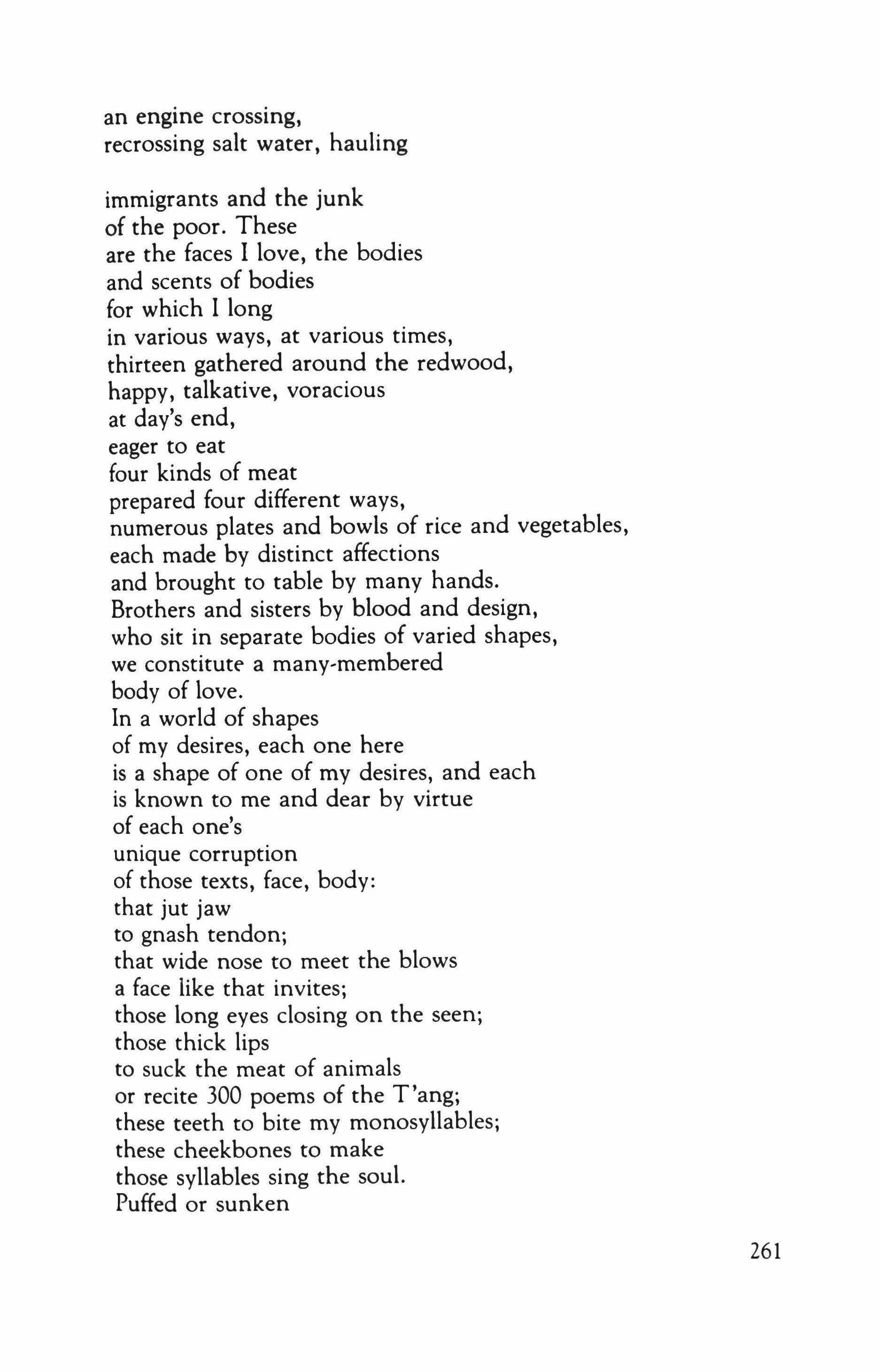
an engine crossing, recrossing salt water, hauling
immigrants and the junk of the poor. These are the faces I love, the bodies and scents of bodies for which I long in various ways, at various times, thirteen gathered around the redwood, happy, talkative, voracious at day's end, eager to eat four kinds of meat prepared four different ways, numerous plates and bowls of rice and vegetables, each made by distinct affections and brought to table by many hands. Brothers and sisters by blood and design, who sit in separate bodies of varied shapes, we constitute a many-membered body of love.
In a world of shapes of my desires, each one here is a shape of one of my desires, and each is known to me and dear by virtue of each one's unique corruption of those texts, face, body: that jut jaw to gnash tendon; that wide nose to meet the blows a face like that invites; those long eyes closing on the seen; those thick lips to suck the meat of animals or recite 300 poems of the T'ang; these teeth to bite my monosyllables; these cheekbones to make those syllables sing the soul.
Puffed or sunken
261
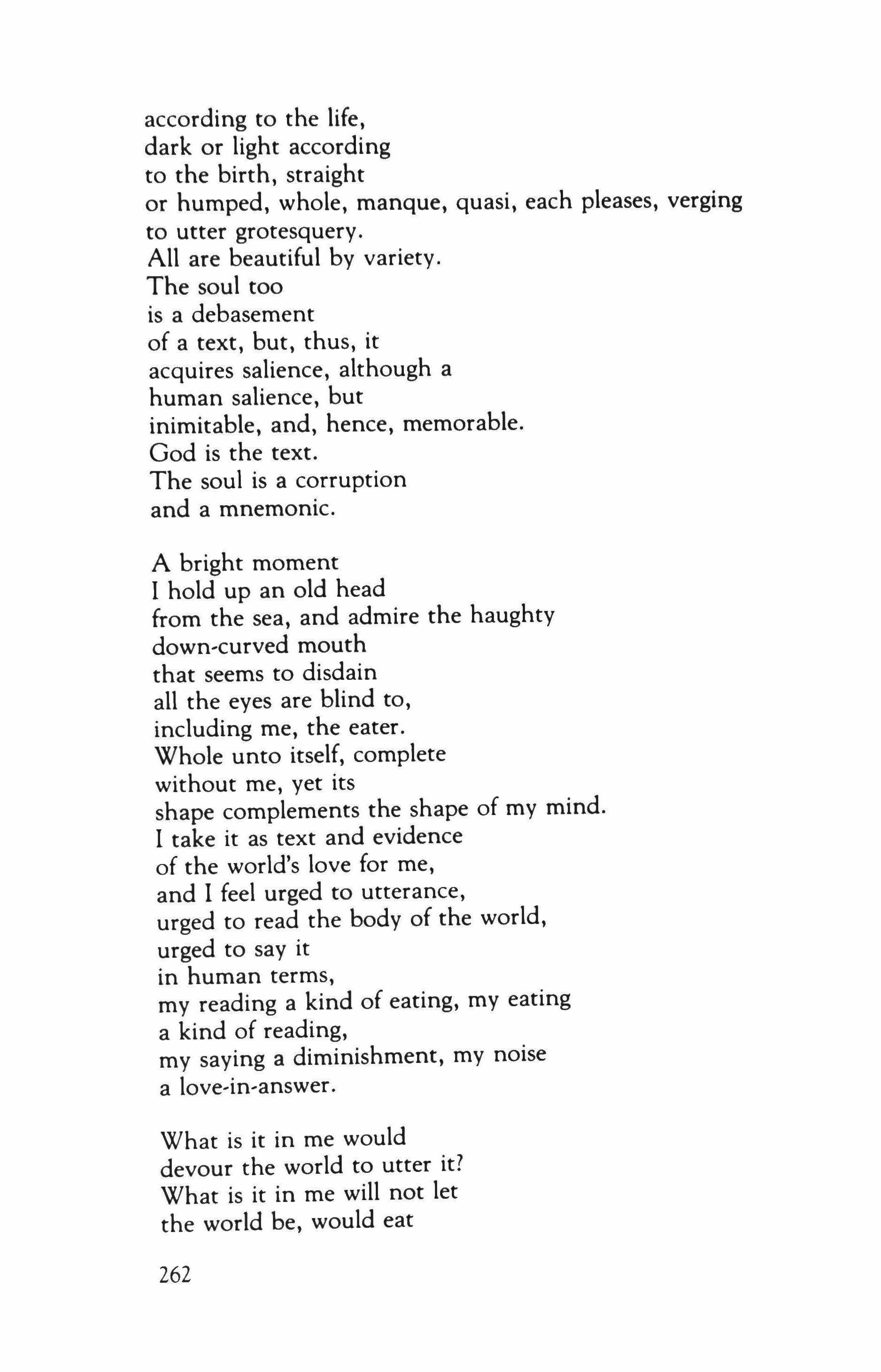
according to the life, dark or light according to the birth, straight or humped, whole, manque, quasi, each pleases, verging to utter grotesquery. All are beautiful by variety. The soul too is a debasement of a text, but, thus, it acquires salience, although a human salience, but inimitable, and, hence, memorable. God is the text. The soul is a corruption and a mnemonic.
A bright moment I hold up an old head from the sea, and admire the haughty down-curved mouth that seems to disdain all the eyes are blind to, including me, the eater. Whole unto itself, complete without me, yet its shape complements the shape of my mind. I take it as text and evidence of the world's love for me, and I feel urged to utterance, urged to read the body of the world, urged to say it in human terms, my reading a kind of eating, my eating a kind of reading, my saying a diminishment, my noise a love-in-answer.
What is it in me would devour the world to utter it? What is it in me will not let the world be, would eat
262
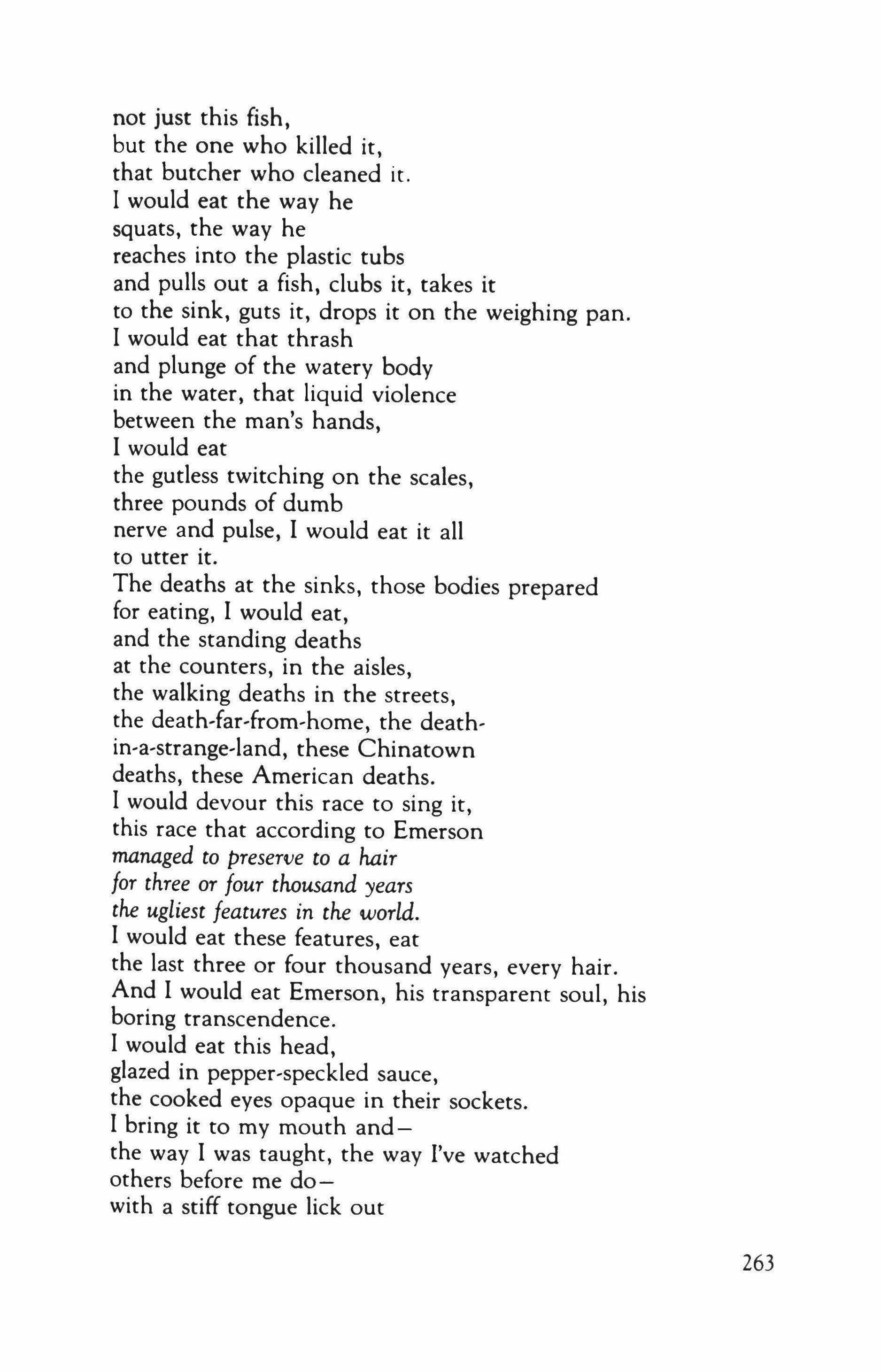
not just this fish, but the one who killed it, that butcher who cleaned it.
I would eat the way he squats, the way he reaches into the plastic tubs and pulls out a fish, clubs it, takes it to the sink, guts it, drops it on the weighing pan. I would eat that thrash and plunge of the watery body in the water, that liquid violence between the man's hands, I would eat the gutless twitching on the scales, three pounds of dumb nerve and pulse, I would eat it all to utter it.
The deaths at the sinks, those bodies prepared for eating, I would eat, and the standing deaths at the counters, in the aisles, the walking deaths in the streets, the death-far-from-horne, the death, in-a-strange-land, these Chinatown deaths, these American deaths.
I would devour this race to sing it, this race that according to Emerson managed to preserve to a hair for three or four thousand years the ugliest features in the world. I would eat these features, eat the last three or four thousand years, every hair. And I would eat Emerson, his transparent soul, his boring transcendence.
I would eat this head, glazed in pepper-speckled sauce, the cooked eyes opaque in their sockets. I bring it to my mouth andthe way I was taught, the way I've watched others before me dowith a stiff tongue lick out
263

the cheek-meat and the meat over the armored jaw, my eatingits sensual, salient nownesspunctuating the void from which such hunger springs and to which it proceeds.
And what is this I excavate with my mouth? What is this plated, ribbed, hinged architecture, this carp head, but one more articulation of a single nothing severally manifested? What is my eating, rapt as it is, but another shape of going, my immaculate expiration?
0, nothing is so steadfast it won't go the way the body goes. The body goes. The body's grave, so serious in its dying, arduous as martyrs in that task and as glorious. It goes empty always and announces its going by spasms and groans, farts and sweats.
What I thought were the arms aching cleave, were the knees trembling leave. What I thought were the muscles insisting resist, persist, exist, were the pores
264
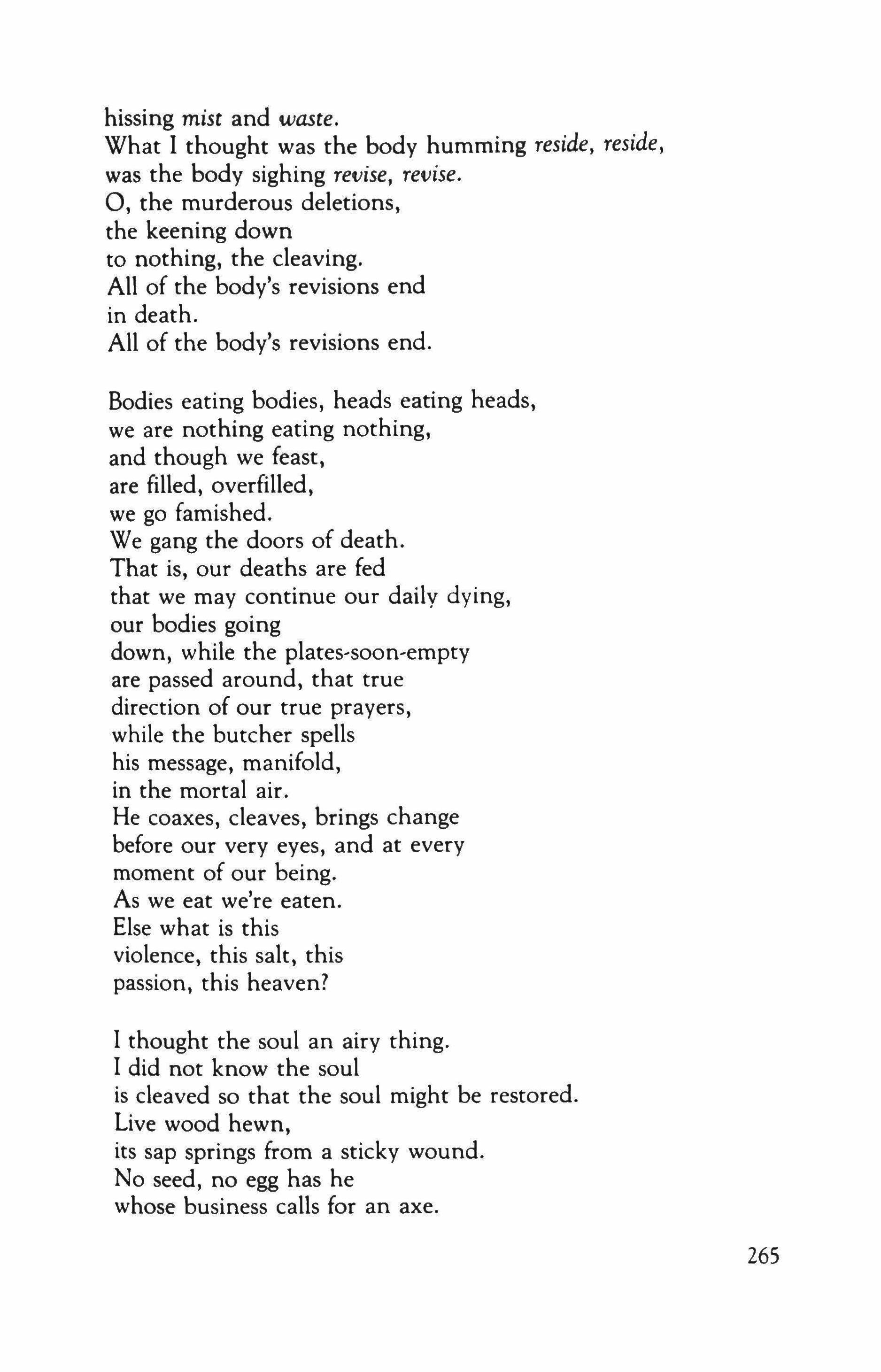
hissing mist and waste. What I thought was the body humming reside, reside, was the body sighing revise, revise. 0, the murderous deletions, the keening down to nothing, the cleaving. All of the body's revisions end in death. All of the body's revisions end.
Bodies eating bodies, heads eating heads, we are nothing eating nothing, and though we feast, are filled, overfilled, we go famished. We gang the doors of death. That is, our deaths are fed that we may continue our daily dying, our bodies going down, while the plates-soon-empty are passed around, that true direction of our true prayers, while the butcher spells his message, manifold, in the mortal air. He coaxes, cleaves, brings change before our very eyes, and at every moment of our being. As we eat we're eaten. Else what is this violence, this salt, this passion, this heaven?
1 thought the soul an airy thing. 1 did not know the soul is cleaved so that the soul might be restored. Live wood hewn, its sap springs from a sticky wound. No seed, no egg has he whose business calls for an axe.
265
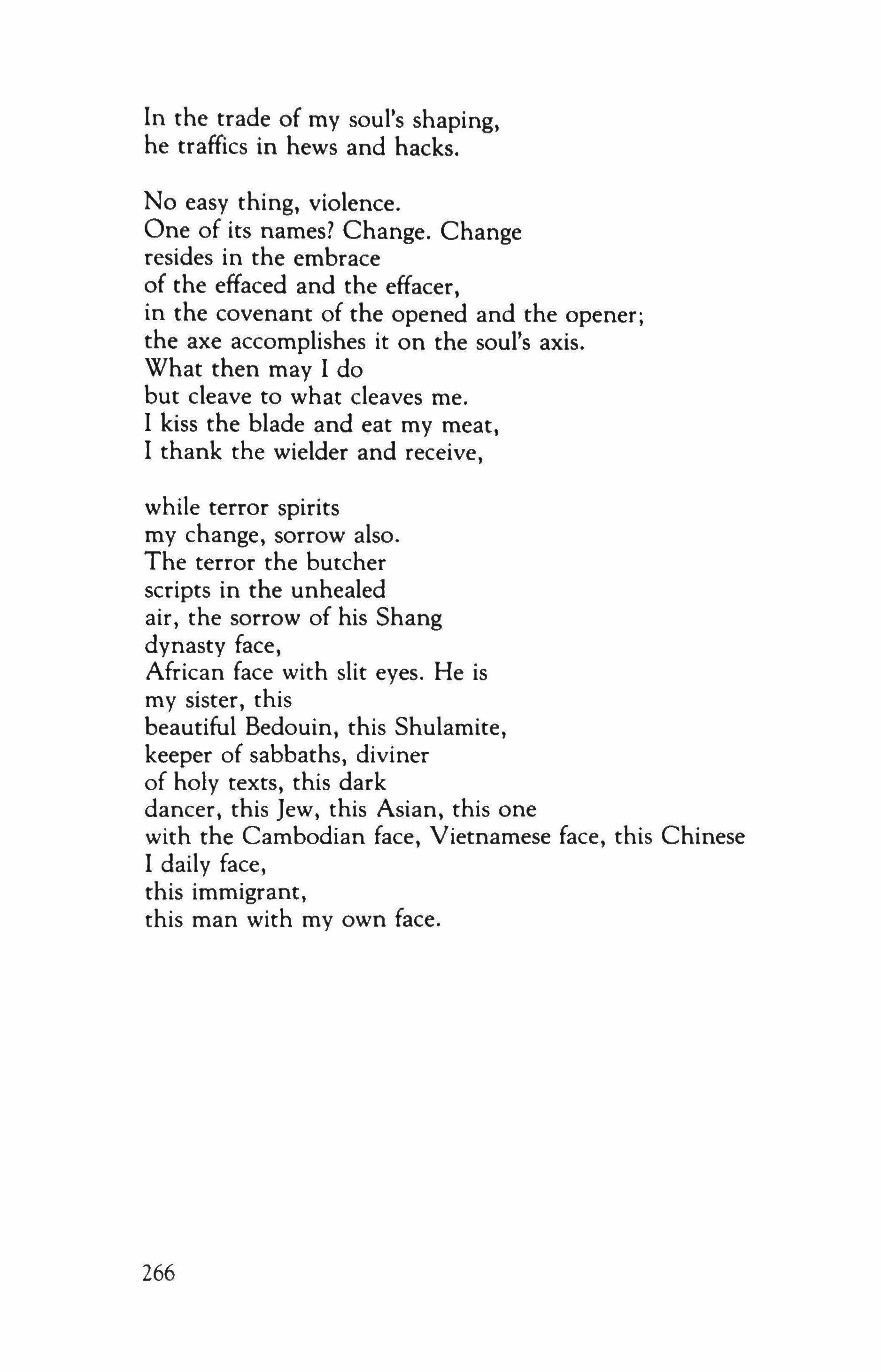
In the trade of my soul's shaping, he traffics in hews and hacks.
No easy thing, violence. One of its names? Change. Change resides in the embrace of the effaced and the effacer, in the covenant of the opened and the opener; the axe accomplishes it on the soul's axis. What then may I do but cleave to what cleaves me. I kiss the blade and eat my meat, I thank the wielder and receive, while terror spirits my change, sorrow also. The terror the butcher scripts in the unhealed air, the sorrow of his Shang dynasty face, African face with slit eyes. He is my sister, this beautiful Bedouin, this Shulamite, keeper of sabbaths, diviner of holy texts, this dark dancer, this Jew, this Asian, this one with the Cambodian face, Vietnamese face, this Chinese I daily face, this immigrant, this man with my own face.
266
Two Poems
Tira Palmquist

Manifest Destiny
In my car, I pass a wall that sags toward the freeway, the bend propped in place by 2 x 4's. The wall bulges tumorously as if it is not made from brick at all. Maybe it was poorly constructed, or a victim of recent earthquakes. To say that one goes through life unscathed-maybe you just have smaller marks. Maybe it is better to strike defensive positions instead of seeing disaster coming and letting it happen. Maybe not. I think of those whales trapped in ice somewhere north. Rescue teams from three countries worked for days, weeks, trying to free the beasts. But surely this has happened beforeice forms fast, and there are a lot more whales dying of unnatural causes. Solidity is relative too: this wall might be as perforated as a sponge, invaded constantly by the heavy elements. Why deny the wall its natural tendency toward acceptance? To be insular? Look at the traffic: distance is the safest weapon - it saves people from
267
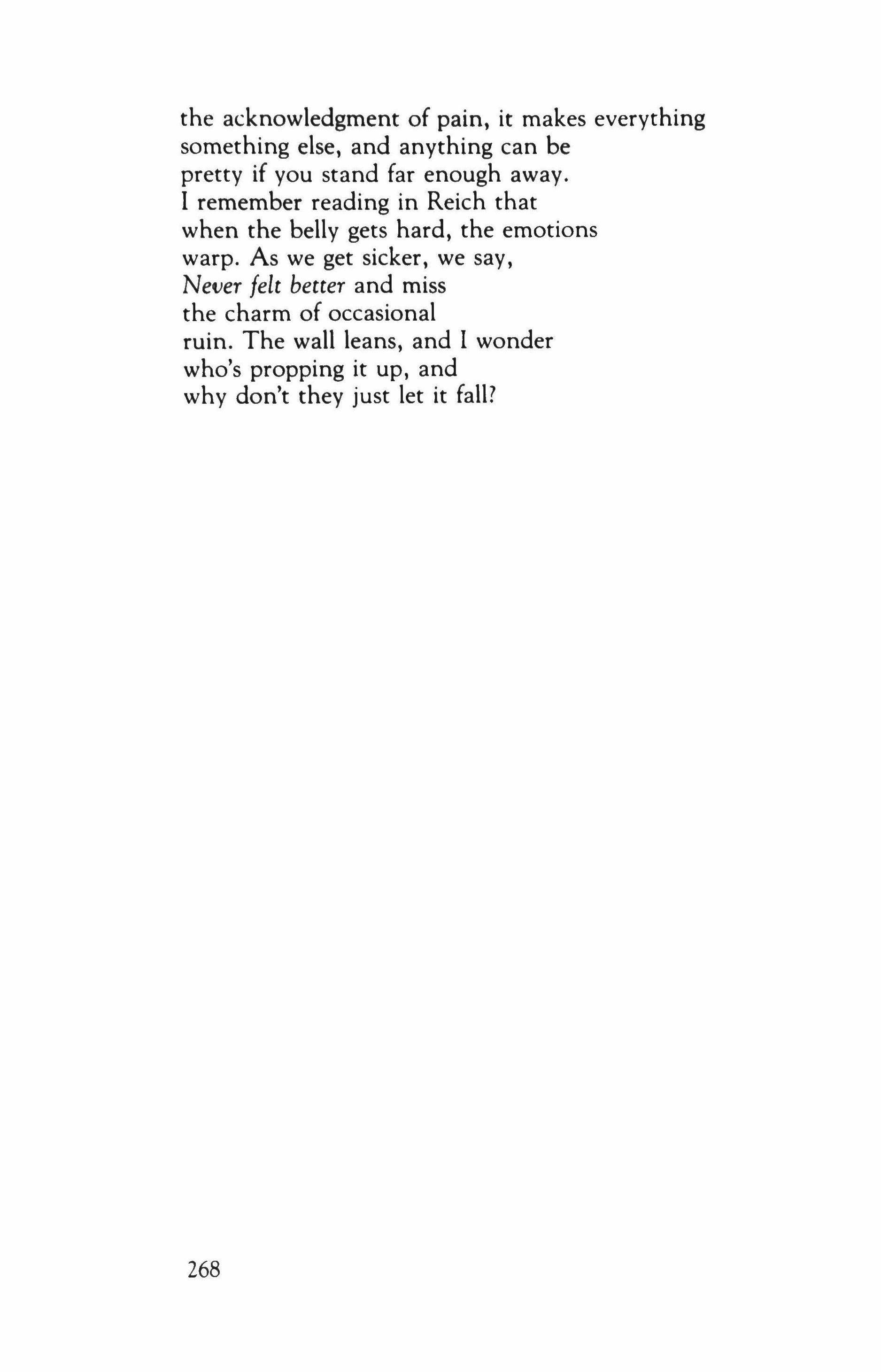
the acknowledgment of pain, it makes everything something else, and anything can be pretty if you stand far enough away. I remember reading in Reich that when the belly gets hard, the emotions warp. As we get sicker, we say, Never felt better and miss the charm of occasional ruin. The wall leans, and I wonder who's propping it up, and why don't they just let it fall?
268
Being Caught Coming and Going
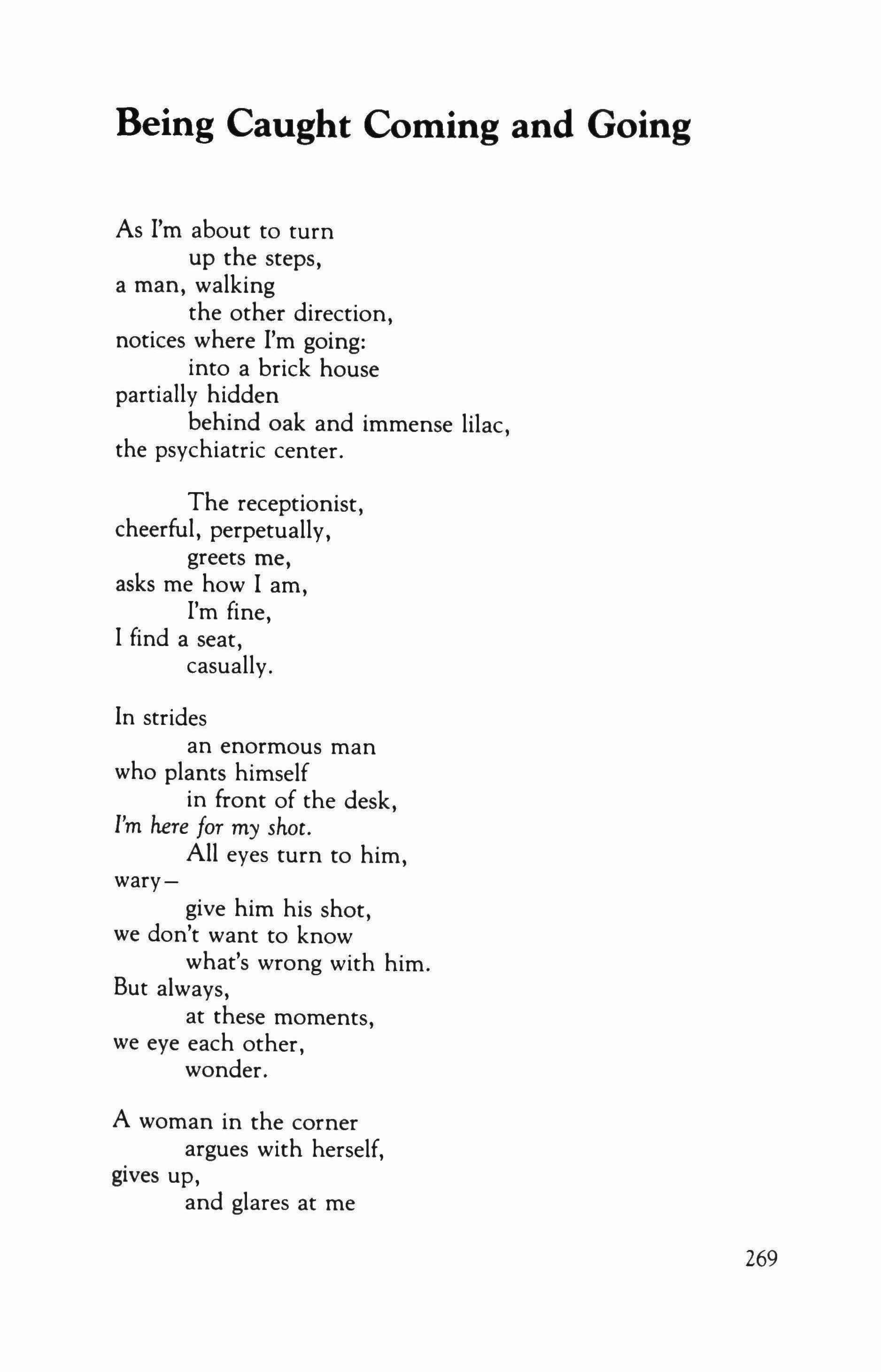
As I'm about to turn up the steps, a man, walking the other direction, notices where I'm going: into a brick house partially hidden behind oak and immense lilac, the psychiatric center.
The receptionist, cheerful, perpetually, greets me, asks me how I am, I'm fine, 1 find a seat, casually.
In strides
an enormous man who plants himself in front of the desk, I'm here for my shot. All eyes turn to him, warygive him his shot, we don't want to know what's wrong with him. But always, at these moments, we eye each other, wonder.
A woman in the corner argues with herself, gives up, and glares at me
269

when she notices I've noticed.
Back in the private office, I find myself engrossed in this handmade thing on the waUI see it every time I come in here yet, every time, I'm drawn to it, as if it is the ballast I cling to, so I can concentrate, can say, It's hard to say.
I know progress the way I leave this building, unnoticed, barely, looking down to see the tracks that lead me in here and say, yes, these are my footprints.
270
Blind
L. S. Asekoff

Once in a blue moon a gull flies this far inland. Mostly we get birds of passage, duck, heron, geese-the long riders traveling in flocks as far south as Florida. They steer by starlight & magnetic clocks.
A ninetv-dav wonder
I studied celestial navigation after Pearl Harbor, served three years on a destroyer, two on a submarineGuam, Guadalcanal, battle for the Bering Sea Once we passed under the Poleall instruments white-out, directions reverse, you end up looking at maps in a mirror. I've lived most of my life in uniform. After the navy, joined the P.O.twenty-nine years delivering mail, a wife, two kids, house on the West Fork.
There were three of us in the blind that morning, Willy Handshoe, old Vasteddi & me, warming ourselves with wild talk & whiskey, gunbarrels glinting at empty zinc sky. We sensed it before we saw itthe weak sun wavering
271
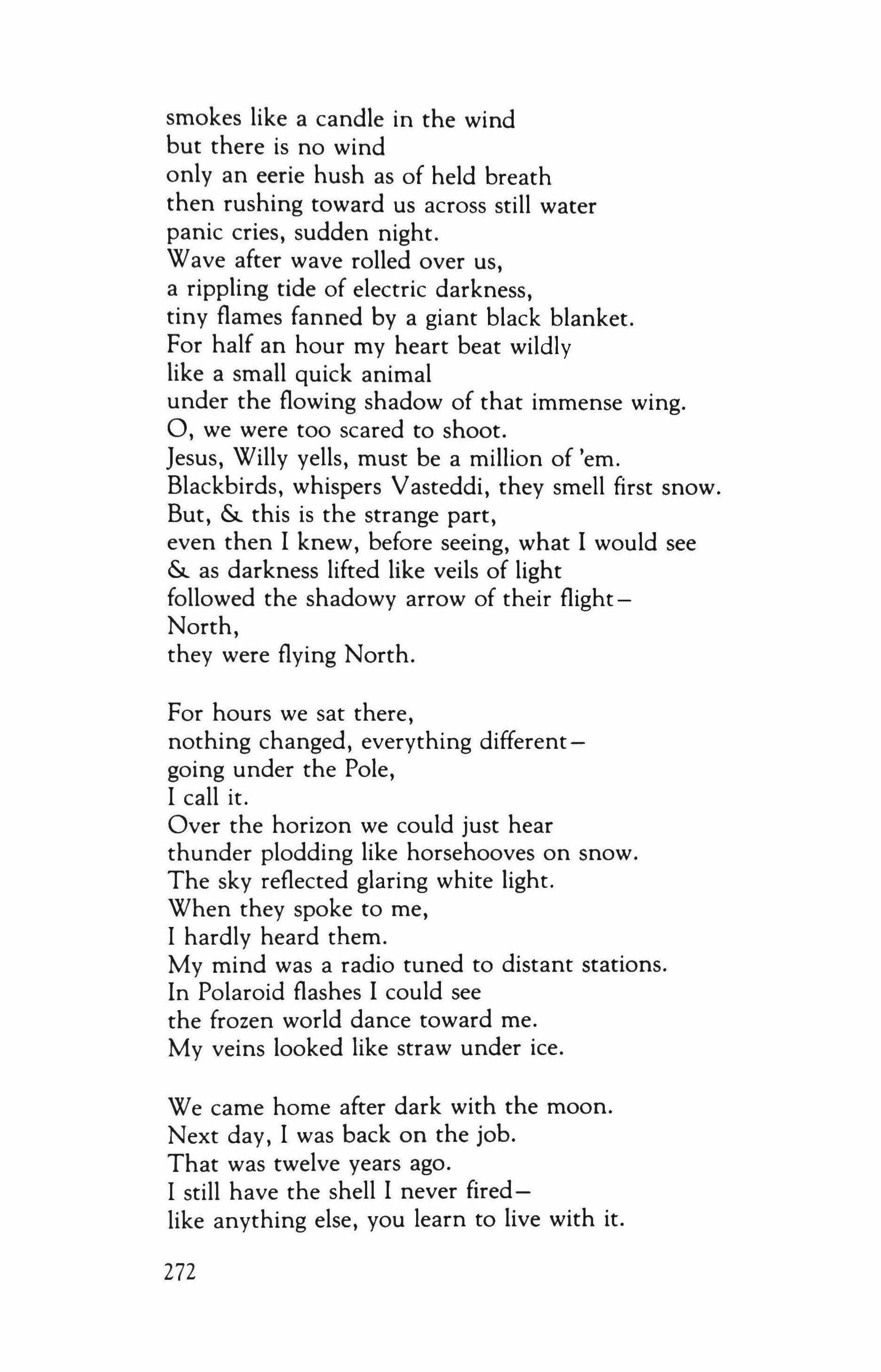
smokes like a candle in the wind but there is no wind only an eerie hush as of held breath then rushing toward us across still water panic cries, sudden night. Wave after wave rolled over us, a rippling tide of electric darkness, tiny flames fanned by a giant black blanket. For half an hour my heart beat wildly like a small quick animal under the flowing shadow of that immense wing. 0, we were too scared to shoot. Jesus, Willy yells, must be a million of 'em. Blackbirds, whispers Vasteddi, they smell first snow. But, & this is the strange part, even then I knew, before seeing, what I would see & as darkness lifted like veils of light followed the shadowy arrow of their flightNorth, they were flying North.
For hours we sat there, nothing changed, everything differentgoing under the Pole, I call it.
Over the horizon we could just hear thunder plodding like horsehooves on snow. The sky reflected glaring white light. When they spoke to me, I hardly heard them. My mind was a radio tuned to distant stations. In Polaroid flashes I could see the frozen world dance toward me. My veins looked like straw under ice.
We came home after dark with the moon. Next day, I was back on the job. That was twelve years ago. I still have the shell I never firedlike anything else, you learn to live with it.
272
Two Poems
Claribel Alegria
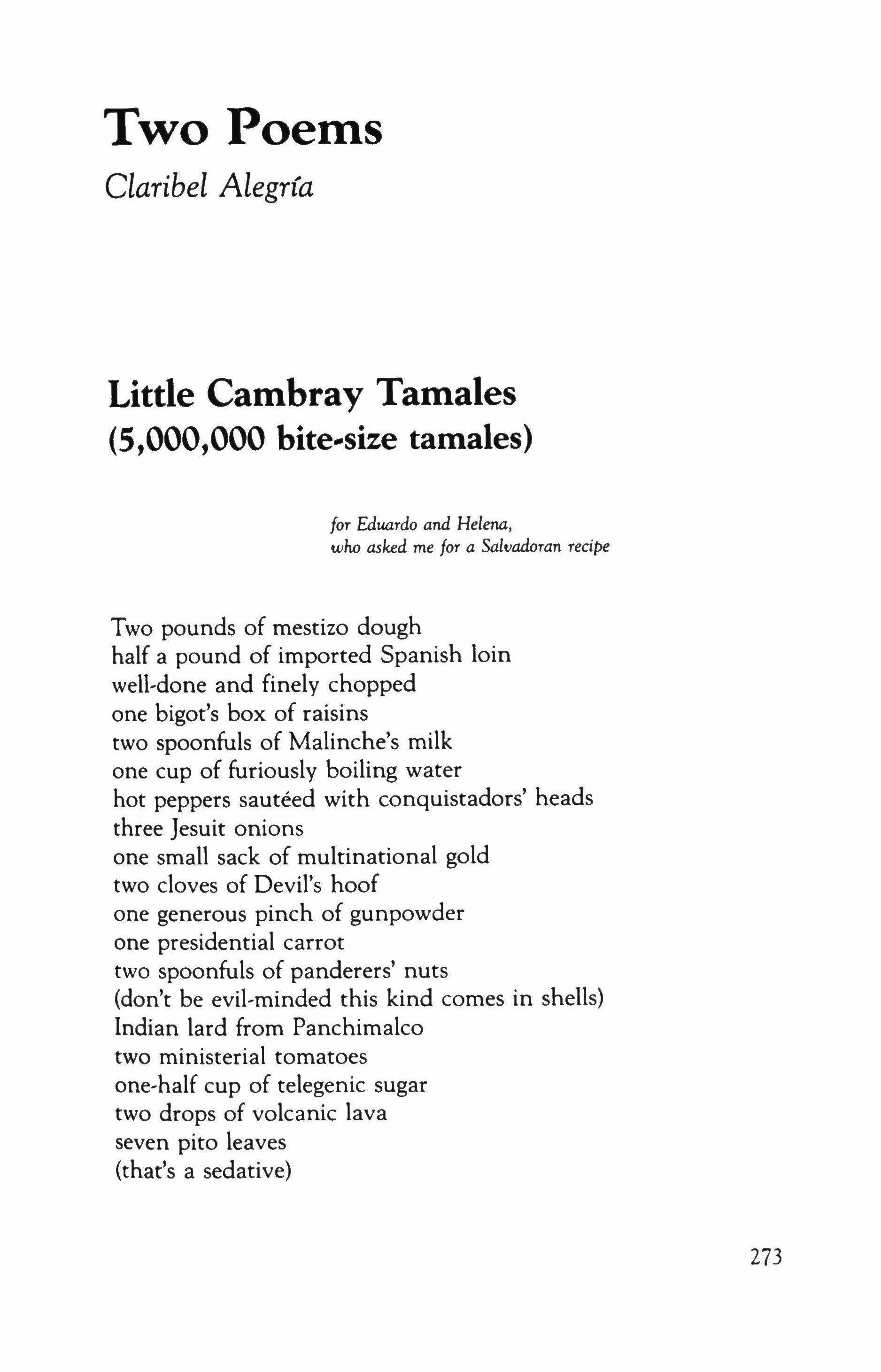
Little Cambray Tamales
(5,000,000 bite-size tamales)
for Eduardo and Helena, who asked me for a Salvadoran recipe
Two pounds of mestizo dough
half a pound of imported Spanish loin
well-done and finely chopped
one bigot's box of raisins
two spoonfuls of Malinche's milk
one cup of furiously boiling water
hot peppers sauteed with conquistadors' heads
three Jesuit onions
one small sack of multinational gold
two cloves of Devil's hoof
one generous pinch of gunpowder
one presidential carrot
two spoonfuls of panderers' nuts
(don't be evil-minded this kind comes in shells)
Indian lard from Panchimalco
two ministerial tomatoes
one-half cup of telegenic sugar
two drops of volcanic lava
seven pito leaves
(that's a sedative)
273
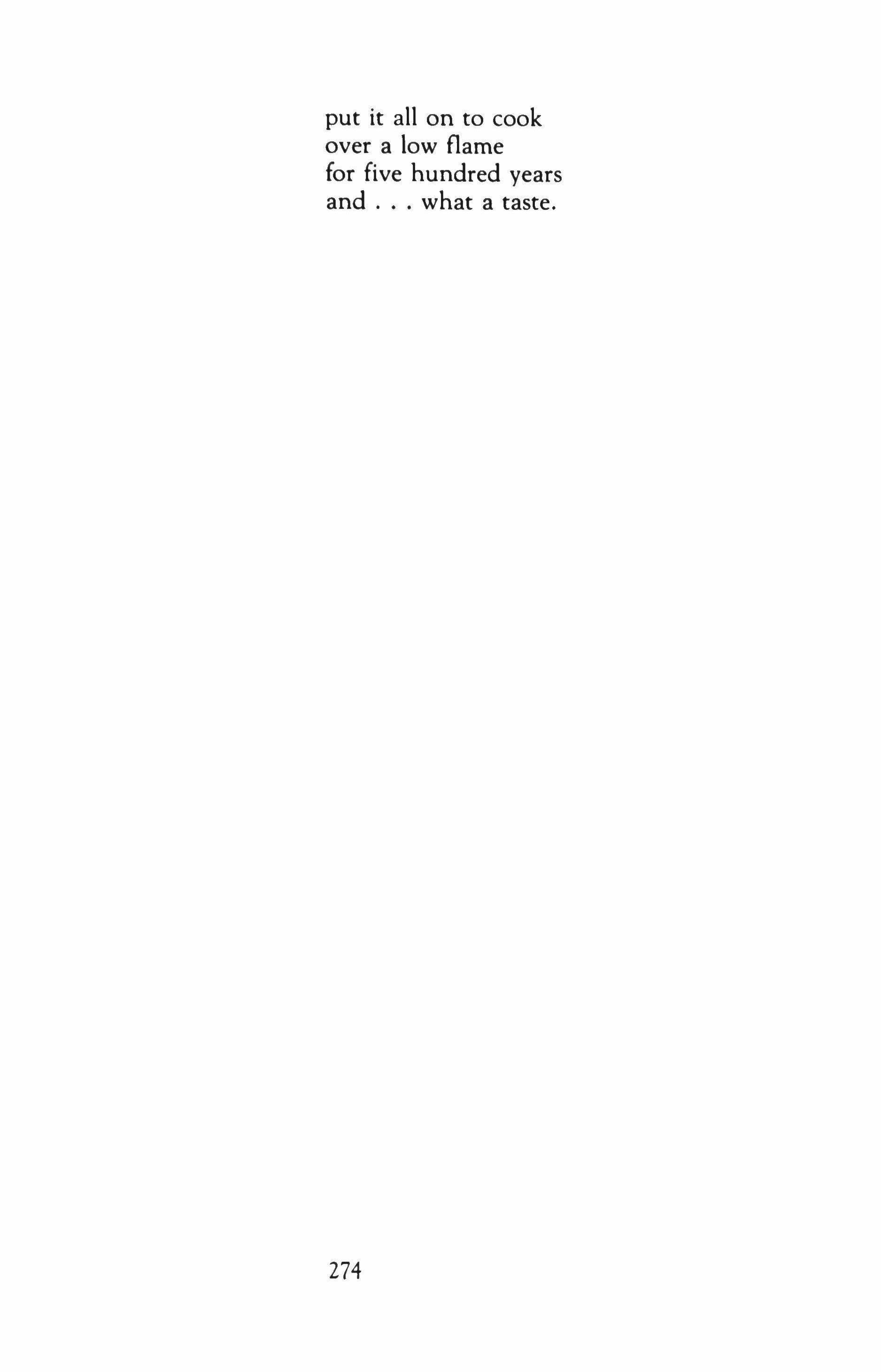
put it all on to cook over a low flame for five hundred years and what a taste.
274
Snapshots
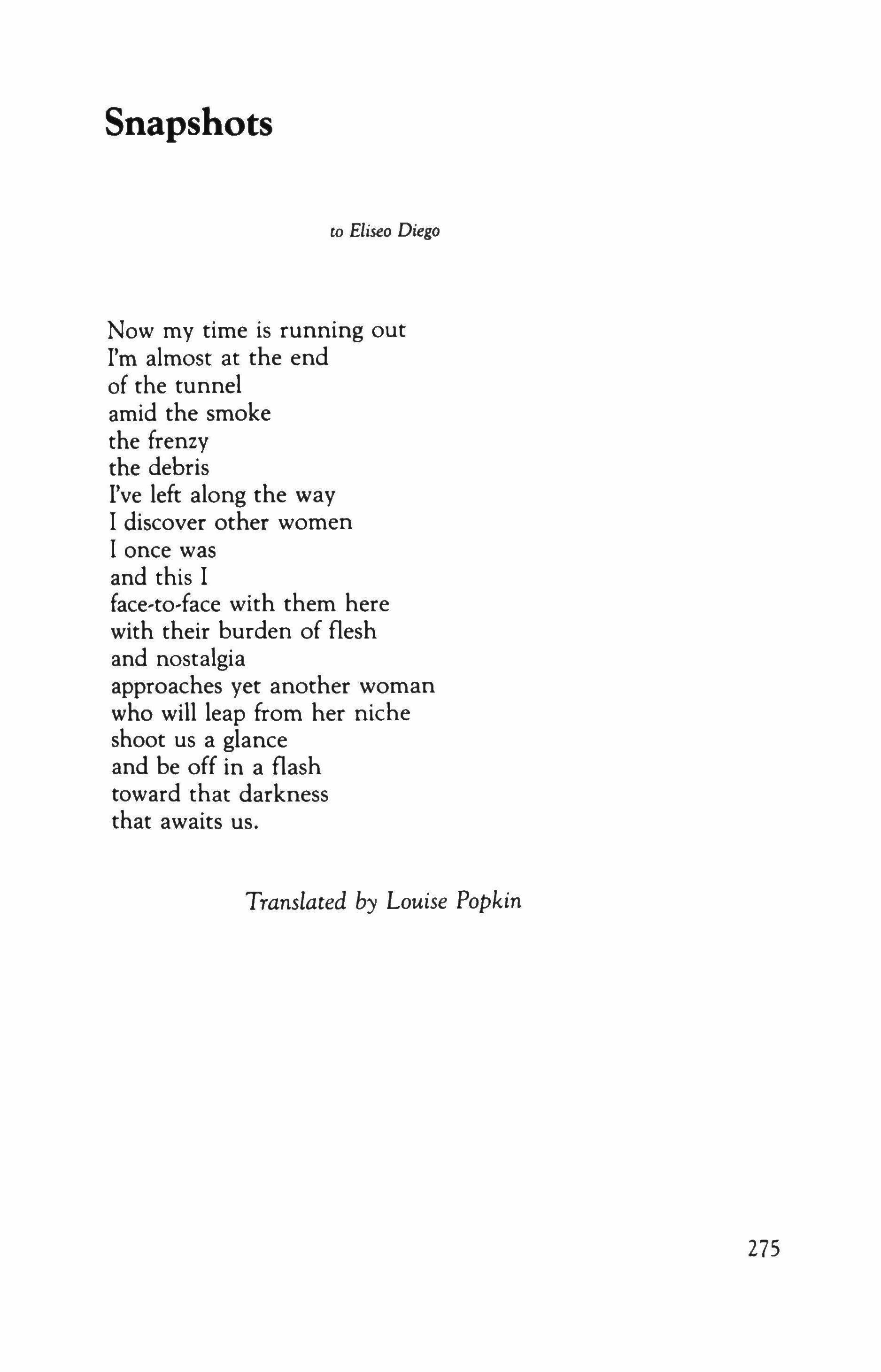 co Eliseo Diego
co Eliseo Diego
Now my time is running out I'm almost at the end of the tunnel amid the smoke the frenzy the debris I've left along the way I discover other women I once was and this I face-to-face with them here with their burden of flesh and nostalgia approaches yet another woman who will leap from her niche shoot us a glance and be off in a flash toward that darkness that awaits us.
Translated by Louise Popkin
275
Two Poems
David Galler
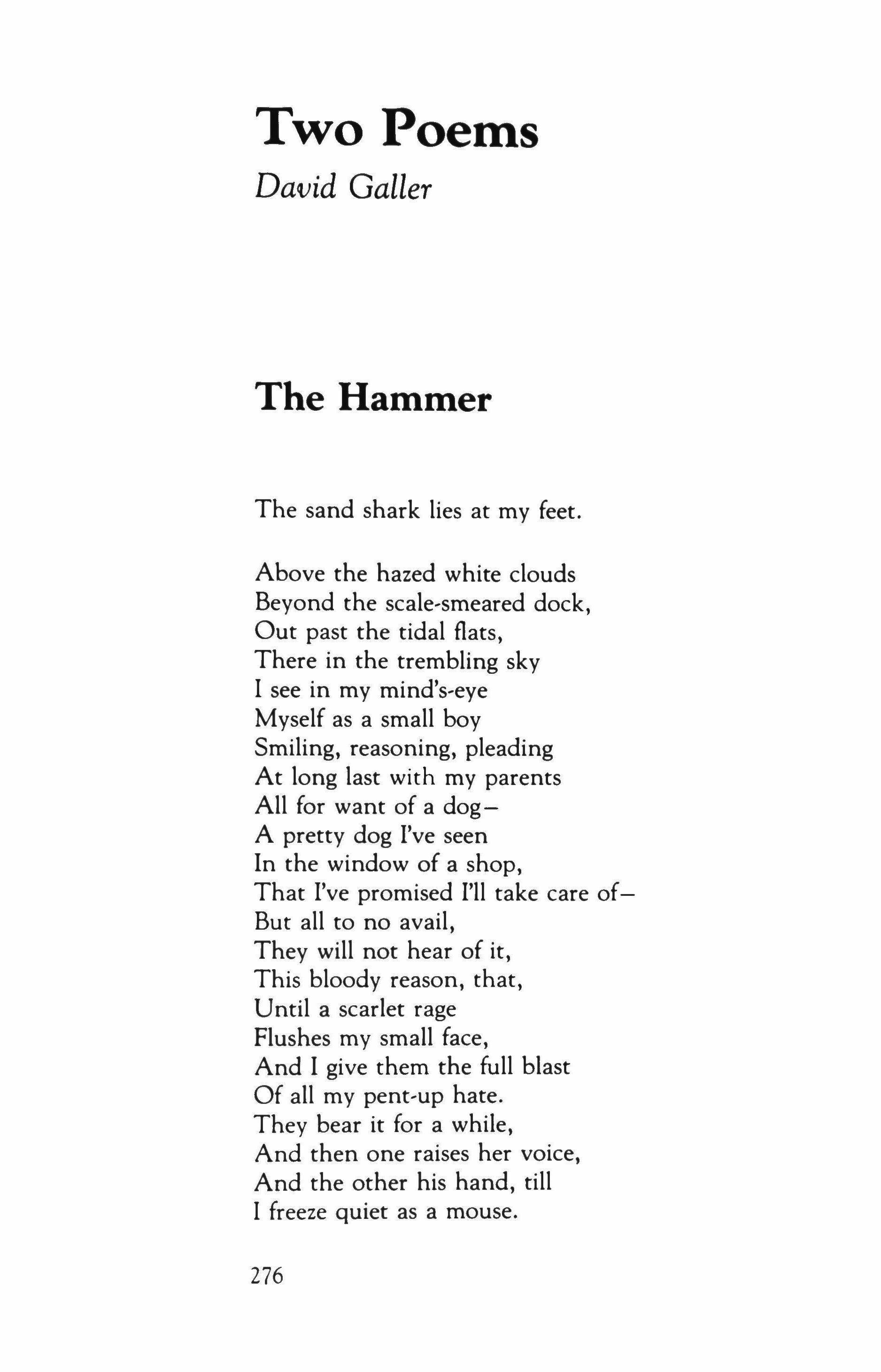
The Hammer
The sand shark lies at my feet.
Above the hazed white clouds
Beyond the scale-smeared dock, Out past the tidal flats, There in the trembling sky I see in my mind's-eye
Myself as a small boy
Smiling, reasoning, pleading At long last with my parents All for want of a dogA pretty dog I've seen In the window of a shop, That I've promised I'll take care ofBut all to no avail, They will not hear of it, This bloody reason, that, Until a scarlet rage Flushes my small face, And I give them the full blast Of all my pent-up hate. They bear it for a while, And then one raises her voice, And the other his hand, till I freeze quiet as a mouse.
276
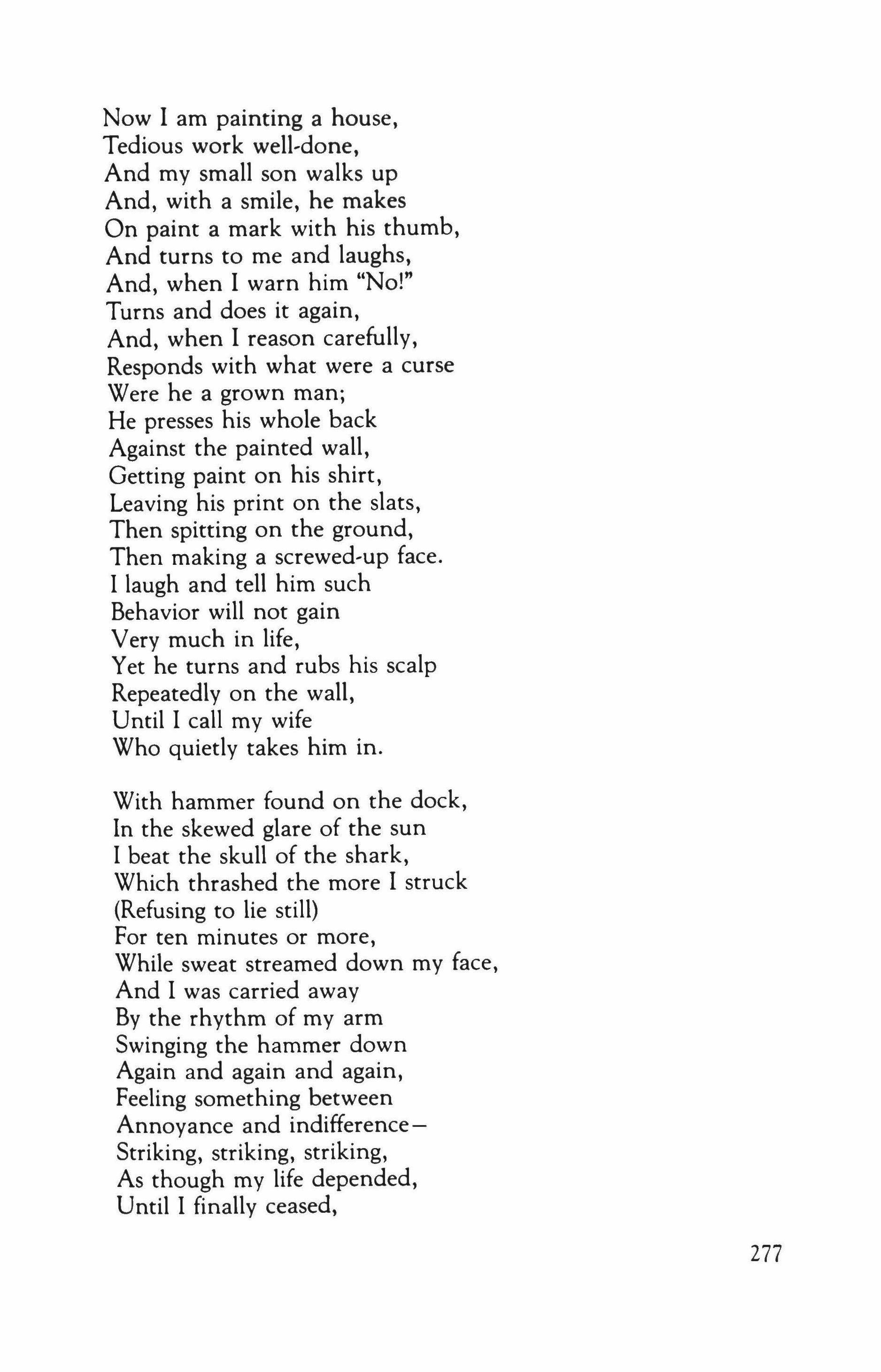
Now I am painting a house, Tedious work well-done, And my small son walks up And, with a smile, he makes On paint a mark with his thumb, And turns to me and laughs, And, when I warn him "No!" Turns and does it again, And, when I reason carefully, Responds with what were a curse Were he a grown man; He presses his whole back Against the painted wall, Getting paint on his shirt, Leaving his print on the slats, Then spitting on the ground, Then making a screwed-up face. I laugh and tell him such Behavior will not gain Very much in life, Yet he turns and rubs his scalp
Repeatedly on the wall, Until I call my wife Who quietly takes him in.
With hammer found on the dock, In the skewed glare of the sun I beat the skull of the shark, Which thrashed the more I struck (Refusing to lie still) For ten minutes or more, While sweat streamed down my face, And I was carried away By the rhythm of my arm
Swinging the hammer down Again and again and again, Feeling something between Annoyance and indifference
Striking, striking, striking, As though my life depended, Until I finally ceased,
277
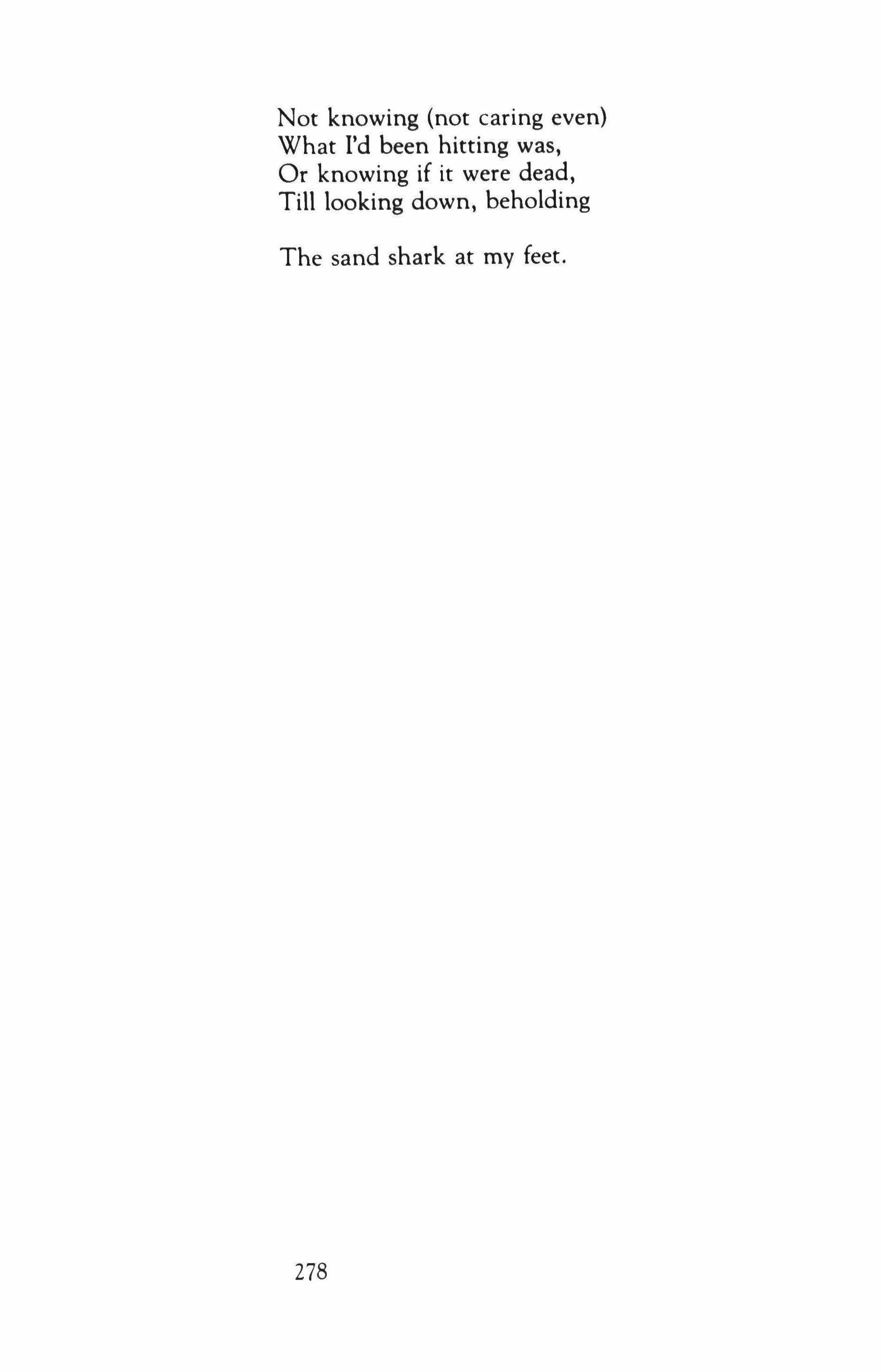
Not knowing (not caring even) What I'd been hitting was, Or knowing if it were dead, Till looking down, beholding
The sand shark at my feet.
278
Above the Irish Sea, 1971

Three hundred feet above the Irish Sea,
The greenest hillside I had ever seen
Swept down in an avalanche of wild flowers
Of every hue burnished by blazing sunlight
To the cliff's edge where mighty poundings below Scarce broke the silence of that perfect morning, Where, sprawled at total ease, I squinted up Dizzying azure height without a cloud, And pondered blankly nature's relentless grandeur Through subtle throbbings of freshest hangover, Until the self-indulgence of it all
Was lightly shattered by a strummed guitar
Under the aegis of an unpracticed hand, And, rolling slowly over on my side, I saw the long, dark, tousled locks astride
The pale brow above the round, black shades
Hiding the amphetamined, glazed eyes
Atop the wide grin and the goatee, And, under that, the crazy yellow and blue And red and black horizontally striped
Tshirt with its huge head of Mickey Mouse, Frayed leather vest, guitar, and cross-legged lap
Of my pal Tony, Kensington connection
And comic god, who, in a flash that morning, Joined with the splendid Cornish hillside scene
To make a sham of it, as it of him.
279
Four Poems
Paul Breslin
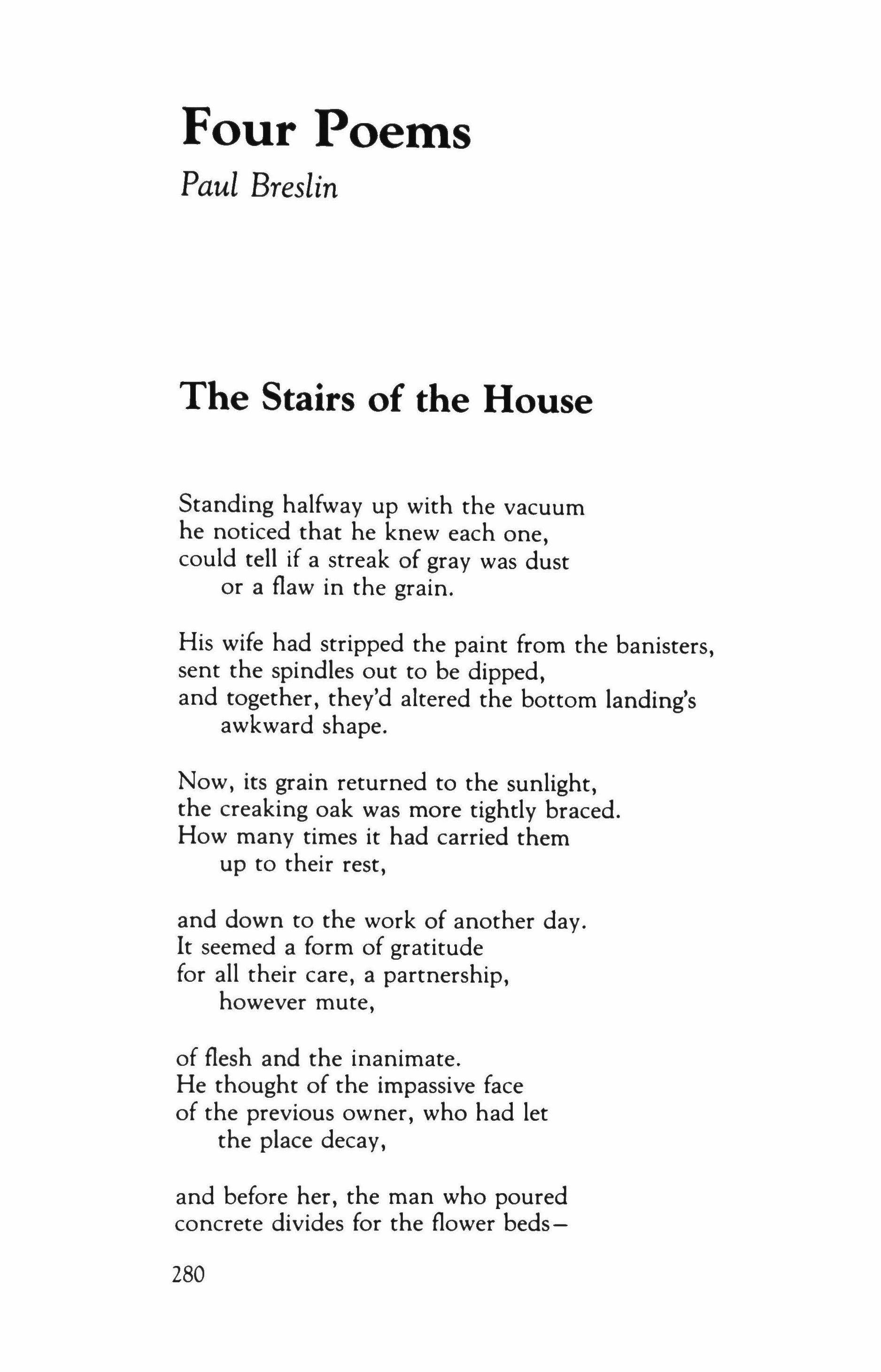
The Stairs of the House
Standing halfway up with the vacuum he noticed that he knew each one, could tell if a streak of gray was dust or a flaw in the grain.
His wife had stripped the paint from the banisters, sent the spindles out to be dipped, and together, they'd altered the bottom landing's awkward shape.
Now, its grain returned to the sunlight, the creaking oak was more tightly braced. How many times it had carried them up to their rest, and down to the work of another day. It seemed a form of gratitude for all their care, a partnership, however mute, of flesh and the inanimate. He thought of the impassive face of the previous owner, who had let the place decay, and before her, the man who poured concrete divides for the flower beds-
280
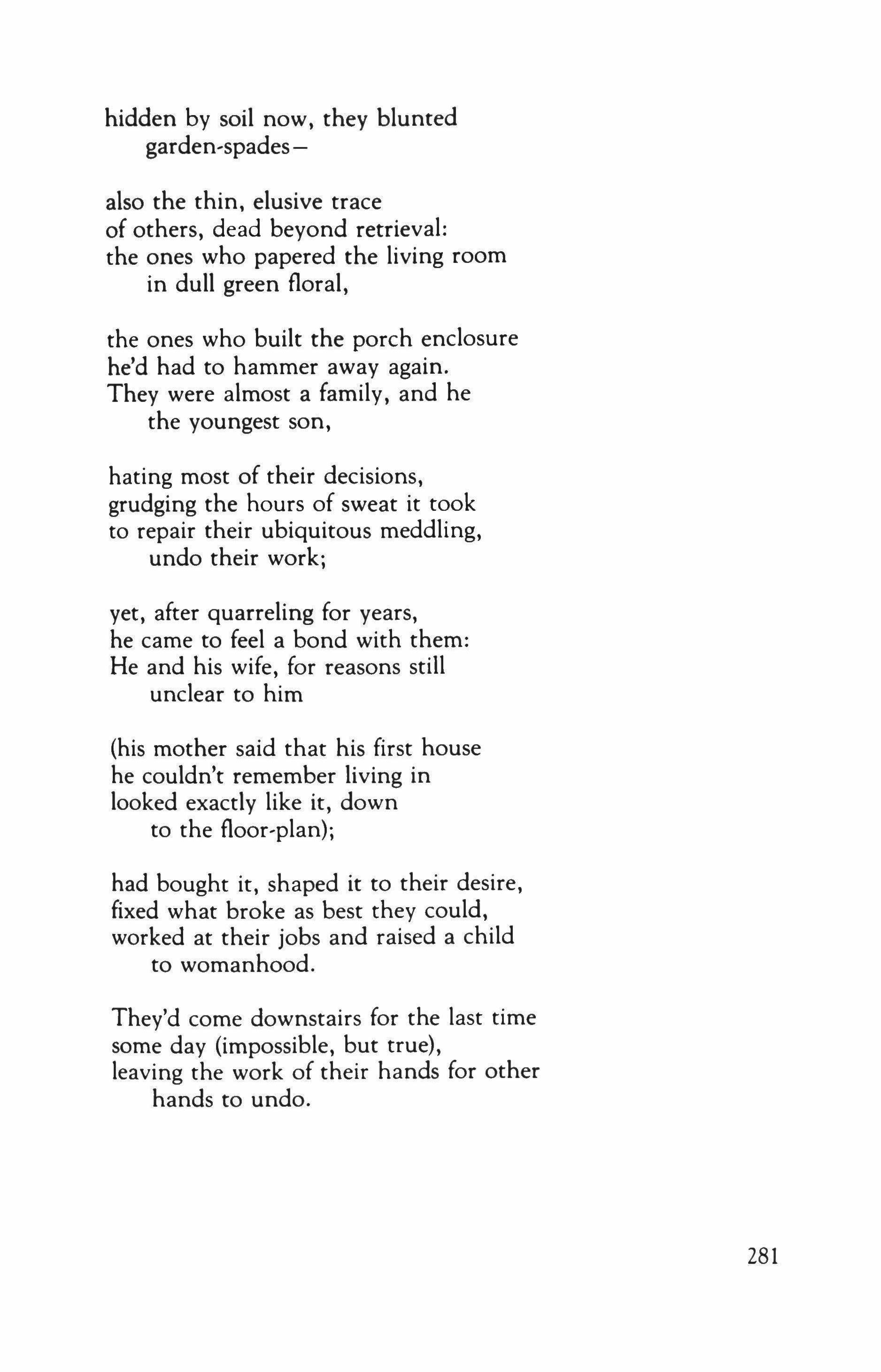
hidden by soil now, they blunted garden-spades -
also the thin, elusive trace of others, dead beyond retrieval: the ones who papered the living room in dull green floral,
the ones who built the porch enclosure he'd had to hammer away again. They were almost a family, and he the youngest son,
hating most of their decisions, grudging the hours of sweat it took to repair their ubiquitous meddling, undo their work;
yet, after quarreling for years, he came to feel a bond with them: He and his wife, for reasons still unclear to him
(his mother said that his first house he couldn't remember living in looked exactly like it, down to the floor-plan):
had bought it, shaped it to their desire, fixed what broke as best they could, worked at their jobs and raised a child to womanhood.
They'd come downstairs for the last time some day (impossible, but true), leaving the work of their hands for other hands to undo.
281
Time and the Tide
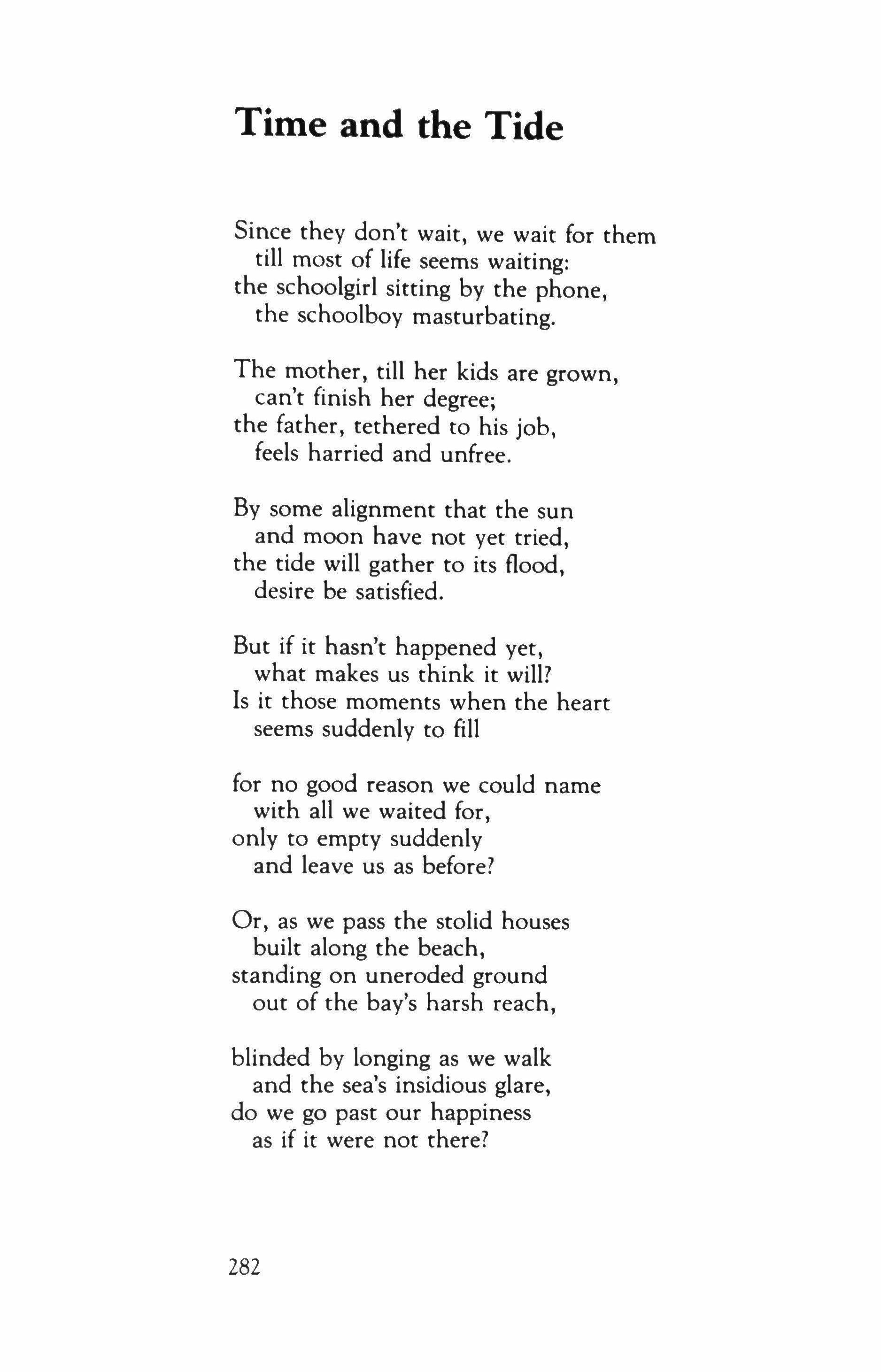
Since they don't wait, we wait for them till most of life seems waiting: the schoolgirl sitting by the phone, the schoolboy masturbating.
The mother, till her kids are grown, can't finish her degree; the father, tethered to his job, feels harried and unfree.
By some alignment that the sun and moon have not yet tried, the tide will gather to its flood, desire be satisfied.
But if it hasn't happened yet, what makes us think it will? Is it those moments when the heart seems suddenly to fill
for no good reason we could name with all we waited for, only to empty suddenly and leave us as before?
Or, as we pass the stolid houses built along the beach, standing on uneroded ground out of the bay's harsh reach,
blinded by longing as we walk and the sea's insidious glare, do we go past our happiness as if it were not there?
282
Text and Scholar
 for Harry Hayford
for Harry Hayford
1.
It branches like the whaleroad. The light of another century Scatters in its depths. Whatever has fallen into it Moves there, shattered or whole, To be borne up in the breakers That rise against the sun. What it can say is a surface, Glittering, torn, unstill.
2.
His trawler riding at anchor, He hauls his nets back in: So much spindrift, seaweed, Fragmented coral, sand. And yet from time to time His net restores to the light The other, missing half, Despaired of now for years, That mends a broken thing.
283
Two Doors Down

On the front porch, returning late, her son Is calling up to her to let him in,
And she refuses. So he curses her. Things usually get violent from here,
But there's a pause, and when she tells Him he had better shut his mouth or else
She means to kick his sorry-looking ass, Her tone is strangely close to tenderness,
As if she has to say it, so that he Can't take forgiveness from her easily.
Unnerved by that slight quaver in her voice, He needs an answer, something that saves face.
"Bullshit! Fuck it!" he says, over and over, Caught in a silence that his words can't cover.
284
Taking the Lambs to Market
Maxine Kumin
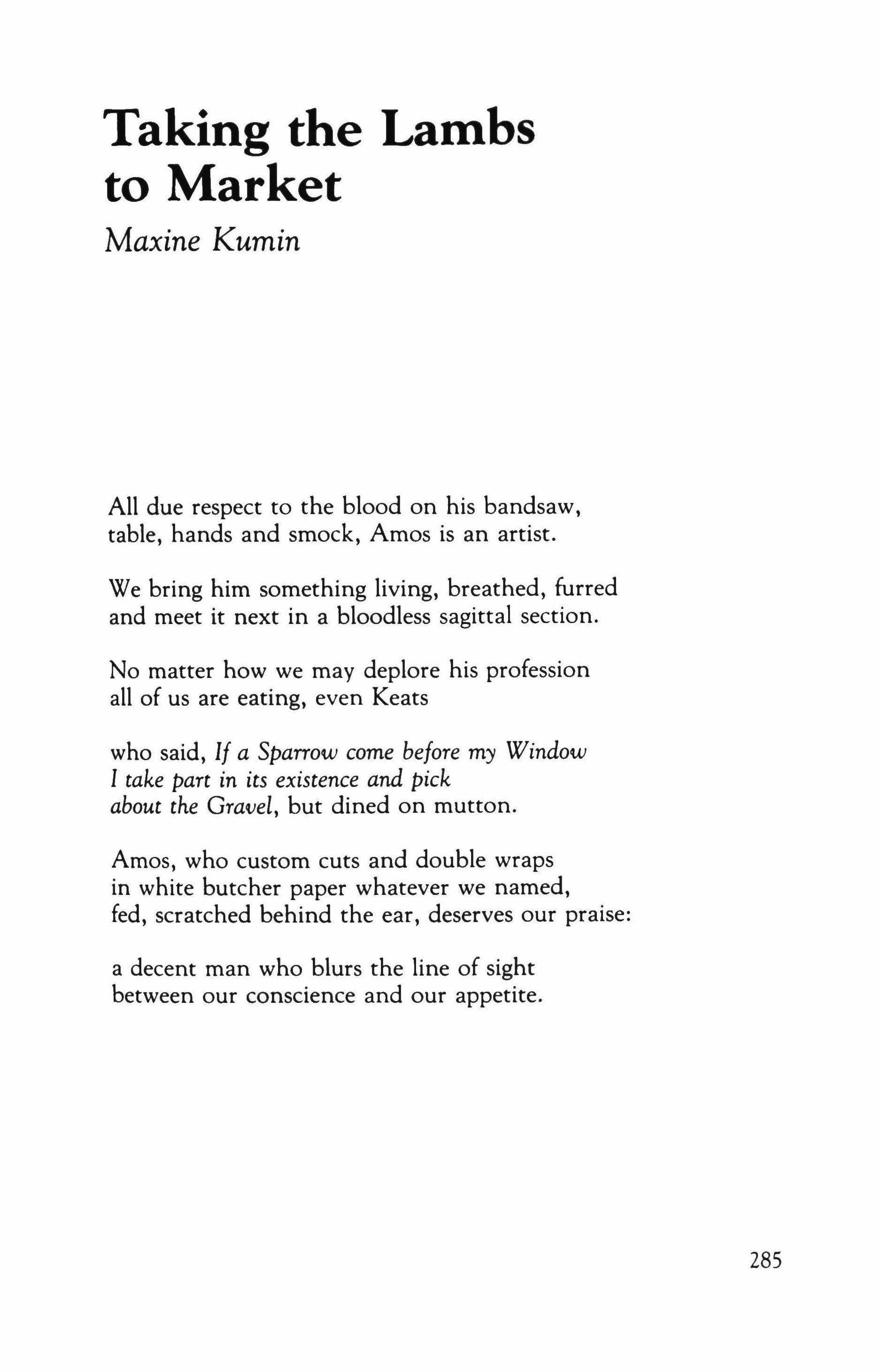
All due respect to the blood on his handsaw, table, hands and smock, Amos is an artist.
We bring him something living, breathed, furred and meet it next in a bloodless sagittal section.
No matter how we may deplore his profession all of us are eating, even Keats
who said, If a Sparrow come before my Window I take part in its existence and pick about the Gravel, but dined on mutton.
Amos, who custom cuts and double wraps in white butcher paper whatever we named, fed, scratched behind the ear, deserves our praise:
a decent man who blurs the line of sight between our conscience and our appetite.
285
The Lesson
Alan Shapiro
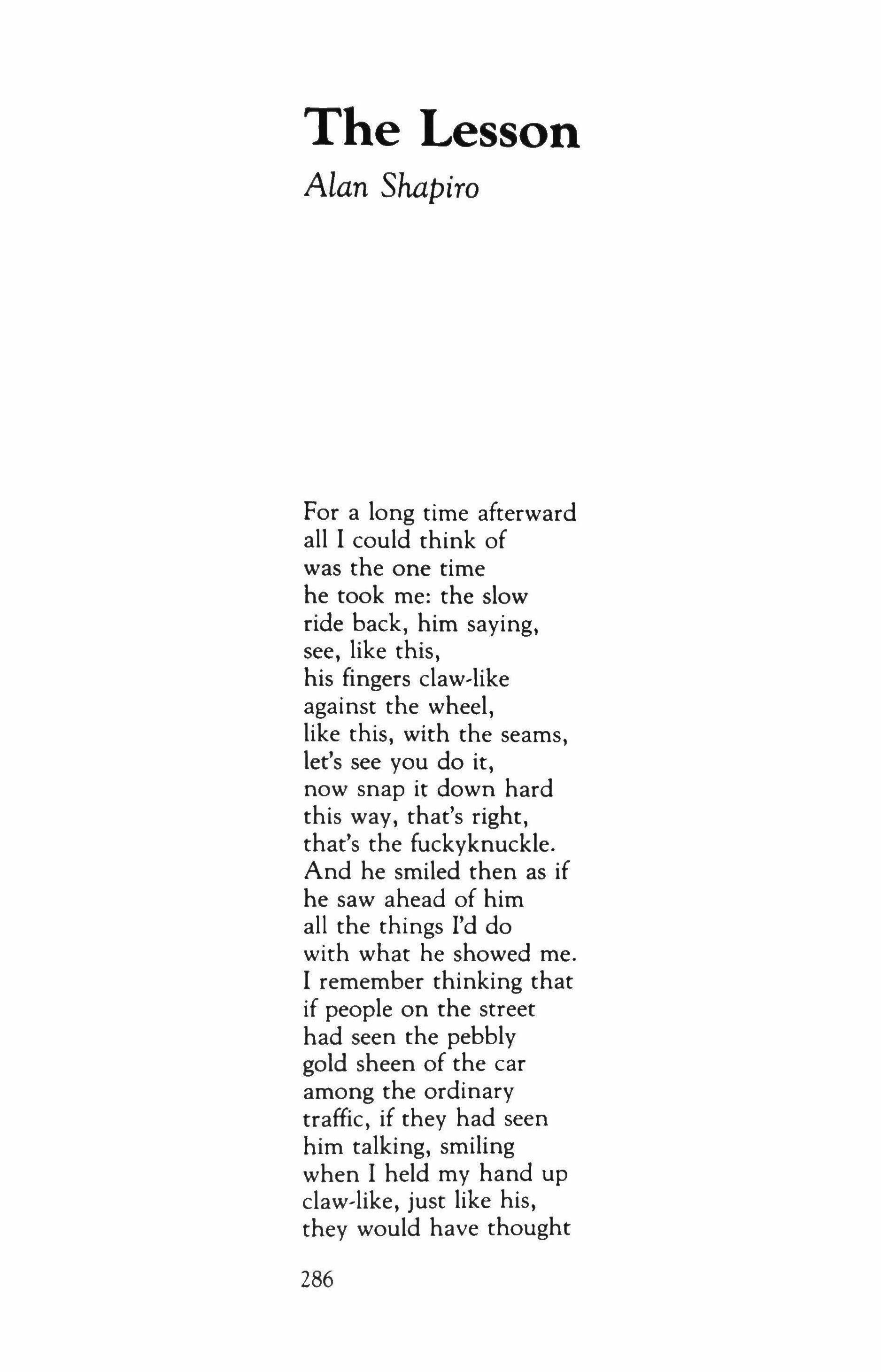
For a long time afterward all I could think of was the one time he took me: the slow ride back, him saying, see, like this, his fingers claw-like against the wheel, like this, with the seams, let's see you do it, now snap it down hard this way, that's right, that's the fuckyknuckle. And he smiled then as if he saw ahead of him all the things I'd do with what he showed me. I remember thinking that if people on the street had seen the pebbly gold sheen of the car among the ordinary traffic, if they had seen him talking, smiling when I held my hand up claw-like, just like his, they would have thought
286
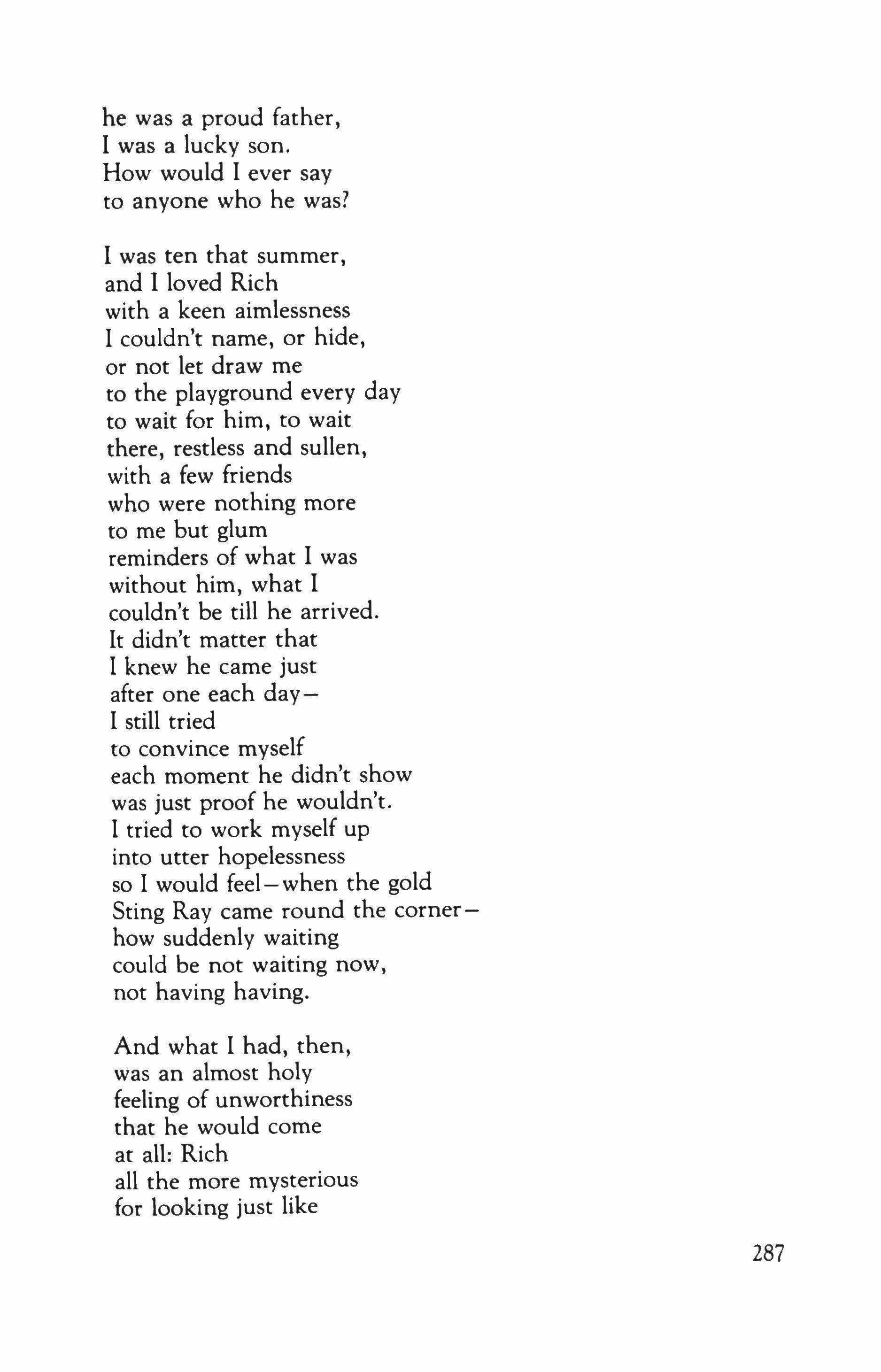
he was a proud father, I was a lucky son. How would I ever say to anyone who he was?
I was ten that summer, and I loved Rich with a keen aimlessness I couldn't name, or hide, or not let draw me to the playground every day to wait for him, to wait there, restless and sullen, with a few friends who were nothing more to me but glum reminders of what I was without him, what I couldn't be till he arrived. It didn't matter that I knew he came just after one each dayI still tried to convince myself each moment he didn't show was just proof he wouldn't. I tried to work myself up into utter hopelessness so I would feel- when the gold Sting Ray came round the cornerhow suddenly waiting could be not waiting now, not having having. And what I had, then, was an almost holy feeling of unworthiness that he would come at all: Rich all the more mysterious for looking just like
287
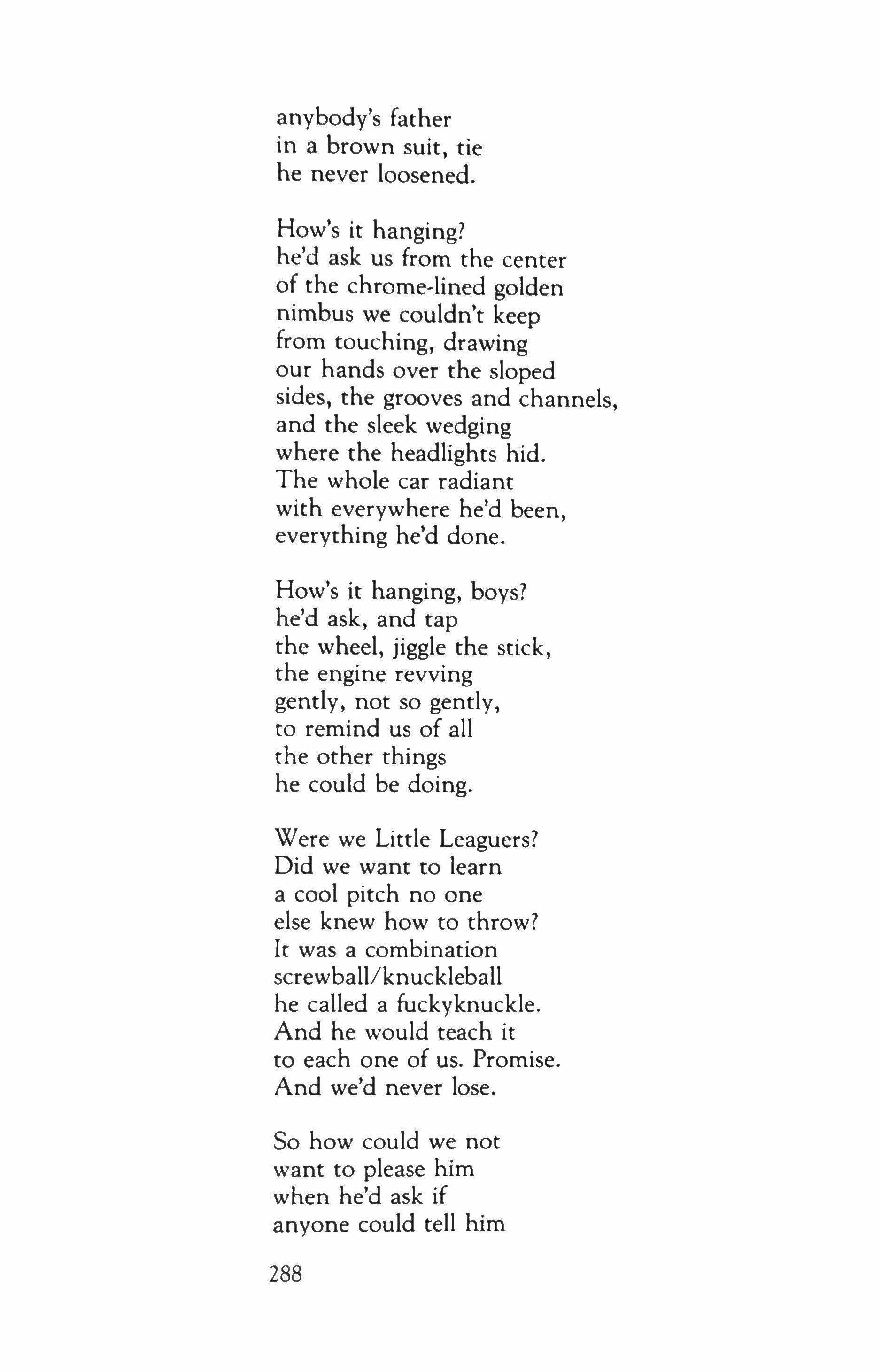
anybody's father in a brown suit, tie he never loosened.
How's it hanging?
he'd ask us from the center of the chrome-lined golden nimbus we couldn't keep from touching, drawing our hands over the sloped sides, the grooves and channels, and the sleek wedging where the headlights hid. The whole car radiant with everywhere he'd been, everything he'd done.
How's it hanging, boys? he'd ask, and tap the wheel, jiggle the stick, the engine revving gently, not so gently, to remind us of all the other things he could be doing.
Were we Little Leaguers? Did we want to learn a cool pitch no one else knew how to throw? It was a combination screwball/knuckleball he called a fuckyknuckle. And he would teach it to each one of us. Promise. And we'd never lose.
So how could we not want to please him when he'd ask if anyone could tell him
288
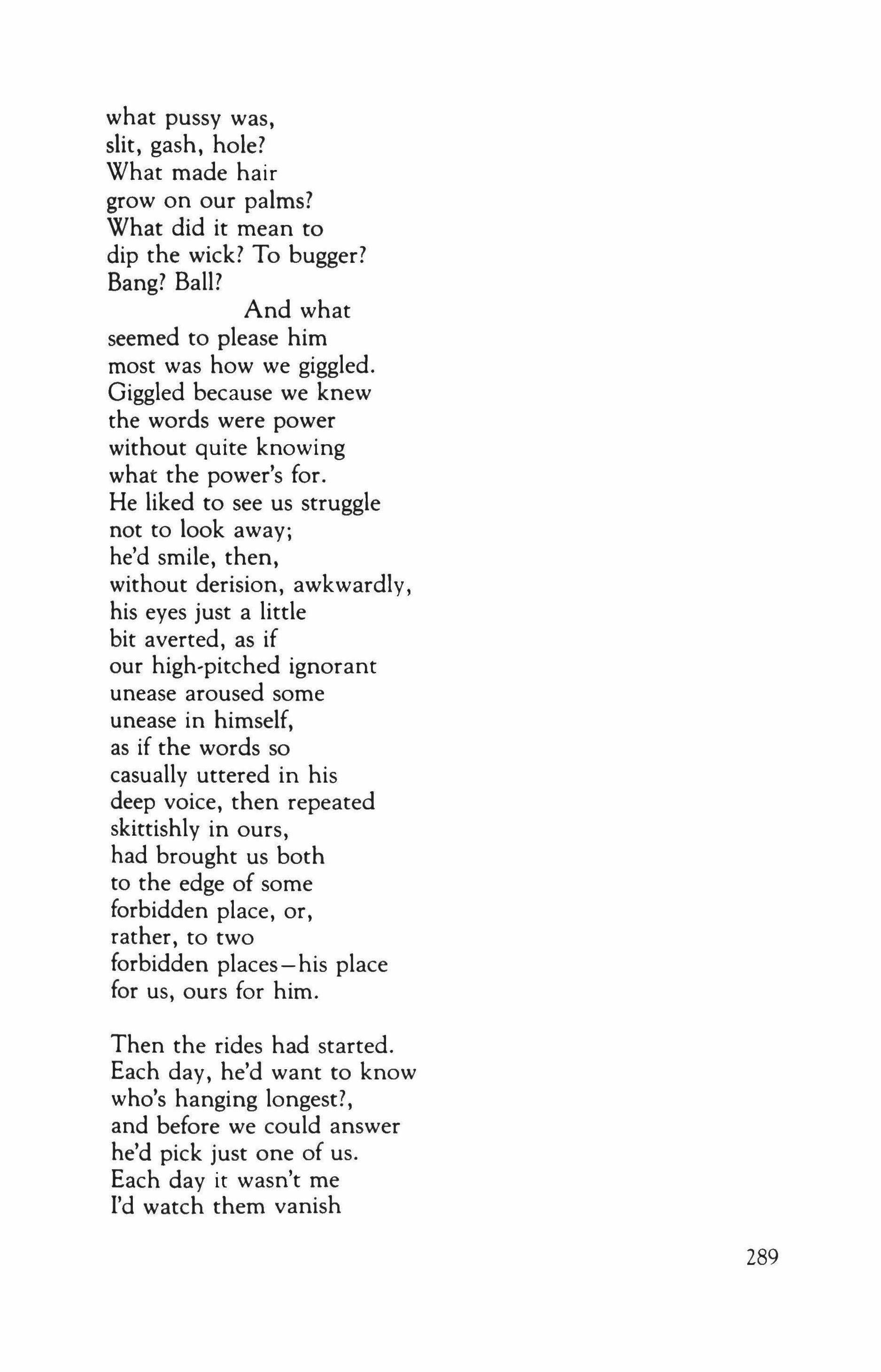
what pussy was, slit, gash, hole? What made hair grow on our palms? What did it mean to dip the wick? To bugger? Bang? Ball?
And what seemed to please him most was how we giggled. Giggled because we knew the words were power without quite knowing what the power's for. He liked to see us struggle not to look away; he'd smile, then, without derision, awkwardly, his eyes just a little bit averted, as if our high-pitched ignorant unease aroused some unease in himself, as if the words so casually uttered in his deep voice, then repeated skittishly in ours, had brought us both to the edge of some forbidden place, or, rather, to two forbidden places-his place for us, ours for him.
Then the rides had started. Each day, he'd want to know who's hanging longest?, and before we could answer he'd pick just one of us. Each day it wasn't me I'd watch them vanish
289
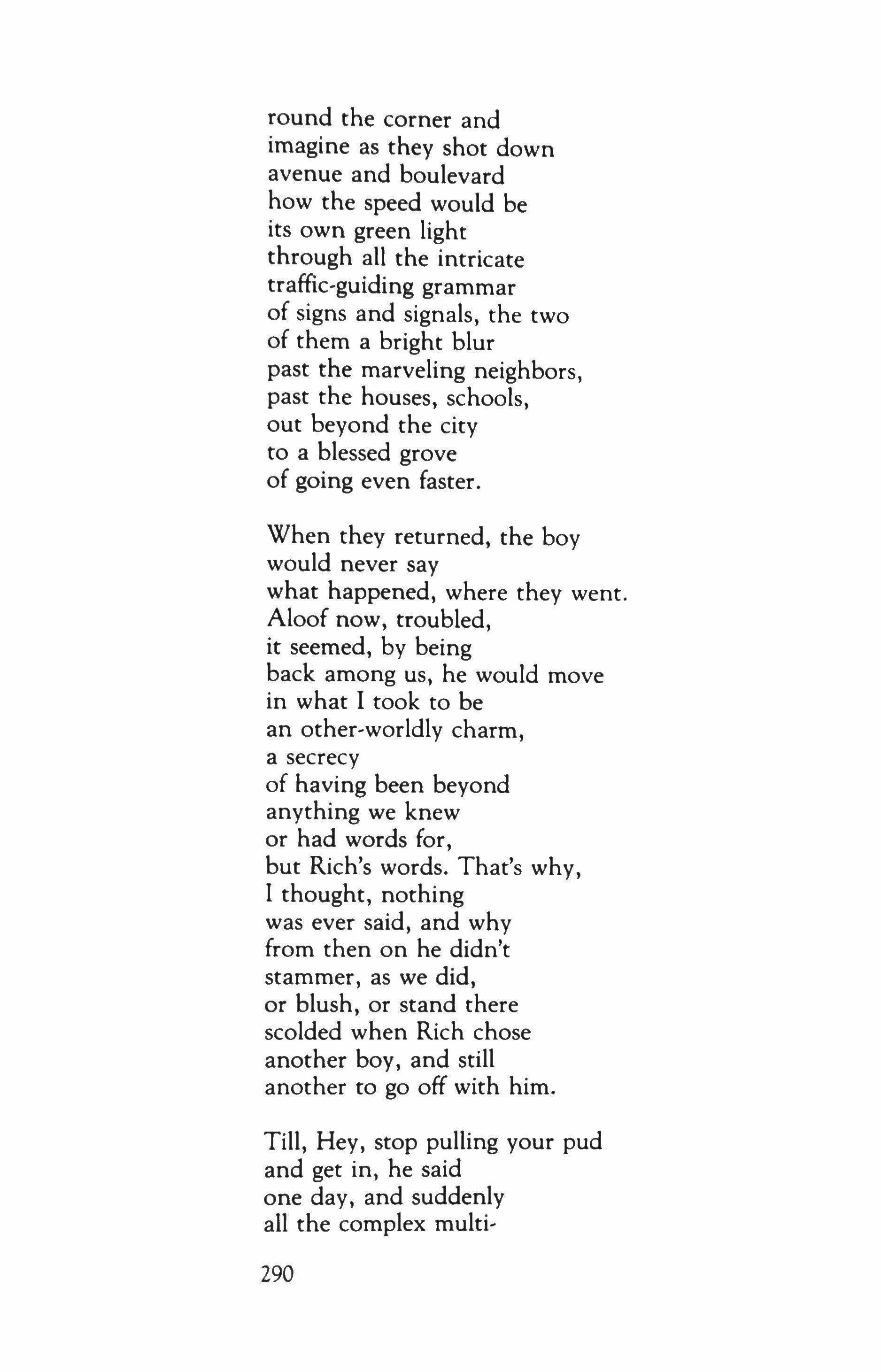
round the corner and imagine as they shot down avenue and boulevard how the speed would be its own green light through all the intricate traffic-guiding grammar of signs and signals, the two of them a bright blur past the marveling neighbors, past the houses, schools, out beyond the city to a blessed grove of going even faster.
When they returned, the boy would never say what happened, where they went. Aloof now, troubled, it seemed, by being back among us, he would move in what I took to be an other-worldly charm, a secrecy of having been beyond anything we knew or had words for, but Rich's words. That's why, I thought, nothing was ever said, and why from then on he didn't stammer, as we did, or blush, or stand there scolded when Rich chose another boy, and still another to go off with him.
Till, Hey, stop pulling your pud and get in, he said one day, and suddenly all the complex multi-
290
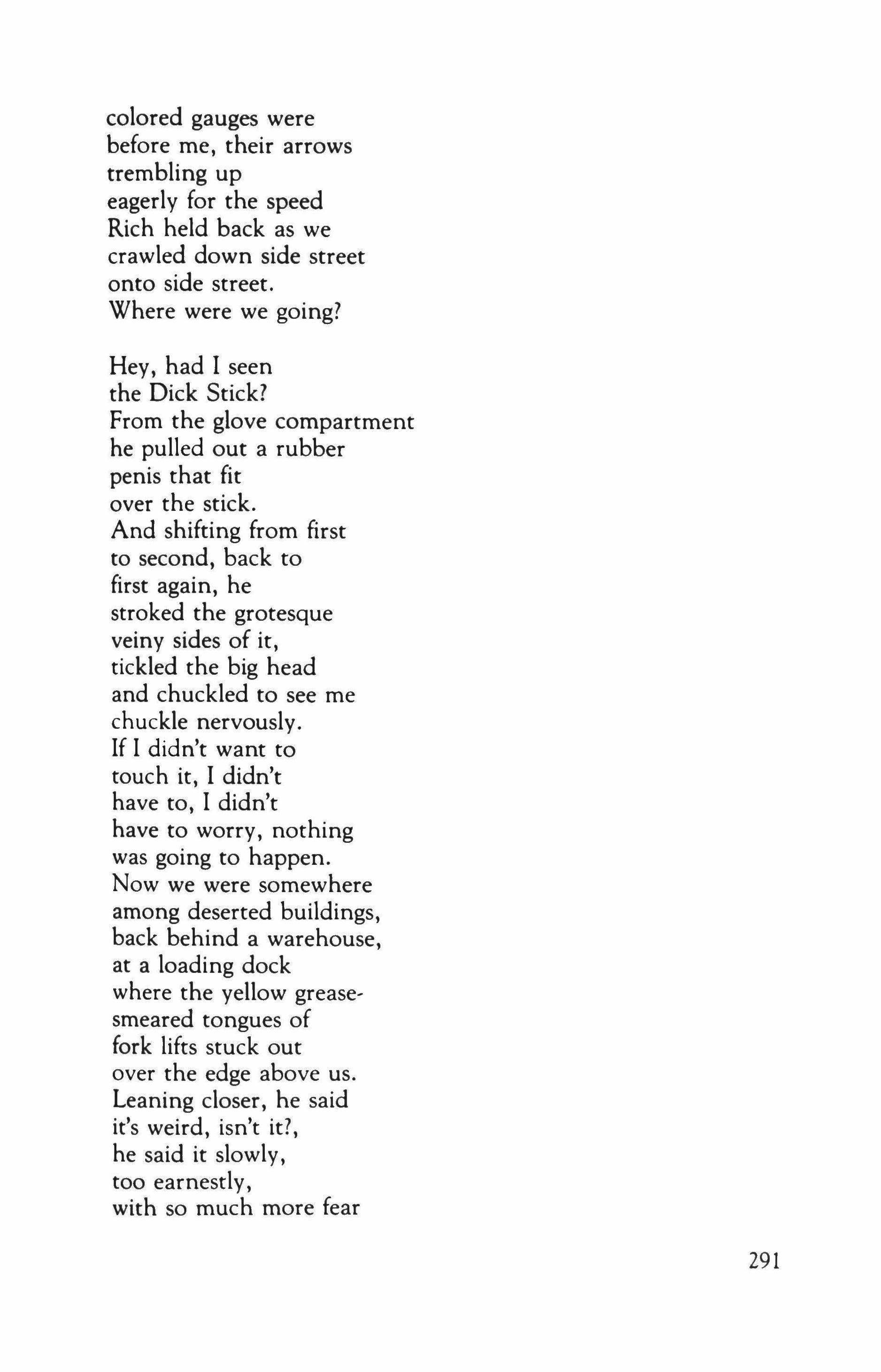
colored gauges were before me, their arrows trembling up eagerly for the speed Rich held back as we crawled down side street onto side street. Where were we going?
Hey, had I seen the Dick Stick?
From the glove compartment he pulled out a rubber penis that fit over the stick. And shifting from first to second, back to first again, he stroked the grotesque veiny sides of it, tickled the big head and chuckled to see me chuckle nervously. If I didn't want to touch it, I didn't have to, I didn't have to worry, nothing was going to happen. Now we were somewhere among deserted buildings, back behind a warehouse, at a loading dock where the yellow greasesmeared tongues of fork lifts stuck out over the edge above us. Leaning closer, he said it's weird, isn't it?, he said it slowly, too earnestly, with so much more fear
291
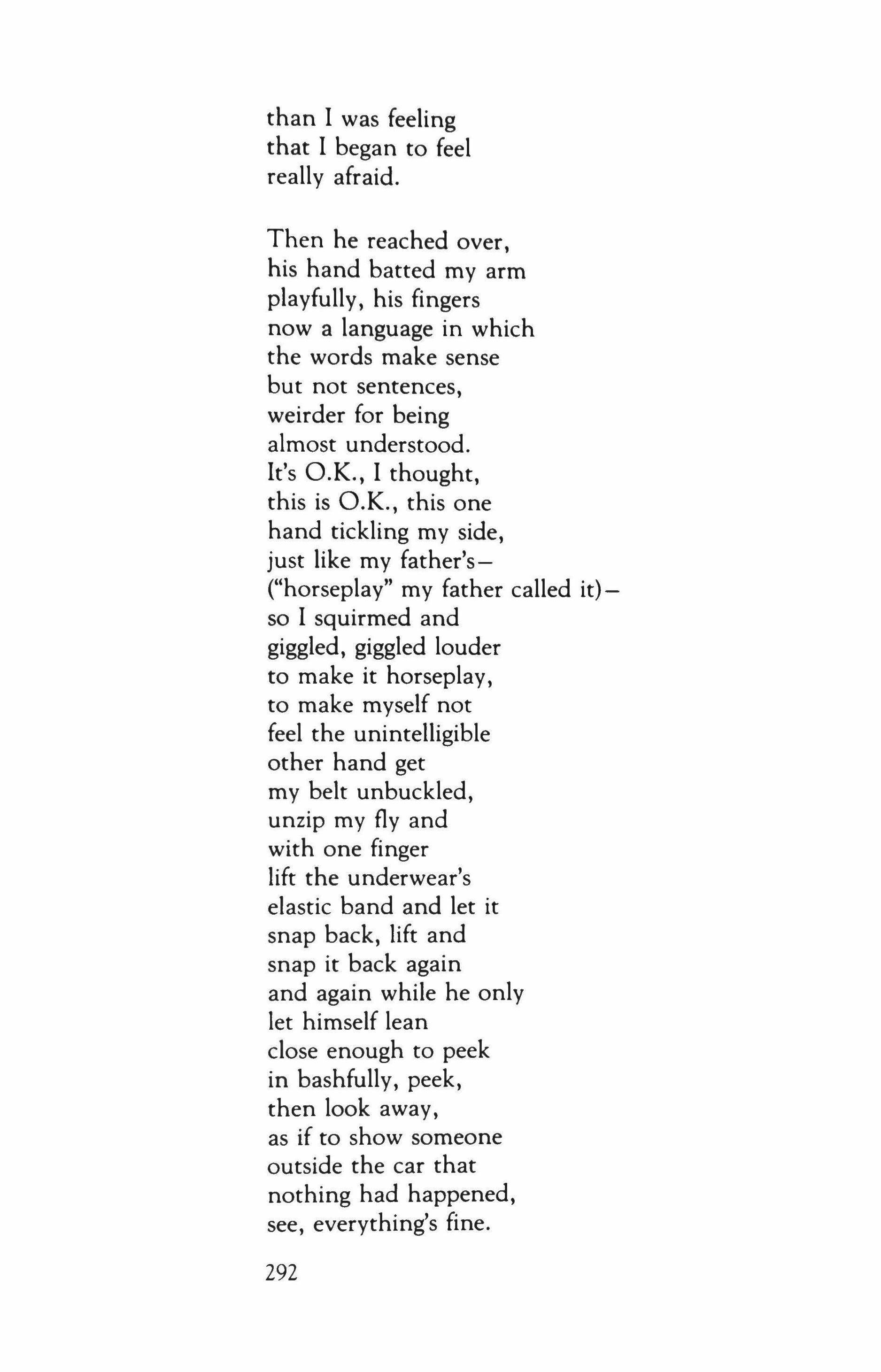
than I was feeling that I began to feel really afraid.
Then he reached over, his hand batted my arm playfully, his fingers now a language in which the words make sense but not sentences, weirder for being almost understood. It's O.K., I thought, this is O.K., this one hand tickling my side, just like my father's{"horseplay" my father called it}so I squirmed and giggled, giggled louder to make it horseplay, to make myself not feel the unintelligible other hand get my belt unbuckled, unzip my fly and with one finger lift the underwear's elastic band and let it snap back, lift and snap it back again and again while he only let himself lean close enough to peek in bashfully, peek, then look away, as if to show someone outside the car that nothing had happened, see, everything's fine.
292
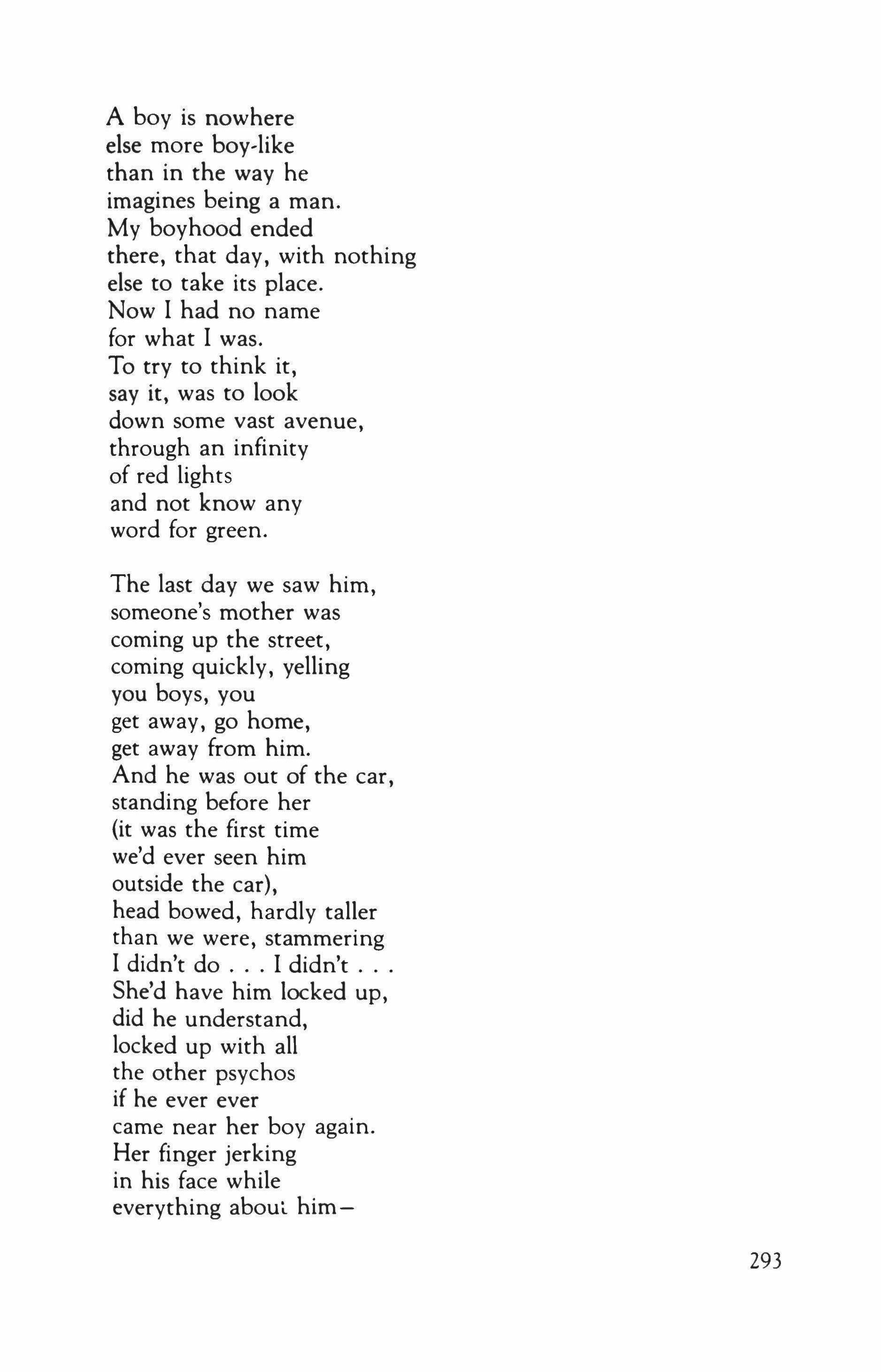
A boy is nowhere else more boy-like than in the way he imagines being a man. My boyhood ended there, that day, with nothing else to take its place. Now I had no name for what I was. To try to think it, say it, was to look down some vast avenue, through an infinity of red lights and not know any word for green.
The last day we saw him, someone's mother was coming up the street, coming quickly, yelling you boys, you get away, go home, get away from him. And he was out of the car, standing before her (it was the first time we'd ever seen him outside the car), head bowed, hardly taller than we were, stammering I didn't do I didn't She'd have him locked up, did he understand, locked up with all the other psychos if he ever ever came near her boy again. Her finger jerking in his face while everything about him-
293

the glassy eyes, the hands held out in pleading, and the mouth trembling, wordless-said back it wasn't fair, said it like any boy punished unfairly, as if her accusation made him innocent, and this I would come to think was what he must have wanted all along.
At that time, though, all I saw was the back wheels of the Sting Ray skidding as it shrieked away, the mother stalking after, still pointing, yelling; all I could feel was my throwing hand, the fingers flexing claw,like and still more claw-like, till I got it right.
294
Three Poems
Imre Oravecz
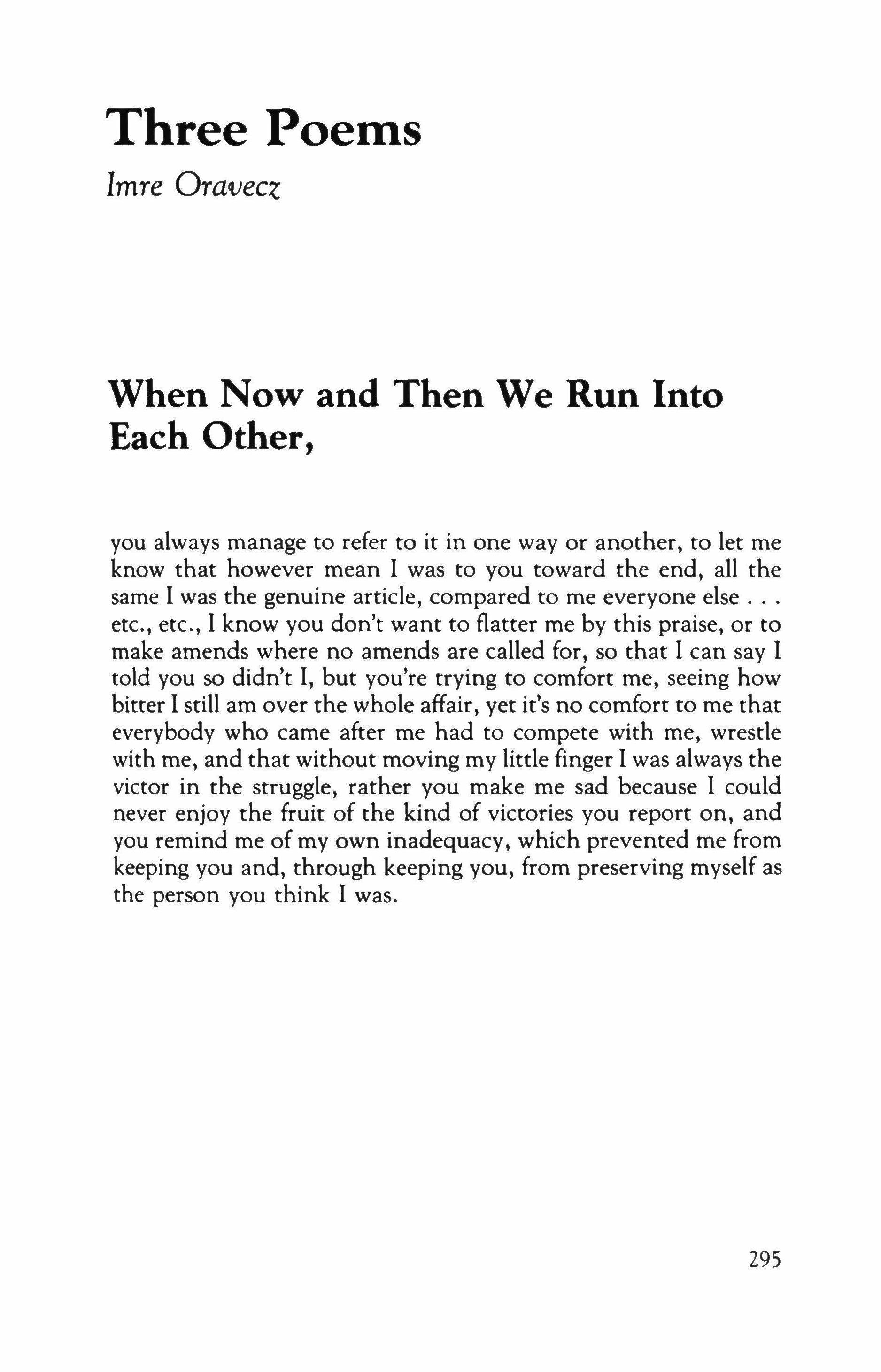
When Now and Then We Run Into Each Other,
you always manage to refer to it in one way or another, to let me know that however mean I was to you toward the end, all the same I was the genuine article, compared to me everyone else etc., etc., I know you don't want to flatter me by this praise, or to make amends where no amends are called for, so that I can say I told you so didn't I, but you're trying to comfort me, seeing how bitter I still am over the whole affair, yet it's no comfort to me that everybody who came after me had to compete with me, wrestle with me, and that without moving my little finger I was always the victor in the struggle, rather you make me sad because I could never enjoy the fruit of the kind of victories you report on, and you remind me of my own inadequacy, which prevented me from keeping you and, through keeping you, from preserving myself as the person you think I was.
295
After We Broke Up,
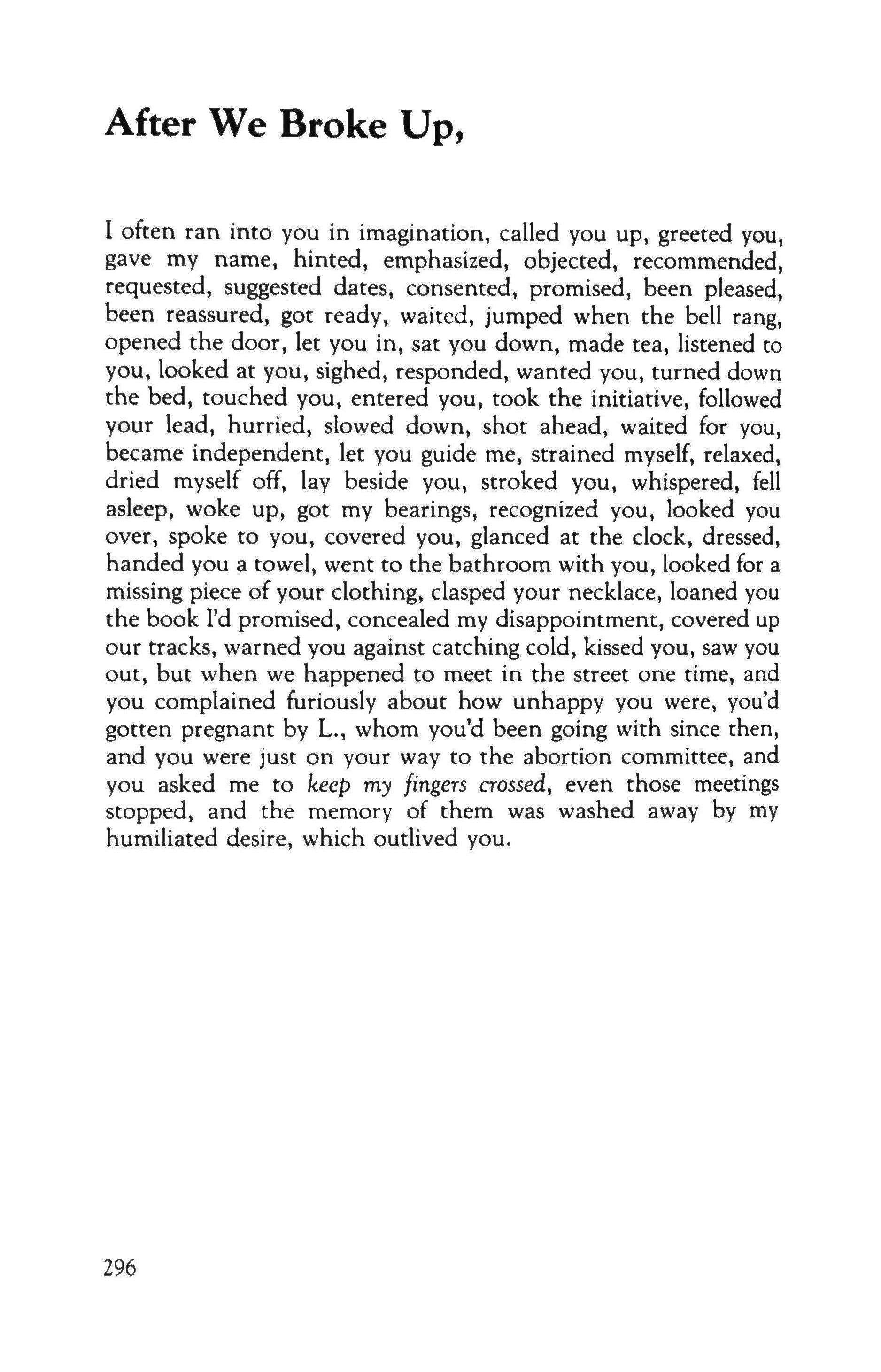
I often ran into you in imagination, called you up, greeted you, gave my name, hinted, emphasized, objected, recommended, requested, suggested dates, consented, promised, been pleased, been reassured, got ready, waited, jumped when the bell rang, opened the door, let you in, sat you down, made tea, listened to you, looked at you, sighed, responded, wanted you, turned down the bed, touched you, entered you, took the initiative, followed your lead, hurried, slowed down, shot ahead, waited for you, became independent, let you guide me, strained myself, relaxed, dried myself off, lay beside you, stroked you, whispered, fell asleep, woke up, got my bearings, recognized you, looked you over, spoke to you, covered you, glanced at the clock, dressed, handed you a towel, went to the bathroom with you, looked for a missing piece of your clothing, clasped your necklace, loaned you the book I'd promised, concealed my disappointment, covered up our tracks, warned you against catching cold, kissed you, saw you out, but when we happened to meet in the street one time, and you complained furiously about how unhappy you were, you'd gotten pregnant by L., whom you'd been going with since then, and you were just on your way to the abortion committee, and you asked me to keep my fingers crossed, even those meetings stopped, and the memory of them was washed away by my humiliated desire, which outlived you.
296
It Was Still Summer,
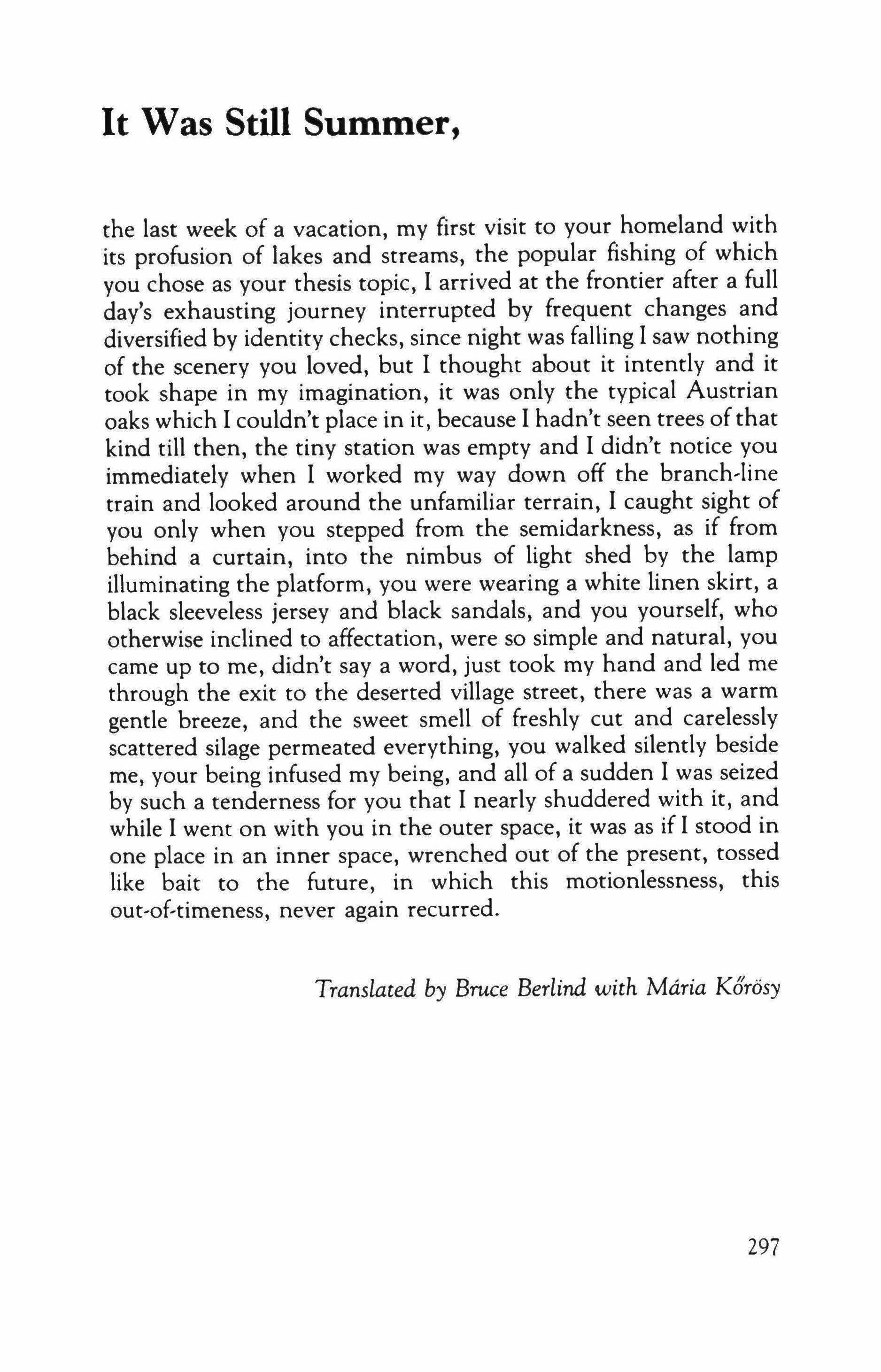
the last week of a vacation, my first visit to your homeland with its profusion of lakes and streams, the popular fishing of which you chose as your thesis topic, I arrived at the frontier after a full day's exhausting journey interrupted by frequent changes and diversified by identity checks, since night was falling I saw nothing of the scenery you loved, but I thought about it intently and it took shape in my imagination, it was only the typical Austrian oaks which I couldn't place in it, because I hadn't seen trees ofthat kind till then, the tiny station was empty and I didn't notice you immediately when I worked my way down off the branch-line train and looked around the unfamiliar terrain, I caught sight of you only when you stepped from the semidarkness, as if from behind a curtain, into the nimbus of light shed by the lamp illuminating the platform, you were wearing a white linen skirt, a black sleeveless jersey and black sandals, and you yourself, who otherwise inclined to affectation, were so simple and natural, you came up to me, didn't say a word, just took my hand and led me through the exit to the deserted village street, there was a warm gentle breeze, and the sweet smell of freshly cut and carelessly scattered silage permeated everything, you walked silently beside me, your being infused my being, and all of a sudden I was seized by such a tenderness for you that I nearly shuddered with it, and while I went on with you in the outer space, it was as if I stood in one place in an inner space, wrenched out of the present, tossed like bait to the future, in which this motionlessness, this out-of-timeness, never again recurred.
Translated by Bruce Berlind with Maria Korosy
297
The Dancer or the Dance
Rebecca Seiferle
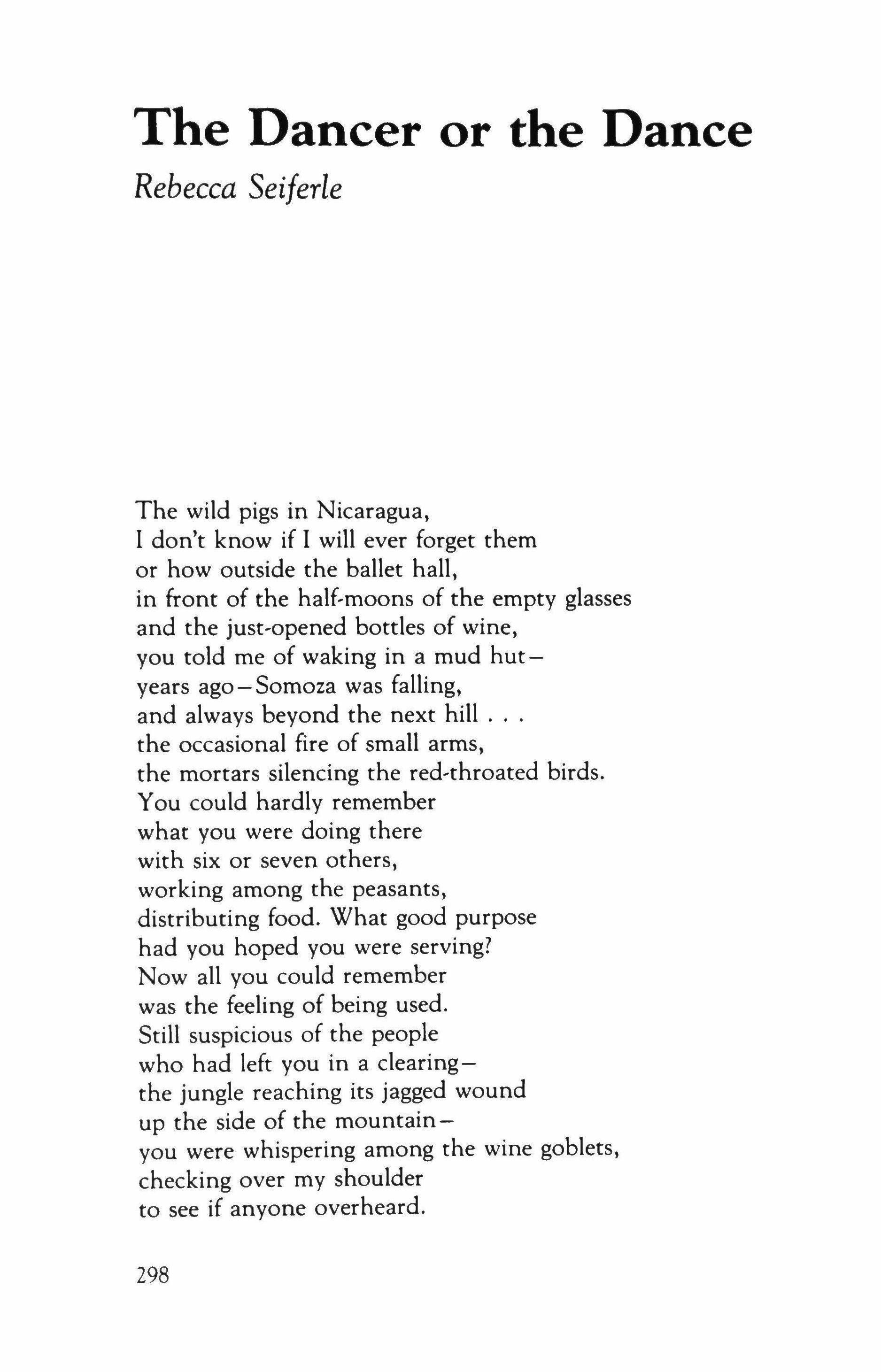
The wild pigs in Nicaragua, I don't know if I will ever forget them or how outside the ballet hall, in front of the half-moons of the empty glasses and the just-opened bottles of wine, you told me of waking in a mud hutyears ago - Somoza was falling, and always beyond the next hill the occasional fire of small arms, the mortars silencing the red-throated birds. You could hardly remember what you were doing there with six or seven others, working among the peasants, distributing food. What good purpose had you hoped you were serving? Now all you could remember was the feeling of being used. Still suspicious of the people who had left you in a clearingthe jungle reaching its jagged wound up the side of the mountainyou were whispering among the wine goblets, checking over my shoulder to see if anyone overheard.
298

It had been a disorienting week, you said. In the morning you were driving the black road horne, back to your dying-of-cancer father-in-law, not knowing what grief, what amputation, dear God, would greet you at the door, and yet, in the room where we were talking, the wine glasses were full of light and we were tasting our newfound friendship for one another. Into the goblets, down the black road, out from the crystal reflections, carne your memory of those pigs that rampaged, squealing, toward you. You were sleeping on a mat an inch above the floor and when you woke up, staring into their myopic eyes, smelling them, you could not tell the stink of their fear from your own.
I could see your ballerina's body, those frail bones, those fine elbowsyet strong enough to bear your entire weight on one toehuddling beneath a blanket, trying to hide from the slobbering shapes, and I wanted to say something, rescue you, from those pigs that smelled of the death in your life, snorting toward you and wrinkling a foul omnivorous nose.
But they were just pigs. Maybe not ordinary trotters, not the fat sleek buckets of lard kept in a six-by-three confinement pen, fattened for slaughter all their brief lives, but not metaphors either.
299

They were wild pigs, meat-eating pigs, scooping up nests of baby birds, eating whole rodents, ruining gardens, but cheerfully, without malice, like the javelinas
I saw once on the plains in Texas crunching whole cactus, grinding thorns between their teeth, as if nothing would refuse to sustain them. And it was true, the hackles on their necks aimed a thousand tiny spears, protecting them from the sun, the jaguars, the venomous snakes.
And yet, gulping down everything, they were, for all of their viciousness, only pigs. They injured you with fear, but, otherwise, did not touch you. Drumming their hooves, they wheeled back into the jungle and left on the dirt floor of the hut, triangular footprints, urine stains, undigested grain, and this shudder of revulsion shaking along your bones.
The story made me love you. I wanted to find the red bird I had heard that morning and point it out to you, still singing, alive. Your memory of the pigs reminded me of everything I ever wanted to save, the sow I once helped load into a pickup, how she stood in the hot sun and fighting the rocks, the sticks prodding her forward, planted her feet and screamed. Perhaps she knew where she was going. Perhaps she had a premonition
300
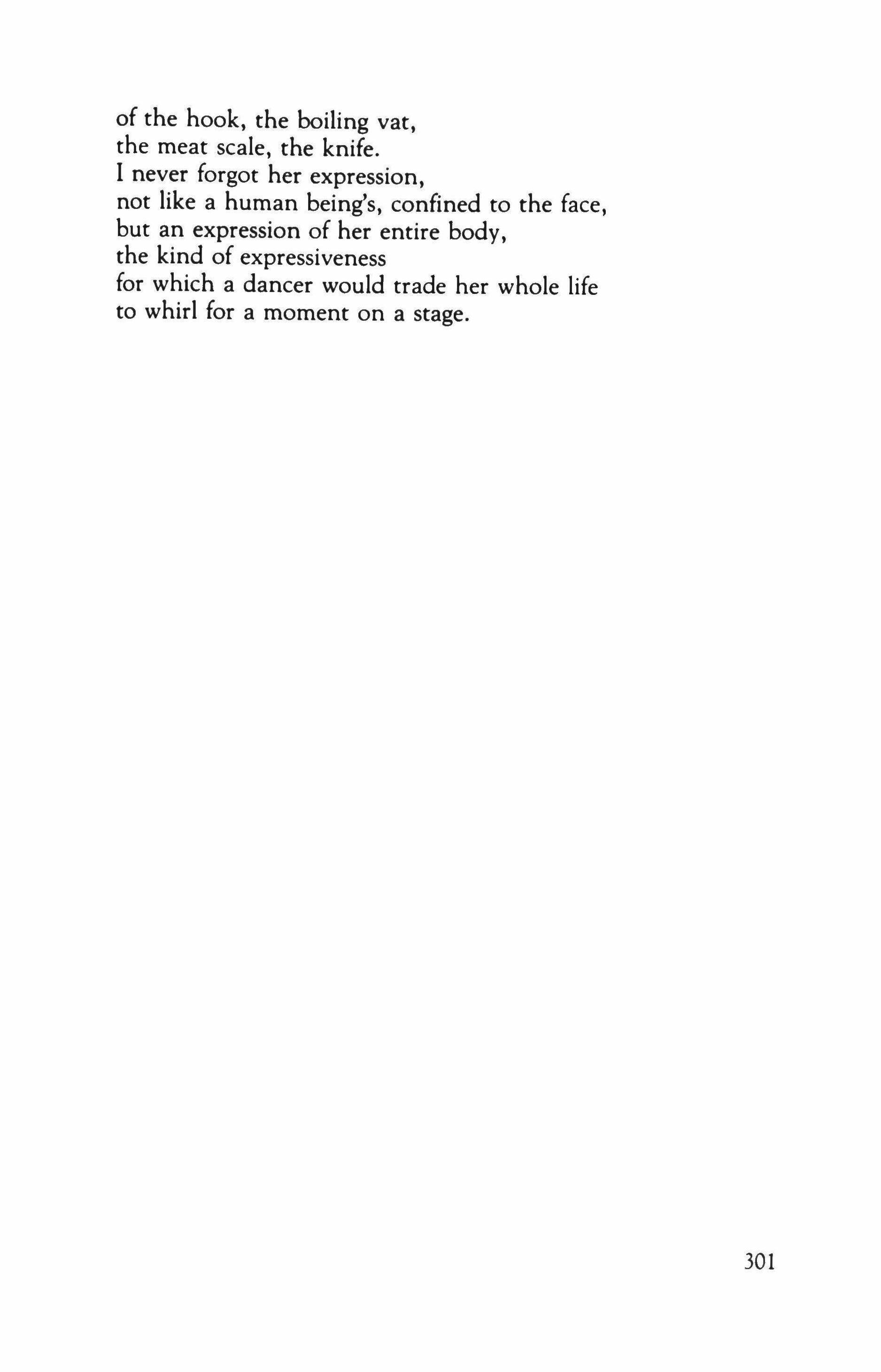
of the hook, the boiling vat, the meat scale, the knife. I never forgot her expression, not like a human being's, confined to the face, but an expression of her entire body, the kind of expressiveness for which a dancer would trade her whole life to whirl for a moment on a stage.
301
Hector Returns to Troy:
The Iliad, Book VI
Translated by Robert Fagles
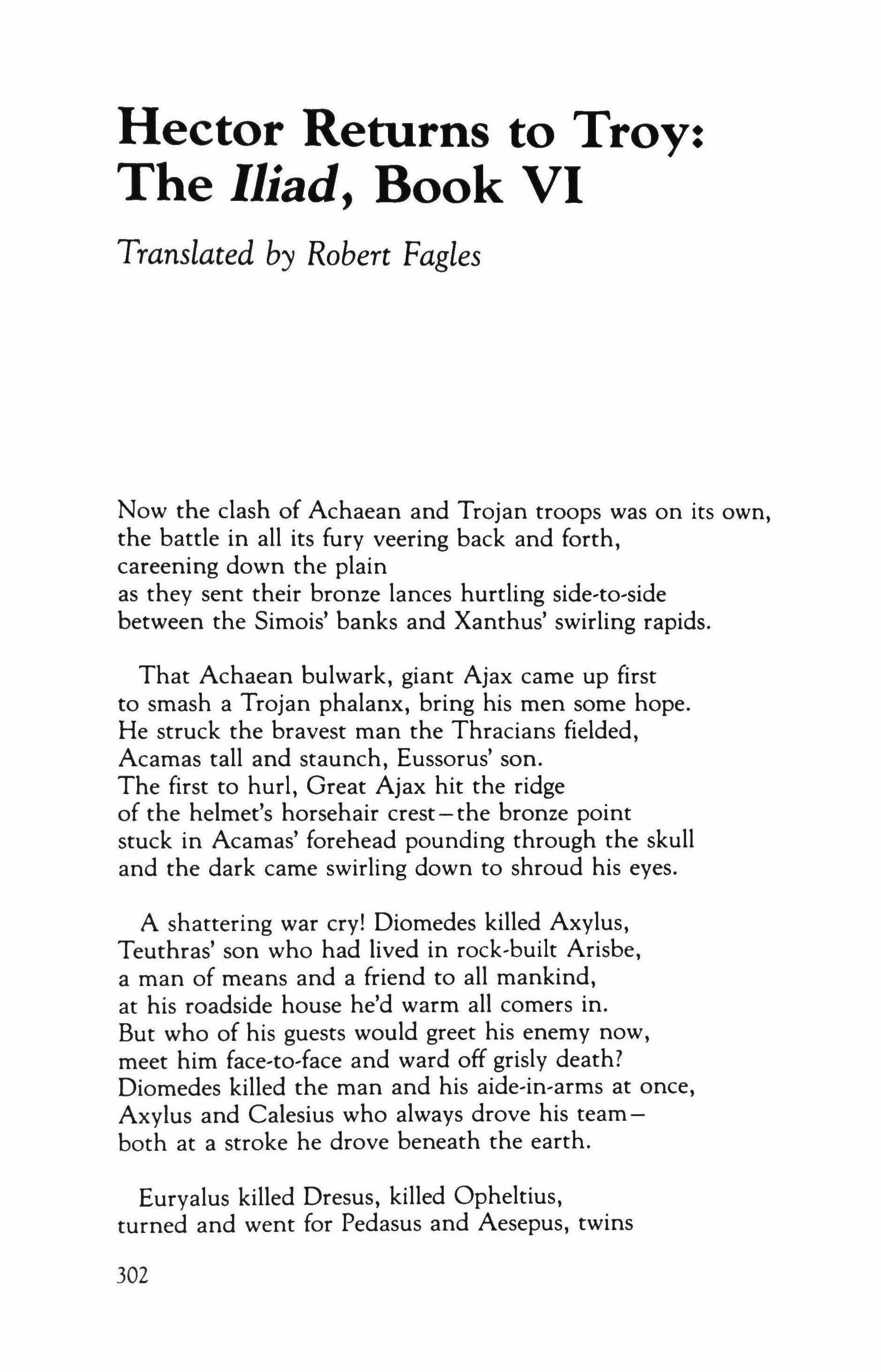
Now the clash of Achaean and Trojan troops was on its own, the battle in all its fury veering back and forth, careening down the plain as they sent their bronze lances hurtling side-to-side between the Simois' banks and Xanthus' swirling rapids.
That Achaean bulwark, giant Ajax came up first to smash a Trojan phalanx, bring his men some hope. He struck the bravest man the Thracians fielded, Acamas tall and staunch, Eussorus' son. The first to hurl, Great Ajax hit the ridge of the helmet's horsehair crest - the bronze point stuck in Acamas' forehead pounding through the skull and the dark came swirling down to shroud his eyes.
A shattering war cry! Diomedes killed Axylus, Teuthras' son who had lived in rock-built Arisbe, a man of means and a friend to all mankind, at his roadside house he'd warm all comers in. But who of his guests would greet his enemy now, meet him face-to-face and ward off grisly death? Diomedes killed the man and his aide-in-arms at once, Axylus and Calesius who always drove his teamboth at a stroke he drove beneath the earth.
Euryalus killed Dresus, killed Opheltius, turned and went for Pedasus and Aesepus, twins
302
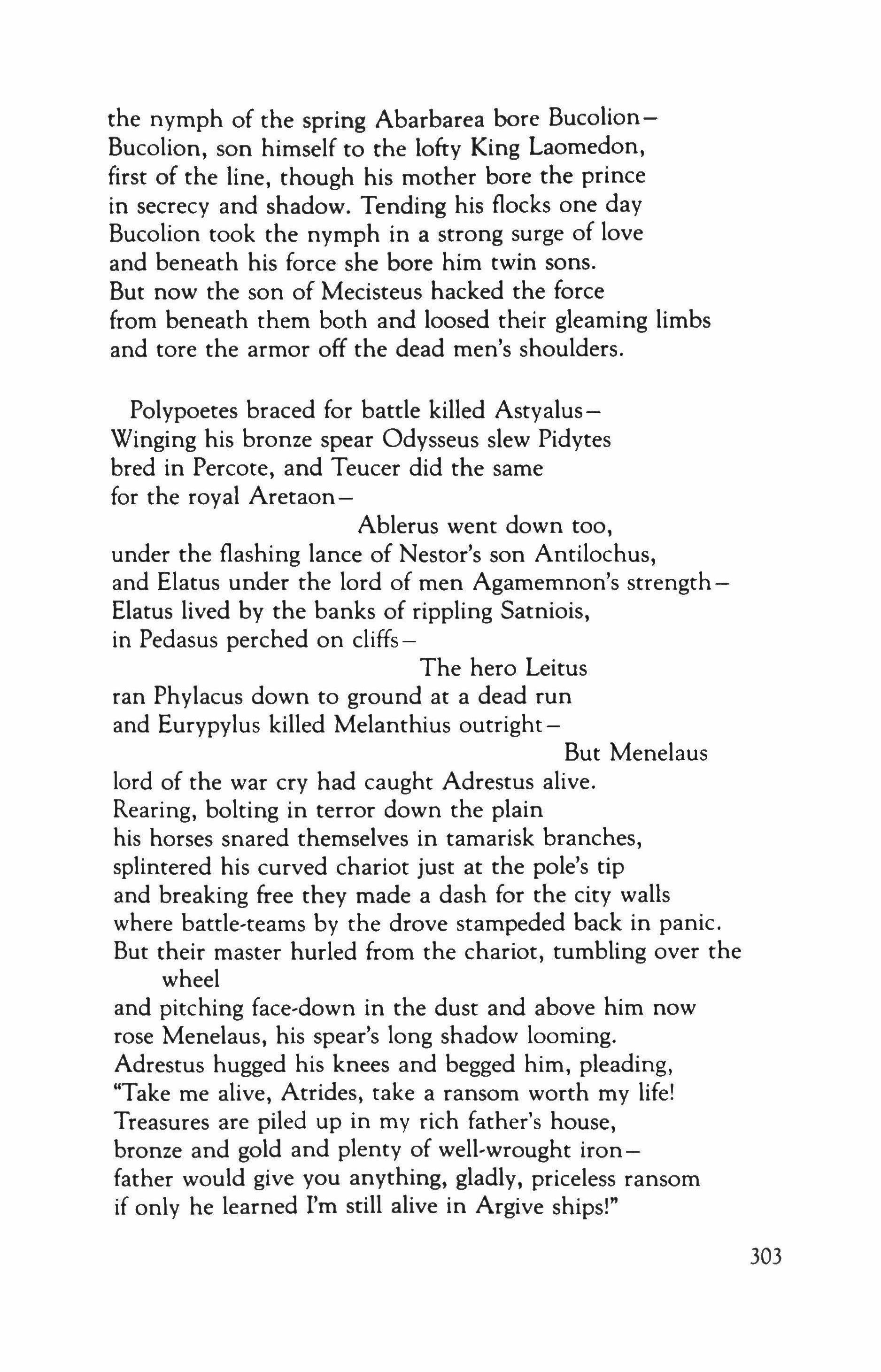
the nymph of the spring Abarbarea bore BucolionBucolion, son himself to the lofty King Laomedon, first of the line, though his mother bore the prince in secrecy and shadow. Tending his flocks one day Bucolion took the nymph in a strong surge of love and beneath his force she bore him twin sons. But now the son of Mecisteus hacked the force from beneath them both and loosed their gleaming limbs and tore the armor off the dead men's shoulders.
Polypoetes braced for battle killed AstyalusWinging his bronze spear Odysseus slew Pidvres bred in Percote, and Teucer did the same for the royal AretaonAblerus went down too, under the flashing lance of Nestor's son Antilochus, and Elatus under the lord of men Agamemnon's strengthElatus lived by the banks of rippling Satniois, in Pedasus perched on cliffs-
The hero Leitus ran Phylacus down to ground at a dead run and Eurypylus killed Melanthius outright-
But Menelaus lord of the war cry had caught Adrestus alive. Rearing, bolting in terror down the plain his horses snared themselves in tamarisk branches, splintered his curved chariot just at the pole's tip and breaking free they made a dash for the city walls where battle-teams by the drove stampeded back in panic. But their master hurled from the chariot, tumbling over the wheel and pitching face-down in the dust and above him now rose Menelaus, his spear's long shadow looming. Adrestus hugged his knees and begged him, pleading, "Take me alive, Atrides, take a ransom worth my life! Treasures are piled up in my rich father's house, bronze and gold and plenty of well-wrought ironfather would give you anything, gladly, priceless ransom if only he learned I'm still alive in Argive ships!"
303
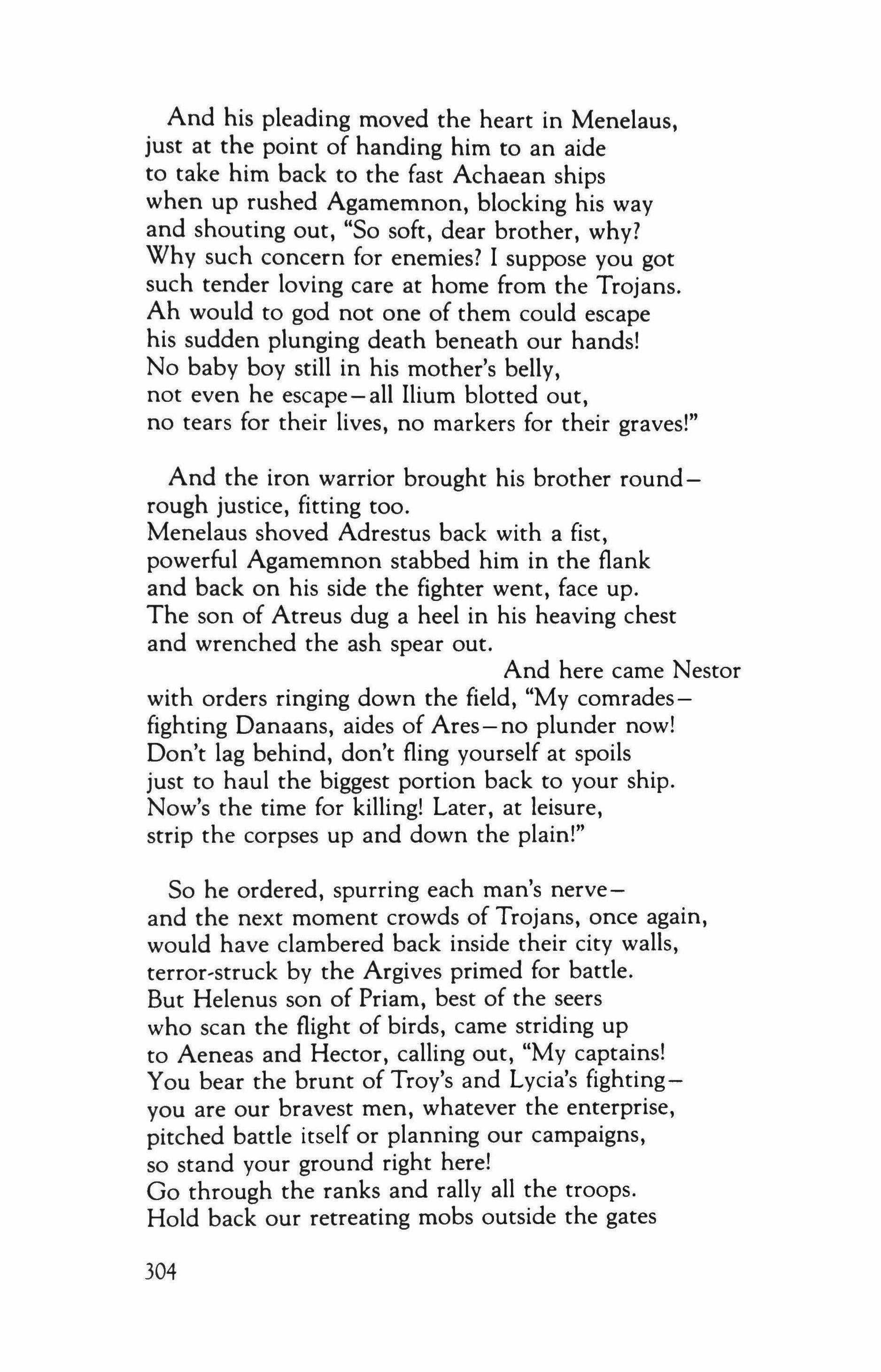
And his pleading moved the heart in Menelaus, just at the point of handing him to an aide to take him back to the fast Achaean ships when up rushed Agamemnon, blocking his way and shouting out, "So soft, dear brother, why? Why such concern for enemies? I suppose you got such tender loving care at home from the Trojans. Ah would to god not one of them could escape his sudden plunging death beneath our hands! No baby boy still in his mother's belly, not even he escape-all Ilium blotted out, no tears for their lives, no markers for their graves!"
And the iron warrior brought his brother roundrough justice, fitting too. Menelaus shoved Adrestus back with a fist, powerful Agamemnon stabbed him in the flank and back on his side the fighter went, face up. The son of Atreus dug a heel in his heaving chest and wrenched the ash spear out.
And here came Nestor with orders ringing down the field, "My comradesfighting Danaans, aides of Ares-no plunder now! Don't lag behind, don't fling yourself at spoils just to haul the biggest portion back to your ship. Now's the time for killing! Later, at leisure, strip the corpses up and down the plain!"
So he ordered, spurring each man's nerveand the next moment crowds of Trojans, once again, would have clambered back inside their city walls, terror-struck by the Argives primed for battle. But Helenus son of Priam, best of the seers who scan the flight of birds, came striding up to Aeneas and Hector, calling out, "My captains! You bear the brunt of Troy's and Lvcia's fightingyou are our bravest men, whatever the enterprise, pitched battle itself or planning our campaigns, so stand your ground right here! Go through the ranks and rally all the troops. Hold back our retreating mobs outside the gates
304
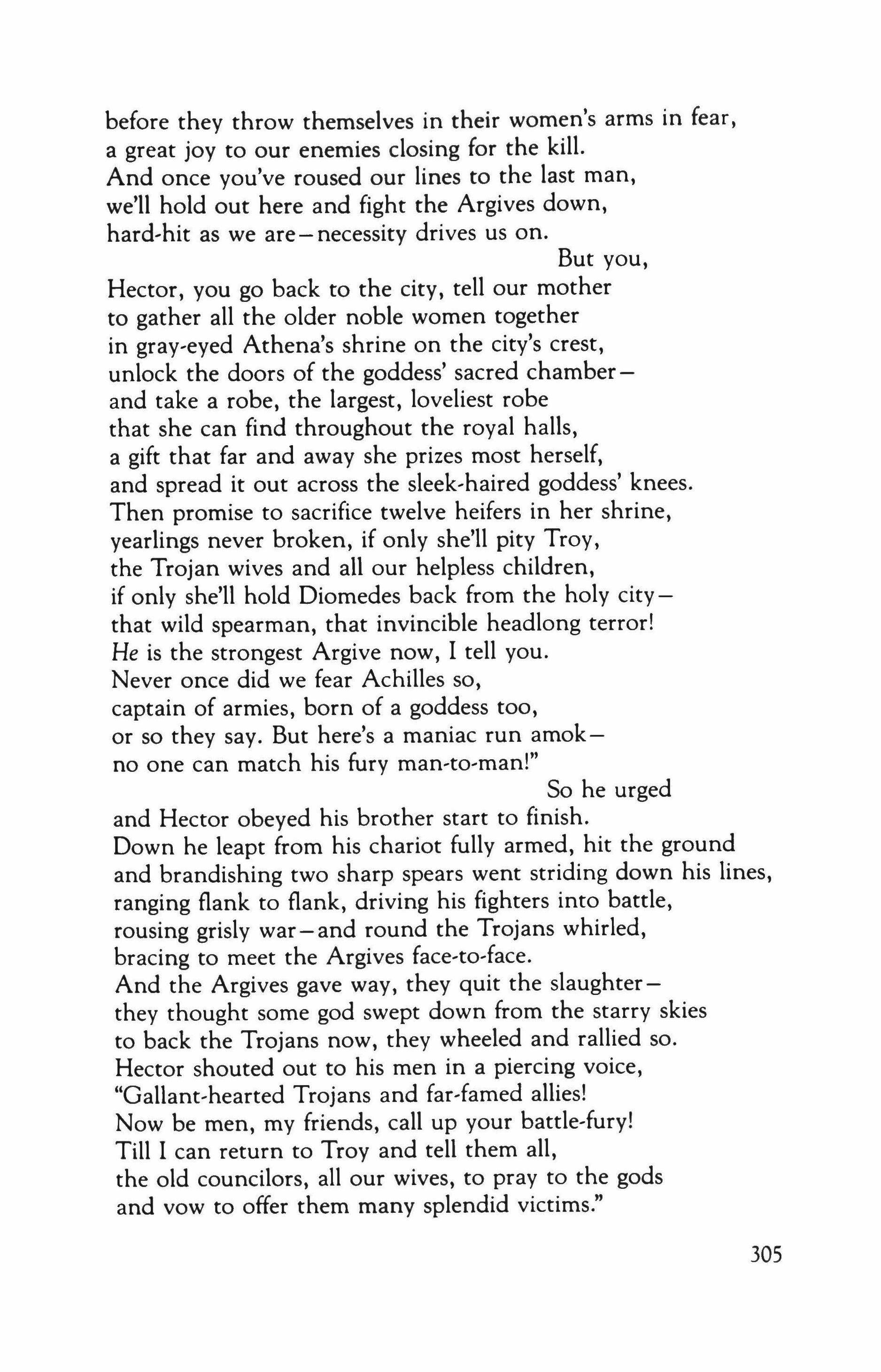
before they throw themselves in their women's arms in fear, a great joy to our enemies closing for the kill. And once you've roused our lines to the last man, we'll hold out here and fight the Argives down, hard-hit as we are-necessity drives us on.
But you,
Hector, you go back to the city, tell our mother to gather all the older noble women together in grav-eved Athena's shrine on the city's crest, unlock the doors of the goddess' sacred chamberand take a robe, the largest, loveliest robe that she can find throughout the royal halls, a gift that far and away she prizes most herself, and spread it out across the sleek,haired goddess' knees. Then promise to sacrifice twelve heifers in her shrine, yearlings never broken, if only she'll pity Troy, the Trojan wives and all our helpless children, if only she'll hold Diomedes back from the holy citythat wild spearman, that invincible headlong terror! He is the strongest Argive now, I tell you. Never once did we fear Achilles so, captain of armies, born of a goddess too, or so they say. But here's a maniac run amokno one can match his fury man-ro-man!"
So he urged and Hector obeyed his brother start to finish. Down he leapt from his chariot fully armed, hit the ground and brandishing two sharp spears went striding down his lines, ranging flank to flank, driving his fighters into battle, rousing grisly war-and round the Trojans whirled, bracing to meet the Argives face-to-face. And the Argives gave way, they quit the slaughterthey thought some god swept down from the starry skies to back the Trojans now, they wheeled and rallied so.
Hector shouted out to his men in a piercing voice, "Gallant-hearted Trojans and far-famed allies! Now be men, my friends, call up your battle-fury! Till I can return to Troy and tell them all, the old councilors, all our wives, to pray to the gods and vow to offer them many splendid victims."
305
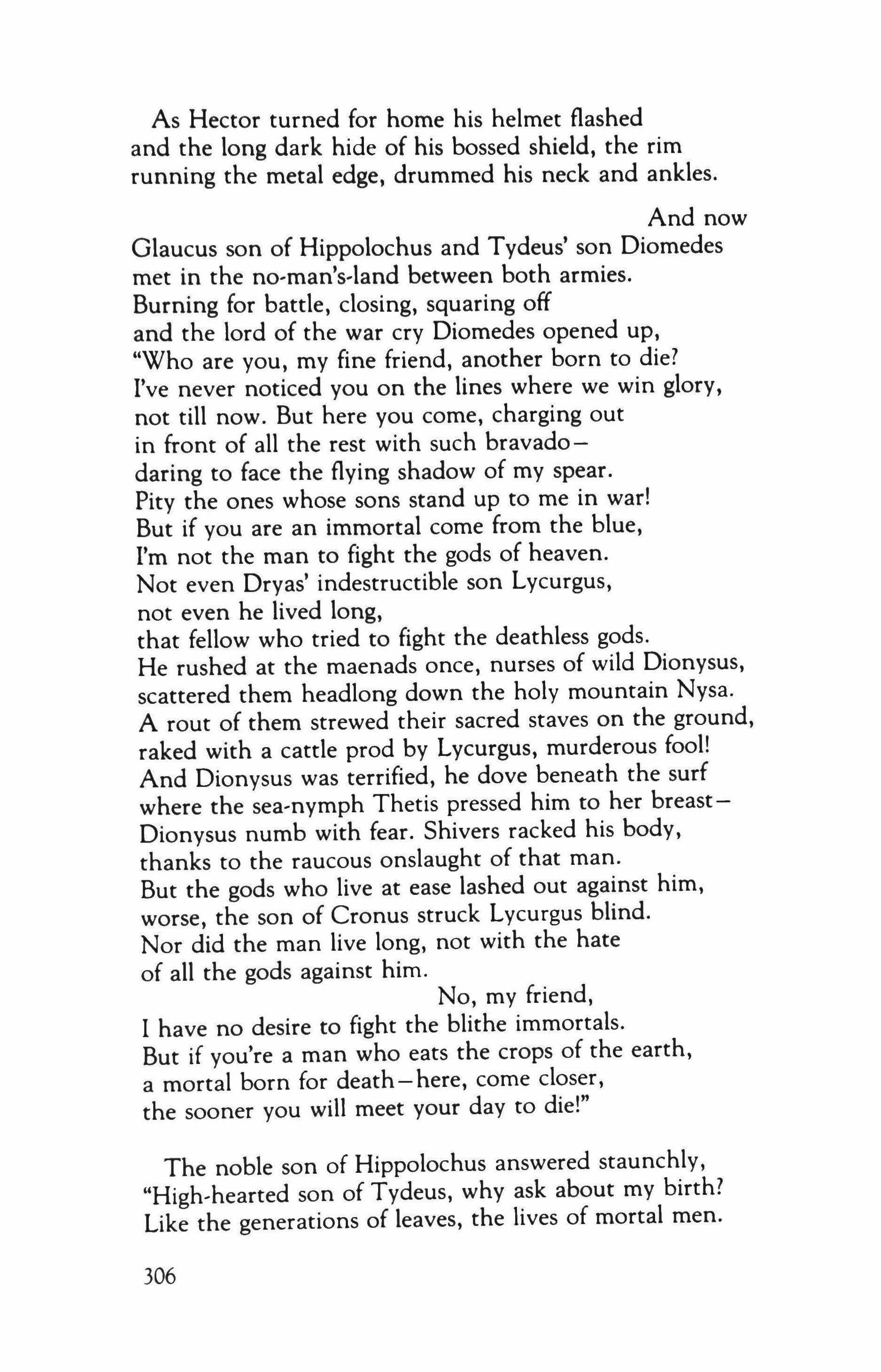
As Hector turned for home his helmet flashed and the long dark hide of his bossed shield, the rim running the metal edge, drummed his neck and ankles.
And now
Glaucus son of Hippolochus and Tvdeus' son Diomedes met in the no-man's-land between both armies. Burning for battle, closing, squaring off and the lord of the war cry Diomedes opened up, "Who are you, my fine friend, another born to die? I've never noticed you on the lines where we win glory, not till now. But here you come, charging out in front of all the rest with such bravadodaring to face the flying shadow of my spear.
Pity the ones whose sons stand up to me in war! But if you are an immortal come from the blue, I'm not the man to fight the gods of heaven. Not even Dryas' indestructible son Lycurgus, not even he lived long, that fellow who tried to fight the deathless gods. He rushed at the maenads once, nurses of wild Dionysus, scattered them headlong down the holy mountain Nvsa. A rout of them strewed their sacred staves on the ground, raked with a cattle prod by Lycurgus, murderous fool! And Dionysus was terrified, he dove beneath the surf where the sea-nymph Thetis pressed him to her breastDionysus numb with fear. Shivers racked his body, thanks to the raucous onslaught of that man. But the gods who live at ease lashed out against him, worse, the son of Cronus struck Lycurgus blind. Nor did the man live long, not with the hate of all the gods against him. No, my friend, I have no desire to fight the blithe immortals. But if you're a man who eats the crops of the earth, a mortal born for death - here, come closer, the sooner you will meet your day to die!"
The noble son of Hippolochus answered staunchly, "High-hearted son of Tvdeus, why ask about my birth? Like the generations of leaves, the lives of mortal men.
306
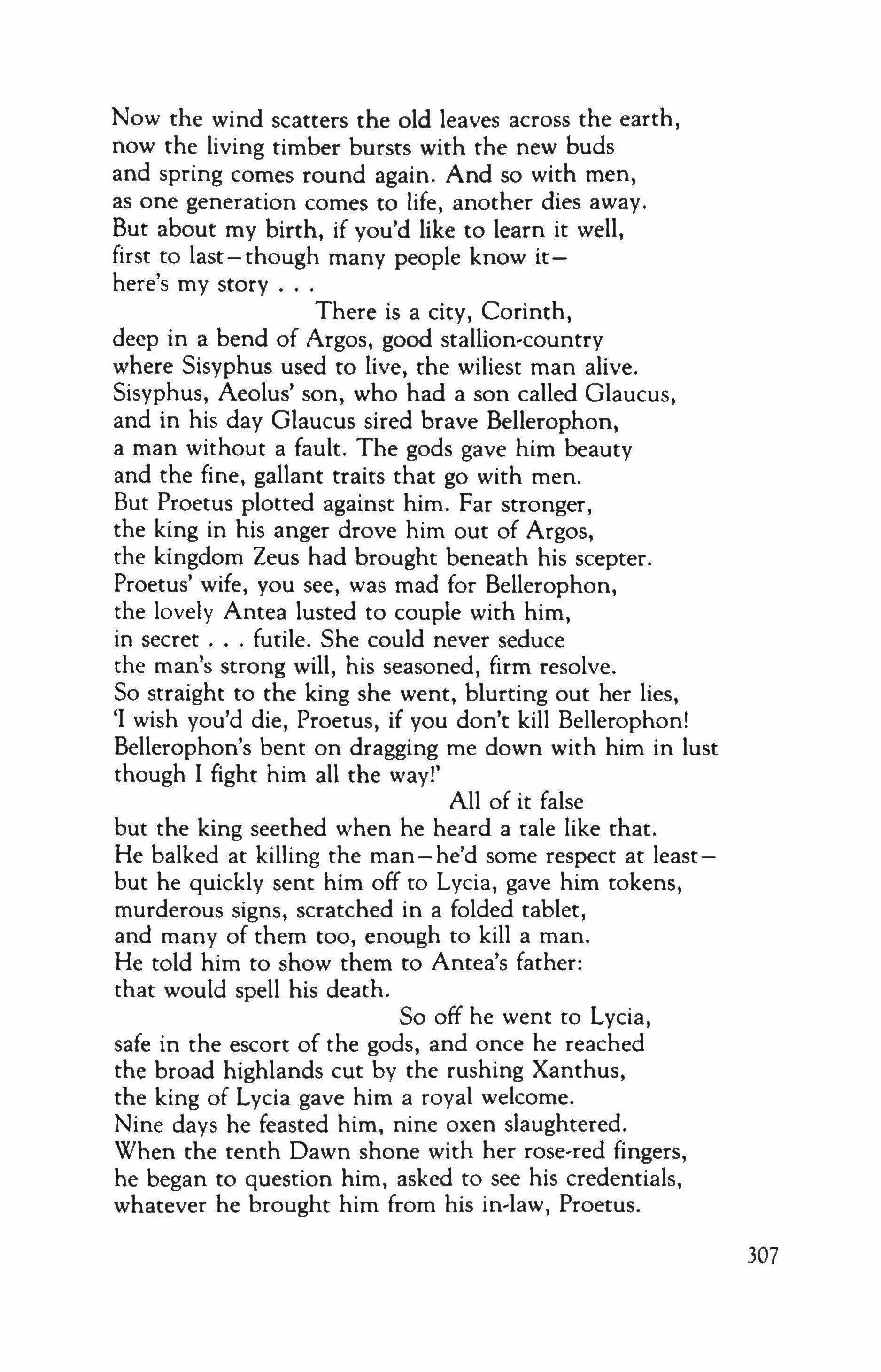
Now the wind scatters the old leaves across the earth, now the living timber bursts with the new buds and spring comes round again. And so with men, as one generation comes to life, another dies away. But about my birth, if you'd like to learn it well, first to last-though many people know ithere's my story
There is a city, Corinth, deep in a bend of Argos, good stallion-countrv where Sisyphus used to live, the wiliest man alive. Sisyphus, Aeolus' son, who had a son called Glaucus, and in his day Glaucus sired brave Bellerophon, a man without a fault. The gods gave him beauty and the fine, gallant traits that go with men. But Proetus plotted against him. Far stronger, the king in his anger drove him out of Argos, the kingdom Zeus had brought beneath his scepter. Proetus' wife, you see, was mad for Bellerophon, the lovely Antea lusted to couple with him, in secret futile. She could never seduce the man's strong will, his seasoned, firm resolve. So straight to the king she went, blurting out her lies, 'I wish you'd die, Proetus, if you don't kill Bellerophon! Bellerophon's bent on dragging me down with him in lust though I fight him all the way!'
All of it false but the king seethed when he heard a tale like that. He balked at killing the man-he'd some respect at leastbut he quickly sent him off to Lycia, gave him tokens, murderous signs, scratched in a folded tablet, and many of them too, enough to kill a man. He told him to show them to Antea's father: that would spell his death.
So off he went to Lycia, safe in the escort of the gods, and once he reached the broad highlands cut by the rushing Xanthus, the king of Lvcia gave him a royal welcome. Nine days he feasted him, nine oxen slaughtered. When the tenth Dawn shone with her rose'red fingers, he began to question him, asked to see his credentials, whatever he brought him from his in-law, Proetus.
307

But then, once he received that fatal message sent from his own daughter's husband, first he ordered Bellerophon to kill the Chimaeragrim monster sprung of the gods, nothing human, all lion in front, all snake behind, all goat between, terrible, blasting lethal fire at every breath! But he laid her low, obeying signs from the gods. Next he fought the Solvrni, tribesmen bent on glory, roughest battle of men he ever entered, so he claimed. Then for a third test he brought the Amazons down, a match for men in war. But as he turned back, his host spun out the tightest trap of all: picking the best men from Lvcia far and wide he set an ambush-that never came home again! Fearless Bellerophon killed them all.
Then, yes, when the king could see the man's power at last, a true son of the gods, he pressed him hard to stay, he offered his own daughter's hand in marriage, he gave him half his royal honors as the king. And the Lycians carved him out a grand estate, the choicest land in the realm, rich in vineyards and good tilled fields for him to lord it over.
And his wife bore good Bellerophon three children: Isander, Hippolochus and Laodamia. Laodamia lay in the arms of Zeus who rules the world and she bore the god a son, our great commander, Sarpedon helmed in bronze.
But the day soon came when even Bellerophon was hated by all the gods. Across the Alean plain he wandered, all alone, eating his heart out, a fugitive on the run from the beaten tracks of men. His son Isander? Killed by the War�god, never sated - a boy fighting the Solvmi always out for glory. Laodamia? Artemis, flashing her golden reins, cut her down in anger. But Hippolochus fathered me, I'm proud to say. He sent me off to Troy and I hear his urgings ringing in my ears, 'Always be the best, my boy, the bravest, and hold your head up high above the others. 308
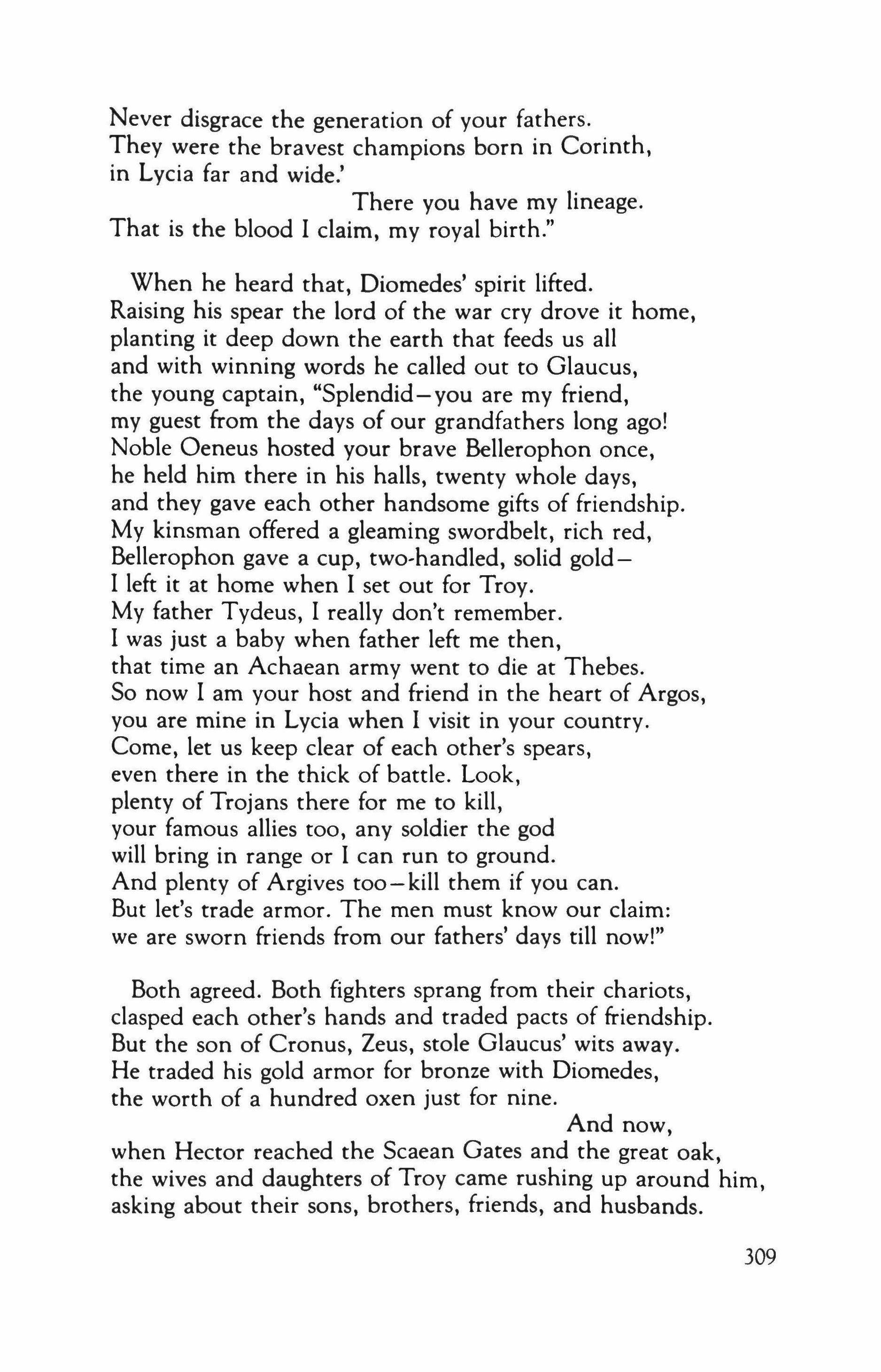
Never disgrace the generation of your fathers. They were the bravest champions born in Corinth, in Lycia far and wide: There you have my lineage. That is the blood I claim, my royal birth."
When he heard that, Diornedes' spirit lifted. Raising his spear the lord of the war cry drove it home, planting it deep down the earth that feeds us all and with winning words he called out to Glaucus, the young captain, "Splendid-you are my friend, my guest from the days of our grandfathers long ago! Noble Oeneus hosted your brave Bellerophon once, he held him there in his halls, twenty whole days, and they gave each other handsome gifts of friendship. My kinsman offered a gleaming swordbelt, rich red, Bellerophon gave a cup, two-handled, solid goldI left it at home when I set out for Troy. My father Tvdeus, I really don't remember. I was just a baby when father left me then, that time an Achaean army went to die at Thebes. So now I am your host and friend in the heart of Argos, you are mine in Lycia when I visit in your country. Come, let us keep clear of each other's spears, even there in the thick of battle. Look, plenty of Trojans there for me to kill, your famous allies too, any soldier the god will bring in range or I can run to ground. And plenty of Argives too-kill them if you can. But let's trade armor. The men must know our claim: we are sworn friends from our fathers' days till now!"
Both agreed. Both fighters sprang from their chariots, clasped each other's hands and traded pacts of friendship. But the son of Cronus, Zeus, stole Glaucus' wits away. He traded his gold armor for bronze with Diomedes, the worth of a hundred oxen just for nine. And now, when Hector reached the Scaean Gates and the great oak, the wives and daughters of Troy came rushing up around him, asking about their sons, brothers, friends, and husbands.
309
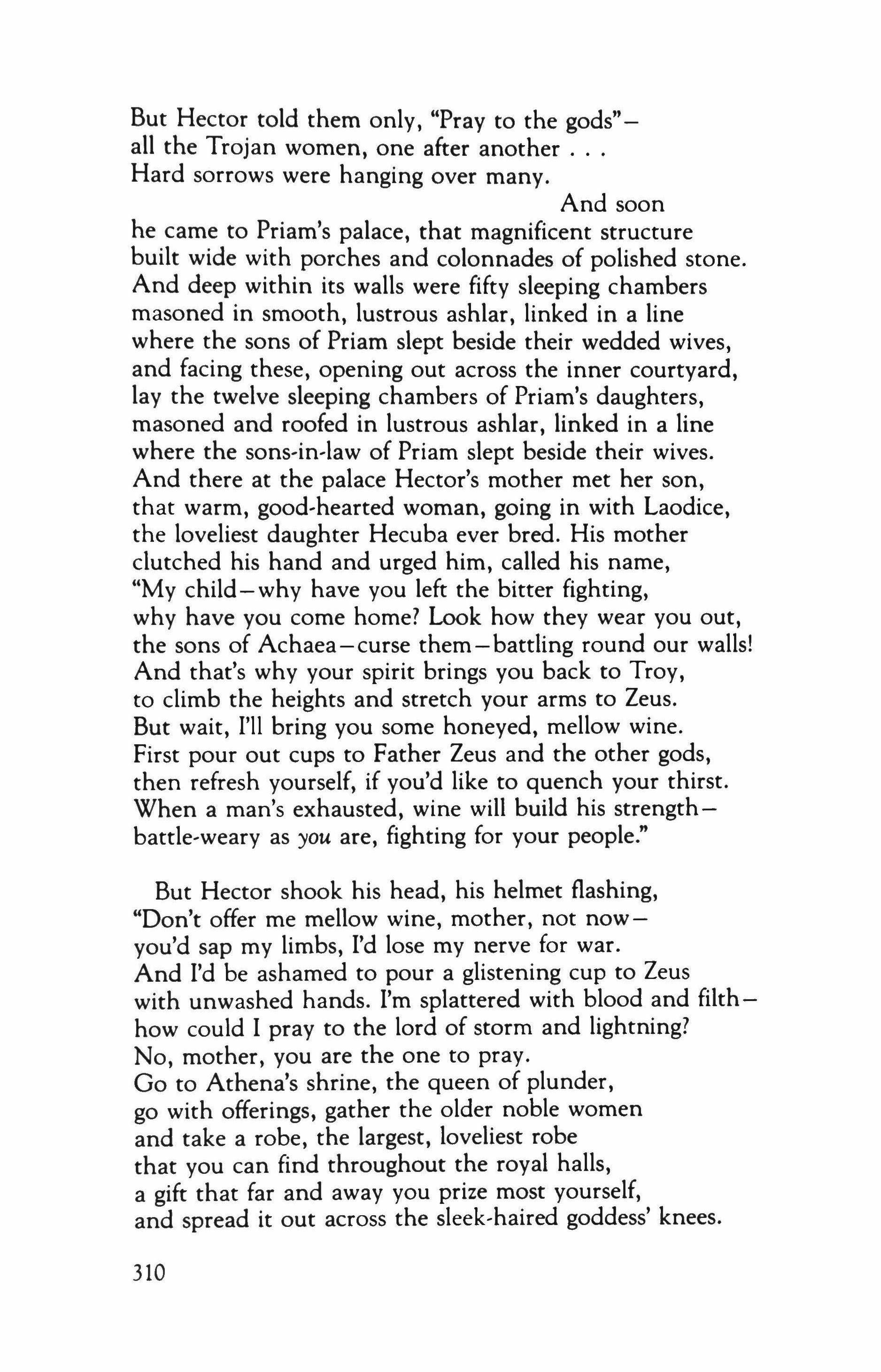
But Hector told them only, "Pray to the gods"all the Trojan women, one after another Hard sorrows were hanging over many. And soon he came to Priam's palace, that magnificent structure built wide with porches and colonnades of polished stone. And deep within its walls were fifty sleeping chambers masoned in smooth, lustrous ashlar, linked in a line where the sons of Priam slept beside their wedded wives, and facing these, opening out across the inner courtyard, lay the twelve sleeping chambers of Priam's daughters, masoned and roofed in lustrous ashlar, linked in a line where the sons-in-law of Priam slept beside their wives. And there at the palace Hector's mother met her son, that warm, good,hearted woman, going in with Laodice, the loveliest daughter Hecuba ever bred. His mother clutched his hand and urged him, called his name, "My child-why have you left the bitter fighting, why have you come home? Look how they wear you out, the sons of Achaea-curse them-battling round our walls! And that's why your spirit brings you back to Troy, to climb the heights and stretch your arms to Zeus. But wait, I'll bring you some honeyed, mellow wine. First pour out cups to Father Zeus and the other gods, then refresh yourself, if you'd like to quench your thirst. When a man's exhausted, wine will build his strengthbattle-weary as you are, fighting for your people."
But Hector shook his head, his helmet flashing, "Don't offer me mellow wine, mother, not nowyou'd sap my limbs, I'd lose my nerve for war. And I'd be ashamed to pour a glistening cup to Zeus with unwashed hands. I'm splattered with blood and filthhow could I pray to the lord of storm and lightning? No, mother, you are the one to pray. Go to Athena's shrine, the queen of plunder, go with offerings, gather the older noble women and take a robe, the largest, loveliest robe that you can find throughout the royal halls, a gift that far and away you prize most yourself, and spread it out across the sleek-haired goddess' knees.
310

Then promise to sacrifice twelve heifers in her shrine, yearlings never broken, if only she'll pity Troy, the Trojan wives and all our helpless children, if only she'll hold Diomedes back from the holy citythat wild spearman, that invincible headlong terror! Now, mother, go to the queen of plunder's shrine and I'll go hunt for Paris, summon him to fight if the man will hear what I have to say Let the earth gape and swallow him on the spot! A great curse Olympian Zeus let live and grow in him, for Troy and high-hearted Priam and all his sons. That man - if I could see him bound for the House of Death, I could say my heart had forgot its wrenching grief!"
But his mother simply turned away to the palace. She gave her servants orders and out they strode to gather the older noble women through the city. And she went down to a storeroom filled with scent and there they were, brocaded, beautiful robes, the work of Sidonian women. Magnificent Paris brought those women back himself from Sidon, sailing the open seas on the same long voyage he swept Helen off, her famous Father's child. Lifting one from the lot, Hecuba brought it out for great Athena's gift, the largest, loveliest, richly worked, and like a star it glistened, deep beneath the others. Then she made her way with a file of noble women rushing in her train.
Once they reached Athena's shrine on the city crest the beauty Theano opened the doors to let them in, Cisseus' daughter, the horseman Anrenor's wife and Athena's priestess chosen by the Trojans. Thenwith a shrill wail they all stretched their arms to Athena as Theano, her face radiant, lifting the robe on high, spread it out across the sleek-haired goddess' knees and prayed to the daughter of mighty Father Zeus, "Queen Athena - shield of our city - glory of goddesses! Now shatter the spear of Diomedes! That wild manhurl him headlong down before the Scaean Gates! At once we'll sacrifice twelve heifers in your shrine,
311
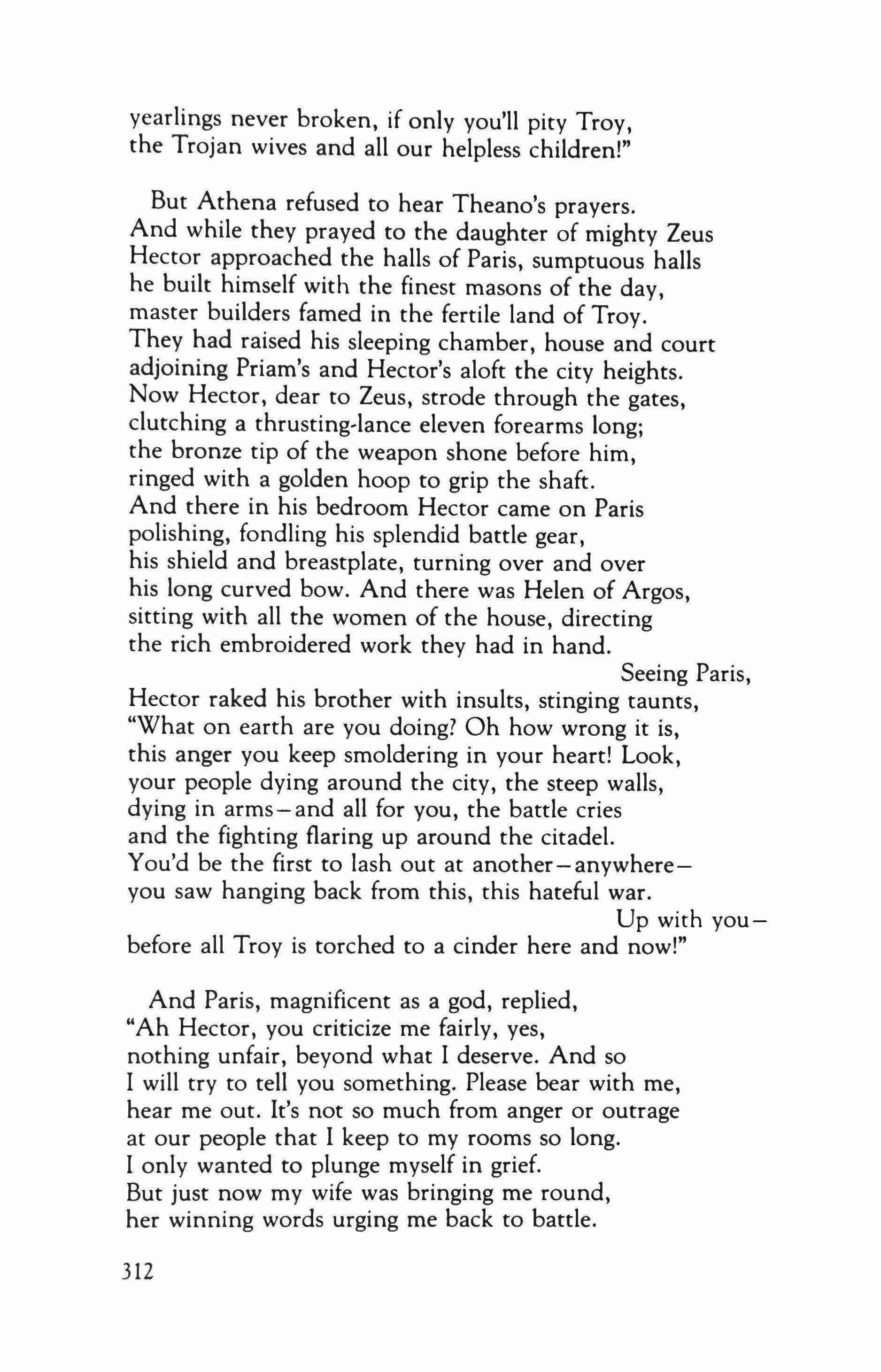
yearlings never broken. if only you'll pity Troy. the Trojan wives and all our helpless children!"
But Athena refused to hear Theano's prayers. And while they prayed to the daughter of mighty Zeus Hector approached the halls of Paris, sumptuous halls he built himself with the finest masons of the day, master builders famed in the fertile land of Troy. They had raised his sleeping chamber, house and court adjoining Priam's and Hector's aloft the city heights. Now Hector, dear to Zeus, strode through the gates, clutching a thrusting-lance eleven forearms long; the bronze tip of the weapon shone before him, ringed with a golden hoop to grip the shaft. And there in his bedroom Hector came on Paris polishing, fondling his splendid battle gear, his shield and breastplate, turning over and over his long curved bow. And there was Helen of Argos, sitting with all the women of the house, directing the rich embroidered work they had in hand.
Seeing Paris, Hector raked his brother with insults, stinging taunts, "What on earth are you doing? Oh how wrong it is, this anger you keep smoldering in your heart! Look, your people dying around the city, the steep walls, dying in arms - and all for you, the battle cries and the fighting flaring up around the citadel. You'd be the first to lash out at another-anywhereyou saw hanging back from this, this hateful war.
Up with youbefore all Troy is torched to a cinder here and now!"
And Paris, magnificent as a god, replied, "Ah Hector, you criticize me fairly, yes, nothing unfair, beyond what I deserve. And so I will try to tell you something. Please bear with me, hear me out. It's not so much from anger or outrage at our people that I keep to my rooms so long. I only wanted to plunge myself in grief. But just now my wife was bringing me round, her winning words urging me back to battle.
312
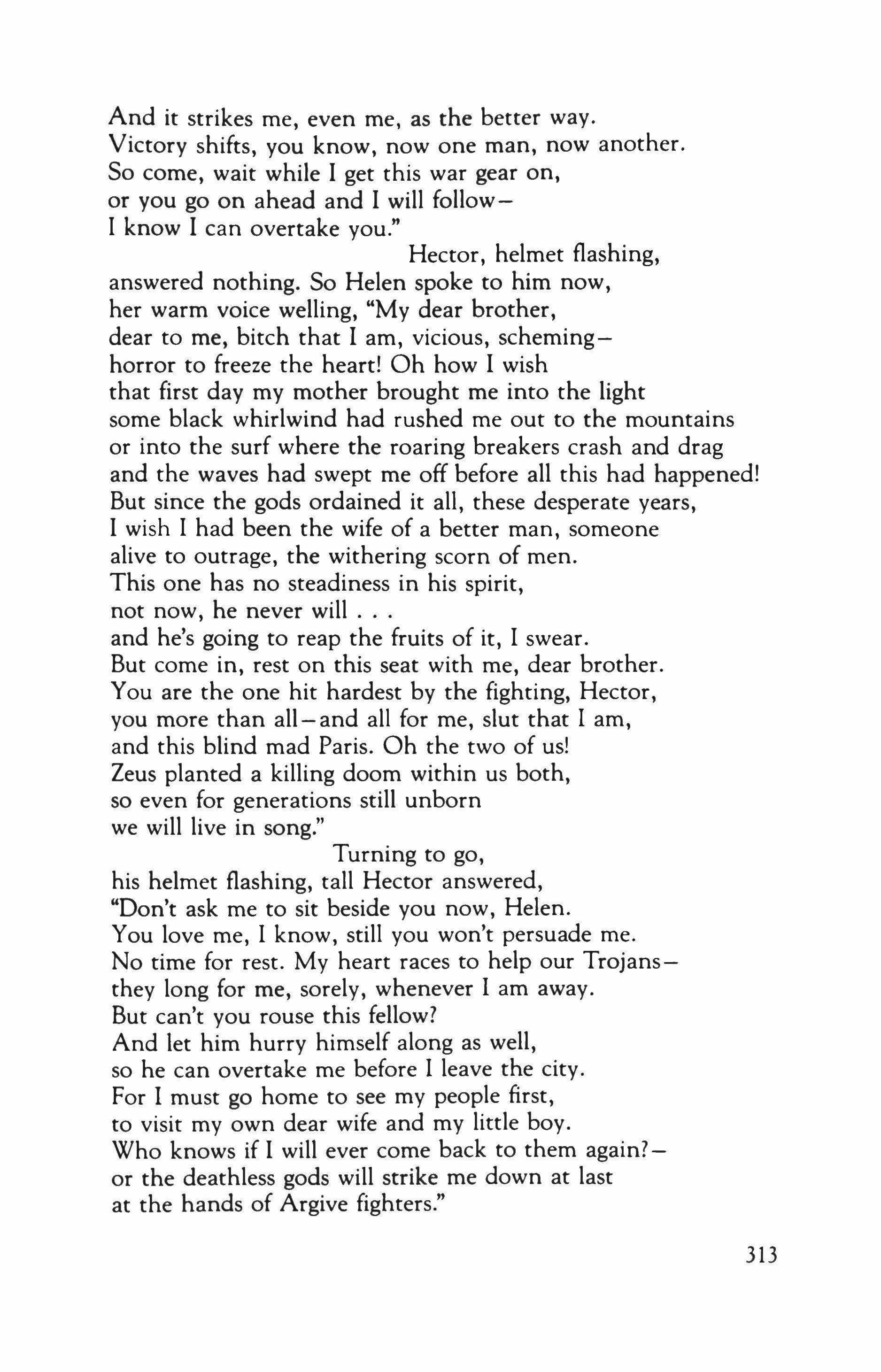
And it strikes me, even me, as the better way. Victory shifts, you know, now one man, now another. So come, wait while I get this war gear on, or you go on ahead and I will followI know I can overtake you."
Hector, helmet flashing, answered nothing. So Helen spoke to him now, her warm voice welling, "My dear brother, dear to me, bitch that I am, vicious, scheminghorror to freeze the heart! Oh how I wish that first day my mother brought me into the light some black whirlwind had rushed me out to the mountains or into the surf where the roaring breakers crash and drag and the waves had swept me off before all this had happened! But since the gods ordained it all, these desperate years, I wish I had been the wife of a better man, someone alive to outrage, the withering scorn of men. This one has no steadiness in his spirit, not now, he never will and he's going to reap the fruits of it, I swear. But come in, rest on this seat with me, dear brother. You are the one hit hardest by the fighting, Hector, you more than all- and all for me, slut that I am, and this blind mad Paris. Oh the two of us! Zeus planted a killing doom within us both, so even for generations still unborn we will live in song."
Turning to go, his helmet flashing, tall Hector answered, "Don't ask me to sit beside you now, Helen. You love me, I know, still you won't persuade me. No time for rest. My heart races to help our Trojansthey long for me, sorely, whenever I am away. But can't you rouse this fellow? And let him hurry himself along as well, so he can overtake me before I leave the city. For I must go home to see my people first, to visit my own dear wife and my little boy. Who knows if I will ever come back to them again?or the deathless gods will strike me down at last at the hands of Argive fighters."
313
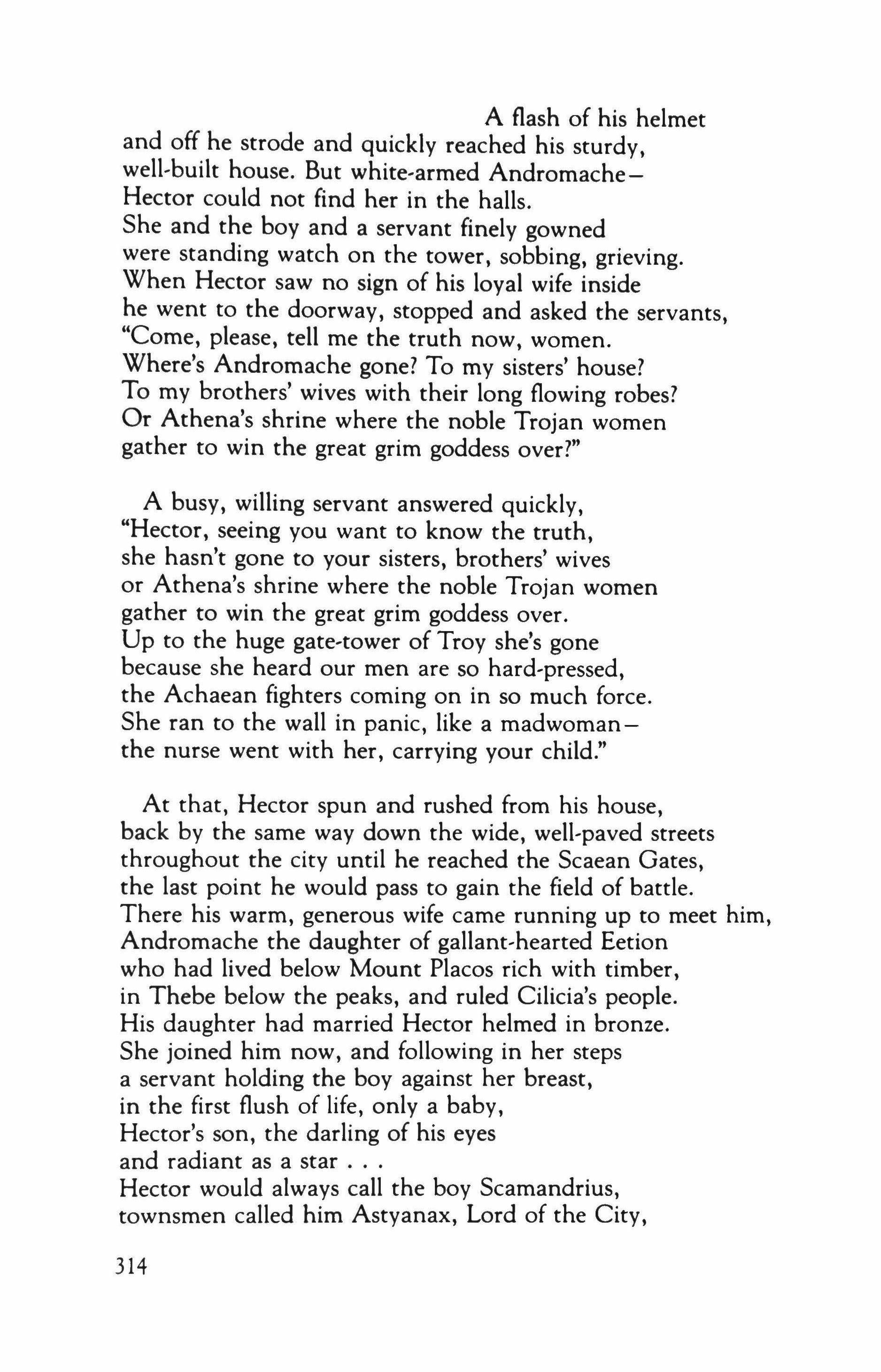
A flash of his helmet and off he strode and quickly reached his sturdy, well-built house. But white-armed AndromacheHector could not find her in the halls. She and the boy and a servant finely gowned were standing watch on the tower, sobbing, grieving. When Hector saw no sign of his loyal wife inside he went to the doorway, stopped and asked the servants, "Come, please, tell me the truth now, women. Where's Andromache gone? To my sisters' house? To my brothers' wives with their long flowing robes? Or Athena's shrine where the noble Trojan women gather to win the great grim goddess over?"
A busy, willing servant answered quickly, "Hector, seeing you want to know the truth, she hasn't gone to your sisters, brothers' wives or Athena's shrine where the noble Trojan women gather to win the great grim goddess over. Up to the huge gate-tower of Troy she's gone because she heard our men are so hard-pressed, the Achaean fighters coming on in so much force. She ran to the wall in panic, like a madwomanthe nurse went with her, carrying your child."
At that, Hector spun and rushed from his house, back by the same way down the wide, well-paved streets throughout the city until he reached the Scaean Gates, the last point he would pass to gain the field of battle. There his warm, generous wife came running up to meet him, Andromache the daughter of gallant,hearted Eerion who had lived below Mount Placos rich with timber, in Thebe below the peaks, and ruled Cilicia's people. His daughter had married Hector helmed in bronze. She joined him now, and following in her steps a servant holding the boy against her breast, in the first flush of life, only a baby, Hector's son, the darling of his eyes and radiant as a star
Hector would always call the boy Scamandrius, townsmen called him Asrvanax, Lord of the City, 314
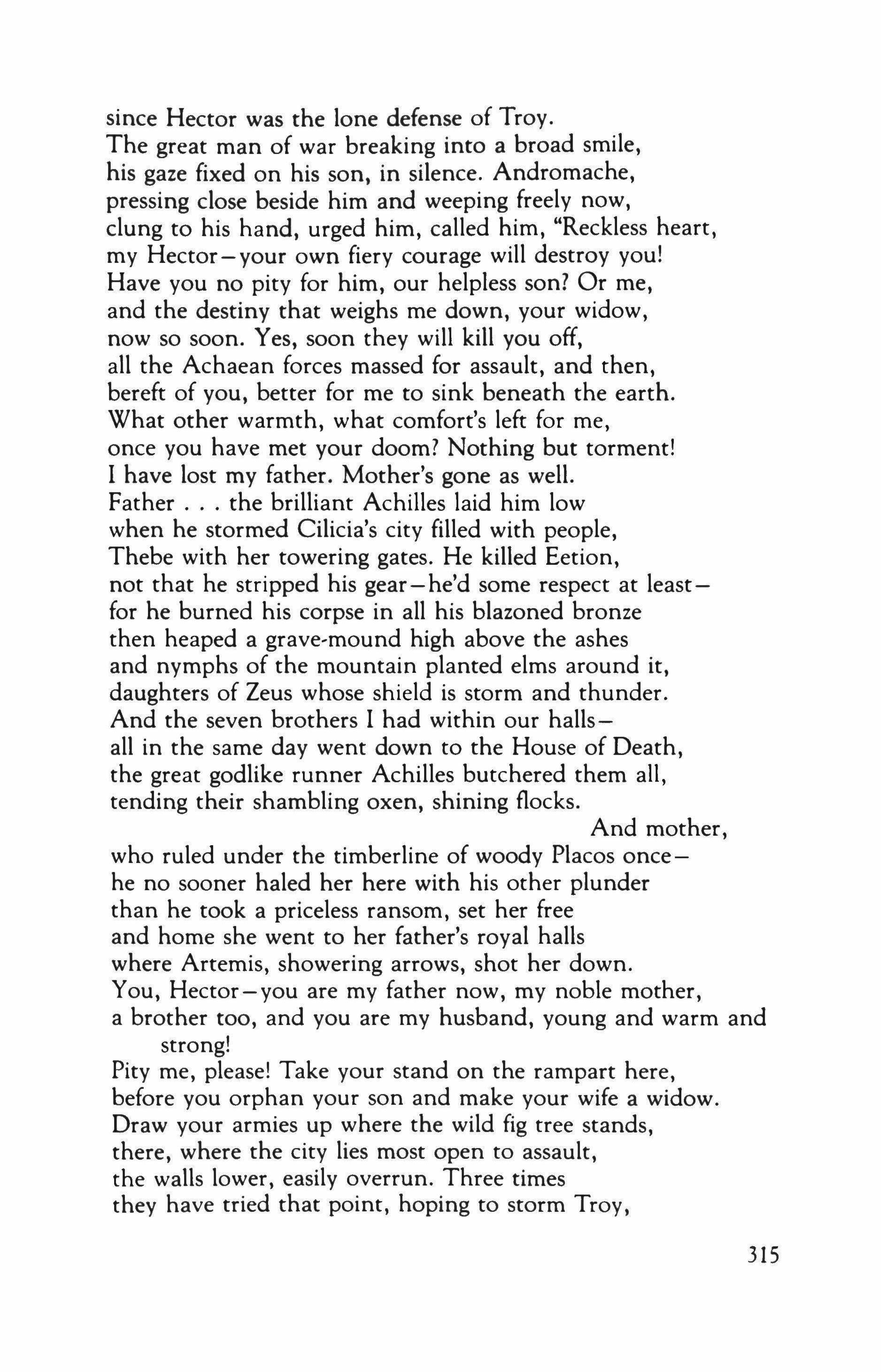
since Hector was the lone defense of Troy. The great man of war breaking into a broad smile, his gaze fixed on his son, in silence. Andromache, pressing close beside him and weeping freely now, clung to his hand, urged him, called him, "Reckless heart, my Hector-your own fiery courage will destroy you! Have you no pity for him, our helpless son? Or me, and the destiny that weighs me down, your widow, now so soon. Yes, soon they will kill you off, all the Achaean forces massed for assault, and then, bereft of you, better for me to sink beneath the earth. What other warmth, what comfort's left for me, once you have met your doom? Nothing but torment! I have lost my father. Mother's gone as well. Father the brilliant Achilles laid him low when he stormed Cilicia's city filled with people, Thebe with her towering gates. He killed Eetion, not that he stripped his gear-he'd some respect at leastfor he burned his corpse in all his blazoned bronze then heaped a grave-mound high above the ashes and nymphs of the mountain planted elms around it, daughters of Zeus whose shield is storm and thunder. And the seven brothers I had within our hallsall in the same day went down to the House of Death, the great godlike runner Achilles butchered them all, tending their shambling oxen, shining flocks.
And mother, who ruled under the timberline of woody Placos oncehe no sooner haled her here with his other plunder than he took a priceless ransom, set her free and home she went to her father's royal halls where Artemis, showering arrows, shot her down. You, Hectoryou are my father now, my noble mother, a brother too, and you are my husband, young and warm and strong!
Pity me, please! Take your stand on the rampart here, before you orphan your son and make your wife a widow. Draw your armies up where the wild fig tree stands, there, where the city lies most open to assault, the walls lower, easily overrun. Three times they have tried that point, hoping to storm Troy,
315
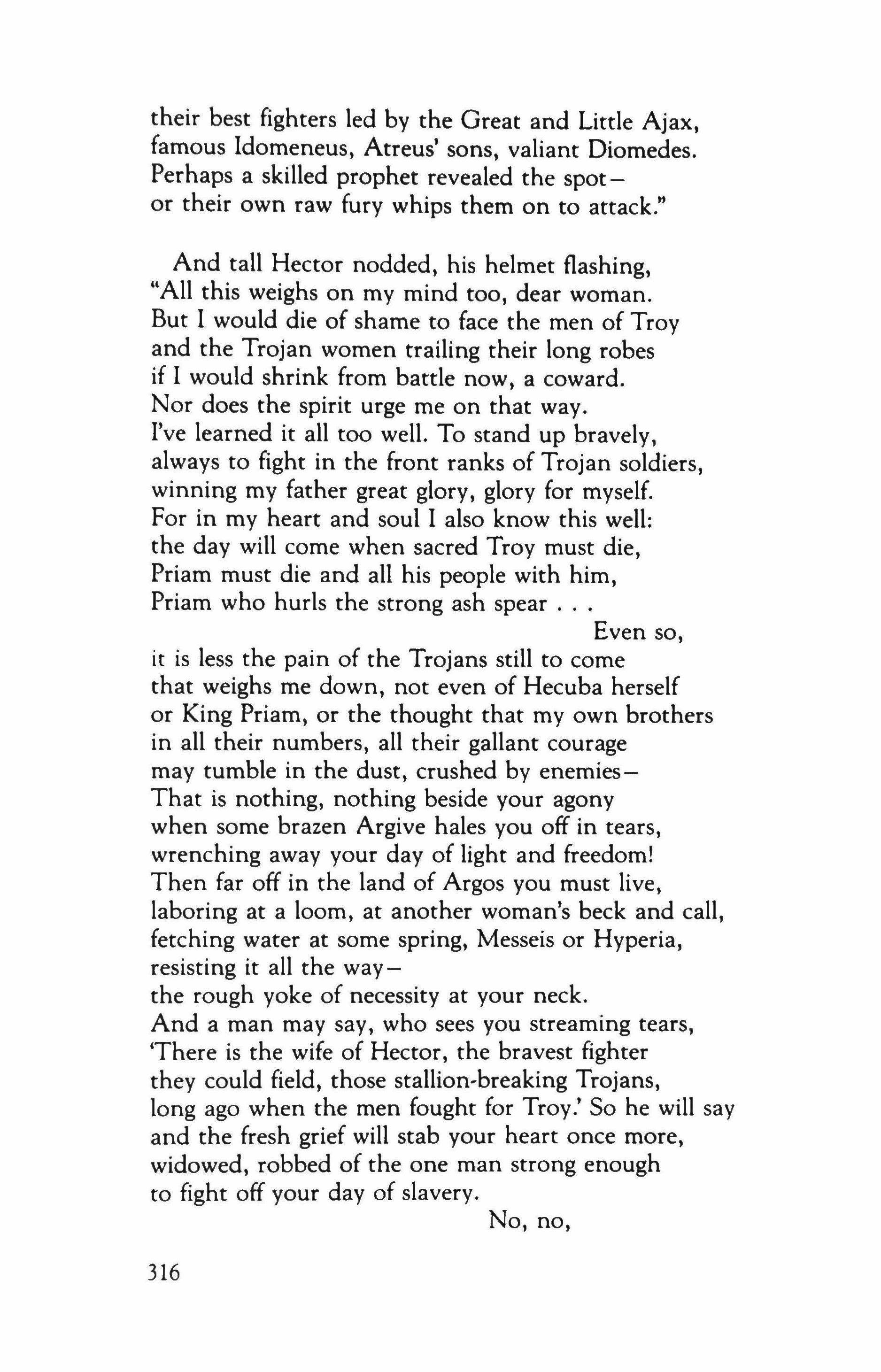
their best fighters led by the Great and Little Ajax, famous ldomeneus, Atreus' sons, valiant Diomedes. Perhaps a skilled prophet revealed the spotor their own raw fury whips them on to attack."
And tall Hector nodded, his helmet flashing, "All this weighs on my mind too, dear woman. But I would die of shame to face the men of Troy and the Trojan women trailing their long robes if I would shrink from battle now, a coward. Nor does the spirit urge me on that way. I've learned it all too well. To stand up bravely, always to fight in the front ranks of Trojan soldiers, winning my father great glory, glory for myself. For in my heart and soul I also know this well: the day will corne when sacred Troy must die, Priam must die and all his people with him, Priam who hurls the strong ash spear
Even so, it is less the pain of the Trojans still to corne that weighs me down, not even of Hecuba herself or King Priam, or the thought that my own brothers in all their numbers, all their gallant courage may tumble in the dust, crushed by enemiesThat is nothing, nothing beside your agony when some brazen Argive hales you off in tears, wrenching away your day of light and freedom! Then far off in the land of Argos you must live, laboring at a loom, at another woman's beck and call, fetching water at some spring, Messeis or Hyperia, resisting it all the waythe rough yoke of necessity at your neck.
And a man may say, who sees you streaming tears, 'There is the wife of Hector, the bravest fighter they could field, those stallion-breaking Trojans, long ago when the men fought for Troy.' So he will say and the fresh grief will stab your heart once more, widowed, robbed of the one man strong enough to fight off your day of slavery.
No, no,
316
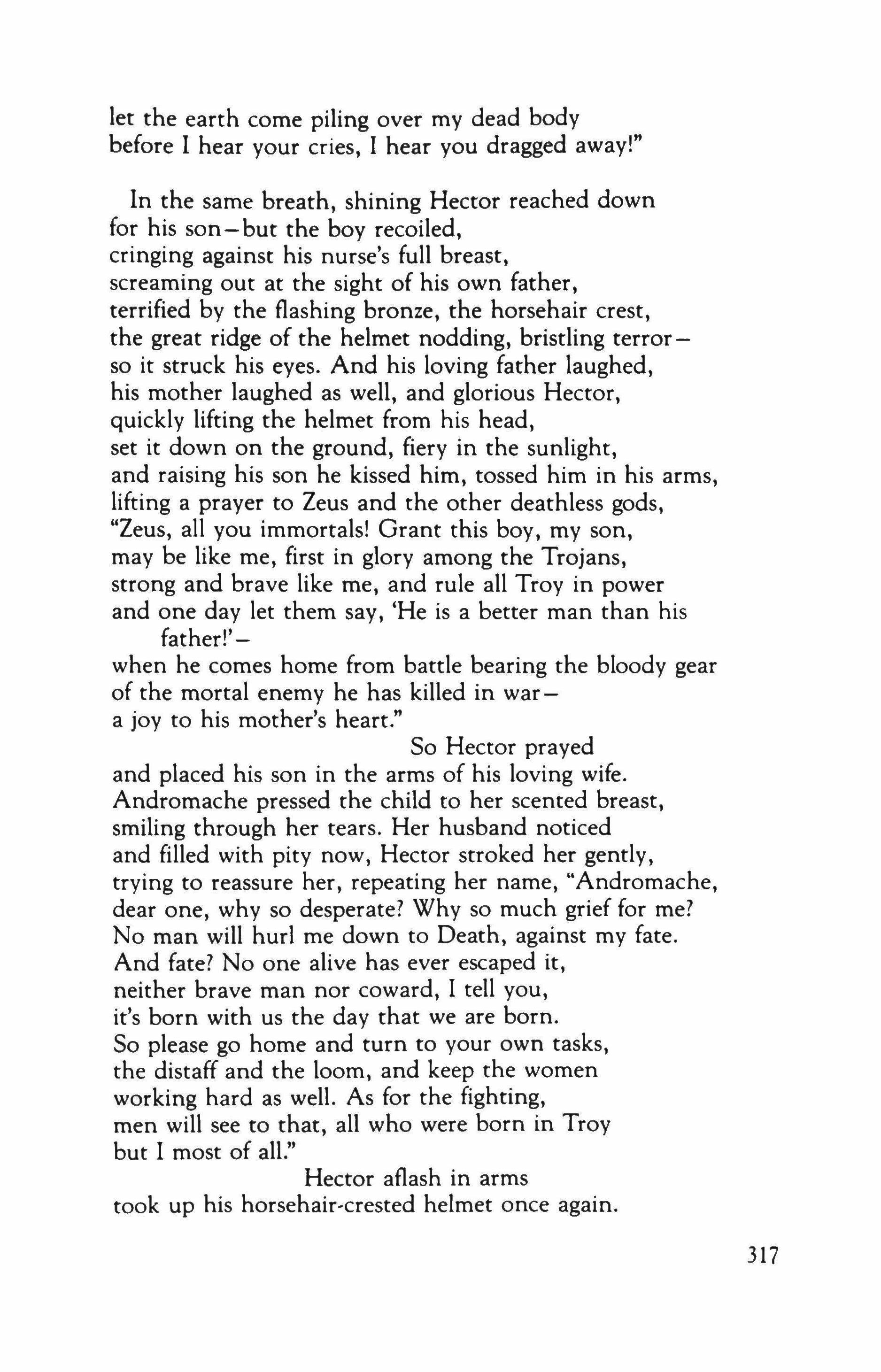
let the earth come piling over my dead body before I hear your cries, I hear you dragged away!"
In the same breath, shining Hector reached down for his son - but the boy recoiled, cringing against his nurse's full breast, screaming out at the sight of his own father, terrified by the flashing bronze, the horsehair crest, the great ridge of the helmet nodding, bristling terrorso it struck his eyes. And his loving father laughed, his mother laughed as well, and glorious Hector, quickly lifting the helmet from his head, set it down on the ground, fiery in the sunlight, and raising his son he kissed him, tossed him in his arms, lifting a prayer to Zeus and the other deathless gods, "Zeus, all you immortals! Grant this boy, my son, may be like me, first in glory among the Trojans, strong and brave like me, and rule all Troy in power and one day let them say, 'He is a better man than his father!'when he comes home from battle bearing the bloody gear of the mortal enemy he has killed in wara joy to his mother's heart."
So Hector prayed and placed his son in the arms of his loving wife. Andromache pressed the child to her scented breast, smiling through her tears. Her husband noticed and filled with pity now, Hector stroked her gently, trying to reassure her, repeating her name, "Andromache, dear one, why so desperate? Why so much grief for me? No man will hurl me down to Death, against my fate. And fate? No one alive has ever escaped it, neither brave man nor coward, I tell you, it's born with us the day that we are born. So please go home and turn to your own tasks, the distaff and the loom, and keep the women working hard as well. As for the fighting, men will see to that, all who were born in Troy but I most of all."
Hector aflash in arms took up his horsehair-crested helmet once again.
317
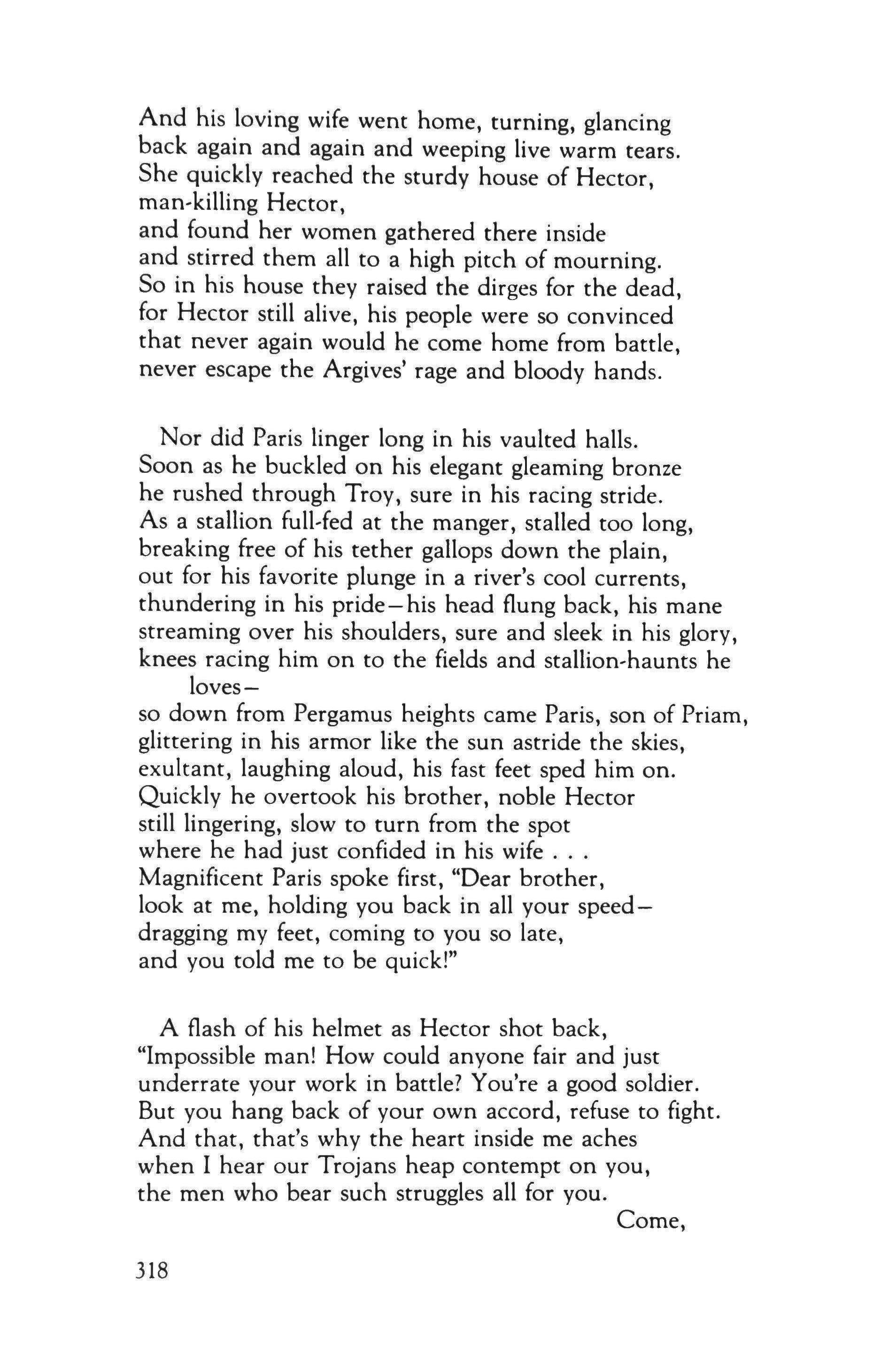
And his loving wife went home, turning, glancing back again and again and weeping live warm tears. She quickly reached the sturdy house of Hector, man-killing Hector, and found her women gathered there inside and stirred them all to a high pitch of mourning. So in his house they raised the dirges for the dead, for Hector still alive, his people were so convinced that never again would he come home from battle, never escape the Argives' rage and bloody hands.
Nor did Paris linger long in his vaulted halls. Soon as he buckled on his elegant gleaming bronze he rushed through Troy, sure in his racing stride. As a stallion full-fed at the manger, stalled too long, breaking free of his tether gallops down the plain, out for his favorite plunge in a river's cool currents, thundering in his pride-his head flung back, his mane streaming over his shoulders, sure and sleek in his glory, knees racing him on to the fields and stallion-haunts he lovesso down from Pergamus heights came Paris, son of Priam, glittering in his armor like the sun astride the skies, exultant, laughing aloud, his fast feet sped him on. Quickly he overtook his brother, noble Hector still lingering, slow to turn from the spot where he had just confided in his wife Magnificent Paris spoke first, "Dear brother, look at me, holding you back in all your speeddragging my feet, coming to you so late, and you told me to be quick!"
A flash of his helmet as Hector shot back, "Impossible man! How could anyone fair and just underrate your work in battle? You're a good soldier. But you hang back of your own accord, refuse to fight. And that, that's why the heart inside me aches when I hear our Trojans heap contempt on you, the men who bear such struggles all for you.
Come, 318
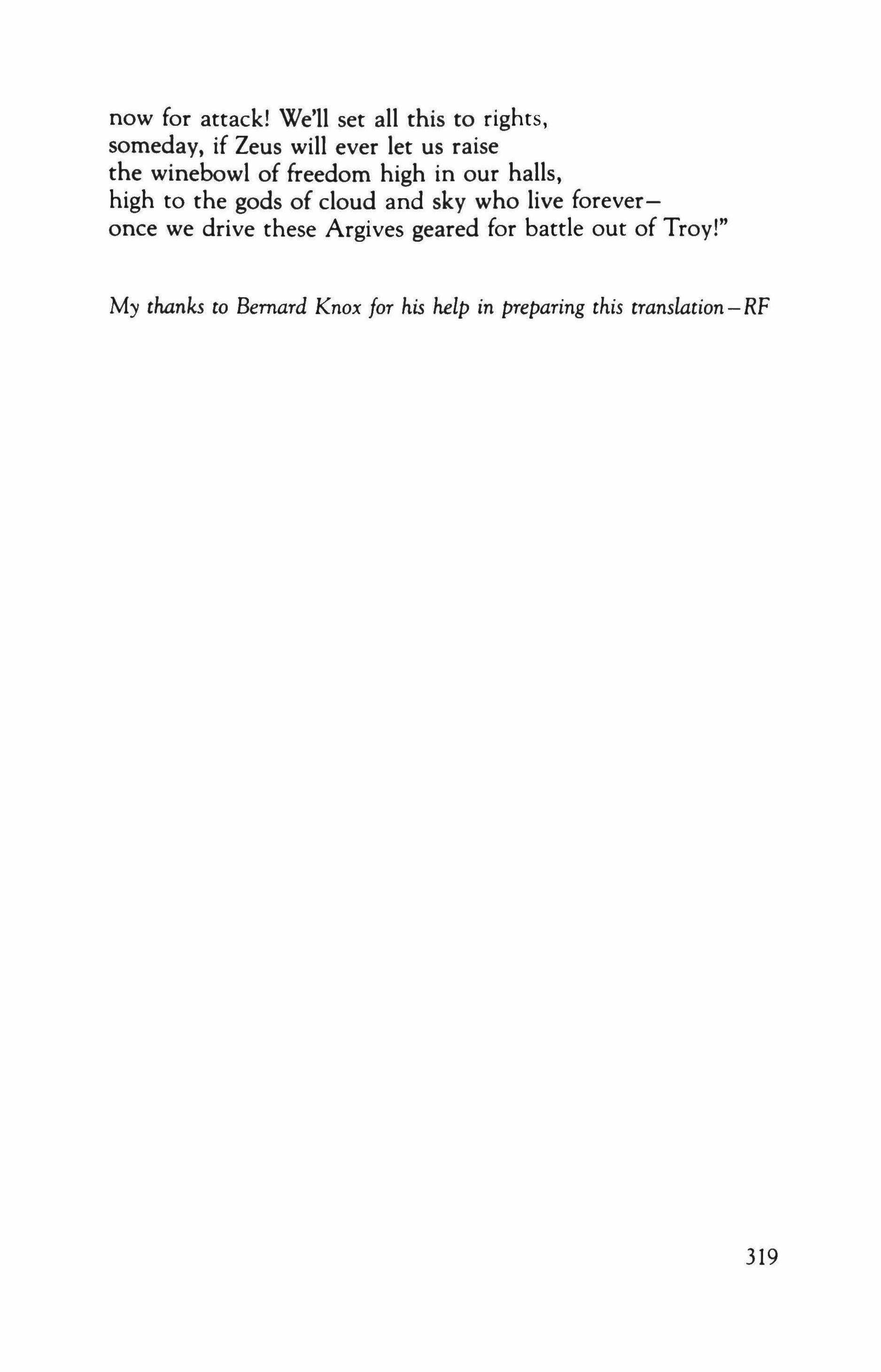
now for attack! We'll set all this to rights, someday, if Zeus will ever let us raise the winebowl of freedom high in our halls, high to the gods of cloud and sky who live foreveronce we drive these Argives geared for battle out of Troy!"
My thanks to Bernard Knox for his help in preparing this translation - RF
319
Contributors

Peter Balakian's recent books are Reply /rom Wilderness Island (Sheep Meadow, 1988) and Theodore Roethke's Far Fields (Louisiana State University Press, 1989). He teaches at Colgate University. * * * Samuel Beckett, who died at the age of eighty-three on December 22, 1989, was one of the most significant writers of the twentieth century. He was the author of more than a dozen plays, including Waiting for Godot (1952), Endgame (1957) and Krapp's Last Tape (1959); several novels, including Murphy (1938), Watt (1944), Molloy (1951) and The Unnamable (1953); and short stories, books of verse, radio and television scripts, and one screenplay (Film, with Buster Keaton, 1965). A native of Dublin who lived in France for most of his adult life, Beckett received the Nobel Prize for literature in 1969, but did not attend the ceremonies. His U.S. publisher is Grove Press. * * * Charles Juliet is the author of nearly twenty books of criticism in French, including most recently L'annee de l'et/eil (P.O.L., 1989), Pour Michel Leiris (Fourbis, 1988) and Ce pays de silence (Fata Morgana, 1987). His book, Giacometti, was translated into English by Patrick Lynn Clark and published by Universe Books (1986). Juliet has spent most of his adult life in Lyon, France, where he lives "with his wife, M. L., in a fifth-floor walk-up apartment alive with books, paintings, writing/thinking/talking, and the energy of a canaryyellow kitchen." * * * Suzanne Chamier, a member of the American Literary Translators Association, has taught at universities in France and the U.S. She presently teaches French at Southwestern University, in Texas.
Karen Heuler has published short stories in Kansas Quarterly, Carolina Quarterly and Clifton Magazine. She has recently completed a novel.
* * * Russell Workings collection of short stories, Resurrectionists
320
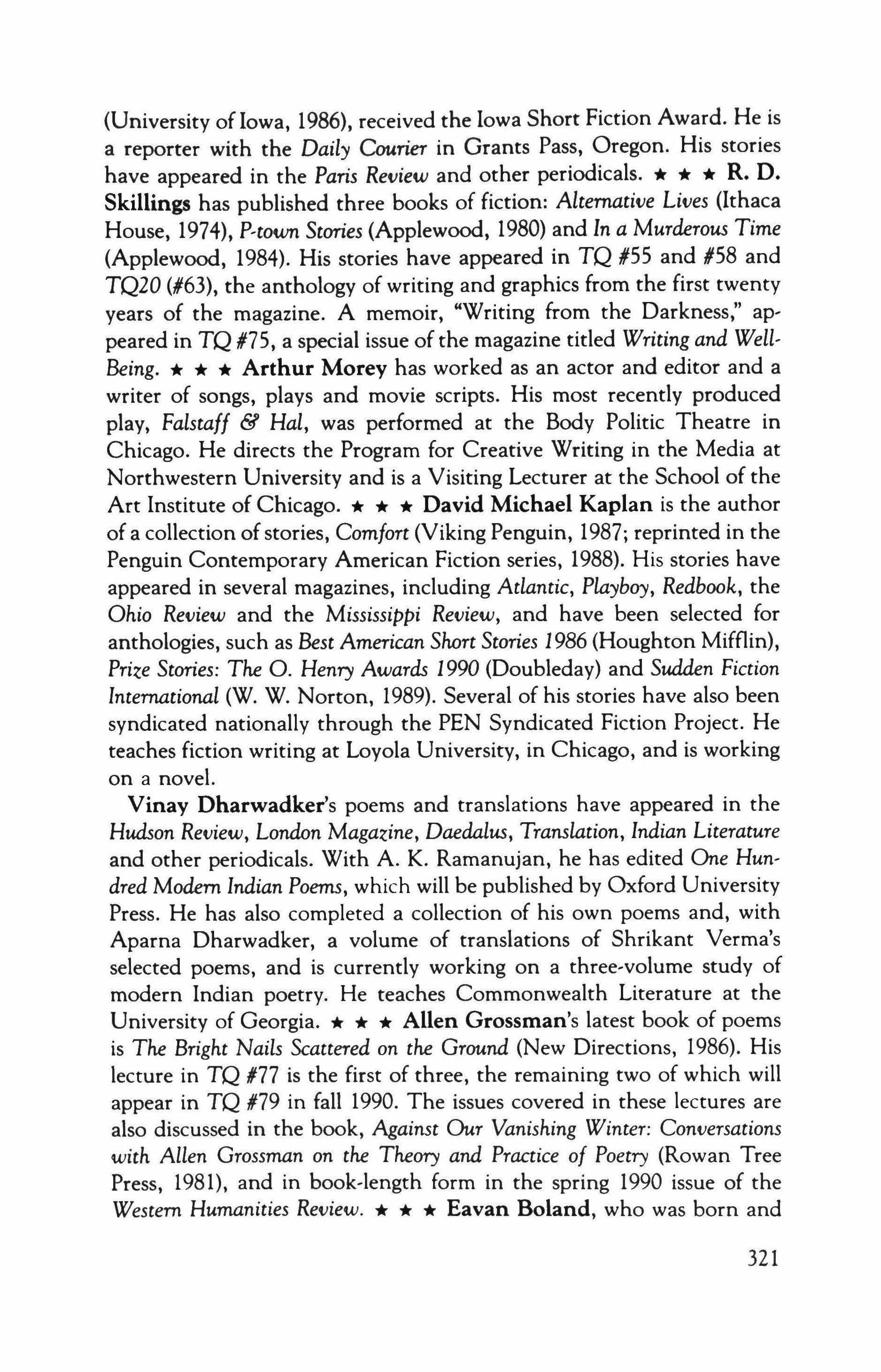
(University ofIowa, 1986), received the Iowa Short Fiction Award. He is a reporter with the Daily Courier in Grants Pass, Oregon. His stories have appeared in the Paris Review and other periodicals. * * * R. D. Skillings has published three books of fiction: Alternative Lives (Ithaca House, 1974), P-town Stories (Applewood, 1980) and In a Murderous Time (Applewood, 1984). His stories have appeared in TQ #55 and #58 and TQ20 (#63), the anthology of writing and graphics from the first twenty years of the magazine. A memoir, "Writing from the Darkness," appeared in TQ #75, a special issue of the magazine titled Writing and WellBeing. * * * Arthur Morey has worked as an actor and editor and a writer of songs, plays and movie scripts. His most recently produced play, Falstaff & Hal, was performed at the Body Politic Theatre in Chicago. He directs the Program for Creative Writing in the Media at Northwestern University and is a Visiting Lecturer at the School of the Art Institute of Chicago. * * * David Michael Kaplan is the author of a collection of stories, Comfort (Viking Penguin, 1987; reprinted in the Penguin Contemporary American Fiction series, 1988). His stories have appeared in several magazines, including Atlantic, Playboy, Redbook, the Ohio Review and the MississiPPi Review, and have been selected for anthologies, such as Best American Short Stories 1986 (Houghton Mifflin), Prize Stories: The o. Henry Awards 1990 (Doubleday) and Sudden Fiction International (W. W. Norton, 1989). Several of his stories have also been syndicated nationally through the PEN Syndicated Fiction Project. He teaches fiction writing at Loyola University, in Chicago, and is working on a novel.
Vinay Dharwadker's poems and translations have appeared in the Hudson Review, London Magazine, Daedalus, Translation, Indian Literature and other periodicals. With A. K. Ramanujan, he has edited One Hundred Modem Indian Poems, which will be published by Oxford University Press. He has also completed a collection of his own poems and, with Aparna Dharwadker, a volume of translations of Shrikant Verma's selected poems, and is currently working on a three-volume study of modern Indian poetry. He teaches Commonwealth Literature at the University of Georgia. * * * Allen Grossman's latest book of poems is The Bright Nails Scattered on the Ground (New Directions, 1986). His lecture in TQ #77 is the first of three, the remaining two of which will appear in TQ #79 in fall 1990. The issues covered in these lectures are also discussed in the book, Against Our Vanishing Winter: Conversations with Allen Grossman on the Theory and Practice of Poetry (Rowan Tree Press, 1981), and in book-length form in the spring 1990 issue of the Western Humanities Review. * * * Eavan Boland, who was born and 321
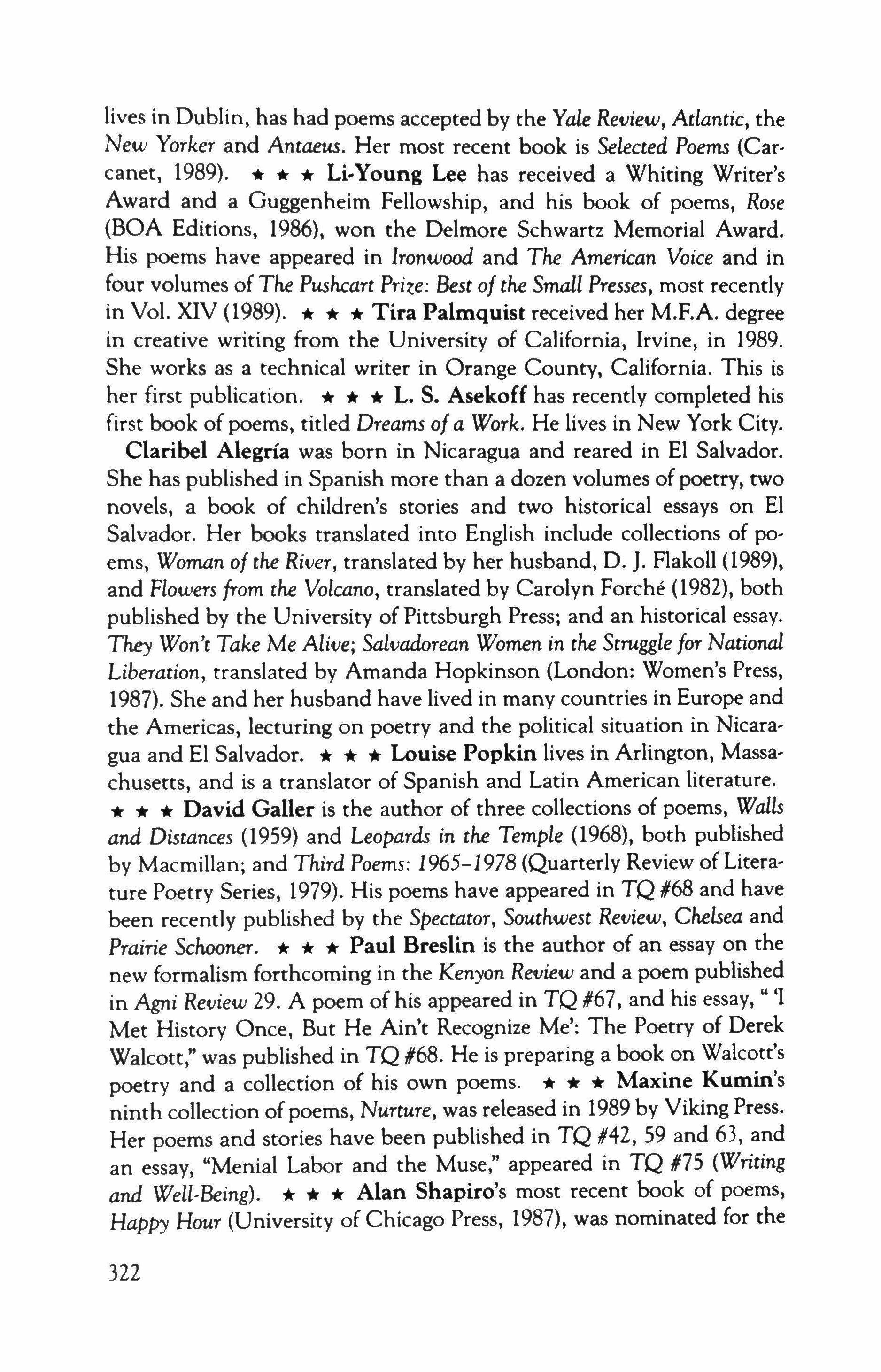
lives in Dublin, has had poems accepted by the Yale Review, Atlantic, the New Yorker and Antaeus. Her most recent book is Selected Poems (Carcanet, 1989). * * * Li-Young Lee has received a Whiting Writer's Award and a Guggenheim Fellowship, and his book of poems, Rose (BOA Editions, 1986), won the Delmore Schwartz Memorial Award. His poems have appeared in Ironwood and The American Voice and in four volumes of The Pushcart Prize: Best of the Small Presses, most recently in Vol. XIV (1989). * * * Tira Palmquist received her M.F.A. degree in creative writing from the University of California, Irvine, in 1989. She works as a technical writer in Orange County, California. This is her first publication.
* * * L. S. Asekoff has recently completed his first book of poems, titled Dreams of a Work. He lives in New York City.
Claribel Alegria was born in Nicaragua and reared in EI Salvador. She has published in Spanish more than a dozen volumes of poetry, two novels, a book of children's stories and two historical essays on EI Salvador. Her books translated into English include collections of poems, Woman of the River, translated by her husband, D. ]. Flakoll (1989), and Flowers from the Volcano, translated by Carolyn Forche (1982), both published by the University of Pittsburgh Press; and an historical essay. They Won't Take Me Alive; Salvadorean Women in the Struggle for National Liberation, translated by Amanda Hopkinson (London: Women's Press, 1987). She and her husband have lived in many countries in Europe and the Americas, lecturing on poetry and the political situation in Nicaragua and EI Salvador.
* * * Louise Popkin lives in Arlington, Massachusetts, and is a translator of Spanish and Latin American literature.
* * * David Galler is the author of three collections of poems, Walls and Distances (1959) and Leopards in the Temple (1968), both published by Macmillan; and Third Poems: 1965-1978 (Quarterly Review of Literature Poetry Series, 1979). His poems have appeared in TQ #68 and have been recently published by the Spectator, Southwest Review, Chelsea and Prairie Schooner.
* * * Paul Breslin is the author of an essay on the new formalism forthcoming in the Kenyon Review and a poem published in Agni Review 29. A poem of his appeared in TQ #67, and his essay, "'I Met History Once, But He Ain't Recognize Me': The Poetry of Derek Walcott," was published in TQ #68. He is preparing a book on Walcott's poetry and a collection of his own poems.
* * * Maxine Kumin's ninth collection of poems, Nurture, was released in 1989 by Viking Press. Her poems and stories have been published in TQ #42, 59 and 63, and an essay, "Menial Labor and the Muse," appeared in TQ #7S (Writing and Well-Being).
* * * Alan Shapiro's most recent book of poems, Happy Hour (University of Chicago Press, 1987), was nominated for the
322
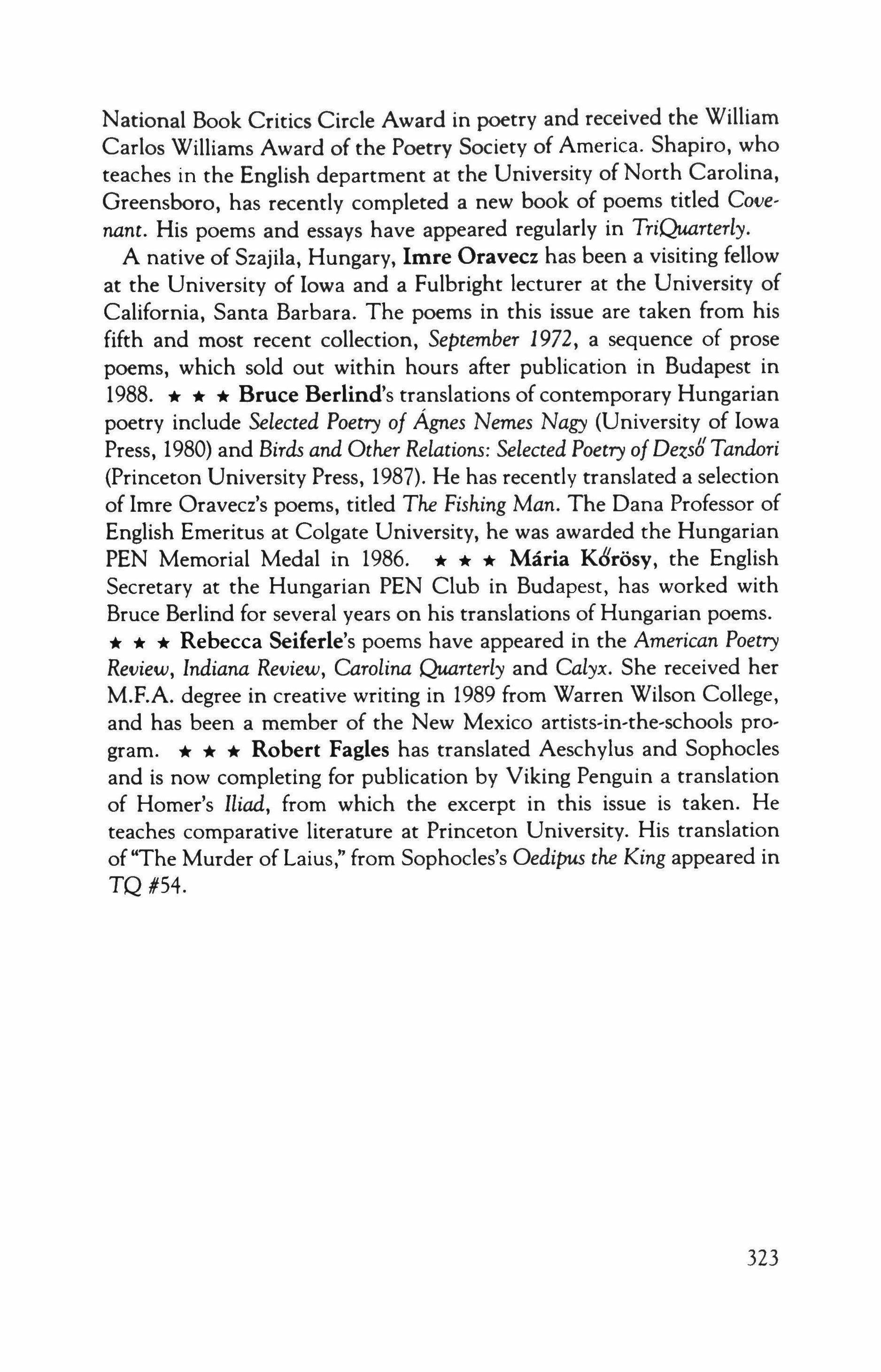
National Book Critics Circle Award in poetry and received the William Carlos Williams Award of the Poetry Society of America. Shapiro, who teaches in the English department at the University of North Carolina, Greensboro, has recently completed a new book of poems titled Covenant. His poems and essays have appeared regularly in TriQuarterly.
A native of Szajila, Hungary, Imre Oravecz has been a visiting fellow at the University of Iowa and a Fulbright lecturer at the University of California, Santa Barbara. The poems in this issue are taken from his fifth and most recent collection, September 1972, a sequence of prose poems, which sold out within hours after publication in Budapest in 1988.
* * * Bruce Berlind's translations of contemporary Hungarian poetry include Selected Poetry of Agnes Nemes Nagy (University of Iowa Press, 1980) and Birds and Other Relations: Selected Poetry ofDezslf Tandori (Princeton University Press, 1987). He has recently translated a selection of Imre Oravecz's poems, titled The Fishing Man. The Dana Professor of English Emeritus at Colgate University, he was awarded the Hungarian PEN Memorial Medal in 1986.
* * * Maria K&rosv, the English Secretary at the Hungarian PEN Club in Budapest, has worked with Bruce Berlind for several years on his translations of Hungarian poems.
* * * Rebecca Seiferle's poems have appeared in the American Poetry Review, Indiana Review, Carolina Quarterly and Calyx. She received her M.F.A. degree in creative writing in 1989 from Warren Wilson College, and has been a member of the New Mexico artists-in-the-schools program.
* * * Robert Fagles has translated Aeschylus and Sophocles and is now completing for publication by Viking Penguin a translation of Homer's Iliad, from which the excerpt in this issue is taken. He teaches comparative literature at Princeton University. His translation of"The Murder of Laius," from Sophocles's Oedipus the King appeared in TQ #54.
323
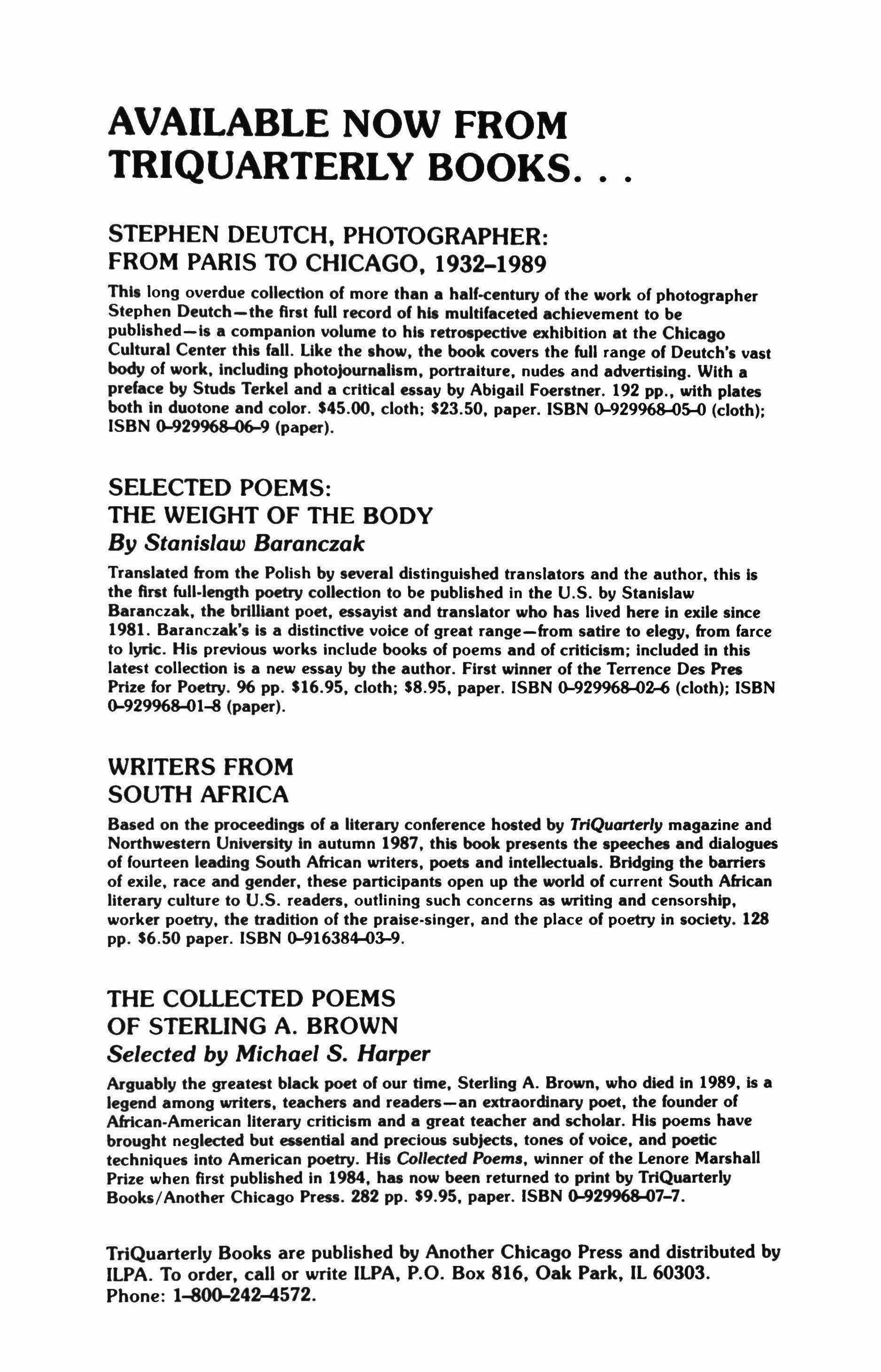
AVAILABLE NOW FROM TRIQUARTERLY BOOKS.
STEPHEN DEUTCH, PHOTOGRAPHER: FROM PARIS TO CHICAGO, 1932-1989
This long overdue collection of more than a half-c:entury of the work of photographer Stephen Deutch-the flrst full record of his multifaceted achievement to be published-Is a companion volume to his retr�pective exhibition at the Chicago Cultural Center this fall. Like the show, the book covers the full range of Deutch's vast body of work, Including photojournalism, portraiture, nudes and advertising. With a preface by Studs Terkel and a critical essay by Abigail Foerstner. 192 pp., with plates both In duotone and color. $45.00, cloth; $23.50, paper. ISBN 0-929968-05-0 (cloth); ISBN 0-929968-06-9 (paper).
SELECTED POEMS:
THE WEIGHT OF THE BODY
By Stanislaw Baranczak
Translated from the Polish by several distinguished translators and the author, this Is the flrst full.length poetry collection to be published in the U.S. by Stanislaw Baranczak, the briOlant poet, essayist and translator who has lived here in exile since 1981. Baranczak's Is a distinctive voice of great range-from satire to elegy, from farce to lyric. His previous works Include books of poems and of criticism; Included In this latest collection Is a new essay by the author. First winner of the Terrence Des Pres PrIze for Poetry. 96 pp. $16.95, cloth; $8.95, paper. ISBN 0-929968-02-6 (cloth); ISBN 0-929968-01-8 (paper).
WRITERS FROM SOUTH AFRICA
Based on the proceedings of a literary conference hosted by TrlQuarter'y magazine and Northwestern University In autumn 1987, this book presents the speeches and dialogues of fourteen leading South African writers, poets and Intellectuals. Bridging the barriers of exile, race and gender, these participants open up the world of current South AfrIcan literary culture to U.S. readers, outlining such concerns as writing and censorship, worker poetry, the tradition of the praise-singer, and the place of poetry In society. 128 pp. $6.50 paper. ISBN 0-916384-03-9.
THE COLLECTED POEMS OF STERLING A. BROWN
Selected by Michael S. Harper
Arguably the greatest black poet of our time, Sterling A. Brown, who died In 1989. Is a legend among writers, teachers and readers-an extraordinary poet, the founder of AfrIcan·American literary criticism and a great teacher and scholar. His poems have brought neglected but euential and precious subjects. tones of voice, and poetic techniques Into American poetry. HIs Collected Poems, winner of the Lenore Marshall Prize when flrst published In 1984, has now been returned to print by TriQuarterly Books/Another Chicago Press. 282 pp. $9.95. paper. ISBN 0-929968-07-7.
TriQuarterly Books are published by Another Chicago Press and distributed by ILPA. To order, call or write ILPA, P.O. Box 816, Oak Park, IL 60303. Phone: 1-800-242-4572.
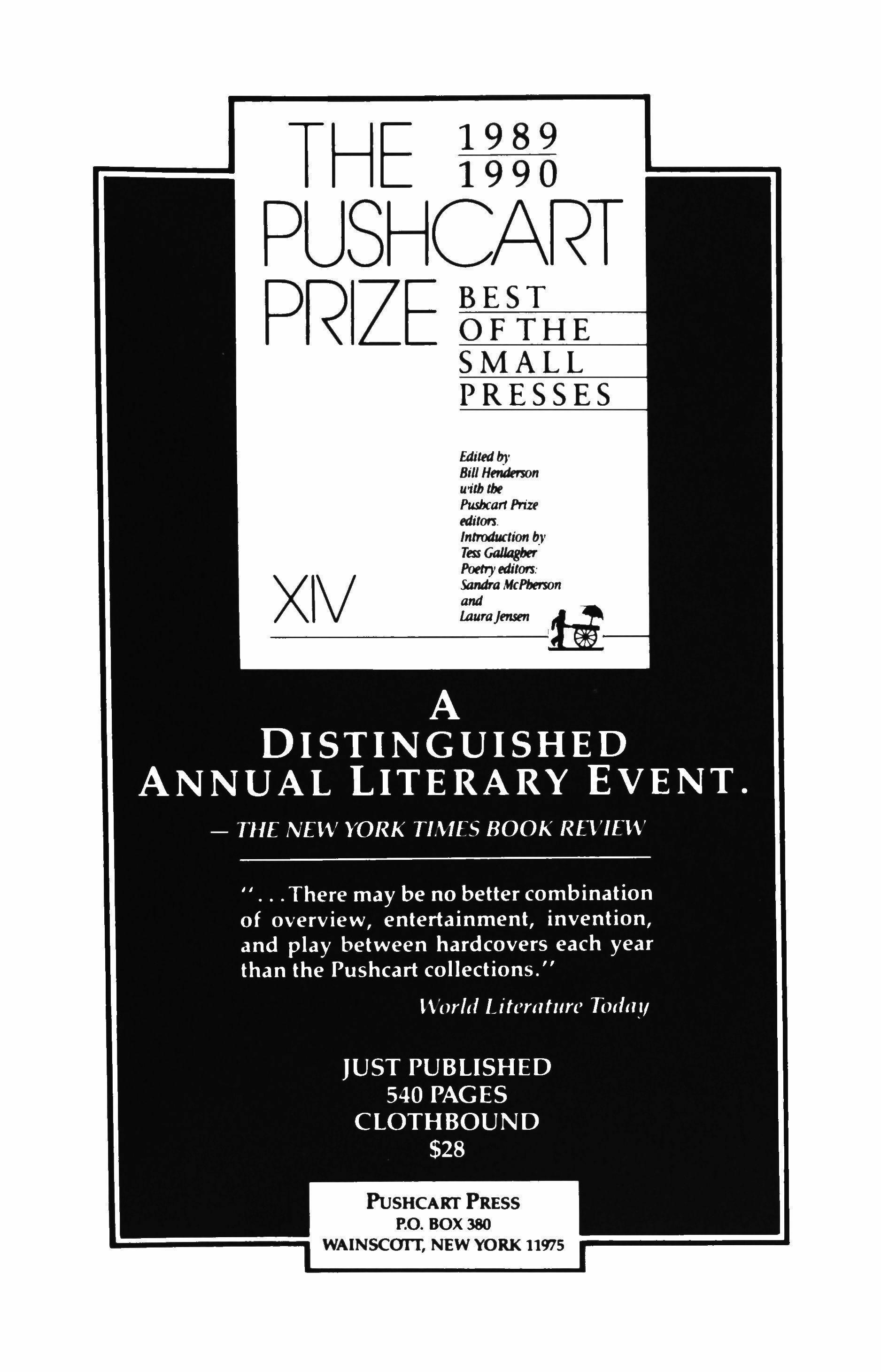
Edil«l b)' BillHmdmon u'ilb tbt Pushcar1 Prizt «liton.
Introduction b)' TtsS GaII4gbtr. Pvttry «liton: Sandra McPbmon and laurajmsm
PRIZE
XIV
THE 1989 1990 PUSHCART
��\THE SMALL PRESSES
� PuSHCART PRESS P.O. BOX 380 "'_---.... WAINSCOIT, NEW YORK 11975 .___--___.
"Poignant and atmospheric, this book honors the promise ot LUCID STARS
Elegant, accessible writing tine reading. "*
The rare sensitivity and insight Andrea Barrett exhibited in her debut novel Lucid Stars had critics comparing her to Gail Godwin and Anne Tyler. Now, she turns her talents to a celebration of family life in an endearing portrait of people struggling to make sense of their lives in the rural hills of western Massachusetts.
"In SECRET HARMONIES, human emotions take on the qualities 01 music-Ileeting, resonant, passionate, painlul, beautilul Th1s is a wonderful novel. "
-Marle Childress, author 01 V lor Victor
"Andrea Barrett's insight is as clear and crystalline as the cutting Hght 01 winter stars, her characters alive with sorrow, hope, and the uncertain joy 01 Hv1ng in worlds selJ-hewn. Hers is an important and beaut1lul volce, one we need here with us.
-Bret Lott, author of The Man Who Owned Vermont
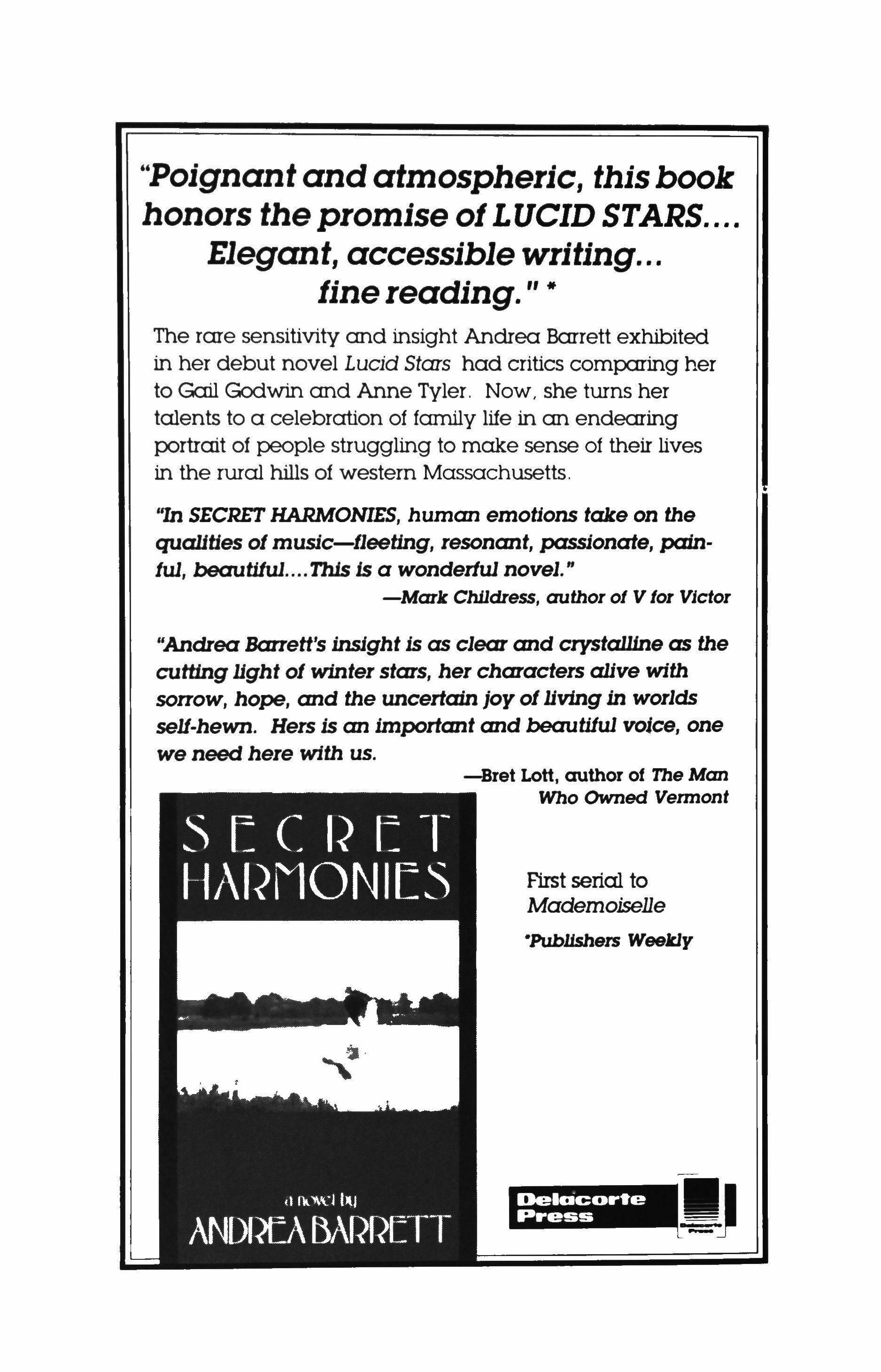
First serial to Mademoiselle
·Publlsbers Weeldy
�J
poetry from Paris Heuiew fditions
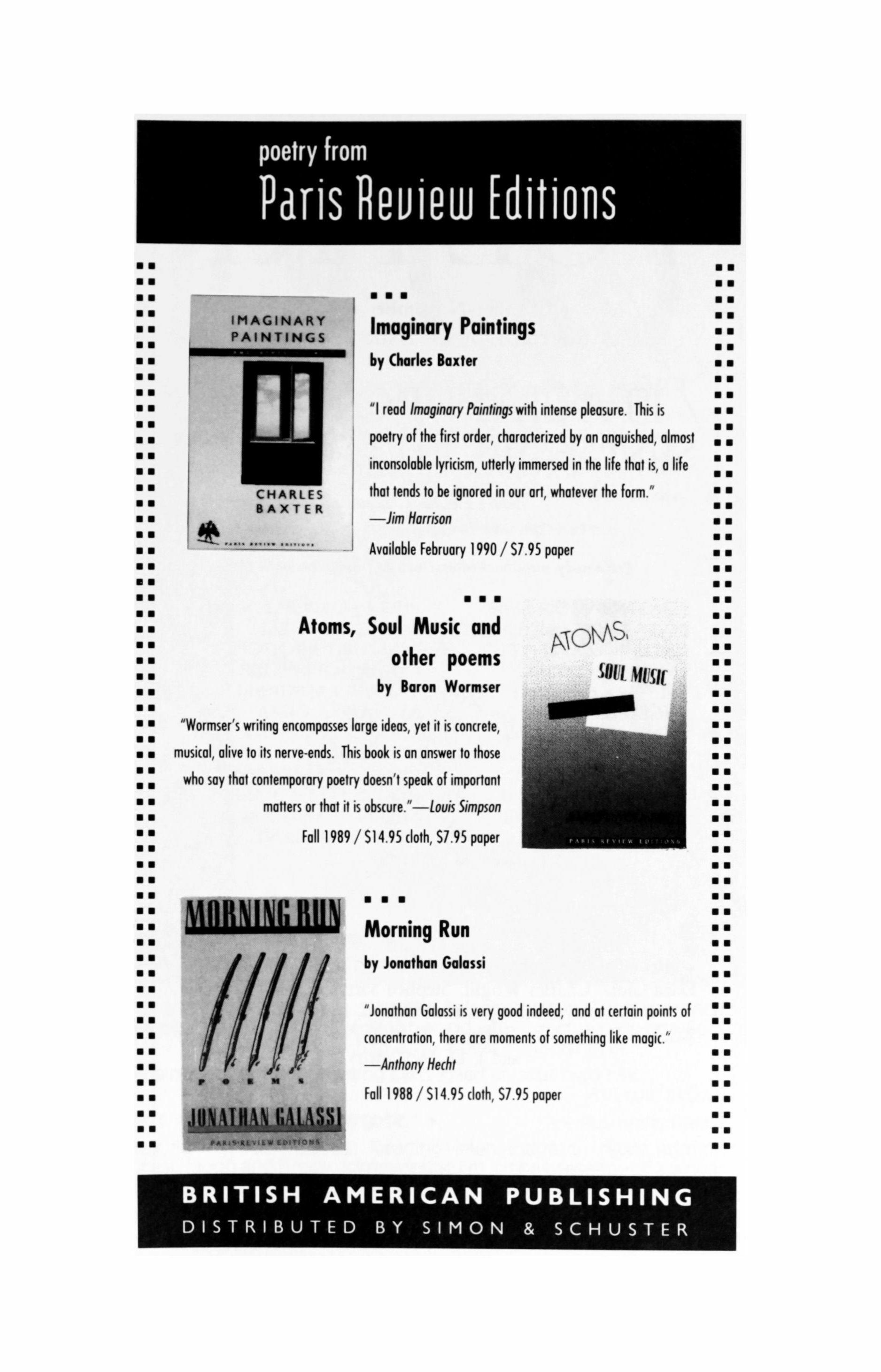
Imaginary Paintings
by Charles Baxter
"I read Imaginary Paintingswith intense pleasure. This is poetry of the first order, therederized by on anguished, almost inronsolnble Iyri(ism, uMeriy immersed in the life that is, 0 life that tends to be ignored in our ort, whotever the form.'
-Jim Harrison
Availoble February 1990/57.95 paper
Atoms, Soul Musi( and other poems
by Baron Wormser
·Warmser's writing encompasses large ideas, yet it is (oncrete, musknl, olive to its nerve-ends. This book is on answer to those who soy that (ontemporary poetry doesn't speak of important matters or that it is obscure."-Louis Simpson Fall 1989 /SI4.95 doth, S7.95 poper
Morning Run
by Jonathan Galassi
Jonothan Golossi is very good indeed; and at tertnin points of ronrentretlon, there are moments of something like magi(."
-Anthony Hecht Fall 1988/S14.95 doth, S7.95 paper
•• •• •• •• •• •• •• •• CHARLES BAXTER *,', ", • ••
•• •• •• •• ••
IIUI ••••
• • • • • •• •• •• •• • • • •• • • •• BRITISH AMERICAN PUBLISHING DISTRIBUTED BY SIMON & SCHUSTER
POETRY
October-November 1989 A Special Double Issue Featuring
SINCE WORLD WAR II
Edited witlJ Rwlo Cherchi
Previously unpublished and newly translated work by
EUGENIO MONTALE
EDOARDO SANGUINETI
ANDREA ZANZOTTO
SANDRO PENNA
VITTORIO SERENI
LUCIANO ERBA
GIORGIO CAPRONI
GIOVANNI GIUDICI
AMELIA ROSSELLI
GIOVANNI RABON I
BARTOLO CATTAFI
MARIO LUZI
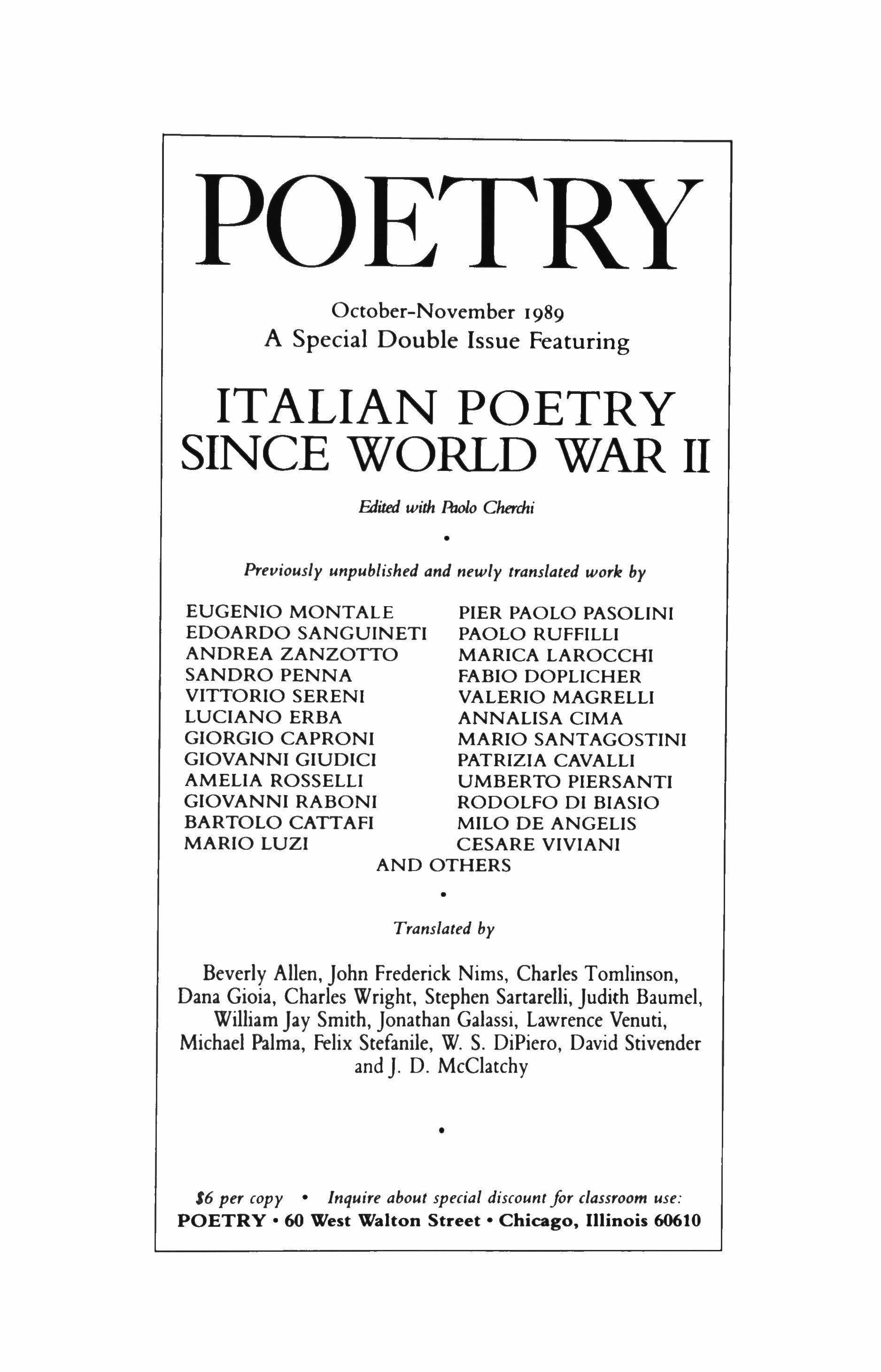
PIER PAOLO PASOLINI
PAOLO RUFFILLI
MARICA LAROCCHI
FABIO DOPLICHER
VALERIO MAGRELLI
ANNALISA CIMA
MARIO SANTAGOSTINI
PATRIZIA CAVALLI
UMBERTO PIERSANTI
RODOLFO DI BIASIO
MILO DE ANGELIS
CESARE VIVIANI AND OTHERS
Translated by
Beverly Allen, John Frederick Nims, Charles Tomlinson, Dana Gioia, Charles Wright, Stephen Sartarelli, Judith Baumel, William Jay Smith, Jonathan Galassi, Lawrence Venuti, Michael Palma, Felix Stefanile, W. S. DiPiero, David Stivender and J. D. McClatchy
16 per copy Inquire about special discount for classroom use: POETRY· 60 West Walton Street· Chicago, Illinois 60610
ITALIAN POETRY
A
"fearle and very funriv" novel
frc}J\ Helen Hodgman, winner of Australia's prElttfgiOUS Christina Stead Prize \
London Evening Standar�
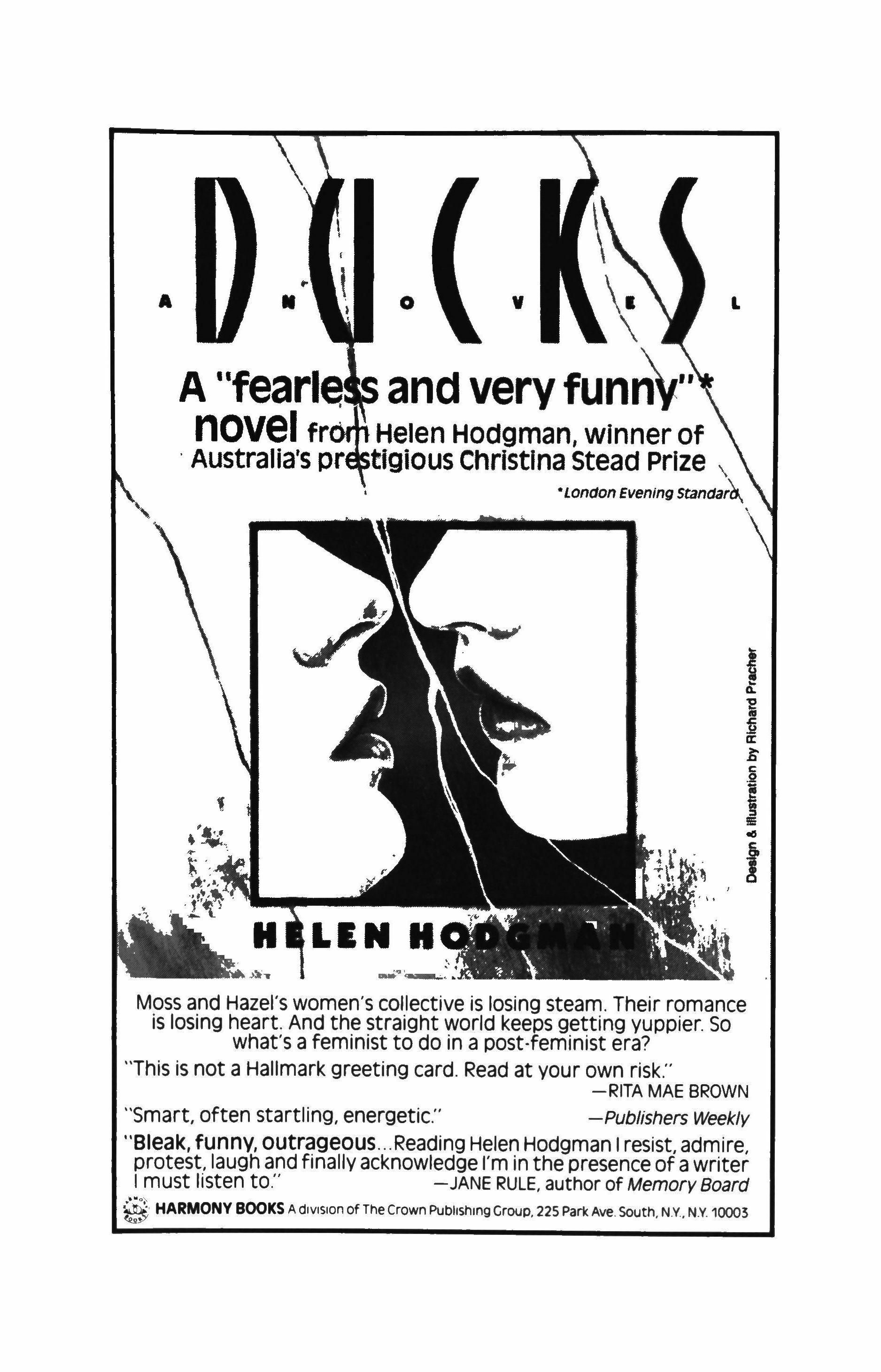
Moss and Hazel's women's collective is losing steam. Their romance is losing heart. And the straight world keeps getting yuppier. So what's a feminist to do in a post-ferrurust era?
"This is not a Hallmark greeting card. Read at your own risk."
-RITA MAE BROWN
"Smart, often startling, energetic." -Publishers Weekly
"Bleak, funny, outrageous Reading Helen Hodgman I resist, admire, protest, laugh and finally acknowledge I'm in the presence of a writer I must listen to."
�. HARMONY BOOKS A divIsion of The
-JANE RULE, author of Memory Board
\. \
v A o
Publishing Group. 225 Park Ave. South. NY. N.V. 10003 L
Crown
Featuring work by:
Alice
Adami
John Alhbery
Madison Smartt
Ben
Amy OampiH
Tom Diach
Marilyn Hacker
Donald Han
Phillip Lopate
Clarence Major
David Mamet
Joyce Carol <Mtn
Francine Prole
Isaac Bashevis Sinler
Gilbert Sol'ftntino
Elizabeth Spencer
John Updike
Peter Viereck
One of the best literary magazines In America The Philadelphilllnquirer
BOULEVARD
"Among scores of literary titles, one of the most innovative is Boulevard."
Ulmlry 'ournlll
"Boulevard is the kind of magazine that publishes not just good fiction and poetry but works of compelling fact."
The Wtuhington Post
"A literary delight. A treasure trove." USA Today "Excellent" Chialgo Tribune
Subscribe now at these specialprices!
Three issues $12
Six issues $20
Nine issues $25
For subscription outside the U.S., add $3.00. NAME
Aol:lR5S
Crrv/STATE/'bP CODE
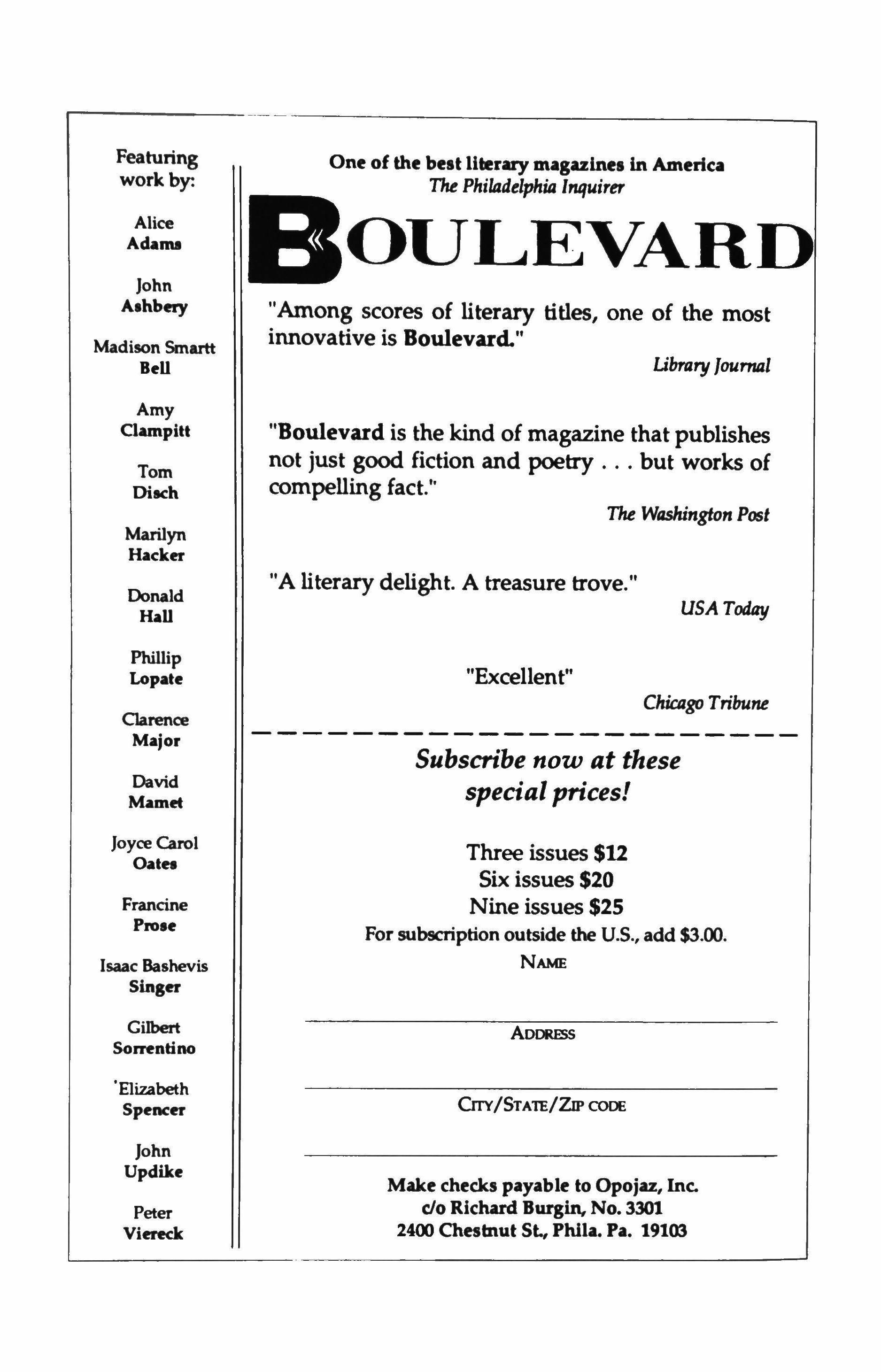
Make checks payable to Opojaz, Inc. do Richard Burgin. No. 3301 2400 Chestnut St., Phlla. Pa. 19103
Twiceyearly from University ofHawaii Press
Fiction, poetry, commentary fromoutstandi"tJ U.S. writers, aw"tJ withguest-editedfeatures ofexciti"tJ new worksfrom Asia and the PacifIC

John Updike, Francois Camoin, Ai, Joyce Carol Oates, Ron Carlson, Alberto Rios, Jonathan Penner, Pat Matsueda, Jack Marshall, Sandra Alcosser, Frederick Busch, Michael Hannon, Gene Frumkin, Bob Shacochis, Charles Baxter, Michelle Carter, David Michael Kaplan, Gladys Swan, Fred Chappell, Lee K. Abbott, James D. Houston, Gary Pak, Ursule Molinaro, Stuart Dybek, Ian MacMillan, Lynda Sexson, John L'Heureux
Corresponding Editors * For Korea, Kim Uchang * For Japan, Masao Miyoshi * For China, Howard Goldblatt, Ding Zuxin * For The Philippines, Alfred A. Yuson * For South Asia, Wimal Dissanayake * For New Zealand and South Pacific, Norman Simms * For Pacific Latin America, H. E. Francis * For North America, Fred Chappell, T. R. Hummer, Charles Johnson, Maxine Hong Kingston, Michael Ondaatje, Alberto Rios, Tobias Wolff
Subscriptions, one year $12, two years $21.60, three years $28.80. Single issue $8, except inaugural double issue $10.
To order: Send check or money order (drawn on a U.S. bank and payable to University ofHawaii Press). VISA or MasterCard also accepted (include acct. no., expo date, and signature).
University of Hawaii Press Journals Department 2840 Kolowalu Street, Honolulu, HI 96822 (808) 948-8833
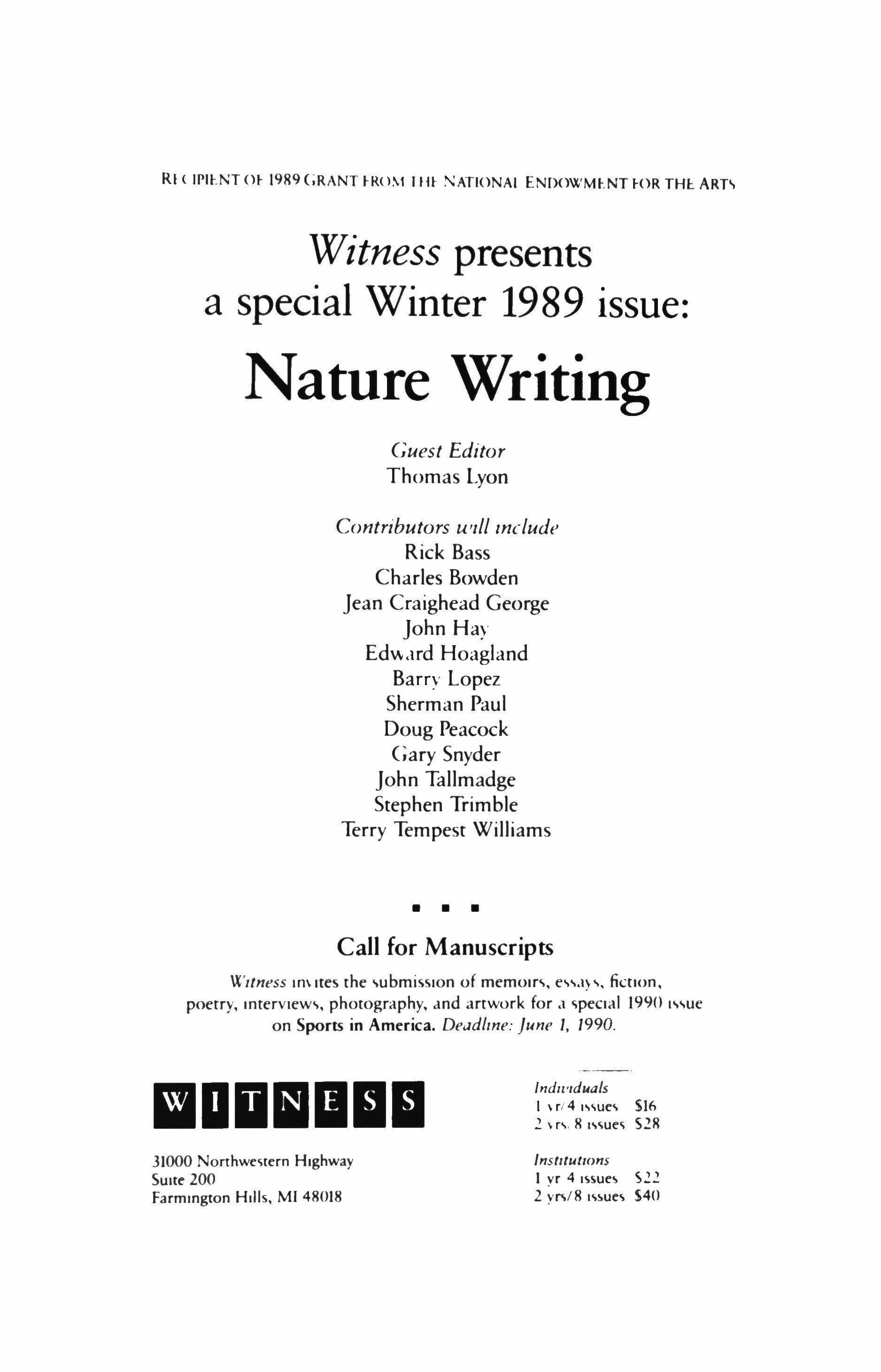
Witness presents a special Winter 1989 issue: Nature Writing
Guest Editor
Thomas Lyon
Contributors U'II/ include Rick Bass
Charles Bowden
Jean Craighead George John Hay
Edward Hoagland
Barry Lopez
Sherman Paul
Doug Peacock
Gary Snyder
John Tallmadge
Stephen Trimble
Terry Tempest Williams
Call for Manuscripts
W,tness invrtes the submission of mernorrv e",I)', ficnon, poetry, mrervrews photography, and artwork for ,I special 1990 ,,\ue on Sports in America. Deadline: June I, 1990.
lndnnduals
I v r. 4 rvsuev $16
2 v rv. 8 Mue\ S28
lnstitutums 1 vr 4 Issues S22 2 Yf\/8 Issues $40
RI
(;RANT �R( )\1 uu �ATlONAI ENJ)OWM�.NT H)R THE: ART'
( II'IU-:T m (989
1111111111
31000 Northwestern Highway Suite 200 Farmmgton Hills, M1 48018
Arnold Rampersad on V.S. Naipaul
Denis Hollier on Picasso
Masao Miyoshi, ��Japanese Cultural Discourse"
Joan Dayan, "Carribean Cannibals and Whores"
Stephen Greenblatt on witchcraft
John Hollander, "The Naming and Blaming ofCats"
Frank Lentricchia on Don DeLillo
�RITAN
A Quarterly Review edited by Richard Poirier
Cutting across intellectual disciplines and exploring the boundaries of new ones
Subscriptions: 0 $16/0ne year 0 $26/two years
Make checks payable to RARITAN. 165 College Ave New Brunswick. NJ 08903
Sorry. we cannot bill.
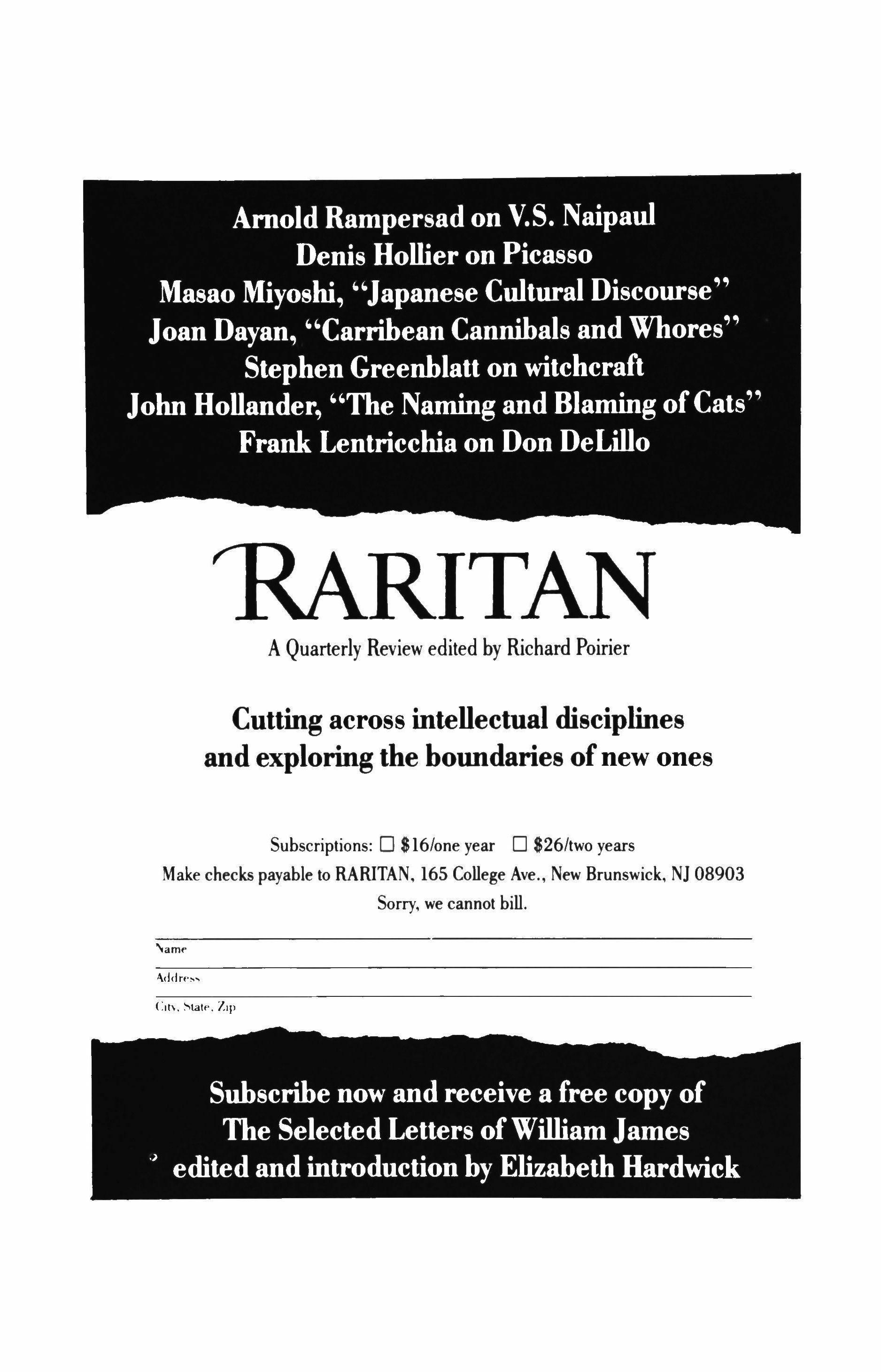
Subscribe now and receive a free copy of The Selected Letters ofWilliam James .) edited and introduction by Elizabeth Hardwick
T�
Fiction. Poetry
Art. Criticism
Three times a year
The New York Times has called TriQuarterly "perhaps the pre-eminent Journal for literary fiction" in the nation, Chicago magazine describes it as" one of the best, issue after Issue," But see for vourself=vubscribe now

T-,h,rt, S900 SWl'dl,h,rt' S 1 �,OO OS OM
o L 0 XL
Both on 50150 lOnon/poly blend.
Pll'd.;£' 'JX"Clfy ,"Zi>' and quannnes dI'o;,red
o 1 year (S 18) 0 2 vearv ($31) 0 hfe (S25m
Please enter my -ubscnpnon 10 r"Quarterly
rnagazme (Forl'lgn 'u�npllon� add S4 per YE'dr)
o Chdrge my VISNMa,lerCdrd #
Muitl-<:olor pe-ter: S9,OO 0
Th" 18" 24" poster, designed by Grru Kondzlolka and fealured a, IhE' cover of TQ .74, WIll be shrpped m a sturdv, �JX"Clally crafted maihng tube
o I enclose S 0 Please brll me
S,gndlure Exp, date
Ndme
Addrf"i'
CIty State Z,p
TriQu.lrtrrly
P.s. TriQuarterly subscribers are automatically enti tied to a 20% discount on all TQ books listed on page 324.
Northwestern Unlver"ty 2020 RIdge Avenue Evanston, Illono" &0208

TriQu4rterly thanks the following life subscribers:
David C. Abercrombie
Amin Alimard
Lois Ames
Richard H. Anderson
Roger Anderson
Sandy Anderson
University of Arizona Poetry Center
Gayle Arnzen
Michael Attas
Asa Baber
Tom G. Bell
Carol Blv
Kay Bonetti
Robert Boruch
Van K. Brock
Gwendolyn Brooks
Timothy Browne
Paul Bundy
Eric O. Cahn
David Cassak
Stephen Chapman
Anthony Chase
Freda Check
Michael Chwe
Andrew Cvr
Doreen Davie
Kenneth Day
Mark W. DeBree
Alan Distler
Anstiss Drake
John B. Elliott
Christopher English
Carol Erickson
Steven Finch
David R. Fine
Mr. and Mrs. H. Bernard Firestone
Paul Fjelstad
Torrence Fossland
Helen and C. Dwight Foster
Jeffrey Franklin
Peter S. Fritz
Mrs. Angela M. Gannon
Kathy M. Garness
Lawrence J. Gorman
Maxine Groffsky
Rev. Dr. Elliott Hagle
Jack Hagstrom
Ross B. Heath
Charles Hedde
Donald Hey
Donald A. Hillel
Craig V. Hodson
Irwin L Hoffman
Irwin T. Holtzman
P. Hosier
Charles Huss
Curtis Imrie
Helen Jacob
Del Ivan Janik
Dr. Alfred D. Klinger
Loy E. Knapp
Sydney Knowlton
Mr. and Mrs. Carl A. Kroch
Judy Kunz
Conrad A. Langenberg
John Larroquette
Isaac Lassiter
Dorothy Latiak
Patricia W. Linton
Philip Lister
Mr. and Mrs. W. J. Lorentz de Haas
Prof. Kubet Luchterhand
Ellen L. Marks
Richard Marmulstein
James Marquardt
Kevin McCanna
Robert D. McChesney
Charles Gene McDaniel
Robert McMillan
Michael Meaney
George Meredith
Lois Adele Meyer
C. R. Michel
University of Michigan Hopwood Room
Ralph Miller
Kenneth Monroe
James E. Morrison IV
Max Nathan
Dean Neprud
Catherine Ohs
Paul Peters and Rosemarie Kosdron
Scott Peters
Jane Petro
Evelyn Pine
Doyle Pitman
Barbara Polikoff
Alex T. Primm
Richard Prim, M.D.
Honora Rankine-Galloway
Anne Katheryn Ream
J. M. Reese
Peter Reich
Susan Reiners
Don Reynolds
Christopher Richter
Diane Rider
Rivier College
Sam Rosenthal
David Roth, M.D.
Jim Rowe
Patricia Ruby
Joan Rybka
Joel Schilling, D.D.S.
Paul and June Schlueter, Ph.D.s
Mrs. H. C. Schmidt
Robert 1. Schneideman
Koji Seki
David A. Selby
Herbert Shore
Martin Silverman
Gregory F. Smolarek
Dr. Wanda Sorgente
Laurel Speer
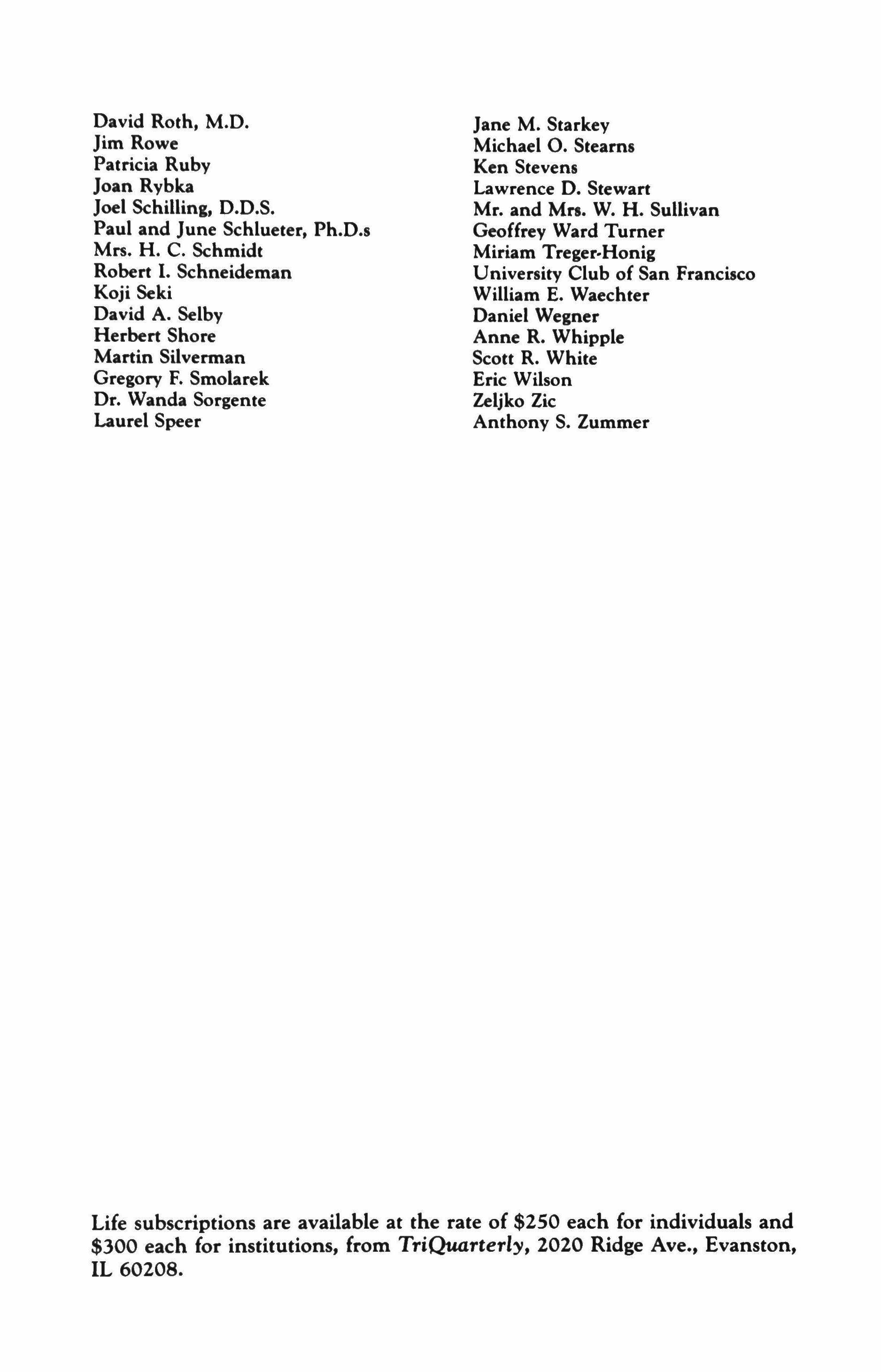
Jane M. Starkey
Michael O. Steams
Ken Stevens
Lawrence D. Stewart
Mr. and Mrs. W. H. Sullivan
Geoffrey Ward Turner
Miriam Treger-Honig
University Club of San Francisco
William E. Waechter
Daniel Wegner
Anne R. Whipple
Scott R. White
Erie Wilson
Zeljko Zie
Anthony S. Zummer
Life subscriptions are available at the rate of $250 each for individuals and $300 each for institutions, from TriQuarterly, 2020 Ridge Ave., Evanston, IL 60208.
Lee Philip Bell
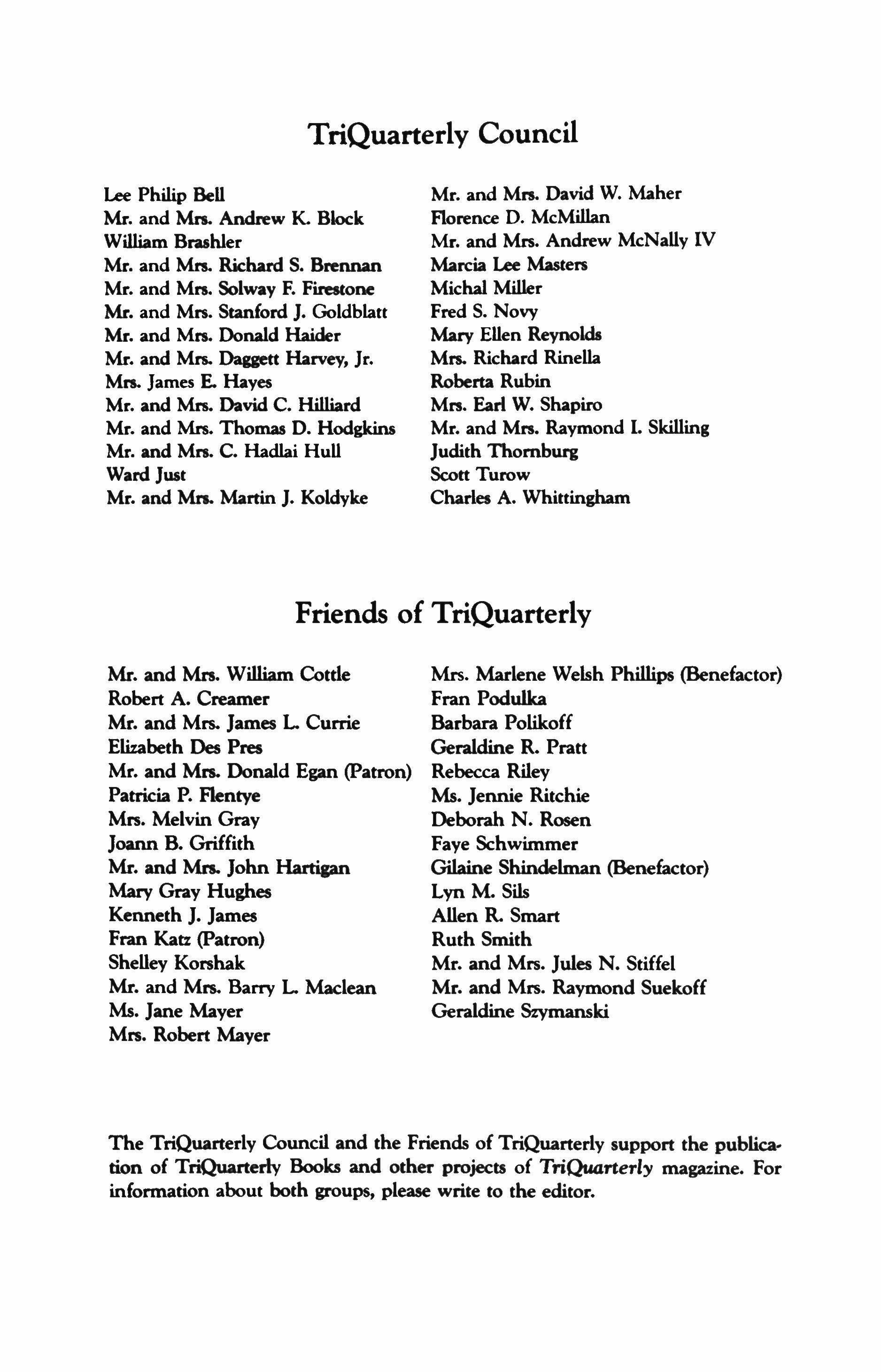
TriQuarterly Council
Mr. and Mn. Andrew K. Block
William Brashier
Mr. and Mn. Richard S. Brennan
Mr. and Mrs. Solwav F. Firestone
Mr. and Mrs. Stanford J. Goldblatt
Mr. and Mrs. Donald Haider
Mr. and Mn. Daggett Harvey, Jr.
Mn. James E. Haves
Mr. and Mn. David C. Hilliard
Mr. and Mrs. Thomas D. Hodgkins
Mr. and Mrs. C. Hadlai Hull
Ward Just
Mr. and Mn. Martin J. Koldvke
Mr. and Mn. David W. Maher
Florence D. McMillan
Mr. and Mn. Andrew McNally IV
Marcia Lee Masten
Michal Miller
FredS.Novy
Mary Ellen Reynolds
Mn. Richard Rinella
Roberta Rubin
Mrs. Earl W. Shapiro
Mr. and Mrs. Raymond L Skilling
Judith Thornburg
Scott Turow
Charles A. Whittingham
Friends of TriQuarterly
Mr. and Mn. William Cotde
Robert A. Creamer
Mr. and Mrs, James L Currie
Elizabeth Des Pres
Mr. and Mn. Donald Egan (patron)
Patricia P. Fientye
Mn. Melvin Gray
Joann B. Griffith
Mr. and Mn. John Hartipn
Mary Gray Hughes
Kenneth J. James
Fran Kan (patron)
Shelley Korshak
Mr. and Mn. Barry L Maclean
Ms. Jane Mayer
Mn. Robert Maver
Mrs. Marlene Welsh Phillips (Benefactor)
Fran Podulka
Barbara Polikoff
Geraldine R. Pratt
Rebecca Riley
Ms. Jennie Ritchie
Deborah N. Rosen
Faye Schwimmer
Gilaine Shindelman (Benefactor)
Lvn M. SUS
Allen R. Smart
Ruth Smith
Mr. and Mrs, Jules N. Stiffel
Mr. and Mrs, Raymond Suekoff
Geraldine Szymanski
The TriQuarterly Council and the Friends of TriQuarterly support the publication of TriQuarteriv Books and other projects of TriQuarteTly magazine. For information about both groups, please write to the editor.
Allen Grossman on poetics
Homer translated by Robert Fagles and fiction and poetry by
Karen Heuler
Russell Working
R. D. Skillings
Arthur Morey
David Michael Kaplan
Eavan Boland

Li-Young Lee
Tira Palmquist
L. S. Asekoff
Claribel Alegria
David Galler
Paul Breslin
Maxine Kumin
Alan Shapiro
Imre Oravecz
Rebecca Seiferle and Peter Balakian on Terrence Des Pres
-: '), ',' \��.'\ �t;,-�, ",\', ..(; �- i,}.c: ,; "': {n ;i \ -.!' { l \ \ � �� ,.-� \
,,-(ff\ ':: .. "� 'Z. ',,;:\�, / � ,.- � t ',:i..� .' .:.---:._;<-:? /; ./ - ��
$9,95






























 Chamier
Chamier














































































































































































































































 co Eliseo Diego
co Eliseo Diego







 for Harry Hayford
for Harry Hayford






















































